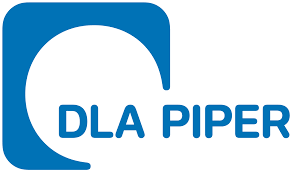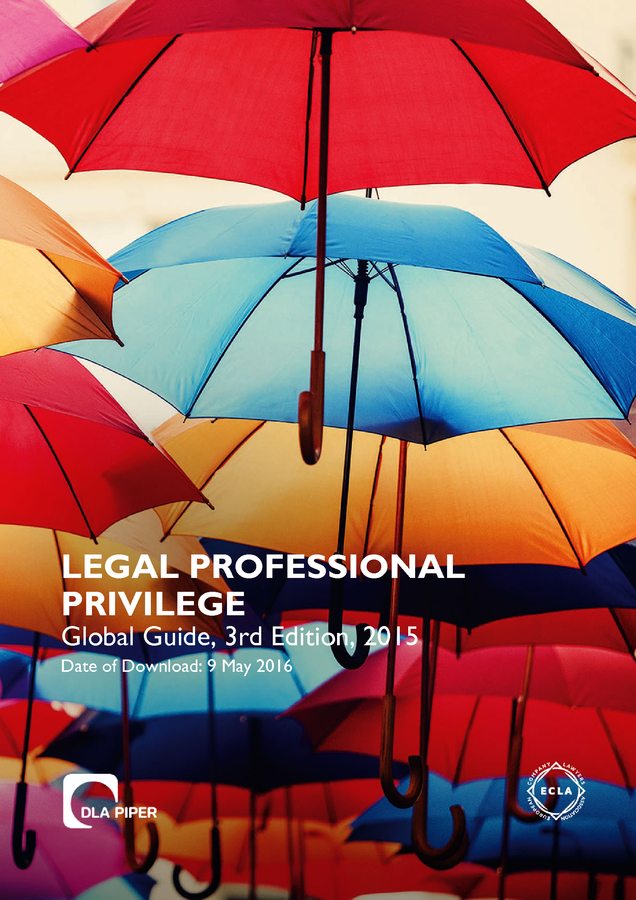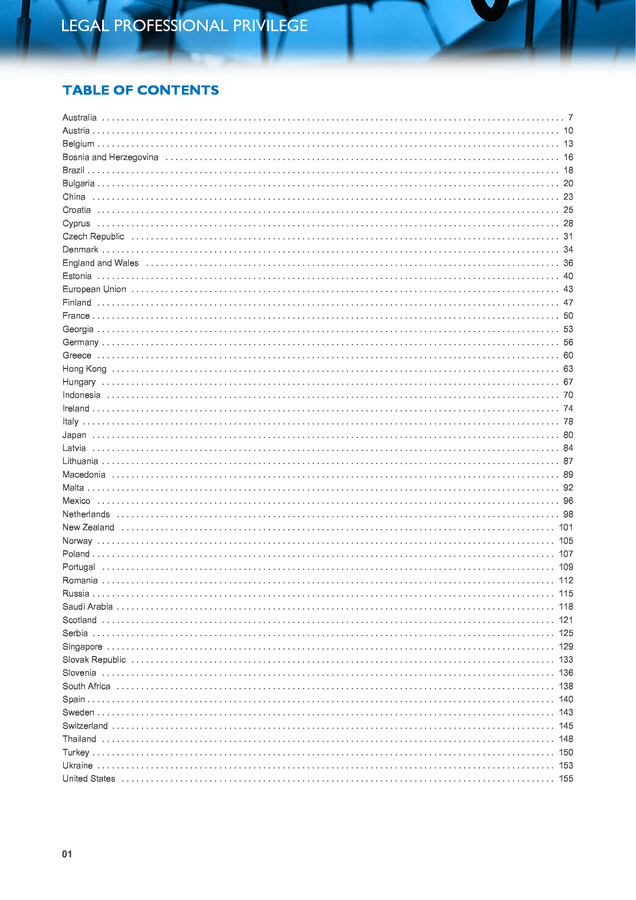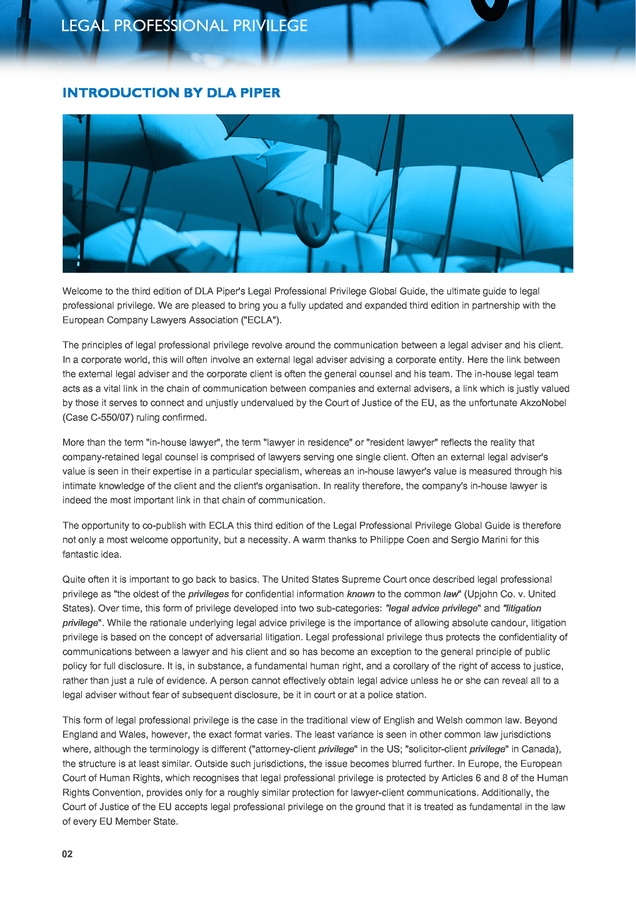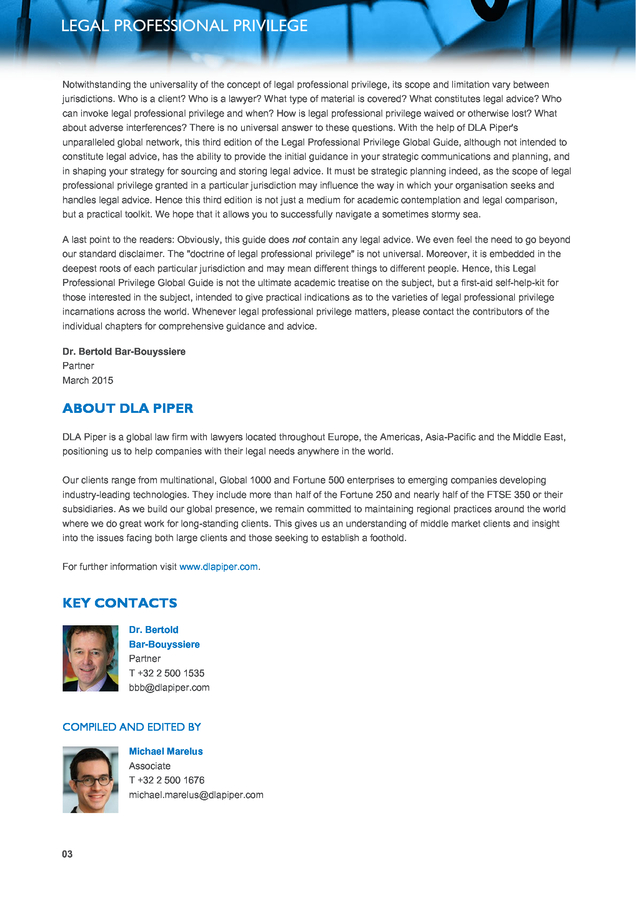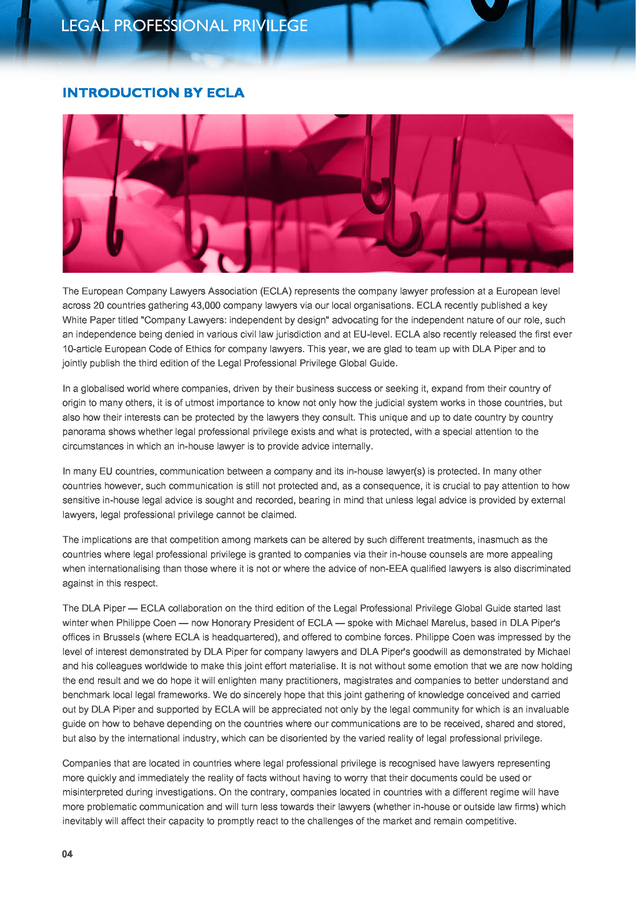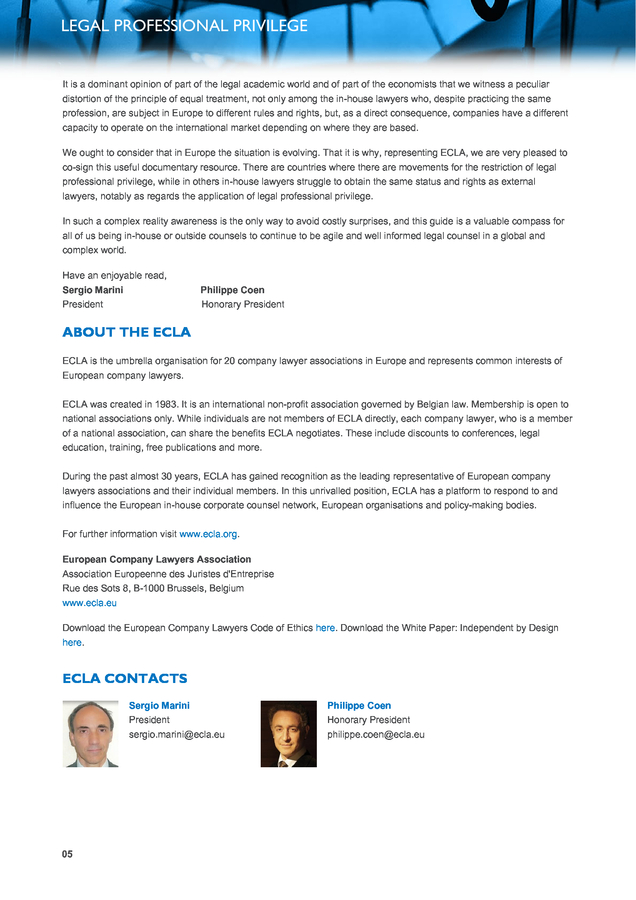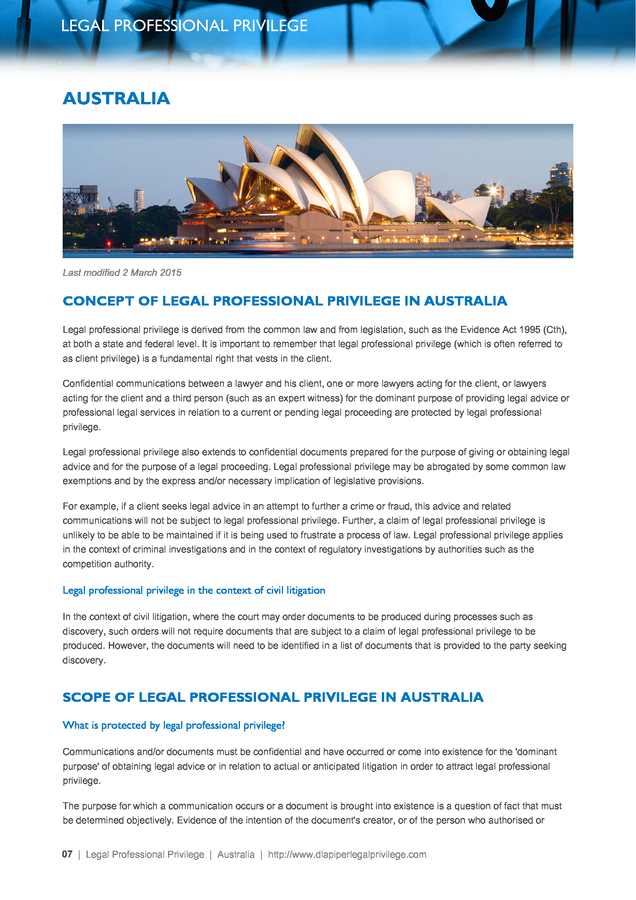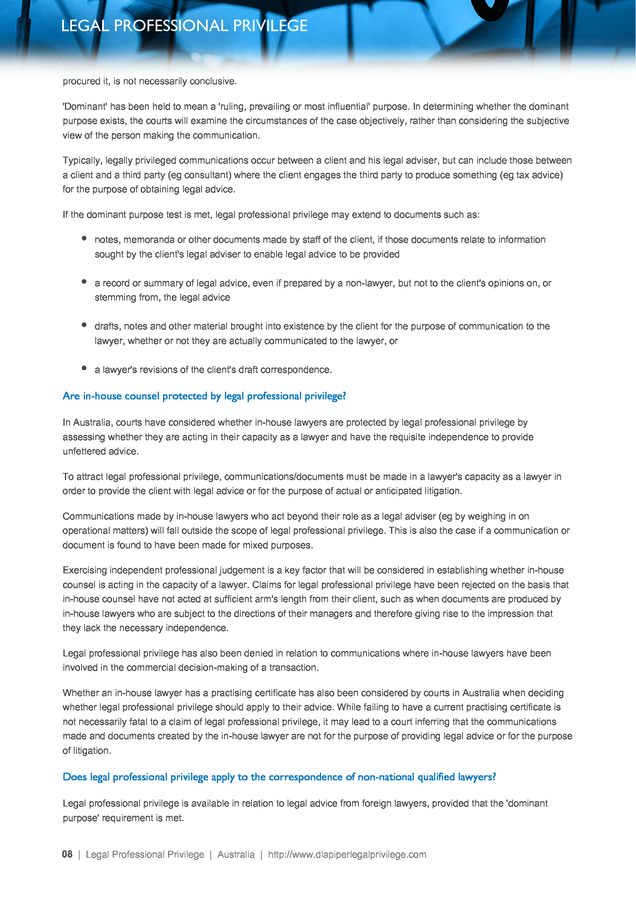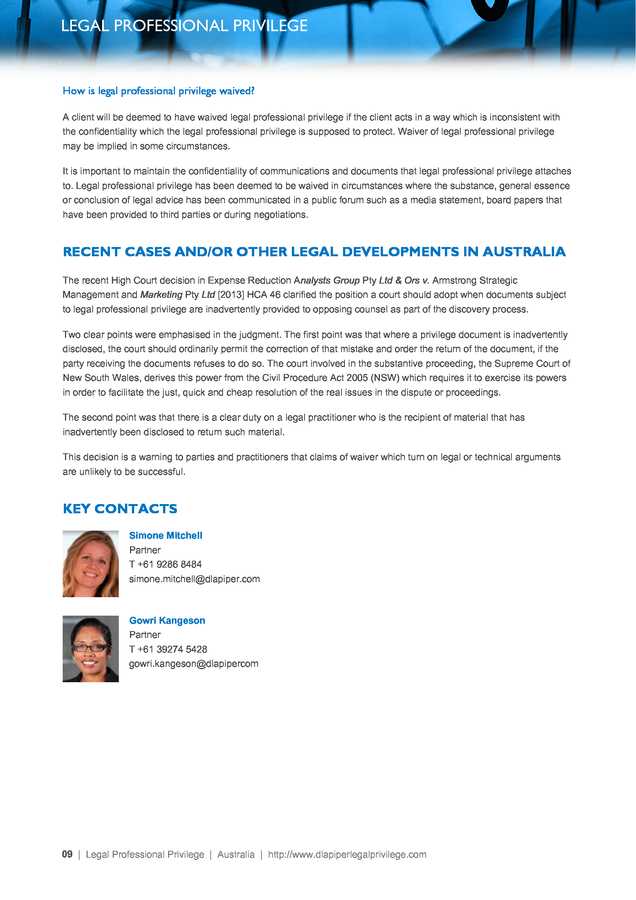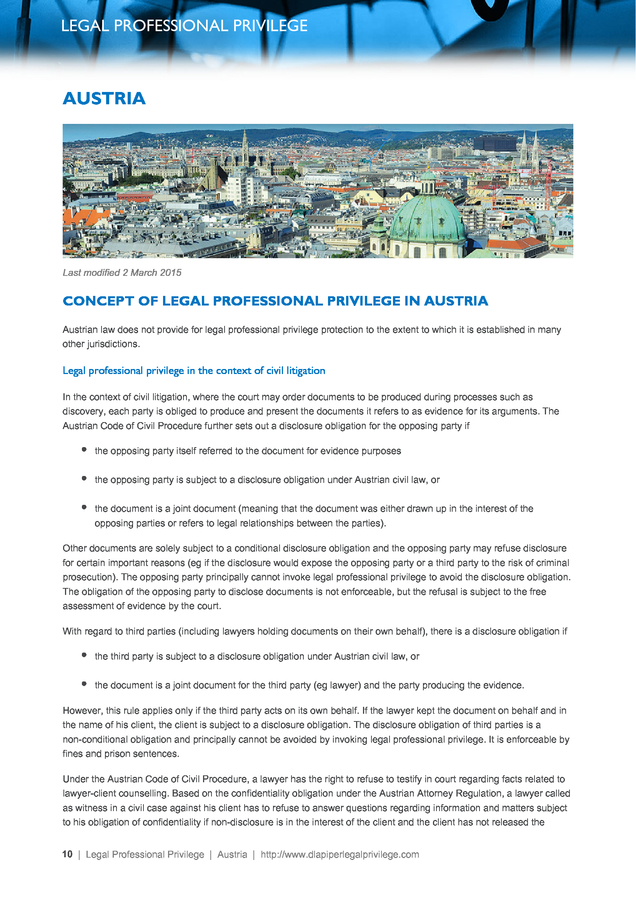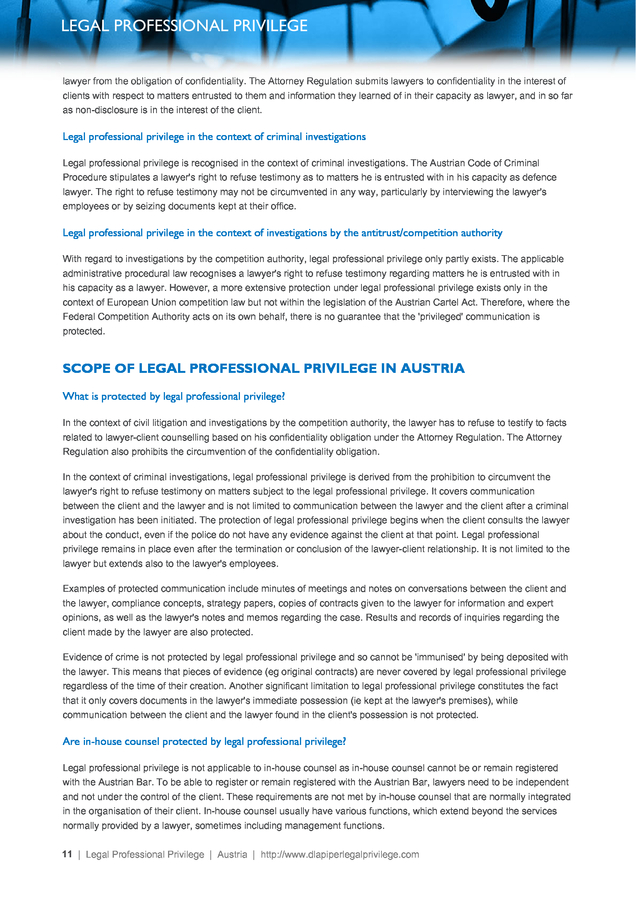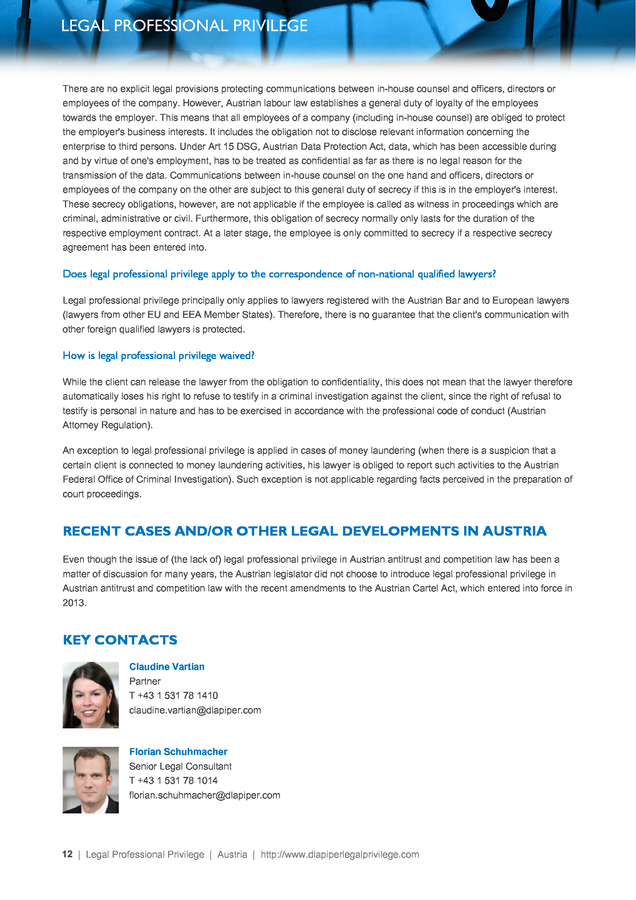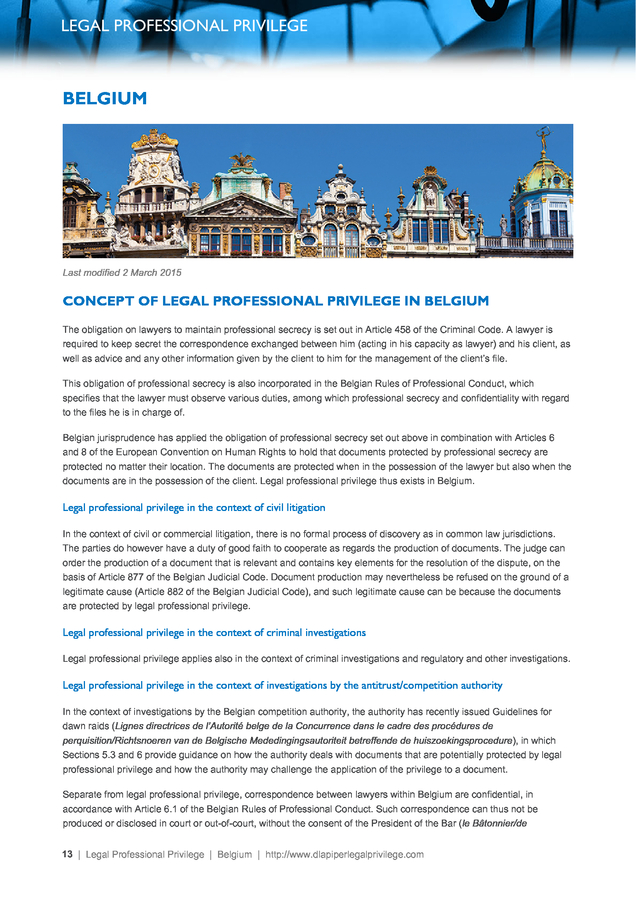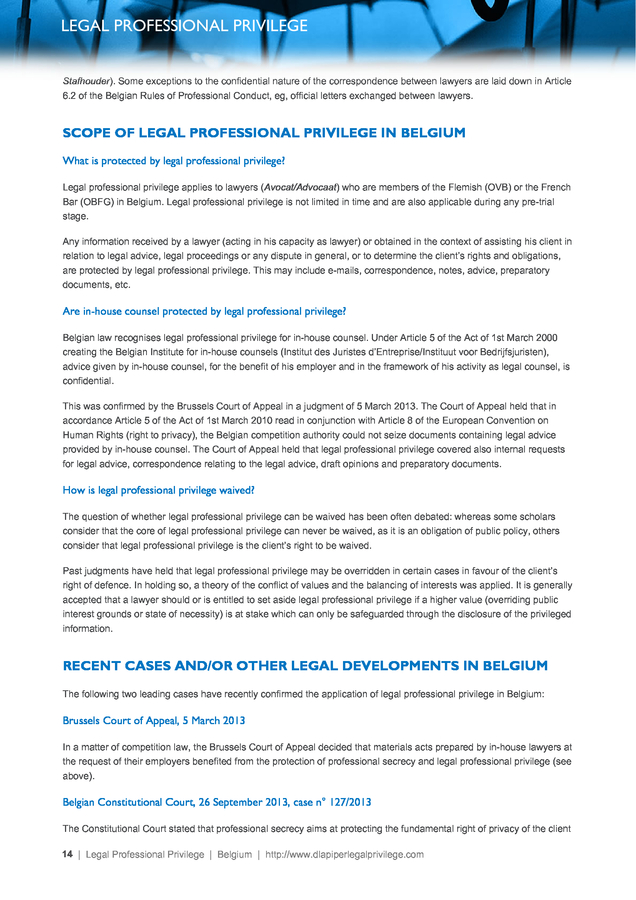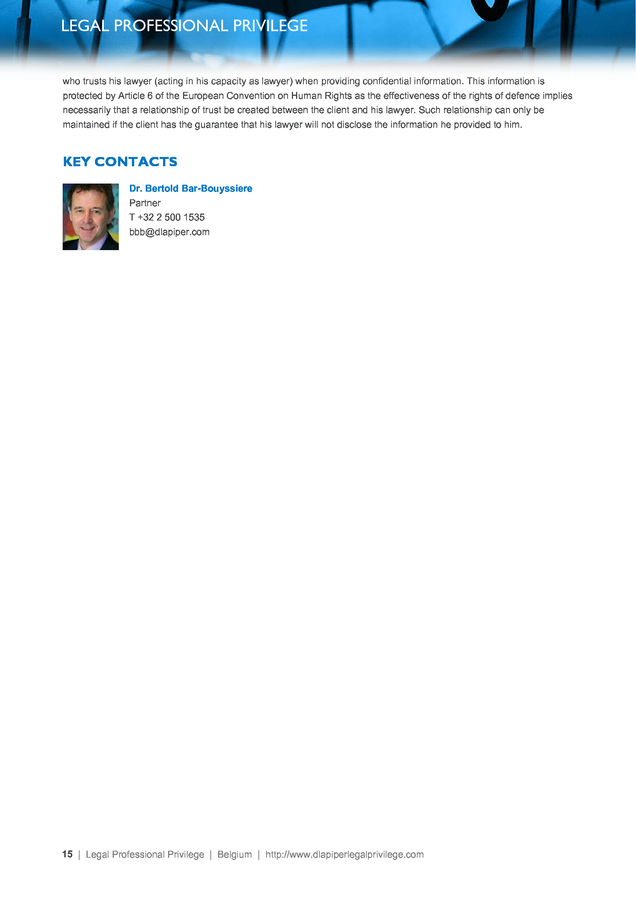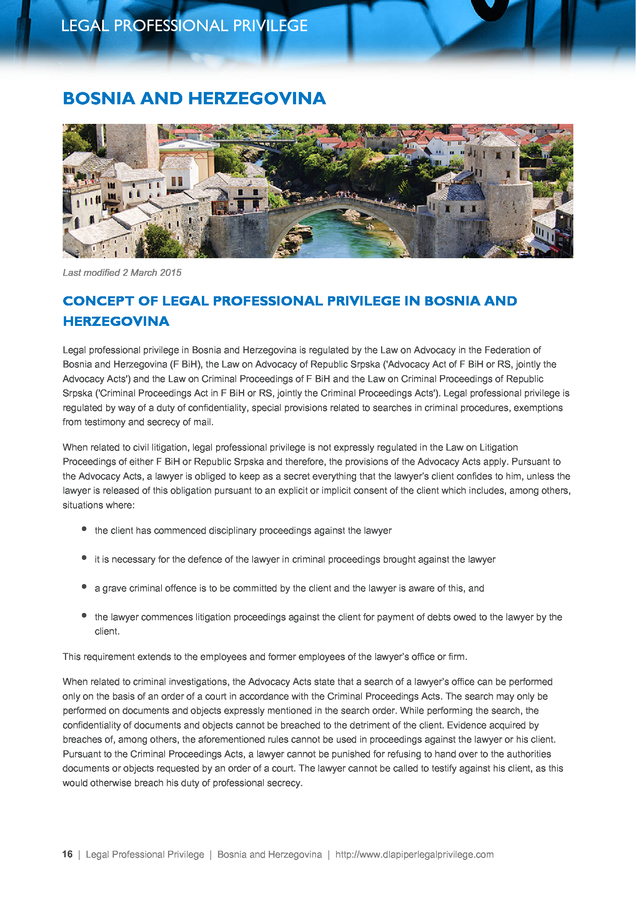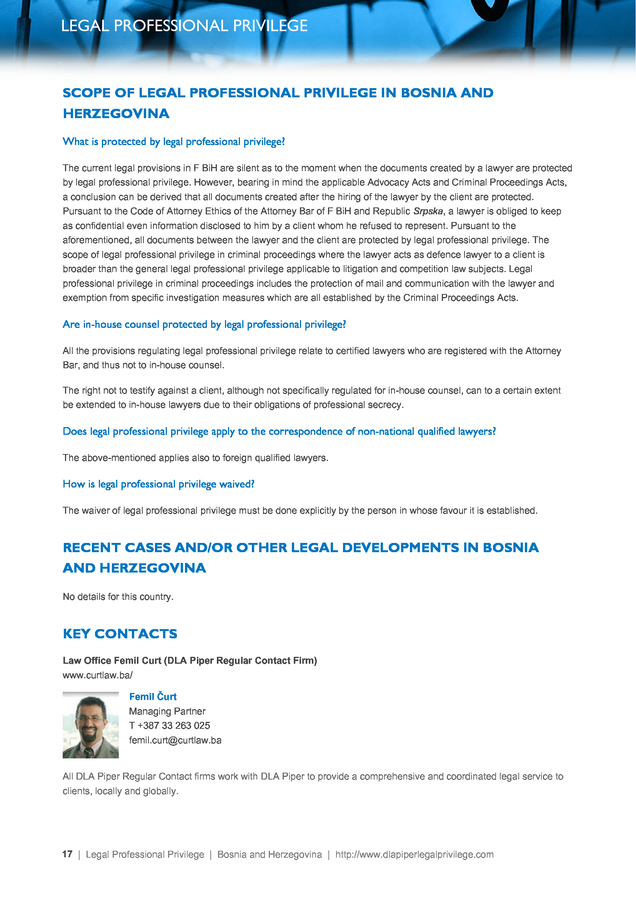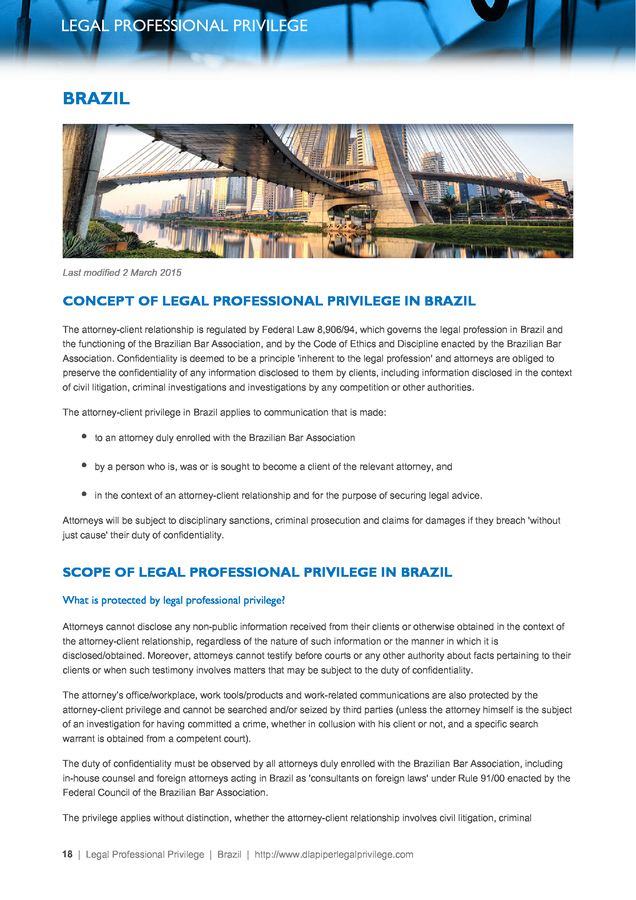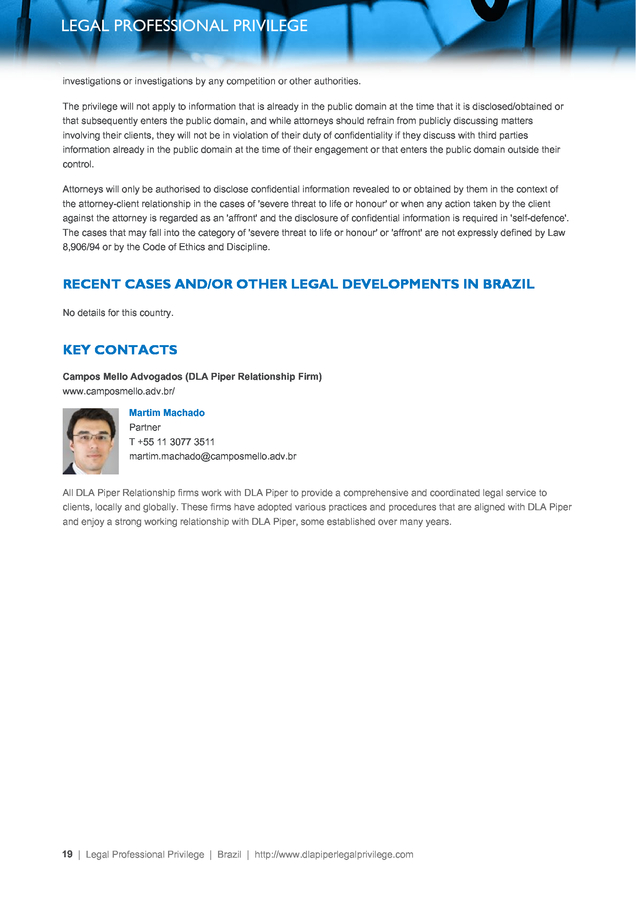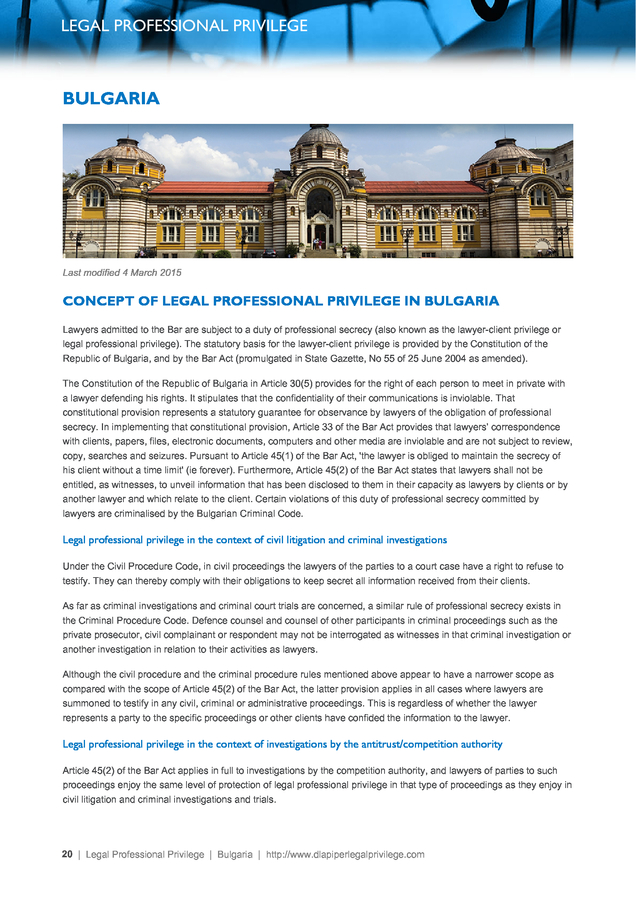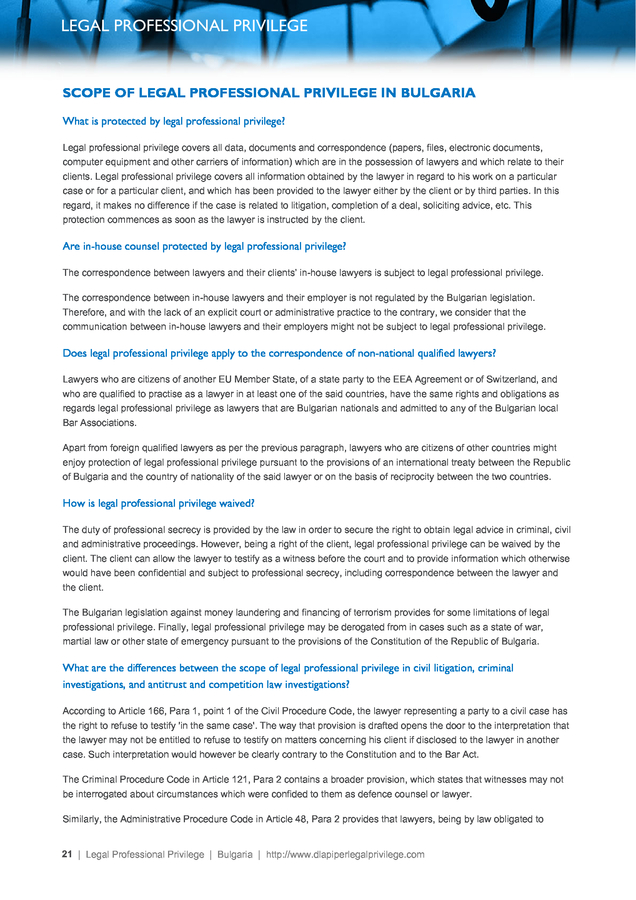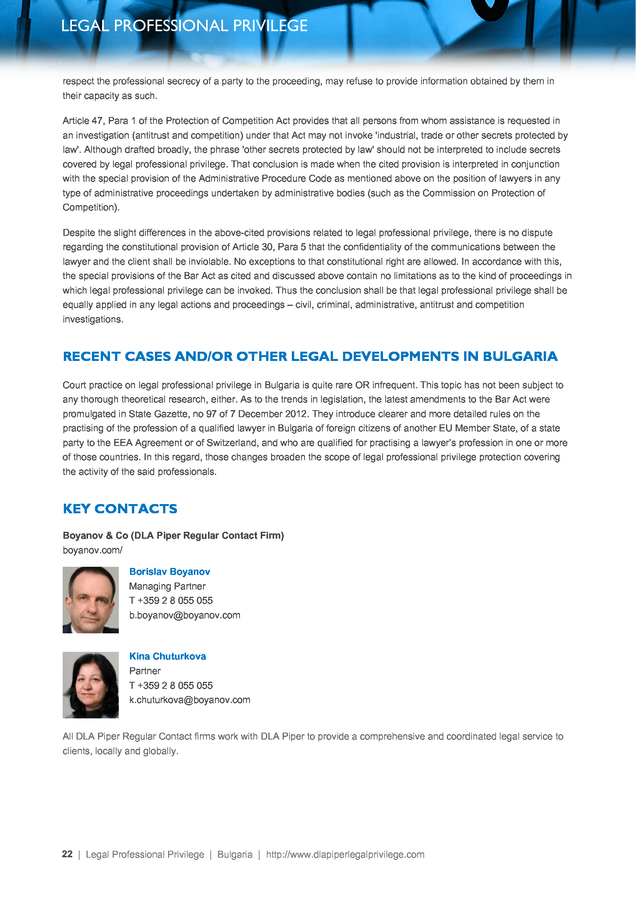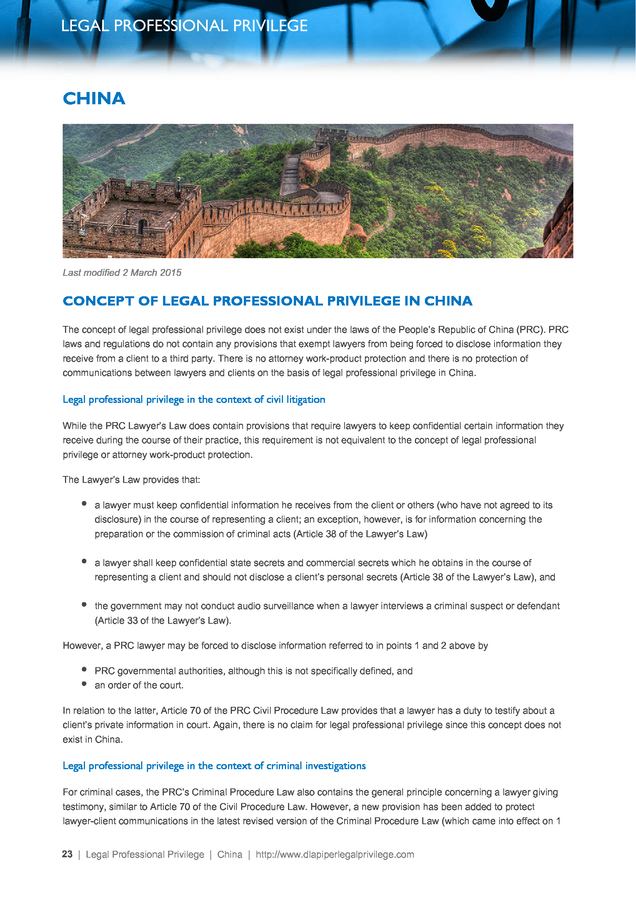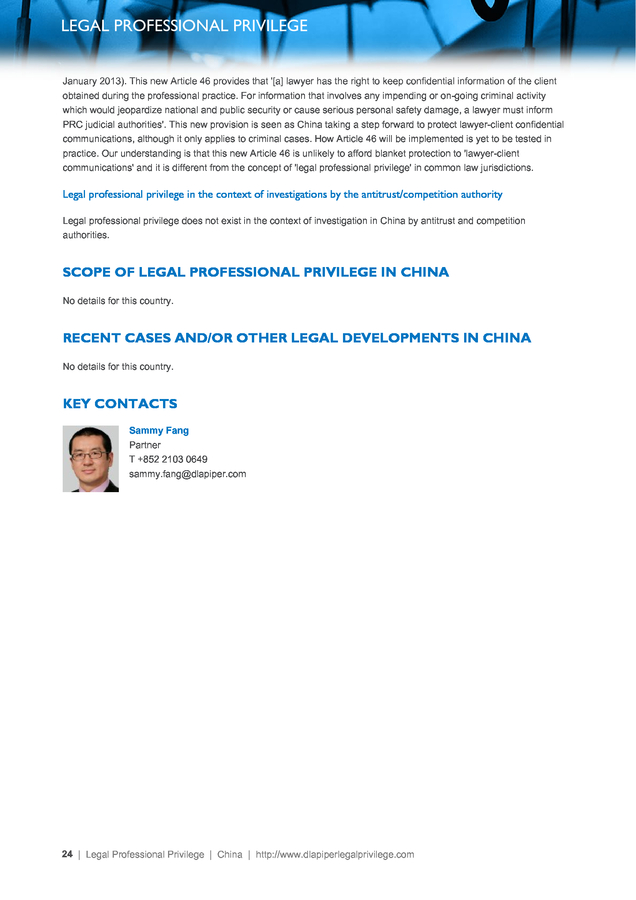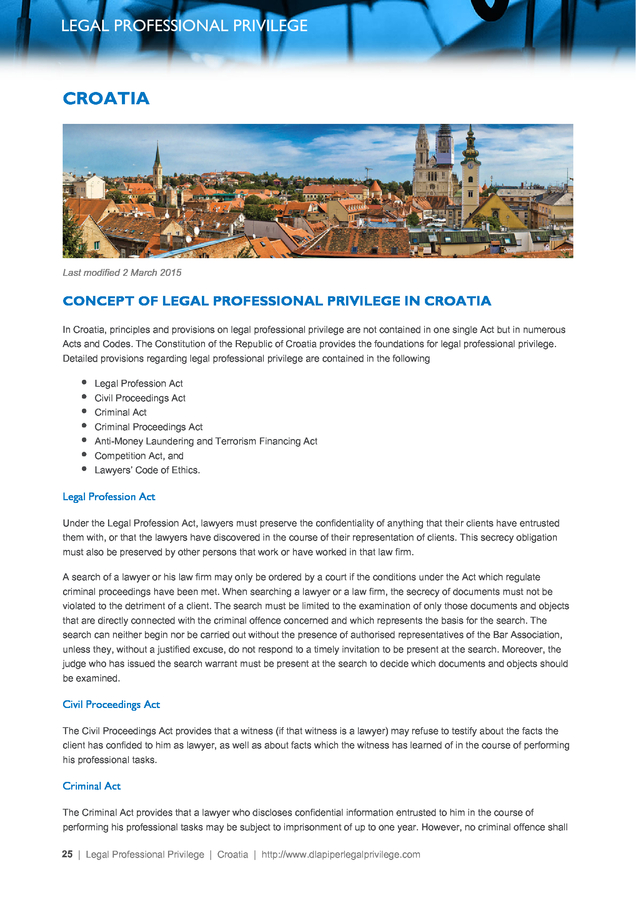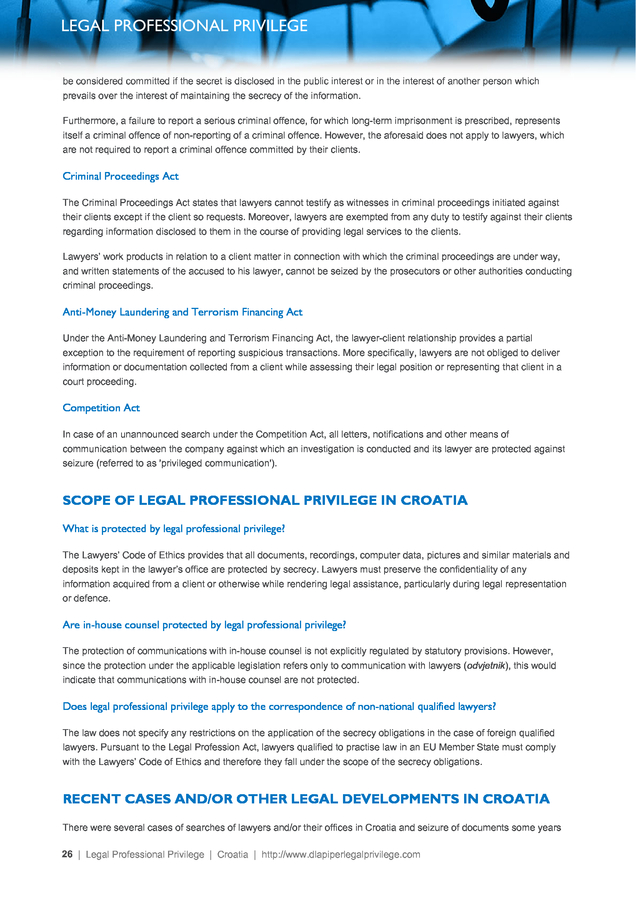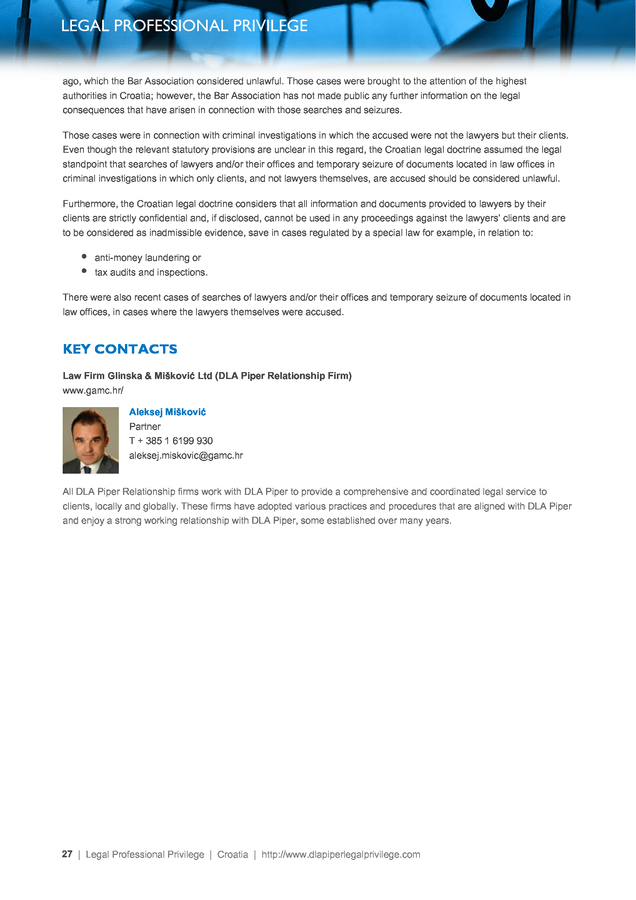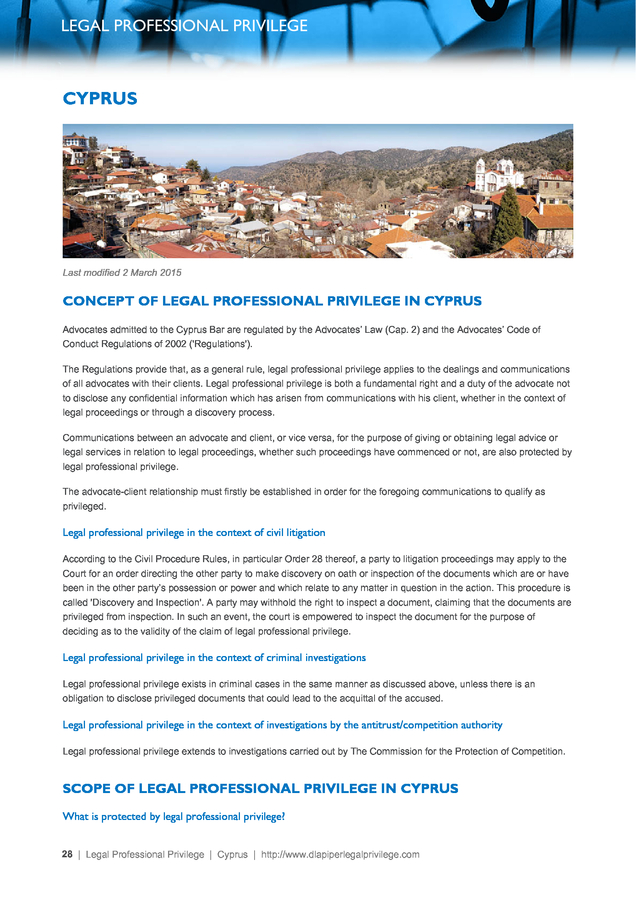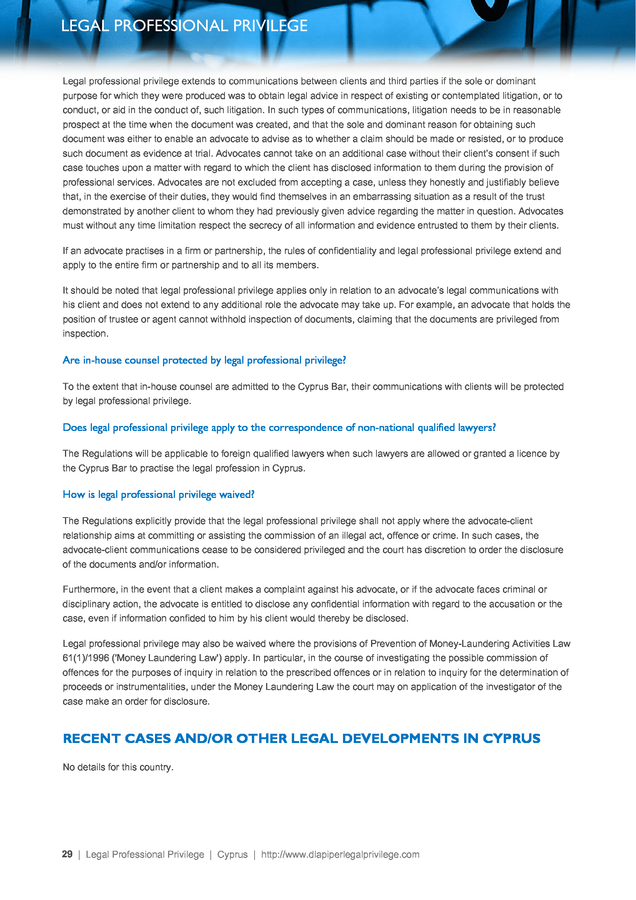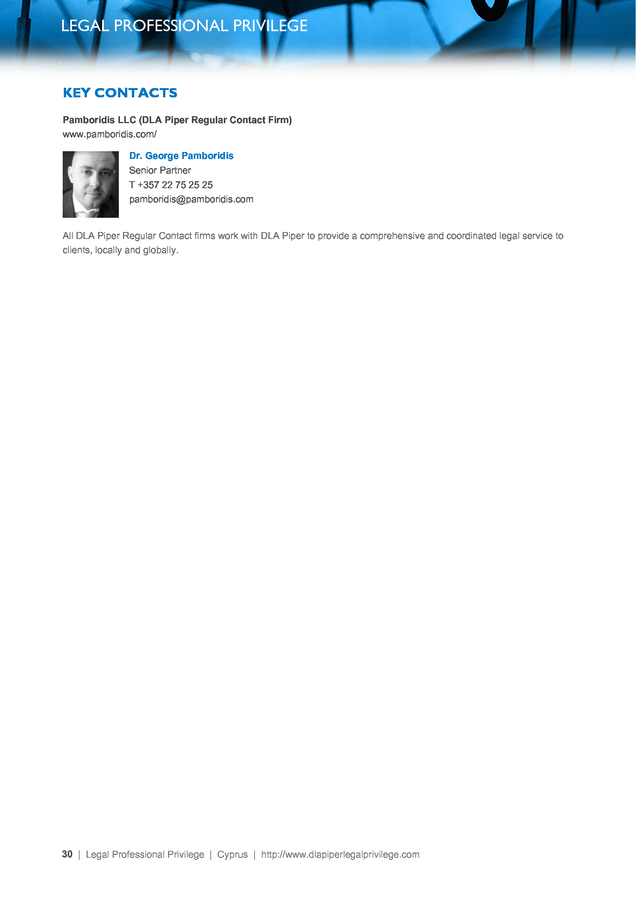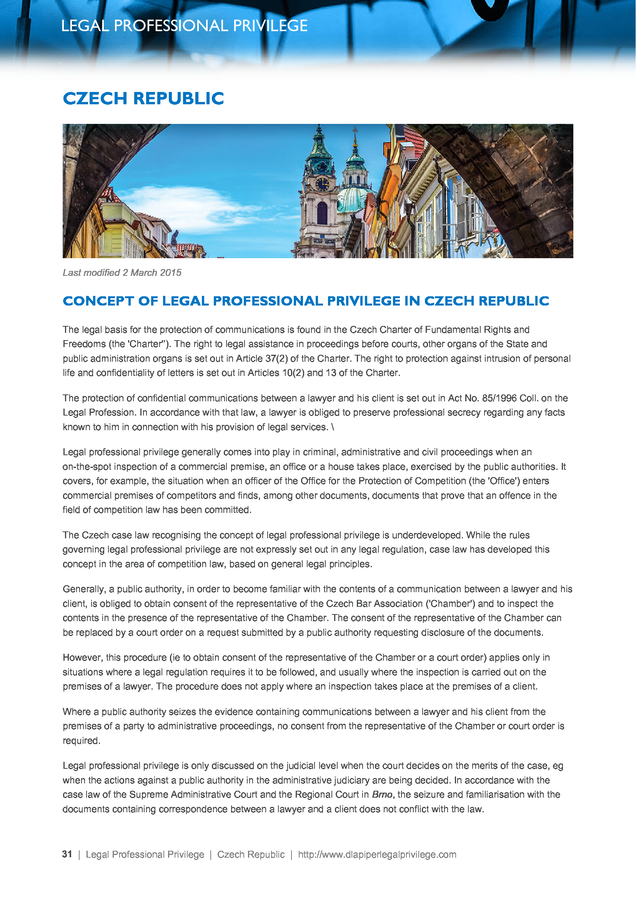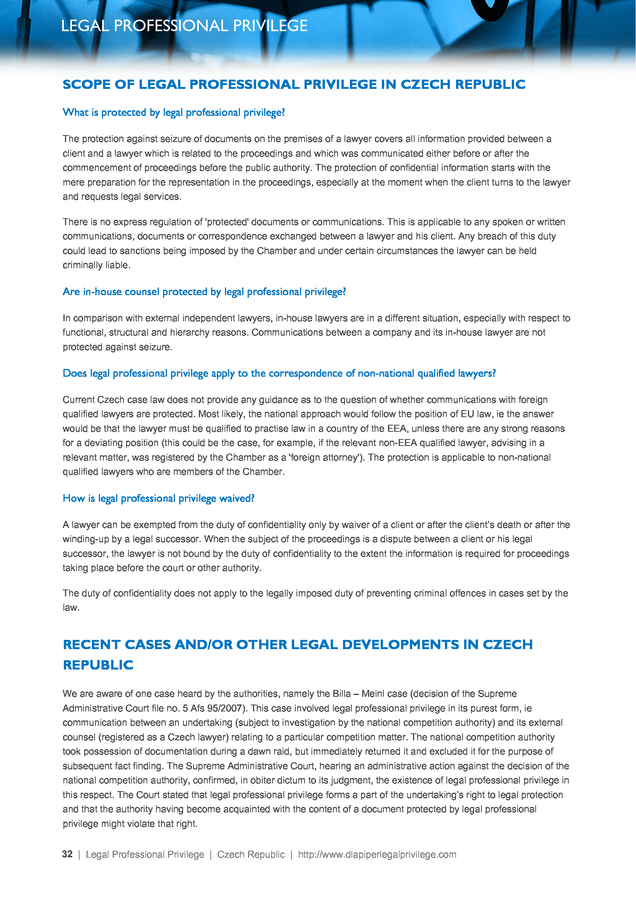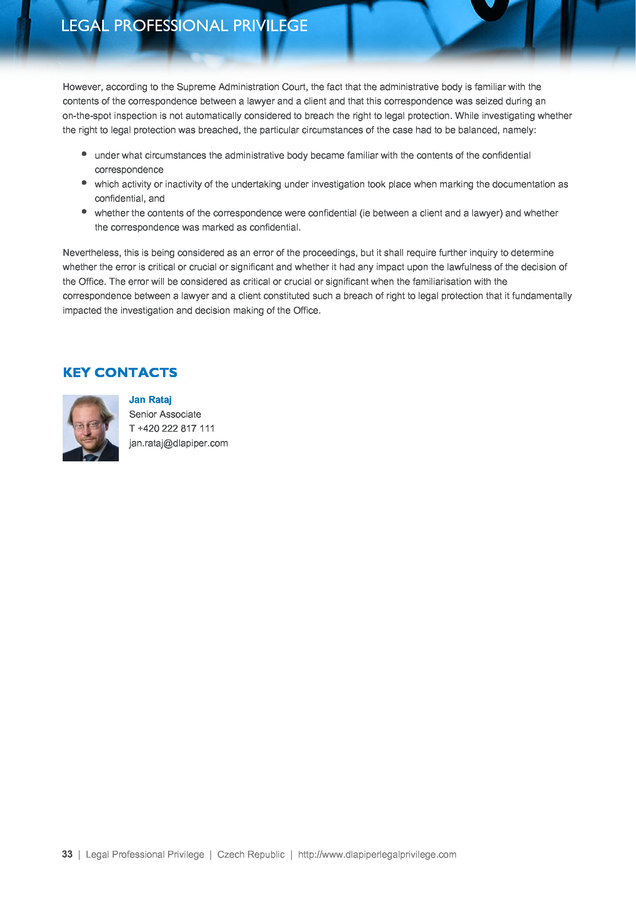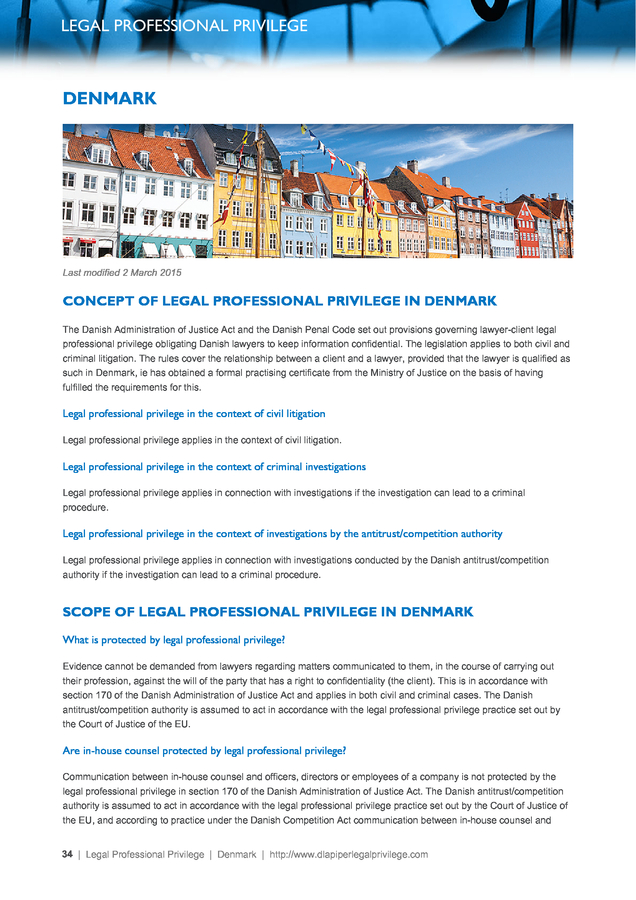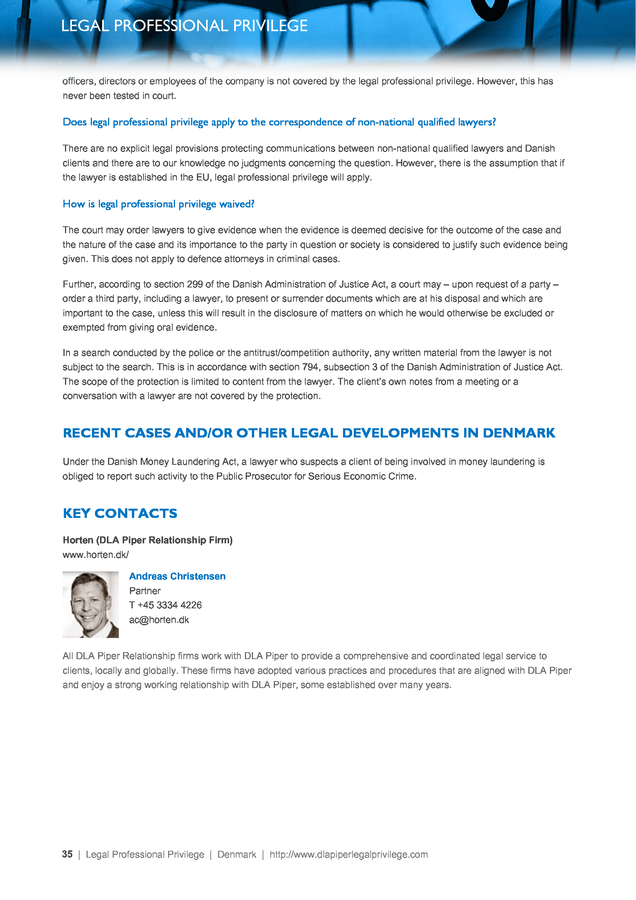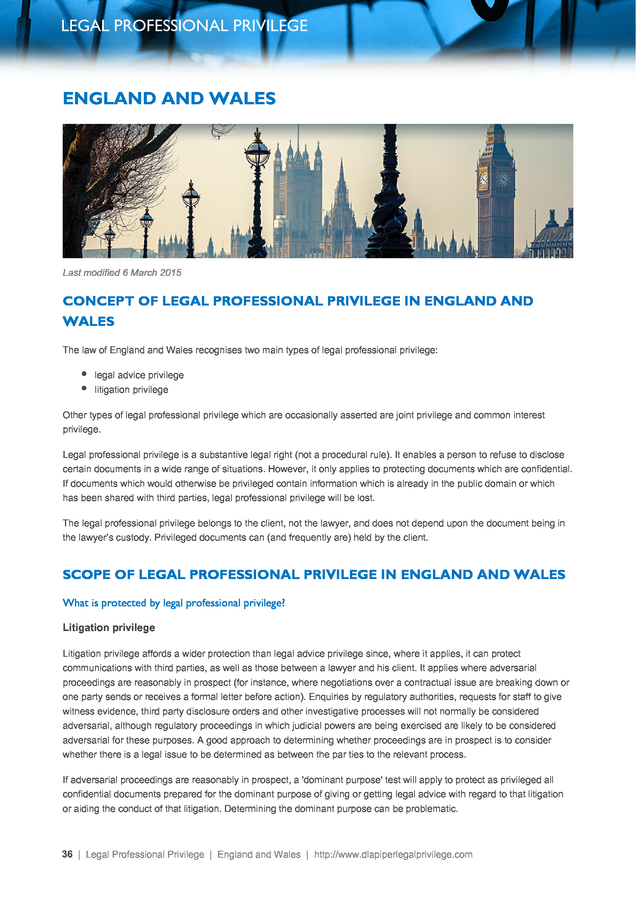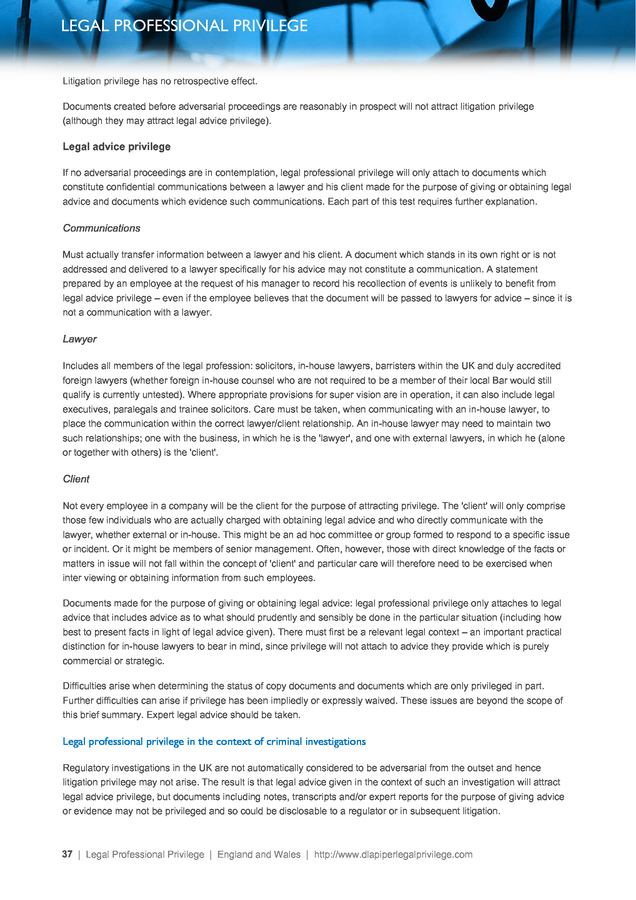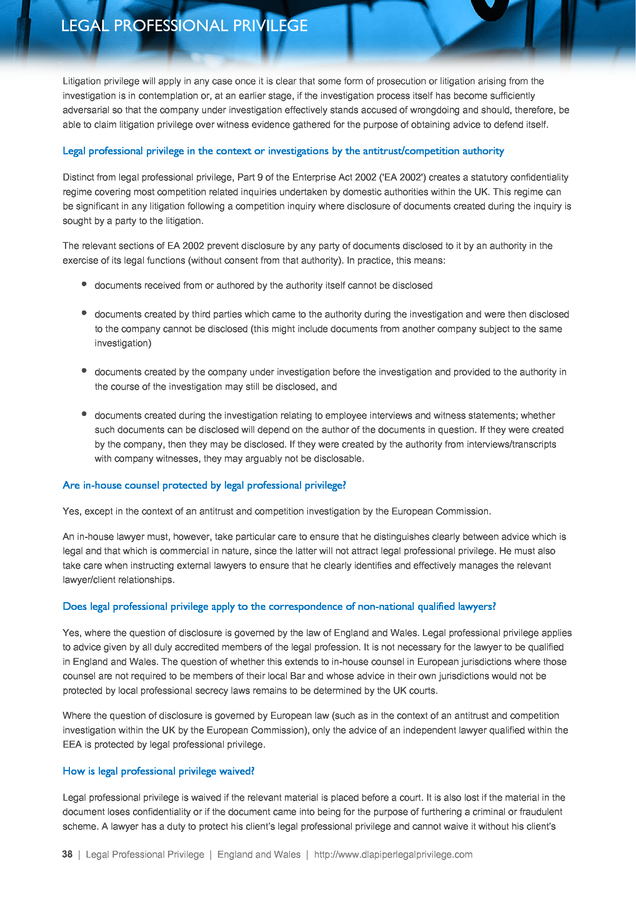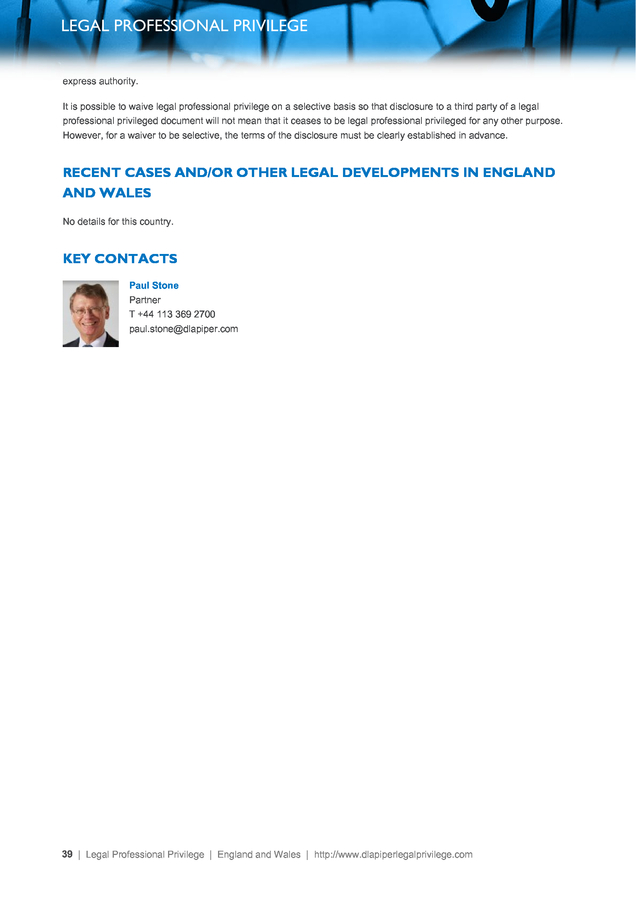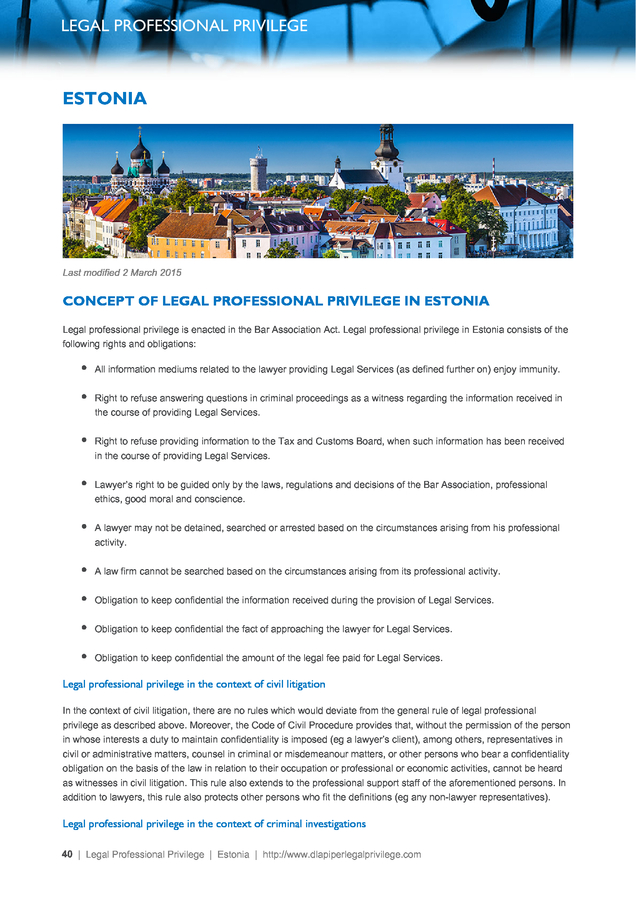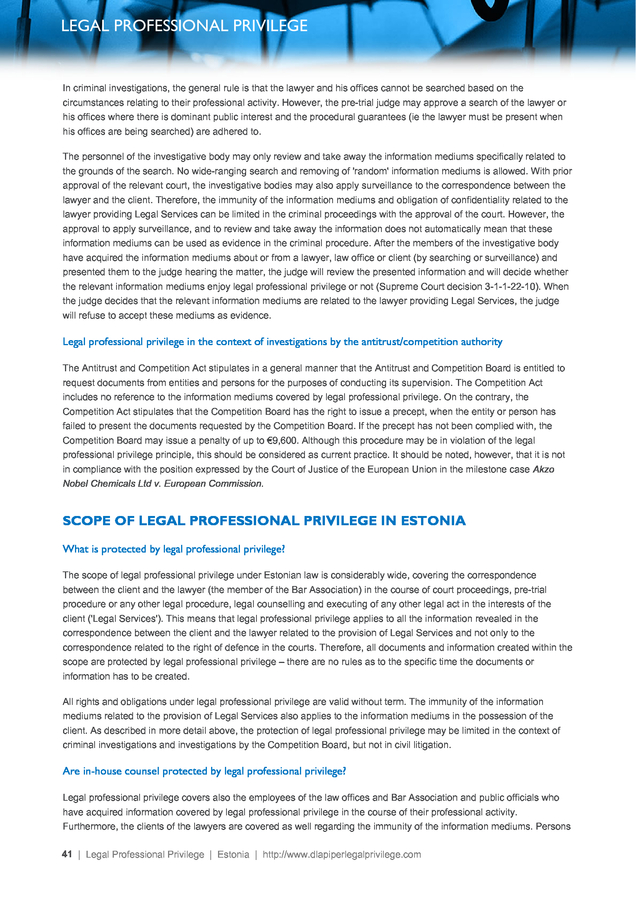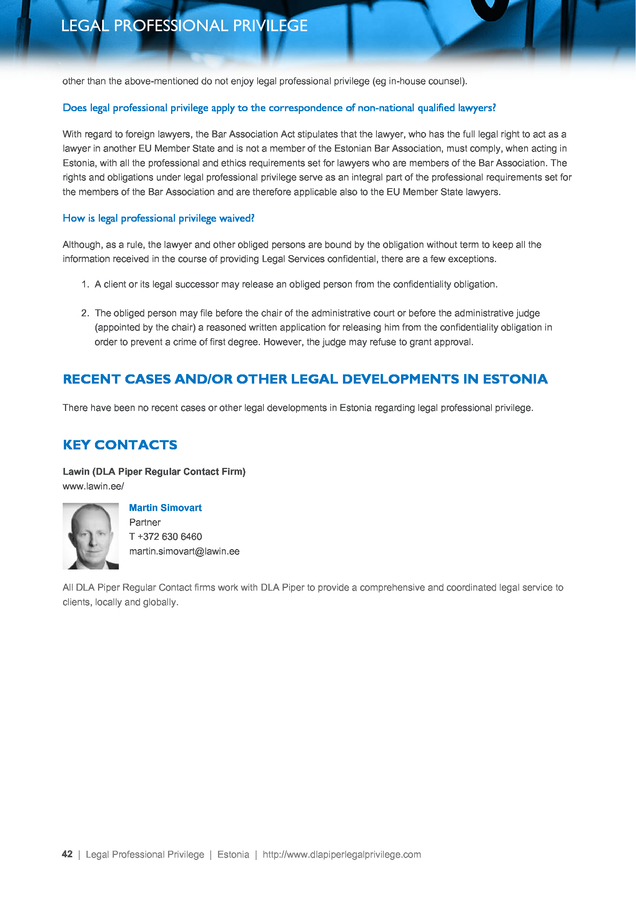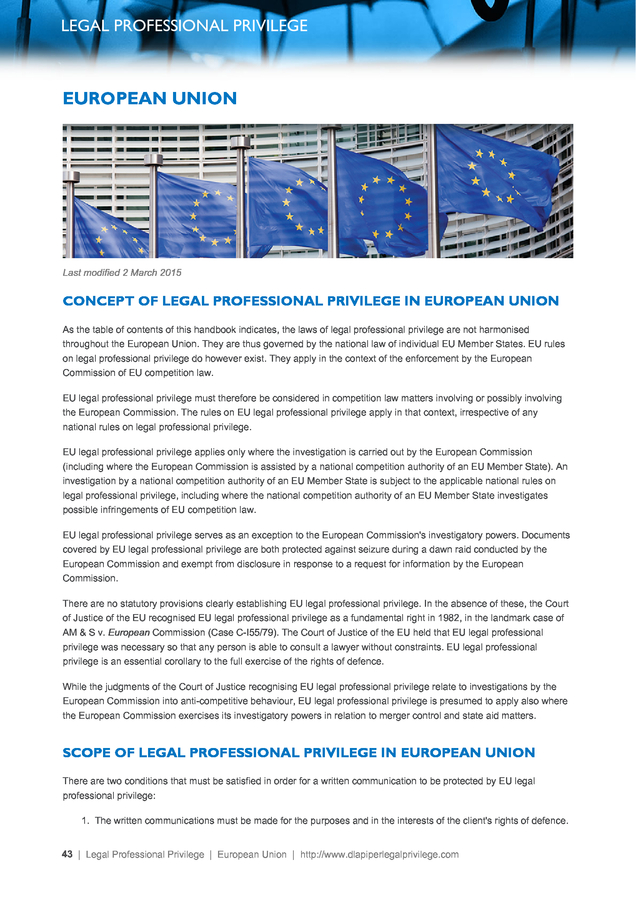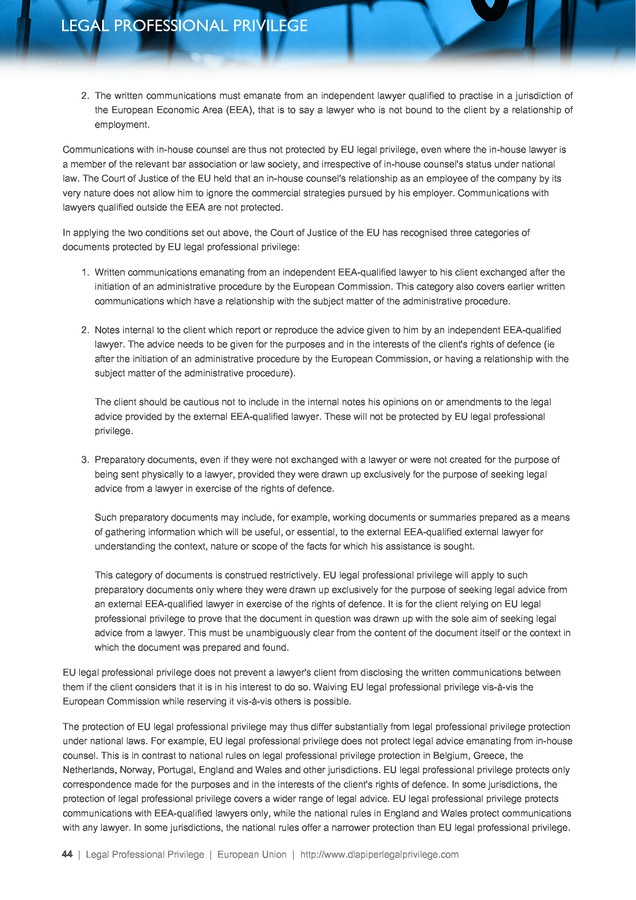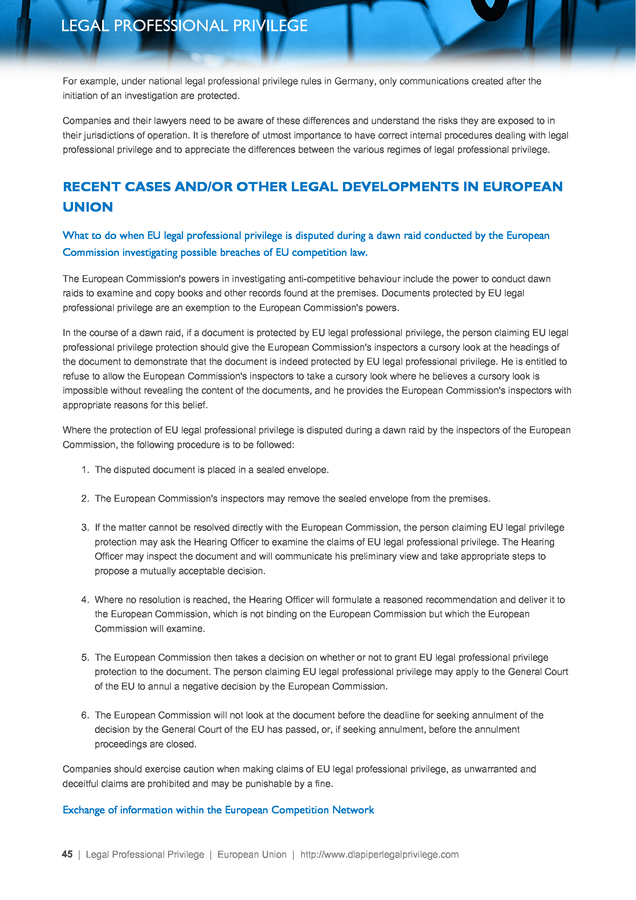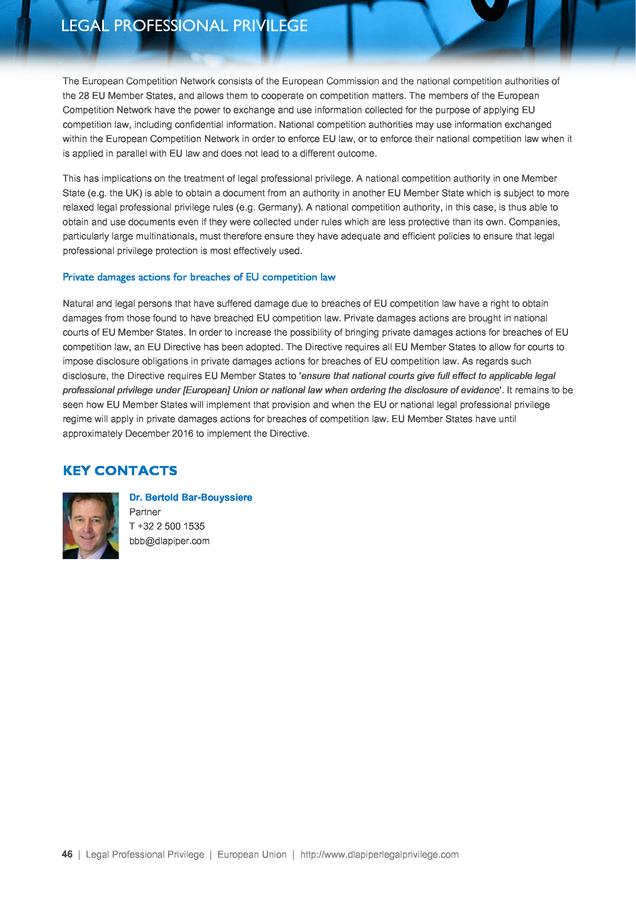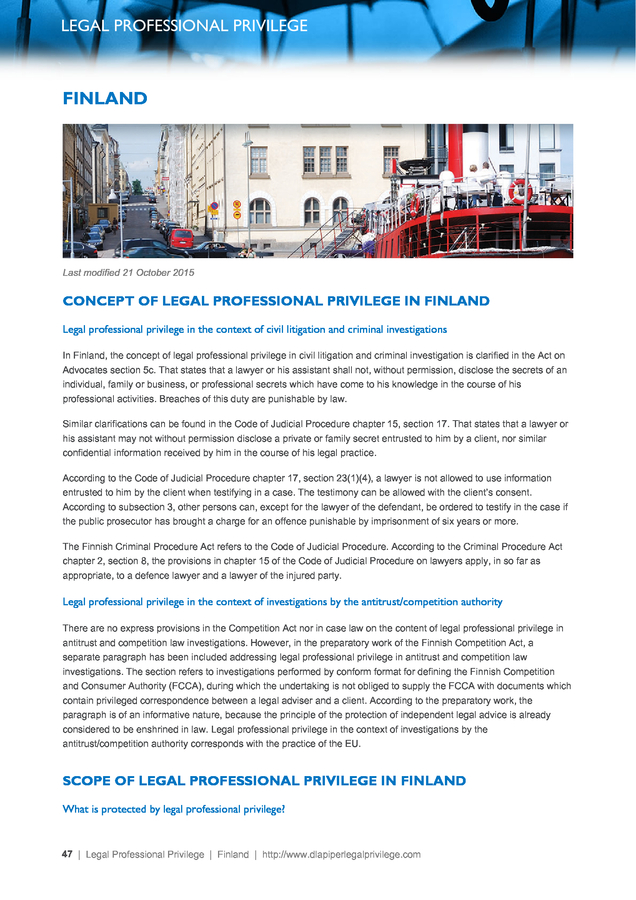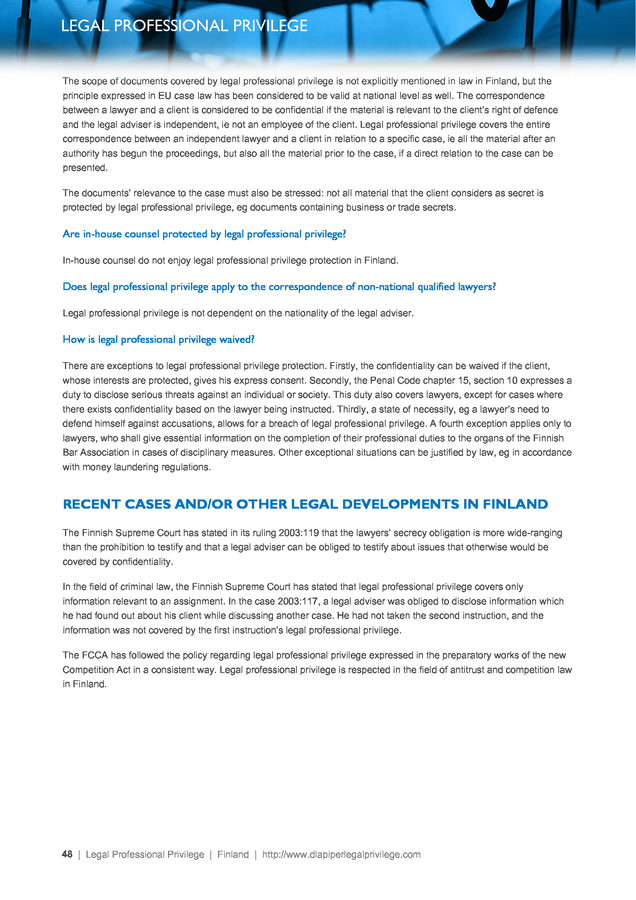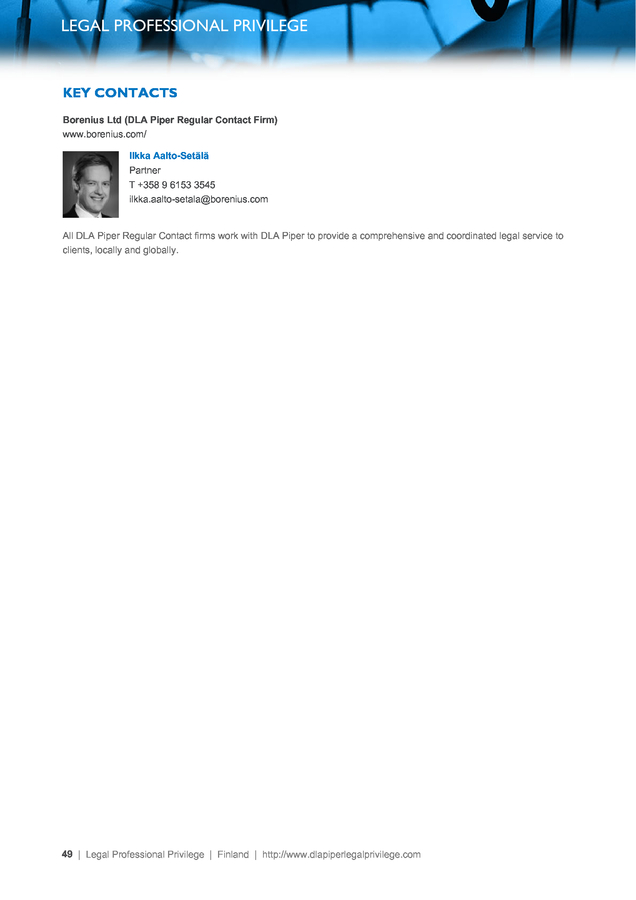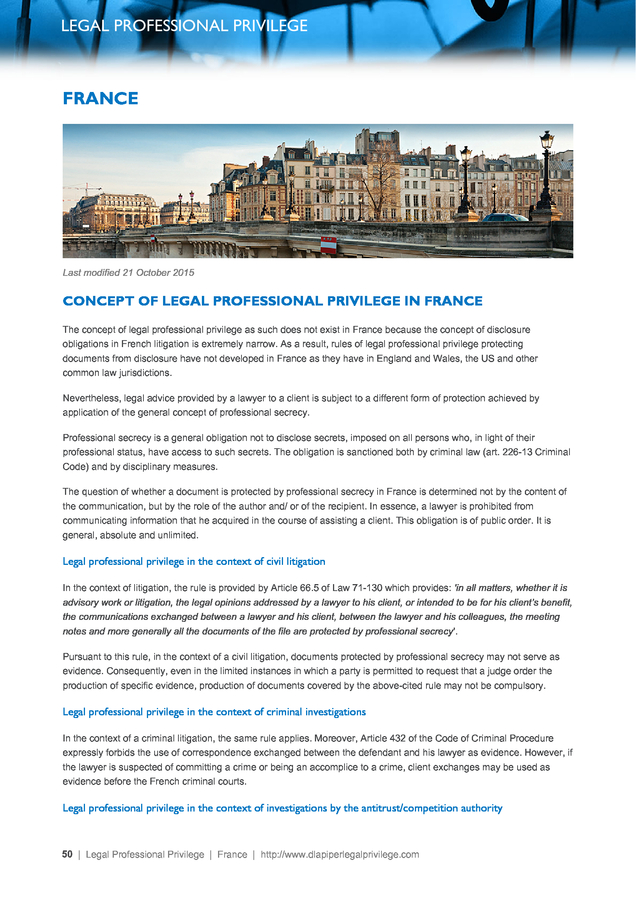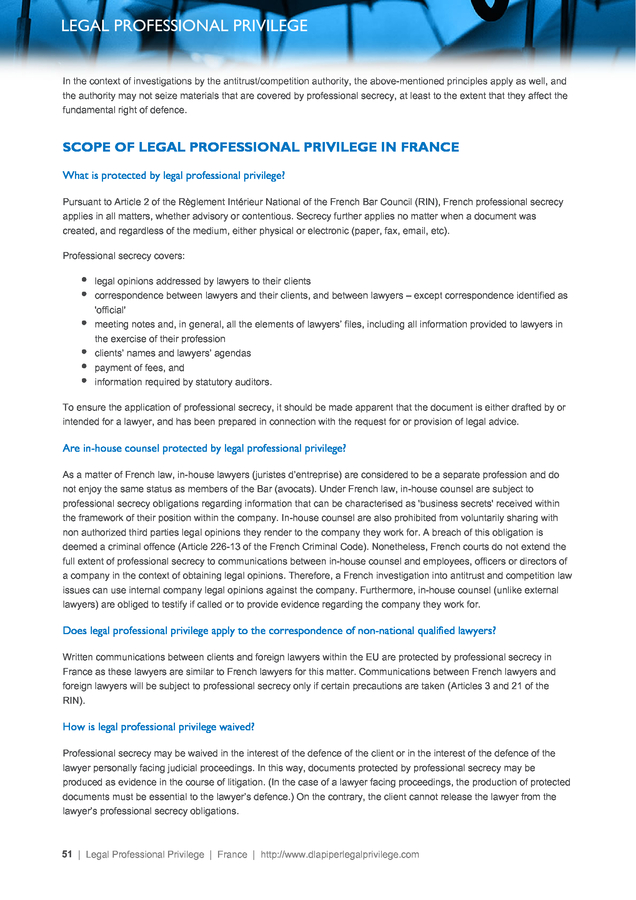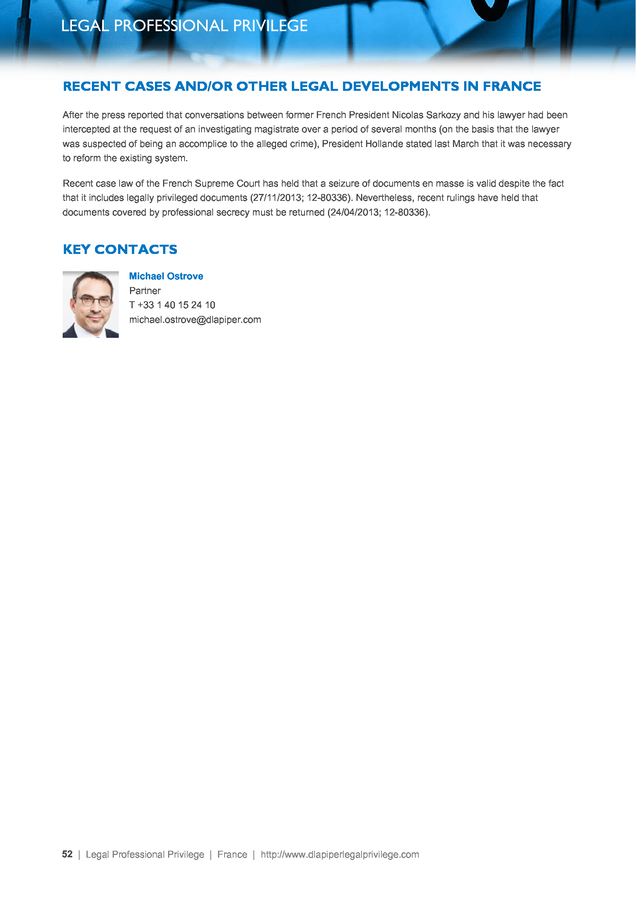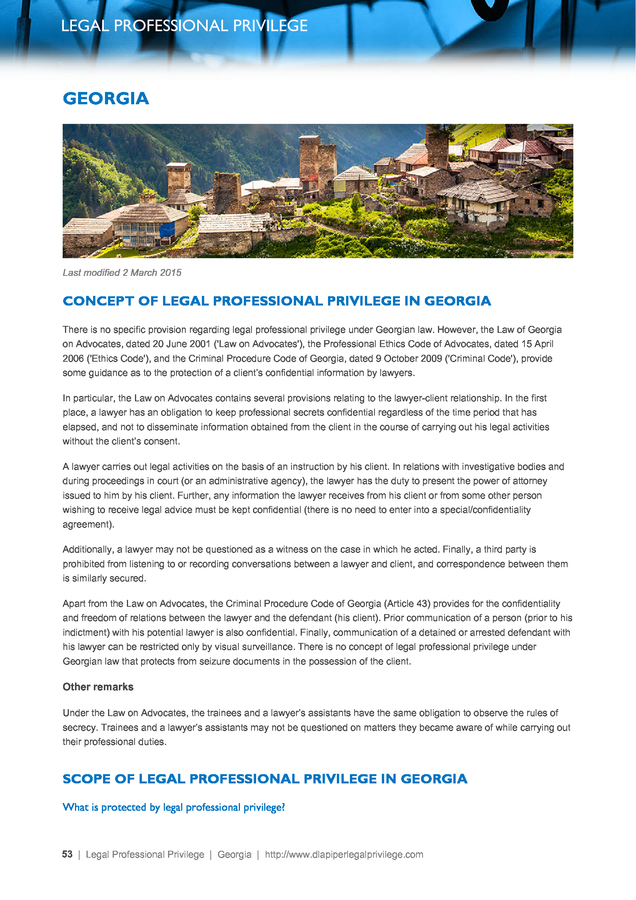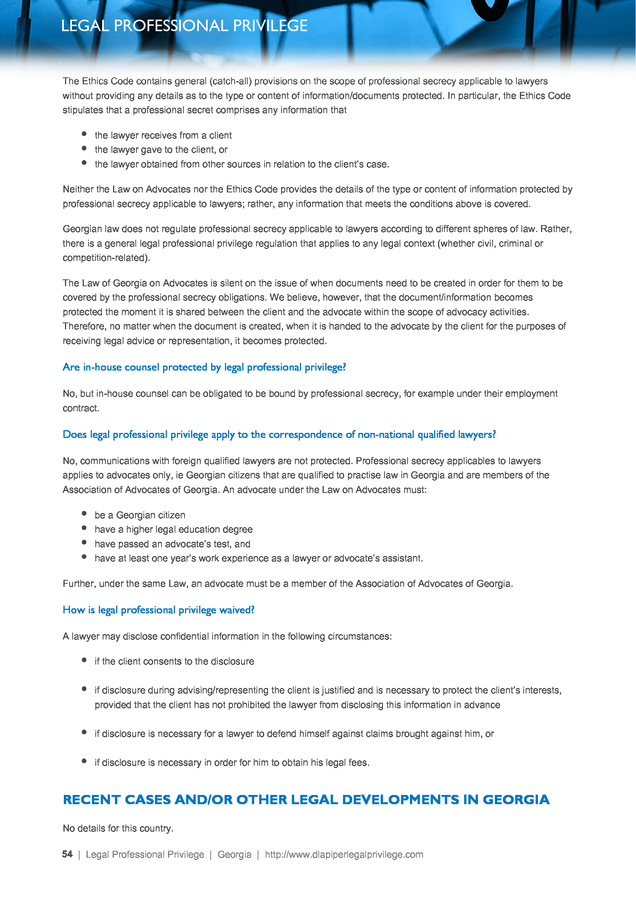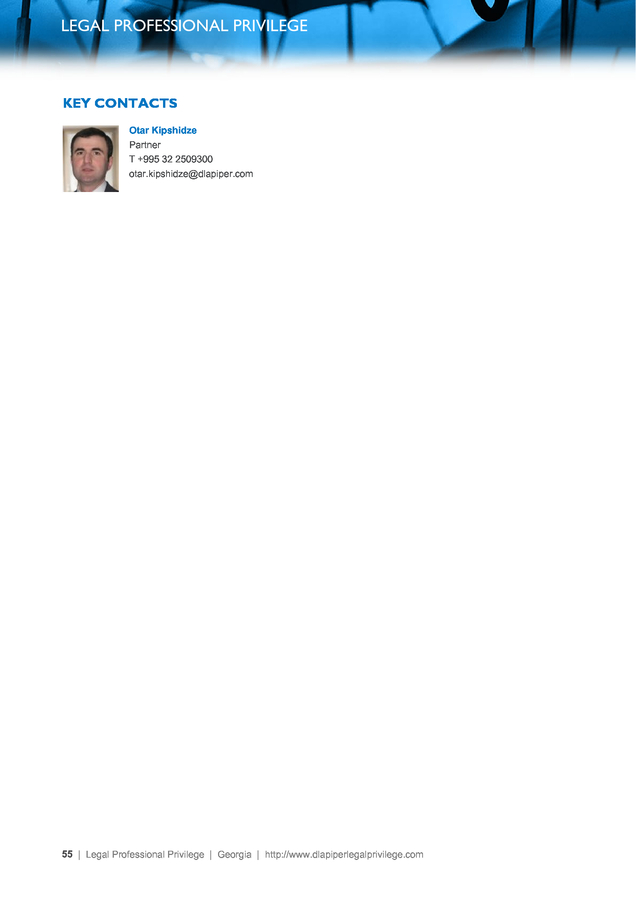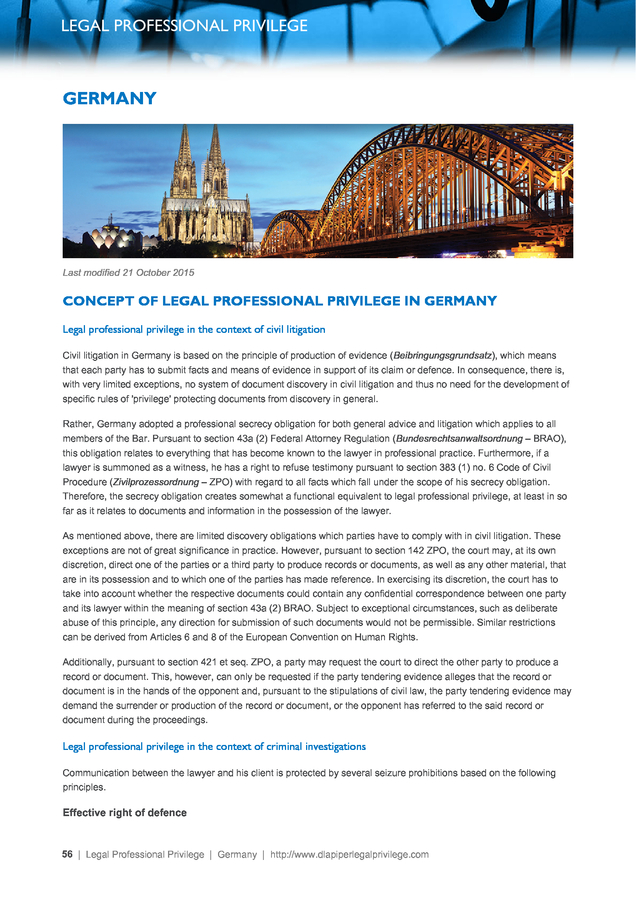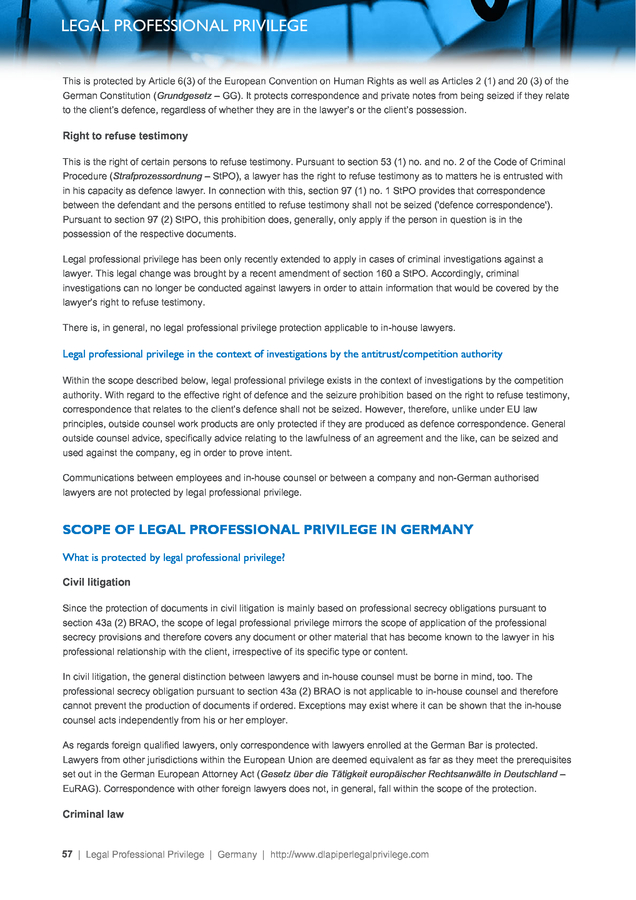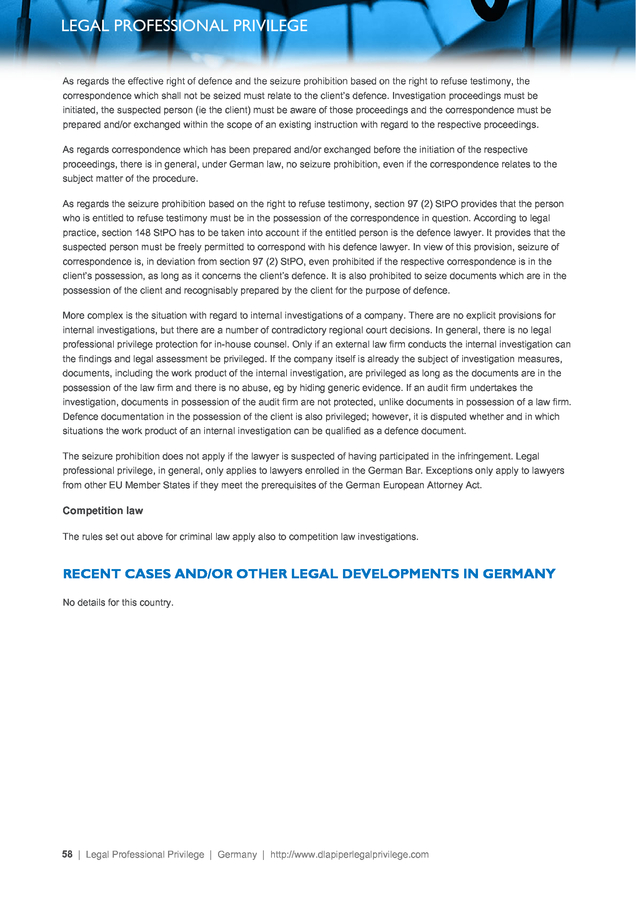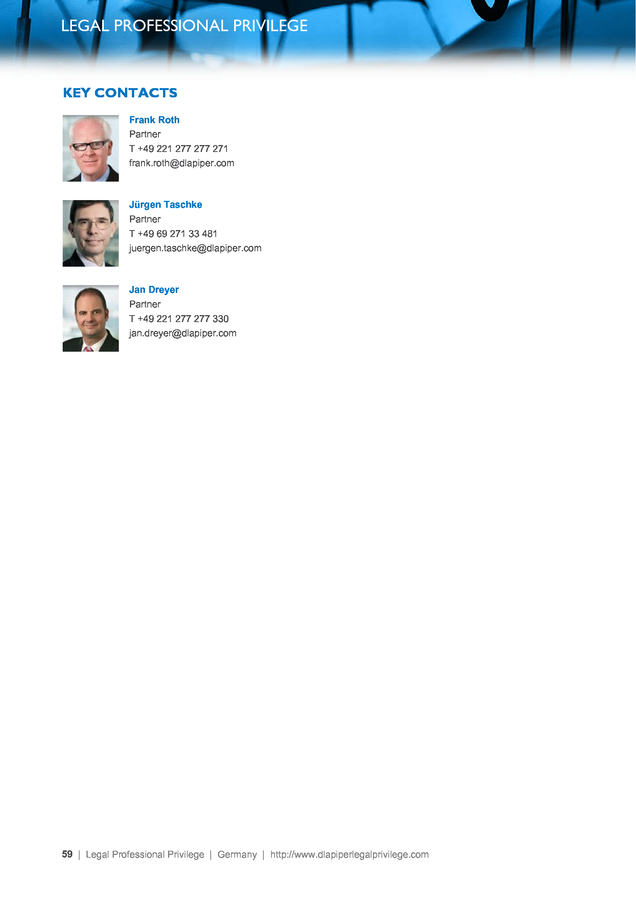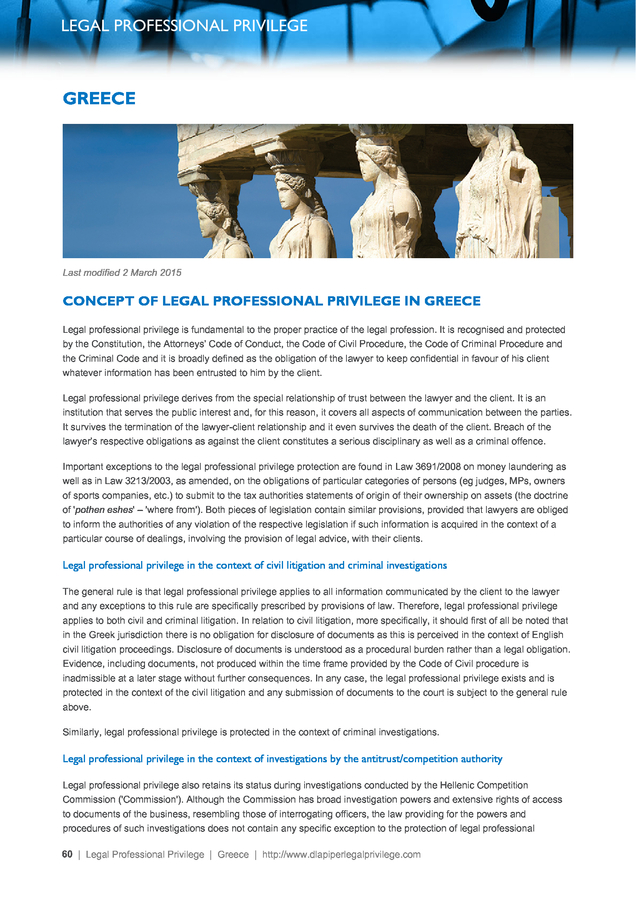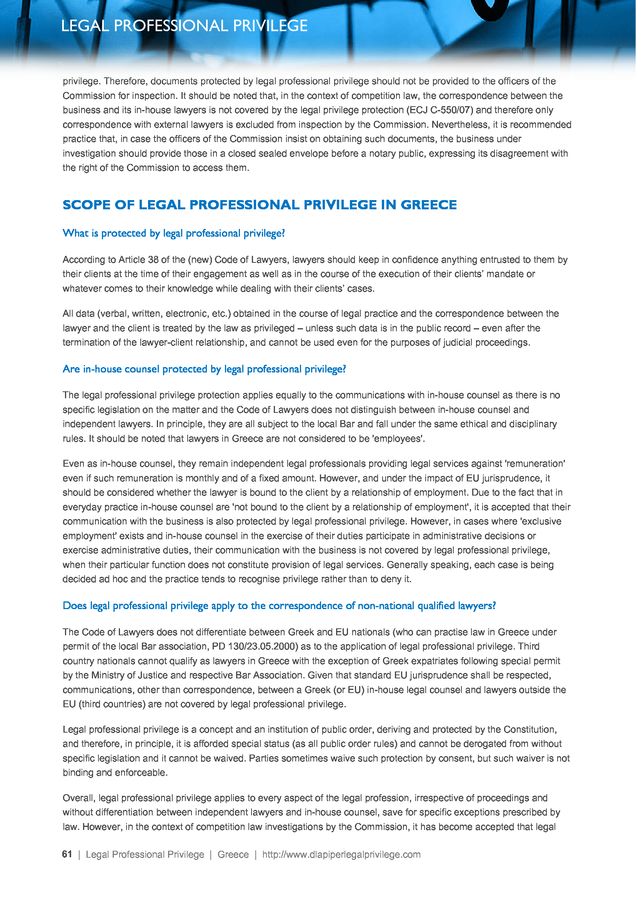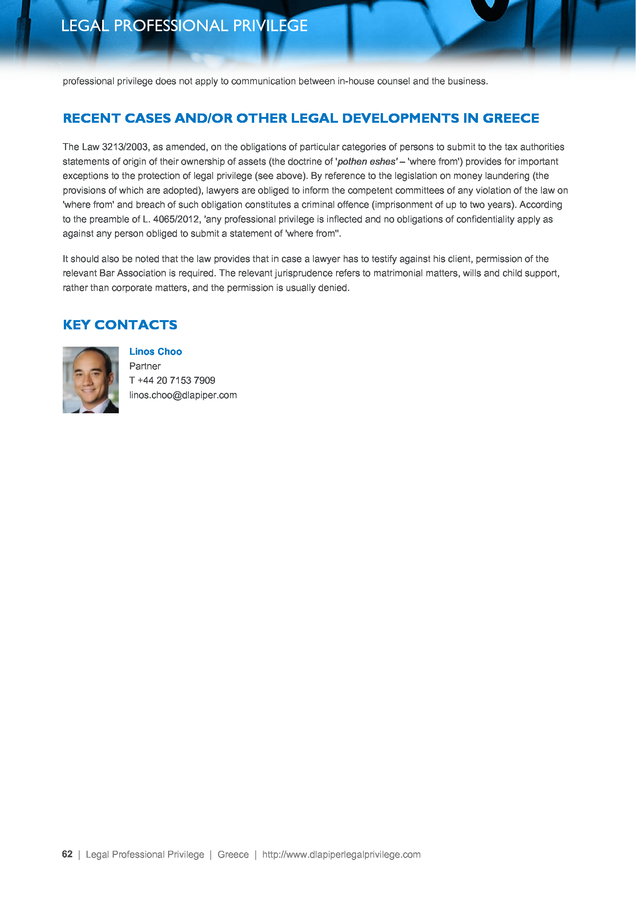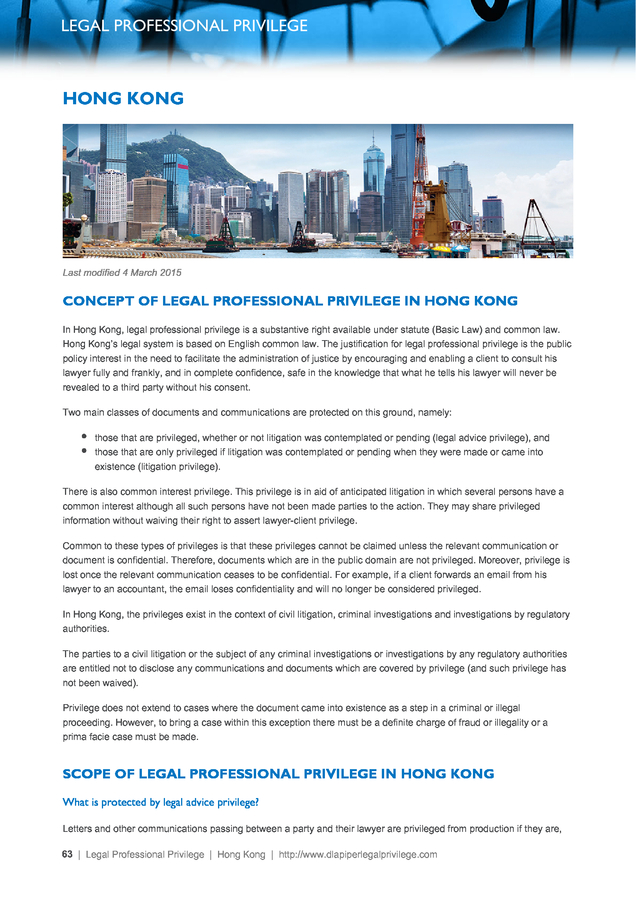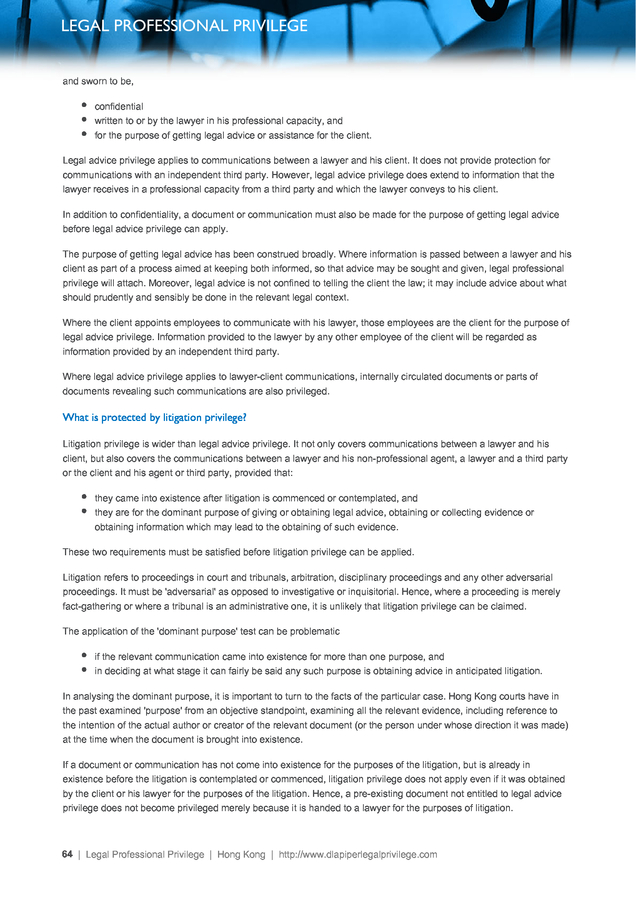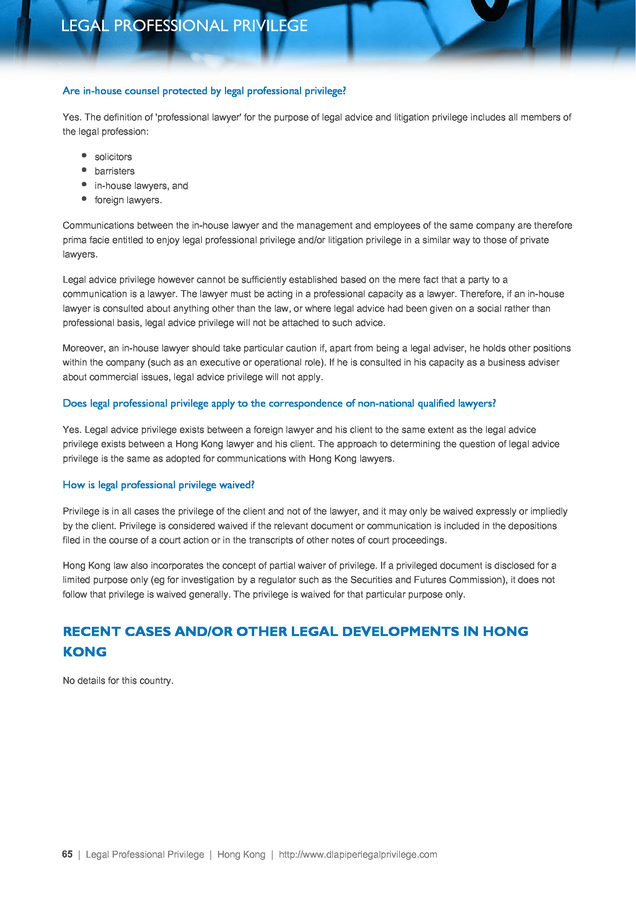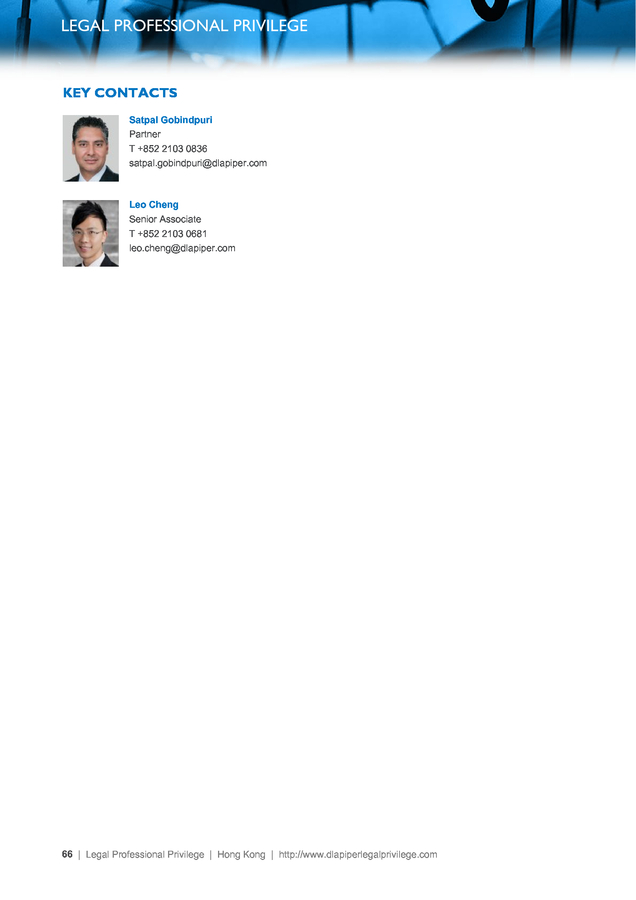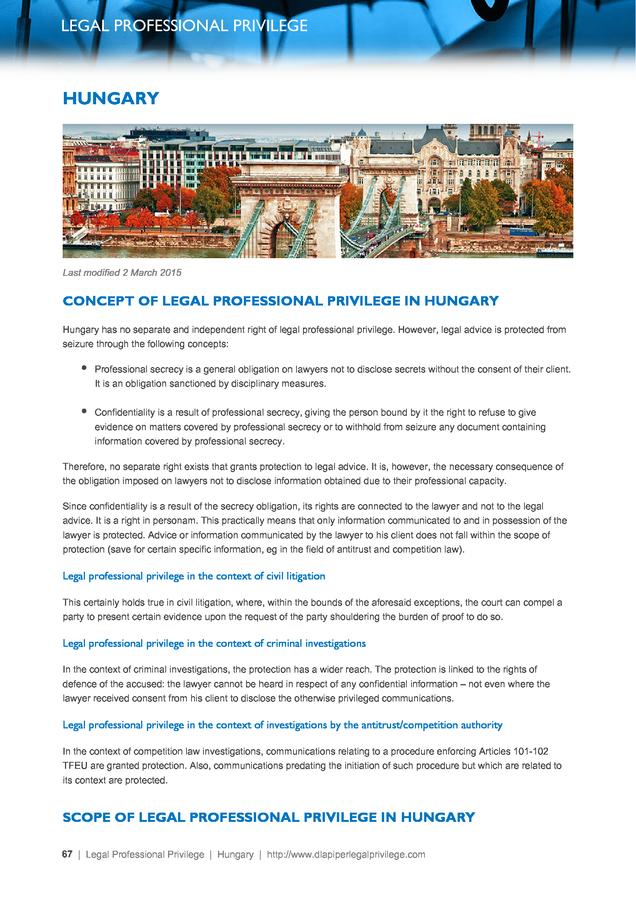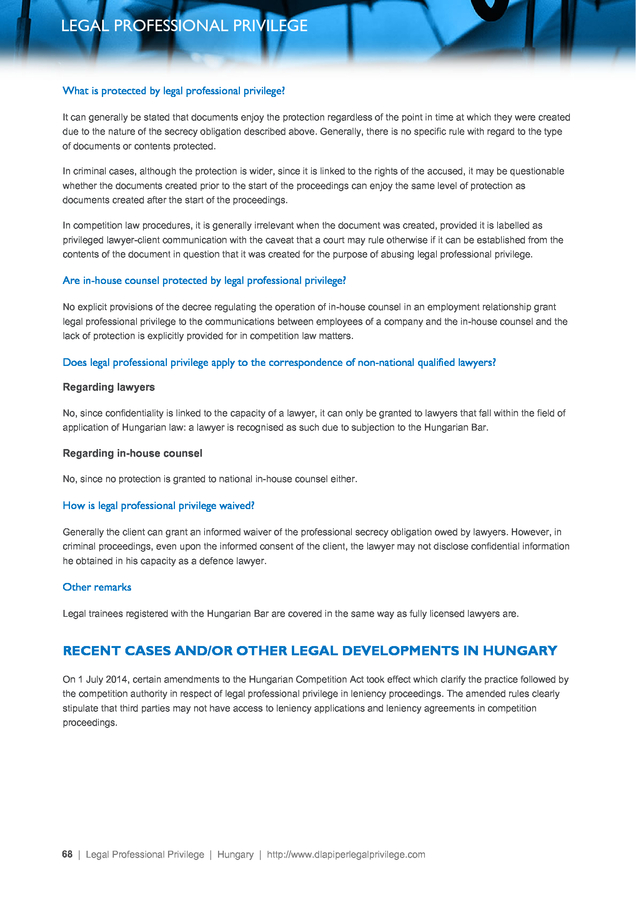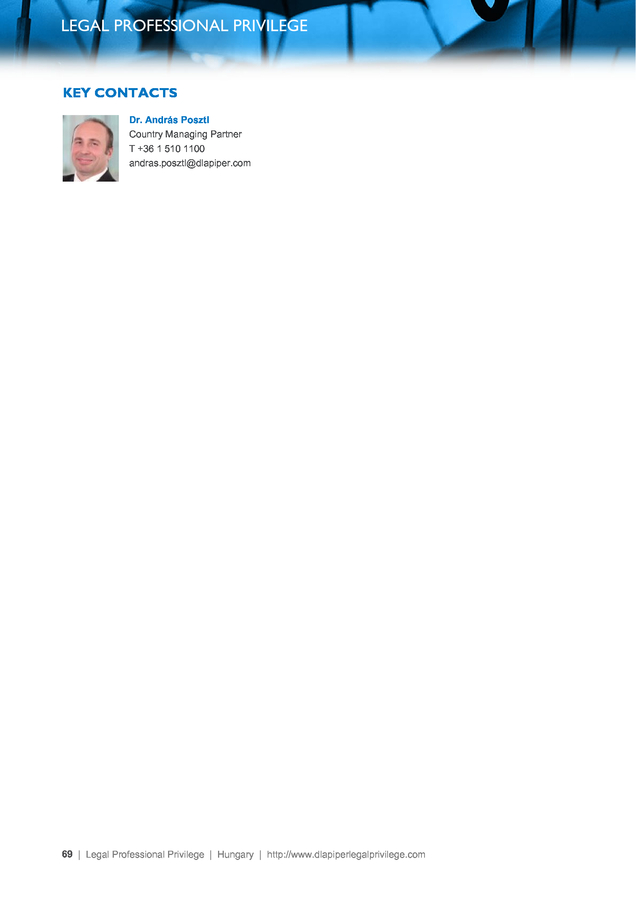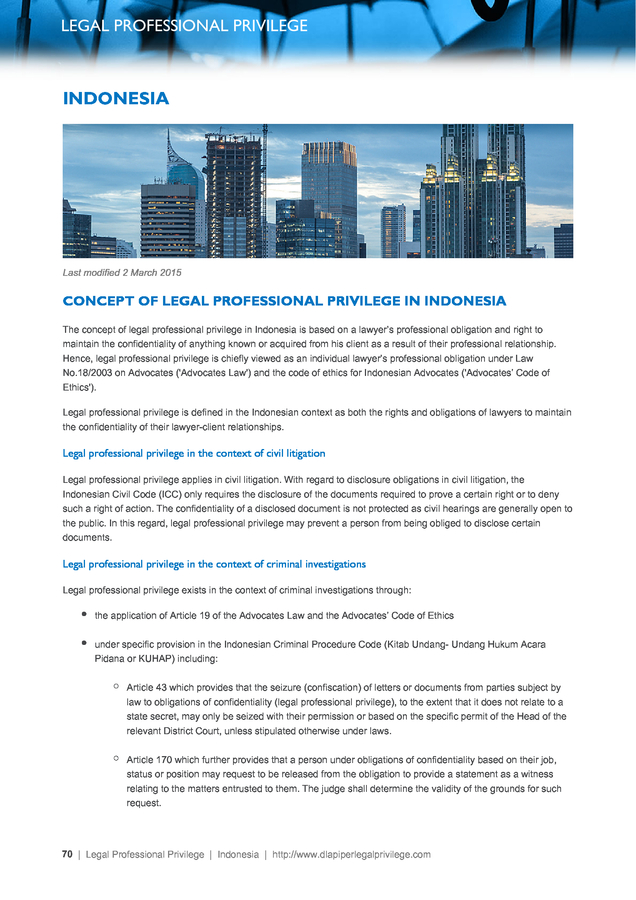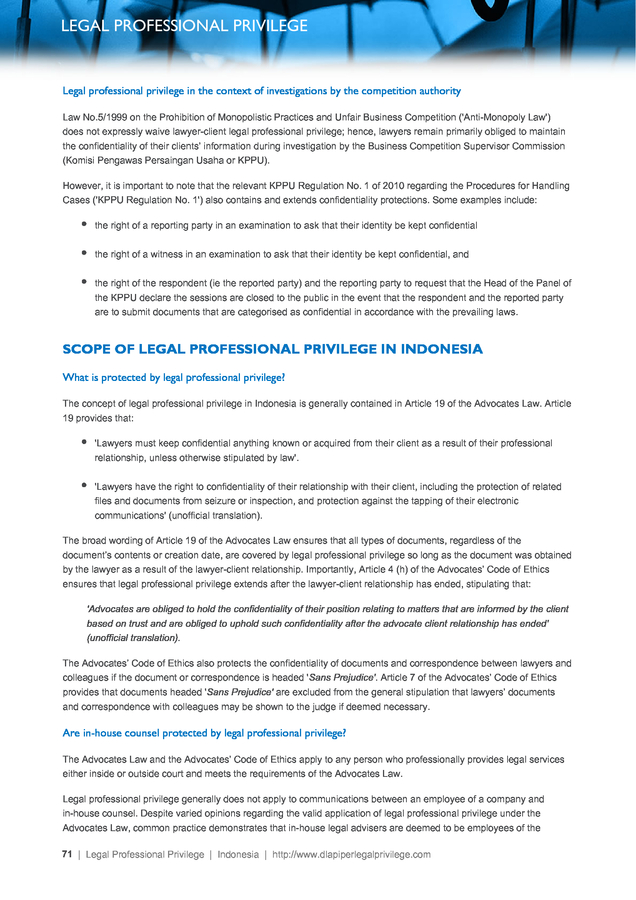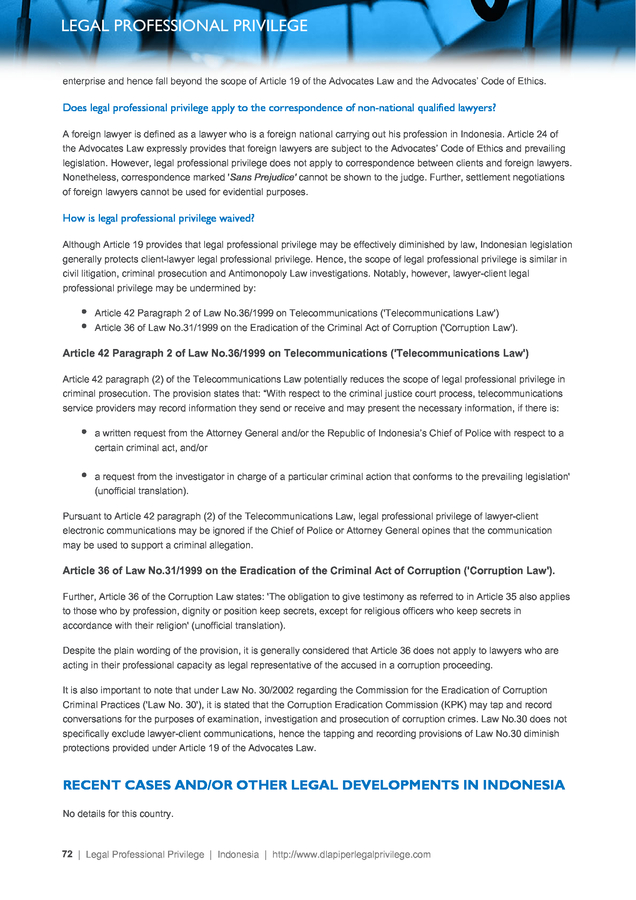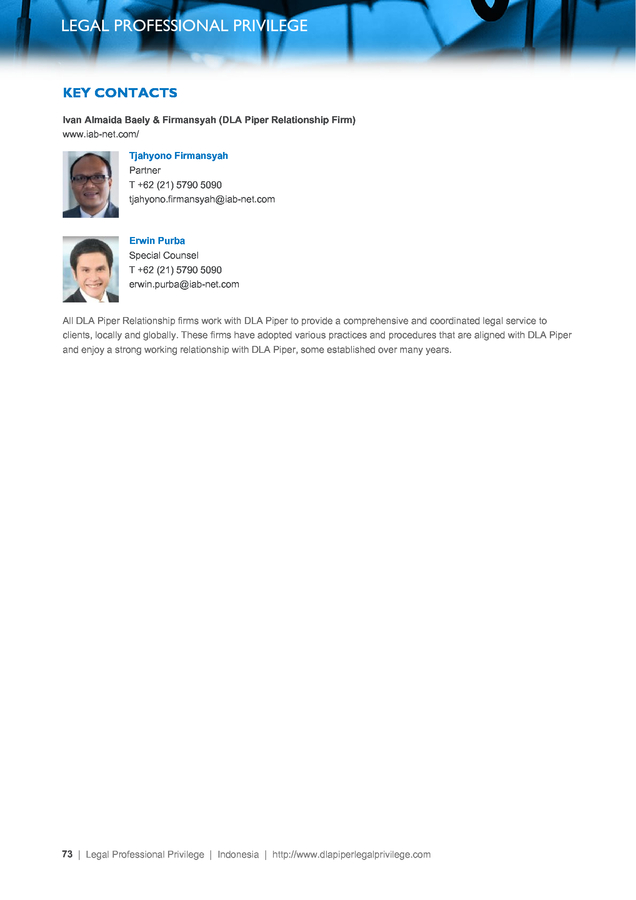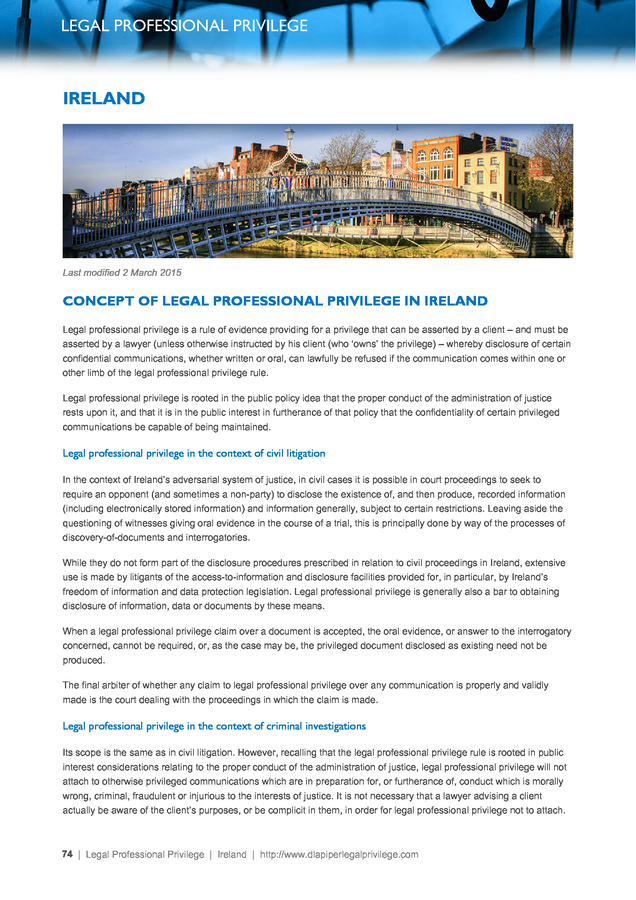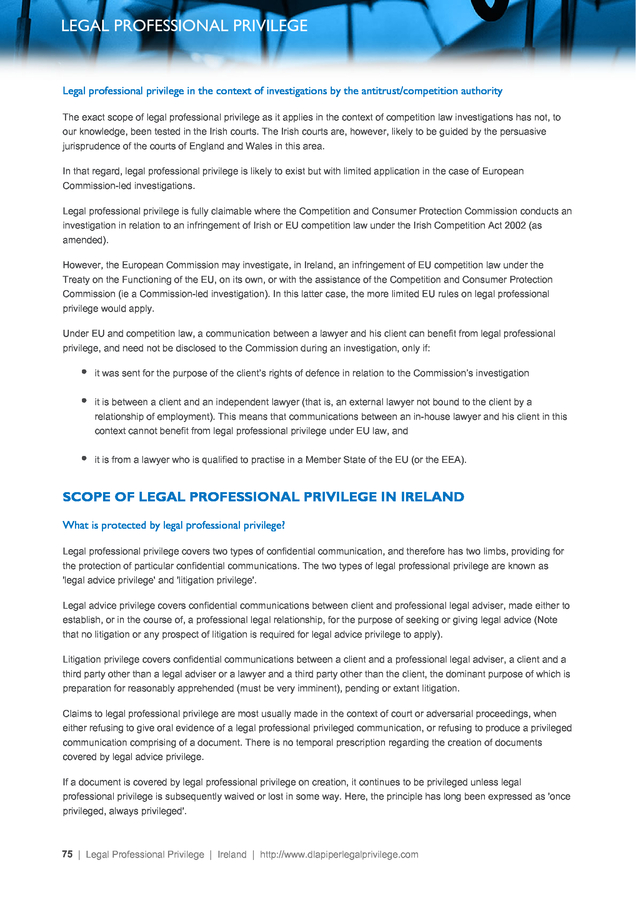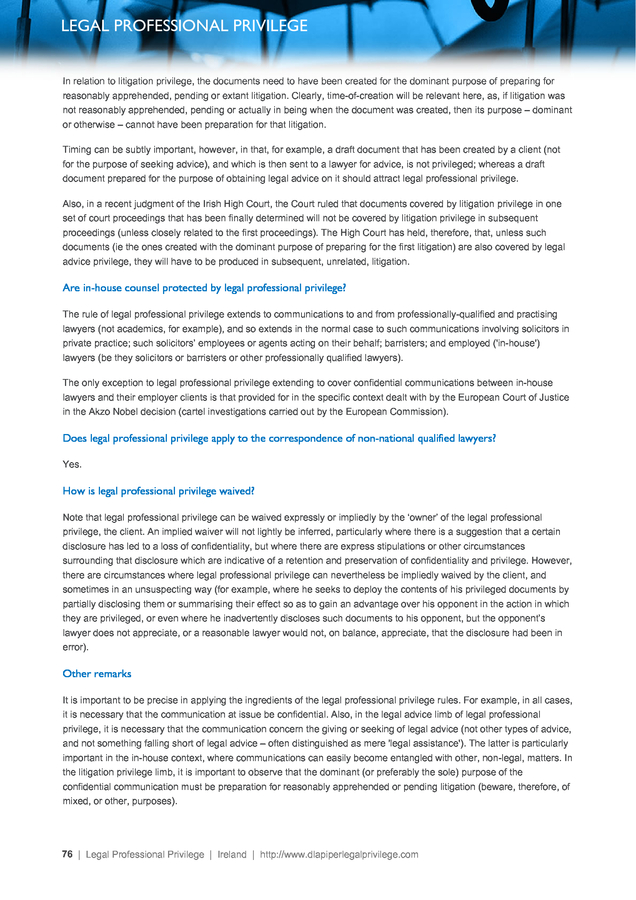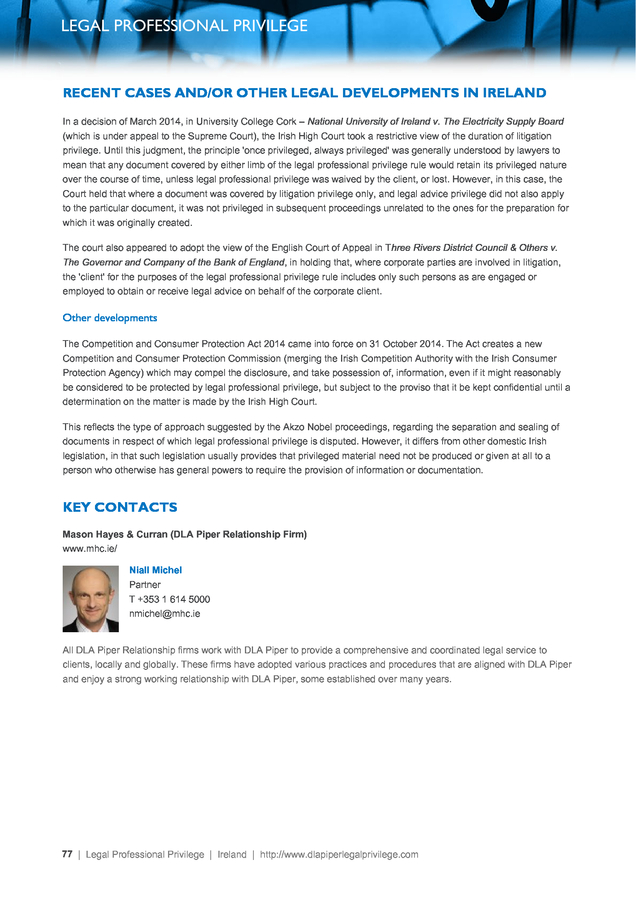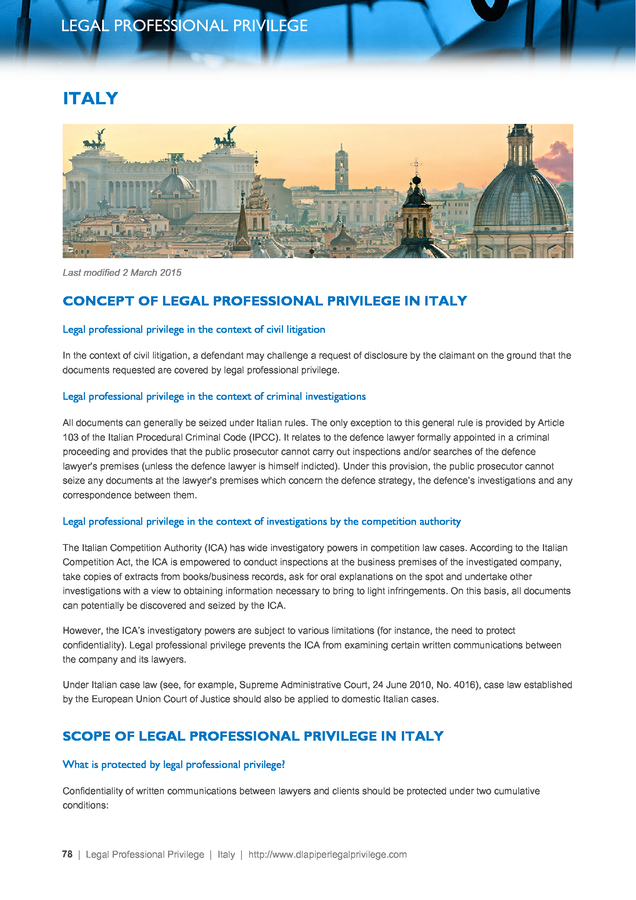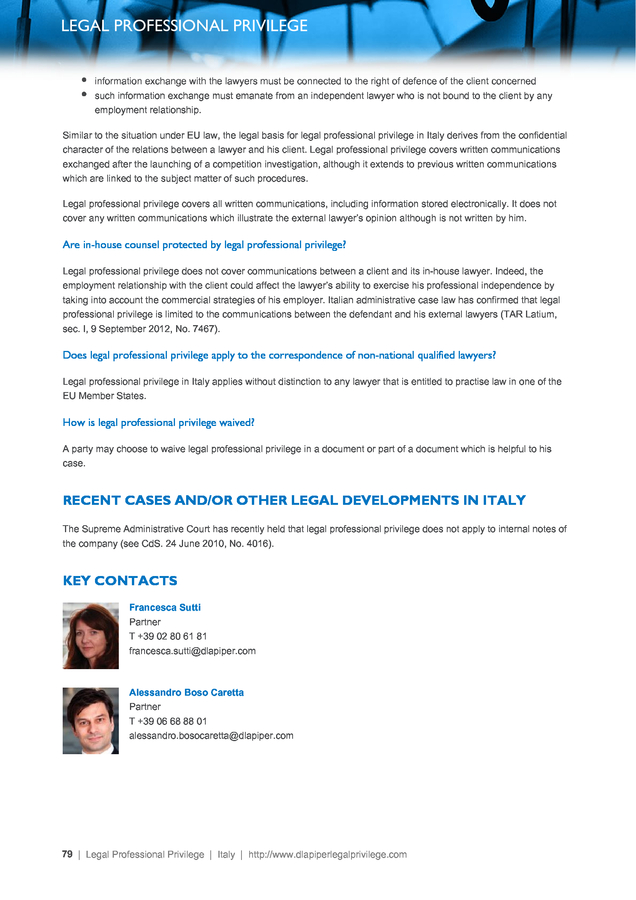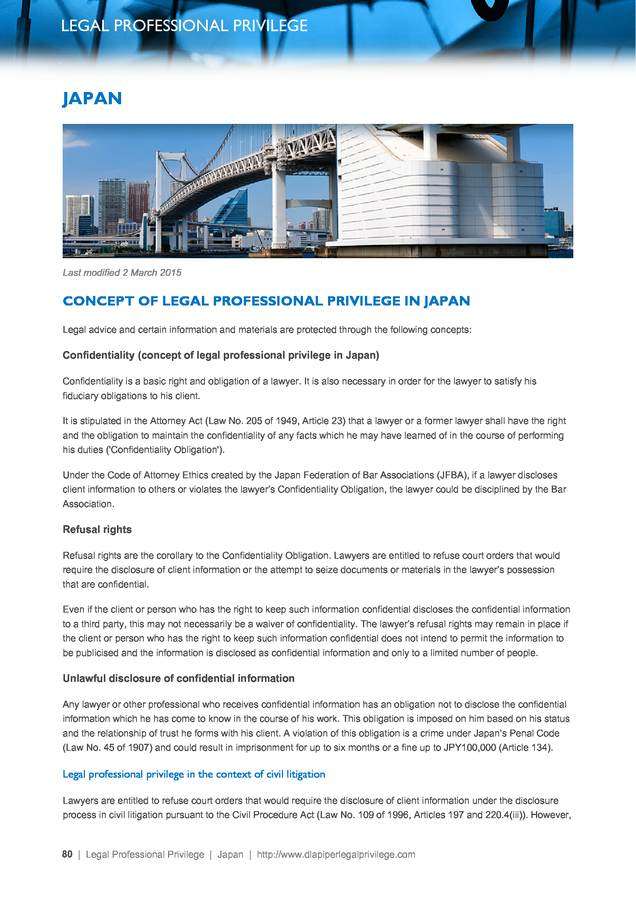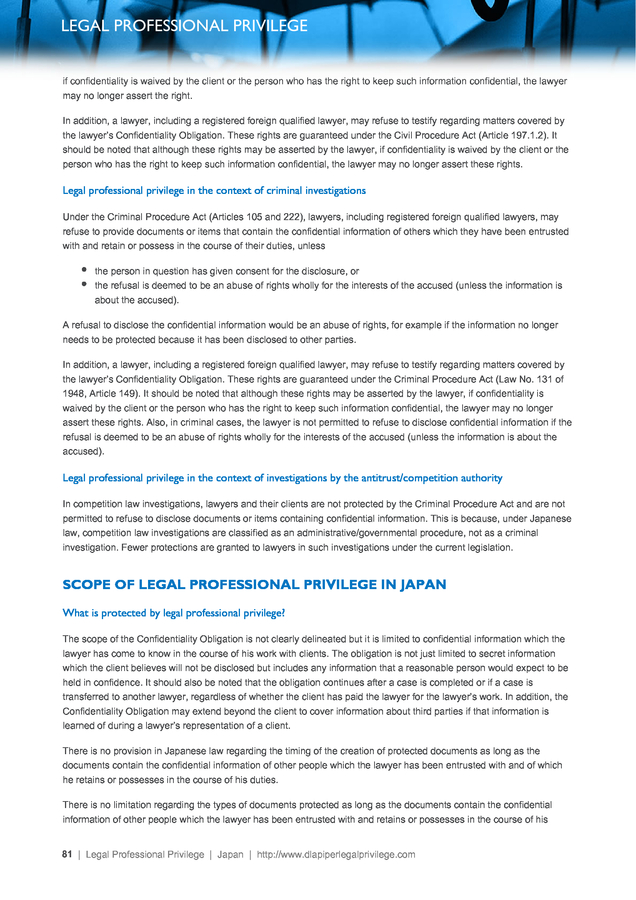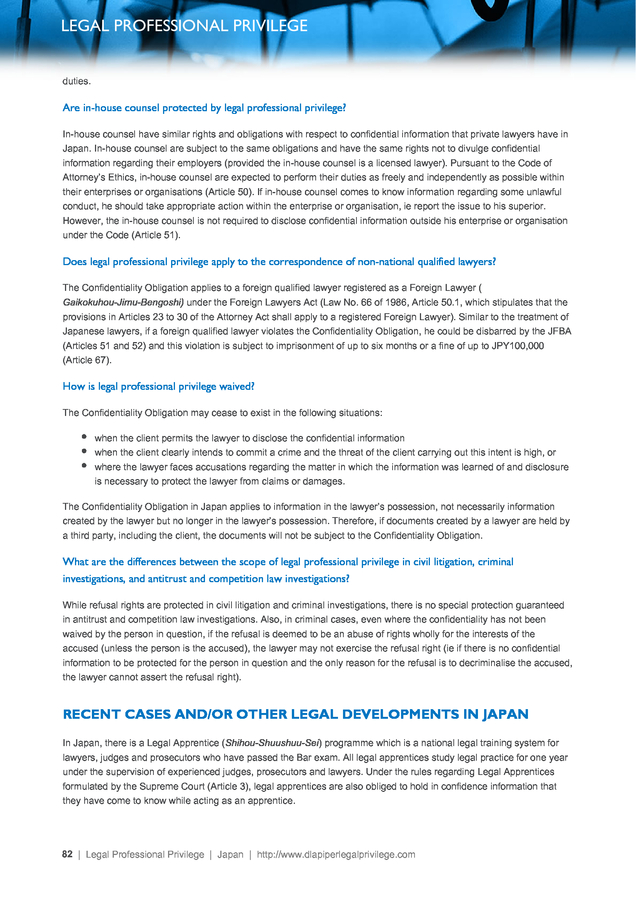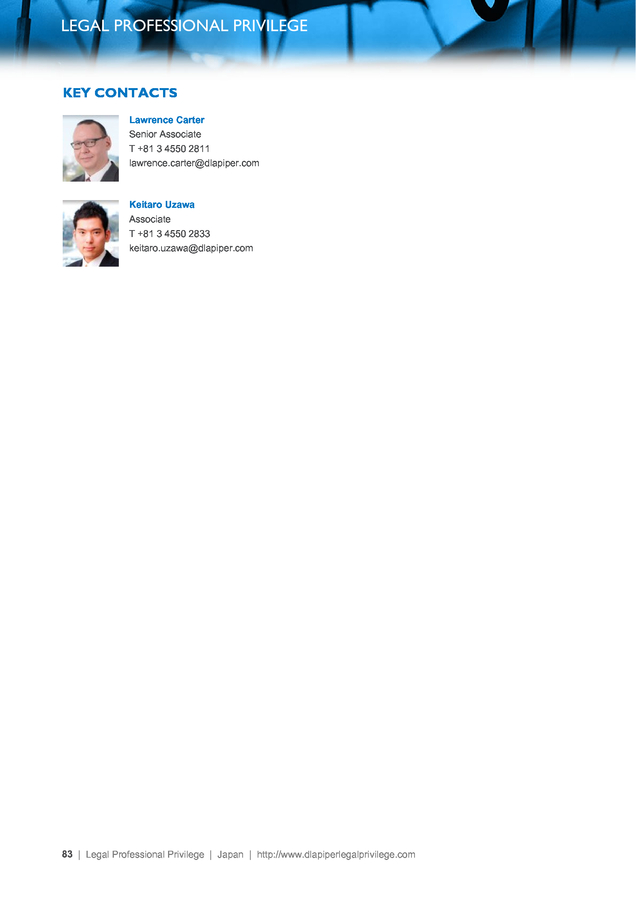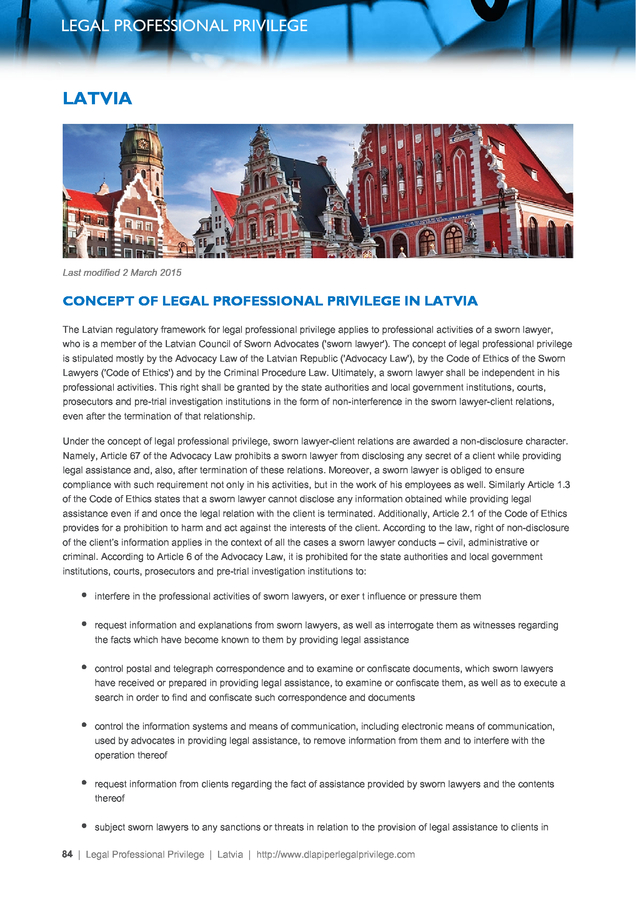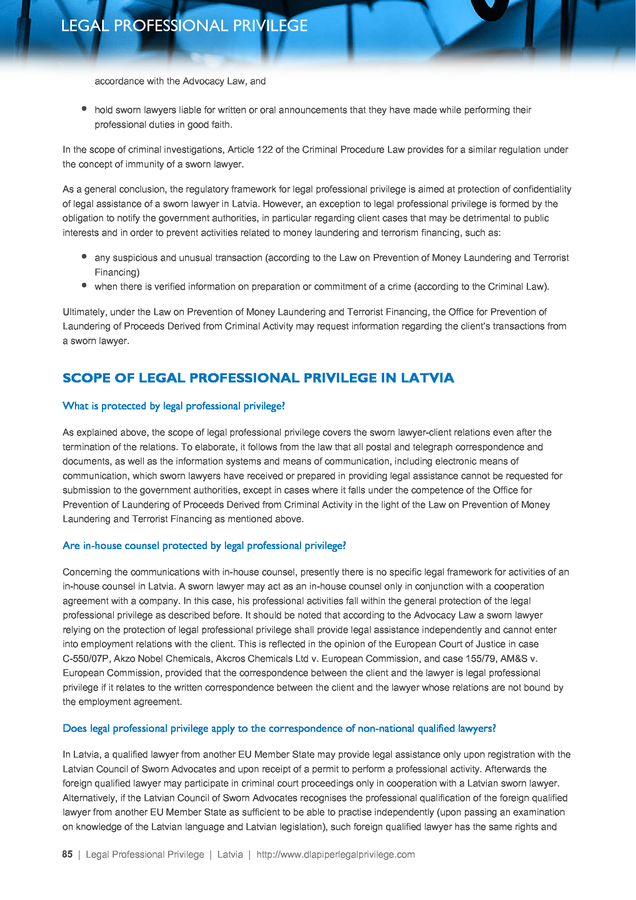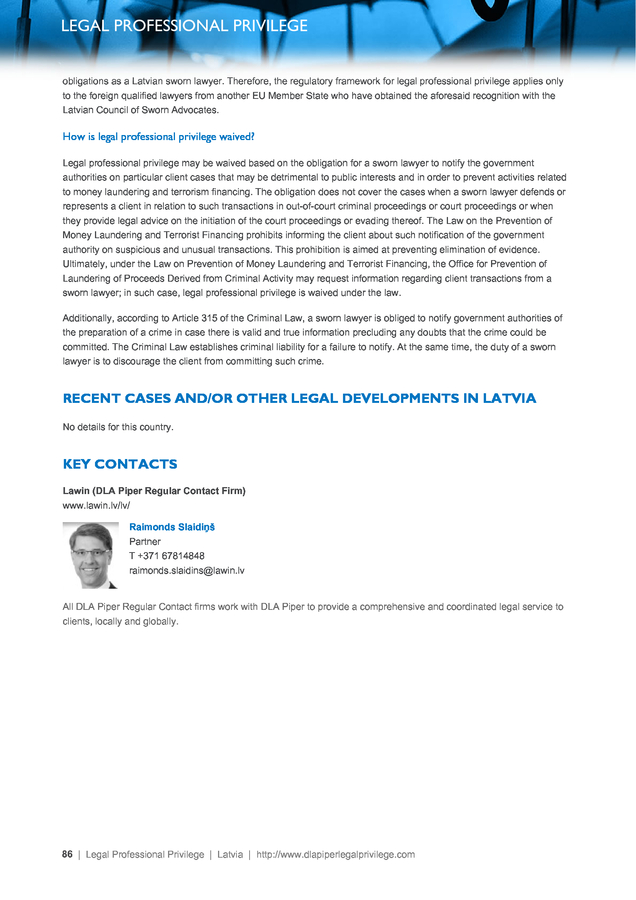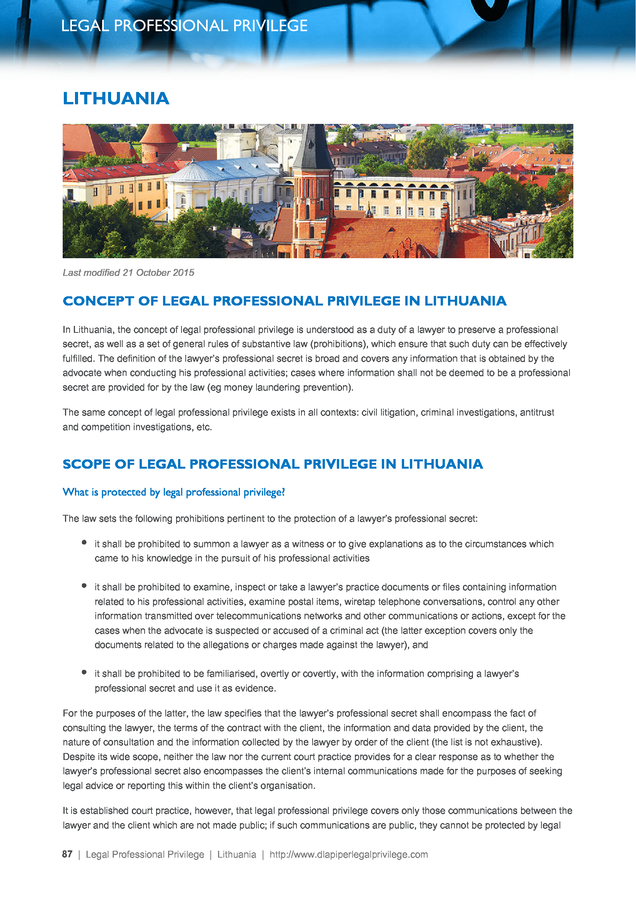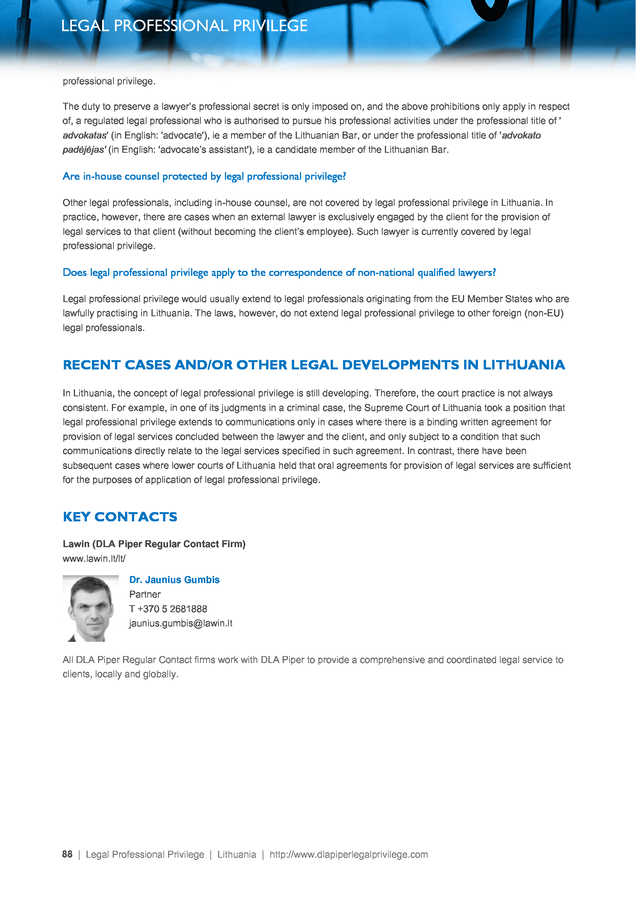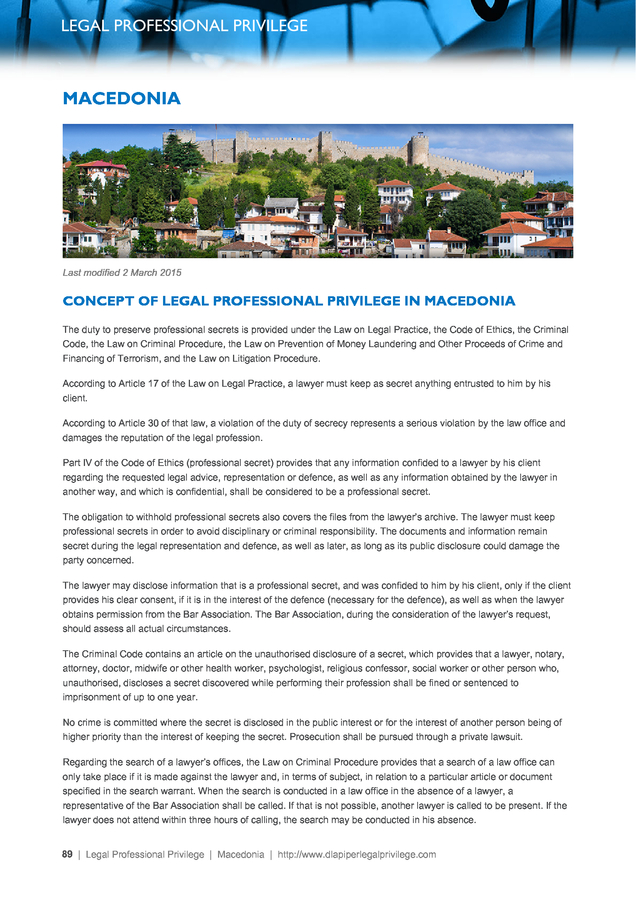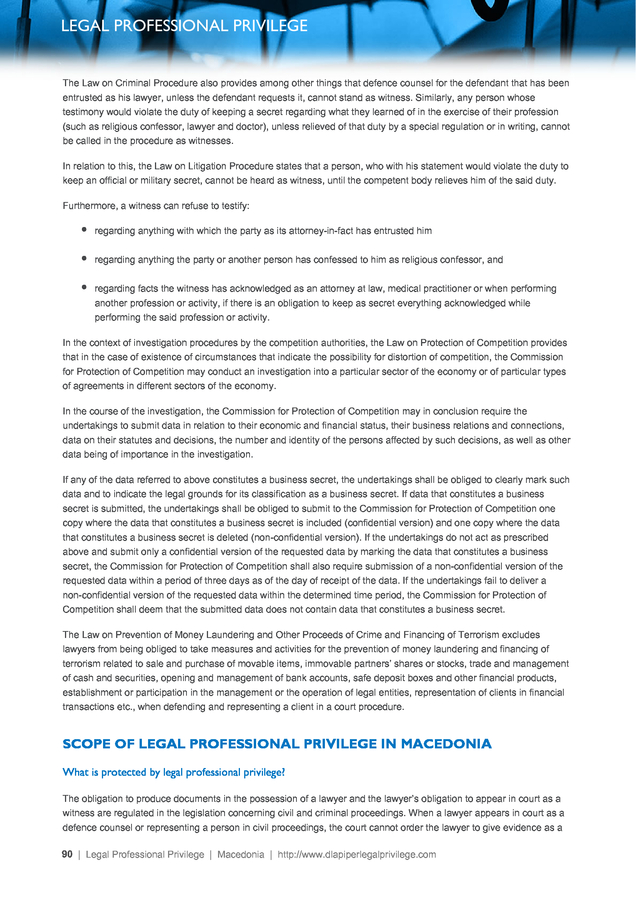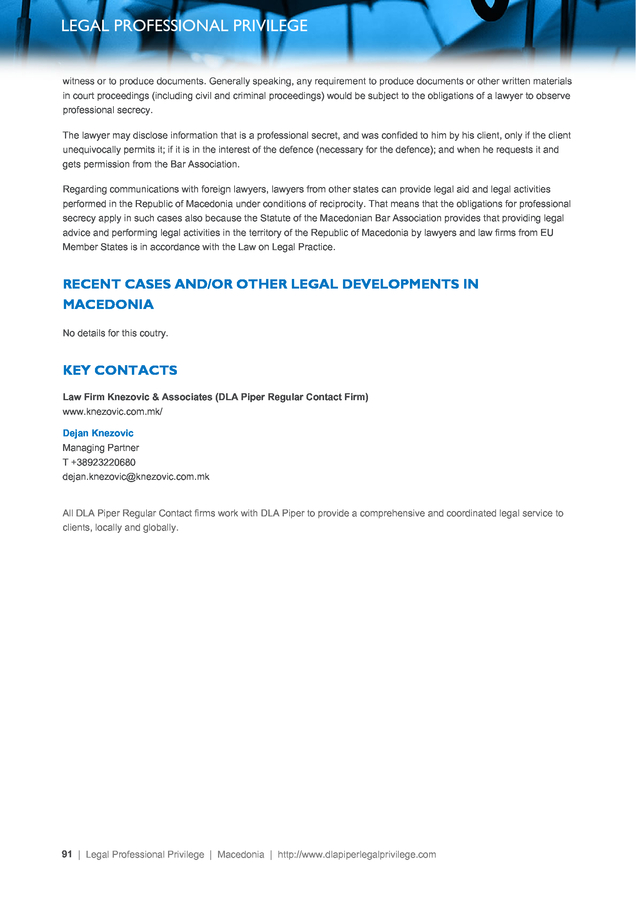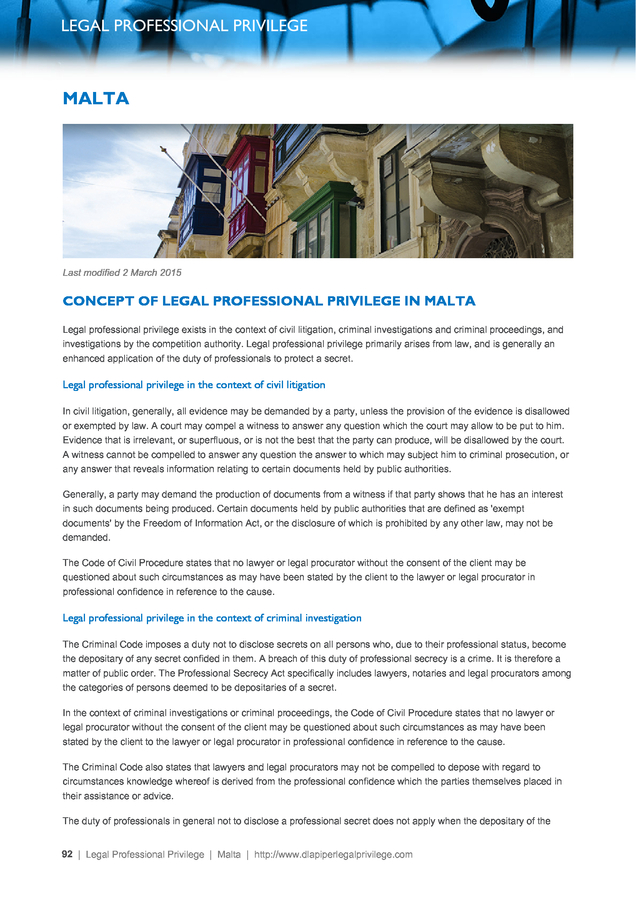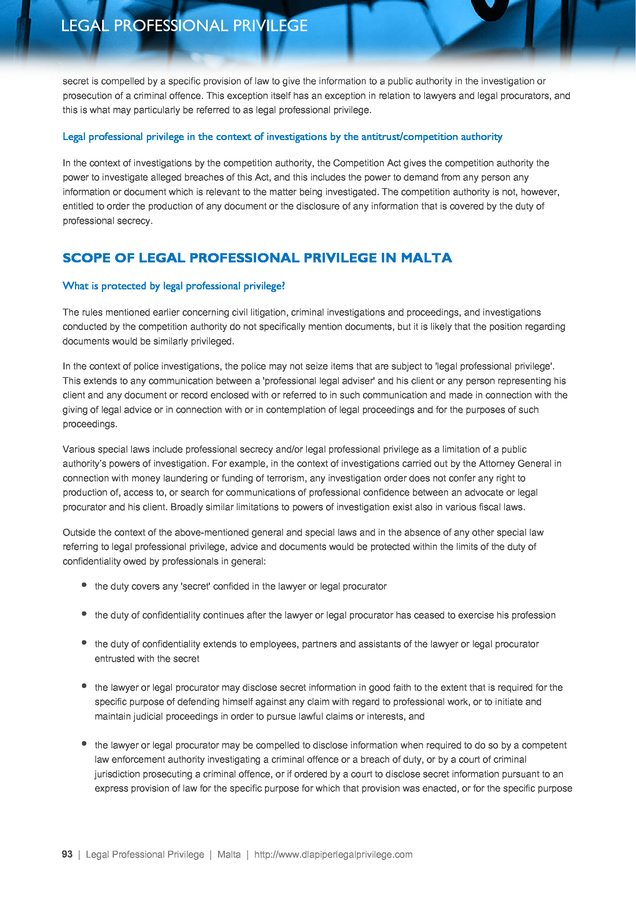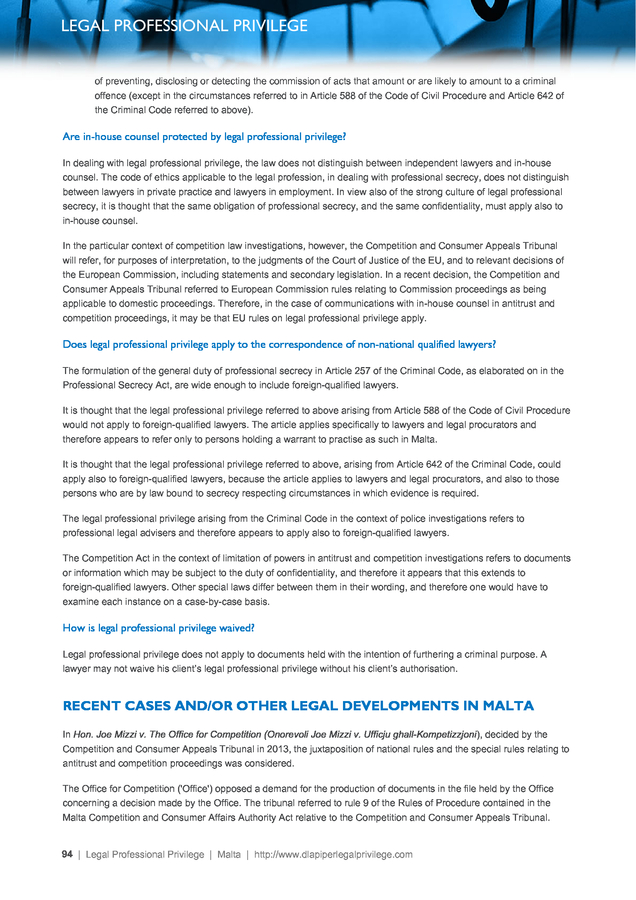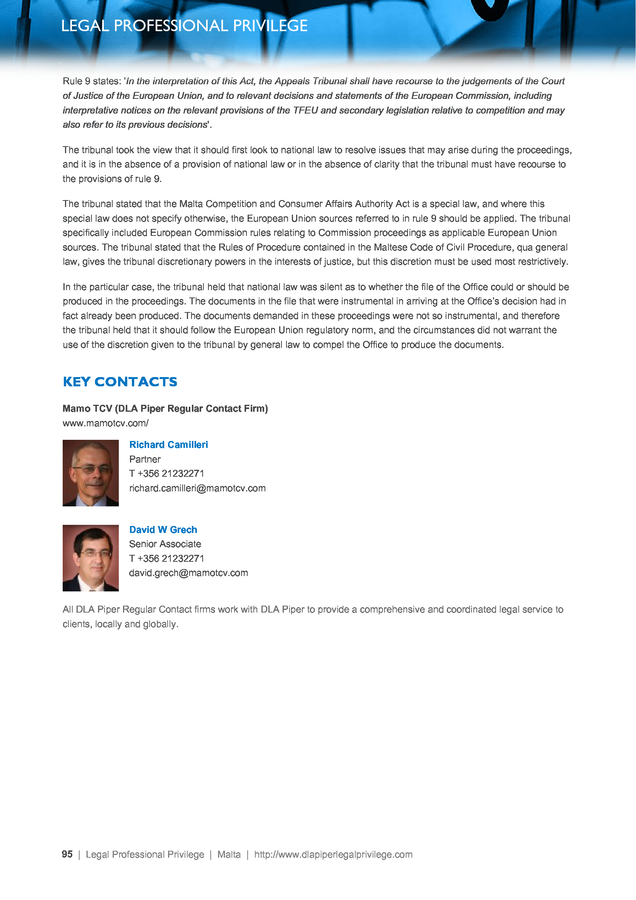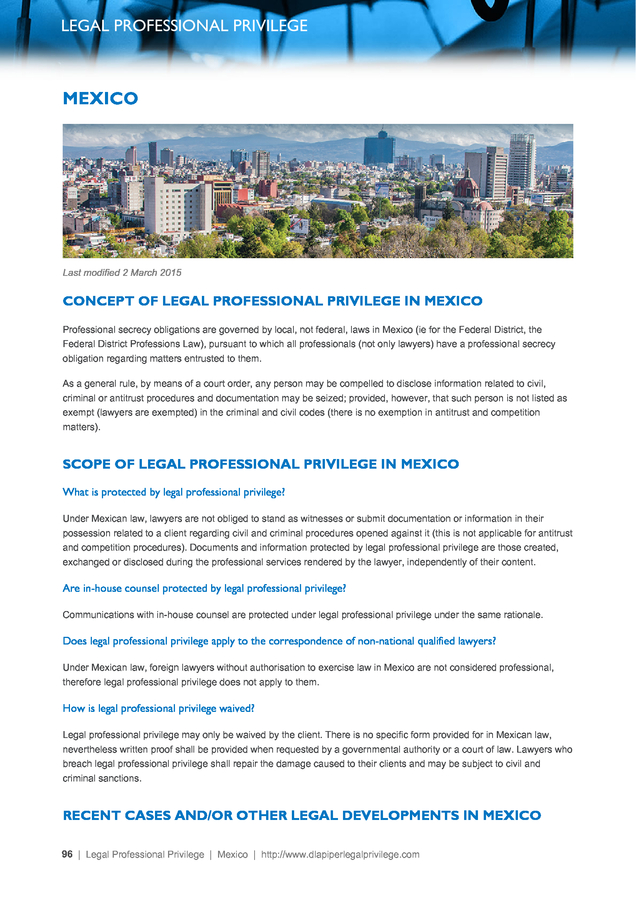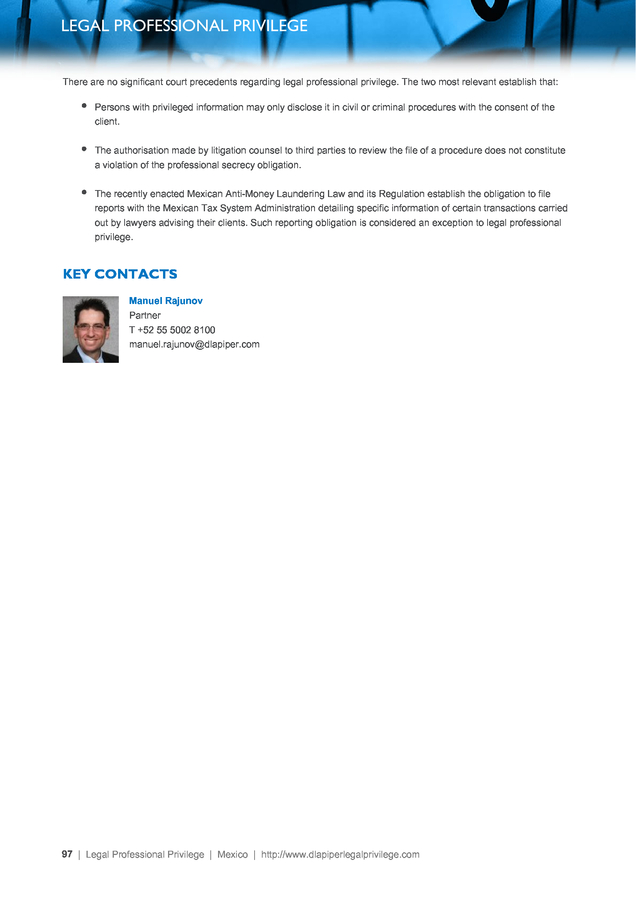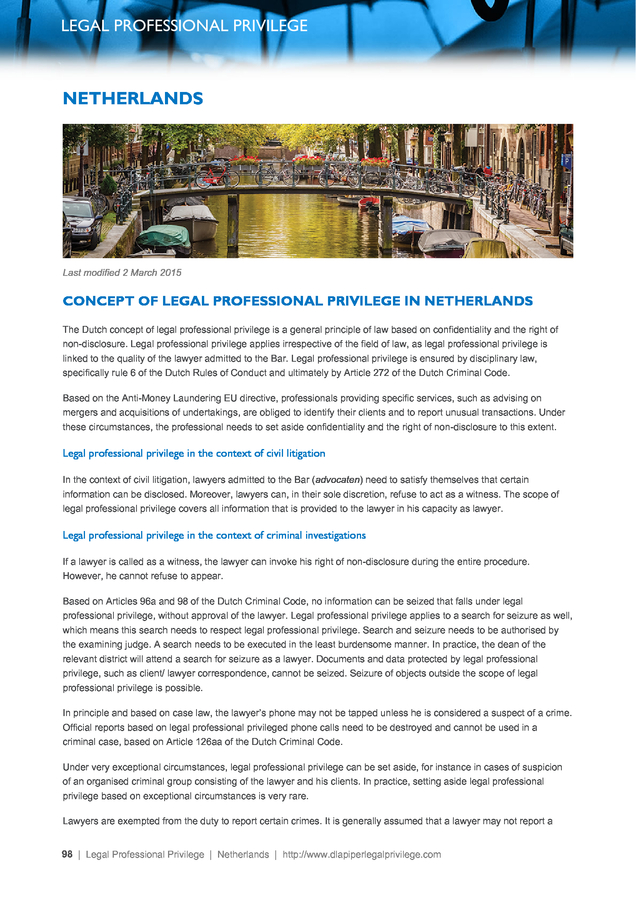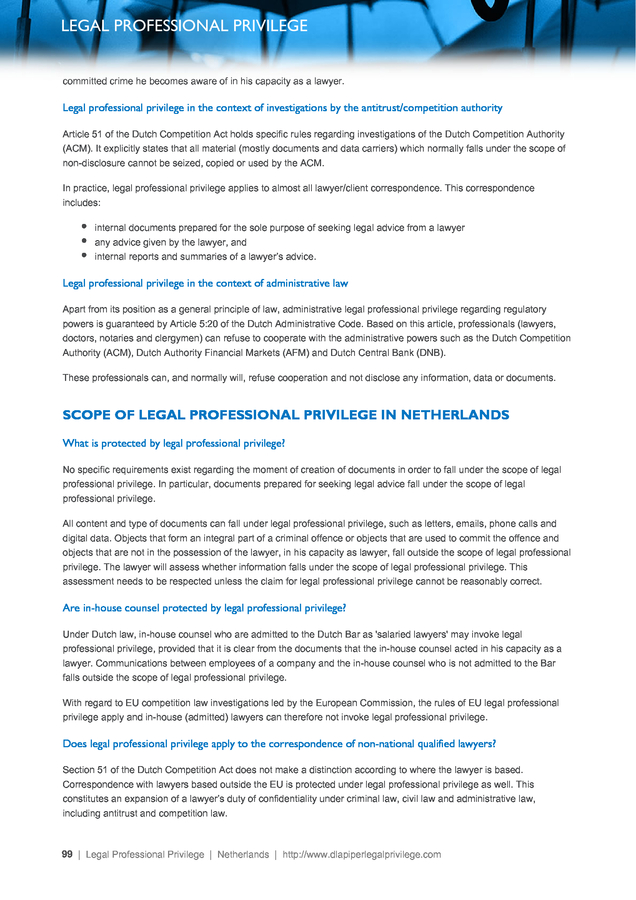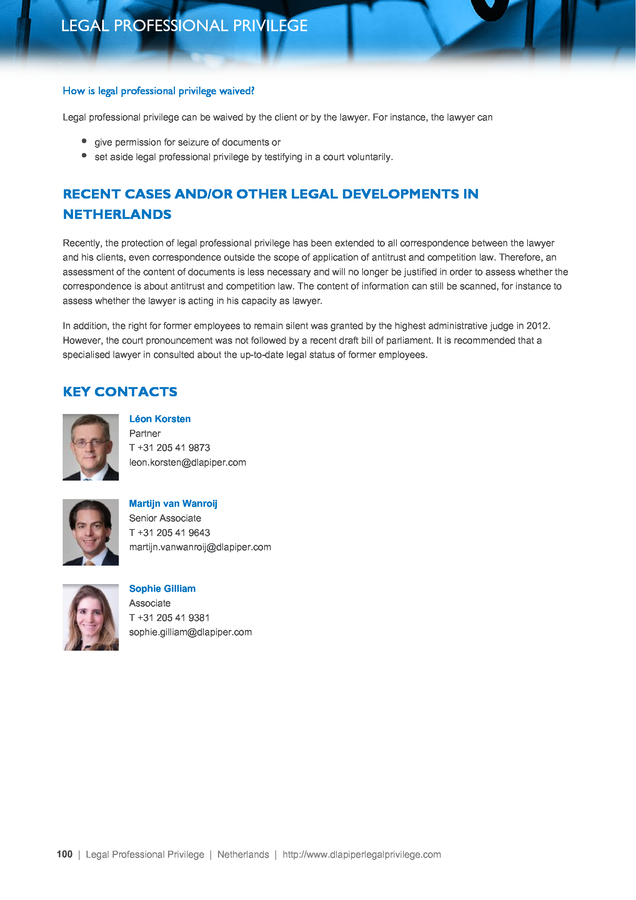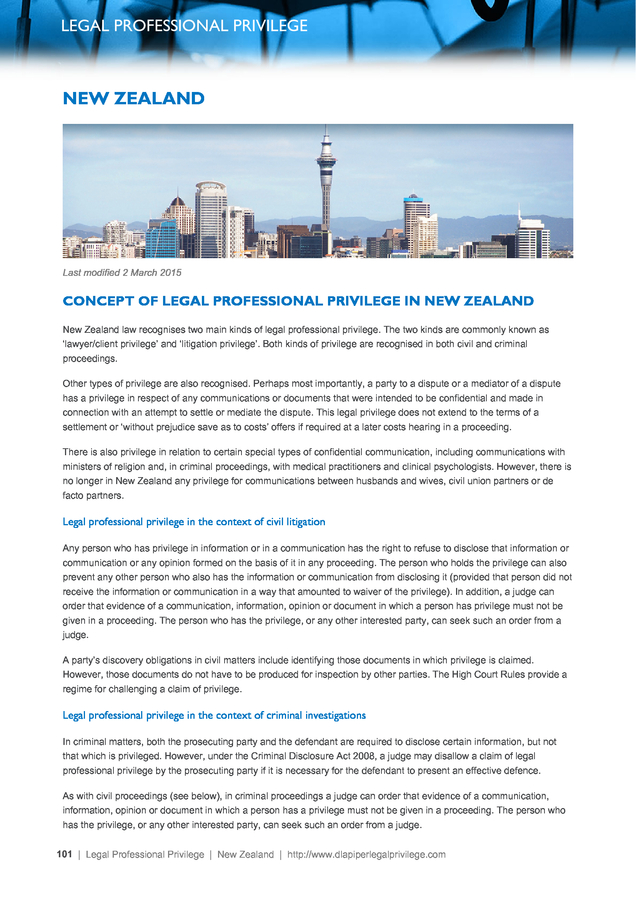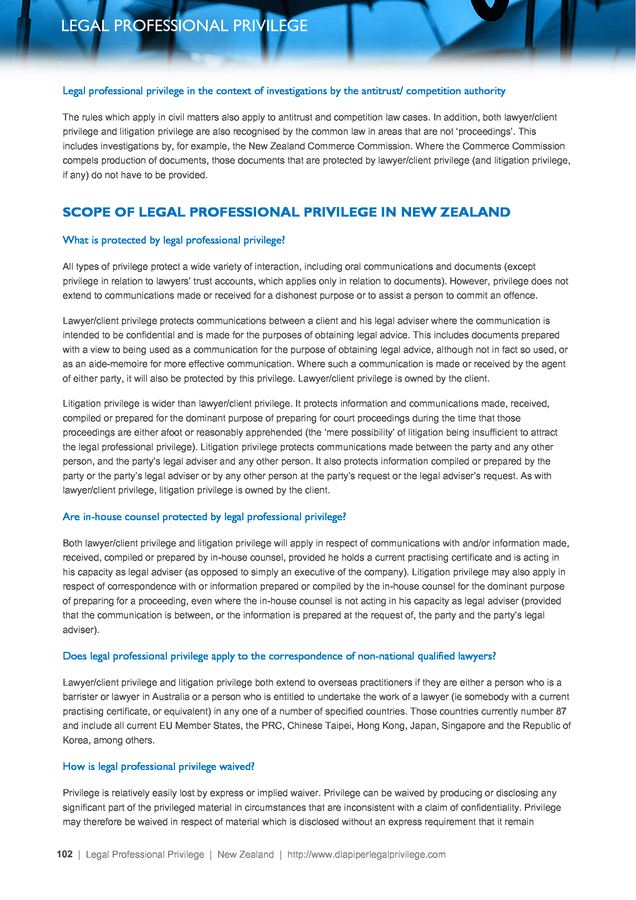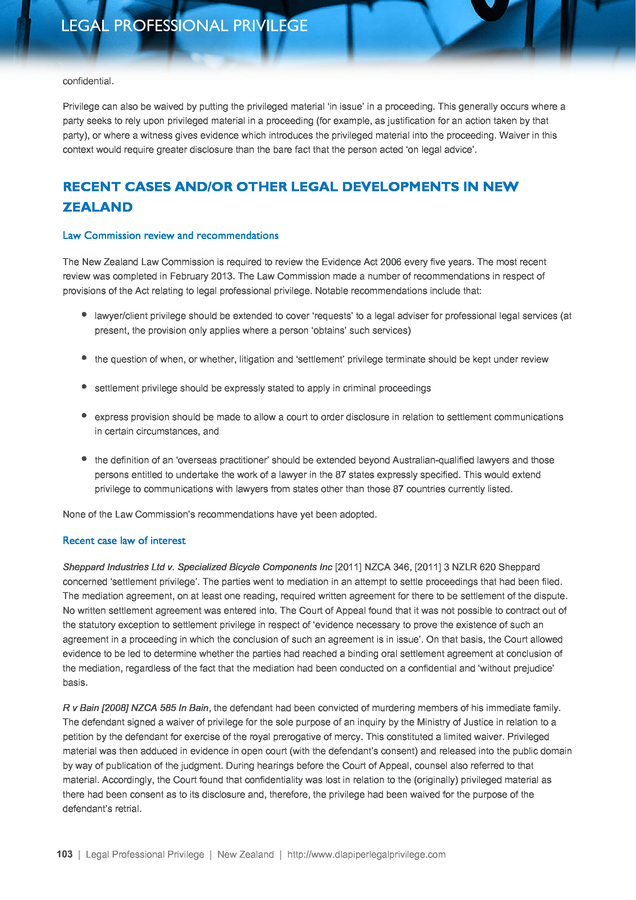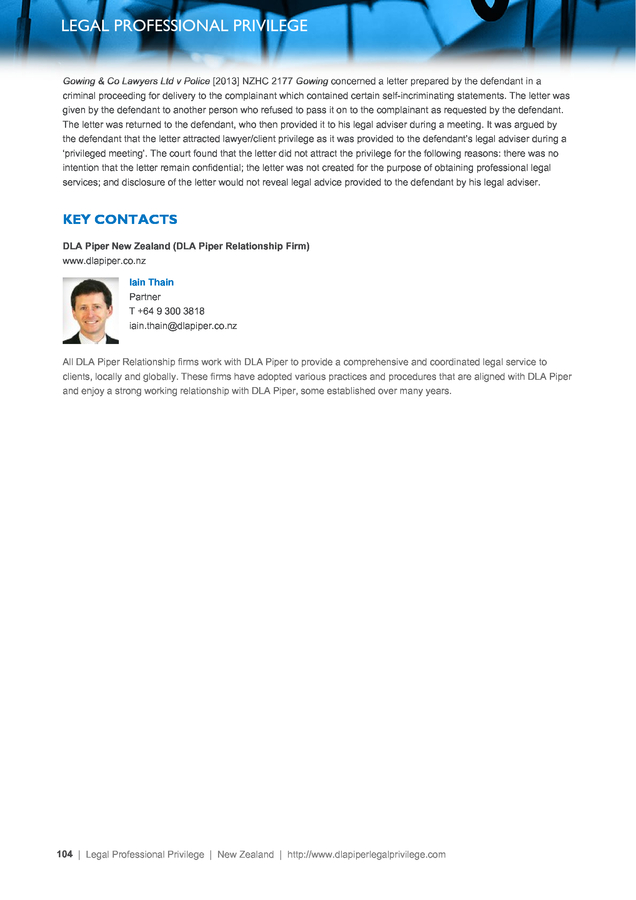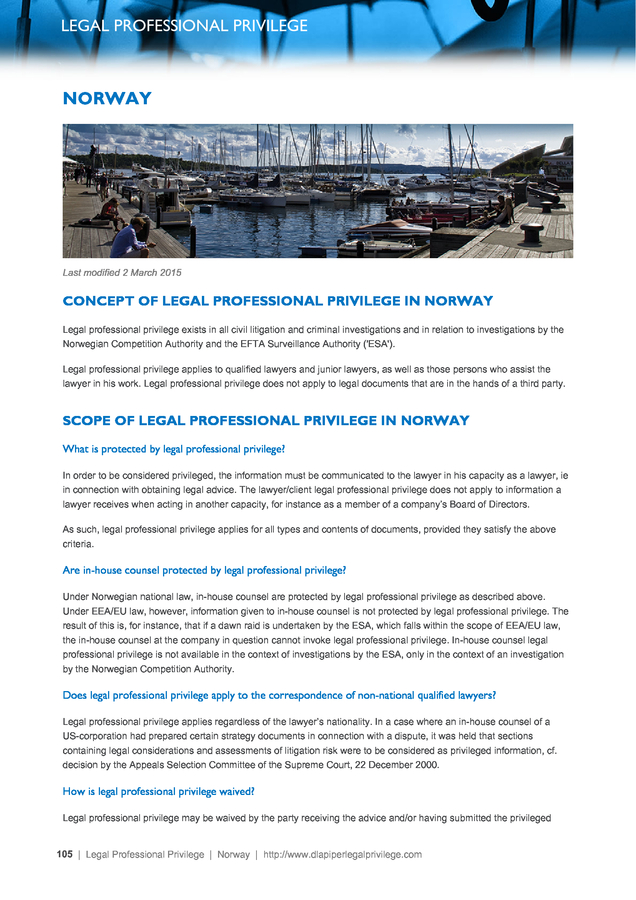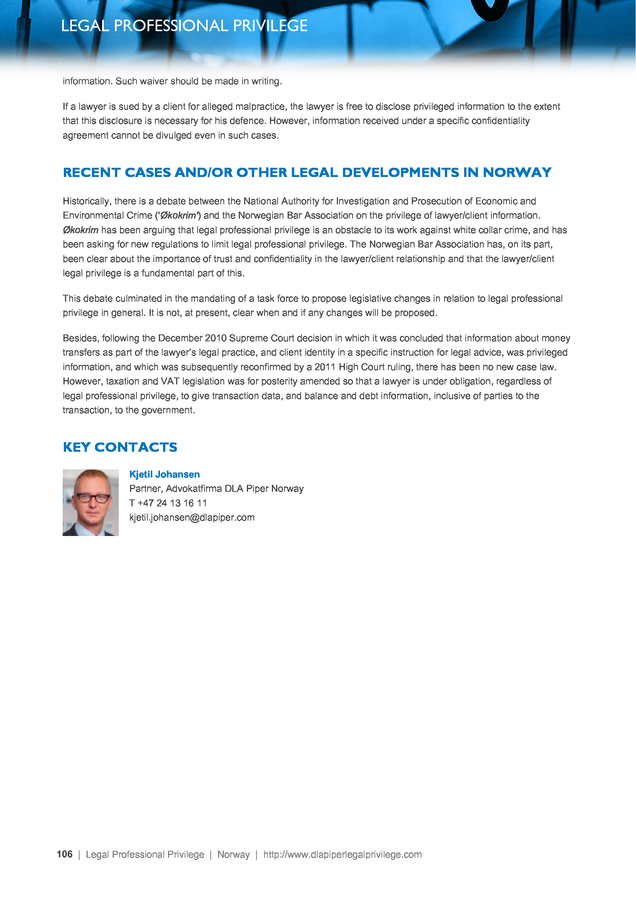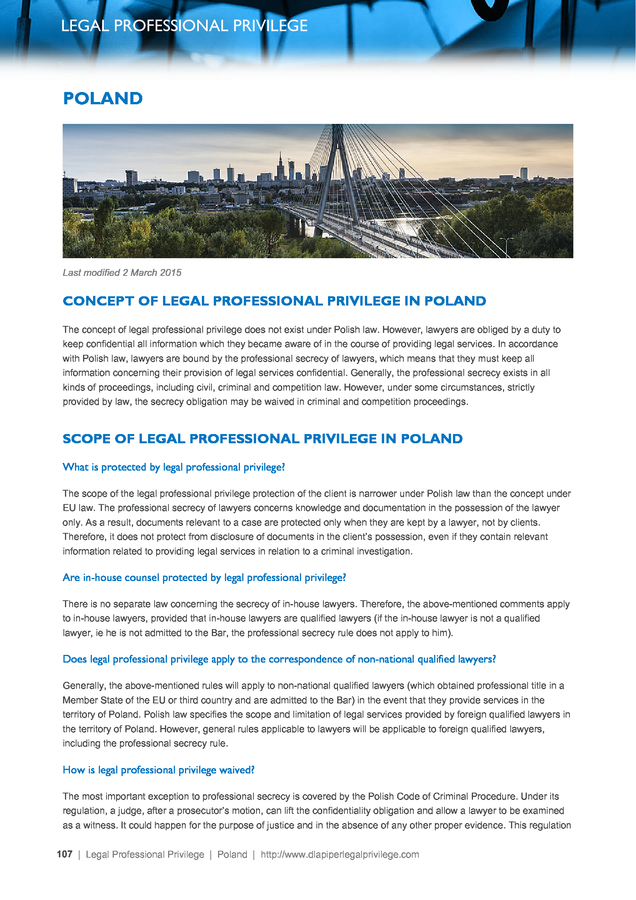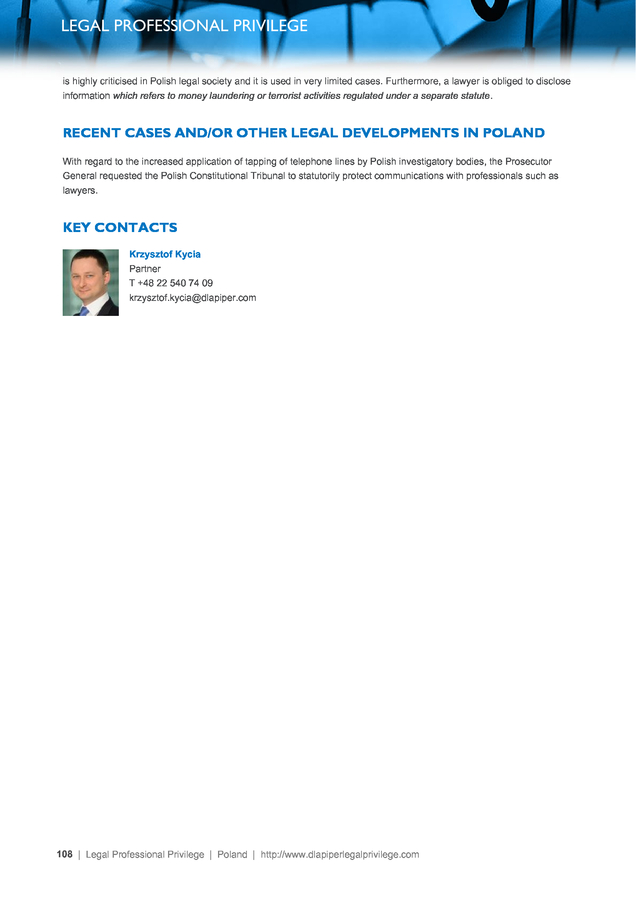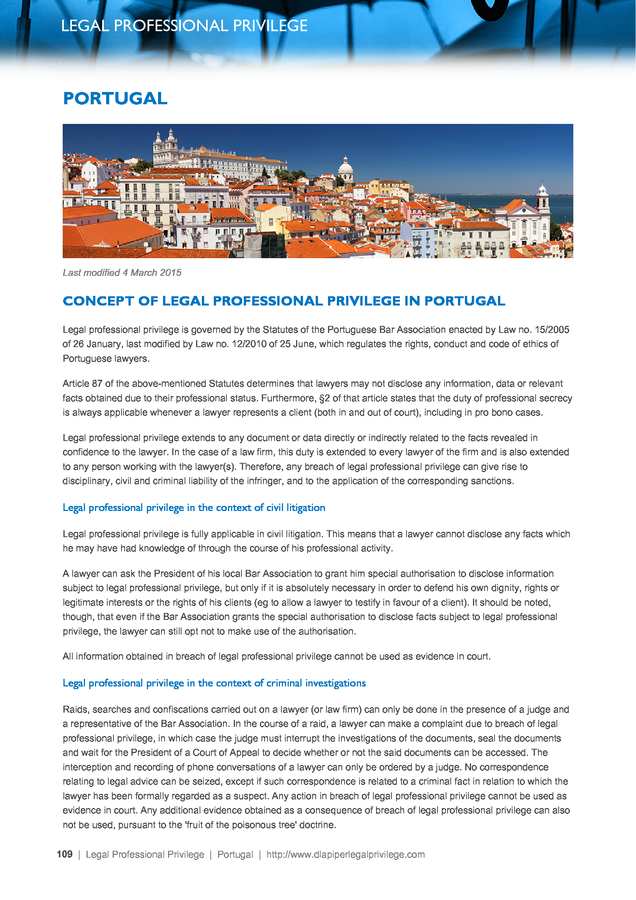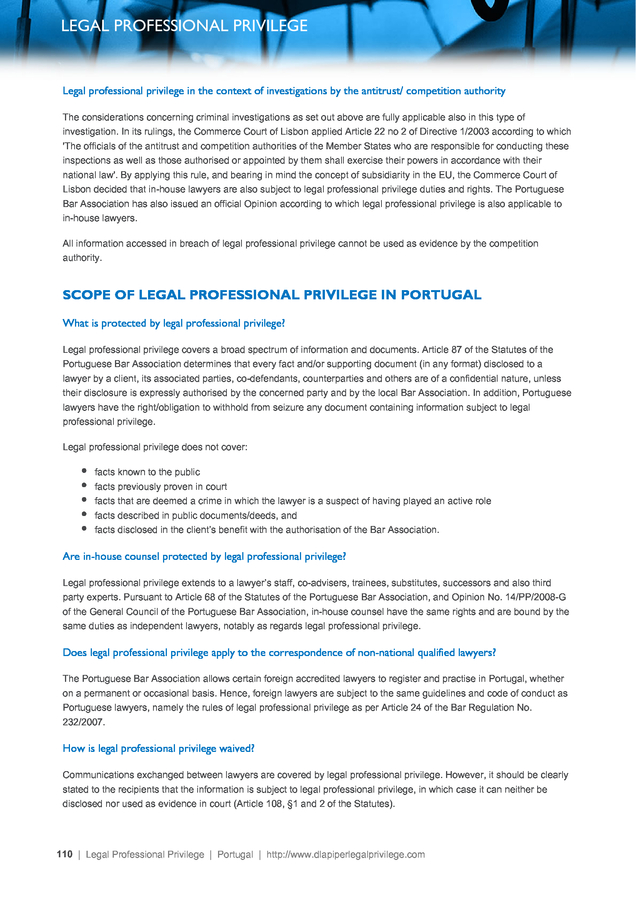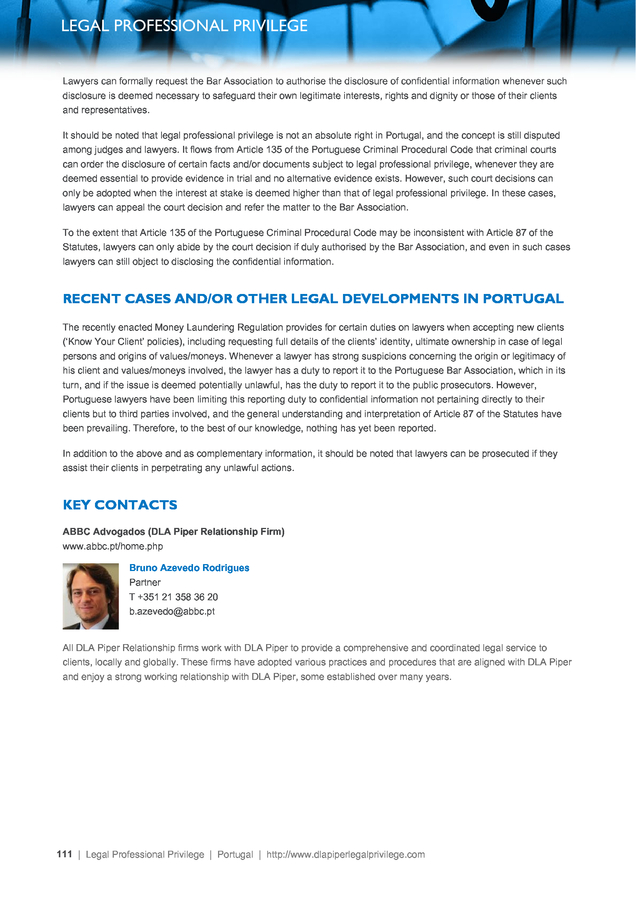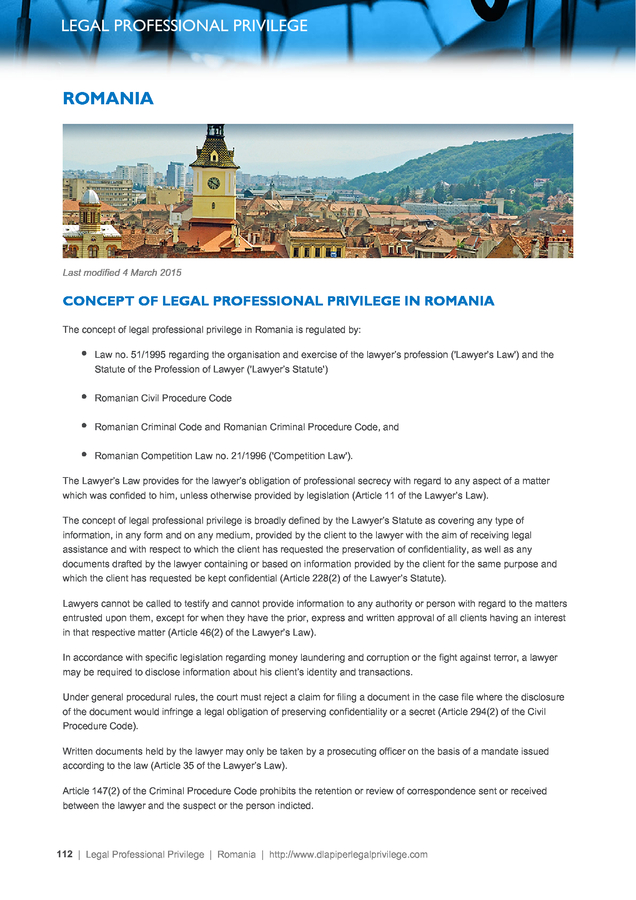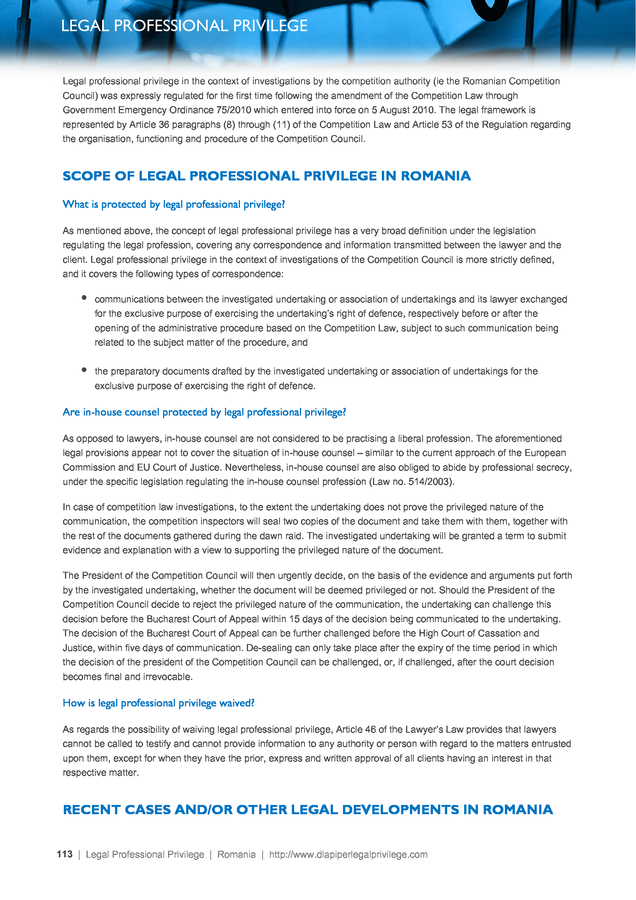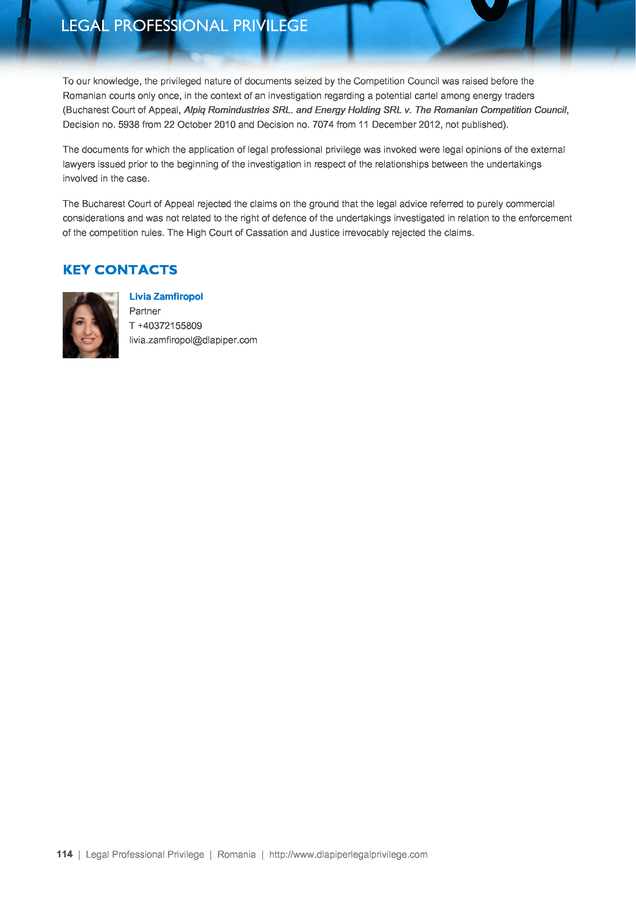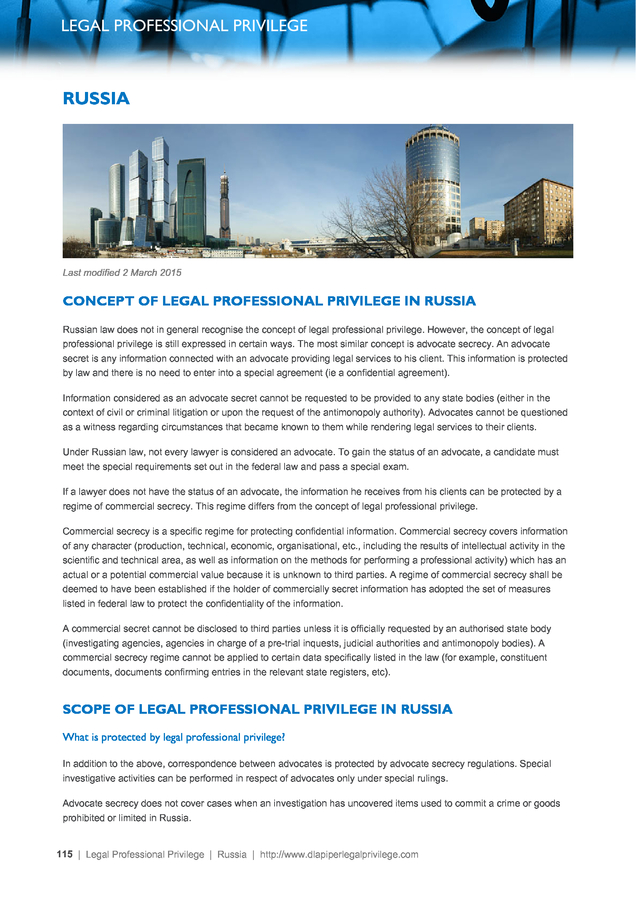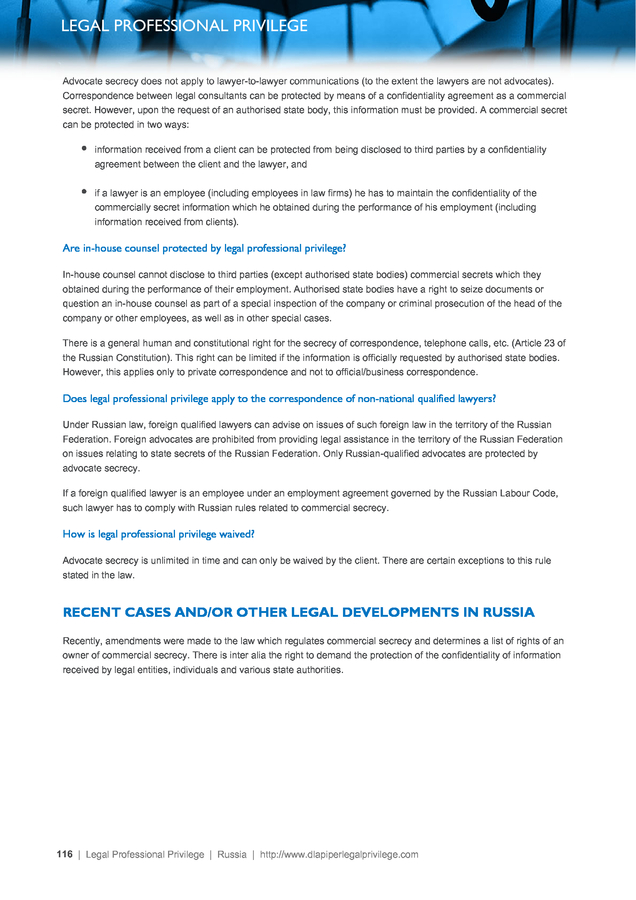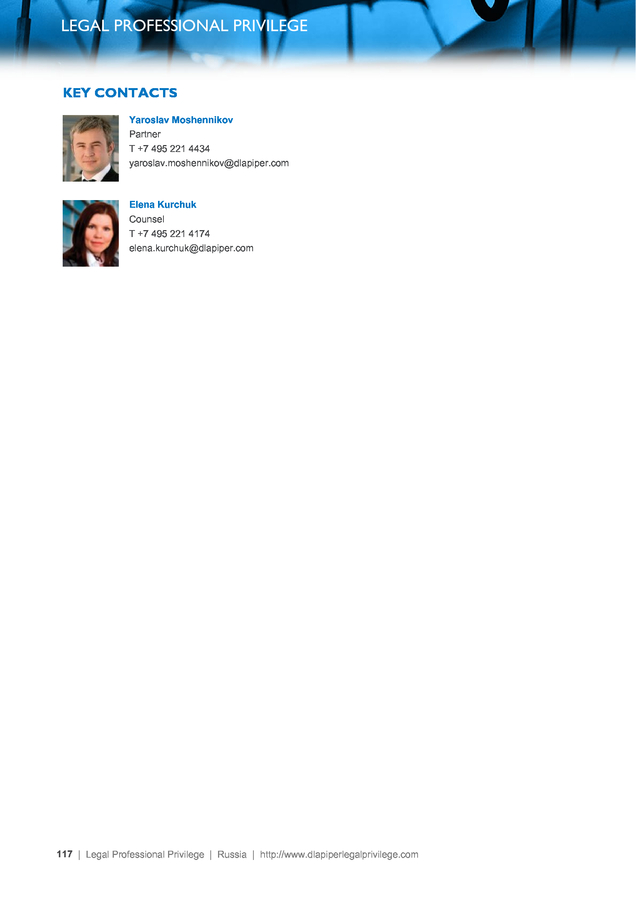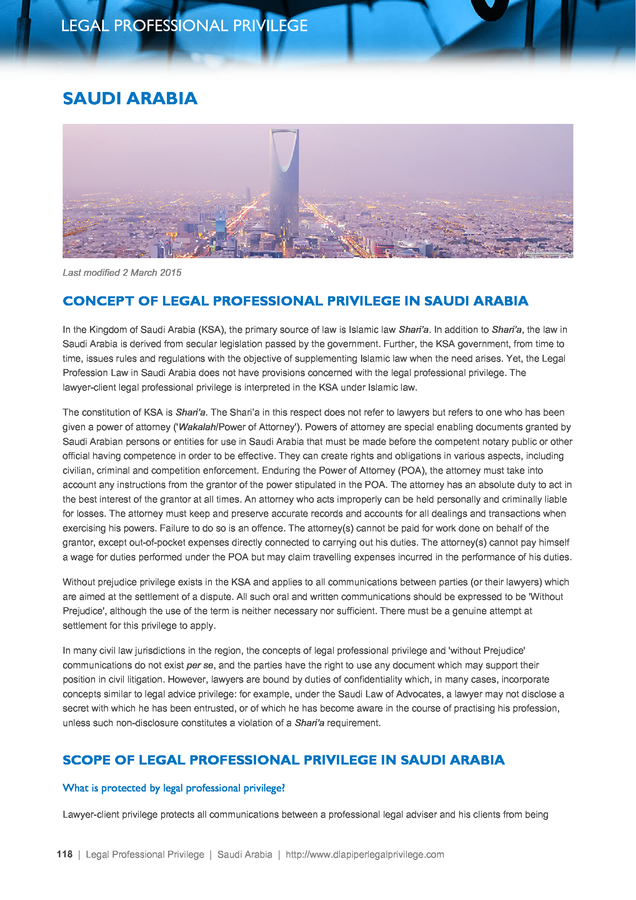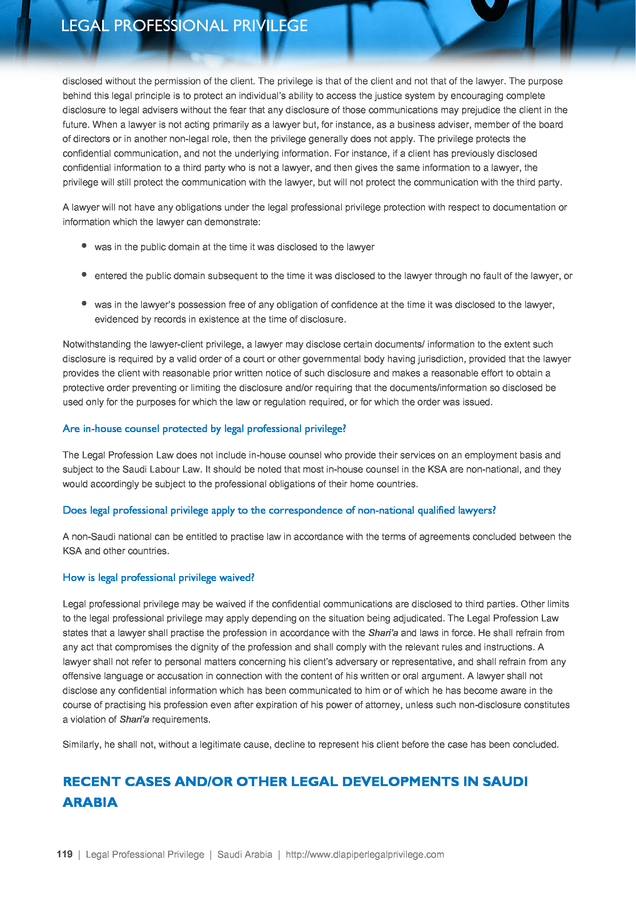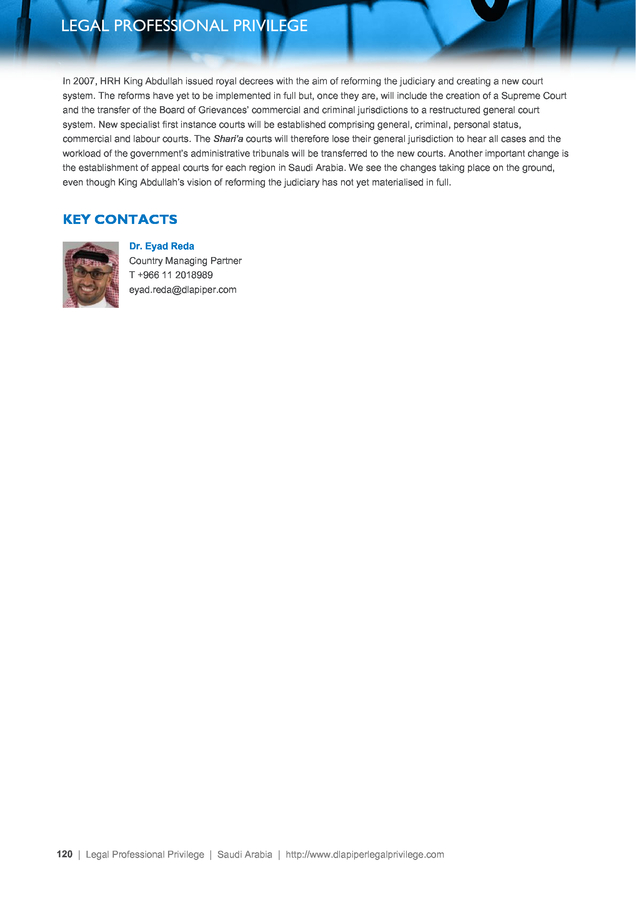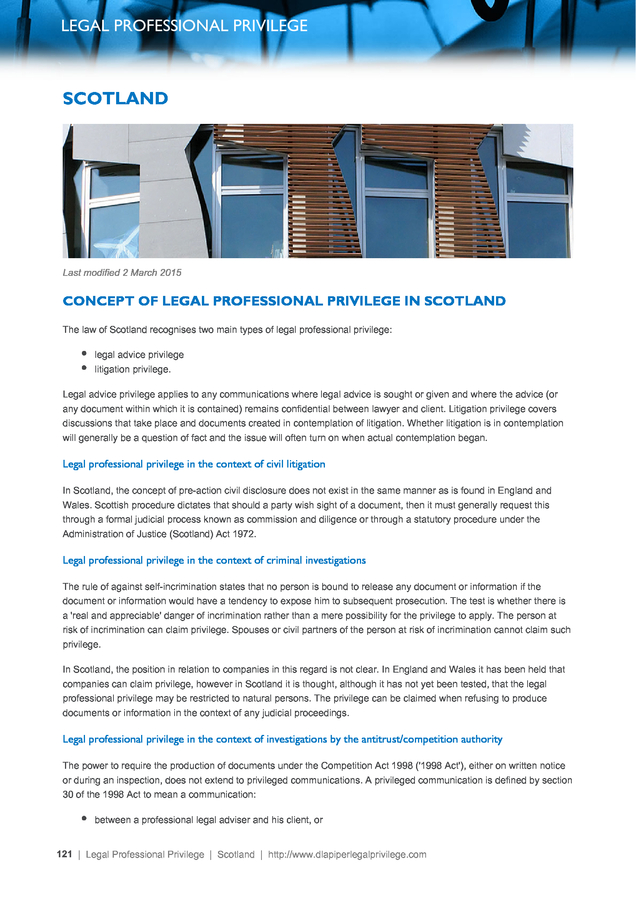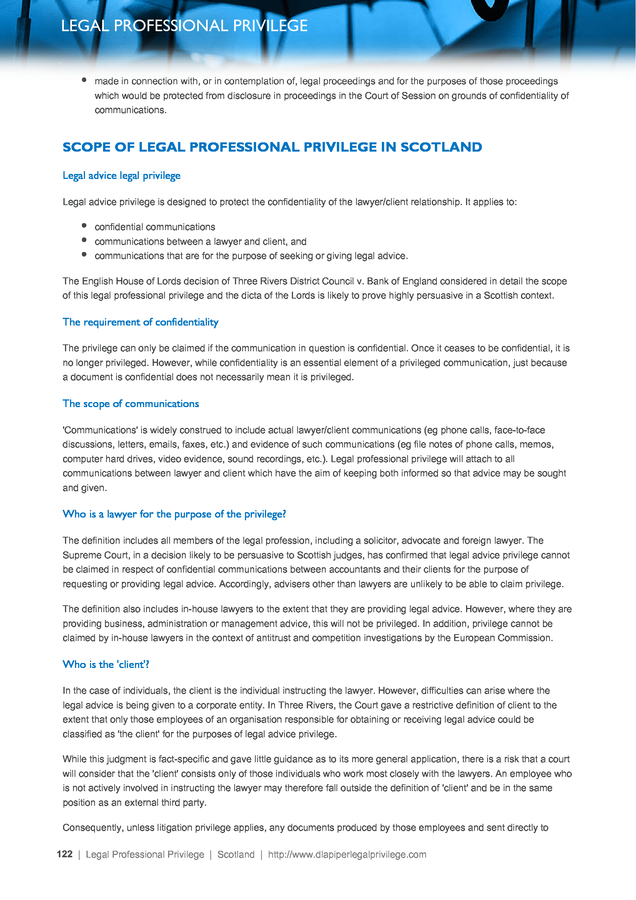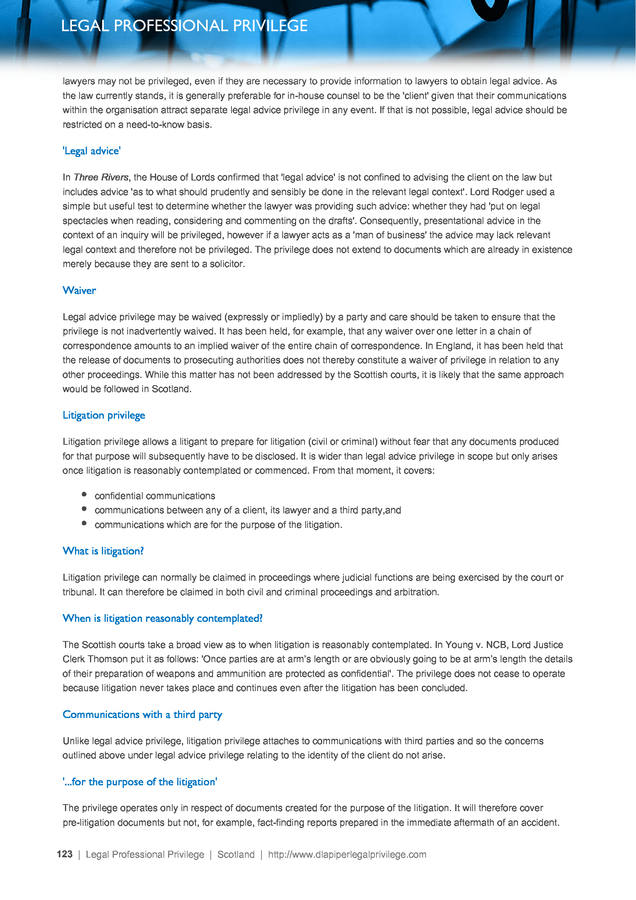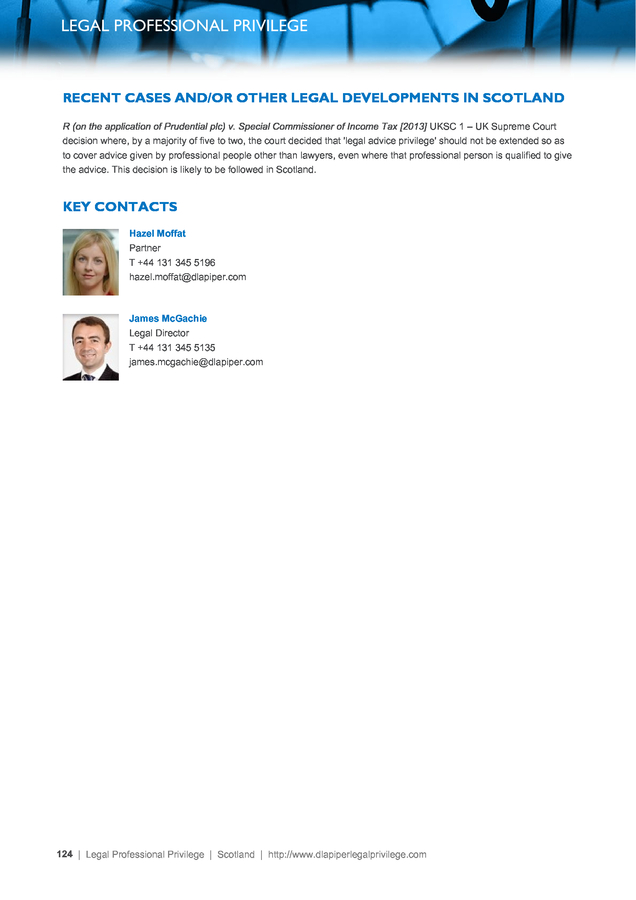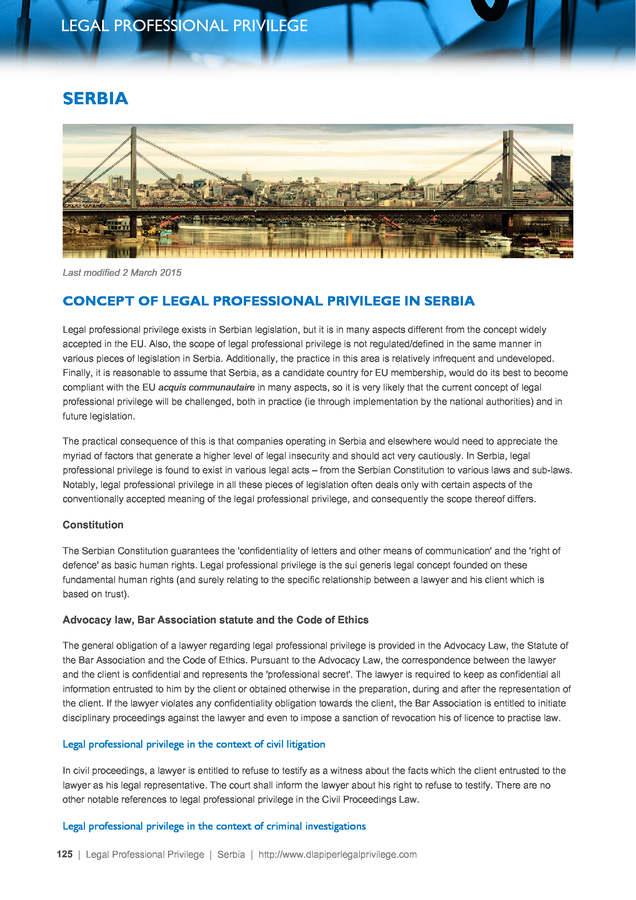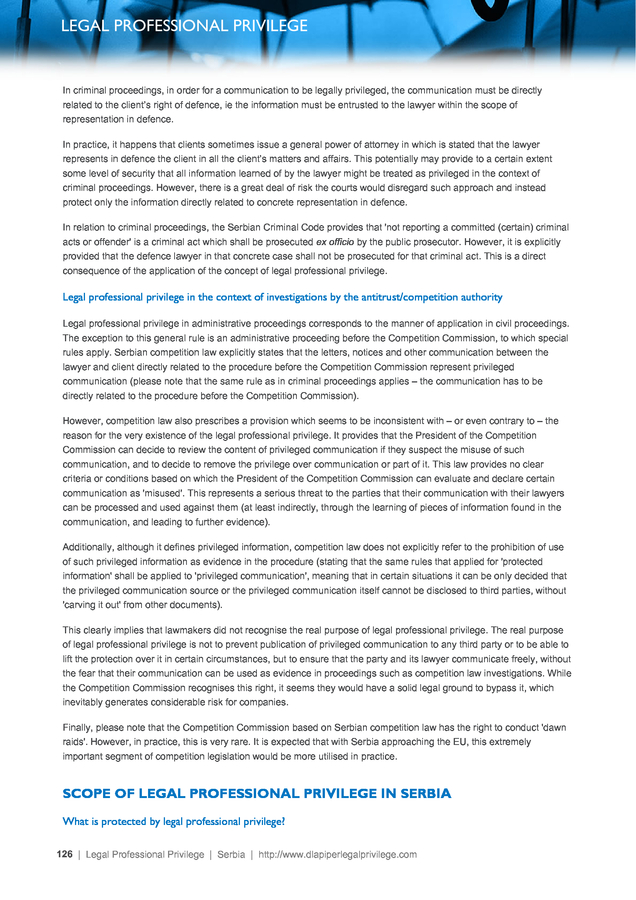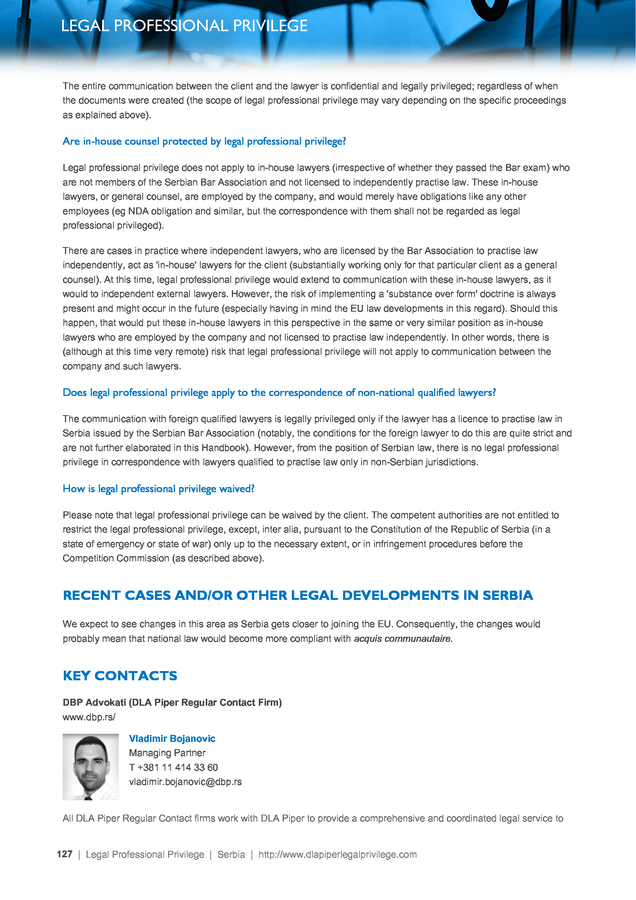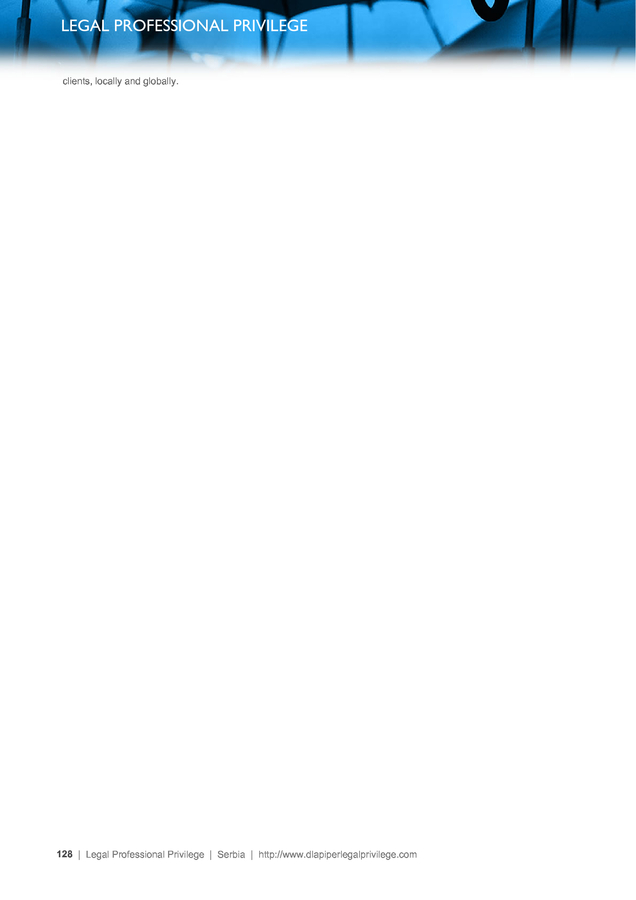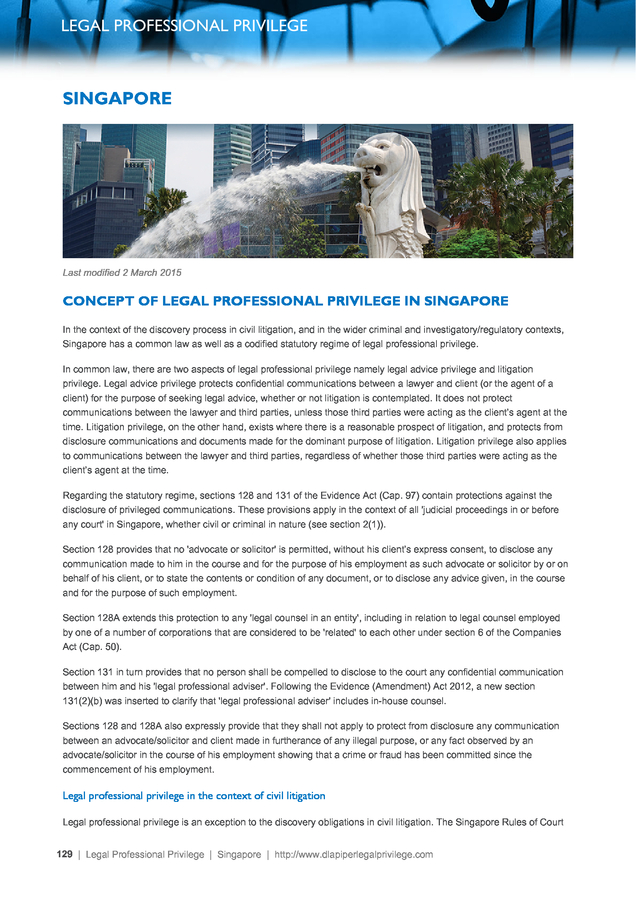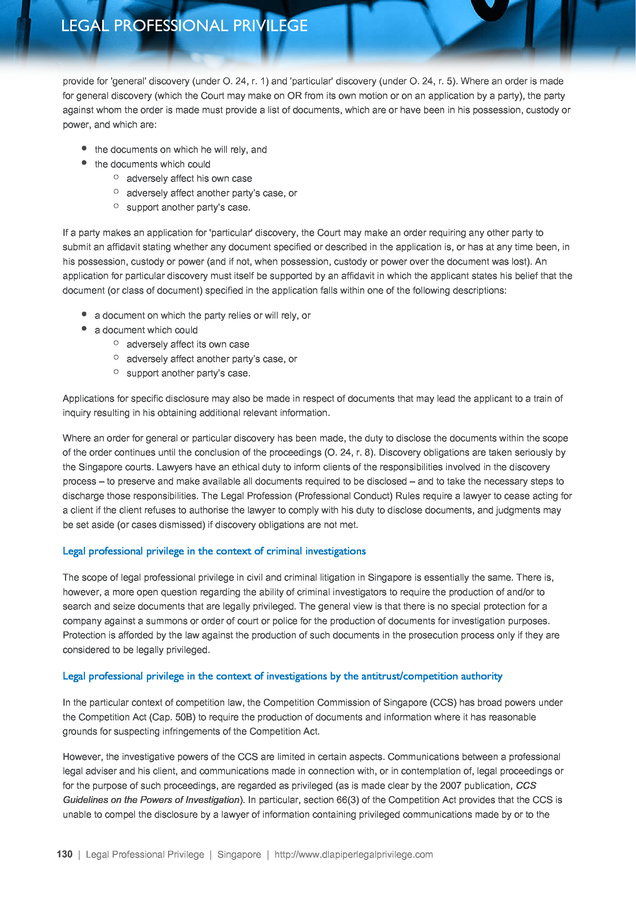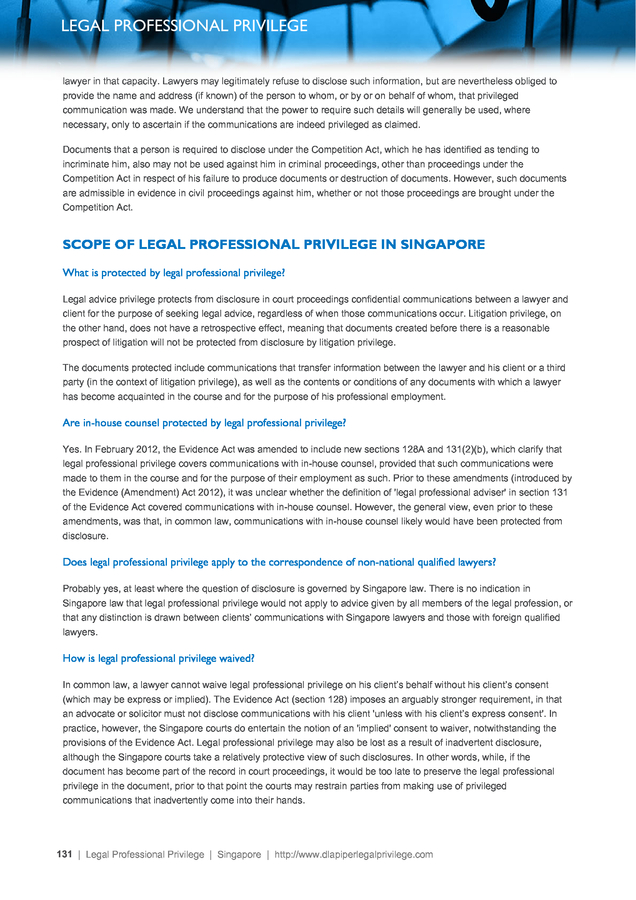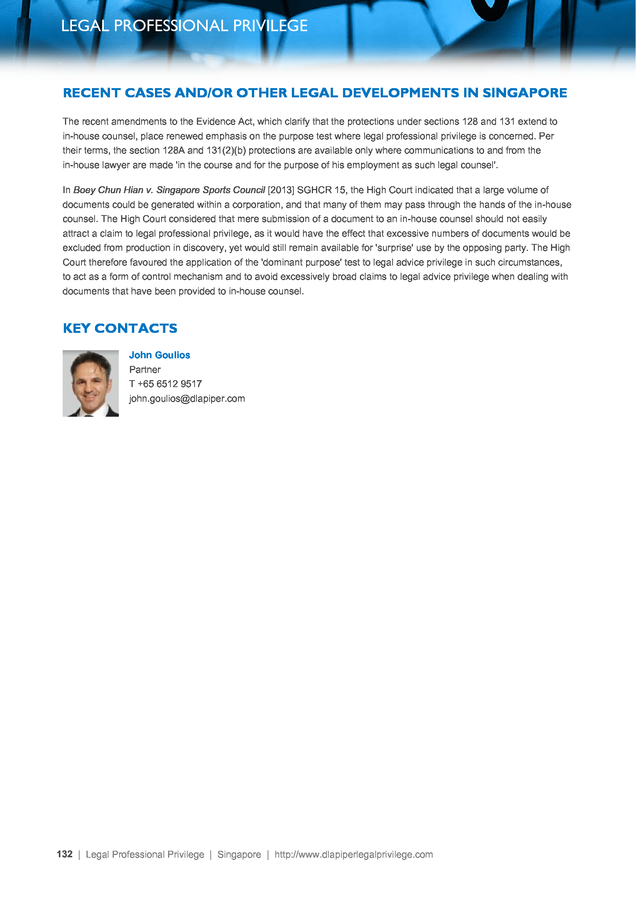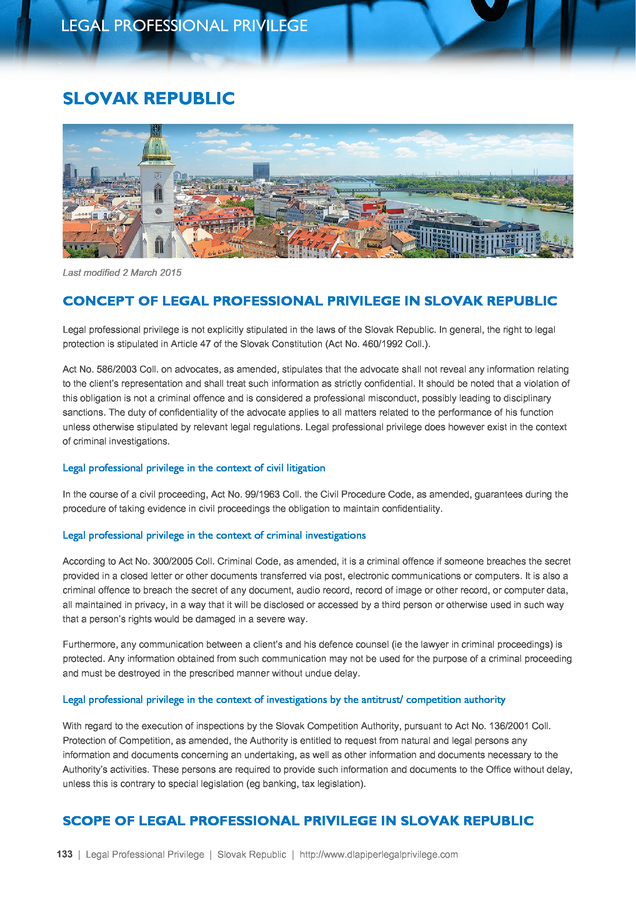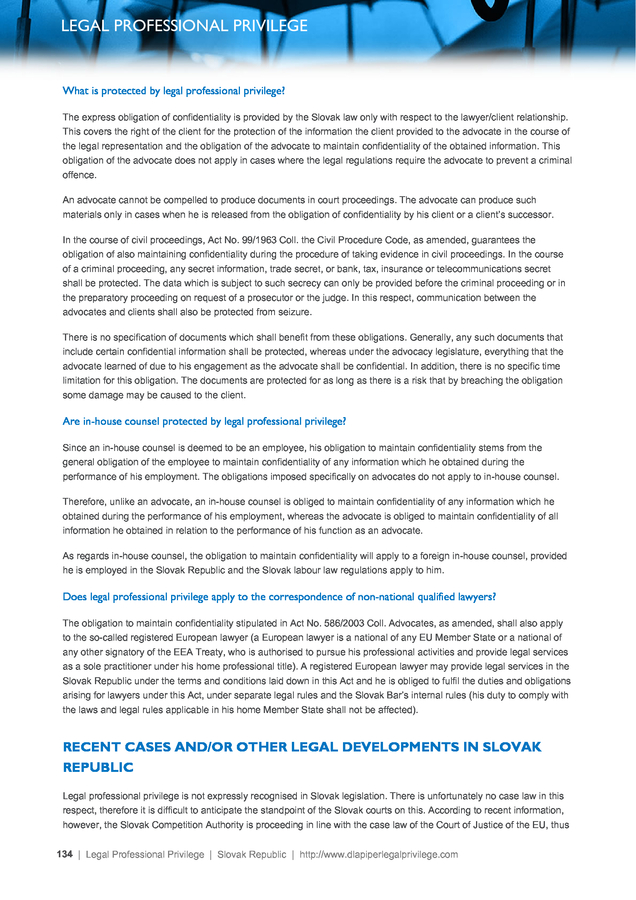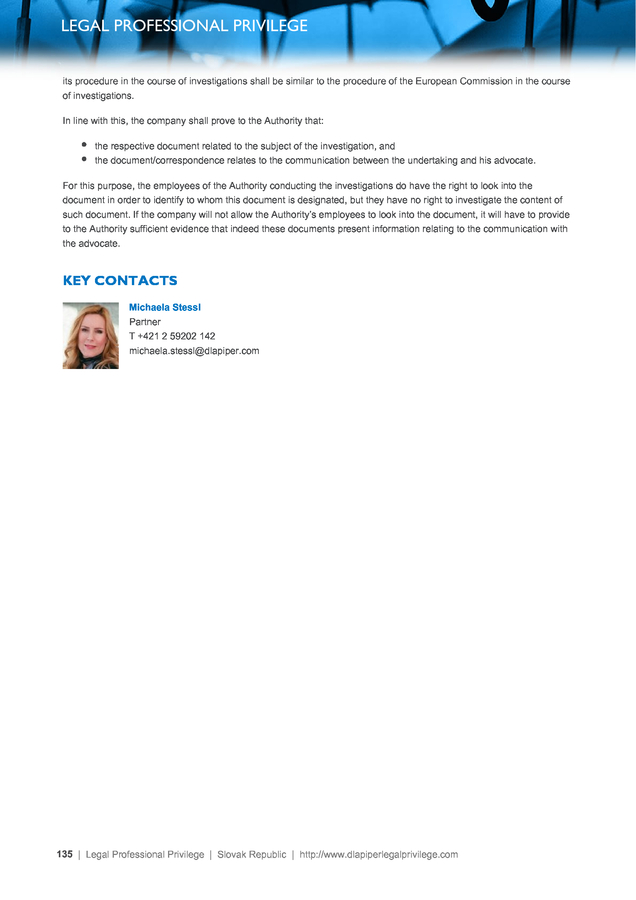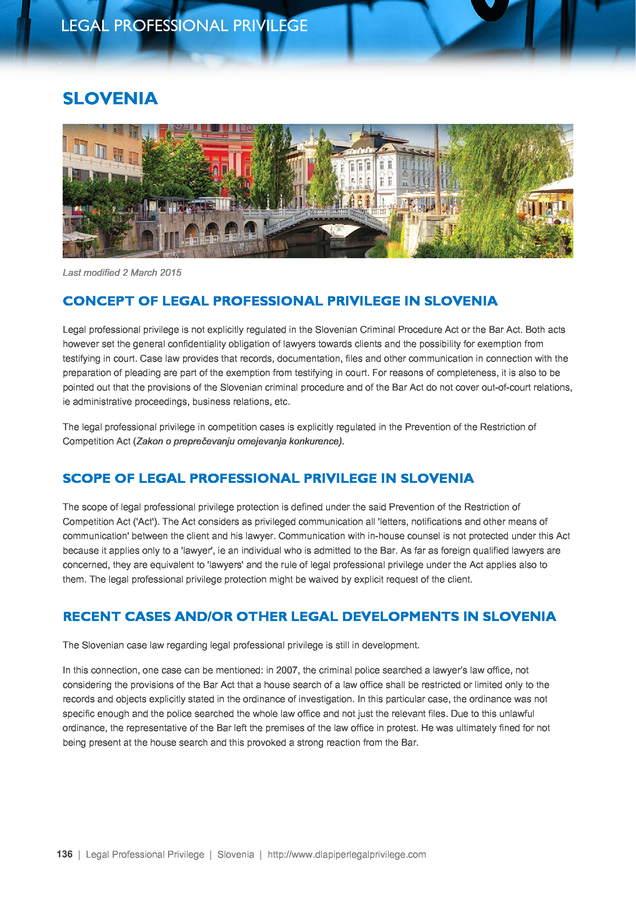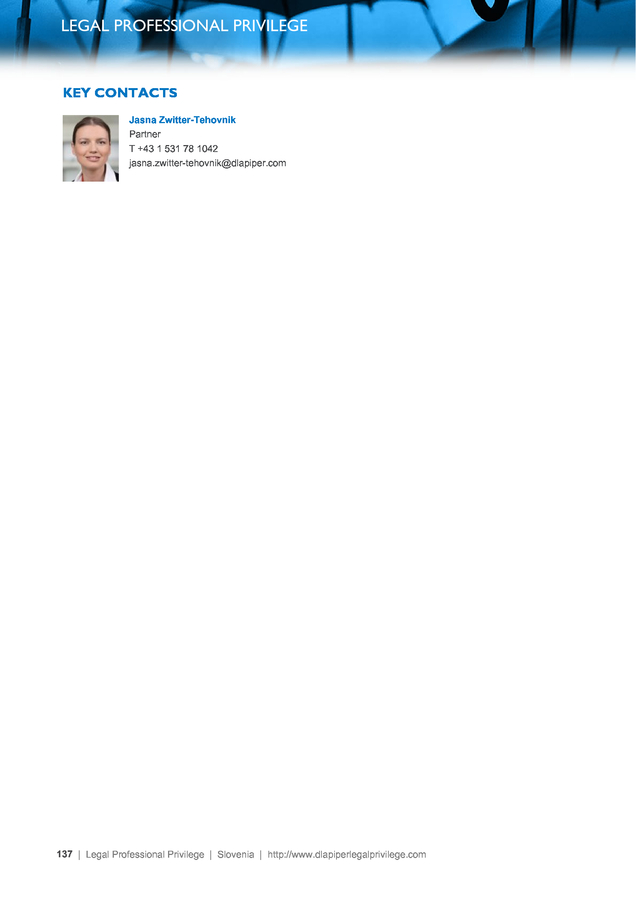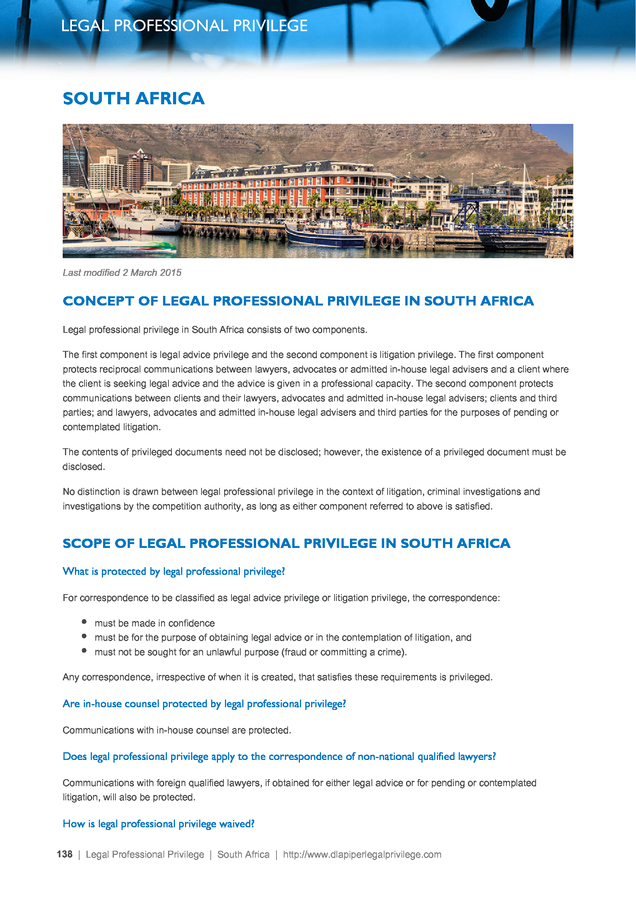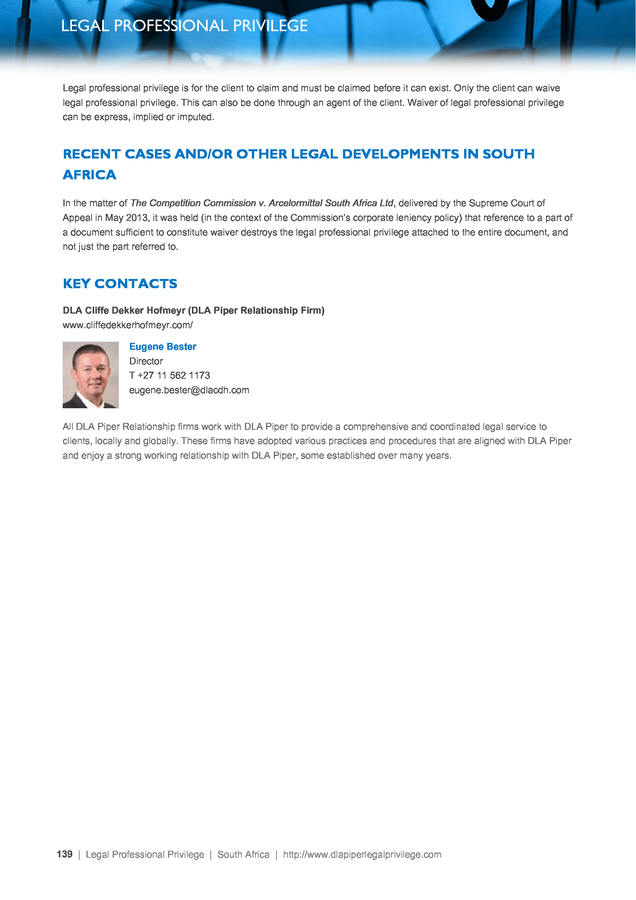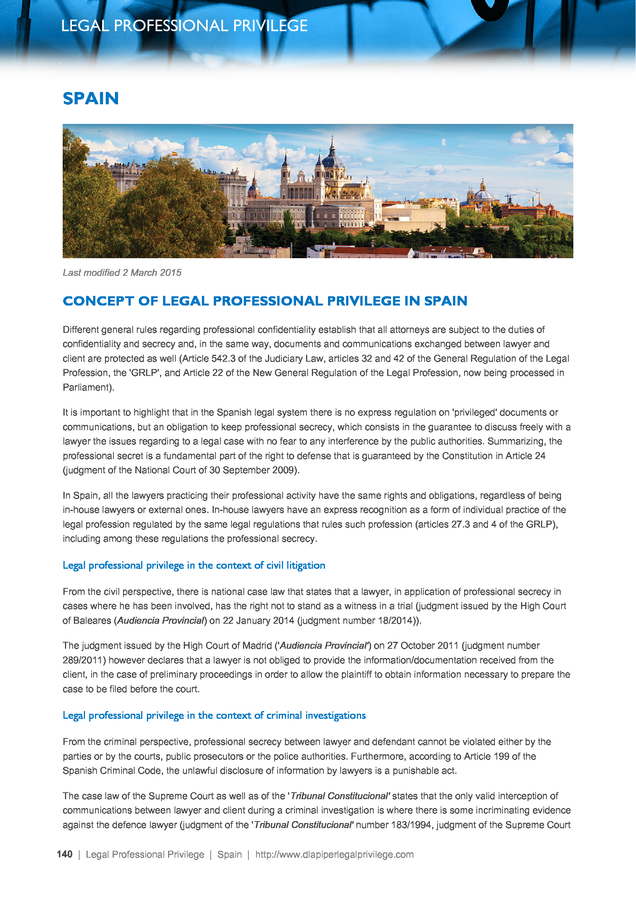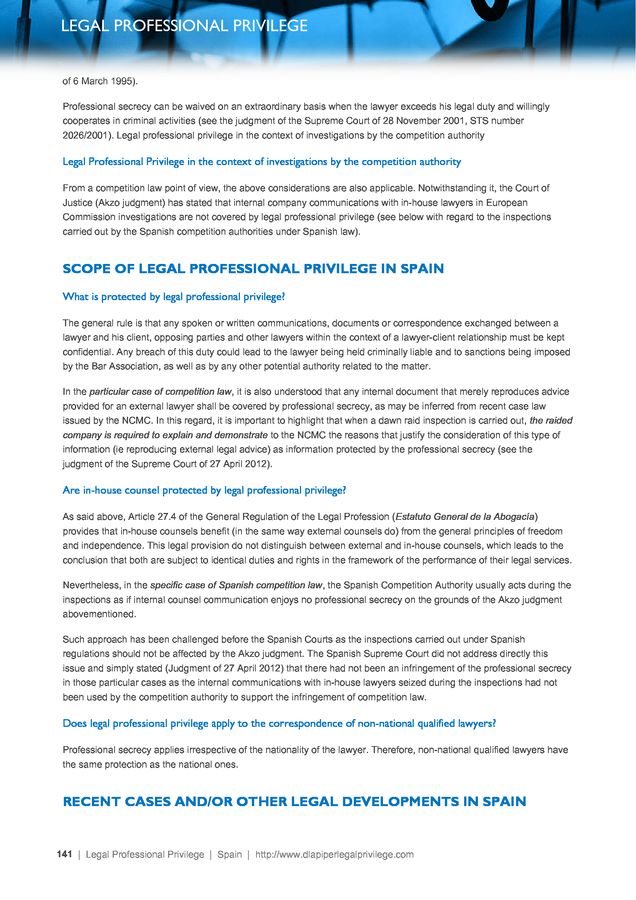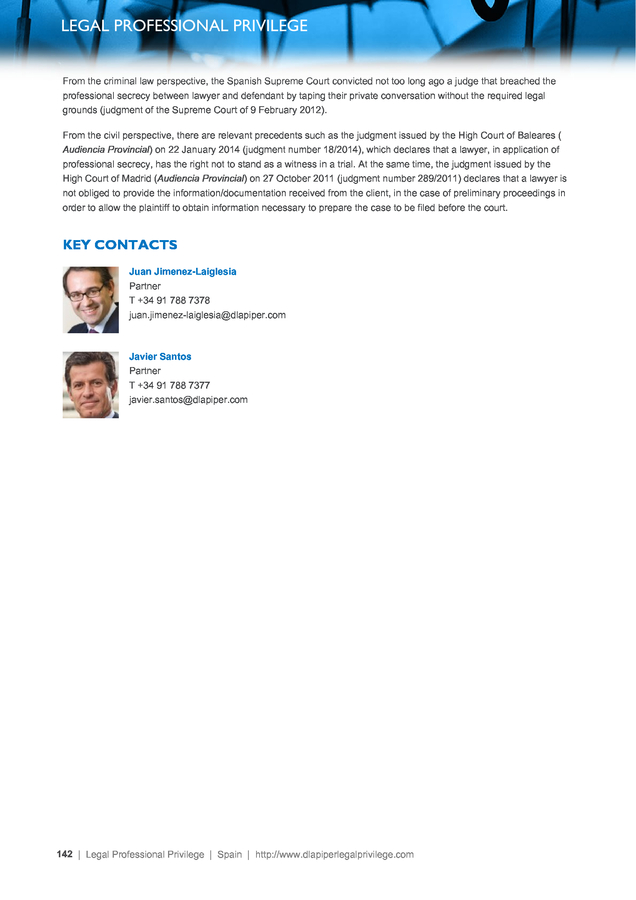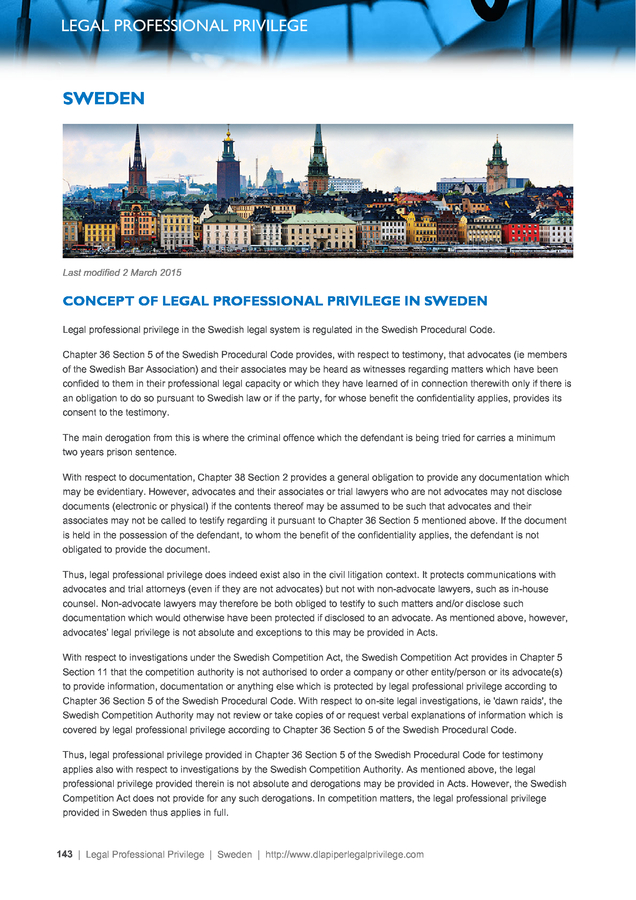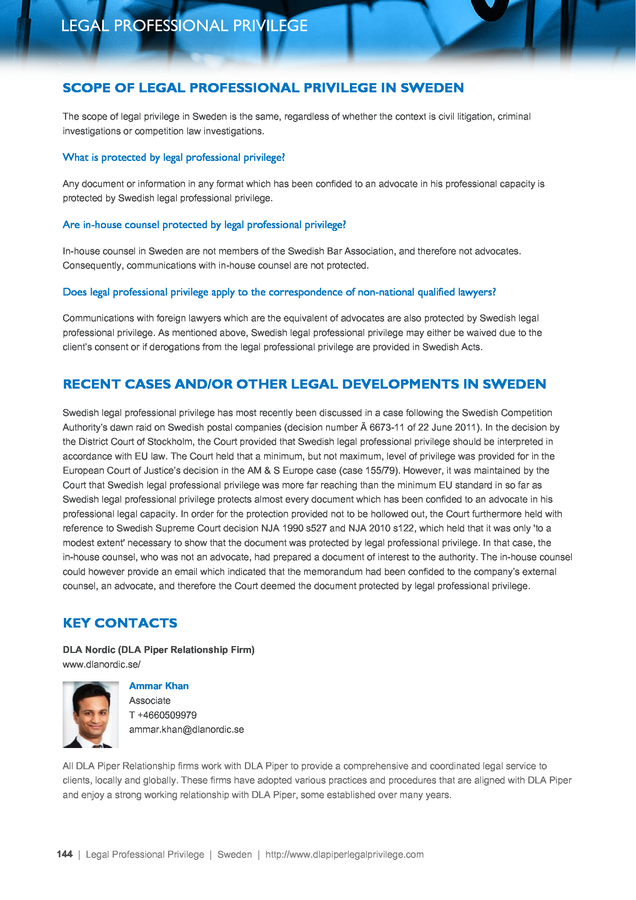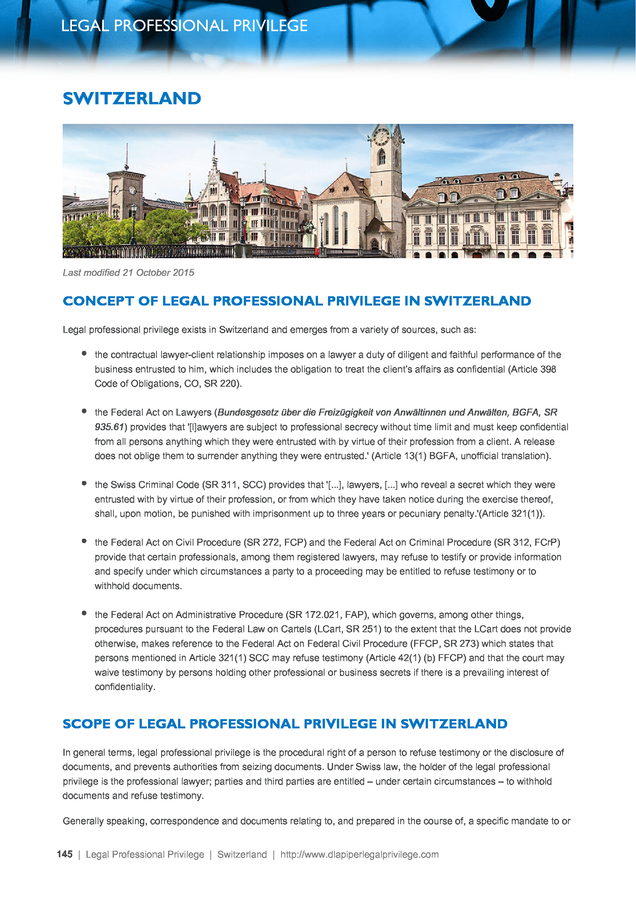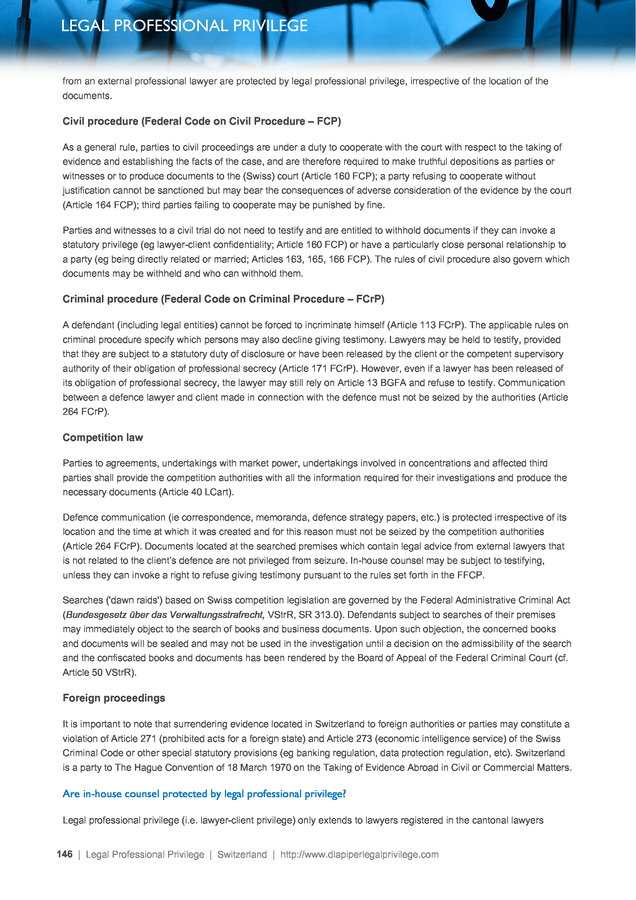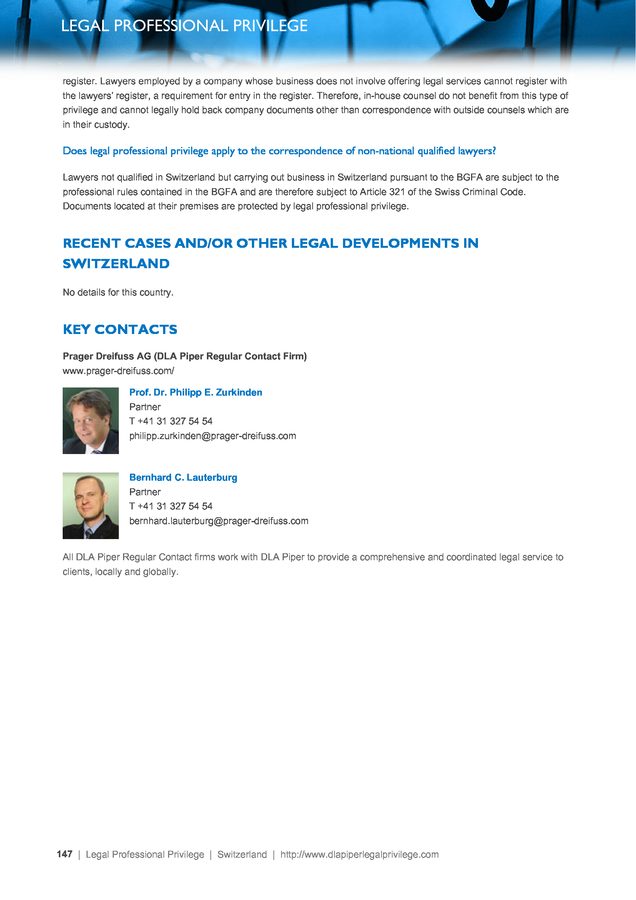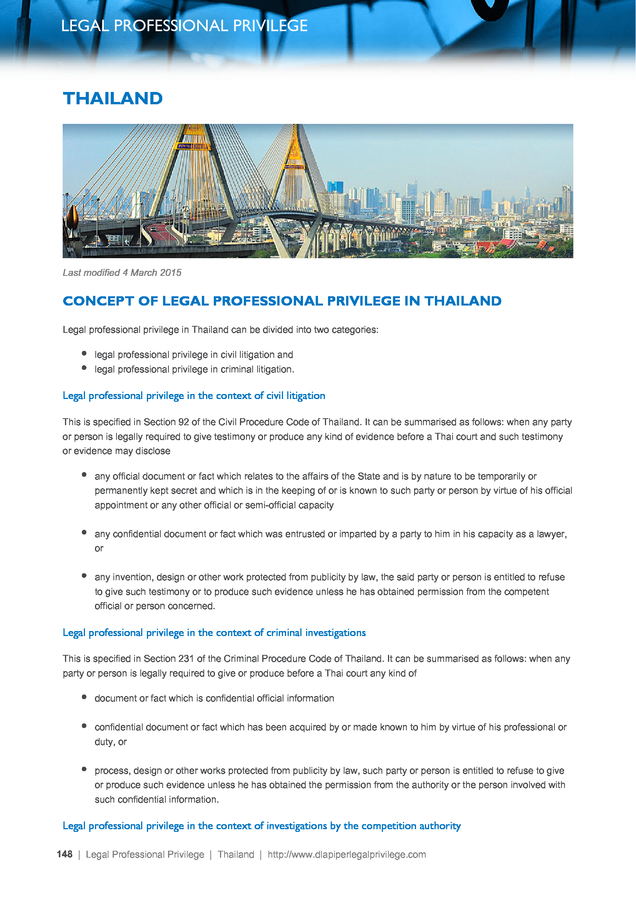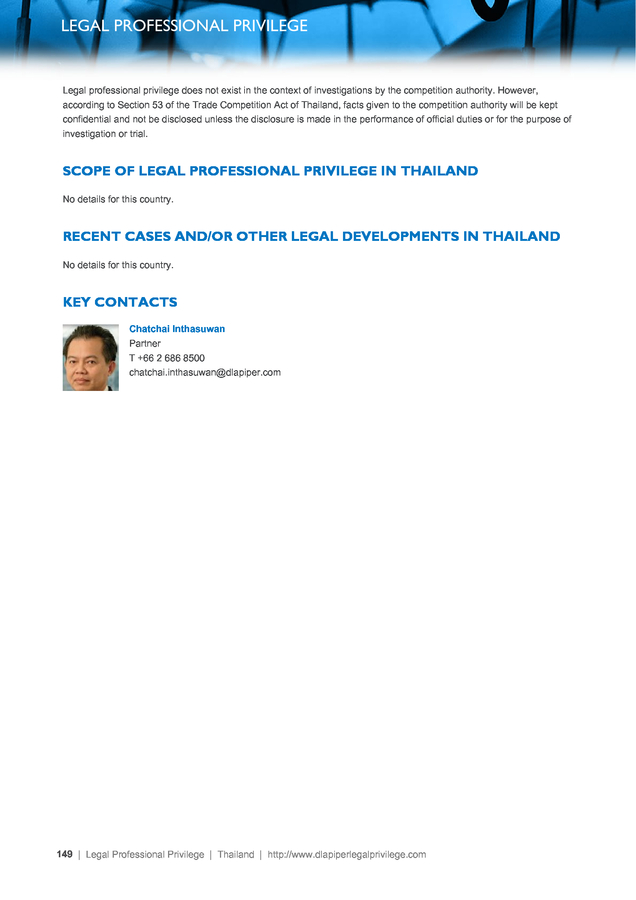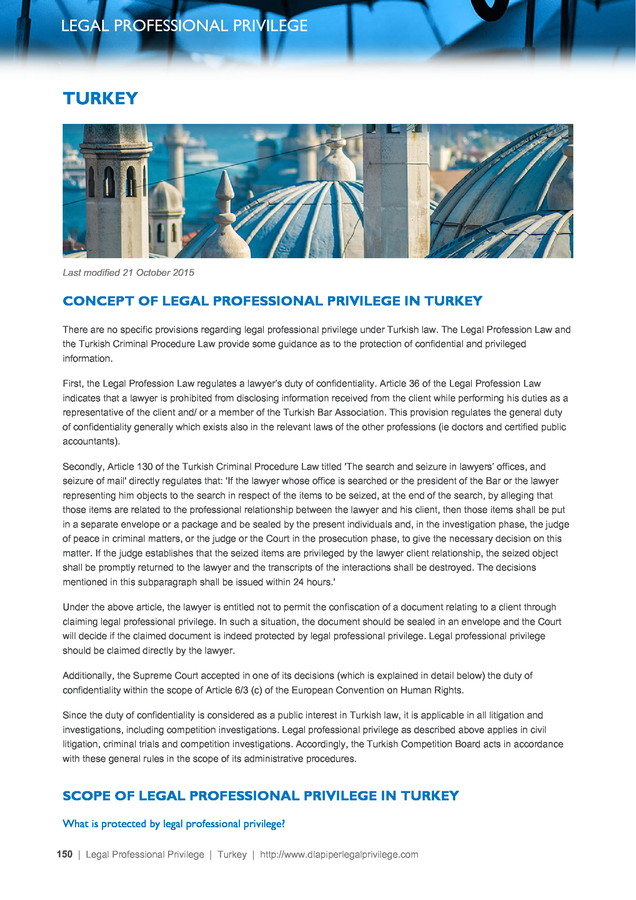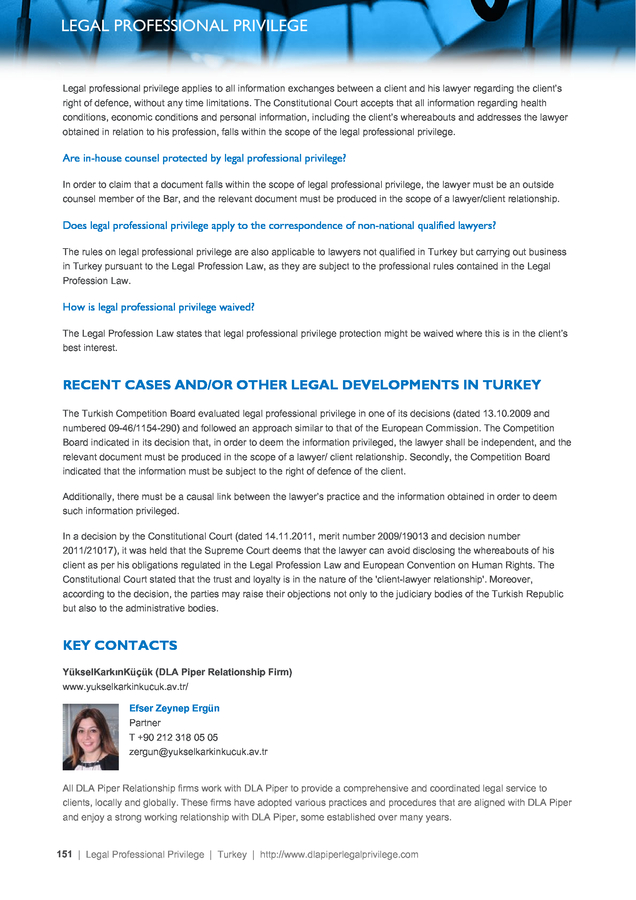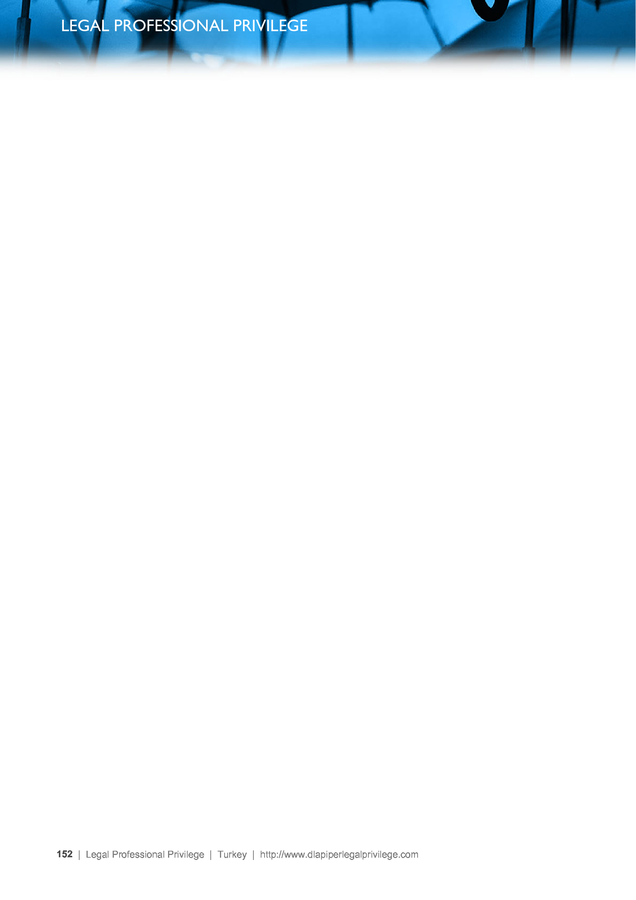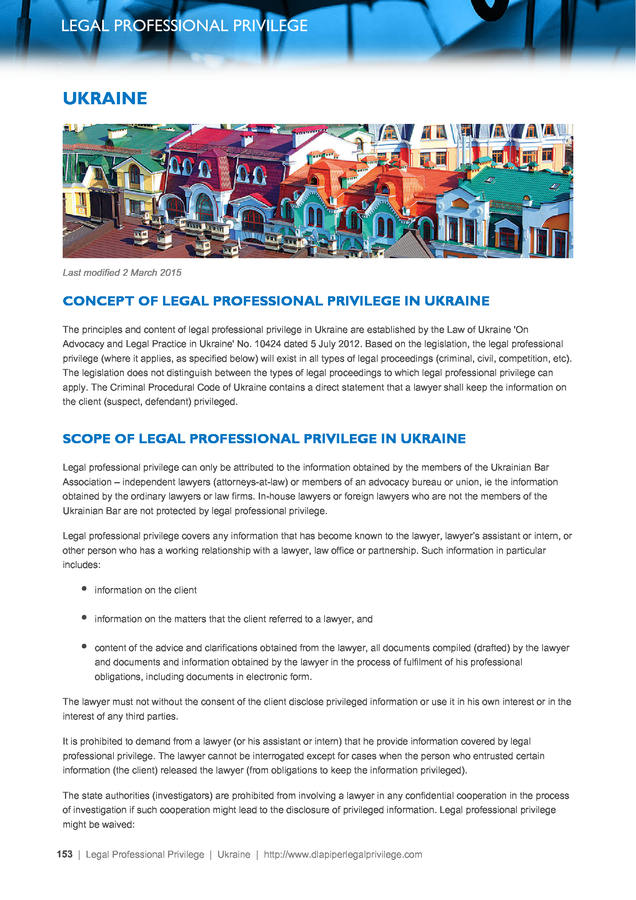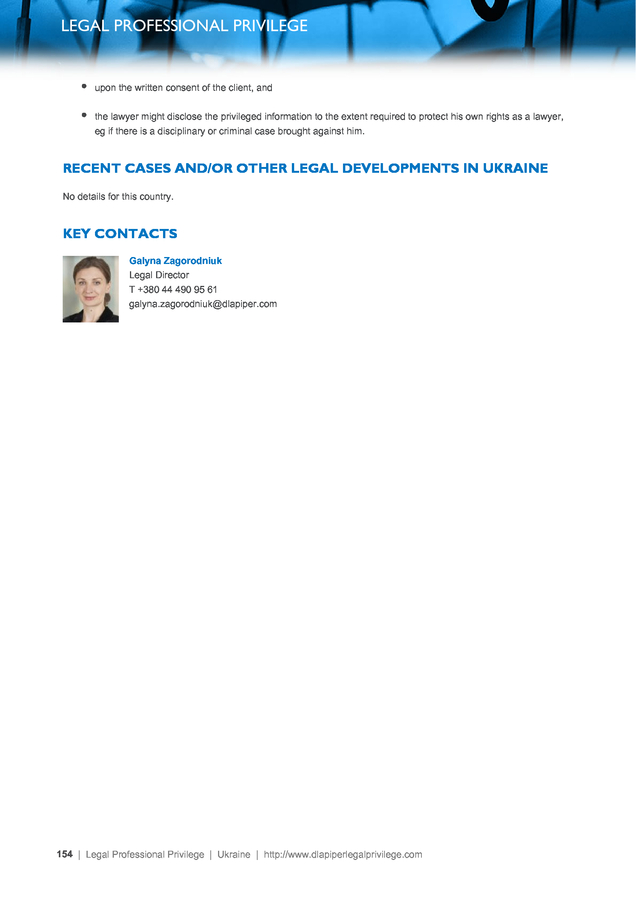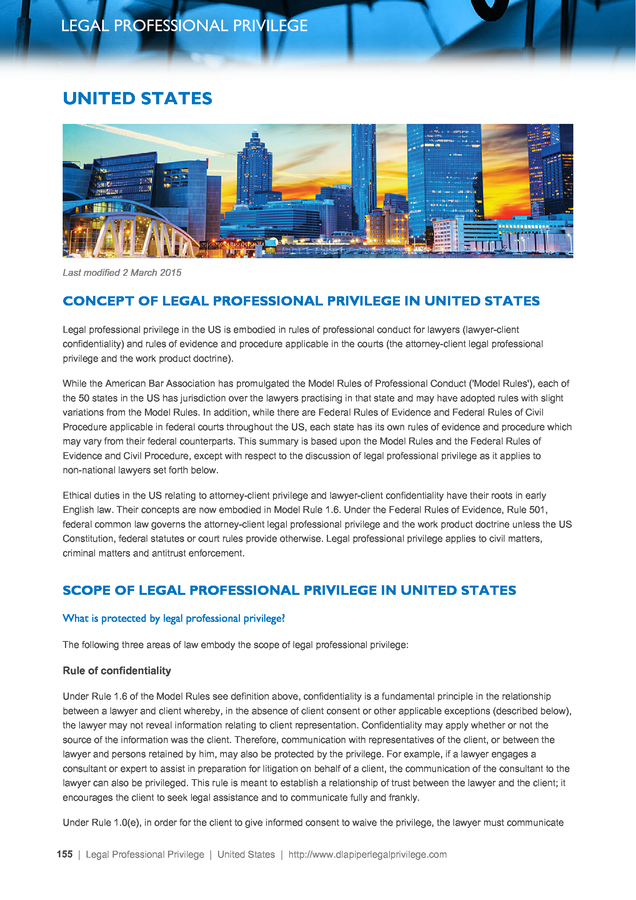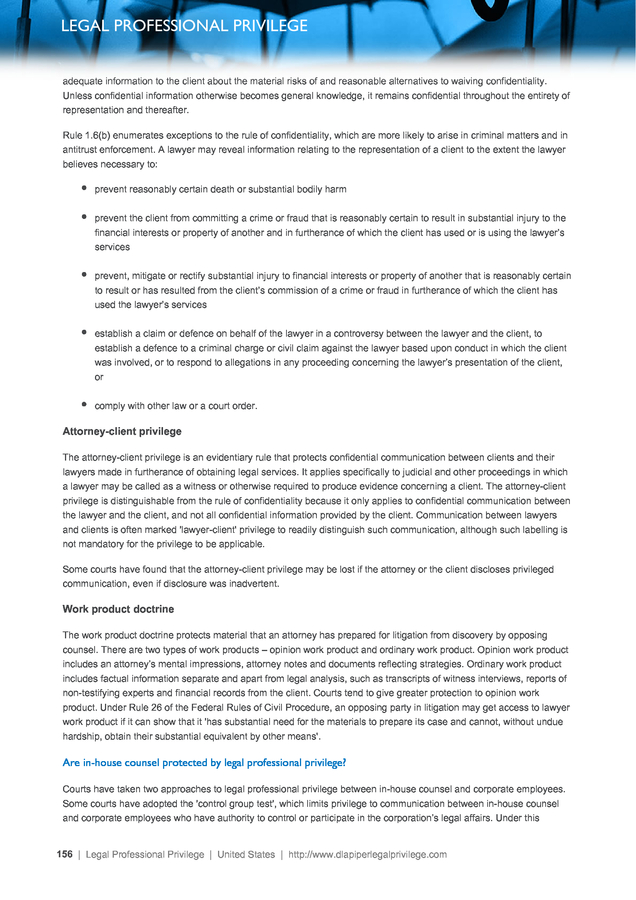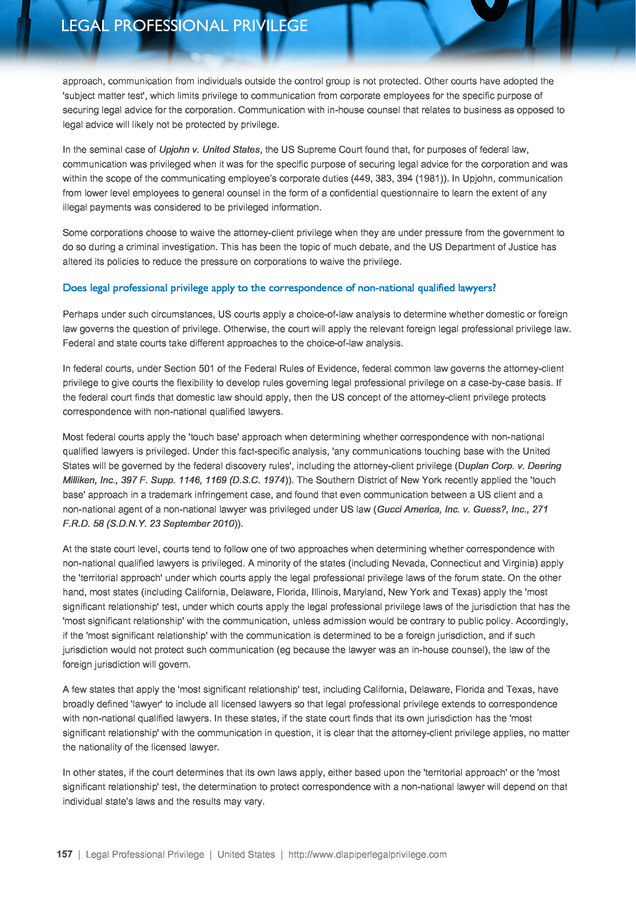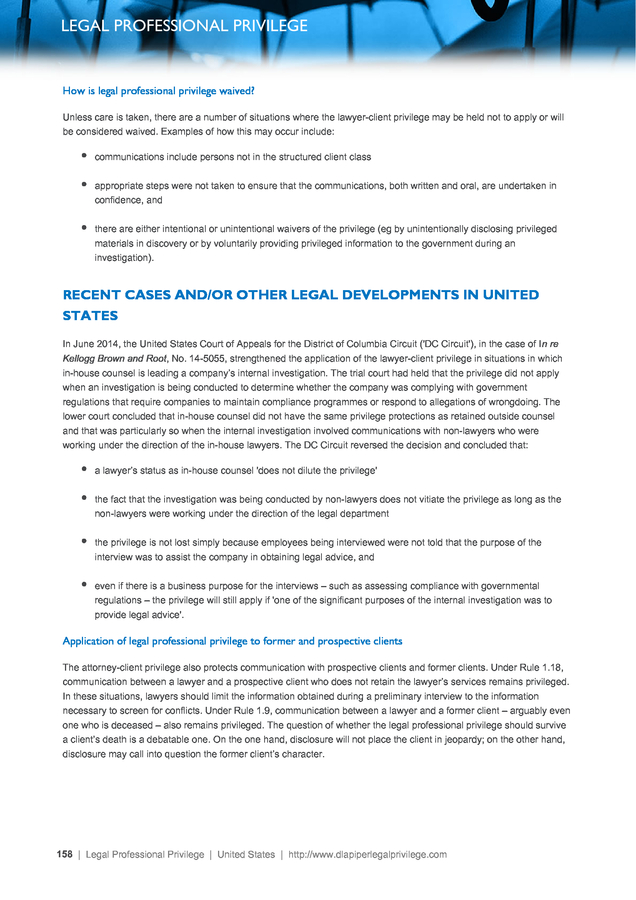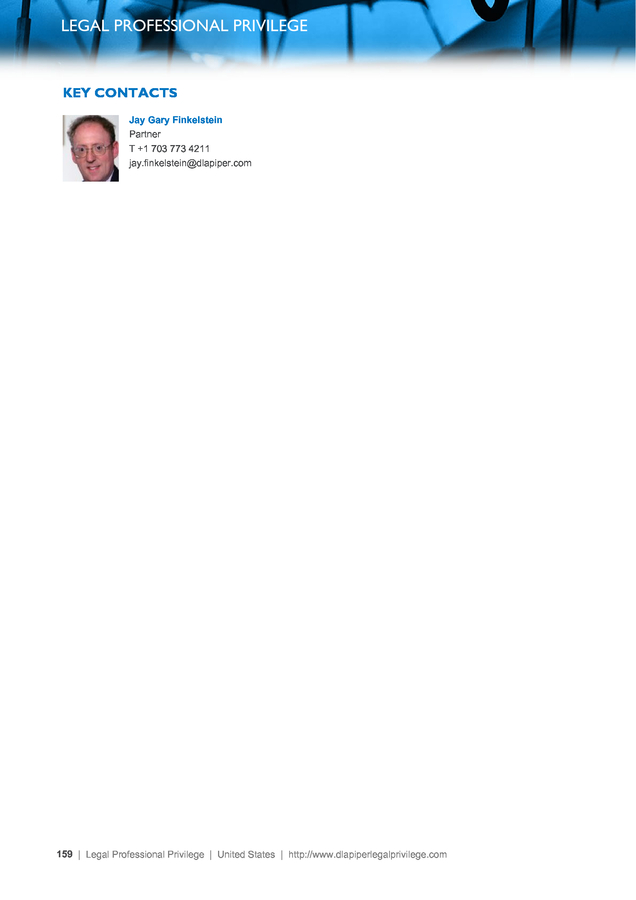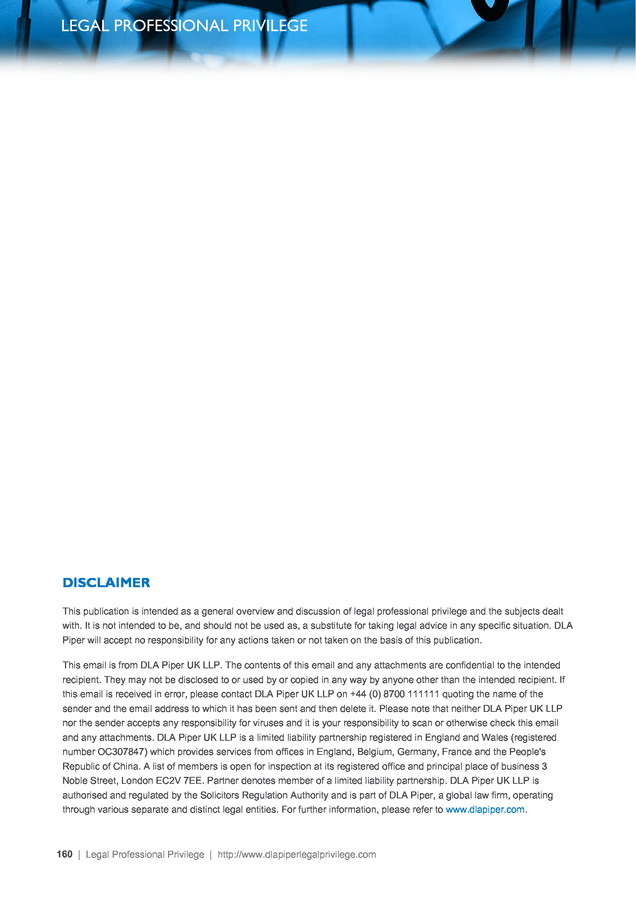Description
LEGAL PROFESSIONAL
PRIVILEGE
Global Guide, 3rd Edition, 2015
Date of Download: 9 May 2016
. LEGAL PROFESSIONAL PRIVILEGE
TABLE OF CONTENTS
Australia . . . .
. . .
. . .
. . .
. . .
. . .
. . .
. . .
. . .
. . .
. . .
. . .
. . .
. . .
. . .
. . .
. . .
. . .
. . .
. . .
. . .
. . .
. . .
. . .
. . .
. . .
. . .
. . .
. . .
. . .
. . .
. 7 Austria . .
. . .
. . .
. . .
. . .
. . .
. . .
. . .
. . .
. . .
. . .
. . .
. . .
. . .
. . .
. . .
. . .
. . .
. . .
. . .
. . .
. . .
. . .
. . .
. . .
. . .
. . .
. . .
. . .
. . .
. . .
. . .
. 10 Belgium . .
. . .
. . .
. . .
. . .
. . .
. . .
. . .
. . .
. . .
. . .
. . .
. . .
. . .
. . .
. . .
. . .
. . .
. . .
. . .
. . .
. . .
. . .
. . .
. . .
. . .
. . .
. . .
. . .
. . .
. . .
. . .
13 Bosnia and Herzegovina . . .
. . .
. . .
. . .
. . .
. . .
. . .
. . .
. . .
. . .
. . .
. . .
. . .
. . .
. . .
. . .
. . .
. . .
. . .
. . .
. . .
. . .
. . .
. . .
. . .
. . .
. . .
16 Brazil . . .
. . .
. . .
. . .
. . .
. . .
. . .
. . .
. . .
. . .
. . .
. . .
. . .
. . .
. . .
. . .
. . .
. . .
. . .
. . .
. . .
. . .
. . .
. . .
. . .
. . .
. . .
. . .
. . .
. . .
. . .
. . .
. 18 Bulgaria . .
. . .
. . .
. . .
. . .
. . .
. . .
. . .
. . .
. . .
. . .
. . .
. . .
. . .
. . .
. . .
. . .
. . .
. . .
. . .
. . .
. . .
. . .
. . .
. . .
. . .
. . .
. . .
. . .
. . .
. . .
. . .
20 China . . .
. . .
. . .
. . .
. . .
. . .
. . .
. . .
. . .
. . .
. . .
. . .
. . .
. . .
. . .
. . .
. . .
. . .
. . .
. . .
. . .
. . .
. . .
. . .
. . .
. . .
. . .
. . .
. . .
. . .
. . .
. . .
23 Croatia . . .
. . .
. . .
. . .
. . .
. . .
. . .
. . .
. . .
. . .
. . .
. . .
. . .
. . .
. . .
. . .
. . .
. . .
. . .
. . .
. . .
. . .
. . .
. . .
. . .
. . .
. . .
. . .
. . .
. . .
. . .
. . 25 Cyprus .
. . .
. . .
. . .
. . .
. . .
. . .
. . .
. . .
. . .
. . .
. . .
. . .
. . .
. . .
. . .
. . .
. . .
. . .
. . .
. . .
. . .
. . .
. . .
. . .
. . .
. . .
. . .
. . .
. . .
. . .
. . .
. 28 Czech Republic . .
. . .
. . .
. . .
. . .
. . .
. . .
. . .
. . .
. . .
. . .
. . .
. . .
. . .
. . .
. . .
. . .
. . .
. . .
. . .
. . .
. . .
. . .
. . .
. . .
. . .
. . .
. . .
. . .
. . 31 Denmark .
. . .
. . .
. . .
. . .
. . .
. . .
. . .
. . .
. . .
. . .
. . .
. . .
. . .
. . .
. . .
. . .
. . .
. . .
. . .
. . .
. . .
. . .
. . .
. . .
. . .
. . .
. . .
. . .
. . .
. . .
. . .
34 England and Wales . . .
. . .
. . .
. . .
. . .
. . .
. . .
. . .
. . .
. . .
. . .
. . .
. . .
. . .
. . .
. . .
. . .
. . .
. . .
. . .
. . .
. . .
. . .
. . .
. . .
. . .
. . .
. . .
. 36 Estonia . .
. . .
. . .
. . .
. . .
. . .
. . .
. . .
. . .
. . .
. . .
. . .
. . .
. . .
. . .
. . .
. . .
. . .
. . .
. . .
. . .
. . .
. . .
. . .
. . .
. . .
. . .
. . .
. . .
. . .
. . .
. . .
40 European Union . . .
. . .
. . .
. . .
. . .
. . .
. . .
. . .
. . .
. . .
. . .
. . .
. . .
. . .
. . .
. . .
. . .
. . .
. . .
. . .
. . .
. . .
. . .
. . .
. . .
. . .
. . .
. . .
. . .
. 43 Finland . .
. . .
. . .
. . .
. . .
. . .
. . .
. . .
. . .
. . .
. . .
. . .
. . .
. . .
. . .
. . .
. . .
. . .
. . .
. . .
. . .
. . .
. . .
. . .
. . .
. . .
. . .
. . .
. . .
. . .
. . .
. . .
47 France . . .
. . .
. . .
. . .
. . .
. . .
. . .
. . .
. . .
. . .
. . .
. . .
. . .
. . .
. . .
. . .
. . .
. . .
. . .
. . .
. . .
. . .
. . .
. . .
. . .
. . .
. . .
. . .
. . .
. . .
. . .
. . .
50 Georgia . . .
. . .
. . .
. . .
. . .
. . .
. . .
. . .
. . .
. . .
. . .
. . .
. . .
. . .
. . .
. . .
. . .
. . .
. . .
. . .
. . .
. . .
. . .
. . .
. . .
. . .
. . .
. . .
. . .
. . .
. . .
. . 53 Germany .
. . .
. . .
. . .
. . .
. . .
. . .
. . .
. . .
. . .
. . .
. . .
. . .
. . .
. . .
. . .
. . .
. . .
. . .
. . .
. . .
. . .
. . .
. . .
. . .
. . .
. . .
. . .
. . .
. . .
. . .
. . .
56 Greece . . .
. . .
. . .
. . .
. . .
. . .
. . .
. . .
. . .
. . .
. . .
. . .
. . .
. . .
. . .
. . .
. . .
. . .
. . .
. . .
. . .
. . .
. . .
. . .
. . .
. . .
. . .
. . .
. . .
. . .
. . .
. . 60 Hong Kong .
. . .
. . .
. . .
. . .
. . .
. . .
. . .
. . .
. . .
. . .
. . .
. . .
. . .
. . .
. . .
. . .
. . .
. . .
. . .
. . .
. . .
. . .
. . .
. . .
. . .
. . .
. . .
. . .
. . .
. . .
. 63 Hungary . .
. . .
. . .
. . .
. . .
. . .
. . .
. . .
. . .
. . .
. . .
. . .
. . .
. . .
. . .
. . .
. . .
. . .
. . .
. . .
. . .
. . .
. . .
. . .
. . .
. . .
. . .
. . .
. . .
. . .
. . .
. . 67 Indonesia .
. . .
. . .
. . .
. . .
. . .
. . .
. . .
. . .
. . .
. . .
. . .
. . .
. . .
. . .
. . .
. . .
. . .
. . .
. . .
. . .
. . .
. . .
. . .
. . .
. . .
. . .
. . .
. . .
. . .
. . .
. . 70 Ireland .
. . .
. . .
. . .
. . .
. . .
. . .
. . .
. . .
. . .
. . .
. . .
. . .
. . .
. . .
. . .
. . .
. . .
. . .
. . .
. . .
. . .
. . .
. . .
. . .
. . .
. . .
. . .
. . .
. . .
. . .
. . .
. . 74 Italy .
. . .
. . .
. . .
. . .
. . .
. . .
. . .
. . .
. . .
. . .
. . .
. . .
. . .
. . .
. . .
. . .
. . .
. . .
. . .
. . .
. . .
. . .
. . .
. . .
. . .
. . .
. . .
. . .
. . .
. . .
. . .
. . .
. 78 Japan . .
. . .
. . .
. . .
. . .
. . .
. . .
. . .
. . .
. . .
. . .
. . .
. . .
. . .
. . .
. . .
. . .
. . .
. . .
. . .
. . .
. . .
. . .
. . .
. . .
. . .
. . .
. . .
. . .
. . .
. . .
. . .
. 80 Latvia . .
. . .
. . .
. . .
. . .
. . .
. . .
. . .
. . .
. . .
. . .
. . .
. . .
. . .
. . .
. . .
. . .
. . .
. . .
. . .
. . .
. . .
. . .
. . .
. . .
. . .
. . .
. . .
. . .
. . .
. . .
. . .
. 84 Lithuania . .
. . .
. . .
. . .
. . .
. . .
. . .
. . .
. . .
. . .
. . .
. . .
. . .
. . .
. . .
. . .
. . .
. . .
. . .
. . .
. . .
. . .
. . .
. . .
. . .
. . .
. . .
. . .
. . .
. . .
. . .
. . 87 Macedonia .
. . .
. . .
. . .
. . .
. . .
. . .
. . .
. . .
. . .
. . .
. . .
. . .
. . .
. . .
. . .
. . .
. . .
. . .
. . .
. . .
. . .
. . .
. . .
. . .
. . .
. . .
. . .
. . .
. . .
. . .
. 89 Malta . .
. . .
. . .
. . .
. . .
. . .
. . .
. . .
. . .
. . .
. . .
. . .
. . .
. . .
. . .
. . .
. . .
. . .
. . .
. . .
. . .
. . .
. . .
. . .
. . .
. . .
. . .
. . .
. . .
. . .
. . .
. . .
. . 92 Mexico .
. . .
. . .
. . .
. . .
. . .
. . .
. . .
. . .
. . .
. . .
. . .
. . .
. . .
. . .
. . .
. . .
. . .
. . .
. . .
. . .
. . .
. . .
. . .
. . .
. . .
. . .
. . .
. . .
. . .
. . .
. . .
. 96 Netherlands . .
. . .
. . .
. . .
. . .
. . .
. . .
. . .
. . .
. . .
. . .
. . .
. . .
. . .
. . .
. . .
. . .
. . .
. . .
. . .
. . .
. . .
. . .
. . .
. . .
. . .
. . .
. . .
. . .
. . .
. . 98 New Zealand .
. . .
. . .
. . .
. . .
. . .
. . .
. . .
. . .
. . .
. . .
. . .
. . .
. . .
. . .
. . .
. . .
. . .
. . .
. . .
. . .
. . .
. . .
. . .
. . .
. . .
. . .
. . .
. . .
. . .
. 101 Norway . .
. . .
. . .
. . .
. . .
. . .
. . .
. . .
. . .
. . .
. . .
. . .
. . .
. . .
. . .
. . .
. . .
. . .
. . .
. . .
. . .
. . .
. . .
. . .
. . .
. . .
. . .
. . .
. . .
. . .
. . .
. . 105 Poland .
. . .
. . .
. . .
. . .
. . .
. . .
. . .
. . .
. . .
. . .
. . .
. . .
. . .
. . .
. . .
. . .
. . .
. . .
. . .
. . .
. . .
. . .
. . .
. . .
. . .
. . .
. . .
. . .
. . .
. . .
. . .
. 107 Portugal . .
. . .
. . .
. . .
. . .
. . .
. . .
. . .
. . .
. . .
. . .
. . .
. . .
. . .
. . .
. . .
. . .
. . .
. . .
. . .
. . .
. . .
. . .
. . .
. . .
. . .
. . .
. . .
. . .
. . .
. . .
. 109 Romania . .
. . .
. . .
. . .
. . .
. . .
. . .
. . .
. . .
. . .
. . .
. . .
. . .
. . .
. . .
. . .
. . .
. . .
. . .
. . .
. . .
. . .
. . .
. . .
. . .
. . .
. . .
. . .
. . .
. . .
. . .
. 112 Russia . .
. . .
. . .
. . .
. . .
. . .
. . .
. . .
. . .
. . .
. . .
. . .
. . .
. . .
. . .
. . .
. . .
. . .
. . .
. . .
. . .
. . .
. . .
. . .
. . .
. . .
. . .
. . .
. . .
. . .
. . .
. . .
115 Saudi Arabia . . .
. . .
. . .
. . .
. . .
. . .
. . .
. . .
. . .
. . .
. . .
. . .
. . .
. . .
. . .
. . .
. . .
. . .
. . .
. . .
. . .
. . .
. . .
. . .
. . .
. . .
. . .
. . .
. . .
. . .
118 Scotland . . .
. . .
. . .
. . .
. . .
. . .
. . .
. . .
. . .
. . .
. . .
. . .
. . .
. . .
. . .
. . .
. . .
. . .
. . .
. . .
. . .
. . .
. . .
. . .
. . .
. . .
. . .
. . .
. . .
. . .
. . .
121 Serbia . . .
. . .
. . .
. . .
. . .
. . .
. . .
. . .
. . .
. . .
. . .
. . .
. . .
. . .
. . .
. . .
. . .
. . .
. . .
. . .
. . .
. . .
. . .
. . .
. . .
. . .
. . .
. . .
. . .
. . .
. . .
. . 125 Singapore .
. . .
. . .
. . .
. . .
. . .
. . .
. . .
. . .
. . .
. . .
. . .
. . .
. . .
. . .
. . .
. . .
. . .
. . .
. . .
. . .
. . .
. . .
. . .
. . .
. . .
. . .
. . .
. . .
. . .
. . .
. 129 Slovak Republic . .
. . .
. . .
. . .
. . .
. . .
. . .
. . .
. . .
. . .
. . .
. . .
. . .
. . .
. . .
. . .
. . .
. . .
. . .
. . .
. . .
. . .
. . .
. . .
. . .
. . .
. . .
. . .
. . .
. 133 Slovenia . .
. . .
. . .
. . .
. . .
. . .
. . .
. . .
. . .
. . .
. . .
. . .
. . .
. . .
. . .
. . .
. . .
. . .
. . .
. . .
. . .
. . .
. . .
. . .
. . .
. . .
. . .
. . .
. . .
. . .
. . .
. 136 South Africa . .
. . .
. . .
. . .
. . .
. . .
. . .
. . .
. . .
. . .
. . .
. . .
. . .
. . .
. . .
. . .
. . .
. . .
. . .
. . .
. . .
. . .
. . .
. . .
. . .
. . .
. . .
. . .
. . .
. . .
. 138 Spain . .
. . .
. . .
. . .
. . .
. . .
. . .
. . .
. . .
. . .
. . .
. . .
. . .
. . .
. . .
. . .
. . .
. . .
. . .
. . .
. . .
. . .
. . .
. . .
. . .
. . .
. . .
. . .
. . .
. . .
. . .
. . .
. 140 Sweden . .
. . .
. . .
. . .
. . .
. . .
. . .
. . .
. . .
. . .
. . .
. . .
. . .
. . .
. . .
. . .
. . .
. . .
. . .
. . .
. . .
. . .
. . .
. . .
. . .
. . .
. . .
. . .
. . .
. . .
. . .
. . 143 Switzerland .
. . .
. . .
. . .
. . .
. . .
. . .
. . .
. . .
. . .
. . .
. . .
. . .
. . .
. . .
. . .
. . .
. . .
. . .
. . .
. . .
. . .
. . .
. . .
. . .
. . .
. . .
. . .
. . .
. . .
. . .
145 Thailand . . .
. . .
. . .
. . .
. . .
. . .
. . .
. . .
. . .
. . .
. . .
. . .
. . .
. . .
. . .
. . .
. . .
. . .
. . .
. . .
. . .
. . .
. . .
. . .
. . .
. . .
. . .
. . .
. . .
. . .
. . .
148 Turkey . . .
. . .
. . .
. . .
. . .
. . .
. . .
. . .
. . .
. . .
. . .
. . .
. . .
. . .
. . .
. . .
. . .
. . .
. . .
. . .
. . .
. . .
. . .
. . .
. . .
. . .
. . .
. . .
. . .
. . .
. . .
. . 150 Ukraine .
. . .
. . .
. . .
. . .
. . .
. . .
. . .
. . .
. . .
. . .
. . .
. . .
. . .
. . .
. . .
. . .
. . .
. . .
. . .
. . .
. . .
. . .
. . .
. . .
. . .
. . .
. . .
. . .
. . .
. . .
. . .
153 United States . . .
. . .
. . .
. . .
. . .
. . .
. . .
. . .
. . .
. . .
. . .
. . .
. . .
. . .
. . .
. . .
. . .
. . .
. . .
. . .
. . .
. . .
. . .
. . .
. . .
. . .
. . .
. . .
. . .
. . 155 01 .
LEGAL PROFESSIONAL PRIVILEGE INTRODUCTION BY DLA PIPER Welcome to the third edition of DLA Piper's Legal Professional Privilege Global Guide, the ultimate guide to legal professional privilege. We are pleased to bring you a fully updated and expanded third edition in partnership with the European Company Lawyers Association ("ECLA"). The principles of legal professional privilege revolve around the communication between a legal adviser and his client. In a corporate world, this will often involve an external legal adviser advising a corporate entity. Here the link between the external legal adviser and the corporate client is often the general counsel and his team. The in-house legal team acts as a vital link in the chain of communication between companies and external advisers, a link which is justly valued by those it serves to connect and unjustly undervalued by the Court of Justice of the EU, as the unfortunate AkzoNobel (Case C-550/07) ruling confirmed. More than the term "in-house lawyer", the term "lawyer in residence" or "resident lawyer" reflects the reality that company-retained legal counsel is comprised of lawyers serving one single client.
Often an external legal adviser's value is seen in their expertise in a particular specialism, whereas an in-house lawyer's value is measured through his intimate knowledge of the client and the client's organisation. In reality therefore, the company's in-house lawyer is indeed the most important link in that chain of communication. The opportunity to co-publish with ECLA this third edition of the Legal Professional Privilege Global Guide is therefore not only a most welcome opportunity, but a necessity. A warm thanks to Philippe Coen and Sergio Marini for this fantastic idea. Quite often it is important to go back to basics.
The United States Supreme Court once described legal professional privilege as "the oldest of the privileges for confidential information known to the common law" (Upjohn Co. v. United States).
Over time, this form of privilege developed into two sub-categories: "legal advice privilege" and "litigation privilege". While the rationale underlying legal advice privilege is the importance of allowing absolute candour, litigation privilege is based on the concept of adversarial litigation. Legal professional privilege thus protects the confidentiality of communications between a lawyer and his client and so has become an exception to the general principle of public policy for full disclosure.
It is, in substance, a fundamental human right, and a corollary of the right of access to justice, rather than just a rule of evidence. A person cannot effectively obtain legal advice unless he or she can reveal all to a legal adviser without fear of subsequent disclosure, be it in court or at a police station. This form of legal professional privilege is the case in the traditional view of English and Welsh common law. Beyond England and Wales, however, the exact format varies.
The least variance is seen in other common law jurisdictions where, although the terminology is different ("attorney-client privilege" in the US; "solicitor-client privilege" in Canada), the structure is at least similar. Outside such jurisdictions, the issue becomes blurred further. In Europe, the European Court of Human Rights, which recognises that legal professional privilege is protected by Articles 6 and 8 of the Human Rights Convention, provides only for a roughly similar protection for lawyer-client communications.
Additionally, the Court of Justice of the EU accepts legal professional privilege on the ground that it is treated as fundamental in the law of every EU Member State. 02 . LEGAL PROFESSIONAL PRIVILEGE Notwithstanding the universality of the concept of legal professional privilege, its scope and limitation vary between jurisdictions. Who is a client? Who is a lawyer? What type of material is covered? What constitutes legal advice? Who can invoke legal professional privilege and when? How is legal professional privilege waived or otherwise lost? What about adverse interferences? There is no universal answer to these questions. With the help of DLA Piper's unparalleled global network, this third edition of the Legal Professional Privilege Global Guide, although not intended to constitute legal advice, has the ability to provide the initial guidance in your strategic communications and planning, and in shaping your strategy for sourcing and storing legal advice. It must be strategic planning indeed, as the scope of legal professional privilege granted in a particular jurisdiction may influence the way in which your organisation seeks and handles legal advice.
Hence this third edition is not just a medium for academic contemplation and legal comparison, but a practical toolkit. We hope that it allows you to successfully navigate a sometimes stormy sea. A last point to the readers: Obviously, this guide does not contain any legal advice. We even feel the need to go beyond our standard disclaimer.
The "doctrine of legal professional privilege" is not universal. Moreover, it is embedded in the deepest roots of each particular jurisdiction and may mean different things to different people. Hence, this Legal Professional Privilege Global Guide is not the ultimate academic treatise on the subject, but a first-aid self-help-kit for those interested in the subject, intended to give practical indications as to the varieties of legal professional privilege incarnations across the world.
Whenever legal professional privilege matters, please contact the contributors of the individual chapters for comprehensive guidance and advice. Dr. Bertold Bar-Bouyssiere Partner March 2015 ABOUT DLA PIPER DLA Piper is a global law firm with lawyers located throughout Europe, the Americas, Asia-Pacific and the Middle East, positioning us to help companies with their legal needs anywhere in the world. Our clients range from multinational, Global 1000 and Fortune 500 enterprises to emerging companies developing industry-leading technologies. They include more than half of the Fortune 250 and nearly half of the FTSE 350 or their subsidiaries.
As we build our global presence, we remain committed to maintaining regional practices around the world where we do great work for long-standing clients. This gives us an understanding of middle market clients and insight into the issues facing both large clients and those seeking to establish a foothold. For further information visit www.dlapiper.com. KEY CONTACTS Dr. Bertold Bar-Bouyssiere Partner T +32 2 500 1535 bbb@dlapiper.com COMPILED AND EDITED BY Michael Marelus Associate T +32 2 500 1676 michael.marelus@dlapiper.com 03 .
LEGAL PROFESSIONAL PRIVILEGE INTRODUCTION BY ECLA The European Company Lawyers Association (ECLA) represents the company lawyer profession at a European level across 20 countries gathering 43,000 company lawyers via our local organisations. ECLA recently published a key White Paper titled "Company Lawyers: independent by design" advocating for the independent nature of our role, such an independence being denied in various civil law jurisdiction and at EU-level. ECLA also recently released the first ever 10-article European Code of Ethics for company lawyers. This year, we are glad to team up with DLA Piper and to jointly publish the third edition of the Legal Professional Privilege Global Guide. In a globalised world where companies, driven by their business success or seeking it, expand from their country of origin to many others, it is of utmost importance to know not only how the judicial system works in those countries, but also how their interests can be protected by the lawyers they consult.
This unique and up to date country by country panorama shows whether legal professional privilege exists and what is protected, with a special attention to the circumstances in which an in-house lawyer is to provide advice internally. In many EU countries, communication between a company and its in-house lawyer(s) is protected. In many other countries however, such communication is still not protected and, as a consequence, it is crucial to pay attention to how sensitive in-house legal advice is sought and recorded, bearing in mind that unless legal advice is provided by external lawyers, legal professional privilege cannot be claimed. The implications are that competition among markets can be altered by such different treatments, inasmuch as the countries where legal professional privilege is granted to companies via their in-house counsels are more appealing when internationalising than those where it is not or where the advice of non-EEA qualified lawyers is also discriminated against in this respect. The DLA Piper — ECLA collaboration on the third edition of the Legal Professional Privilege Global Guide started last winter when Philippe Coen — now Honorary President of ECLA — spoke with Michael Marelus, based in DLA Piper's offices in Brussels (where ECLA is headquartered), and offered to combine forces. Philippe Coen was impressed by the level of interest demonstrated by DLA Piper for company lawyers and DLA Piper's goodwill as demonstrated by Michael and his colleagues worldwide to make this joint effort materialise.
It is not without some emotion that we are now holding the end result and we do hope it will enlighten many practitioners, magistrates and companies to better understand and benchmark local legal frameworks. We do sincerely hope that this joint gathering of knowledge conceived and carried out by DLA Piper and supported by ECLA will be appreciated not only by the legal community for which is an invaluable guide on how to behave depending on the countries where our communications are to be received, shared and stored, but also by the international industry, which can be disoriented by the varied reality of legal professional privilege. Companies that are located in countries where legal professional privilege is recognised have lawyers representing more quickly and immediately the reality of facts without having to worry that their documents could be used or misinterpreted during investigations. On the contrary, companies located in countries with a different regime will have more problematic communication and will turn less towards their lawyers (whether in-house or outside law firms) which inevitably will affect their capacity to promptly react to the challenges of the market and remain competitive. 04 .
LEGAL PROFESSIONAL PRIVILEGE It is a dominant opinion of part of the legal academic world and of part of the economists that we witness a peculiar distortion of the principle of equal treatment, not only among the in-house lawyers who, despite practicing the same profession, are subject in Europe to different rules and rights, but, as a direct consequence, companies have a different capacity to operate on the international market depending on where they are based. We ought to consider that in Europe the situation is evolving. That it is why, representing ECLA, we are very pleased to co-sign this useful documentary resource. There are countries where there are movements for the restriction of legal professional privilege, while in others in-house lawyers struggle to obtain the same status and rights as external lawyers, notably as regards the application of legal professional privilege. In such a complex reality awareness is the only way to avoid costly surprises, and this guide is a valuable compass for all of us being in-house or outside counsels to continue to be agile and well informed legal counsel in a global and complex world. Have an enjoyable read, Sergio Marini Philippe Coen President Honorary President ABOUT THE ECLA ECLA is the umbrella organisation for 20 company lawyer associations in Europe and represents common interests of European company lawyers. ECLA was created in 1983. It is an international non-profit association governed by Belgian law.
Membership is open to national associations only. While individuals are not members of ECLA directly, each company lawyer, who is a member of a national association, can share the benefits ECLA negotiates. These include discounts to conferences, legal education, training, free publications and more. During the past almost 30 years, ECLA has gained recognition as the leading representative of European company lawyers associations and their individual members.
In this unrivalled position, ECLA has a platform to respond to and influence the European in-house corporate counsel network, European organisations and policy-making bodies. For further information visit www.ecla.org. European Company Lawyers Association Association Europeenne des Juristes d'Entreprise Rue des Sots 8, B-1000 Brussels, Belgium www.ecla.eu Download the European Company Lawyers Code of Ethics here. Download the White Paper: Independent by Design here. ECLA CONTACTS Sergio Marini President sergio.marini@ecla.eu 05 Philippe Coen Honorary President philippe.coen@ecla.eu . LEGAL PROFESSIONAL PRIVILEGE 06 . LEGAL PROFESSIONAL PRIVILEGE AUSTRALIA Last modified 2 March 2015 CONCEPT OF LEGAL PROFESSIONAL PRIVILEGE IN AUSTRALIA Legal professional privilege is derived from the common law and from legislation, such as the Evidence Act 1995 (Cth), at both a state and federal level. It is important to remember that legal professional privilege (which is often referred to as client privilege) is a fundamental right that vests in the client. Confidential communications between a lawyer and his client, one or more lawyers acting for the client, or lawyers acting for the client and a third person (such as an expert witness) for the dominant purpose of providing legal advice or professional legal services in relation to a current or pending legal proceeding are protected by legal professional privilege. Legal professional privilege also extends to confidential documents prepared for the purpose of giving or obtaining legal advice and for the purpose of a legal proceeding. Legal professional privilege may be abrogated by some common law exemptions and by the express and/or necessary implication of legislative provisions. For example, if a client seeks legal advice in an attempt to further a crime or fraud, this advice and related communications will not be subject to legal professional privilege. Further, a claim of legal professional privilege is unlikely to be able to be maintained if it is being used to frustrate a process of law.
Legal professional privilege applies in the context of criminal investigations and in the context of regulatory investigations by authorities such as the competition authority. Legal professional privilege in the context of civil litigation In the context of civil litigation, where the court may order documents to be produced during processes such as discovery, such orders will not require documents that are subject to a claim of legal professional privilege to be produced. However, the documents will need to be identified in a list of documents that is provided to the party seeking discovery. SCOPE OF LEGAL PROFESSIONAL PRIVILEGE IN AUSTRALIA What is protected by legal professional privilege? Communications and/or documents must be confidential and have occurred or come into existence for the 'dominant purpose' of obtaining legal advice or in relation to actual or anticipated litigation in order to attract legal professional privilege. The purpose for which a communication occurs or a document is brought into existence is a question of fact that must be determined objectively. Evidence of the intention of the document's creator, or of the person who authorised or 07 | Legal Professional Privilege | Australia | http://www.dlapiperlegalprivilege.com .
LEGAL PROFESSIONAL PRIVILEGE procured it, is not necessarily conclusive. 'Dominant' has been held to mean a 'ruling, prevailing or most influential' purpose. In determining whether the dominant purpose exists, the courts will examine the circumstances of the case objectively, rather than considering the subjective view of the person making the communication. Typically, legally privileged communications occur between a client and his legal adviser, but can include those between a client and a third party (eg consultant) where the client engages the third party to produce something (eg tax advice) for the purpose of obtaining legal advice. If the dominant purpose test is met, legal professional privilege may extend to documents such as: notes, memoranda or other documents made by staff of the client, if those documents relate to information sought by the client's legal adviser to enable legal advice to be provided a record or summary of legal advice, even if prepared by a non-lawyer, but not to the client's opinions on, or stemming from, the legal advice drafts, notes and other material brought into existence by the client for the purpose of communication to the lawyer, whether or not they are actually communicated to the lawyer, or a lawyer's revisions of the client's draft correspondence. Are in-house counsel protected by legal professional privilege? In Australia, courts have considered whether in-house lawyers are protected by legal professional privilege by assessing whether they are acting in their capacity as a lawyer and have the requisite independence to provide unfettered advice. To attract legal professional privilege, communications/documents must be made in a lawyer's capacity as a lawyer in order to provide the client with legal advice or for the purpose of actual or anticipated litigation. Communications made by in-house lawyers who act beyond their role as a legal adviser (eg by weighing in on operational matters) will fall outside the scope of legal professional privilege. This is also the case if a communication or document is found to have been made for mixed purposes. Exercising independent professional judgement is a key factor that will be considered in establishing whether in-house counsel is acting in the capacity of a lawyer. Claims for legal professional privilege have been rejected on the basis that in-house counsel have not acted at sufficient arm's length from their client, such as when documents are produced by in-house lawyers who are subject to the directions of their managers and therefore giving rise to the impression that they lack the necessary independence. Legal professional privilege has also been denied in relation to communications where in-house lawyers have been involved in the commercial decision-making of a transaction. Whether an in-house lawyer has a practising certificate has also been considered by courts in Australia when deciding whether legal professional privilege should apply to their advice.
While failing to have a current practising certificate is not necessarily fatal to a claim of legal professional privilege, it may lead to a court inferring that the communications made and documents created by the in-house lawyer are not for the purpose of providing legal advice or for the purpose of litigation. Does legal professional privilege apply to the correspondence of non-national qualified lawyers? Legal professional privilege is available in relation to legal advice from foreign lawyers, provided that the 'dominant purpose' requirement is met. 08 | Legal Professional Privilege | Australia | http://www.dlapiperlegalprivilege.com . LEGAL PROFESSIONAL PRIVILEGE How is legal professional privilege waived? A client will be deemed to have waived legal professional privilege if the client acts in a way which is inconsistent with the confidentiality which the legal professional privilege is supposed to protect. Waiver of legal professional privilege may be implied in some circumstances. It is important to maintain the confidentiality of communications and documents that legal professional privilege attaches to. Legal professional privilege has been deemed to be waived in circumstances where the substance, general essence or conclusion of legal advice has been communicated in a public forum such as a media statement, board papers that have been provided to third parties or during negotiations. RECENT CASES AND/OR OTHER LEGAL DEVELOPMENTS IN AUSTRALIA The recent High Court decision in Expense Reduction Analysts Group Pty Ltd & Ors v. Armstrong Strategic Management and Marketing Pty Ltd [2013] HCA 46 clarified the position a court should adopt when documents subject to legal professional privilege are inadvertently provided to opposing counsel as part of the discovery process. Two clear points were emphasised in the judgment.
The first point was that where a privilege document is inadvertently disclosed, the court should ordinarily permit the correction of that mistake and order the return of the document, if the party receiving the documents refuses to do so. The court involved in the substantive proceeding, the Supreme Court of New South Wales, derives this power from the Civil Procedure Act 2005 (NSW) which requires it to exercise its powers in order to facilitate the just, quick and cheap resolution of the real issues in the dispute or proceedings. The second point was that there is a clear duty on a legal practitioner who is the recipient of material that has inadvertently been disclosed to return such material. This decision is a warning to parties and practitioners that claims of waiver which turn on legal or technical arguments are unlikely to be successful. KEY CONTACTS Simone Mitchell Partner T +61 9286 8484 simone.mitchell@dlapiper.com Gowri Kangeson Partner T +61 39274 5428 gowri.kangeson@dlapipercom 09 | Legal Professional Privilege | Australia | http://www.dlapiperlegalprivilege.com . LEGAL PROFESSIONAL PRIVILEGE AUSTRIA Last modified 2 March 2015 CONCEPT OF LEGAL PROFESSIONAL PRIVILEGE IN AUSTRIA Austrian law does not provide for legal professional privilege protection to the extent to which it is established in many other jurisdictions. Legal professional privilege in the context of civil litigation In the context of civil litigation, where the court may order documents to be produced during processes such as discovery, each party is obliged to produce and present the documents it refers to as evidence for its arguments. The Austrian Code of Civil Procedure further sets out a disclosure obligation for the opposing party if the opposing party itself referred to the document for evidence purposes the opposing party is subject to a disclosure obligation under Austrian civil law, or the document is a joint document (meaning that the document was either drawn up in the interest of the opposing parties or refers to legal relationships between the parties). Other documents are solely subject to a conditional disclosure obligation and the opposing party may refuse disclosure for certain important reasons (eg if the disclosure would expose the opposing party or a third party to the risk of criminal prosecution). The opposing party principally cannot invoke legal professional privilege to avoid the disclosure obligation. The obligation of the opposing party to disclose documents is not enforceable, but the refusal is subject to the free assessment of evidence by the court. With regard to third parties (including lawyers holding documents on their own behalf), there is a disclosure obligation if the third party is subject to a disclosure obligation under Austrian civil law, or the document is a joint document for the third party (eg lawyer) and the party producing the evidence. However, this rule applies only if the third party acts on its own behalf. If the lawyer kept the document on behalf and in the name of his client, the client is subject to a disclosure obligation.
The disclosure obligation of third parties is a non-conditional obligation and principally cannot be avoided by invoking legal professional privilege. It is enforceable by fines and prison sentences. Under the Austrian Code of Civil Procedure, a lawyer has the right to refuse to testify in court regarding facts related to lawyer-client counselling. Based on the confidentiality obligation under the Austrian Attorney Regulation, a lawyer called as witness in a civil case against his client has to refuse to answer questions regarding information and matters subject to his obligation of confidentiality if non-disclosure is in the interest of the client and the client has not released the 10 | Legal Professional Privilege | Austria | http://www.dlapiperlegalprivilege.com .
LEGAL PROFESSIONAL PRIVILEGE lawyer from the obligation of confidentiality. The Attorney Regulation submits lawyers to confidentiality in the interest of clients with respect to matters entrusted to them and information they learned of in their capacity as lawyer, and in so far as non-disclosure is in the interest of the client. Legal professional privilege in the context of criminal investigations Legal professional privilege is recognised in the context of criminal investigations. The Austrian Code of Criminal Procedure stipulates a lawyer's right to refuse testimony as to matters he is entrusted with in his capacity as defence lawyer. The right to refuse testimony may not be circumvented in any way, particularly by interviewing the lawyer's employees or by seizing documents kept at their office. Legal professional privilege in the context of investigations by the antitrust/competition authority With regard to investigations by the competition authority, legal professional privilege only partly exists.
The applicable administrative procedural law recognises a lawyer's right to refuse testimony regarding matters he is entrusted with in his capacity as a lawyer. However, a more extensive protection under legal professional privilege exists only in the context of European Union competition law but not within the legislation of the Austrian Cartel Act. Therefore, where the Federal Competition Authority acts on its own behalf, there is no guarantee that the 'privileged' communication is protected. SCOPE OF LEGAL PROFESSIONAL PRIVILEGE IN AUSTRIA What is protected by legal professional privilege? In the context of civil litigation and investigations by the competition authority, the lawyer has to refuse to testify to facts related to lawyer-client counselling based on his confidentiality obligation under the Attorney Regulation.
The Attorney Regulation also prohibits the circumvention of the confidentiality obligation. In the context of criminal investigations, legal professional privilege is derived from the prohibition to circumvent the lawyer's right to refuse testimony on matters subject to the legal professional privilege. It covers communication between the client and the lawyer and is not limited to communication between the lawyer and the client after a criminal investigation has been initiated. The protection of legal professional privilege begins when the client consults the lawyer about the conduct, even if the police do not have any evidence against the client at that point.
Legal professional privilege remains in place even after the termination or conclusion of the lawyer-client relationship. It is not limited to the lawyer but extends also to the lawyer's employees. Examples of protected communication include minutes of meetings and notes on conversations between the client and the lawyer, compliance concepts, strategy papers, copies of contracts given to the lawyer for information and expert opinions, as well as the lawyer's notes and memos regarding the case. Results and records of inquiries regarding the client made by the lawyer are also protected. Evidence of crime is not protected by legal professional privilege and so cannot be 'immunised' by being deposited with the lawyer.
This means that pieces of evidence (eg original contracts) are never covered by legal professional privilege regardless of the time of their creation. Another significant limitation to legal professional privilege constitutes the fact that it only covers documents in the lawyer's immediate possession (ie kept at the lawyer's premises), while communication between the client and the lawyer found in the client's possession is not protected. Are in-house counsel protected by legal professional privilege? Legal professional privilege is not applicable to in-house counsel as in-house counsel cannot be or remain registered with the Austrian Bar. To be able to register or remain registered with the Austrian Bar, lawyers need to be independent and not under the control of the client.
These requirements are not met by in-house counsel that are normally integrated in the organisation of their client. In-house counsel usually have various functions, which extend beyond the services normally provided by a lawyer, sometimes including management functions. 11 | Legal Professional Privilege | Austria | http://www.dlapiperlegalprivilege.com . LEGAL PROFESSIONAL PRIVILEGE There are no explicit legal provisions protecting communications between in-house counsel and officers, directors or employees of the company. However, Austrian labour law establishes a general duty of loyalty of the employees towards the employer. This means that all employees of a company (including in-house counsel) are obliged to protect the employer's business interests. It includes the obligation not to disclose relevant information concerning the enterprise to third persons.
Under Art 15 DSG, Austrian Data Protection Act, data, which has been accessible during and by virtue of one's employment, has to be treated as confidential as far as there is no legal reason for the transmission of the data. Communications between in-house counsel on the one hand and officers, directors or employees of the company on the other are subject to this general duty of secrecy if this is in the employer's interest. These secrecy obligations, however, are not applicable if the employee is called as witness in proceedings which are criminal, administrative or civil. Furthermore, this obligation of secrecy normally only lasts for the duration of the respective employment contract.
At a later stage, the employee is only committed to secrecy if a respective secrecy agreement has been entered into. Does legal professional privilege apply to the correspondence of non-national qualified lawyers? Legal professional privilege principally only applies to lawyers registered with the Austrian Bar and to European lawyers (lawyers from other EU and EEA Member States). Therefore, there is no guarantee that the client's communication with other foreign qualified lawyers is protected. How is legal professional privilege waived? While the client can release the lawyer from the obligation to confidentiality, this does not mean that the lawyer therefore automatically loses his right to refuse to testify in a criminal investigation against the client, since the right of refusal to testify is personal in nature and has to be exercised in accordance with the professional code of conduct (Austrian Attorney Regulation). An exception to legal professional privilege is applied in cases of money laundering (when there is a suspicion that a certain client is connected to money laundering activities, his lawyer is obliged to report such activities to the Austrian Federal Office of Criminal Investigation). Such exception is not applicable regarding facts perceived in the preparation of court proceedings. RECENT CASES AND/OR OTHER LEGAL DEVELOPMENTS IN AUSTRIA Even though the issue of (the lack of) legal professional privilege in Austrian antitrust and competition law has been a matter of discussion for many years, the Austrian legislator did not choose to introduce legal professional privilege in Austrian antitrust and competition law with the recent amendments to the Austrian Cartel Act, which entered into force in 2013. KEY CONTACTS Claudine Vartian Partner T +43 1 531 78 1410 claudine.vartian@dlapiper.com Florian Schuhmacher Senior Legal Consultant T +43 1 531 78 1014 florian.schuhmacher@dlapiper.com 12 | Legal Professional Privilege | Austria | http://www.dlapiperlegalprivilege.com .
LEGAL PROFESSIONAL PRIVILEGE BELGIUM Last modified 2 March 2015 CONCEPT OF LEGAL PROFESSIONAL PRIVILEGE IN BELGIUM The obligation on lawyers to maintain professional secrecy is set out in Article 458 of the Criminal Code. A lawyer is required to keep secret the correspondence exchanged between him (acting in his capacity as lawyer) and his client, as well as advice and any other information given by the client to him for the management of the client’s file. This obligation of professional secrecy is also incorporated in the Belgian Rules of Professional Conduct, which specifies that the lawyer must observe various duties, among which professional secrecy and confidentiality with regard to the files he is in charge of. Belgian jurisprudence has applied the obligation of professional secrecy set out above in combination with Articles 6 and 8 of the European Convention on Human Rights to hold that documents protected by professional secrecy are protected no matter their location. The documents are protected when in the possession of the lawyer but also when the documents are in the possession of the client. Legal professional privilege thus exists in Belgium. Legal professional privilege in the context of civil litigation In the context of civil or commercial litigation, there is no formal process of discovery as in common law jurisdictions. The parties do however have a duty of good faith to cooperate as regards the production of documents.
The judge can order the production of a document that is relevant and contains key elements for the resolution of the dispute, on the basis of Article 877 of the Belgian Judicial Code. Document production may nevertheless be refused on the ground of a legitimate cause (Article 882 of the Belgian Judicial Code), and such legitimate cause can be because the documents are protected by legal professional privilege. Legal professional privilege in the context of criminal investigations Legal professional privilege applies also in the context of criminal investigations and regulatory and other investigations. Legal professional privilege in the context of investigations by the antitrust/competition authority In the context of investigations by the Belgian competition authority, the authority has recently issued Guidelines for dawn raids (Lignes directrices de l’Autorité belge de la Concurrence dans le cadre des procédures de perquisition/Richtsnoeren van de Belgische Mededingingsautoriteit betreffende de huiszoekingsprocedure), in which Sections 5.3 and 6 provide guidance on how the authority deals with documents that are potentially protected by legal professional privilege and how the authority may challenge the application of the privilege to a document. Separate from legal professional privilege, correspondence between lawyers within Belgium are confidential, in accordance with Article 6.1 of the Belgian Rules of Professional Conduct. Such correspondence can thus not be produced or disclosed in court or out-of-court, without the consent of the President of the Bar (le Bâtonnier/de 13 | Legal Professional Privilege | Belgium | http://www.dlapiperlegalprivilege.com .
LEGAL PROFESSIONAL PRIVILEGE Stafhouder). Some exceptions to the confidential nature of the correspondence between lawyers are laid down in Article 6.2 of the Belgian Rules of Professional Conduct, eg, official letters exchanged between lawyers. SCOPE OF LEGAL PROFESSIONAL PRIVILEGE IN BELGIUM What is protected by legal professional privilege? Legal professional privilege applies to lawyers (Avocat/Advocaat) who are members of the Flemish (OVB) or the French Bar (OBFG) in Belgium. Legal professional privilege is not limited in time and are also applicable during any pre-trial stage. Any information received by a lawyer (acting in his capacity as lawyer) or obtained in the context of assisting his client in relation to legal advice, legal proceedings or any dispute in general, or to determine the client’s rights and obligations, are protected by legal professional privilege. This may include e-mails, correspondence, notes, advice, preparatory documents, etc. Are in-house counsel protected by legal professional privilege? Belgian law recognises legal professional privilege for in-house counsel.
Under Article 5 of the Act of 1st March 2000 creating the Belgian Institute for in-house counsels (Institut des Juristes d’Entreprise/Instituut voor Bedrijfsjuristen), advice given by in-house counsel, for the benefit of his employer and in the framework of his activity as legal counsel, is confidential. This was confirmed by the Brussels Court of Appeal in a judgment of 5 March 2013. The Court of Appeal held that in accordance Article 5 of the Act of 1st March 2010 read in conjunction with Article 8 of the European Convention on Human Rights (right to privacy), the Belgian competition authority could not seize documents containing legal advice provided by in-house counsel. The Court of Appeal held that legal professional privilege covered also internal requests for legal advice, correspondence relating to the legal advice, draft opinions and preparatory documents. How is legal professional privilege waived? The question of whether legal professional privilege can be waived has been often debated: whereas some scholars consider that the core of legal professional privilege can never be waived, as it is an obligation of public policy, others consider that legal professional privilege is the client’s right to be waived. Past judgments have held that legal professional privilege may be overridden in certain cases in favour of the client’s right of defence.
In holding so, a theory of the conflict of values and the balancing of interests was applied. It is generally accepted that a lawyer should or is entitled to set aside legal professional privilege if a higher value (overriding public interest grounds or state of necessity) is at stake which can only be safeguarded through the disclosure of the privileged information. RECENT CASES AND/OR OTHER LEGAL DEVELOPMENTS IN BELGIUM The following two leading cases have recently confirmed the application of legal professional privilege in Belgium: Brussels Court of Appeal, 5 March 2013 In a matter of competition law, the Brussels Court of Appeal decided that materials acts prepared by in-house lawyers at the request of their employers benefited from the protection of professional secrecy and legal professional privilege (see above). Belgian Constitutional Court, 26 September 2013, case n° 127/2013 The Constitutional Court stated that professional secrecy aims at protecting the fundamental right of privacy of the client 14 | Legal Professional Privilege | Belgium | http://www.dlapiperlegalprivilege.com . LEGAL PROFESSIONAL PRIVILEGE who trusts his lawyer (acting in his capacity as lawyer) when providing confidential information. This information is protected by Article 6 of the European Convention on Human Rights as the effectiveness of the rights of defence implies necessarily that a relationship of trust be created between the client and his lawyer. Such relationship can only be maintained if the client has the guarantee that his lawyer will not disclose the information he provided to him. KEY CONTACTS Dr. Bertold Bar-Bouyssiere Partner T +32 2 500 1535 bbb@dlapiper.com 15 | Legal Professional Privilege | Belgium | http://www.dlapiperlegalprivilege.com .
LEGAL PROFESSIONAL PRIVILEGE BOSNIA AND HERZEGOVINA Last modified 2 March 2015 CONCEPT OF LEGAL PROFESSIONAL PRIVILEGE IN BOSNIA AND HERZEGOVINA Legal professional privilege in Bosnia and Herzegovina is regulated by the Law on Advocacy in the Federation of Bosnia and Herzegovina (F BiH), the Law on Advocacy of Republic Srpska ('Advocacy Act of F BiH or RS, jointly the Advocacy Acts') and the Law on Criminal Proceedings of F BiH and the Law on Criminal Proceedings of Republic Srpska ('Criminal Proceedings Act in F BiH or RS, jointly the Criminal Proceedings Acts'). Legal professional privilege is regulated by way of a duty of confidentiality, special provisions related to searches in criminal procedures, exemptions from testimony and secrecy of mail. When related to civil litigation, legal professional privilege is not expressly regulated in the Law on Litigation Proceedings of either F BiH or Republic Srpska and therefore, the provisions of the Advocacy Acts apply. Pursuant to the Advocacy Acts, a lawyer is obliged to keep as a secret everything that the lawyer’s client confides to him, unless the lawyer is released of this obligation pursuant to an explicit or implicit consent of the client which includes, among others, situations where: the client has commenced disciplinary proceedings against the lawyer it is necessary for the defence of the lawyer in criminal proceedings brought against the lawyer a grave criminal offence is to be committed by the client and the lawyer is aware of this, and the lawyer commences litigation proceedings against the client for payment of debts owed to the lawyer by the client. This requirement extends to the employees and former employees of the lawyer’s office or firm. When related to criminal investigations, the Advocacy Acts state that a search of a lawyer’s office can be performed only on the basis of an order of a court in accordance with the Criminal Proceedings Acts. The search may only be performed on documents and objects expressly mentioned in the search order.
While performing the search, the confidentiality of documents and objects cannot be breached to the detriment of the client. Evidence acquired by breaches of, among others, the aforementioned rules cannot be used in proceedings against the lawyer or his client. Pursuant to the Criminal Proceedings Acts, a lawyer cannot be punished for refusing to hand over to the authorities documents or objects requested by an order of a court. The lawyer cannot be called to testify against his client, as this would otherwise breach his duty of professional secrecy. 16 | Legal Professional Privilege | Bosnia and Herzegovina | http://www.dlapiperlegalprivilege.com .
LEGAL PROFESSIONAL PRIVILEGE SCOPE OF LEGAL PROFESSIONAL PRIVILEGE IN BOSNIA AND HERZEGOVINA What is protected by legal professional privilege? The current legal provisions in F BiH are silent as to the moment when the documents created by a lawyer are protected by legal professional privilege. However, bearing in mind the applicable Advocacy Acts and Criminal Proceedings Acts, a conclusion can be derived that all documents created after the hiring of the lawyer by the client are protected. Pursuant to the Code of Attorney Ethics of the Attorney Bar of F BiH and Republic Srpska, a lawyer is obliged to keep as confidential even information disclosed to him by a client whom he refused to represent. Pursuant to the aforementioned, all documents between the lawyer and the client are protected by legal professional privilege. The scope of legal professional privilege in criminal proceedings where the lawyer acts as defence lawyer to a client is broader than the general legal professional privilege applicable to litigation and competition law subjects.
Legal professional privilege in criminal proceedings includes the protection of mail and communication with the lawyer and exemption from specific investigation measures which are all established by the Criminal Proceedings Acts. Are in-house counsel protected by legal professional privilege? All the provisions regulating legal professional privilege relate to certified lawyers who are registered with the Attorney Bar, and thus not to in-house counsel. The right not to testify against a client, although not specifically regulated for in-house counsel, can to a certain extent be extended to in-house lawyers due to their obligations of professional secrecy. Does legal professional privilege apply to the correspondence of non-national qualified lawyers? The above-mentioned applies also to foreign qualified lawyers. How is legal professional privilege waived? The waiver of legal professional privilege must be done explicitly by the person in whose favour it is established. RECENT CASES AND/OR OTHER LEGAL DEVELOPMENTS IN BOSNIA AND HERZEGOVINA No details for this country. KEY CONTACTS Law Office Femil Curt (DLA Piper Regular Contact Firm) www.curtlaw.ba/ Femil ÄŒurt Managing Partner T +387 33 263 025 femil.curt@curtlaw.ba All DLA Piper Regular Contact firms work with DLA Piper to provide a comprehensive and coordinated legal service to clients, locally and globally. 17 | Legal Professional Privilege | Bosnia and Herzegovina | http://www.dlapiperlegalprivilege.com . LEGAL PROFESSIONAL PRIVILEGE BRAZIL Last modified 2 March 2015 CONCEPT OF LEGAL PROFESSIONAL PRIVILEGE IN BRAZIL The attorney-client relationship is regulated by Federal Law 8,906/94, which governs the legal profession in Brazil and the functioning of the Brazilian Bar Association, and by the Code of Ethics and Discipline enacted by the Brazilian Bar Association. Confidentiality is deemed to be a principle 'inherent to the legal profession' and attorneys are obliged to preserve the confidentiality of any information disclosed to them by clients, including information disclosed in the context of civil litigation, criminal investigations and investigations by any competition or other authorities. The attorney-client privilege in Brazil applies to communication that is made: to an attorney duly enrolled with the Brazilian Bar Association by a person who is, was or is sought to become a client of the relevant attorney, and in the context of an attorney-client relationship and for the purpose of securing legal advice. Attorneys will be subject to disciplinary sanctions, criminal prosecution and claims for damages if they breach 'without just cause' their duty of confidentiality. SCOPE OF LEGAL PROFESSIONAL PRIVILEGE IN BRAZIL What is protected by legal professional privilege? Attorneys cannot disclose any non-public information received from their clients or otherwise obtained in the context of the attorney-client relationship, regardless of the nature of such information or the manner in which it is disclosed/obtained. Moreover, attorneys cannot testify before courts or any other authority about facts pertaining to their clients or when such testimony involves matters that may be subject to the duty of confidentiality. The attorney’s office/workplace, work tools/products and work-related communications are also protected by the attorney-client privilege and cannot be searched and/or seized by third parties (unless the attorney himself is the subject of an investigation for having committed a crime, whether in collusion with his client or not, and a specific search warrant is obtained from a competent court). The duty of confidentiality must be observed by all attorneys duly enrolled with the Brazilian Bar Association, including in-house counsel and foreign attorneys acting in Brazil as 'consultants on foreign laws' under Rule 91/00 enacted by the Federal Council of the Brazilian Bar Association. The privilege applies without distinction, whether the attorney-client relationship involves civil litigation, criminal 18 | Legal Professional Privilege | Brazil | http://www.dlapiperlegalprivilege.com . LEGAL PROFESSIONAL PRIVILEGE investigations or investigations by any competition or other authorities. The privilege will not apply to information that is already in the public domain at the time that it is disclosed/obtained or that subsequently enters the public domain, and while attorneys should refrain from publicly discussing matters involving their clients, they will not be in violation of their duty of confidentiality if they discuss with third parties information already in the public domain at the time of their engagement or that enters the public domain outside their control. Attorneys will only be authorised to disclose confidential information revealed to or obtained by them in the context of the attorney-client relationship in the cases of 'severe threat to life or honour' or when any action taken by the client against the attorney is regarded as an 'affront' and the disclosure of confidential information is required in 'self-defence'. The cases that may fall into the category of 'severe threat to life or honour' or 'affront' are not expressly defined by Law 8,906/94 or by the Code of Ethics and Discipline. RECENT CASES AND/OR OTHER LEGAL DEVELOPMENTS IN BRAZIL No details for this country. KEY CONTACTS Campos Mello Advogados (DLA Piper Relationship Firm) www.camposmello.adv.br/ Martim Machado Partner T +55 11 3077 3511 martim.machado@camposmello.adv.br All DLA Piper Relationship firms work with DLA Piper to provide a comprehensive and coordinated legal service to clients, locally and globally. These firms have adopted various practices and procedures that are aligned with DLA Piper and enjoy a strong working relationship with DLA Piper, some established over many years. 19 | Legal Professional Privilege | Brazil | http://www.dlapiperlegalprivilege.com . LEGAL PROFESSIONAL PRIVILEGE BULGARIA Last modified 4 March 2015 CONCEPT OF LEGAL PROFESSIONAL PRIVILEGE IN BULGARIA Lawyers admitted to the Bar are subject to a duty of professional secrecy (also known as the lawyer-client privilege or legal professional privilege). The statutory basis for the lawyer-client privilege is provided by the Constitution of the Republic of Bulgaria, and by the Bar Act (promulgated in State Gazette, No 55 of 25 June 2004 as amended). The Constitution of the Republic of Bulgaria in Article 30(5) provides for the right of each person to meet in private with a lawyer defending his rights. It stipulates that the confidentiality of their communications is inviolable. That constitutional provision represents a statutory guarantee for observance by lawyers of the obligation of professional secrecy.
In implementing that constitutional provision, Article 33 of the Bar Act provides that lawyers’ correspondence with clients, papers, files, electronic documents, computers and other media are inviolable and are not subject to review, copy, searches and seizures. Pursuant to Article 45(1) of the Bar Act, 'the lawyer is obliged to maintain the secrecy of his client without a time limit' (ie forever). Furthermore, Article 45(2) of the Bar Act states that lawyers shall not be entitled, as witnesses, to unveil information that has been disclosed to them in their capacity as lawyers by clients or by another lawyer and which relate to the client.
Certain violations of this duty of professional secrecy committed by lawyers are criminalised by the Bulgarian Criminal Code. Legal professional privilege in the context of civil litigation and criminal investigations Under the Civil Procedure Code, in civil proceedings the lawyers of the parties to a court case have a right to refuse to testify. They can thereby comply with their obligations to keep secret all information received from their clients. As far as criminal investigations and criminal court trials are concerned, a similar rule of professional secrecy exists in the Criminal Procedure Code. Defence counsel and counsel of other participants in criminal proceedings such as the private prosecutor, civil complainant or respondent may not be interrogated as witnesses in that criminal investigation or another investigation in relation to their activities as lawyers. Although the civil procedure and the criminal procedure rules mentioned above appear to have a narrower scope as compared with the scope of Article 45(2) of the Bar Act, the latter provision applies in all cases where lawyers are summoned to testify in any civil, criminal or administrative proceedings.
This is regardless of whether the lawyer represents a party to the specific proceedings or other clients have confided the information to the lawyer. Legal professional privilege in the context of investigations by the antitrust/competition authority Article 45(2) of the Bar Act applies in full to investigations by the competition authority, and lawyers of parties to such proceedings enjoy the same level of protection of legal professional privilege in that type of proceedings as they enjoy in civil litigation and criminal investigations and trials. 20 | Legal Professional Privilege | Bulgaria | http://www.dlapiperlegalprivilege.com . LEGAL PROFESSIONAL PRIVILEGE SCOPE OF LEGAL PROFESSIONAL PRIVILEGE IN BULGARIA What is protected by legal professional privilege? Legal professional privilege covers all data, documents and correspondence (papers, files, electronic documents, computer equipment and other carriers of information) which are in the possession of lawyers and which relate to their clients. Legal professional privilege covers all information obtained by the lawyer in regard to his work on a particular case or for a particular client, and which has been provided to the lawyer either by the client or by third parties. In this regard, it makes no difference if the case is related to litigation, completion of a deal, soliciting advice, etc. This protection commences as soon as the lawyer is instructed by the client. Are in-house counsel protected by legal professional privilege? The correspondence between lawyers and their clients’ in-house lawyers is subject to legal professional privilege. The correspondence between in-house lawyers and their employer is not regulated by the Bulgarian legislation. Therefore, and with the lack of an explicit court or administrative practice to the contrary, we consider that the communication between in-house lawyers and their employers might not be subject to legal professional privilege. Does legal professional privilege apply to the correspondence of non-national qualified lawyers? Lawyers who are citizens of another EU Member State, of a state party to the EEA Agreement or of Switzerland, and who are qualified to practise as a lawyer in at least one of the said countries, have the same rights and obligations as regards legal professional privilege as lawyers that are Bulgarian nationals and admitted to any of the Bulgarian local Bar Associations. Apart from foreign qualified lawyers as per the previous paragraph, lawyers who are citizens of other countries might enjoy protection of legal professional privilege pursuant to the provisions of an international treaty between the Republic of Bulgaria and the country of nationality of the said lawyer or on the basis of reciprocity between the two countries. How is legal professional privilege waived? The duty of professional secrecy is provided by the law in order to secure the right to obtain legal advice in criminal, civil and administrative proceedings.
However, being a right of the client, legal professional privilege can be waived by the client. The client can allow the lawyer to testify as a witness before the court and to provide information which otherwise would have been confidential and subject to professional secrecy, including correspondence between the lawyer and the client. The Bulgarian legislation against money laundering and financing of terrorism provides for some limitations of legal professional privilege. Finally, legal professional privilege may be derogated from in cases such as a state of war, martial law or other state of emergency pursuant to the provisions of the Constitution of the Republic of Bulgaria. What are the differences between the scope of legal professional privilege in civil litigation, criminal investigations, and antitrust and competition law investigations? According to Article 166, Para 1, point 1 of the Civil Procedure Code, the lawyer representing a party to a civil case has the right to refuse to testify 'in the same case'.
The way that provision is drafted opens the door to the interpretation that the lawyer may not be entitled to refuse to testify on matters concerning his client if disclosed to the lawyer in another case. Such interpretation would however be clearly contrary to the Constitution and to the Bar Act. The Criminal Procedure Code in Article 121, Para 2 contains a broader provision, which states that witnesses may not be interrogated about circumstances which were confided to them as defence counsel or lawyer. Similarly, the Administrative Procedure Code in Article 48, Para 2 provides that lawyers, being by law obligated to 21 | Legal Professional Privilege | Bulgaria | http://www.dlapiperlegalprivilege.com . LEGAL PROFESSIONAL PRIVILEGE respect the professional secrecy of a party to the proceeding, may refuse to provide information obtained by them in their capacity as such. Article 47, Para 1 of the Protection of Competition Act provides that all persons from whom assistance is requested in an investigation (antitrust and competition) under that Act may not invoke 'industrial, trade or other secrets protected by law'. Although drafted broadly, the phrase 'other secrets protected by law' should not be interpreted to include secrets covered by legal professional privilege. That conclusion is made when the cited provision is interpreted in conjunction with the special provision of the Administrative Procedure Code as mentioned above on the position of lawyers in any type of administrative proceedings undertaken by administrative bodies (such as the Commission on Protection of Competition). Despite the slight differences in the above-cited provisions related to legal professional privilege, there is no dispute regarding the constitutional provision of Article 30, Para 5 that the confidentiality of the communications between the lawyer and the client shall be inviolable. No exceptions to that constitutional right are allowed.
In accordance with this, the special provisions of the Bar Act as cited and discussed above contain no limitations as to the kind of proceedings in which legal professional privilege can be invoked. Thus the conclusion shall be that legal professional privilege shall be equally applied in any legal actions and proceedings – civil, criminal, administrative, antitrust and competition investigations. RECENT CASES AND/OR OTHER LEGAL DEVELOPMENTS IN BULGARIA Court practice on legal professional privilege in Bulgaria is quite rare OR infrequent. This topic has not been subject to any thorough theoretical research, either.
As to the trends in legislation, the latest amendments to the Bar Act were promulgated in State Gazette, no 97 of 7 December 2012. They introduce clearer and more detailed rules on the practising of the profession of a qualified lawyer in Bulgaria of foreign citizens of another EU Member State, of a state party to the EEA Agreement or of Switzerland, and who are qualified for practising a lawyer’s profession in one or more of those countries. In this regard, those changes broaden the scope of legal professional privilege protection covering the activity of the said professionals. KEY CONTACTS Boyanov & Co (DLA Piper Regular Contact Firm) boyanov.com/ Borislav Boyanov Managing Partner T +359 2 8 055 055 b.boyanov@boyanov.com Kina Chuturkova Partner T +359 2 8 055 055 k.chuturkova@boyanov.com All DLA Piper Regular Contact firms work with DLA Piper to provide a comprehensive and coordinated legal service to clients, locally and globally. 22 | Legal Professional Privilege | Bulgaria | http://www.dlapiperlegalprivilege.com .
LEGAL PROFESSIONAL PRIVILEGE CHINA Last modified 2 March 2015 CONCEPT OF LEGAL PROFESSIONAL PRIVILEGE IN CHINA The concept of legal professional privilege does not exist under the laws of the People’s Republic of China (PRC). PRC laws and regulations do not contain any provisions that exempt lawyers from being forced to disclose information they receive from a client to a third party. There is no attorney work-product protection and there is no protection of communications between lawyers and clients on the basis of legal professional privilege in China. Legal professional privilege in the context of civil litigation While the PRC Lawyer’s Law does contain provisions that require lawyers to keep confidential certain information they receive during the course of their practice, this requirement is not equivalent to the concept of legal professional privilege or attorney work-product protection. The Lawyer’s Law provides that: a lawyer must keep confidential information he receives from the client or others (who have not agreed to its disclosure) in the course of representing a client; an exception, however, is for information concerning the preparation or the commission of criminal acts (Article 38 of the Lawyer’s Law) a lawyer shall keep confidential state secrets and commercial secrets which he obtains in the course of representing a client and should not disclose a client’s personal secrets (Article 38 of the Lawyer’s Law), and the government may not conduct audio surveillance when a lawyer interviews a criminal suspect or defendant (Article 33 of the Lawyer’s Law). However, a PRC lawyer may be forced to disclose information referred to in points 1 and 2 above by PRC governmental authorities, although this is not specifically defined, and an order of the court. In relation to the latter, Article 70 of the PRC Civil Procedure Law provides that a lawyer has a duty to testify about a client’s private information in court. Again, there is no claim for legal professional privilege since this concept does not exist in China. Legal professional privilege in the context of criminal investigations For criminal cases, the PRC’s Criminal Procedure Law also contains the general principle concerning a lawyer giving testimony, similar to Article 70 of the Civil Procedure Law.
However, a new provision has been added to protect lawyer-client communications in the latest revised version of the Criminal Procedure Law (which came into effect on 1 23 | Legal Professional Privilege | China | http://www.dlapiperlegalprivilege.com . LEGAL PROFESSIONAL PRIVILEGE January 2013). This new Article 46 provides that '[a] lawyer has the right to keep confidential information of the client obtained during the professional practice. For information that involves any impending or on-going criminal activity which would jeopardize national and public security or cause serious personal safety damage, a lawyer must inform PRC judicial authorities'. This new provision is seen as China taking a step forward to protect lawyer-client confidential communications, although it only applies to criminal cases.
How Article 46 will be implemented is yet to be tested in practice. Our understanding is that this new Article 46 is unlikely to afford blanket protection to 'lawyer-client communications' and it is different from the concept of 'legal professional privilege' in common law jurisdictions. Legal professional privilege in the context of investigations by the antitrust/competition authority Legal professional privilege does not exist in the context of investigation in China by antitrust and competition authorities. SCOPE OF LEGAL PROFESSIONAL PRIVILEGE IN CHINA No details for this country. RECENT CASES AND/OR OTHER LEGAL DEVELOPMENTS IN CHINA No details for this country. KEY CONTACTS Sammy Fang Partner T +852 2103 0649 sammy.fang@dlapiper.com 24 | Legal Professional Privilege | China | http://www.dlapiperlegalprivilege.com . LEGAL PROFESSIONAL PRIVILEGE CROATIA Last modified 2 March 2015 CONCEPT OF LEGAL PROFESSIONAL PRIVILEGE IN CROATIA In Croatia, principles and provisions on legal professional privilege are not contained in one single Act but in numerous Acts and Codes. The Constitution of the Republic of Croatia provides the foundations for legal professional privilege. Detailed provisions regarding legal professional privilege are contained in the following Legal Profession Act Civil Proceedings Act Criminal Act Criminal Proceedings Act Anti-Money Laundering and Terrorism Financing Act Competition Act, and Lawyers’ Code of Ethics. Legal Profession Act Under the Legal Profession Act, lawyers must preserve the confidentiality of anything that their clients have entrusted them with, or that the lawyers have discovered in the course of their representation of clients. This secrecy obligation must also be preserved by other persons that work or have worked in that law firm. A search of a lawyer or his law firm may only be ordered by a court if the conditions under the Act which regulate criminal proceedings have been met. When searching a lawyer or a law firm, the secrecy of documents must not be violated to the detriment of a client.
The search must be limited to the examination of only those documents and objects that are directly connected with the criminal offence concerned and which represents the basis for the search. The search can neither begin nor be carried out without the presence of authorised representatives of the Bar Association, unless they, without a justified excuse, do not respond to a timely invitation to be present at the search. Moreover, the judge who has issued the search warrant must be present at the search to decide which documents and objects should be examined. Civil Proceedings Act The Civil Proceedings Act provides that a witness (if that witness is a lawyer) may refuse to testify about the facts the client has confided to him as lawyer, as well as about facts which the witness has learned of in the course of performing his professional tasks. Criminal Act The Criminal Act provides that a lawyer who discloses confidential information entrusted to him in the course of performing his professional tasks may be subject to imprisonment of up to one year.
However, no criminal offence shall 25 | Legal Professional Privilege | Croatia | http://www.dlapiperlegalprivilege.com . LEGAL PROFESSIONAL PRIVILEGE be considered committed if the secret is disclosed in the public interest or in the interest of another person which prevails over the interest of maintaining the secrecy of the information. Furthermore, a failure to report a serious criminal offence, for which long-term imprisonment is prescribed, represents itself a criminal offence of non-reporting of a criminal offence. However, the aforesaid does not apply to lawyers, which are not required to report a criminal offence committed by their clients. Criminal Proceedings Act The Criminal Proceedings Act states that lawyers cannot testify as witnesses in criminal proceedings initiated against their clients except if the client so requests. Moreover, lawyers are exempted from any duty to testify against their clients regarding information disclosed to them in the course of providing legal services to the clients. Lawyers’ work products in relation to a client matter in connection with which the criminal proceedings are under way, and written statements of the accused to his lawyer, cannot be seized by the prosecutors or other authorities conducting criminal proceedings. Anti-Money Laundering and Terrorism Financing Act Under the Anti-Money Laundering and Terrorism Financing Act, the lawyer-client relationship provides a partial exception to the requirement of reporting suspicious transactions. More specifically, lawyers are not obliged to deliver information or documentation collected from a client while assessing their legal position or representing that client in a court proceeding. Competition Act In case of an unannounced search under the Competition Act, all letters, notifications and other means of communication between the company against which an investigation is conducted and its lawyer are protected against seizure (referred to as 'privileged communication'). SCOPE OF LEGAL PROFESSIONAL PRIVILEGE IN CROATIA What is protected by legal professional privilege? The Lawyers’ Code of Ethics provides that all documents, recordings, computer data, pictures and similar materials and deposits kept in the lawyer’s office are protected by secrecy.
Lawyers must preserve the confidentiality of any information acquired from a client or otherwise while rendering legal assistance, particularly during legal representation or defence. Are in-house counsel protected by legal professional privilege? The protection of communications with in-house counsel is not explicitly regulated by statutory provisions. However, since the protection under the applicable legislation refers only to communication with lawyers (odvjetnik), this would indicate that communications with in-house counsel are not protected. Does legal professional privilege apply to the correspondence of non-national qualified lawyers? The law does not specify any restrictions on the application of the secrecy obligations in the case of foreign qualified lawyers. Pursuant to the Legal Profession Act, lawyers qualified to practise law in an EU Member State must comply with the Lawyers’ Code of Ethics and therefore they fall under the scope of the secrecy obligations. RECENT CASES AND/OR OTHER LEGAL DEVELOPMENTS IN CROATIA There were several cases of searches of lawyers and/or their offices in Croatia and seizure of documents some years 26 | Legal Professional Privilege | Croatia | http://www.dlapiperlegalprivilege.com .
LEGAL PROFESSIONAL PRIVILEGE ago, which the Bar Association considered unlawful. Those cases were brought to the attention of the highest authorities in Croatia; however, the Bar Association has not made public any further information on the legal consequences that have arisen in connection with those searches and seizures. Those cases were in connection with criminal investigations in which the accused were not the lawyers but their clients. Even though the relevant statutory provisions are unclear in this regard, the Croatian legal doctrine assumed the legal standpoint that searches of lawyers and/or their offices and temporary seizure of documents located in law offices in criminal investigations in which only clients, and not lawyers themselves, are accused should be considered unlawful. Furthermore, the Croatian legal doctrine considers that all information and documents provided to lawyers by their clients are strictly confidential and, if disclosed, cannot be used in any proceedings against the lawyers’ clients and are to be considered as inadmissible evidence, save in cases regulated by a special law for example, in relation to: anti-money laundering or tax audits and inspections. There were also recent cases of searches of lawyers and/or their offices and temporary seizure of documents located in law offices, in cases where the lawyers themselves were accused. KEY CONTACTS Law Firm Glinska & Mišković Ltd (DLA Piper Relationship Firm) www.gamc.hr/ Aleksej Mišković Partner T + 385 1 6199 930 aleksej.miskovic@gamc.hr All DLA Piper Relationship firms work with DLA Piper to provide a comprehensive and coordinated legal service to clients, locally and globally. These firms have adopted various practices and procedures that are aligned with DLA Piper and enjoy a strong working relationship with DLA Piper, some established over many years. 27 | Legal Professional Privilege | Croatia | http://www.dlapiperlegalprivilege.com . LEGAL PROFESSIONAL PRIVILEGE CYPRUS Last modified 2 March 2015 CONCEPT OF LEGAL PROFESSIONAL PRIVILEGE IN CYPRUS Advocates admitted to the Cyprus Bar are regulated by the Advocates’ Law (Cap. 2) and the Advocates’ Code of Conduct Regulations of 2002 ('Regulations'). The Regulations provide that, as a general rule, legal professional privilege applies to the dealings and communications of all advocates with their clients. Legal professional privilege is both a fundamental right and a duty of the advocate not to disclose any confidential information which has arisen from communications with his client, whether in the context of legal proceedings or through a discovery process. Communications between an advocate and client, or vice versa, for the purpose of giving or obtaining legal advice or legal services in relation to legal proceedings, whether such proceedings have commenced or not, are also protected by legal professional privilege. The advocate-client relationship must firstly be established in order for the foregoing communications to qualify as privileged. Legal professional privilege in the context of civil litigation According to the Civil Procedure Rules, in particular Order 28 thereof, a party to litigation proceedings may apply to the Court for an order directing the other party to make discovery on oath or inspection of the documents which are or have been in the other party’s possession or power and which relate to any matter in question in the action. This procedure is called 'Discovery and Inspection'.
A party may withhold the right to inspect a document, claiming that the documents are privileged from inspection. In such an event, the court is empowered to inspect the document for the purpose of deciding as to the validity of the claim of legal professional privilege. Legal professional privilege in the context of criminal investigations Legal professional privilege exists in criminal cases in the same manner as discussed above, unless there is an obligation to disclose privileged documents that could lead to the acquittal of the accused. Legal professional privilege in the context of investigations by the antitrust/competition authority Legal professional privilege extends to investigations carried out by The Commission for the Protection of Competition. SCOPE OF LEGAL PROFESSIONAL PRIVILEGE IN CYPRUS What is protected by legal professional privilege? 28 | Legal Professional Privilege | Cyprus | http://www.dlapiperlegalprivilege.com . LEGAL PROFESSIONAL PRIVILEGE Legal professional privilege extends to communications between clients and third parties if the sole or dominant purpose for which they were produced was to obtain legal advice in respect of existing or contemplated litigation, or to conduct, or aid in the conduct of, such litigation. In such types of communications, litigation needs to be in reasonable prospect at the time when the document was created, and that the sole and dominant reason for obtaining such document was either to enable an advocate to advise as to whether a claim should be made or resisted, or to produce such document as evidence at trial. Advocates cannot take on an additional case without their client’s consent if such case touches upon a matter with regard to which the client has disclosed information to them during the provision of professional services. Advocates are not excluded from accepting a case, unless they honestly and justifiably believe that, in the exercise of their duties, they would find themselves in an embarrassing situation as a result of the trust demonstrated by another client to whom they had previously given advice regarding the matter in question.
Advocates must without any time limitation respect the secrecy of all information and evidence entrusted to them by their clients. If an advocate practises in a firm or partnership, the rules of confidentiality and legal professional privilege extend and apply to the entire firm or partnership and to all its members. It should be noted that legal professional privilege applies only in relation to an advocate’s legal communications with his client and does not extend to any additional role the advocate may take up. For example, an advocate that holds the position of trustee or agent cannot withhold inspection of documents, claiming that the documents are privileged from inspection. Are in-house counsel protected by legal professional privilege? To the extent that in-house counsel are admitted to the Cyprus Bar, their communications with clients will be protected by legal professional privilege. Does legal professional privilege apply to the correspondence of non-national qualified lawyers? The Regulations will be applicable to foreign qualified lawyers when such lawyers are allowed or granted a licence by the Cyprus Bar to practise the legal profession in Cyprus. How is legal professional privilege waived? The Regulations explicitly provide that the legal professional privilege shall not apply where the advocate-client relationship aims at committing or assisting the commission of an illegal act, offence or crime. In such cases, the advocate-client communications cease to be considered privileged and the court has discretion to order the disclosure of the documents and/or information. Furthermore, in the event that a client makes a complaint against his advocate, or if the advocate faces criminal or disciplinary action, the advocate is entitled to disclose any confidential information with regard to the accusation or the case, even if information confided to him by his client would thereby be disclosed. Legal professional privilege may also be waived where the provisions of Prevention of Money-Laundering Activities Law 61(1)/1996 ('Money Laundering Law') apply.
In particular, in the course of investigating the possible commission of offences for the purposes of inquiry in relation to the prescribed offences or in relation to inquiry for the determination of proceeds or instrumentalities, under the Money Laundering Law the court may on application of the investigator of the case make an order for disclosure. RECENT CASES AND/OR OTHER LEGAL DEVELOPMENTS IN CYPRUS No details for this country. 29 | Legal Professional Privilege | Cyprus | http://www.dlapiperlegalprivilege.com . LEGAL PROFESSIONAL PRIVILEGE KEY CONTACTS Pamboridis LLC (DLA Piper Regular Contact Firm) www.pamboridis.com/ Dr. George Pamboridis Senior Partner T +357 22 75 25 25 pamboridis@pamboridis.com All DLA Piper Regular Contact firms work with DLA Piper to provide a comprehensive and coordinated legal service to clients, locally and globally. 30 | Legal Professional Privilege | Cyprus | http://www.dlapiperlegalprivilege.com . LEGAL PROFESSIONAL PRIVILEGE CZECH REPUBLIC Last modified 2 March 2015 CONCEPT OF LEGAL PROFESSIONAL PRIVILEGE IN CZECH REPUBLIC The legal basis for the protection of communications is found in the Czech Charter of Fundamental Rights and Freedoms (the 'Charter'’). The right to legal assistance in proceedings before courts, other organs of the State and public administration organs is set out in Article 37(2) of the Charter. The right to protection against intrusion of personal life and confidentiality of letters is set out in Articles 10(2) and 13 of the Charter. The protection of confidential communications between a lawyer and his client is set out in Act No. 85/1996 Coll.
on the Legal Profession. In accordance with that law, a lawyer is obliged to preserve professional secrecy regarding any facts known to him in connection with his provision of legal services. \ Legal professional privilege generally comes into play in criminal, administrative and civil proceedings when an on-the-spot inspection of a commercial premise, an office or a house takes place, exercised by the public authorities.
It covers, for example, the situation when an officer of the Office for the Protection of Competition (the 'Office') enters commercial premises of competitors and finds, among other documents, documents that prove that an offence in the field of competition law has been committed. The Czech case law recognising the concept of legal professional privilege is underdeveloped. While the rules governing legal professional privilege are not expressly set out in any legal regulation, case law has developed this concept in the area of competition law, based on general legal principles. Generally, a public authority, in order to become familiar with the contents of a communication between a lawyer and his client, is obliged to obtain consent of the representative of the Czech Bar Association ('Chamber') and to inspect the contents in the presence of the representative of the Chamber. The consent of the representative of the Chamber can be replaced by a court order on a request submitted by a public authority requesting disclosure of the documents. However, this procedure (ie to obtain consent of the representative of the Chamber or a court order) applies only in situations where a legal regulation requires it to be followed, and usually where the inspection is carried out on the premises of a lawyer.
The procedure does not apply where an inspection takes place at the premises of a client. Where a public authority seizes the evidence containing communications between a lawyer and his client from the premises of a party to administrative proceedings, no consent from the representative of the Chamber or court order is required. Legal professional privilege is only discussed on the judicial level when the court decides on the merits of the case, eg when the actions against a public authority in the administrative judiciary are being decided. In accordance with the case law of the Supreme Administrative Court and the Regional Court in Brno, the seizure and familiarisation with the documents containing correspondence between a lawyer and a client does not conflict with the law. 31 | Legal Professional Privilege | Czech Republic | http://www.dlapiperlegalprivilege.com . LEGAL PROFESSIONAL PRIVILEGE SCOPE OF LEGAL PROFESSIONAL PRIVILEGE IN CZECH REPUBLIC What is protected by legal professional privilege? The protection against seizure of documents on the premises of a lawyer covers all information provided between a client and a lawyer which is related to the proceedings and which was communicated either before or after the commencement of proceedings before the public authority. The protection of confidential information starts with the mere preparation for the representation in the proceedings, especially at the moment when the client turns to the lawyer and requests legal services. There is no express regulation of 'protected' documents or communications. This is applicable to any spoken or written communications, documents or correspondence exchanged between a lawyer and his client. Any breach of this duty could lead to sanctions being imposed by the Chamber and under certain circumstances the lawyer can be held criminally liable. Are in-house counsel protected by legal professional privilege? In comparison with external independent lawyers, in-house lawyers are in a different situation, especially with respect to functional, structural and hierarchy reasons.
Communications between a company and its in-house lawyer are not protected against seizure. Does legal professional privilege apply to the correspondence of non-national qualified lawyers? Current Czech case law does not provide any guidance as to the question of whether communications with foreign qualified lawyers are protected. Most likely, the national approach would follow the position of EU law, ie the answer would be that the lawyer must be qualified to practise law in a country of the EEA, unless there are any strong reasons for a deviating position (this could be the case, for example, if the relevant non-EEA qualified lawyer, advising in a relevant matter, was registered by the Chamber as a 'foreign attorney'). The protection is applicable to non-national qualified lawyers who are members of the Chamber. How is legal professional privilege waived? A lawyer can be exempted from the duty of confidentiality only by waiver of a client or after the client’s death or after the winding-up by a legal successor.
When the subject of the proceedings is a dispute between a client or his legal successor, the lawyer is not bound by the duty of confidentiality to the extent the information is required for proceedings taking place before the court or other authority. The duty of confidentiality does not apply to the legally imposed duty of preventing criminal offences in cases set by the law. RECENT CASES AND/OR OTHER LEGAL DEVELOPMENTS IN CZECH REPUBLIC We are aware of one case heard by the authorities, namely the Billa – Meinl case (decision of the Supreme Administrative Court file no. 5 Afs 95/2007). This case involved legal professional privilege in its purest form, ie communication between an undertaking (subject to investigation by the national competition authority) and its external counsel (registered as a Czech lawyer) relating to a particular competition matter.
The national competition authority took possession of documentation during a dawn raid, but immediately returned it and excluded it for the purpose of subsequent fact finding. The Supreme Administrative Court, hearing an administrative action against the decision of the national competition authority, confirmed, in obiter dictum to its judgment, the existence of legal professional privilege in this respect. The Court stated that legal professional privilege forms a part of the undertaking’s right to legal protection and that the authority having become acquainted with the content of a document protected by legal professional privilege might violate that right. 32 | Legal Professional Privilege | Czech Republic | http://www.dlapiperlegalprivilege.com .
LEGAL PROFESSIONAL PRIVILEGE However, according to the Supreme Administration Court, the fact that the administrative body is familiar with the contents of the correspondence between a lawyer and a client and that this correspondence was seized during an on-the-spot inspection is not automatically considered to breach the right to legal protection. While investigating whether the right to legal protection was breached, the particular circumstances of the case had to be balanced, namely: under what circumstances the administrative body became familiar with the contents of the confidential correspondence which activity or inactivity of the undertaking under investigation took place when marking the documentation as confidential, and whether the contents of the correspondence were confidential (ie between a client and a lawyer) and whether the correspondence was marked as confidential. Nevertheless, this is being considered as an error of the proceedings, but it shall require further inquiry to determine whether the error is critical or crucial or significant and whether it had any impact upon the lawfulness of the decision of the Office. The error will be considered as critical or crucial or significant when the familiarisation with the correspondence between a lawyer and a client constituted such a breach of right to legal protection that it fundamentally impacted the investigation and decision making of the Office. KEY CONTACTS Jan Rataj Senior Associate T +420 222 817 111 jan.rataj@dlapiper.com 33 | Legal Professional Privilege | Czech Republic | http://www.dlapiperlegalprivilege.com . LEGAL PROFESSIONAL PRIVILEGE DENMARK Last modified 2 March 2015 CONCEPT OF LEGAL PROFESSIONAL PRIVILEGE IN DENMARK The Danish Administration of Justice Act and the Danish Penal Code set out provisions governing lawyer-client legal professional privilege obligating Danish lawyers to keep information confidential. The legislation applies to both civil and criminal litigation. The rules cover the relationship between a client and a lawyer, provided that the lawyer is qualified as such in Denmark, ie has obtained a formal practising certificate from the Ministry of Justice on the basis of having fulfilled the requirements for this. Legal professional privilege in the context of civil litigation Legal professional privilege applies in the context of civil litigation. Legal professional privilege in the context of criminal investigations Legal professional privilege applies in connection with investigations if the investigation can lead to a criminal procedure. Legal professional privilege in the context of investigations by the antitrust/competition authority Legal professional privilege applies in connection with investigations conducted by the Danish antitrust/competition authority if the investigation can lead to a criminal procedure. SCOPE OF LEGAL PROFESSIONAL PRIVILEGE IN DENMARK What is protected by legal professional privilege? Evidence cannot be demanded from lawyers regarding matters communicated to them, in the course of carrying out their profession, against the will of the party that has a right to confidentiality (the client). This is in accordance with section 170 of the Danish Administration of Justice Act and applies in both civil and criminal cases.
The Danish antitrust/competition authority is assumed to act in accordance with the legal professional privilege practice set out by the Court of Justice of the EU. Are in-house counsel protected by legal professional privilege? Communication between in-house counsel and officers, directors or employees of a company is not protected by the legal professional privilege in section 170 of the Danish Administration of Justice Act. The Danish antitrust/competition authority is assumed to act in accordance with the legal professional privilege practice set out by the Court of Justice of the EU, and according to practice under the Danish Competition Act communication between in-house counsel and 34 | Legal Professional Privilege | Denmark | http://www.dlapiperlegalprivilege.com . LEGAL PROFESSIONAL PRIVILEGE officers, directors or employees of the company is not covered by the legal professional privilege. However, this has never been tested in court. Does legal professional privilege apply to the correspondence of non-national qualified lawyers? There are no explicit legal provisions protecting communications between non-national qualified lawyers and Danish clients and there are to our knowledge no judgments concerning the question. However, there is the assumption that if the lawyer is established in the EU, legal professional privilege will apply. How is legal professional privilege waived? The court may order lawyers to give evidence when the evidence is deemed decisive for the outcome of the case and the nature of the case and its importance to the party in question or society is considered to justify such evidence being given. This does not apply to defence attorneys in criminal cases. Further, according to section 299 of the Danish Administration of Justice Act, a court may – upon request of a party – order a third party, including a lawyer, to present or surrender documents which are at his disposal and which are important to the case, unless this will result in the disclosure of matters on which he would otherwise be excluded or exempted from giving oral evidence. In a search conducted by the police or the antitrust/competition authority, any written material from the lawyer is not subject to the search.
This is in accordance with section 794, subsection 3 of the Danish Administration of Justice Act. The scope of the protection is limited to content from the lawyer. The client’s own notes from a meeting or a conversation with a lawyer are not covered by the protection. RECENT CASES AND/OR OTHER LEGAL DEVELOPMENTS IN DENMARK Under the Danish Money Laundering Act, a lawyer who suspects a client of being involved in money laundering is obliged to report such activity to the Public Prosecutor for Serious Economic Crime. KEY CONTACTS Horten (DLA Piper Relationship Firm) www.horten.dk/ Andreas Christensen Partner T +45 3334 4226 ac@horten.dk All DLA Piper Relationship firms work with DLA Piper to provide a comprehensive and coordinated legal service to clients, locally and globally. These firms have adopted various practices and procedures that are aligned with DLA Piper and enjoy a strong working relationship with DLA Piper, some established over many years. 35 | Legal Professional Privilege | Denmark | http://www.dlapiperlegalprivilege.com .
LEGAL PROFESSIONAL PRIVILEGE ENGLAND AND WALES Last modified 6 March 2015 CONCEPT OF LEGAL PROFESSIONAL PRIVILEGE IN ENGLAND AND WALES The law of England and Wales recognises two main types of legal professional privilege: legal advice privilege litigation privilege Other types of legal professional privilege which are occasionally asserted are joint privilege and common interest privilege. Legal professional privilege is a substantive legal right (not a procedural rule). It enables a person to refuse to disclose certain documents in a wide range of situations. However, it only applies to protecting documents which are confidential. If documents which would otherwise be privileged contain information which is already in the public domain or which has been shared with third parties, legal professional privilege will be lost. The legal professional privilege belongs to the client, not the lawyer, and does not depend upon the document being in the lawyer’s custody. Privileged documents can (and frequently are) held by the client. SCOPE OF LEGAL PROFESSIONAL PRIVILEGE IN ENGLAND AND WALES What is protected by legal professional privilege? Litigation privilege Litigation privilege affords a wider protection than legal advice privilege since, where it applies, it can protect communications with third parties, as well as those between a lawyer and his client.
It applies where adversarial proceedings are reasonably in prospect (for instance, where negotiations over a contractual issue are breaking down or one party sends or receives a formal letter before action). Enquiries by regulatory authorities, requests for staff to give witness evidence, third party disclosure orders and other investigative processes will not normally be considered adversarial, although regulatory proceedings in which judicial powers are being exercised are likely to be considered adversarial for these purposes. A good approach to determining whether proceedings are in prospect is to consider whether there is a legal issue to be determined as between the par ties to the relevant process. If adversarial proceedings are reasonably in prospect, a 'dominant purpose' test will apply to protect as privileged all confidential documents prepared for the dominant purpose of giving or getting legal advice with regard to that litigation or aiding the conduct of that litigation.
Determining the dominant purpose can be problematic. 36 | Legal Professional Privilege | England and Wales | http://www.dlapiperlegalprivilege.com . LEGAL PROFESSIONAL PRIVILEGE Litigation privilege has no retrospective effect. Documents created before adversarial proceedings are reasonably in prospect will not attract litigation privilege (although they may attract legal advice privilege). Legal advice privilege If no adversarial proceedings are in contemplation, legal professional privilege will only attach to documents which constitute confidential communications between a lawyer and his client made for the purpose of giving or obtaining legal advice and documents which evidence such communications. Each part of this test requires further explanation. Communications Must actually transfer information between a lawyer and his client. A document which stands in its own right or is not addressed and delivered to a lawyer specifically for his advice may not constitute a communication. A statement prepared by an employee at the request of his manager to record his recollection of events is unlikely to benefit from legal advice privilege – even if the employee believes that the document will be passed to lawyers for advice – since it is not a communication with a lawyer. Lawyer Includes all members of the legal profession: solicitors, in-house lawyers, barristers within the UK and duly accredited foreign lawyers (whether foreign in-house counsel who are not required to be a member of their local Bar would still qualify is currently untested).
Where appropriate provisions for super vision are in operation, it can also include legal executives, paralegals and trainee solicitors. Care must be taken, when communicating with an in-house lawyer, to place the communication within the correct lawyer/client relationship. An in-house lawyer may need to maintain two such relationships; one with the business, in which he is the 'lawyer', and one with external lawyers, in which he (alone or together with others) is the 'client'. Client Not every employee in a company will be the client for the purpose of attracting privilege.
The 'client' will only comprise those few individuals who are actually charged with obtaining legal advice and who directly communicate with the lawyer, whether external or in-house. This might be an ad hoc committee or group formed to respond to a specific issue or incident. Or it might be members of senior management.
Often, however, those with direct knowledge of the facts or matters in issue will not fall within the concept of 'client' and particular care will therefore need to be exercised when inter viewing or obtaining information from such employees. Documents made for the purpose of giving or obtaining legal advice: legal professional privilege only attaches to legal advice that includes advice as to what should prudently and sensibly be done in the particular situation (including how best to present facts in light of legal advice given). There must first be a relevant legal context – an important practical distinction for in-house lawyers to bear in mind, since privilege will not attach to advice they provide which is purely commercial or strategic. Difficulties arise when determining the status of copy documents and documents which are only privileged in part. Further difficulties can arise if privilege has been impliedly or expressly waived. These issues are beyond the scope of this brief summary.
Expert legal advice should be taken. Legal professional privilege in the context of criminal investigations Regulatory investigations in the UK are not automatically considered to be adversarial from the outset and hence litigation privilege may not arise. The result is that legal advice given in the context of such an investigation will attract legal advice privilege, but documents including notes, transcripts and/or expert reports for the purpose of giving advice or evidence may not be privileged and so could be disclosable to a regulator or in subsequent litigation. 37 | Legal Professional Privilege | England and Wales | http://www.dlapiperlegalprivilege.com . LEGAL PROFESSIONAL PRIVILEGE Litigation privilege will apply in any case once it is clear that some form of prosecution or litigation arising from the investigation is in contemplation or, at an earlier stage, if the investigation process itself has become sufficiently adversarial so that the company under investigation effectively stands accused of wrongdoing and should, therefore, be able to claim litigation privilege over witness evidence gathered for the purpose of obtaining advice to defend itself. Legal professional privilege in the context or investigations by the antitrust/competition authority Distinct from legal professional privilege, Part 9 of the Enterprise Act 2002 ('EA 2002') creates a statutory confidentiality regime covering most competition related inquiries undertaken by domestic authorities within the UK. This regime can be significant in any litigation following a competition inquiry where disclosure of documents created during the inquiry is sought by a party to the litigation. The relevant sections of EA 2002 prevent disclosure by any party of documents disclosed to it by an authority in the exercise of its legal functions (without consent from that authority). In practice, this means: documents received from or authored by the authority itself cannot be disclosed documents created by third parties which came to the authority during the investigation and were then disclosed to the company cannot be disclosed (this might include documents from another company subject to the same investigation) documents created by the company under investigation before the investigation and provided to the authority in the course of the investigation may still be disclosed, and documents created during the investigation relating to employee interviews and witness statements; whether such documents can be disclosed will depend on the author of the documents in question. If they were created by the company, then they may be disclosed.
If they were created by the authority from interviews/transcripts with company witnesses, they may arguably not be disclosable. Are in-house counsel protected by legal professional privilege? Yes, except in the context of an antitrust and competition investigation by the European Commission. An in-house lawyer must, however, take particular care to ensure that he distinguishes clearly between advice which is legal and that which is commercial in nature, since the latter will not attract legal professional privilege. He must also take care when instructing external lawyers to ensure that he clearly identifies and effectively manages the relevant lawyer/client relationships. Does legal professional privilege apply to the correspondence of non-national qualified lawyers? Yes, where the question of disclosure is governed by the law of England and Wales. Legal professional privilege applies to advice given by all duly accredited members of the legal profession.
It is not necessary for the lawyer to be qualified in England and Wales. The question of whether this extends to in-house counsel in European jurisdictions where those counsel are not required to be members of their local Bar and whose advice in their own jurisdictions would not be protected by local professional secrecy laws remains to be determined by the UK courts. Where the question of disclosure is governed by European law (such as in the context of an antitrust and competition investigation within the UK by the European Commission), only the advice of an independent lawyer qualified within the EEA is protected by legal professional privilege. How is legal professional privilege waived? Legal professional privilege is waived if the relevant material is placed before a court. It is also lost if the material in the document loses confidentiality or if the document came into being for the purpose of furthering a criminal or fraudulent scheme.
A lawyer has a duty to protect his client’s legal professional privilege and cannot waive it without his client’s 38 | Legal Professional Privilege | England and Wales | http://www.dlapiperlegalprivilege.com . LEGAL PROFESSIONAL PRIVILEGE express authority. It is possible to waive legal professional privilege on a selective basis so that disclosure to a third party of a legal professional privileged document will not mean that it ceases to be legal professional privileged for any other purpose. However, for a waiver to be selective, the terms of the disclosure must be clearly established in advance. RECENT CASES AND/OR OTHER LEGAL DEVELOPMENTS IN ENGLAND AND WALES No details for this country. KEY CONTACTS Paul Stone Partner T +44 113 369 2700 paul.stone@dlapiper.com 39 | Legal Professional Privilege | England and Wales | http://www.dlapiperlegalprivilege.com . LEGAL PROFESSIONAL PRIVILEGE ESTONIA Last modified 2 March 2015 CONCEPT OF LEGAL PROFESSIONAL PRIVILEGE IN ESTONIA Legal professional privilege is enacted in the Bar Association Act. Legal professional privilege in Estonia consists of the following rights and obligations: All information mediums related to the lawyer providing Legal Services (as defined further on) enjoy immunity. Right to refuse answering questions in criminal proceedings as a witness regarding the information received in the course of providing Legal Services. Right to refuse providing information to the Tax and Customs Board, when such information has been received in the course of providing Legal Services. Lawyer’s right to be guided only by the laws, regulations and decisions of the Bar Association, professional ethics, good moral and conscience. A lawyer may not be detained, searched or arrested based on the circumstances arising from his professional activity. A law firm cannot be searched based on the circumstances arising from its professional activity. Obligation to keep confidential the information received during the provision of Legal Services. Obligation to keep confidential the fact of approaching the lawyer for Legal Services. Obligation to keep confidential the amount of the legal fee paid for Legal Services. Legal professional privilege in the context of civil litigation In the context of civil litigation, there are no rules which would deviate from the general rule of legal professional privilege as described above. Moreover, the Code of Civil Procedure provides that, without the permission of the person in whose interests a duty to maintain confidentiality is imposed (eg a lawyer’s client), among others, representatives in civil or administrative matters, counsel in criminal or misdemeanour matters, or other persons who bear a confidentiality obligation on the basis of the law in relation to their occupation or professional or economic activities, cannot be heard as witnesses in civil litigation. This rule also extends to the professional support staff of the aforementioned persons.
In addition to lawyers, this rule also protects other persons who fit the definitions (eg any non-lawyer representatives). Legal professional privilege in the context of criminal investigations 40 | Legal Professional Privilege | Estonia | http://www.dlapiperlegalprivilege.com . LEGAL PROFESSIONAL PRIVILEGE In criminal investigations, the general rule is that the lawyer and his offices cannot be searched based on the circumstances relating to their professional activity. However, the pre-trial judge may approve a search of the lawyer or his offices where there is dominant public interest and the procedural guarantees (ie the lawyer must be present when his offices are being searched) are adhered to. The personnel of the investigative body may only review and take away the information mediums specifically related to the grounds of the search. No wide-ranging search and removing of 'random' information mediums is allowed. With prior approval of the relevant court, the investigative bodies may also apply surveillance to the correspondence between the lawyer and the client.
Therefore, the immunity of the information mediums and obligation of confidentiality related to the lawyer providing Legal Services can be limited in the criminal proceedings with the approval of the court. However, the approval to apply surveillance, and to review and take away the information does not automatically mean that these information mediums can be used as evidence in the criminal procedure. After the members of the investigative body have acquired the information mediums about or from a lawyer, law office or client (by searching or surveillance) and presented them to the judge hearing the matter, the judge will review the presented information and will decide whether the relevant information mediums enjoy legal professional privilege or not (Supreme Court decision 3-1-1-22-10).
When the judge decides that the relevant information mediums are related to the lawyer providing Legal Services, the judge will refuse to accept these mediums as evidence. Legal professional privilege in the context of investigations by the antitrust/competition authority The Antitrust and Competition Act stipulates in a general manner that the Antitrust and Competition Board is entitled to request documents from entities and persons for the purposes of conducting its supervision. The Competition Act includes no reference to the information mediums covered by legal professional privilege. On the contrary, the Competition Act stipulates that the Competition Board has the right to issue a precept, when the entity or person has failed to present the documents requested by the Competition Board.
If the precept has not been complied with, the Competition Board may issue a penalty of up to €9,600. Although this procedure may be in violation of the legal professional privilege principle, this should be considered as current practice. It should be noted, however, that it is not in compliance with the position expressed by the Court of Justice of the European Union in the milestone case Akzo Nobel Chemicals Ltd v.
European Commission. SCOPE OF LEGAL PROFESSIONAL PRIVILEGE IN ESTONIA What is protected by legal professional privilege? The scope of legal professional privilege under Estonian law is considerably wide, covering the correspondence between the client and the lawyer (the member of the Bar Association) in the course of court proceedings, pre-trial procedure or any other legal procedure, legal counselling and executing of any other legal act in the interests of the client ('Legal Services'). This means that legal professional privilege applies to all the information revealed in the correspondence between the client and the lawyer related to the provision of Legal Services and not only to the correspondence related to the right of defence in the courts. Therefore, all documents and information created within the scope are protected by legal professional privilege – there are no rules as to the specific time the documents or information has to be created. All rights and obligations under legal professional privilege are valid without term.
The immunity of the information mediums related to the provision of Legal Services also applies to the information mediums in the possession of the client. As described in more detail above, the protection of legal professional privilege may be limited in the context of criminal investigations and investigations by the Competition Board, but not in civil litigation. Are in-house counsel protected by legal professional privilege? Legal professional privilege covers also the employees of the law offices and Bar Association and public officials who have acquired information covered by legal professional privilege in the course of their professional activity. Furthermore, the clients of the lawyers are covered as well regarding the immunity of the information mediums. Persons 41 | Legal Professional Privilege | Estonia | http://www.dlapiperlegalprivilege.com .
LEGAL PROFESSIONAL PRIVILEGE other than the above-mentioned do not enjoy legal professional privilege (eg in-house counsel). Does legal professional privilege apply to the correspondence of non-national qualified lawyers? With regard to foreign lawyers, the Bar Association Act stipulates that the lawyer, who has the full legal right to act as a lawyer in another EU Member State and is not a member of the Estonian Bar Association, must comply, when acting in Estonia, with all the professional and ethics requirements set for lawyers who are members of the Bar Association. The rights and obligations under legal professional privilege serve as an integral part of the professional requirements set for the members of the Bar Association and are therefore applicable also to the EU Member State lawyers. How is legal professional privilege waived? Although, as a rule, the lawyer and other obliged persons are bound by the obligation without term to keep all the information received in the course of providing Legal Services confidential, there are a few exceptions. 1. A client or its legal successor may release an obliged person from the confidentiality obligation. 2. The obliged person may file before the chair of the administrative court or before the administrative judge (appointed by the chair) a reasoned written application for releasing him from the confidentiality obligation in order to prevent a crime of first degree.
However, the judge may refuse to grant approval. RECENT CASES AND/OR OTHER LEGAL DEVELOPMENTS IN ESTONIA There have been no recent cases or other legal developments in Estonia regarding legal professional privilege. KEY CONTACTS Lawin (DLA Piper Regular Contact Firm) www.lawin.ee/ Martin Simovart Partner T +372 630 6460 martin.simovart@lawin.ee All DLA Piper Regular Contact firms work with DLA Piper to provide a comprehensive and coordinated legal service to clients, locally and globally. 42 | Legal Professional Privilege | Estonia | http://www.dlapiperlegalprivilege.com . LEGAL PROFESSIONAL PRIVILEGE EUROPEAN UNION Last modified 2 March 2015 CONCEPT OF LEGAL PROFESSIONAL PRIVILEGE IN EUROPEAN UNION As the table of contents of this handbook indicates, the laws of legal professional privilege are not harmonised throughout the European Union. They are thus governed by the national law of individual EU Member States. EU rules on legal professional privilege do however exist. They apply in the context of the enforcement by the European Commission of EU competition law. EU legal professional privilege must therefore be considered in competition law matters involving or possibly involving the European Commission.
The rules on EU legal professional privilege apply in that context, irrespective of any national rules on legal professional privilege. EU legal professional privilege applies only where the investigation is carried out by the European Commission (including where the European Commission is assisted by a national competition authority of an EU Member State). An investigation by a national competition authority of an EU Member State is subject to the applicable national rules on legal professional privilege, including where the national competition authority of an EU Member State investigates possible infringements of EU competition law. EU legal professional privilege serves as an exception to the European Commission's investigatory powers. Documents covered by EU legal professional privilege are both protected against seizure during a dawn raid conducted by the European Commission and exempt from disclosure in response to a request for information by the European Commission. There are no statutory provisions clearly establishing EU legal professional privilege.
In the absence of these, the Court of Justice of the EU recognised EU legal professional privilege as a fundamental right in 1982, in the landmark case of AM & S v. European Commission (Case C-I55/79). The Court of Justice of the EU held that EU legal professional privilege was necessary so that any person is able to consult a lawyer without constraints.
EU legal professional privilege is an essential corollary to the full exercise of the rights of defence. While the judgments of the Court of Justice recognising EU legal professional privilege relate to investigations by the European Commission into anti-competitive behaviour, EU legal professional privilege is presumed to apply also where the European Commission exercises its investigatory powers in relation to merger control and state aid matters. SCOPE OF LEGAL PROFESSIONAL PRIVILEGE IN EUROPEAN UNION There are two conditions that must be satisfied in order for a written communication to be protected by EU legal professional privilege: 1. The written communications must be made for the purposes and in the interests of the client's rights of defence. 43 | Legal Professional Privilege | European Union | http://www.dlapiperlegalprivilege.com . LEGAL PROFESSIONAL PRIVILEGE 1. 2. The written communications must emanate from an independent lawyer qualified to practise in a jurisdiction of the European Economic Area (EEA), that is to say a lawyer who is not bound to the client by a relationship of employment. Communications with in-house counsel are thus not protected by EU legal privilege, even where the in-house lawyer is a member of the relevant bar association or law society, and irrespective of in-house counsel's status under national law. The Court of Justice of the EU held that an in-house counsel's relationship as an employee of the company by its very nature does not allow him to ignore the commercial strategies pursued by his employer. Communications with lawyers qualified outside the EEA are not protected. In applying the two conditions set out above, the Court of Justice of the EU has recognised three categories of documents protected by EU legal professional privilege: 1.
Written communications emanating from an independent EEA-qualified lawyer to his client exchanged after the initiation of an administrative procedure by the European Commission. This category also covers earlier written communications which have a relationship with the subject matter of the administrative procedure. 2. Notes internal to the client which report or reproduce the advice given to him by an independent EEA-qualified lawyer.
The advice needs to be given for the purposes and in the interests of the client's rights of defence (ie after the initiation of an administrative procedure by the European Commission, or having a relationship with the subject matter of the administrative procedure). The client should be cautious not to include in the internal notes his opinions on or amendments to the legal advice provided by the external EEA-qualified lawyer. These will not be protected by EU legal professional privilege. 3. Preparatory documents, even if they were not exchanged with a lawyer or were not created for the purpose of being sent physically to a lawyer, provided they were drawn up exclusively for the purpose of seeking legal advice from a lawyer in exercise of the rights of defence. Such preparatory documents may include, for example, working documents or summaries prepared as a means of gathering information which will be useful, or essential, to the external EEA-qualified external lawyer for understanding the context, nature or scope of the facts for which his assistance is sought. This category of documents is construed restrictively.
EU legal professional privilege will apply to such preparatory documents only where they were drawn up exclusively for the purpose of seeking legal advice from an external EEA-qualified lawyer in exercise of the rights of defence. It is for the client relying on EU legal professional privilege to prove that the document in question was drawn up with the sole aim of seeking legal advice from a lawyer. This must be unambiguously clear from the content of the document itself or the context in which the document was prepared and found. EU legal professional privilege does not prevent a lawyer's client from disclosing the written communications between them if the client considers that it is in his interest to do so.
Waiving EU legal professional privilege vis-à-vis the European Commission while reserving it vis-à-vis others is possible. The protection of EU legal professional privilege may thus differ substantially from legal professional privilege protection under national laws. For example, EU legal professional privilege does not protect legal advice emanating from in-house counsel. This is in contrast to national rules on legal professional privilege protection in Belgium, Greece, the Netherlands, Norway, Portugal, England and Wales and other jurisdictions.
EU legal professional privilege protects only correspondence made for the purposes and in the interests of the client's rights of defence. In some jurisdictions, the protection of legal professional privilege covers a wider range of legal advice. EU legal professional privilege protects communications with EEA-qualified lawyers only, while the national rules in England and Wales protect communications with any lawyer.
In some jurisdictions, the national rules offer a narrower protection than EU legal professional privilege. 44 | Legal Professional Privilege | European Union | http://www.dlapiperlegalprivilege.com . LEGAL PROFESSIONAL PRIVILEGE For example, under national legal professional privilege rules in Germany, only communications created after the initiation of an investigation are protected. Companies and their lawyers need to be aware of these differences and understand the risks they are exposed to in their jurisdictions of operation. It is therefore of utmost importance to have correct internal procedures dealing with legal professional privilege and to appreciate the differences between the various regimes of legal professional privilege. RECENT CASES AND/OR OTHER LEGAL DEVELOPMENTS IN EUROPEAN UNION What to do when EU legal professional privilege is disputed during a dawn raid conducted by the European Commission investigating possible breaches of EU competition law. The European Commission's powers in investigating anti-competitive behaviour include the power to conduct dawn raids to examine and copy books and other records found at the premises. Documents protected by EU legal professional privilege are an exemption to the European Commission's powers. In the course of a dawn raid, if a document is protected by EU legal professional privilege, the person claiming EU legal professional privilege protection should give the European Commission's inspectors a cursory look at the headings of the document to demonstrate that the document is indeed protected by EU legal professional privilege. He is entitled to refuse to allow the European Commission's inspectors to take a cursory look where he believes a cursory look is impossible without revealing the content of the documents, and he provides the European Commission's inspectors with appropriate reasons for this belief. Where the protection of EU legal professional privilege is disputed during a dawn raid by the inspectors of the European Commission, the following procedure is to be followed: 1.
The disputed document is placed in a sealed envelope. 2. The European Commission's inspectors may remove the sealed envelope from the premises. 3. If the matter cannot be resolved directly with the European Commission, the person claiming EU legal privilege protection may ask the Hearing Officer to examine the claims of EU legal professional privilege.
The Hearing Officer may inspect the document and will communicate his preliminary view and take appropriate steps to propose a mutually acceptable decision. 4. Where no resolution is reached, the Hearing Officer will formulate a reasoned recommendation and deliver it to the European Commission, which is not binding on the European Commission but which the European Commission will examine. 5. The European Commission then takes a decision on whether or not to grant EU legal professional privilege protection to the document.
The person claiming EU legal professional privilege may apply to the General Court of the EU to annul a negative decision by the European Commission. 6. The European Commission will not look at the document before the deadline for seeking annulment of the decision by the General Court of the EU has passed, or, if seeking annulment, before the annulment proceedings are closed. Companies should exercise caution when making claims of EU legal professional privilege, as unwarranted and deceitful claims are prohibited and may be punishable by a fine. Exchange of information within the European Competition Network 45 | Legal Professional Privilege | European Union | http://www.dlapiperlegalprivilege.com . LEGAL PROFESSIONAL PRIVILEGE The European Competition Network consists of the European Commission and the national competition authorities of the 28 EU Member States, and allows them to cooperate on competition matters. The members of the European Competition Network have the power to exchange and use information collected for the purpose of applying EU competition law, including confidential information. National competition authorities may use information exchanged within the European Competition Network in order to enforce EU law, or to enforce their national competition law when it is applied in parallel with EU law and does not lead to a different outcome. This has implications on the treatment of legal professional privilege. A national competition authority in one Member State (e.g.
the UK) is able to obtain a document from an authority in another EU Member State which is subject to more relaxed legal professional privilege rules (e.g. Germany). A national competition authority, in this case, is thus able to obtain and use documents even if they were collected under rules which are less protective than its own.
Companies, particularly large multinationals, must therefore ensure they have adequate and efficient policies to ensure that legal professional privilege protection is most effectively used. Private damages actions for breaches of EU competition law Natural and legal persons that have suffered damage due to breaches of EU competition law have a right to obtain damages from those found to have breached EU competition law. Private damages actions are brought in national courts of EU Member States. In order to increase the possibility of bringing private damages actions for breaches of EU competition law, an EU Directive has been adopted.
The Directive requires all EU Member States to allow for courts to impose disclosure obligations in private damages actions for breaches of EU competition law. As regards such disclosure, the Directive requires EU Member States to 'ensure that national courts give full effect to applicable legal professional privilege under [European] Union or national law when ordering the disclosure of evidence'. It remains to be seen how EU Member States will implement that provision and when the EU or national legal professional privilege regime will apply in private damages actions for breaches of competition law.
EU Member States have until approximately December 2016 to implement the Directive. KEY CONTACTS Dr. Bertold Bar-Bouyssiere Partner T +32 2 500 1535 bbb@dlapiper.com 46 | Legal Professional Privilege | European Union | http://www.dlapiperlegalprivilege.com . LEGAL PROFESSIONAL PRIVILEGE FINLAND Last modified 21 October 2015 CONCEPT OF LEGAL PROFESSIONAL PRIVILEGE IN FINLAND Legal professional privilege in the context of civil litigation and criminal investigations In Finland, the concept of legal professional privilege in civil litigation and criminal investigation is clarified in the Act on Advocates section 5c. That states that a lawyer or his assistant shall not, without permission, disclose the secrets of an individual, family or business, or professional secrets which have come to his knowledge in the course of his professional activities. Breaches of this duty are punishable by law. Similar clarifications can be found in the Code of Judicial Procedure chapter 15, section 17. That states that a lawyer or his assistant may not without permission disclose a private or family secret entrusted to him by a client, nor similar confidential information received by him in the course of his legal practice. According to the Code of Judicial Procedure chapter 17, section 23(1)(4), a lawyer is not allowed to use information entrusted to him by the client when testifying in a case.
The testimony can be allowed with the client’s consent. According to subsection 3, other persons can, except for the lawyer of the defendant, be ordered to testify in the case if the public prosecutor has brought a charge for an offence punishable by imprisonment of six years or more. The Finnish Criminal Procedure Act refers to the Code of Judicial Procedure. According to the Criminal Procedure Act chapter 2, section 8, the provisions in chapter 15 of the Code of Judicial Procedure on lawyers apply, in so far as appropriate, to a defence lawyer and a lawyer of the injured party. Legal professional privilege in the context of investigations by the antitrust/competition authority There are no express provisions in the Competition Act nor in case law on the content of legal professional privilege in antitrust and competition law investigations. However, in the preparatory work of the Finnish Competition Act, a separate paragraph has been included addressing legal professional privilege in antitrust and competition law investigations.
The section refers to investigations performed by conform format for defining the Finnish Competition and Consumer Authority (FCCA), during which the undertaking is not obliged to supply the FCCA with documents which contain privileged correspondence between a legal adviser and a client. According to the preparatory work, the paragraph is of an informative nature, because the principle of the protection of independent legal advice is already considered to be enshrined in law. Legal professional privilege in the context of investigations by the antitrust/competition authority corresponds with the practice of the EU. SCOPE OF LEGAL PROFESSIONAL PRIVILEGE IN FINLAND What is protected by legal professional privilege? 47 | Legal Professional Privilege | Finland | http://www.dlapiperlegalprivilege.com .
LEGAL PROFESSIONAL PRIVILEGE The scope of documents covered by legal professional privilege is not explicitly mentioned in law in Finland, but the principle expressed in EU case law has been considered to be valid at national level as well. The correspondence between a lawyer and a client is considered to be confidential if the material is relevant to the client’s right of defence and the legal adviser is independent, ie not an employee of the client. Legal professional privilege covers the entire correspondence between an independent lawyer and a client in relation to a specific case, ie all the material after an authority has begun the proceedings, but also all the material prior to the case, if a direct relation to the case can be presented. The documents’ relevance to the case must also be stressed: not all material that the client considers as secret is protected by legal professional privilege, eg documents containing business or trade secrets. Are in-house counsel protected by legal professional privilege? In-house counsel do not enjoy legal professional privilege protection in Finland. Does legal professional privilege apply to the correspondence of non-national qualified lawyers? Legal professional privilege is not dependent on the nationality of the legal adviser. How is legal professional privilege waived? There are exceptions to legal professional privilege protection. Firstly, the confidentiality can be waived if the client, whose interests are protected, gives his express consent.
Secondly, the Penal Code chapter 15, section 10 expresses a duty to disclose serious threats against an individual or society. This duty also covers lawyers, except for cases where there exists confidentiality based on the lawyer being instructed. Thirdly, a state of necessity, eg a lawyer’s need to defend himself against accusations, allows for a breach of legal professional privilege.
A fourth exception applies only to lawyers, who shall give essential information on the completion of their professional duties to the organs of the Finnish Bar Association in cases of disciplinary measures. Other exceptional situations can be justified by law, eg in accordance with money laundering regulations. RECENT CASES AND/OR OTHER LEGAL DEVELOPMENTS IN FINLAND The Finnish Supreme Court has stated in its ruling 2003:119 that the lawyers’ secrecy obligation is more wide-ranging than the prohibition to testify and that a legal adviser can be obliged to testify about issues that otherwise would be covered by confidentiality. In the field of criminal law, the Finnish Supreme Court has stated that legal professional privilege covers only information relevant to an assignment. In the case 2003:117, a legal adviser was obliged to disclose information which he had found out about his client while discussing another case.
He had not taken the second instruction, and the information was not covered by the first instruction’s legal professional privilege. The FCCA has followed the policy regarding legal professional privilege expressed in the preparatory works of the new Competition Act in a consistent way. Legal professional privilege is respected in the field of antitrust and competition law in Finland. 48 | Legal Professional Privilege | Finland | http://www.dlapiperlegalprivilege.com . LEGAL PROFESSIONAL PRIVILEGE KEY CONTACTS Borenius Ltd (DLA Piper Regular Contact Firm) www.borenius.com/ Ilkka Aalto-Setälä Partner T +358 9 6153 3545 ilkka.aalto-setala@borenius.com All DLA Piper Regular Contact firms work with DLA Piper to provide a comprehensive and coordinated legal service to clients, locally and globally. 49 | Legal Professional Privilege | Finland | http://www.dlapiperlegalprivilege.com . LEGAL PROFESSIONAL PRIVILEGE FRANCE Last modified 21 October 2015 CONCEPT OF LEGAL PROFESSIONAL PRIVILEGE IN FRANCE The concept of legal professional privilege as such does not exist in France because the concept of disclosure obligations in French litigation is extremely narrow. As a result, rules of legal professional privilege protecting documents from disclosure have not developed in France as they have in England and Wales, the US and other common law jurisdictions. Nevertheless, legal advice provided by a lawyer to a client is subject to a different form of protection achieved by application of the general concept of professional secrecy. Professional secrecy is a general obligation not to disclose secrets, imposed on all persons who, in light of their professional status, have access to such secrets. The obligation is sanctioned both by criminal law (art. 226-13 Criminal Code) and by disciplinary measures. The question of whether a document is protected by professional secrecy in France is determined not by the content of the communication, but by the role of the author and/ or of the recipient.
In essence, a lawyer is prohibited from communicating information that he acquired in the course of assisting a client. This obligation is of public order. It is general, absolute and unlimited. Legal professional privilege in the context of civil litigation In the context of litigation, the rule is provided by Article 66.5 of Law 71-130 which provides: 'in all matters, whether it is advisory work or litigation, the legal opinions addressed by a lawyer to his client, or intended to be for his client’s benefit, the communications exchanged between a lawyer and his client, between the lawyer and his colleagues, the meeting notes and more generally all the documents of the file are protected by professional secrecy '. Pursuant to this rule, in the context of a civil litigation, documents protected by professional secrecy may not serve as evidence.
Consequently, even in the limited instances in which a party is permitted to request that a judge order the production of specific evidence, production of documents covered by the above-cited rule may not be compulsory. Legal professional privilege in the context of criminal investigations In the context of a criminal litigation, the same rule applies. Moreover, Article 432 of the Code of Criminal Procedure expressly forbids the use of correspondence exchanged between the defendant and his lawyer as evidence. However, if the lawyer is suspected of committing a crime or being an accomplice to a crime, client exchanges may be used as evidence before the French criminal courts. Legal professional privilege in the context of investigations by the antitrust/competition authority 50 | Legal Professional Privilege | France | http://www.dlapiperlegalprivilege.com .
LEGAL PROFESSIONAL PRIVILEGE In the context of investigations by the antitrust/competition authority, the above-mentioned principles apply as well, and the authority may not seize materials that are covered by professional secrecy, at least to the extent that they affect the fundamental right of defence. SCOPE OF LEGAL PROFESSIONAL PRIVILEGE IN FRANCE What is protected by legal professional privilege? Pursuant to Article 2 of the Règlement Intérieur National of the French Bar Council (RIN), French professional secrecy applies in all matters, whether advisory or contentious. Secrecy further applies no matter when a document was created, and regardless of the medium, either physical or electronic (paper, fax, email, etc). Professional secrecy covers: legal opinions addressed by lawyers to their clients correspondence between lawyers and their clients, and between lawyers – except correspondence identified as 'official' meeting notes and, in general, all the elements of lawyers’ files, including all information provided to lawyers in the exercise of their profession clients’ names and lawyers’ agendas payment of fees, and information required by statutory auditors. To ensure the application of professional secrecy, it should be made apparent that the document is either drafted by or intended for a lawyer, and has been prepared in connection with the request for or provision of legal advice. Are in-house counsel protected by legal professional privilege? As a matter of French law, in-house lawyers (juristes d’entreprise) are considered to be a separate profession and do not enjoy the same status as members of the Bar (avocats). Under French law, in-house counsel are subject to professional secrecy obligations regarding information that can be characterised as 'business secrets' received within the framework of their position within the company. In-house counsel are also prohibited from voluntarily sharing with non authorized third parties legal opinions they render to the company they work for.
A breach of this obligation is deemed a criminal offence (Article 226-13 of the French Criminal Code). Nonetheless, French courts do not extend the full extent of professional secrecy to communications between in-house counsel and employees, officers or directors of a company in the context of obtaining legal opinions. Therefore, a French investigation into antitrust and competition law issues can use internal company legal opinions against the company.
Furthermore, in-house counsel (unlike external lawyers) are obliged to testify if called or to provide evidence regarding the company they work for. Does legal professional privilege apply to the correspondence of non-national qualified lawyers? Written communications between clients and foreign lawyers within the EU are protected by professional secrecy in France as these lawyers are similar to French lawyers for this matter. Communications between French lawyers and foreign lawyers will be subject to professional secrecy only if certain precautions are taken (Articles 3 and 21 of the RIN). How is legal professional privilege waived? Professional secrecy may be waived in the interest of the defence of the client or in the interest of the defence of the lawyer personally facing judicial proceedings. In this way, documents protected by professional secrecy may be produced as evidence in the course of litigation.
(In the case of a lawyer facing proceedings, the production of protected documents must be essential to the lawyer’s defence.) On the contrary, the client cannot release the lawyer from the lawyer’s professional secrecy obligations. 51 | Legal Professional Privilege | France | http://www.dlapiperlegalprivilege.com . LEGAL PROFESSIONAL PRIVILEGE RECENT CASES AND/OR OTHER LEGAL DEVELOPMENTS IN FRANCE After the press reported that conversations between former French President Nicolas Sarkozy and his lawyer had been intercepted at the request of an investigating magistrate over a period of several months (on the basis that the lawyer was suspected of being an accomplice to the alleged crime), President Hollande stated last March that it was necessary to reform the existing system. Recent case law of the French Supreme Court has held that a seizure of documents en masse is valid despite the fact that it includes legally privileged documents (27/11/2013; 12-80336). Nevertheless, recent rulings have held that documents covered by professional secrecy must be returned (24/04/2013; 12-80336). KEY CONTACTS Michael Ostrove Partner T +33 1 40 15 24 10 michael.ostrove@dlapiper.com 52 | Legal Professional Privilege | France | http://www.dlapiperlegalprivilege.com . LEGAL PROFESSIONAL PRIVILEGE GEORGIA Last modified 2 March 2015 CONCEPT OF LEGAL PROFESSIONAL PRIVILEGE IN GEORGIA There is no specific provision regarding legal professional privilege under Georgian law. However, the Law of Georgia on Advocates, dated 20 June 2001 ('Law on Advocates'), the Professional Ethics Code of Advocates, dated 15 April 2006 ('Ethics Code'), and the Criminal Procedure Code of Georgia, dated 9 October 2009 ('Criminal Code'), provide some guidance as to the protection of a client’s confidential information by lawyers. In particular, the Law on Advocates contains several provisions relating to the lawyer-client relationship. In the first place, a lawyer has an obligation to keep professional secrets confidential regardless of the time period that has elapsed, and not to disseminate information obtained from the client in the course of carrying out his legal activities without the client’s consent. A lawyer carries out legal activities on the basis of an instruction by his client. In relations with investigative bodies and during proceedings in court (or an administrative agency), the lawyer has the duty to present the power of attorney issued to him by his client.
Further, any information the lawyer receives from his client or from some other person wishing to receive legal advice must be kept confidential (there is no need to enter into a special/confidentiality agreement). Additionally, a lawyer may not be questioned as a witness on the case in which he acted. Finally, a third party is prohibited from listening to or recording conversations between a lawyer and client, and correspondence between them is similarly secured. Apart from the Law on Advocates, the Criminal Procedure Code of Georgia (Article 43) provides for the confidentiality and freedom of relations between the lawyer and the defendant (his client). Prior communication of a person (prior to his indictment) with his potential lawyer is also confidential.
Finally, communication of a detained or arrested defendant with his lawyer can be restricted only by visual surveillance. There is no concept of legal professional privilege under Georgian law that protects from seizure documents in the possession of the client. Other remarks Under the Law on Advocates, the trainees and a lawyer’s assistants have the same obligation to observe the rules of secrecy. Trainees and a lawyer’s assistants may not be questioned on matters they became aware of while carrying out their professional duties. SCOPE OF LEGAL PROFESSIONAL PRIVILEGE IN GEORGIA What is protected by legal professional privilege? 53 | Legal Professional Privilege | Georgia | http://www.dlapiperlegalprivilege.com .
LEGAL PROFESSIONAL PRIVILEGE The Ethics Code contains general (catch-all) provisions on the scope of professional secrecy applicable to lawyers without providing any details as to the type or content of information/documents protected. In particular, the Ethics Code stipulates that a professional secret comprises any information that the lawyer receives from a client the lawyer gave to the client, or the lawyer obtained from other sources in relation to the client’s case. Neither the Law on Advocates nor the Ethics Code provides the details of the type or content of information protected by professional secrecy applicable to lawyers; rather, any information that meets the conditions above is covered. Georgian law does not regulate professional secrecy applicable to lawyers according to different spheres of law. Rather, there is a general legal professional privilege regulation that applies to any legal context (whether civil, criminal or competition-related). The Law of Georgia on Advocates is silent on the issue of when documents need to be created in order for them to be covered by the professional secrecy obligations. We believe, however, that the document/information becomes protected the moment it is shared between the client and the advocate within the scope of advocacy activities. Therefore, no matter when the document is created, when it is handed to the advocate by the client for the purposes of receiving legal advice or representation, it becomes protected. Are in-house counsel protected by legal professional privilege? No, but in-house counsel can be obligated to be bound by professional secrecy, for example under their employment contract. Does legal professional privilege apply to the correspondence of non-national qualified lawyers? No, communications with foreign qualified lawyers are not protected.
Professional secrecy applicables to lawyers applies to advocates only, ie Georgian citizens that are qualified to practise law in Georgia and are members of the Association of Advocates of Georgia. An advocate under the Law on Advocates must: be a Georgian citizen have a higher legal education degree have passed an advocate’s test, and have at least one year’s work experience as a lawyer or advocate’s assistant. Further, under the same Law, an advocate must be a member of the Association of Advocates of Georgia. How is legal professional privilege waived? A lawyer may disclose confidential information in the following circumstances: if the client consents to the disclosure if disclosure during advising/representing the client is justified and is necessary to protect the client’s interests, provided that the client has not prohibited the lawyer from disclosing this information in advance if disclosure is necessary for a lawyer to defend himself against claims brought against him, or if disclosure is necessary in order for him to obtain his legal fees. RECENT CASES AND/OR OTHER LEGAL DEVELOPMENTS IN GEORGIA No details for this country. 54 | Legal Professional Privilege | Georgia | http://www.dlapiperlegalprivilege.com . LEGAL PROFESSIONAL PRIVILEGE KEY CONTACTS Otar Kipshidze Partner T +995 32 2509300 otar.kipshidze@dlapiper.com 55 | Legal Professional Privilege | Georgia | http://www.dlapiperlegalprivilege.com . LEGAL PROFESSIONAL PRIVILEGE GERMANY Last modified 21 October 2015 CONCEPT OF LEGAL PROFESSIONAL PRIVILEGE IN GERMANY Legal professional privilege in the context of civil litigation Civil litigation in Germany is based on the principle of production of evidence (Beibringungsgrundsatz), which means that each party has to submit facts and means of evidence in support of its claim or defence. In consequence, there is, with very limited exceptions, no system of document discovery in civil litigation and thus no need for the development of specific rules of 'privilege' protecting documents from discovery in general. Rather, Germany adopted a professional secrecy obligation for both general advice and litigation which applies to all members of the Bar. Pursuant to section 43a (2) Federal Attorney Regulation (Bundesrechtsanwaltsordnung – BRAO), this obligation relates to everything that has become known to the lawyer in professional practice. Furthermore, if a lawyer is summoned as a witness, he has a right to refuse testimony pursuant to section 383 (1) no.
6 Code of Civil Procedure (Zivilprozessordnung – ZPO) with regard to all facts which fall under the scope of his secrecy obligation. Therefore, the secrecy obligation creates somewhat a functional equivalent to legal professional privilege, at least in so far as it relates to documents and information in the possession of the lawyer. As mentioned above, there are limited discovery obligations which parties have to comply with in civil litigation. These exceptions are not of great significance in practice. However, pursuant to section 142 ZPO, the court may, at its own discretion, direct one of the parties or a third party to produce records or documents, as well as any other material, that are in its possession and to which one of the parties has made reference.
In exercising its discretion, the court has to take into account whether the respective documents could contain any confidential correspondence between one party and its lawyer within the meaning of section 43a (2) BRAO. Subject to exceptional circumstances, such as deliberate abuse of this principle, any direction for submission of such documents would not be permissible. Similar restrictions can be derived from Articles 6 and 8 of the European Convention on Human Rights. Additionally, pursuant to section 421 et seq.
ZPO, a party may request the court to direct the other party to produce a record or document. This, however, can only be requested if the party tendering evidence alleges that the record or document is in the hands of the opponent and, pursuant to the stipulations of civil law, the party tendering evidence may demand the surrender or production of the record or document, or the opponent has referred to the said record or document during the proceedings. Legal professional privilege in the context of criminal investigations Communication between the lawyer and his client is protected by several seizure prohibitions based on the following principles. Effective right of defence 56 | Legal Professional Privilege | Germany | http://www.dlapiperlegalprivilege.com . LEGAL PROFESSIONAL PRIVILEGE This is protected by Article 6(3) of the European Convention on Human Rights as well as Articles 2 (1) and 20 (3) of the German Constitution (Grundgesetz – GG). It protects correspondence and private notes from being seized if they relate to the client’s defence, regardless of whether they are in the lawyer’s or the client’s possession. Right to refuse testimony This is the right of certain persons to refuse testimony. Pursuant to section 53 (1) no. and no.
2 of the Code of Criminal Procedure (Strafprozessordnung – StPO), a lawyer has the right to refuse testimony as to matters he is entrusted with in his capacity as defence lawyer. In connection with this, section 97 (1) no. 1 StPO provides that correspondence between the defendant and the persons entitled to refuse testimony shall not be seized ('defence correspondence'). Pursuant to section 97 (2) StPO, this prohibition does, generally, only apply if the person in question is in the possession of the respective documents. Legal professional privilege has been only recently extended to apply in cases of criminal investigations against a lawyer.
This legal change was brought by a recent amendment of section 160 a StPO. Accordingly, criminal investigations can no longer be conducted against lawyers in order to attain information that would be covered by the lawyer’s right to refuse testimony. There is, in general, no legal professional privilege protection applicable to in-house lawyers. Legal professional privilege in the context of investigations by the antitrust/competition authority Within the scope described below, legal professional privilege exists in the context of investigations by the competition authority. With regard to the effective right of defence and the seizure prohibition based on the right to refuse testimony, correspondence that relates to the client’s defence shall not be seized.
However, therefore, unlike under EU law principles, outside counsel work products are only protected if they are produced as defence correspondence. General outside counsel advice, specifically advice relating to the lawfulness of an agreement and the like, can be seized and used against the company, eg in order to prove intent. Communications between employees and in-house counsel or between a company and non-German authorised lawyers are not protected by legal professional privilege. SCOPE OF LEGAL PROFESSIONAL PRIVILEGE IN GERMANY What is protected by legal professional privilege? Civil litigation Since the protection of documents in civil litigation is mainly based on professional secrecy obligations pursuant to section 43a (2) BRAO, the scope of legal professional privilege mirrors the scope of application of the professional secrecy provisions and therefore covers any document or other material that has become known to the lawyer in his professional relationship with the client, irrespective of its specific type or content. In civil litigation, the general distinction between lawyers and in-house counsel must be borne in mind, too. The professional secrecy obligation pursuant to section 43a (2) BRAO is not applicable to in-house counsel and therefore cannot prevent the production of documents if ordered.
Exceptions may exist where it can be shown that the in-house counsel acts independently from his or her employer. As regards foreign qualified lawyers, only correspondence with lawyers enrolled at the German Bar is protected. Lawyers from other jurisdictions within the European Union are deemed equivalent as far as they meet the prerequisites set out in the German European Attorney Act (Gesetz über die Tätigkeit europäischer Rechtsanwälte in Deutschland – EuRAG). Correspondence with other foreign lawyers does not, in general, fall within the scope of the protection. Criminal law 57 | Legal Professional Privilege | Germany | http://www.dlapiperlegalprivilege.com . LEGAL PROFESSIONAL PRIVILEGE As regards the effective right of defence and the seizure prohibition based on the right to refuse testimony, the correspondence which shall not be seized must relate to the client’s defence. Investigation proceedings must be initiated, the suspected person (ie the client) must be aware of those proceedings and the correspondence must be prepared and/or exchanged within the scope of an existing instruction with regard to the respective proceedings. As regards correspondence which has been prepared and/or exchanged before the initiation of the respective proceedings, there is in general, under German law, no seizure prohibition, even if the correspondence relates to the subject matter of the procedure. As regards the seizure prohibition based on the right to refuse testimony, section 97 (2) StPO provides that the person who is entitled to refuse testimony must be in the possession of the correspondence in question. According to legal practice, section 148 StPO has to be taken into account if the entitled person is the defence lawyer. It provides that the suspected person must be freely permitted to correspond with his defence lawyer.
In view of this provision, seizure of correspondence is, in deviation from section 97 (2) StPO, even prohibited if the respective correspondence is in the client’s possession, as long as it concerns the client’s defence. It is also prohibited to seize documents which are in the possession of the client and recognisably prepared by the client for the purpose of defence. More complex is the situation with regard to internal investigations of a company. There are no explicit provisions for internal investigations, but there are a number of contradictory regional court decisions.
In general, there is no legal professional privilege protection for in-house counsel. Only if an external law firm conducts the internal investigation can the findings and legal assessment be privileged. If the company itself is already the subject of investigation measures, documents, including the work product of the internal investigation, are privileged as long as the documents are in the possession of the law firm and there is no abuse, eg by hiding generic evidence.
If an audit firm undertakes the investigation, documents in possession of the audit firm are not protected, unlike documents in possession of a law firm. Defence documentation in the possession of the client is also privileged; however, it is disputed whether and in which situations the work product of an internal investigation can be qualified as a defence document. The seizure prohibition does not apply if the lawyer is suspected of having participated in the infringement. Legal professional privilege, in general, only applies to lawyers enrolled in the German Bar. Exceptions only apply to lawyers from other EU Member States if they meet the prerequisites of the German European Attorney Act. Competition law The rules set out above for criminal law apply also to competition law investigations. RECENT CASES AND/OR OTHER LEGAL DEVELOPMENTS IN GERMANY No details for this country. 58 | Legal Professional Privilege | Germany | http://www.dlapiperlegalprivilege.com .
LEGAL PROFESSIONAL PRIVILEGE KEY CONTACTS Frank Roth Partner T +49 221 277 277 271 frank.roth@dlapiper.com Jürgen Taschke Partner T +49 69 271 33 481 juergen.taschke@dlapiper.com Jan Dreyer Partner T +49 221 277 277 330 jan.dreyer@dlapiper.com 59 | Legal Professional Privilege | Germany | http://www.dlapiperlegalprivilege.com . LEGAL PROFESSIONAL PRIVILEGE GREECE Last modified 2 March 2015 CONCEPT OF LEGAL PROFESSIONAL PRIVILEGE IN GREECE Legal professional privilege is fundamental to the proper practice of the legal profession. It is recognised and protected by the Constitution, the Attorneys’ Code of Conduct, the Code of Civil Procedure, the Code of Criminal Procedure and the Criminal Code and it is broadly defined as the obligation of the lawyer to keep confidential in favour of his client whatever information has been entrusted to him by the client. Legal professional privilege derives from the special relationship of trust between the lawyer and the client. It is an institution that serves the public interest and, for this reason, it covers all aspects of communication between the parties. It survives the termination of the lawyer-client relationship and it even survives the death of the client. Breach of the lawyer’s respective obligations as against the client constitutes a serious disciplinary as well as a criminal offence. Important exceptions to the legal professional privilege protection are found in Law 3691/2008 on money laundering as well as in Law 3213/2003, as amended, on the obligations of particular categories of persons (eg judges, MPs, owners of sports companies, etc.) to submit to the tax authorities statements of origin of their ownership on assets (the doctrine of 'pothen eshes' – 'where from').
Both pieces of legislation contain similar provisions, provided that lawyers are obliged to inform the authorities of any violation of the respective legislation if such information is acquired in the context of a particular course of dealings, involving the provision of legal advice, with their clients. Legal professional privilege in the context of civil litigation and criminal investigations The general rule is that legal professional privilege applies to all information communicated by the client to the lawyer and any exceptions to this rule are specifically prescribed by provisions of law. Therefore, legal professional privilege applies to both civil and criminal litigation. In relation to civil litigation, more specifically, it should first of all be noted that in the Greek jurisdiction there is no obligation for disclosure of documents as this is perceived in the context of English civil litigation proceedings.
Disclosure of documents is understood as a procedural burden rather than a legal obligation. Evidence, including documents, not produced within the time frame provided by the Code of Civil procedure is inadmissible at a later stage without further consequences. In any case, the legal professional privilege exists and is protected in the context of the civil litigation and any submission of documents to the court is subject to the general rule above. Similarly, legal professional privilege is protected in the context of criminal investigations. Legal professional privilege in the context of investigations by the antitrust/competition authority Legal professional privilege also retains its status during investigations conducted by the Hellenic Competition Commission ('Commission'). Although the Commission has broad investigation powers and extensive rights of access to documents of the business, resembling those of interrogating officers, the law providing for the powers and procedures of such investigations does not contain any specific exception to the protection of legal professional 60 | Legal Professional Privilege | Greece | http://www.dlapiperlegalprivilege.com .
LEGAL PROFESSIONAL PRIVILEGE privilege. Therefore, documents protected by legal professional privilege should not be provided to the officers of the Commission for inspection. It should be noted that, in the context of competition law, the correspondence between the business and its in-house lawyers is not covered by the legal privilege protection (ECJ C-550/07) and therefore only correspondence with external lawyers is excluded from inspection by the Commission. Nevertheless, it is recommended practice that, in case the officers of the Commission insist on obtaining such documents, the business under investigation should provide those in a closed sealed envelope before a notary public, expressing its disagreement with the right of the Commission to access them. SCOPE OF LEGAL PROFESSIONAL PRIVILEGE IN GREECE What is protected by legal professional privilege? According to Article 38 of the (new) Code of Lawyers, lawyers should keep in confidence anything entrusted to them by their clients at the time of their engagement as well as in the course of the execution of their clients’ mandate or whatever comes to their knowledge while dealing with their clients’ cases. All data (verbal, written, electronic, etc.) obtained in the course of legal practice and the correspondence between the lawyer and the client is treated by the law as privileged – unless such data is in the public record – even after the termination of the lawyer-client relationship, and cannot be used even for the purposes of judicial proceedings. Are in-house counsel protected by legal professional privilege? The legal professional privilege protection applies equally to the communications with in-house counsel as there is no specific legislation on the matter and the Code of Lawyers does not distinguish between in-house counsel and independent lawyers.
In principle, they are all subject to the local Bar and fall under the same ethical and disciplinary rules. It should be noted that lawyers in Greece are not considered to be 'employees'. Even as in-house counsel, they remain independent legal professionals providing legal services against 'remuneration' even if such remuneration is monthly and of a fixed amount. However, and under the impact of EU jurisprudence, it should be considered whether the lawyer is bound to the client by a relationship of employment.
Due to the fact that in everyday practice in-house counsel are 'not bound to the client by a relationship of employment', it is accepted that their communication with the business is also protected by legal professional privilege. However, in cases where 'exclusive employment' exists and in-house counsel in the exercise of their duties participate in administrative decisions or exercise administrative duties, their communication with the business is not covered by legal professional privilege, when their particular function does not constitute provision of legal services. Generally speaking, each case is being decided ad hoc and the practice tends to recognise privilege rather than to deny it. Does legal professional privilege apply to the correspondence of non-national qualified lawyers? The Code of Lawyers does not differentiate between Greek and EU nationals (who can practise law in Greece under permit of the local Bar association, PD 130/23.05.2000) as to the application of legal professional privilege.
Third country nationals cannot qualify as lawyers in Greece with the exception of Greek expatriates following special permit by the Ministry of Justice and respective Bar Association. Given that standard EU jurisprudence shall be respected, communications, other than correspondence, between a Greek (or EU) in-house legal counsel and lawyers outside the EU (third countries) are not covered by legal professional privilege. Legal professional privilege is a concept and an institution of public order, deriving and protected by the Constitution, and therefore, in principle, it is afforded special status (as all public order rules) and cannot be derogated from without specific legislation and it cannot be waived. Parties sometimes waive such protection by consent, but such waiver is not binding and enforceable. Overall, legal professional privilege applies to every aspect of the legal profession, irrespective of proceedings and without differentiation between independent lawyers and in-house counsel, save for specific exceptions prescribed by law.
However, in the context of competition law investigations by the Commission, it has become accepted that legal 61 | Legal Professional Privilege | Greece | http://www.dlapiperlegalprivilege.com . LEGAL PROFESSIONAL PRIVILEGE professional privilege does not apply to communication between in-house counsel and the business. RECENT CASES AND/OR OTHER LEGAL DEVELOPMENTS IN GREECE The Law 3213/2003, as amended, on the obligations of particular categories of persons to submit to the tax authorities statements of origin of their ownership of assets (the doctrine of ' pothen eshes' – 'where from') provides for important exceptions to the protection of legal privilege (see above). By reference to the legislation on money laundering (the provisions of which are adopted), lawyers are obliged to inform the competent committees of any violation of the law on 'where from' and breach of such obligation constitutes a criminal offence (imprisonment of up to two years). According to the preamble of L. 4065/2012, 'any professional privilege is inflected and no obligations of confidentiality apply as against any person obliged to submit a statement of 'where from''. It should also be noted that the law provides that in case a lawyer has to testify against his client, permission of the relevant Bar Association is required.
The relevant jurisprudence refers to matrimonial matters, wills and child support, rather than corporate matters, and the permission is usually denied. KEY CONTACTS Linos Choo Partner T +44 20 7153 7909 linos.choo@dlapiper.com 62 | Legal Professional Privilege | Greece | http://www.dlapiperlegalprivilege.com . LEGAL PROFESSIONAL PRIVILEGE HONG KONG Last modified 4 March 2015 CONCEPT OF LEGAL PROFESSIONAL PRIVILEGE IN HONG KONG In Hong Kong, legal professional privilege is a substantive right available under statute (Basic Law) and common law. Hong Kong’s legal system is based on English common law. The justification for legal professional privilege is the public policy interest in the need to facilitate the administration of justice by encouraging and enabling a client to consult his lawyer fully and frankly, and in complete confidence, safe in the knowledge that what he tells his lawyer will never be revealed to a third party without his consent. Two main classes of documents and communications are protected on this ground, namely: those that are privileged, whether or not litigation was contemplated or pending (legal advice privilege), and those that are only privileged if litigation was contemplated or pending when they were made or came into existence (litigation privilege). There is also common interest privilege. This privilege is in aid of anticipated litigation in which several persons have a common interest although all such persons have not been made parties to the action. They may share privileged information without waiving their right to assert lawyer-client privilege. Common to these types of privileges is that these privileges cannot be claimed unless the relevant communication or document is confidential.
Therefore, documents which are in the public domain are not privileged. Moreover, privilege is lost once the relevant communication ceases to be confidential. For example, if a client forwards an email from his lawyer to an accountant, the email loses confidentiality and will no longer be considered privileged. In Hong Kong, the privileges exist in the context of civil litigation, criminal investigations and investigations by regulatory authorities. The parties to a civil litigation or the subject of any criminal investigations or investigations by any regulatory authorities are entitled not to disclose any communications and documents which are covered by privilege (and such privilege has not been waived). Privilege does not extend to cases where the document came into existence as a step in a criminal or illegal proceeding.
However, to bring a case within this exception there must be a definite charge of fraud or illegality or a prima facie case must be made. SCOPE OF LEGAL PROFESSIONAL PRIVILEGE IN HONG KONG What is protected by legal advice privilege? Letters and other communications passing between a party and their lawyer are privileged from production if they are, 63 | Legal Professional Privilege | Hong Kong | http://www.dlapiperlegalprivilege.com . LEGAL PROFESSIONAL PRIVILEGE and sworn to be, confidential written to or by the lawyer in his professional capacity, and for the purpose of getting legal advice or assistance for the client. Legal advice privilege applies to communications between a lawyer and his client. It does not provide protection for communications with an independent third party. However, legal advice privilege does extend to information that the lawyer receives in a professional capacity from a third party and which the lawyer conveys to his client. In addition to confidentiality, a document or communication must also be made for the purpose of getting legal advice before legal advice privilege can apply. The purpose of getting legal advice has been construed broadly. Where information is passed between a lawyer and his client as part of a process aimed at keeping both informed, so that advice may be sought and given, legal professional privilege will attach.
Moreover, legal advice is not confined to telling the client the law; it may include advice about what should prudently and sensibly be done in the relevant legal context. Where the client appoints employees to communicate with his lawyer, those employees are the client for the purpose of legal advice privilege. Information provided to the lawyer by any other employee of the client will be regarded as information provided by an independent third party. Where legal advice privilege applies to lawyer-client communications, internally circulated documents or parts of documents revealing such communications are also privileged. What is protected by litigation privilege? Litigation privilege is wider than legal advice privilege. It not only covers communications between a lawyer and his client, but also covers the communications between a lawyer and his non-professional agent, a lawyer and a third party or the client and his agent or third party, provided that: they came into existence after litigation is commenced or contemplated, and they are for the dominant purpose of giving or obtaining legal advice, obtaining or collecting evidence or obtaining information which may lead to the obtaining of such evidence. These two requirements must be satisfied before litigation privilege can be applied. Litigation refers to proceedings in court and tribunals, arbitration, disciplinary proceedings and any other adversarial proceedings.
It must be 'adversarial' as opposed to investigative or inquisitorial. Hence, where a proceeding is merely fact-gathering or where a tribunal is an administrative one, it is unlikely that litigation privilege can be claimed. The application of the 'dominant purpose' test can be problematic if the relevant communication came into existence for more than one purpose, and in deciding at what stage it can fairly be said any such purpose is obtaining advice in anticipated litigation. In analysing the dominant purpose, it is important to turn to the facts of the particular case. Hong Kong courts have in the past examined 'purpose' from an objective standpoint, examining all the relevant evidence, including reference to the intention of the actual author or creator of the relevant document (or the person under whose direction it was made) at the time when the document is brought into existence. If a document or communication has not come into existence for the purposes of the litigation, but is already in existence before the litigation is contemplated or commenced, litigation privilege does not apply even if it was obtained by the client or his lawyer for the purposes of the litigation.
Hence, a pre-existing document not entitled to legal advice privilege does not become privileged merely because it is handed to a lawyer for the purposes of litigation. 64 | Legal Professional Privilege | Hong Kong | http://www.dlapiperlegalprivilege.com . LEGAL PROFESSIONAL PRIVILEGE Are in-house counsel protected by legal professional privilege? Yes. The definition of 'professional lawyer' for the purpose of legal advice and litigation privilege includes all members of the legal profession: solicitors barristers in-house lawyers, and foreign lawyers. Communications between the in-house lawyer and the management and employees of the same company are therefore prima facie entitled to enjoy legal professional privilege and/or litigation privilege in a similar way to those of private lawyers. Legal advice privilege however cannot be sufficiently established based on the mere fact that a party to a communication is a lawyer. The lawyer must be acting in a professional capacity as a lawyer. Therefore, if an in-house lawyer is consulted about anything other than the law, or where legal advice had been given on a social rather than professional basis, legal advice privilege will not be attached to such advice. Moreover, an in-house lawyer should take particular caution if, apart from being a legal adviser, he holds other positions within the company (such as an executive or operational role).
If he is consulted in his capacity as a business adviser about commercial issues, legal advice privilege will not apply. Does legal professional privilege apply to the correspondence of non-national qualified lawyers? Yes. Legal advice privilege exists between a foreign lawyer and his client to the same extent as the legal advice privilege exists between a Hong Kong lawyer and his client. The approach to determining the question of legal advice privilege is the same as adopted for communications with Hong Kong lawyers. How is legal professional privilege waived? Privilege is in all cases the privilege of the client and not of the lawyer, and it may only be waived expressly or impliedly by the client.
Privilege is considered waived if the relevant document or communication is included in the depositions filed in the course of a court action or in the transcripts of other notes of court proceedings. Hong Kong law also incorporates the concept of partial waiver of privilege. If a privileged document is disclosed for a limited purpose only (eg for investigation by a regulator such as the Securities and Futures Commission), it does not follow that privilege is waived generally. The privilege is waived for that particular purpose only. RECENT CASES AND/OR OTHER LEGAL DEVELOPMENTS IN HONG KONG No details for this country. 65 | Legal Professional Privilege | Hong Kong | http://www.dlapiperlegalprivilege.com .
LEGAL PROFESSIONAL PRIVILEGE KEY CONTACTS Satpal Gobindpuri Partner T +852 2103 0836 satpal.gobindpuri@dlapiper.com Leo Cheng Senior Associate T +852 2103 0681 leo.cheng@dlapiper.com 66 | Legal Professional Privilege | Hong Kong | http://www.dlapiperlegalprivilege.com . LEGAL PROFESSIONAL PRIVILEGE HUNGARY Last modified 2 March 2015 CONCEPT OF LEGAL PROFESSIONAL PRIVILEGE IN HUNGARY Hungary has no separate and independent right of legal professional privilege. However, legal advice is protected from seizure through the following concepts: Professional secrecy is a general obligation on lawyers not to disclose secrets without the consent of their client. It is an obligation sanctioned by disciplinary measures. Confidentiality is a result of professional secrecy, giving the person bound by it the right to refuse to give evidence on matters covered by professional secrecy or to withhold from seizure any document containing information covered by professional secrecy. Therefore, no separate right exists that grants protection to legal advice. It is, however, the necessary consequence of the obligation imposed on lawyers not to disclose information obtained due to their professional capacity. Since confidentiality is a result of the secrecy obligation, its rights are connected to the lawyer and not to the legal advice. It is a right in personam.
This practically means that only information communicated to and in possession of the lawyer is protected. Advice or information communicated by the lawyer to his client does not fall within the scope of protection (save for certain specific information, eg in the field of antitrust and competition law). Legal professional privilege in the context of civil litigation This certainly holds true in civil litigation, where, within the bounds of the aforesaid exceptions, the court can compel a party to present certain evidence upon the request of the party shouldering the burden of proof to do so. Legal professional privilege in the context of criminal investigations In the context of criminal investigations, the protection has a wider reach. The protection is linked to the rights of defence of the accused: the lawyer cannot be heard in respect of any confidential information – not even where the lawyer received consent from his client to disclose the otherwise privileged communications. Legal professional privilege in the context of investigations by the antitrust/competition authority In the context of competition law investigations, communications relating to a procedure enforcing Articles 101-102 TFEU are granted protection.
Also, communications predating the initiation of such procedure but which are related to its context are protected. SCOPE OF LEGAL PROFESSIONAL PRIVILEGE IN HUNGARY 67 | Legal Professional Privilege | Hungary | http://www.dlapiperlegalprivilege.com . LEGAL PROFESSIONAL PRIVILEGE What is protected by legal professional privilege? It can generally be stated that documents enjoy the protection regardless of the point in time at which they were created due to the nature of the secrecy obligation described above. Generally, there is no specific rule with regard to the type of documents or contents protected. In criminal cases, although the protection is wider, since it is linked to the rights of the accused, it may be questionable whether the documents created prior to the start of the proceedings can enjoy the same level of protection as documents created after the start of the proceedings. In competition law procedures, it is generally irrelevant when the document was created, provided it is labelled as privileged lawyer-client communication with the caveat that a court may rule otherwise if it can be established from the contents of the document in question that it was created for the purpose of abusing legal professional privilege. Are in-house counsel protected by legal professional privilege? No explicit provisions of the decree regulating the operation of in-house counsel in an employment relationship grant legal professional privilege to the communications between employees of a company and the in-house counsel and the lack of protection is explicitly provided for in competition law matters. Does legal professional privilege apply to the correspondence of non-national qualified lawyers? Regarding lawyers No, since confidentiality is linked to the capacity of a lawyer, it can only be granted to lawyers that fall within the field of application of Hungarian law: a lawyer is recognised as such due to subjection to the Hungarian Bar. Regarding in-house counsel No, since no protection is granted to national in-house counsel either. How is legal professional privilege waived? Generally the client can grant an informed waiver of the professional secrecy obligation owed by lawyers. However, in criminal proceedings, even upon the informed consent of the client, the lawyer may not disclose confidential information he obtained in his capacity as a defence lawyer. Other remarks Legal trainees registered with the Hungarian Bar are covered in the same way as fully licensed lawyers are. RECENT CASES AND/OR OTHER LEGAL DEVELOPMENTS IN HUNGARY On 1 July 2014, certain amendments to the Hungarian Competition Act took effect which clarify the practice followed by the competition authority in respect of legal professional privilege in leniency proceedings. The amended rules clearly stipulate that third parties may not have access to leniency applications and leniency agreements in competition proceedings. 68 | Legal Professional Privilege | Hungary | http://www.dlapiperlegalprivilege.com .
LEGAL PROFESSIONAL PRIVILEGE KEY CONTACTS Dr. András Posztl Country Managing Partner T +36 1 510 1100 andras.posztl@dlapiper.com 69 | Legal Professional Privilege | Hungary | http://www.dlapiperlegalprivilege.com . LEGAL PROFESSIONAL PRIVILEGE INDONESIA Last modified 2 March 2015 CONCEPT OF LEGAL PROFESSIONAL PRIVILEGE IN INDONESIA The concept of legal professional privilege in Indonesia is based on a lawyer’s professional obligation and right to maintain the confidentiality of anything known or acquired from his client as a result of their professional relationship. Hence, legal professional privilege is chiefly viewed as an individual lawyer’s professional obligation under Law No.18/2003 on Advocates ('Advocates Law') and the code of ethics for Indonesian Advocates ('Advocates’ Code of Ethics'). Legal professional privilege is defined in the Indonesian context as both the rights and obligations of lawyers to maintain the confidentiality of their lawyer-client relationships. Legal professional privilege in the context of civil litigation Legal professional privilege applies in civil litigation. With regard to disclosure obligations in civil litigation, the Indonesian Civil Code (ICC) only requires the disclosure of the documents required to prove a certain right or to deny such a right of action. The confidentiality of a disclosed document is not protected as civil hearings are generally open to the public. In this regard, legal professional privilege may prevent a person from being obliged to disclose certain documents. Legal professional privilege in the context of criminal investigations Legal professional privilege exists in the context of criminal investigations through: the application of Article 19 of the Advocates Law and the Advocates’ Code of Ethics under specific provision in the Indonesian Criminal Procedure Code (Kitab Undang- Undang Hukum Acara Pidana or KUHAP) including: Article 43 which provides that the seizure (confiscation) of letters or documents from parties subject by law to obligations of confidentiality (legal professional privilege), to the extent that it does not relate to a state secret, may only be seized with their permission or based on the specific permit of the Head of the relevant District Court, unless stipulated otherwise under laws. Article 170 which further provides that a person under obligations of confidentiality based on their job, status or position may request to be released from the obligation to provide a statement as a witness relating to the matters entrusted to them.
The judge shall determine the validity of the grounds for such request. 70 | Legal Professional Privilege | Indonesia | http://www.dlapiperlegalprivilege.com . LEGAL PROFESSIONAL PRIVILEGE Legal professional privilege in the context of investigations by the competition authority Law No.5/1999 on the Prohibition of Monopolistic Practices and Unfair Business Competition ('Anti-Monopoly Law') does not expressly waive lawyer-client legal professional privilege; hence, lawyers remain primarily obliged to maintain the confidentiality of their clients’ information during investigation by the Business Competition Supervisor Commission (Komisi Pengawas Persaingan Usaha or KPPU). However, it is important to note that the relevant KPPU Regulation No. 1 of 2010 regarding the Procedures for Handling Cases ('KPPU Regulation No. 1') also contains and extends confidentiality protections. Some examples include: the right of a reporting party in an examination to ask that their identity be kept confidential the right of a witness in an examination to ask that their identity be kept confidential, and the right of the respondent (ie the reported party) and the reporting party to request that the Head of the Panel of the KPPU declare the sessions are closed to the public in the event that the respondent and the reported party are to submit documents that are categorised as confidential in accordance with the prevailing laws. SCOPE OF LEGAL PROFESSIONAL PRIVILEGE IN INDONESIA What is protected by legal professional privilege? The concept of legal professional privilege in Indonesia is generally contained in Article 19 of the Advocates Law.
Article 19 provides that: 'Lawyers must keep confidential anything known or acquired from their client as a result of their professional relationship, unless otherwise stipulated by law'. 'Lawyers have the right to confidentiality of their relationship with their client, including the protection of related files and documents from seizure or inspection, and protection against the tapping of their electronic communications' (unofficial translation). The broad wording of Article 19 of the Advocates Law ensures that all types of documents, regardless of the document’s contents or creation date, are covered by legal professional privilege so long as the document was obtained by the lawyer as a result of the lawyer-client relationship. Importantly, Article 4 (h) of the Advocates’ Code of Ethics ensures that legal professional privilege extends after the lawyer-client relationship has ended, stipulating that: 'Advocates are obliged to hold the confidentiality of their position relating to matters that are informed by the client based on trust and are obliged to uphold such confidentiality after the advocate client relationship has ended' (unofficial translation). The Advocates’ Code of Ethics also protects the confidentiality of documents and correspondence between lawyers and colleagues if the document or correspondence is headed 'Sans Prejudice'. Article 7 of the Advocates’ Code of Ethics provides that documents headed 'Sans Prejudice' are excluded from the general stipulation that lawyers’ documents and correspondence with colleagues may be shown to the judge if deemed necessary. Are in-house counsel protected by legal professional privilege? The Advocates Law and the Advocates’ Code of Ethics apply to any person who professionally provides legal services either inside or outside court and meets the requirements of the Advocates Law. Legal professional privilege generally does not apply to communications between an employee of a company and in-house counsel.
Despite varied opinions regarding the valid application of legal professional privilege under the Advocates Law, common practice demonstrates that in-house legal advisers are deemed to be employees of the 71 | Legal Professional Privilege | Indonesia | http://www.dlapiperlegalprivilege.com . LEGAL PROFESSIONAL PRIVILEGE enterprise and hence fall beyond the scope of Article 19 of the Advocates Law and the Advocates’ Code of Ethics. Does legal professional privilege apply to the correspondence of non-national qualified lawyers? A foreign lawyer is defined as a lawyer who is a foreign national carrying out his profession in Indonesia. Article 24 of the Advocates Law expressly provides that foreign lawyers are subject to the Advocates’ Code of Ethics and prevailing legislation. However, legal professional privilege does not apply to correspondence between clients and foreign lawyers. Nonetheless, correspondence marked 'Sans Prejudice' cannot be shown to the judge. Further, settlement negotiations of foreign lawyers cannot be used for evidential purposes. How is legal professional privilege waived? Although Article 19 provides that legal professional privilege may be effectively diminished by law, Indonesian legislation generally protects client-lawyer legal professional privilege.
Hence, the scope of legal professional privilege is similar in civil litigation, criminal prosecution and Antimonopoly Law investigations. Notably, however, lawyer-client legal professional privilege may be undermined by: Article 42 Paragraph 2 of Law No.36/1999 on Telecommunications ('Telecommunications Law') Article 36 of Law No.31/1999 on the Eradication of the Criminal Act of Corruption ('Corruption Law'). Article 42 Paragraph 2 of Law No.36/1999 on Telecommunications ('Telecommunications Law') Article 42 paragraph (2) of the Telecommunications Law potentially reduces the scope of legal professional privilege in criminal prosecution. The provision states that: “With respect to the criminal justice court process, telecommunications service providers may record information they send or receive and may present the necessary information, if there is: a written request from the Attorney General and/or the Republic of Indonesia’s Chief of Police with respect to a certain criminal act, and/or a request from the investigator in charge of a particular criminal action that conforms to the prevailing legislation' (unofficial translation). Pursuant to Article 42 paragraph (2) of the Telecommunications Law, legal professional privilege of lawyer-client electronic communications may be ignored if the Chief of Police or Attorney General opines that the communication may be used to support a criminal allegation. Article 36 of Law No.31/1999 on the Eradication of the Criminal Act of Corruption ('Corruption Law'). Further, Article 36 of the Corruption Law states: 'The obligation to give testimony as referred to in Article 35 also applies to those who by profession, dignity or position keep secrets, except for religious officers who keep secrets in accordance with their religion' (unofficial translation). Despite the plain wording of the provision, it is generally considered that Article 36 does not apply to lawyers who are acting in their professional capacity as legal representative of the accused in a corruption proceeding. It is also important to note that under Law No.
30/2002 regarding the Commission for the Eradication of Corruption Criminal Practices ('Law No. 30'), it is stated that the Corruption Eradication Commission (KPK) may tap and record conversations for the purposes of examination, investigation and prosecution of corruption crimes. Law No.30 does not specifically exclude lawyer-client communications, hence the tapping and recording provisions of Law No.30 diminish protections provided under Article 19 of the Advocates Law. RECENT CASES AND/OR OTHER LEGAL DEVELOPMENTS IN INDONESIA No details for this country. 72 | Legal Professional Privilege | Indonesia | http://www.dlapiperlegalprivilege.com .
LEGAL PROFESSIONAL PRIVILEGE KEY CONTACTS Ivan Almaida Baely & Firmansyah (DLA Piper Relationship Firm) www.iab-net.com/ Tjahyono Firmansyah Partner T +62 (21) 5790 5090 tjahyono.firmansyah@iab-net.com Erwin Purba Special Counsel T +62 (21) 5790 5090 erwin.purba@iab-net.com All DLA Piper Relationship firms work with DLA Piper to provide a comprehensive and coordinated legal service to clients, locally and globally. These firms have adopted various practices and procedures that are aligned with DLA Piper and enjoy a strong working relationship with DLA Piper, some established over many years. 73 | Legal Professional Privilege | Indonesia | http://www.dlapiperlegalprivilege.com . LEGAL PROFESSIONAL PRIVILEGE IRELAND Last modified 2 March 2015 CONCEPT OF LEGAL PROFESSIONAL PRIVILEGE IN IRELAND Legal professional privilege is a rule of evidence providing for a privilege that can be asserted by a client – and must be asserted by a lawyer (unless otherwise instructed by his client (who ‘owns’ the privilege) – whereby disclosure of certain confidential communications, whether written or oral, can lawfully be refused if the communication comes within one or other limb of the legal professional privilege rule. Legal professional privilege is rooted in the public policy idea that the proper conduct of the administration of justice rests upon it, and that it is in the public interest in furtherance of that policy that the confidentiality of certain privileged communications be capable of being maintained. Legal professional privilege in the context of civil litigation In the context of Ireland’s adversarial system of justice, in civil cases it is possible in court proceedings to seek to require an opponent (and sometimes a non-party) to disclose the existence of, and then produce, recorded information (including electronically stored information) and information generally, subject to certain restrictions. Leaving aside the questioning of witnesses giving oral evidence in the course of a trial, this is principally done by way of the processes of discovery-of-documents and interrogatories. While they do not form part of the disclosure procedures prescribed in relation to civil proceedings in Ireland, extensive use is made by litigants of the access-to-information and disclosure facilities provided for, in particular, by Ireland’s freedom of information and data protection legislation. Legal professional privilege is generally also a bar to obtaining disclosure of information, data or documents by these means. When a legal professional privilege claim over a document is accepted, the oral evidence, or answer to the interrogatory concerned, cannot be required, or, as the case may be, the privileged document disclosed as existing need not be produced. The final arbiter of whether any claim to legal professional privilege over any communication is properly and validly made is the court dealing with the proceedings in which the claim is made. Legal professional privilege in the context of criminal investigations Its scope is the same as in civil litigation. However, recalling that the legal professional privilege rule is rooted in public interest considerations relating to the proper conduct of the administration of justice, legal professional privilege will not attach to otherwise privileged communications which are in preparation for, or furtherance of, conduct which is morally wrong, criminal, fraudulent or injurious to the interests of justice.
It is not necessary that a lawyer advising a client actually be aware of the client’s purposes, or be complicit in them, in order for legal professional privilege not to attach. 74 | Legal Professional Privilege | Ireland | http://www.dlapiperlegalprivilege.com . LEGAL PROFESSIONAL PRIVILEGE Legal professional privilege in the context of investigations by the antitrust/competition authority The exact scope of legal professional privilege as it applies in the context of competition law investigations has not, to our knowledge, been tested in the Irish courts. The Irish courts are, however, likely to be guided by the persuasive jurisprudence of the courts of England and Wales in this area. In that regard, legal professional privilege is likely to exist but with limited application in the case of European Commission-led investigations. Legal professional privilege is fully claimable where the Competition and Consumer Protection Commission conducts an investigation in relation to an infringement of Irish or EU competition law under the Irish Competition Act 2002 (as amended). However, the European Commission may investigate, in Ireland, an infringement of EU competition law under the Treaty on the Functioning of the EU, on its own, or with the assistance of the Competition and Consumer Protection Commission (ie a Commission-led investigation). In this latter case, the more limited EU rules on legal professional privilege would apply. Under EU and competition law, a communication between a lawyer and his client can benefit from legal professional privilege, and need not be disclosed to the Commission during an investigation, only if: it was sent for the purpose of the client’s rights of defence in relation to the Commission’s investigation it is between a client and an independent lawyer (that is, an external lawyer not bound to the client by a relationship of employment). This means that communications between an in-house lawyer and his client in this context cannot benefit from legal professional privilege under EU law, and it is from a lawyer who is qualified to practise in a Member State of the EU (or the EEA). SCOPE OF LEGAL PROFESSIONAL PRIVILEGE IN IRELAND What is protected by legal professional privilege? Legal professional privilege covers two types of confidential communication, and therefore has two limbs, providing for the protection of particular confidential communications.
The two types of legal professional privilege are known as 'legal advice privilege' and 'litigation privilege'. Legal advice privilege covers confidential communications between client and professional legal adviser, made either to establish, or in the course of, a professional legal relationship, for the purpose of seeking or giving legal advice (Note that no litigation or any prospect of litigation is required for legal advice privilege to apply). Litigation privilege covers confidential communications between a client and a professional legal adviser, a client and a third party other than a legal adviser or a lawyer and a third party other than the client, the dominant purpose of which is preparation for reasonably apprehended (must be very imminent), pending or extant litigation. Claims to legal professional privilege are most usually made in the context of court or adversarial proceedings, when either refusing to give oral evidence of a legal professional privileged communication, or refusing to produce a privileged communication comprising of a document. There is no temporal prescription regarding the creation of documents covered by legal advice privilege. If a document is covered by legal professional privilege on creation, it continues to be privileged unless legal professional privilege is subsequently waived or lost in some way. Here, the principle has long been expressed as 'once privileged, always privileged'. 75 | Legal Professional Privilege | Ireland | http://www.dlapiperlegalprivilege.com .
LEGAL PROFESSIONAL PRIVILEGE In relation to litigation privilege, the documents need to have been created for the dominant purpose of preparing for reasonably apprehended, pending or extant litigation. Clearly, time-of-creation will be relevant here, as, if litigation was not reasonably apprehended, pending or actually in being when the document was created, then its purpose – dominant or otherwise – cannot have been preparation for that litigation. Timing can be subtly important, however, in that, for example, a draft document that has been created by a client (not for the purpose of seeking advice), and which is then sent to a lawyer for advice, is not privileged; whereas a draft document prepared for the purpose of obtaining legal advice on it should attract legal professional privilege. Also, in a recent judgment of the Irish High Court, the Court ruled that documents covered by litigation privilege in one set of court proceedings that has been finally determined will not be covered by litigation privilege in subsequent proceedings (unless closely related to the first proceedings). The High Court has held, therefore, that, unless such documents (ie the ones created with the dominant purpose of preparing for the first litigation) are also covered by legal advice privilege, they will have to be produced in subsequent, unrelated, litigation. Are in-house counsel protected by legal professional privilege? The rule of legal professional privilege extends to communications to and from professionally-qualified and practising lawyers (not academics, for example), and so extends in the normal case to such communications involving solicitors in private practice; such solicitors’ employees or agents acting on their behalf; barristers; and employed ('in-house') lawyers (be they solicitors or barristers or other professionally qualified lawyers). The only exception to legal professional privilege extending to cover confidential communications between in-house lawyers and their employer clients is that provided for in the specific context dealt with by the European Court of Justice in the Akzo Nobel decision (cartel investigations carried out by the European Commission). Does legal professional privilege apply to the correspondence of non-national qualified lawyers? Yes. How is legal professional privilege waived? Note that legal professional privilege can be waived expressly or impliedly by the ‘owner’ of the legal professional privilege, the client. An implied waiver will not lightly be inferred, particularly where there is a suggestion that a certain disclosure has led to a loss of confidentiality, but where there are express stipulations or other circumstances surrounding that disclosure which are indicative of a retention and preservation of confidentiality and privilege.
However, there are circumstances where legal professional privilege can nevertheless be impliedly waived by the client, and sometimes in an unsuspecting way (for example, where he seeks to deploy the contents of his privileged documents by partially disclosing them or summarising their effect so as to gain an advantage over his opponent in the action in which they are privileged, or even where he inadvertently discloses such documents to his opponent, but the opponent’s lawyer does not appreciate, or a reasonable lawyer would not, on balance, appreciate, that the disclosure had been in error). Other remarks It is important to be precise in applying the ingredients of the legal professional privilege rules. For example, in all cases, it is necessary that the communication at issue be confidential. Also, in the legal advice limb of legal professional privilege, it is necessary that the communication concern the giving or seeking of legal advice (not other types of advice, and not something falling short of legal advice – often distinguished as mere 'legal assistance').
The latter is particularly important in the in-house context, where communications can easily become entangled with other, non-legal, matters. In the litigation privilege limb, it is important to observe that the dominant (or preferably the sole) purpose of the confidential communication must be preparation for reasonably apprehended or pending litigation (beware, therefore, of mixed, or other, purposes). 76 | Legal Professional Privilege | Ireland | http://www.dlapiperlegalprivilege.com . LEGAL PROFESSIONAL PRIVILEGE RECENT CASES AND/OR OTHER LEGAL DEVELOPMENTS IN IRELAND In a decision of March 2014, in University College Cork – National University of Ireland v. The Electricity Supply Board (which is under appeal to the Supreme Court), the Irish High Court took a restrictive view of the duration of litigation privilege. Until this judgment, the principle 'once privileged, always privileged' was generally understood by lawyers to mean that any document covered by either limb of the legal professional privilege rule would retain its privileged nature over the course of time, unless legal professional privilege was waived by the client, or lost. However, in this case, the Court held that where a document was covered by litigation privilege only, and legal advice privilege did not also apply to the particular document, it was not privileged in subsequent proceedings unrelated to the ones for the preparation for which it was originally created. The court also appeared to adopt the view of the English Court of Appeal in Three Rivers District Council & Others v. The Governor and Company of the Bank of England, in holding that, where corporate parties are involved in litigation, the 'client' for the purposes of the legal professional privilege rule includes only such persons as are engaged or employed to obtain or receive legal advice on behalf of the corporate client. Other developments The Competition and Consumer Protection Act 2014 came into force on 31 October 2014.
The Act creates a new Competition and Consumer Protection Commission (merging the Irish Competition Authority with the Irish Consumer Protection Agency) which may compel the disclosure, and take possession of, information, even if it might reasonably be considered to be protected by legal professional privilege, but subject to the proviso that it be kept confidential until a determination on the matter is made by the Irish High Court. This reflects the type of approach suggested by the Akzo Nobel proceedings, regarding the separation and sealing of documents in respect of which legal professional privilege is disputed. However, it differs from other domestic Irish legislation, in that such legislation usually provides that privileged material need not be produced or given at all to a person who otherwise has general powers to require the provision of information or documentation. KEY CONTACTS Mason Hayes & Curran (DLA Piper Relationship Firm) www.mhc.ie/ Niall Michel Partner T +353 1 614 5000 nmichel@mhc.ie All DLA Piper Relationship firms work with DLA Piper to provide a comprehensive and coordinated legal service to clients, locally and globally. These firms have adopted various practices and procedures that are aligned with DLA Piper and enjoy a strong working relationship with DLA Piper, some established over many years. 77 | Legal Professional Privilege | Ireland | http://www.dlapiperlegalprivilege.com .
LEGAL PROFESSIONAL PRIVILEGE ITALY Last modified 2 March 2015 CONCEPT OF LEGAL PROFESSIONAL PRIVILEGE IN ITALY Legal professional privilege in the context of civil litigation In the context of civil litigation, a defendant may challenge a request of disclosure by the claimant on the ground that the documents requested are covered by legal professional privilege. Legal professional privilege in the context of criminal investigations All documents can generally be seized under Italian rules. The only exception to this general rule is provided by Article 103 of the Italian Procedural Criminal Code (IPCC). It relates to the defence lawyer formally appointed in a criminal proceeding and provides that the public prosecutor cannot carry out inspections and/or searches of the defence lawyer’s premises (unless the defence lawyer is himself indicted). Under this provision, the public prosecutor cannot seize any documents at the lawyer’s premises which concern the defence strategy, the defence’s investigations and any correspondence between them. Legal professional privilege in the context of investigations by the competition authority The Italian Competition Authority (ICA) has wide investigatory powers in competition law cases.
According to the Italian Competition Act, the ICA is empowered to conduct inspections at the business premises of the investigated company, take copies of extracts from books/business records, ask for oral explanations on the spot and undertake other investigations with a view to obtaining information necessary to bring to light infringements. On this basis, all documents can potentially be discovered and seized by the ICA. However, the ICA’s investigatory powers are subject to various limitations (for instance, the need to protect confidentiality). Legal professional privilege prevents the ICA from examining certain written communications between the company and its lawyers. Under Italian case law (see, for example, Supreme Administrative Court, 24 June 2010, No.
4016), case law established by the European Union Court of Justice should also be applied to domestic Italian cases. SCOPE OF LEGAL PROFESSIONAL PRIVILEGE IN ITALY What is protected by legal professional privilege? Confidentiality of written communications between lawyers and clients should be protected under two cumulative conditions: 78 | Legal Professional Privilege | Italy | http://www.dlapiperlegalprivilege.com . LEGAL PROFESSIONAL PRIVILEGE information exchange with the lawyers must be connected to the right of defence of the client concerned such information exchange must emanate from an independent lawyer who is not bound to the client by any employment relationship. Similar to the situation under EU law, the legal basis for legal professional privilege in Italy derives from the confidential character of the relations between a lawyer and his client. Legal professional privilege covers written communications exchanged after the launching of a competition investigation, although it extends to previous written communications which are linked to the subject matter of such procedures. Legal professional privilege covers all written communications, including information stored electronically. It does not cover any written communications which illustrate the external lawyer’s opinion although is not written by him. Are in-house counsel protected by legal professional privilege? Legal professional privilege does not cover communications between a client and its in-house lawyer. Indeed, the employment relationship with the client could affect the lawyer’s ability to exercise his professional independence by taking into account the commercial strategies of his employer.
Italian administrative case law has confirmed that legal professional privilege is limited to the communications between the defendant and his external lawyers (TAR Latium, sec. I, 9 September 2012, No. 7467). Does legal professional privilege apply to the correspondence of non-national qualified lawyers? Legal professional privilege in Italy applies without distinction to any lawyer that is entitled to practise law in one of the EU Member States. How is legal professional privilege waived? A party may choose to waive legal professional privilege in a document or part of a document which is helpful to his case. RECENT CASES AND/OR OTHER LEGAL DEVELOPMENTS IN ITALY The Supreme Administrative Court has recently held that legal professional privilege does not apply to internal notes of the company (see CdS.
24 June 2010, No. 4016). KEY CONTACTS Francesca Sutti Partner T +39 02 80 61 81 francesca.sutti@dlapiper.com Alessandro Boso Caretta Partner T +39 06 68 88 01 alessandro.bosocaretta@dlapiper.com 79 | Legal Professional Privilege | Italy | http://www.dlapiperlegalprivilege.com . LEGAL PROFESSIONAL PRIVILEGE JAPAN Last modified 2 March 2015 CONCEPT OF LEGAL PROFESSIONAL PRIVILEGE IN JAPAN Legal advice and certain information and materials are protected through the following concepts: Confidentiality (concept of legal professional privilege in Japan) Confidentiality is a basic right and obligation of a lawyer. It is also necessary in order for the lawyer to satisfy his fiduciary obligations to his client. It is stipulated in the Attorney Act (Law No. 205 of 1949, Article 23) that a lawyer or a former lawyer shall have the right and the obligation to maintain the confidentiality of any facts which he may have learned of in the course of performing his duties ('Confidentiality Obligation'). Under the Code of Attorney Ethics created by the Japan Federation of Bar Associations (JFBA), if a lawyer discloses client information to others or violates the lawyer’s Confidentiality Obligation, the lawyer could be disciplined by the Bar Association. Refusal rights Refusal rights are the corollary to the Confidentiality Obligation. Lawyers are entitled to refuse court orders that would require the disclosure of client information or the attempt to seize documents or materials in the lawyer’s possession that are confidential. Even if the client or person who has the right to keep such information confidential discloses the confidential information to a third party, this may not necessarily be a waiver of confidentiality.
The lawyer’s refusal rights may remain in place if the client or person who has the right to keep such information confidential does not intend to permit the information to be publicised and the information is disclosed as confidential information and only to a limited number of people. Unlawful disclosure of confidential information Any lawyer or other professional who receives confidential information has an obligation not to disclose the confidential information which he has come to know in the course of his work. This obligation is imposed on him based on his status and the relationship of trust he forms with his client. A violation of this obligation is a crime under Japan’s Penal Code (Law No.
45 of 1907) and could result in imprisonment for up to six months or a fine up to JPY100,000 (Article 134). Legal professional privilege in the context of civil litigation Lawyers are entitled to refuse court orders that would require the disclosure of client information under the disclosure process in civil litigation pursuant to the Civil Procedure Act (Law No. 109 of 1996, Articles 197 and 220.4(iii)). However, 80 | Legal Professional Privilege | Japan | http://www.dlapiperlegalprivilege.com .
LEGAL PROFESSIONAL PRIVILEGE if confidentiality is waived by the client or the person who has the right to keep such information confidential, the lawyer may no longer assert the right. In addition, a lawyer, including a registered foreign qualified lawyer, may refuse to testify regarding matters covered by the lawyer’s Confidentiality Obligation. These rights are guaranteed under the Civil Procedure Act (Article 197.1.2). It should be noted that although these rights may be asserted by the lawyer, if confidentiality is waived by the client or the person who has the right to keep such information confidential, the lawyer may no longer assert these rights. Legal professional privilege in the context of criminal investigations Under the Criminal Procedure Act (Articles 105 and 222), lawyers, including registered foreign qualified lawyers, may refuse to provide documents or items that contain the confidential information of others which they have been entrusted with and retain or possess in the course of their duties, unless the person in question has given consent for the disclosure, or the refusal is deemed to be an abuse of rights wholly for the interests of the accused (unless the information is about the accused). A refusal to disclose the confidential information would be an abuse of rights, for example if the information no longer needs to be protected because it has been disclosed to other parties. In addition, a lawyer, including a registered foreign qualified lawyer, may refuse to testify regarding matters covered by the lawyer’s Confidentiality Obligation. These rights are guaranteed under the Criminal Procedure Act (Law No.
131 of 1948, Article 149). It should be noted that although these rights may be asserted by the lawyer, if confidentiality is waived by the client or the person who has the right to keep such information confidential, the lawyer may no longer assert these rights. Also, in criminal cases, the lawyer is not permitted to refuse to disclose confidential information if the refusal is deemed to be an abuse of rights wholly for the interests of the accused (unless the information is about the accused). Legal professional privilege in the context of investigations by the antitrust/competition authority In competition law investigations, lawyers and their clients are not protected by the Criminal Procedure Act and are not permitted to refuse to disclose documents or items containing confidential information.
This is because, under Japanese law, competition law investigations are classified as an administrative/governmental procedure, not as a criminal investigation. Fewer protections are granted to lawyers in such investigations under the current legislation. SCOPE OF LEGAL PROFESSIONAL PRIVILEGE IN JAPAN What is protected by legal professional privilege? The scope of the Confidentiality Obligation is not clearly delineated but it is limited to confidential information which the lawyer has come to know in the course of his work with clients. The obligation is not just limited to secret information which the client believes will not be disclosed but includes any information that a reasonable person would expect to be held in confidence.
It should also be noted that the obligation continues after a case is completed or if a case is transferred to another lawyer, regardless of whether the client has paid the lawyer for the lawyer’s work. In addition, the Confidentiality Obligation may extend beyond the client to cover information about third parties if that information is learned of during a lawyer’s representation of a client. There is no provision in Japanese law regarding the timing of the creation of protected documents as long as the documents contain the confidential information of other people which the lawyer has been entrusted with and of which he retains or possesses in the course of his duties. There is no limitation regarding the types of documents protected as long as the documents contain the confidential information of other people which the lawyer has been entrusted with and retains or possesses in the course of his 81 | Legal Professional Privilege | Japan | http://www.dlapiperlegalprivilege.com . LEGAL PROFESSIONAL PRIVILEGE duties. Are in-house counsel protected by legal professional privilege? In-house counsel have similar rights and obligations with respect to confidential information that private lawyers have in Japan. In-house counsel are subject to the same obligations and have the same rights not to divulge confidential information regarding their employers (provided the in-house counsel is a licensed lawyer). Pursuant to the Code of Attorney’s Ethics, in-house counsel are expected to perform their duties as freely and independently as possible within their enterprises or organisations (Article 50). If in-house counsel comes to know information regarding some unlawful conduct, he should take appropriate action within the enterprise or organisation, ie report the issue to his superior. However, the in-house counsel is not required to disclose confidential information outside his enterprise or organisation under the Code (Article 51). Does legal professional privilege apply to the correspondence of non-national qualified lawyers? The Confidentiality Obligation applies to a foreign qualified lawyer registered as a Foreign Lawyer ( Gaikokuhou-Jimu-Bengoshi) under the Foreign Lawyers Act (Law No.
66 of 1986, Article 50.1, which stipulates that the provisions in Articles 23 to 30 of the Attorney Act shall apply to a registered Foreign Lawyer). Similar to the treatment of Japanese lawyers, if a foreign qualified lawyer violates the Confidentiality Obligation, he could be disbarred by the JFBA (Articles 51 and 52) and this violation is subject to imprisonment of up to six months or a fine of up to JPY100,000 (Article 67). How is legal professional privilege waived? The Confidentiality Obligation may cease to exist in the following situations: when the client permits the lawyer to disclose the confidential information when the client clearly intends to commit a crime and the threat of the client carrying out this intent is high, or where the lawyer faces accusations regarding the matter in which the information was learned of and disclosure is necessary to protect the lawyer from claims or damages. The Confidentiality Obligation in Japan applies to information in the lawyer’s possession, not necessarily information created by the lawyer but no longer in the lawyer’s possession. Therefore, if documents created by a lawyer are held by a third party, including the client, the documents will not be subject to the Confidentiality Obligation. What are the differences between the scope of legal professional privilege in civil litigation, criminal investigations, and antitrust and competition law investigations? While refusal rights are protected in civil litigation and criminal investigations, there is no special protection guaranteed in antitrust and competition law investigations.
Also, in criminal cases, even where the confidentiality has not been waived by the person in question, if the refusal is deemed to be an abuse of rights wholly for the interests of the accused (unless the person is the accused), the lawyer may not exercise the refusal right (ie if there is no confidential information to be protected for the person in question and the only reason for the refusal is to decriminalise the accused, the lawyer cannot assert the refusal right). RECENT CASES AND/OR OTHER LEGAL DEVELOPMENTS IN JAPAN In Japan, there is a Legal Apprentice (Shihou-Shuushuu-Sei) programme which is a national legal training system for lawyers, judges and prosecutors who have passed the Bar exam. All legal apprentices study legal practice for one year under the supervision of experienced judges, prosecutors and lawyers. Under the rules regarding Legal Apprentices formulated by the Supreme Court (Article 3), legal apprentices are also obliged to hold in confidence information that they have come to know while acting as an apprentice. 82 | Legal Professional Privilege | Japan | http://www.dlapiperlegalprivilege.com .
LEGAL PROFESSIONAL PRIVILEGE KEY CONTACTS Lawrence Carter Senior Associate T +81 3 4550 2811 lawrence.carter@dlapiper.com Keitaro Uzawa Associate T +81 3 4550 2833 keitaro.uzawa@dlapiper.com 83 | Legal Professional Privilege | Japan | http://www.dlapiperlegalprivilege.com . LEGAL PROFESSIONAL PRIVILEGE LATVIA Last modified 2 March 2015 CONCEPT OF LEGAL PROFESSIONAL PRIVILEGE IN LATVIA The Latvian regulatory framework for legal professional privilege applies to professional activities of a sworn lawyer, who is a member of the Latvian Council of Sworn Advocates ('sworn lawyer'). The concept of legal professional privilege is stipulated mostly by the Advocacy Law of the Latvian Republic ('Advocacy Law'), by the Code of Ethics of the Sworn Lawyers ('Code of Ethics') and by the Criminal Procedure Law. Ultimately, a sworn lawyer shall be independent in his professional activities. This right shall be granted by the state authorities and local government institutions, courts, prosecutors and pre-trial investigation institutions in the form of non-interference in the sworn lawyer-client relations, even after the termination of that relationship. Under the concept of legal professional privilege, sworn lawyer-client relations are awarded a non-disclosure character. Namely, Article 67 of the Advocacy Law prohibits a sworn lawyer from disclosing any secret of a client while providing legal assistance and, also, after termination of these relations.
Moreover, a sworn lawyer is obliged to ensure compliance with such requirement not only in his activities, but in the work of his employees as well. Similarly Article 1.3 of the Code of Ethics states that a sworn lawyer cannot disclose any information obtained while providing legal assistance even if and once the legal relation with the client is terminated. Additionally, Article 2.1 of the Code of Ethics provides for a prohibition to harm and act against the interests of the client.
According to the law, right of non-disclosure of the client’s information applies in the context of all the cases a sworn lawyer conducts – civil, administrative or criminal. According to Article 6 of the Advocacy Law, it is prohibited for the state authorities and local government institutions, courts, prosecutors and pre-trial investigation institutions to: interfere in the professional activities of sworn lawyers, or exer t influence or pressure them request information and explanations from sworn lawyers, as well as interrogate them as witnesses regarding the facts which have become known to them by providing legal assistance control postal and telegraph correspondence and to examine or confiscate documents, which sworn lawyers have received or prepared in providing legal assistance, to examine or confiscate them, as well as to execute a search in order to find and confiscate such correspondence and documents control the information systems and means of communication, including electronic means of communication, used by advocates in providing legal assistance, to remove information from them and to interfere with the operation thereof request information from clients regarding the fact of assistance provided by sworn lawyers and the contents thereof subject sworn lawyers to any sanctions or threats in relation to the provision of legal assistance to clients in 84 | Legal Professional Privilege | Latvia | http://www.dlapiperlegalprivilege.com . LEGAL PROFESSIONAL PRIVILEGE accordance with the Advocacy Law, and hold sworn lawyers liable for written or oral announcements that they have made while performing their professional duties in good faith. In the scope of criminal investigations, Article 122 of the Criminal Procedure Law provides for a similar regulation under the concept of immunity of a sworn lawyer. As a general conclusion, the regulatory framework for legal professional privilege is aimed at protection of confidentiality of legal assistance of a sworn lawyer in Latvia. However, an exception to legal professional privilege is formed by the obligation to notify the government authorities, in particular regarding client cases that may be detrimental to public interests and in order to prevent activities related to money laundering and terrorism financing, such as: any suspicious and unusual transaction (according to the Law on Prevention of Money Laundering and Terrorist Financing) when there is verified information on preparation or commitment of a crime (according to the Criminal Law). Ultimately, under the Law on Prevention of Money Laundering and Terrorist Financing, the Office for Prevention of Laundering of Proceeds Derived from Criminal Activity may request information regarding the client’s transactions from a sworn lawyer. SCOPE OF LEGAL PROFESSIONAL PRIVILEGE IN LATVIA What is protected by legal professional privilege? As explained above, the scope of legal professional privilege covers the sworn lawyer-client relations even after the termination of the relations. To elaborate, it follows from the law that all postal and telegraph correspondence and documents, as well as the information systems and means of communication, including electronic means of communication, which sworn lawyers have received or prepared in providing legal assistance cannot be requested for submission to the government authorities, except in cases where it falls under the competence of the Office for Prevention of Laundering of Proceeds Derived from Criminal Activity in the light of the Law on Prevention of Money Laundering and Terrorist Financing as mentioned above. Are in-house counsel protected by legal professional privilege? Concerning the communications with in-house counsel, presently there is no specific legal framework for activities of an in-house counsel in Latvia. A sworn lawyer may act as an in-house counsel only in conjunction with a cooperation agreement with a company.
In this case, his professional activities fall within the general protection of the legal professional privilege as described before. It should be noted that according to the Advocacy Law a sworn lawyer relying on the protection of legal professional privilege shall provide legal assistance independently and cannot enter into employment relations with the client. This is reflected in the opinion of the European Court of Justice in case C-550/07P, Akzo Nobel Chemicals, Akcros Chemicals Ltd v.
European Commission, and case 155/79, AM&S v. European Commission, provided that the correspondence between the client and the lawyer is legal professional privilege if it relates to the written correspondence between the client and the lawyer whose relations are not bound by the employment agreement. Does legal professional privilege apply to the correspondence of non-national qualified lawyers? In Latvia, a qualified lawyer from another EU Member State may provide legal assistance only upon registration with the Latvian Council of Sworn Advocates and upon receipt of a permit to perform a professional activity. Afterwards the foreign qualified lawyer may participate in criminal court proceedings only in cooperation with a Latvian sworn lawyer. Alternatively, if the Latvian Council of Sworn Advocates recognises the professional qualification of the foreign qualified lawyer from another EU Member State as sufficient to be able to practise independently (upon passing an examination on knowledge of the Latvian language and Latvian legislation), such foreign qualified lawyer has the same rights and 85 | Legal Professional Privilege | Latvia | http://www.dlapiperlegalprivilege.com . LEGAL PROFESSIONAL PRIVILEGE obligations as a Latvian sworn lawyer. Therefore, the regulatory framework for legal professional privilege applies only to the foreign qualified lawyers from another EU Member State who have obtained the aforesaid recognition with the Latvian Council of Sworn Advocates. How is legal professional privilege waived? Legal professional privilege may be waived based on the obligation for a sworn lawyer to notify the government authorities on particular client cases that may be detrimental to public interests and in order to prevent activities related to money laundering and terrorism financing. The obligation does not cover the cases when a sworn lawyer defends or represents a client in relation to such transactions in out-of-court criminal proceedings or court proceedings or when they provide legal advice on the initiation of the court proceedings or evading thereof. The Law on the Prevention of Money Laundering and Terrorist Financing prohibits informing the client about such notification of the government authority on suspicious and unusual transactions.
This prohibition is aimed at preventing elimination of evidence. Ultimately, under the Law on Prevention of Money Laundering and Terrorist Financing, the Office for Prevention of Laundering of Proceeds Derived from Criminal Activity may request information regarding client transactions from a sworn lawyer; in such case, legal professional privilege is waived under the law. Additionally, according to Article 315 of the Criminal Law, a sworn lawyer is obliged to notify government authorities of the preparation of a crime in case there is valid and true information precluding any doubts that the crime could be committed. The Criminal Law establishes criminal liability for a failure to notify. At the same time, the duty of a sworn lawyer is to discourage the client from committing such crime. RECENT CASES AND/OR OTHER LEGAL DEVELOPMENTS IN LATVIA No details for this country. KEY CONTACTS Lawin (DLA Piper Regular Contact Firm) www.lawin.lv/lv/ Raimonds Slaidiņš Partner T +371 67814848 raimonds.slaidins@lawin.lv All DLA Piper Regular Contact firms work with DLA Piper to provide a comprehensive and coordinated legal service to clients, locally and globally. 86 | Legal Professional Privilege | Latvia | http://www.dlapiperlegalprivilege.com .
LEGAL PROFESSIONAL PRIVILEGE LITHUANIA Last modified 21 October 2015 CONCEPT OF LEGAL PROFESSIONAL PRIVILEGE IN LITHUANIA In Lithuania, the concept of legal professional privilege is understood as a duty of a lawyer to preserve a professional secret, as well as a set of general rules of substantive law (prohibitions), which ensure that such duty can be effectively fulfilled. The definition of the lawyer’s professional secret is broad and covers any information that is obtained by the advocate when conducting his professional activities; cases where information shall not be deemed to be a professional secret are provided for by the law (eg money laundering prevention). The same concept of legal professional privilege exists in all contexts: civil litigation, criminal investigations, antitrust and competition investigations, etc. SCOPE OF LEGAL PROFESSIONAL PRIVILEGE IN LITHUANIA What is protected by legal professional privilege? The law sets the following prohibitions pertinent to the protection of a lawyer’s professional secret: it shall be prohibited to summon a lawyer as a witness or to give explanations as to the circumstances which came to his knowledge in the pursuit of his professional activities it shall be prohibited to examine, inspect or take a lawyer’s practice documents or files containing information related to his professional activities, examine postal items, wiretap telephone conversations, control any other information transmitted over telecommunications networks and other communications or actions, except for the cases when the advocate is suspected or accused of a criminal act (the latter exception covers only the documents related to the allegations or charges made against the lawyer), and it shall be prohibited to be familiarised, overtly or covertly, with the information comprising a lawyer’s professional secret and use it as evidence. For the purposes of the latter, the law specifies that the lawyer’s professional secret shall encompass the fact of consulting the lawyer, the terms of the contract with the client, the information and data provided by the client, the nature of consultation and the information collected by the lawyer by order of the client (the list is not exhaustive). Despite its wide scope, neither the law nor the current court practice provides for a clear response as to whether the lawyer’s professional secret also encompasses the client’s internal communications made for the purposes of seeking legal advice or reporting this within the client’s organisation. It is established court practice, however, that legal professional privilege covers only those communications between the lawyer and the client which are not made public; if such communications are public, they cannot be protected by legal 87 | Legal Professional Privilege | Lithuania | http://www.dlapiperlegalprivilege.com . LEGAL PROFESSIONAL PRIVILEGE professional privilege. The duty to preserve a lawyer’s professional secret is only imposed on, and the above prohibitions only apply in respect of, a regulated legal professional who is authorised to pursue his professional activities under the professional title of ' advokatas' (in English: 'advocate'), ie a member of the Lithuanian Bar, or under the professional title of ' advokato padÄ—jÄ—jas' (in English: 'advocate’s assistant'), ie a candidate member of the Lithuanian Bar. Are in-house counsel protected by legal professional privilege? Other legal professionals, including in-house counsel, are not covered by legal professional privilege in Lithuania. In practice, however, there are cases when an external lawyer is exclusively engaged by the client for the provision of legal services to that client (without becoming the client’s employee). Such lawyer is currently covered by legal professional privilege. Does legal professional privilege apply to the correspondence of non-national qualified lawyers? Legal professional privilege would usually extend to legal professionals originating from the EU Member States who are lawfully practising in Lithuania. The laws, however, do not extend legal professional privilege to other foreign (non-EU) legal professionals. RECENT CASES AND/OR OTHER LEGAL DEVELOPMENTS IN LITHUANIA In Lithuania, the concept of legal professional privilege is still developing.
Therefore, the court practice is not always consistent. For example, in one of its judgments in a criminal case, the Supreme Court of Lithuania took a position that legal professional privilege extends to communications only in cases where there is a binding written agreement for provision of legal services concluded between the lawyer and the client, and only subject to a condition that such communications directly relate to the legal services specified in such agreement. In contrast, there have been subsequent cases where lower courts of Lithuania held that oral agreements for provision of legal services are sufficient for the purposes of application of legal professional privilege. KEY CONTACTS Lawin (DLA Piper Regular Contact Firm) www.lawin.lt/lt/ Dr.
Jaunius Gumbis Partner T +370 5 2681888 jaunius.gumbis@lawin.lt All DLA Piper Regular Contact firms work with DLA Piper to provide a comprehensive and coordinated legal service to clients, locally and globally. 88 | Legal Professional Privilege | Lithuania | http://www.dlapiperlegalprivilege.com . LEGAL PROFESSIONAL PRIVILEGE MACEDONIA Last modified 2 March 2015 CONCEPT OF LEGAL PROFESSIONAL PRIVILEGE IN MACEDONIA The duty to preserve professional secrets is provided under the Law on Legal Practice, the Code of Ethics, the Criminal Code, the Law on Criminal Procedure, the Law on Prevention of Money Laundering and Other Proceeds of Crime and Financing of Terrorism, and the Law on Litigation Procedure. According to Article 17 of the Law on Legal Practice, a lawyer must keep as secret anything entrusted to him by his client. According to Article 30 of that law, a violation of the duty of secrecy represents a serious violation by the law office and damages the reputation of the legal profession. Part IV of the Code of Ethics (professional secret) provides that any information confided to a lawyer by his client regarding the requested legal advice, representation or defence, as well as any information obtained by the lawyer in another way, and which is confidential, shall be considered to be a professional secret. The obligation to withhold professional secrets also covers the files from the lawyer’s archive. The lawyer must keep professional secrets in order to avoid disciplinary or criminal responsibility. The documents and information remain secret during the legal representation and defence, as well as later, as long as its public disclosure could damage the party concerned. The lawyer may disclose information that is a professional secret, and was confided to him by his client, only if the client provides his clear consent, if it is in the interest of the defence (necessary for the defence), as well as when the lawyer obtains permission from the Bar Association. The Bar Association, during the consideration of the lawyer’s request, should assess all actual circumstances. The Criminal Code contains an article on the unauthorised disclosure of a secret, which provides that a lawyer, notary, attorney, doctor, midwife or other health worker, psychologist, religious confessor, social worker or other person who, unauthorised, discloses a secret discovered while performing their profession shall be fined or sentenced to imprisonment of up to one year. No crime is committed where the secret is disclosed in the public interest or for the interest of another person being of higher priority than the interest of keeping the secret.
Prosecution shall be pursued through a private lawsuit. Regarding the search of a lawyer’s offices, the Law on Criminal Procedure provides that a search of a law office can only take place if it is made against the lawyer and, in terms of subject, in relation to a particular article or document specified in the search warrant. When the search is conducted in a law office in the absence of a lawyer, a representative of the Bar Association shall be called. If that is not possible, another lawyer is called to be present.
If the lawyer does not attend within three hours of calling, the search may be conducted in his absence. 89 | Legal Professional Privilege | Macedonia | http://www.dlapiperlegalprivilege.com . LEGAL PROFESSIONAL PRIVILEGE The Law on Criminal Procedure also provides among other things that defence counsel for the defendant that has been entrusted as his lawyer, unless the defendant requests it, cannot stand as witness. Similarly, any person whose testimony would violate the duty of keeping a secret regarding what they learned of in the exercise of their profession (such as religious confessor, lawyer and doctor), unless relieved of that duty by a special regulation or in writing, cannot be called in the procedure as witnesses. In relation to this, the Law on Litigation Procedure states that a person, who with his statement would violate the duty to keep an official or military secret, cannot be heard as witness, until the competent body relieves him of the said duty. Furthermore, a witness can refuse to testify: regarding anything with which the party as its attorney-in-fact has entrusted him regarding anything the party or another person has confessed to him as religious confessor, and regarding facts the witness has acknowledged as an attorney at law, medical practitioner or when performing another profession or activity, if there is an obligation to keep as secret everything acknowledged while performing the said profession or activity. In the context of investigation procedures by the competition authorities, the Law on Protection of Competition provides that in the case of existence of circumstances that indicate the possibility for distortion of competition, the Commission for Protection of Competition may conduct an investigation into a particular sector of the economy or of particular types of agreements in different sectors of the economy. In the course of the investigation, the Commission for Protection of Competition may in conclusion require the undertakings to submit data in relation to their economic and financial status, their business relations and connections, data on their statutes and decisions, the number and identity of the persons affected by such decisions, as well as other data being of importance in the investigation. If any of the data referred to above constitutes a business secret, the undertakings shall be obliged to clearly mark such data and to indicate the legal grounds for its classification as a business secret. If data that constitutes a business secret is submitted, the undertakings shall be obliged to submit to the Commission for Protection of Competition one copy where the data that constitutes a business secret is included (confidential version) and one copy where the data that constitutes a business secret is deleted (non-confidential version). If the undertakings do not act as prescribed above and submit only a confidential version of the requested data by marking the data that constitutes a business secret, the Commission for Protection of Competition shall also require submission of a non-confidential version of the requested data within a period of three days as of the day of receipt of the data.
If the undertakings fail to deliver a non-confidential version of the requested data within the determined time period, the Commission for Protection of Competition shall deem that the submitted data does not contain data that constitutes a business secret. The Law on Prevention of Money Laundering and Other Proceeds of Crime and Financing of Terrorism excludes lawyers from being obliged to take measures and activities for the prevention of money laundering and financing of terrorism related to sale and purchase of movable items, immovable partners’ shares or stocks, trade and management of cash and securities, opening and management of bank accounts, safe deposit boxes and other financial products, establishment or participation in the management or the operation of legal entities, representation of clients in financial transactions etc., when defending and representing a client in a court procedure. SCOPE OF LEGAL PROFESSIONAL PRIVILEGE IN MACEDONIA What is protected by legal professional privilege? The obligation to produce documents in the possession of a lawyer and the lawyer’s obligation to appear in court as a witness are regulated in the legislation concerning civil and criminal proceedings. When a lawyer appears in court as a defence counsel or representing a person in civil proceedings, the court cannot order the lawyer to give evidence as a 90 | Legal Professional Privilege | Macedonia | http://www.dlapiperlegalprivilege.com . LEGAL PROFESSIONAL PRIVILEGE witness or to produce documents. Generally speaking, any requirement to produce documents or other written materials in court proceedings (including civil and criminal proceedings) would be subject to the obligations of a lawyer to observe professional secrecy. The lawyer may disclose information that is a professional secret, and was confided to him by his client, only if the client unequivocally permits it; if it is in the interest of the defence (necessary for the defence); and when he requests it and gets permission from the Bar Association. Regarding communications with foreign lawyers, lawyers from other states can provide legal aid and legal activities performed in the Republic of Macedonia under conditions of reciprocity. That means that the obligations for professional secrecy apply in such cases also because the Statute of the Macedonian Bar Association provides that providing legal advice and performing legal activities in the territory of the Republic of Macedonia by lawyers and law firms from EU Member States is in accordance with the Law on Legal Practice. RECENT CASES AND/OR OTHER LEGAL DEVELOPMENTS IN MACEDONIA No details for this coutry. KEY CONTACTS Law Firm Knezovic & Associates (DLA Piper Regular Contact Firm) www.knezovic.com.mk/ Dejan Knezovic Managing Partner T +38923220680 dejan.knezovic@knezovic.com.mk All DLA Piper Regular Contact firms work with DLA Piper to provide a comprehensive and coordinated legal service to clients, locally and globally. 91 | Legal Professional Privilege | Macedonia | http://www.dlapiperlegalprivilege.com . LEGAL PROFESSIONAL PRIVILEGE MALTA Last modified 2 March 2015 CONCEPT OF LEGAL PROFESSIONAL PRIVILEGE IN MALTA Legal professional privilege exists in the context of civil litigation, criminal investigations and criminal proceedings, and investigations by the competition authority. Legal professional privilege primarily arises from law, and is generally an enhanced application of the duty of professionals to protect a secret. Legal professional privilege in the context of civil litigation In civil litigation, generally, all evidence may be demanded by a party, unless the provision of the evidence is disallowed or exempted by law. A court may compel a witness to answer any question which the court may allow to be put to him. Evidence that is irrelevant, or superfluous, or is not the best that the party can produce, will be disallowed by the court. A witness cannot be compelled to answer any question the answer to which may subject him to criminal prosecution, or any answer that reveals information relating to certain documents held by public authorities. Generally, a party may demand the production of documents from a witness if that party shows that he has an interest in such documents being produced. Certain documents held by public authorities that are defined as 'exempt documents' by the Freedom of Information Act, or the disclosure of which is prohibited by any other law, may not be demanded. The Code of Civil Procedure states that no lawyer or legal procurator without the consent of the client may be questioned about such circumstances as may have been stated by the client to the lawyer or legal procurator in professional confidence in reference to the cause. Legal professional privilege in the context of criminal investigation The Criminal Code imposes a duty not to disclose secrets on all persons who, due to their professional status, become the depositary of any secret confided in them.
A breach of this duty of professional secrecy is a crime. It is therefore a matter of public order. The Professional Secrecy Act specifically includes lawyers, notaries and legal procurators among the categories of persons deemed to be depositaries of a secret. In the context of criminal investigations or criminal proceedings, the Code of Civil Procedure states that no lawyer or legal procurator without the consent of the client may be questioned about such circumstances as may have been stated by the client to the lawyer or legal procurator in professional confidence in reference to the cause. The Criminal Code also states that lawyers and legal procurators may not be compelled to depose with regard to circumstances knowledge whereof is derived from the professional confidence which the parties themselves placed in their assistance or advice. The duty of professionals in general not to disclose a professional secret does not apply when the depositary of the 92 | Legal Professional Privilege | Malta | http://www.dlapiperlegalprivilege.com .
LEGAL PROFESSIONAL PRIVILEGE secret is compelled by a specific provision of law to give the information to a public authority in the investigation or prosecution of a criminal offence. This exception itself has an exception in relation to lawyers and legal procurators, and this is what may particularly be referred to as legal professional privilege. Legal professional privilege in the context of investigations by the antitrust/competition authority In the context of investigations by the competition authority, the Competition Act gives the competition authority the power to investigate alleged breaches of this Act, and this includes the power to demand from any person any information or document which is relevant to the matter being investigated. The competition authority is not, however, entitled to order the production of any document or the disclosure of any information that is covered by the duty of professional secrecy. SCOPE OF LEGAL PROFESSIONAL PRIVILEGE IN MALTA What is protected by legal professional privilege? The rules mentioned earlier concerning civil litigation, criminal investigations and proceedings, and investigations conducted by the competition authority do not specifically mention documents, but it is likely that the position regarding documents would be similarly privileged. In the context of police investigations, the police may not seize items that are subject to 'legal professional privilege'. This extends to any communication between a 'professional legal adviser' and his client or any person representing his client and any document or record enclosed with or referred to in such communication and made in connection with the giving of legal advice or in connection with or in contemplation of legal proceedings and for the purposes of such proceedings. Various special laws include professional secrecy and/or legal professional privilege as a limitation of a public authority’s powers of investigation. For example, in the context of investigations carried out by the Attorney General in connection with money laundering or funding of terrorism, any investigation order does not confer any right to production of, access to, or search for communications of professional confidence between an advocate or legal procurator and his client.
Broadly similar limitations to powers of investigation exist also in various fiscal laws. Outside the context of the above-mentioned general and special laws and in the absence of any other special law referring to legal professional privilege, advice and documents would be protected within the limits of the duty of confidentiality owed by professionals in general: the duty covers any 'secret' confided in the lawyer or legal procurator the duty of confidentiality continues after the lawyer or legal procurator has ceased to exercise his profession the duty of confidentiality extends to employees, partners and assistants of the lawyer or legal procurator entrusted with the secret the lawyer or legal procurator may disclose secret information in good faith to the extent that is required for the specific purpose of defending himself against any claim with regard to professional work, or to initiate and maintain judicial proceedings in order to pursue lawful claims or interests, and the lawyer or legal procurator may be compelled to disclose information when required to do so by a competent law enforcement authority investigating a criminal offence or a breach of duty, or by a court of criminal jurisdiction prosecuting a criminal offence, or if ordered by a court to disclose secret information pursuant to an express provision of law for the specific purpose for which that provision was enacted, or for the specific purpose 93 | Legal Professional Privilege | Malta | http://www.dlapiperlegalprivilege.com . LEGAL PROFESSIONAL PRIVILEGE of preventing, disclosing or detecting the commission of acts that amount or are likely to amount to a criminal offence (except in the circumstances referred to in Article 588 of the Code of Civil Procedure and Article 642 of the Criminal Code referred to above). Are in-house counsel protected by legal professional privilege? In dealing with legal professional privilege, the law does not distinguish between independent lawyers and in-house counsel. The code of ethics applicable to the legal profession, in dealing with professional secrecy, does not distinguish between lawyers in private practice and lawyers in employment. In view also of the strong culture of legal professional secrecy, it is thought that the same obligation of professional secrecy, and the same confidentiality, must apply also to in-house counsel. In the particular context of competition law investigations, however, the Competition and Consumer Appeals Tribunal will refer, for purposes of interpretation, to the judgments of the Court of Justice of the EU, and to relevant decisions of the European Commission, including statements and secondary legislation. In a recent decision, the Competition and Consumer Appeals Tribunal referred to European Commission rules relating to Commission proceedings as being applicable to domestic proceedings.
Therefore, in the case of communications with in-house counsel in antitrust and competition proceedings, it may be that EU rules on legal professional privilege apply. Does legal professional privilege apply to the correspondence of non-national qualified lawyers? The formulation of the general duty of professional secrecy in Article 257 of the Criminal Code, as elaborated on in the Professional Secrecy Act, are wide enough to include foreign-qualified lawyers. It is thought that the legal professional privilege referred to above arising from Article 588 of the Code of Civil Procedure would not apply to foreign-qualified lawyers. The article applies specifically to lawyers and legal procurators and therefore appears to refer only to persons holding a warrant to practise as such in Malta. It is thought that the legal professional privilege referred to above, arising from Article 642 of the Criminal Code, could apply also to foreign-qualified lawyers, because the article applies to lawyers and legal procurators, and also to those persons who are by law bound to secrecy respecting circumstances in which evidence is required. The legal professional privilege arising from the Criminal Code in the context of police investigations refers to professional legal advisers and therefore appears to apply also to foreign-qualified lawyers. The Competition Act in the context of limitation of powers in antitrust and competition investigations refers to documents or information which may be subject to the duty of confidentiality, and therefore it appears that this extends to foreign-qualified lawyers. Other special laws differ between them in their wording, and therefore one would have to examine each instance on a case-by-case basis. How is legal professional privilege waived? Legal professional privilege does not apply to documents held with the intention of furthering a criminal purpose.
A lawyer may not waive his client’s legal professional privilege without his client’s authorisation. RECENT CASES AND/OR OTHER LEGAL DEVELOPMENTS IN MALTA In Hon. Joe Mizzi v. The Office for Competition (Onorevoli Joe Mizzi v.
Ufficju ghall-Kompetizzjoni), decided by the Competition and Consumer Appeals Tribunal in 2013, the juxtaposition of national rules and the special rules relating to antitrust and competition proceedings was considered. The Office for Competition ('Office') opposed a demand for the production of documents in the file held by the Office concerning a decision made by the Office. The tribunal referred to rule 9 of the Rules of Procedure contained in the Malta Competition and Consumer Affairs Authority Act relative to the Competition and Consumer Appeals Tribunal. 94 | Legal Professional Privilege | Malta | http://www.dlapiperlegalprivilege.com . LEGAL PROFESSIONAL PRIVILEGE Rule 9 states: 'In the interpretation of this Act, the Appeals Tribunal shall have recourse to the judgements of the Court of Justice of the European Union, and to relevant decisions and statements of the European Commission, including interpretative notices on the relevant provisions of the TFEU and secondary legislation relative to competition and may also refer to its previous decisions'. The tribunal took the view that it should first look to national law to resolve issues that may arise during the proceedings, and it is in the absence of a provision of national law or in the absence of clarity that the tribunal must have recourse to the provisions of rule 9. The tribunal stated that the Malta Competition and Consumer Affairs Authority Act is a special law, and where this special law does not specify otherwise, the European Union sources referred to in rule 9 should be applied. The tribunal specifically included European Commission rules relating to Commission proceedings as applicable European Union sources. The tribunal stated that the Rules of Procedure contained in the Maltese Code of Civil Procedure, qua general law, gives the tribunal discretionary powers in the interests of justice, but this discretion must be used most restrictively. In the particular case, the tribunal held that national law was silent as to whether the file of the Office could or should be produced in the proceedings. The documents in the file that were instrumental in arriving at the Office’s decision had in fact already been produced.
The documents demanded in these proceedings were not so instrumental, and therefore the tribunal held that it should follow the European Union regulatory norm, and the circumstances did not warrant the use of the discretion given to the tribunal by general law to compel the Office to produce the documents. KEY CONTACTS Mamo TCV (DLA Piper Regular Contact Firm) www.mamotcv.com/ Richard Camilleri Partner T +356 21232271 richard.camilleri@mamotcv.com David W Grech Senior Associate T +356 21232271 david.grech@mamotcv.com All DLA Piper Regular Contact firms work with DLA Piper to provide a comprehensive and coordinated legal service to clients, locally and globally. 95 | Legal Professional Privilege | Malta | http://www.dlapiperlegalprivilege.com . LEGAL PROFESSIONAL PRIVILEGE MEXICO Last modified 2 March 2015 CONCEPT OF LEGAL PROFESSIONAL PRIVILEGE IN MEXICO Professional secrecy obligations are governed by local, not federal, laws in Mexico (ie for the Federal District, the Federal District Professions Law), pursuant to which all professionals (not only lawyers) have a professional secrecy obligation regarding matters entrusted to them. As a general rule, by means of a court order, any person may be compelled to disclose information related to civil, criminal or antitrust procedures and documentation may be seized; provided, however, that such person is not listed as exempt (lawyers are exempted) in the criminal and civil codes (there is no exemption in antitrust and competition matters). SCOPE OF LEGAL PROFESSIONAL PRIVILEGE IN MEXICO What is protected by legal professional privilege? Under Mexican law, lawyers are not obliged to stand as witnesses or submit documentation or information in their possession related to a client regarding civil and criminal procedures opened against it (this is not applicable for antitrust and competition procedures). Documents and information protected by legal professional privilege are those created, exchanged or disclosed during the professional services rendered by the lawyer, independently of their content. Are in-house counsel protected by legal professional privilege? Communications with in-house counsel are protected under legal professional privilege under the same rationale. Does legal professional privilege apply to the correspondence of non-national qualified lawyers? Under Mexican law, foreign lawyers without authorisation to exercise law in Mexico are not considered professional, therefore legal professional privilege does not apply to them. How is legal professional privilege waived? Legal professional privilege may only be waived by the client. There is no specific form provided for in Mexican law, nevertheless written proof shall be provided when requested by a governmental authority or a court of law. Lawyers who breach legal professional privilege shall repair the damage caused to their clients and may be subject to civil and criminal sanctions. RECENT CASES AND/OR OTHER LEGAL DEVELOPMENTS IN MEXICO 96 | Legal Professional Privilege | Mexico | http://www.dlapiperlegalprivilege.com .
LEGAL PROFESSIONAL PRIVILEGE There are no significant court precedents regarding legal professional privilege. The two most relevant establish that: Persons with privileged information may only disclose it in civil or criminal procedures with the consent of the client. The authorisation made by litigation counsel to third parties to review the file of a procedure does not constitute a violation of the professional secrecy obligation. The recently enacted Mexican Anti-Money Laundering Law and its Regulation establish the obligation to file reports with the Mexican Tax System Administration detailing specific information of certain transactions carried out by lawyers advising their clients. Such reporting obligation is considered an exception to legal professional privilege. KEY CONTACTS Manuel Rajunov Partner T +52 55 5002 8100 manuel.rajunov@dlapiper.com 97 | Legal Professional Privilege | Mexico | http://www.dlapiperlegalprivilege.com . LEGAL PROFESSIONAL PRIVILEGE NETHERLANDS Last modified 2 March 2015 CONCEPT OF LEGAL PROFESSIONAL PRIVILEGE IN NETHERLANDS The Dutch concept of legal professional privilege is a general principle of law based on confidentiality and the right of non-disclosure. Legal professional privilege applies irrespective of the field of law, as legal professional privilege is linked to the quality of the lawyer admitted to the Bar. Legal professional privilege is ensured by disciplinary law, specifically rule 6 of the Dutch Rules of Conduct and ultimately by Article 272 of the Dutch Criminal Code. Based on the Anti-Money Laundering EU directive, professionals providing specific services, such as advising on mergers and acquisitions of undertakings, are obliged to identify their clients and to report unusual transactions. Under these circumstances, the professional needs to set aside confidentiality and the right of non-disclosure to this extent. Legal professional privilege in the context of civil litigation In the context of civil litigation, lawyers admitted to the Bar (advocaten) need to satisfy themselves that certain information can be disclosed.
Moreover, lawyers can, in their sole discretion, refuse to act as a witness. The scope of legal professional privilege covers all information that is provided to the lawyer in his capacity as lawyer. Legal professional privilege in the context of criminal investigations If a lawyer is called as a witness, the lawyer can invoke his right of non-disclosure during the entire procedure. However, he cannot refuse to appear. Based on Articles 96a and 98 of the Dutch Criminal Code, no information can be seized that falls under legal professional privilege, without approval of the lawyer. Legal professional privilege applies to a search for seizure as well, which means this search needs to respect legal professional privilege.
Search and seizure needs to be authorised by the examining judge. A search needs to be executed in the least burdensome manner. In practice, the dean of the relevant district will attend a search for seizure as a lawyer.
Documents and data protected by legal professional privilege, such as client/ lawyer correspondence, cannot be seized. Seizure of objects outside the scope of legal professional privilege is possible. In principle and based on case law, the lawyer’s phone may not be tapped unless he is considered a suspect of a crime. Official reports based on legal professional privileged phone calls need to be destroyed and cannot be used in a criminal case, based on Article 126aa of the Dutch Criminal Code. Under very exceptional circumstances, legal professional privilege can be set aside, for instance in cases of suspicion of an organised criminal group consisting of the lawyer and his clients. In practice, setting aside legal professional privilege based on exceptional circumstances is very rare. Lawyers are exempted from the duty to report certain crimes.
It is generally assumed that a lawyer may not report a 98 | Legal Professional Privilege | Netherlands | http://www.dlapiperlegalprivilege.com . LEGAL PROFESSIONAL PRIVILEGE committed crime he becomes aware of in his capacity as a lawyer. Legal professional privilege in the context of investigations by the antitrust/competition authority Article 51 of the Dutch Competition Act holds specific rules regarding investigations of the Dutch Competition Authority (ACM). It explicitly states that all material (mostly documents and data carriers) which normally falls under the scope of non-disclosure cannot be seized, copied or used by the ACM. In practice, legal professional privilege applies to almost all lawyer/client correspondence. This correspondence includes: internal documents prepared for the sole purpose of seeking legal advice from a lawyer any advice given by the lawyer, and internal reports and summaries of a lawyer’s advice. Legal professional privilege in the context of administrative law Apart from its position as a general principle of law, administrative legal professional privilege regarding regulatory powers is guaranteed by Article 5:20 of the Dutch Administrative Code. Based on this article, professionals (lawyers, doctors, notaries and clergymen) can refuse to cooperate with the administrative powers such as the Dutch Competition Authority (ACM), Dutch Authority Financial Markets (AFM) and Dutch Central Bank (DNB). These professionals can, and normally will, refuse cooperation and not disclose any information, data or documents. SCOPE OF LEGAL PROFESSIONAL PRIVILEGE IN NETHERLANDS What is protected by legal professional privilege? No specific requirements exist regarding the moment of creation of documents in order to fall under the scope of legal professional privilege.
In particular, documents prepared for seeking legal advice fall under the scope of legal professional privilege. All content and type of documents can fall under legal professional privilege, such as letters, emails, phone calls and digital data. Objects that form an integral part of a criminal offence or objects that are used to commit the offence and objects that are not in the possession of the lawyer, in his capacity as lawyer, fall outside the scope of legal professional privilege. The lawyer will assess whether information falls under the scope of legal professional privilege.
This assessment needs to be respected unless the claim for legal professional privilege cannot be reasonably correct. Are in-house counsel protected by legal professional privilege? Under Dutch law, in-house counsel who are admitted to the Dutch Bar as 'salaried lawyers' may invoke legal professional privilege, provided that it is clear from the documents that the in-house counsel acted in his capacity as a lawyer. Communications between employees of a company and the in-house counsel who is not admitted to the Bar falls outside the scope of legal professional privilege. With regard to EU competition law investigations led by the European Commission, the rules of EU legal professional privilege apply and in-house (admitted) lawyers can therefore not invoke legal professional privilege. Does legal professional privilege apply to the correspondence of non-national qualified lawyers? Section 51 of the Dutch Competition Act does not make a distinction according to where the lawyer is based. Correspondence with lawyers based outside the EU is protected under legal professional privilege as well. This constitutes an expansion of a lawyer’s duty of confidentiality under criminal law, civil law and administrative law, including antitrust and competition law. 99 | Legal Professional Privilege | Netherlands | http://www.dlapiperlegalprivilege.com .
LEGAL PROFESSIONAL PRIVILEGE How is legal professional privilege waived? Legal professional privilege can be waived by the client or by the lawyer. For instance, the lawyer can give permission for seizure of documents or set aside legal professional privilege by testifying in a court voluntarily. RECENT CASES AND/OR OTHER LEGAL DEVELOPMENTS IN NETHERLANDS Recently, the protection of legal professional privilege has been extended to all correspondence between the lawyer and his clients, even correspondence outside the scope of application of antitrust and competition law. Therefore, an assessment of the content of documents is less necessary and will no longer be justified in order to assess whether the correspondence is about antitrust and competition law. The content of information can still be scanned, for instance to assess whether the lawyer is acting in his capacity as lawyer. In addition, the right for former employees to remain silent was granted by the highest administrative judge in 2012. However, the court pronouncement was not followed by a recent draft bill of parliament.
It is recommended that a specialised lawyer in consulted about the up-to-date legal status of former employees. KEY CONTACTS Léon Korsten Partner T +31 205 41 9873 leon.korsten@dlapiper.com Martijn van Wanroij Senior Associate T +31 205 41 9643 martijn.vanwanroij@dlapiper.com Sophie Gilliam Associate T +31 205 41 9381 sophie.gilliam@dlapiper.com 100 | Legal Professional Privilege | Netherlands | http://www.dlapiperlegalprivilege.com . LEGAL PROFESSIONAL PRIVILEGE NEW ZEALAND Last modified 2 March 2015 CONCEPT OF LEGAL PROFESSIONAL PRIVILEGE IN NEW ZEALAND New Zealand law recognises two main kinds of legal professional privilege. The two kinds are commonly known as ‘lawyer/client privilege’ and ‘litigation privilege’. Both kinds of privilege are recognised in both civil and criminal proceedings. Other types of privilege are also recognised. Perhaps most importantly, a party to a dispute or a mediator of a dispute has a privilege in respect of any communications or documents that were intended to be confidential and made in connection with an attempt to settle or mediate the dispute.
This legal privilege does not extend to the terms of a settlement or ‘without prejudice save as to costs’ offers if required at a later costs hearing in a proceeding. There is also privilege in relation to certain special types of confidential communication, including communications with ministers of religion and, in criminal proceedings, with medical practitioners and clinical psychologists. However, there is no longer in New Zealand any privilege for communications between husbands and wives, civil union partners or de facto partners. Legal professional privilege in the context of civil litigation Any person who has privilege in information or in a communication has the right to refuse to disclose that information or communication or any opinion formed on the basis of it in any proceeding. The person who holds the privilege can also prevent any other person who also has the information or communication from disclosing it (provided that person did not receive the information or communication in a way that amounted to waiver of the privilege).
In addition, a judge can order that evidence of a communication, information, opinion or document in which a person has privilege must not be given in a proceeding. The person who has the privilege, or any other interested party, can seek such an order from a judge. A party’s discovery obligations in civil matters include identifying those documents in which privilege is claimed. However, those documents do not have to be produced for inspection by other parties. The High Court Rules provide a regime for challenging a claim of privilege. Legal professional privilege in the context of criminal investigations In criminal matters, both the prosecuting party and the defendant are required to disclose certain information, but not that which is privileged.
However, under the Criminal Disclosure Act 2008, a judge may disallow a claim of legal professional privilege by the prosecuting party if it is necessary for the defendant to present an effective defence. As with civil proceedings (see below), in criminal proceedings a judge can order that evidence of a communication, information, opinion or document in which a person has a privilege must not be given in a proceeding. The person who has the privilege, or any other interested party, can seek such an order from a judge. 101 | Legal Professional Privilege | New Zealand | http://www.dlapiperlegalprivilege.com . LEGAL PROFESSIONAL PRIVILEGE Legal professional privilege in the context of investigations by the antitrust/ competition authority The rules which apply in civil matters also apply to antitrust and competition law cases. In addition, both lawyer/client privilege and litigation privilege are also recognised by the common law in areas that are not ‘proceedings’. This includes investigations by, for example, the New Zealand Commerce Commission. Where the Commerce Commission compels production of documents, those documents that are protected by lawyer/client privilege (and litigation privilege, if any) do not have to be provided. SCOPE OF LEGAL PROFESSIONAL PRIVILEGE IN NEW ZEALAND What is protected by legal professional privilege? All types of privilege protect a wide variety of interaction, including oral communications and documents (except privilege in relation to lawyers’ trust accounts, which applies only in relation to documents).
However, privilege does not extend to communications made or received for a dishonest purpose or to assist a person to commit an offence. Lawyer/client privilege protects communications between a client and his legal adviser where the communication is intended to be confidential and is made for the purposes of obtaining legal advice. This includes documents prepared with a view to being used as a communication for the purpose of obtaining legal advice, although not in fact so used, or as an aide-memoire for more effective communication. Where such a communication is made or received by the agent of either party, it will also be protected by this privilege.
Lawyer/client privilege is owned by the client. Litigation privilege is wider than lawyer/client privilege. It protects information and communications made, received, compiled or prepared for the dominant purpose of preparing for court proceedings during the time that those proceedings are either afoot or reasonably apprehended (the ‘mere possibility’ of litigation being insufficient to attract the legal professional privilege). Litigation privilege protects communications made between the party and any other person, and the party’s legal adviser and any other person.
It also protects information compiled or prepared by the party or the party’s legal adviser or by any other person at the party’s request or the legal adviser’s request. As with lawyer/client privilege, litigation privilege is owned by the client. Are in-house counsel protected by legal professional privilege? Both lawyer/client privilege and litigation privilege will apply in respect of communications with and/or information made, received, compiled or prepared by in-house counsel, provided he holds a current practising certificate and is acting in his capacity as legal adviser (as opposed to simply an executive of the company). Litigation privilege may also apply in respect of correspondence with or information prepared or compiled by the in-house counsel for the dominant purpose of preparing for a proceeding, even where the in-house counsel is not acting in his capacity as legal adviser (provided that the communication is between, or the information is prepared at the request of, the party and the party’s legal adviser). Does legal professional privilege apply to the correspondence of non-national qualified lawyers? Lawyer/client privilege and litigation privilege both extend to overseas practitioners if they are either a person who is a barrister or lawyer in Australia or a person who is entitled to undertake the work of a lawyer (ie somebody with a current practising certificate, or equivalent) in any one of a number of specified countries.
Those countries currently number 87 and include all current EU Member States, the PRC, Chinese Taipei, Hong Kong, Japan, Singapore and the Republic of Korea, among others. How is legal professional privilege waived? Privilege is relatively easily lost by express or implied waiver. Privilege can be waived by producing or disclosing any significant part of the privileged material in circumstances that are inconsistent with a claim of confidentiality. Privilege may therefore be waived in respect of material which is disclosed without an express requirement that it remain 102 | Legal Professional Privilege | New Zealand | http://www.dlapiperlegalprivilege.com .
LEGAL PROFESSIONAL PRIVILEGE confidential. Privilege can also be waived by putting the privileged material ‘in issue’ in a proceeding. This generally occurs where a party seeks to rely upon privileged material in a proceeding (for example, as justification for an action taken by that party), or where a witness gives evidence which introduces the privileged material into the proceeding. Waiver in this context would require greater disclosure than the bare fact that the person acted ‘on legal advice’. RECENT CASES AND/OR OTHER LEGAL DEVELOPMENTS IN NEW ZEALAND Law Commission review and recommendations The New Zealand Law Commission is required to review the Evidence Act 2006 every five years. The most recent review was completed in February 2013.
The Law Commission made a number of recommendations in respect of provisions of the Act relating to legal professional privilege. Notable recommendations include that: lawyer/client privilege should be extended to cover ‘requests’ to a legal adviser for professional legal services (at present, the provision only applies where a person ‘obtains’ such services) the question of when, or whether, litigation and ‘settlement’ privilege terminate should be kept under review settlement privilege should be expressly stated to apply in criminal proceedings express provision should be made to allow a court to order disclosure in relation to settlement communications in certain circumstances, and the definition of an ‘overseas practitioner’ should be extended beyond Australian-qualified lawyers and those persons entitled to undertake the work of a lawyer in the 87 states expressly specified. This would extend privilege to communications with lawyers from states other than those 87 countries currently listed. None of the Law Commission’s recommendations have yet been adopted. Recent case law of interest Sheppard Industries Ltd v.
Specialized Bicycle Components Inc [2011] NZCA 346, [2011] 3 NZLR 620 Sheppard concerned ‘settlement privilege’. The parties went to mediation in an attempt to settle proceedings that had been filed. The mediation agreement, on at least one reading, required written agreement for there to be settlement of the dispute. No written settlement agreement was entered into. The Court of Appeal found that it was not possible to contract out of the statutory exception to settlement privilege in respect of ‘evidence necessary to prove the existence of such an agreement in a proceeding in which the conclusion of such an agreement is in issue’.
On that basis, the Court allowed evidence to be led to determine whether the parties had reached a binding oral settlement agreement at conclusion of the mediation, regardless of the fact that the mediation had been conducted on a confidential and ‘without prejudice’ basis. R v Bain [2008] NZCA 585 In Bain, the defendant had been convicted of murdering members of his immediate family. The defendant signed a waiver of privilege for the sole purpose of an inquiry by the Ministry of Justice in relation to a petition by the defendant for exercise of the royal prerogative of mercy. This constituted a limited waiver. Privileged material was then adduced in evidence in open court (with the defendant’s consent) and released into the public domain by way of publication of the judgment.
During hearings before the Court of Appeal, counsel also referred to that material. Accordingly, the Court found that confidentiality was lost in relation to the (originally) privileged material as there had been consent as to its disclosure and, therefore, the privilege had been waived for the purpose of the defendant’s retrial. 103 | Legal Professional Privilege | New Zealand | http://www.dlapiperlegalprivilege.com . LEGAL PROFESSIONAL PRIVILEGE Gowing & Co Lawyers Ltd v Police [2013] NZHC 2177 Gowing concerned a letter prepared by the defendant in a criminal proceeding for delivery to the complainant which contained certain self-incriminating statements. The letter was given by the defendant to another person who refused to pass it on to the complainant as requested by the defendant. The letter was returned to the defendant, who then provided it to his legal adviser during a meeting. It was argued by the defendant that the letter attracted lawyer/client privilege as it was provided to the defendant’s legal adviser during a ‘privileged meeting’. The court found that the letter did not attract the privilege for the following reasons: there was no intention that the letter remain confidential; the letter was not created for the purpose of obtaining professional legal services; and disclosure of the letter would not reveal legal advice provided to the defendant by his legal adviser. KEY CONTACTS DLA Piper New Zealand (DLA Piper Relationship Firm) www.dlapiper.co.nz Iain Thain Partner T +64 9 300 3818 iain.thain@dlapiper.co.nz All DLA Piper Relationship firms work with DLA Piper to provide a comprehensive and coordinated legal service to clients, locally and globally.
These firms have adopted various practices and procedures that are aligned with DLA Piper and enjoy a strong working relationship with DLA Piper, some established over many years. 104 | Legal Professional Privilege | New Zealand | http://www.dlapiperlegalprivilege.com . LEGAL PROFESSIONAL PRIVILEGE NORWAY Last modified 2 March 2015 CONCEPT OF LEGAL PROFESSIONAL PRIVILEGE IN NORWAY Legal professional privilege exists in all civil litigation and criminal investigations and in relation to investigations by the Norwegian Competition Authority and the EFTA Surveillance Authority ('ESA'). Legal professional privilege applies to qualified lawyers and junior lawyers, as well as those persons who assist the lawyer in his work. Legal professional privilege does not apply to legal documents that are in the hands of a third party. SCOPE OF LEGAL PROFESSIONAL PRIVILEGE IN NORWAY What is protected by legal professional privilege? In order to be considered privileged, the information must be communicated to the lawyer in his capacity as a lawyer, ie in connection with obtaining legal advice. The lawyer/client legal professional privilege does not apply to information a lawyer receives when acting in another capacity, for instance as a member of a company’s Board of Directors. As such, legal professional privilege applies for all types and contents of documents, provided they satisfy the above criteria. Are in-house counsel protected by legal professional privilege? Under Norwegian national law, in-house counsel are protected by legal professional privilege as described above. Under EEA/EU law, however, information given to in-house counsel is not protected by legal professional privilege. The result of this is, for instance, that if a dawn raid is undertaken by the ESA, which falls within the scope of EEA/EU law, the in-house counsel at the company in question cannot invoke legal professional privilege.
In-house counsel legal professional privilege is not available in the context of investigations by the ESA, only in the context of an investigation by the Norwegian Competition Authority. Does legal professional privilege apply to the correspondence of non-national qualified lawyers? Legal professional privilege applies regardless of the lawyer’s nationality. In a case where an in-house counsel of a US-corporation had prepared certain strategy documents in connection with a dispute, it was held that sections containing legal considerations and assessments of litigation risk were to be considered as privileged information, cf. decision by the Appeals Selection Committee of the Supreme Court, 22 December 2000. How is legal professional privilege waived? Legal professional privilege may be waived by the party receiving the advice and/or having submitted the privileged 105 | Legal Professional Privilege | Norway | http://www.dlapiperlegalprivilege.com . LEGAL PROFESSIONAL PRIVILEGE information. Such waiver should be made in writing. If a lawyer is sued by a client for alleged malpractice, the lawyer is free to disclose privileged information to the extent that this disclosure is necessary for his defence. However, information received under a specific confidentiality agreement cannot be divulged even in such cases. RECENT CASES AND/OR OTHER LEGAL DEVELOPMENTS IN NORWAY Historically, there is a debate between the National Authority for Investigation and Prosecution of Economic and Environmental Crime ('Økokrim') and the Norwegian Bar Association on the privilege of lawyer/client information. Økokrim has been arguing that legal professional privilege is an obstacle to its work against white collar crime, and has been asking for new regulations to limit legal professional privilege. The Norwegian Bar Association has, on its part, been clear about the importance of trust and confidentiality in the lawyer/client relationship and that the lawyer/client legal privilege is a fundamental part of this. This debate culminated in the mandating of a task force to propose legislative changes in relation to legal professional privilege in general.
It is not, at present, clear when and if any changes will be proposed. Besides, following the December 2010 Supreme Court decision in which it was concluded that information about money transfers as part of the lawyer’s legal practice, and client identity in a specific instruction for legal advice, was privileged information, and which was subsequently reconfirmed by a 2011 High Court ruling, there has been no new case law. However, taxation and VAT legislation was for posterity amended so that a lawyer is under obligation, regardless of legal professional privilege, to give transaction data, and balance and debt information, inclusive of parties to the transaction, to the government. KEY CONTACTS Kjetil Johansen Partner, Advokatfirma DLA Piper Norway T +47 24 13 16 11 kjetil.johansen@dlapiper.com 106 | Legal Professional Privilege | Norway | http://www.dlapiperlegalprivilege.com . LEGAL PROFESSIONAL PRIVILEGE POLAND Last modified 2 March 2015 CONCEPT OF LEGAL PROFESSIONAL PRIVILEGE IN POLAND The concept of legal professional privilege does not exist under Polish law. However, lawyers are obliged by a duty to keep confidential all information which they became aware of in the course of providing legal services. In accordance with Polish law, lawyers are bound by the professional secrecy of lawyers, which means that they must keep all information concerning their provision of legal services confidential. Generally, the professional secrecy exists in all kinds of proceedings, including civil, criminal and competition law.
However, under some circumstances, strictly provided by law, the secrecy obligation may be waived in criminal and competition proceedings. SCOPE OF LEGAL PROFESSIONAL PRIVILEGE IN POLAND What is protected by legal professional privilege? The scope of the legal professional privilege protection of the client is narrower under Polish law than the concept under EU law. The professional secrecy of lawyers concerns knowledge and documentation in the possession of the lawyer only. As a result, documents relevant to a case are protected only when they are kept by a lawyer, not by clients. Therefore, it does not protect from disclosure of documents in the client’s possession, even if they contain relevant information related to providing legal services in relation to a criminal investigation. Are in-house counsel protected by legal professional privilege? There is no separate law concerning the secrecy of in-house lawyers.
Therefore, the above-mentioned comments apply to in-house lawyers, provided that in-house lawyers are qualified lawyers (if the in-house lawyer is not a qualified lawyer, ie he is not admitted to the Bar, the professional secrecy rule does not apply to him). Does legal professional privilege apply to the correspondence of non-national qualified lawyers? Generally, the above-mentioned rules will apply to non-national qualified lawyers (which obtained professional title in a Member State of the EU or third country and are admitted to the Bar) in the event that they provide services in the territory of Poland. Polish law specifies the scope and limitation of legal services provided by foreign qualified lawyers in the territory of Poland. However, general rules applicable to lawyers will be applicable to foreign qualified lawyers, including the professional secrecy rule. How is legal professional privilege waived? The most important exception to professional secrecy is covered by the Polish Code of Criminal Procedure.
Under its regulation, a judge, after a prosecutor’s motion, can lift the confidentiality obligation and allow a lawyer to be examined as a witness. It could happen for the purpose of justice and in the absence of any other proper evidence. This regulation 107 | Legal Professional Privilege | Poland | http://www.dlapiperlegalprivilege.com .
LEGAL PROFESSIONAL PRIVILEGE is highly criticised in Polish legal society and it is used in very limited cases. Furthermore, a lawyer is obliged to disclose information which refers to money laundering or terrorist activities regulated under a separate statute. RECENT CASES AND/OR OTHER LEGAL DEVELOPMENTS IN POLAND With regard to the increased application of tapping of telephone lines by Polish investigatory bodies, the Prosecutor General requested the Polish Constitutional Tribunal to statutorily protect communications with professionals such as lawyers. KEY CONTACTS Krzysztof Kycia Partner T +48 22 540 74 09 krzysztof.kycia@dlapiper.com 108 | Legal Professional Privilege | Poland | http://www.dlapiperlegalprivilege.com . LEGAL PROFESSIONAL PRIVILEGE PORTUGAL Last modified 4 March 2015 CONCEPT OF LEGAL PROFESSIONAL PRIVILEGE IN PORTUGAL Legal professional privilege is governed by the Statutes of the Portuguese Bar Association enacted by Law no. 15/2005 of 26 January, last modified by Law no. 12/2010 of 25 June, which regulates the rights, conduct and code of ethics of Portuguese lawyers. Article 87 of the above-mentioned Statutes determines that lawyers may not disclose any information, data or relevant facts obtained due to their professional status. Furthermore, §2 of that article states that the duty of professional secrecy is always applicable whenever a lawyer represents a client (both in and out of court), including in pro bono cases. Legal professional privilege extends to any document or data directly or indirectly related to the facts revealed in confidence to the lawyer.
In the case of a law firm, this duty is extended to every lawyer of the firm and is also extended to any person working with the lawyer(s). Therefore, any breach of legal professional privilege can give rise to disciplinary, civil and criminal liability of the infringer, and to the application of the corresponding sanctions. Legal professional privilege in the context of civil litigation Legal professional privilege is fully applicable in civil litigation. This means that a lawyer cannot disclose any facts which he may have had knowledge of through the course of his professional activity. A lawyer can ask the President of his local Bar Association to grant him special authorisation to disclose information subject to legal professional privilege, but only if it is absolutely necessary in order to defend his own dignity, rights or legitimate interests or the rights of his clients (eg to allow a lawyer to testify in favour of a client).
It should be noted, though, that even if the Bar Association grants the special authorisation to disclose facts subject to legal professional privilege, the lawyer can still opt not to make use of the authorisation. All information obtained in breach of legal professional privilege cannot be used as evidence in court. Legal professional privilege in the context of criminal investigations Raids, searches and confiscations carried out on a lawyer (or law firm) can only be done in the presence of a judge and a representative of the Bar Association. In the course of a raid, a lawyer can make a complaint due to breach of legal professional privilege, in which case the judge must interrupt the investigations of the documents, seal the documents and wait for the President of a Court of Appeal to decide whether or not the said documents can be accessed. The interception and recording of phone conversations of a lawyer can only be ordered by a judge.
No correspondence relating to legal advice can be seized, except if such correspondence is related to a criminal fact in relation to which the lawyer has been formally regarded as a suspect. Any action in breach of legal professional privilege cannot be used as evidence in court. Any additional evidence obtained as a consequence of breach of legal professional privilege can also not be used, pursuant to the 'fruit of the poisonous tree' doctrine. 109 | Legal Professional Privilege | Portugal | http://www.dlapiperlegalprivilege.com .
LEGAL PROFESSIONAL PRIVILEGE Legal professional privilege in the context of investigations by the antitrust/ competition authority The considerations concerning criminal investigations as set out above are fully applicable also in this type of investigation. In its rulings, the Commerce Court of Lisbon applied Article 22 no 2 of Directive 1/2003 according to which 'The officials of the antitrust and competition authorities of the Member States who are responsible for conducting these inspections as well as those authorised or appointed by them shall exercise their powers in accordance with their national law'. By applying this rule, and bearing in mind the concept of subsidiarity in the EU, the Commerce Court of Lisbon decided that in-house lawyers are also subject to legal professional privilege duties and rights. The Portuguese Bar Association has also issued an official Opinion according to which legal professional privilege is also applicable to in-house lawyers. All information accessed in breach of legal professional privilege cannot be used as evidence by the competition authority. SCOPE OF LEGAL PROFESSIONAL PRIVILEGE IN PORTUGAL What is protected by legal professional privilege? Legal professional privilege covers a broad spectrum of information and documents.
Article 87 of the Statutes of the Portuguese Bar Association determines that every fact and/or supporting document (in any format) disclosed to a lawyer by a client, its associated parties, co-defendants, counterparties and others are of a confidential nature, unless their disclosure is expressly authorised by the concerned party and by the local Bar Association. In addition, Portuguese lawyers have the right/obligation to withhold from seizure any document containing information subject to legal professional privilege. Legal professional privilege does not cover: facts known to the public facts previously proven in court facts that are deemed a crime in which the lawyer is a suspect of having played an active role facts described in public documents/deeds, and facts disclosed in the client’s benefit with the authorisation of the Bar Association. Are in-house counsel protected by legal professional privilege? Legal professional privilege extends to a lawyer’s staff, co-advisers, trainees, substitutes, successors and also third party experts. Pursuant to Article 68 of the Statutes of the Portuguese Bar Association, and Opinion No.
14/PP/2008-G of the General Council of the Portuguese Bar Association, in-house counsel have the same rights and are bound by the same duties as independent lawyers, notably as regards legal professional privilege. Does legal professional privilege apply to the correspondence of non-national qualified lawyers? The Portuguese Bar Association allows certain foreign accredited lawyers to register and practise in Portugal, whether on a permanent or occasional basis. Hence, foreign lawyers are subject to the same guidelines and code of conduct as Portuguese lawyers, namely the rules of legal professional privilege as per Article 24 of the Bar Regulation No. 232/2007. How is legal professional privilege waived? Communications exchanged between lawyers are covered by legal professional privilege. However, it should be clearly stated to the recipients that the information is subject to legal professional privilege, in which case it can neither be disclosed nor used as evidence in court (Article 108, §1 and 2 of the Statutes). 110 | Legal Professional Privilege | Portugal | http://www.dlapiperlegalprivilege.com .
LEGAL PROFESSIONAL PRIVILEGE Lawyers can formally request the Bar Association to authorise the disclosure of confidential information whenever such disclosure is deemed necessary to safeguard their own legitimate interests, rights and dignity or those of their clients and representatives. It should be noted that legal professional privilege is not an absolute right in Portugal, and the concept is still disputed among judges and lawyers. It flows from Article 135 of the Portuguese Criminal Procedural Code that criminal courts can order the disclosure of certain facts and/or documents subject to legal professional privilege, whenever they are deemed essential to provide evidence in trial and no alternative evidence exists. However, such court decisions can only be adopted when the interest at stake is deemed higher than that of legal professional privilege. In these cases, lawyers can appeal the court decision and refer the matter to the Bar Association. To the extent that Article 135 of the Portuguese Criminal Procedural Code may be inconsistent with Article 87 of the Statutes, lawyers can only abide by the court decision if duly authorised by the Bar Association, and even in such cases lawyers can still object to disclosing the confidential information. RECENT CASES AND/OR OTHER LEGAL DEVELOPMENTS IN PORTUGAL The recently enacted Money Laundering Regulation provides for certain duties on lawyers when accepting new clients (‘Know Your Client’ policies), including requesting full details of the clients’ identity, ultimate ownership in case of legal persons and origins of values/moneys.
Whenever a lawyer has strong suspicions concerning the origin or legitimacy of his client and values/moneys involved, the lawyer has a duty to report it to the Portuguese Bar Association, which in its turn, and if the issue is deemed potentially unlawful, has the duty to report it to the public prosecutors. However, Portuguese lawyers have been limiting this reporting duty to confidential information not pertaining directly to their clients but to third parties involved, and the general understanding and interpretation of Article 87 of the Statutes have been prevailing. Therefore, to the best of our knowledge, nothing has yet been reported. In addition to the above and as complementary information, it should be noted that lawyers can be prosecuted if they assist their clients in perpetrating any unlawful actions. KEY CONTACTS ABBC Advogados (DLA Piper Relationship Firm) www.abbc.pt/home.php Bruno Azevedo Rodrigues Partner T +351 21 358 36 20 b.azevedo@abbc.pt All DLA Piper Relationship firms work with DLA Piper to provide a comprehensive and coordinated legal service to clients, locally and globally.
These firms have adopted various practices and procedures that are aligned with DLA Piper and enjoy a strong working relationship with DLA Piper, some established over many years. 111 | Legal Professional Privilege | Portugal | http://www.dlapiperlegalprivilege.com . LEGAL PROFESSIONAL PRIVILEGE ROMANIA Last modified 4 March 2015 CONCEPT OF LEGAL PROFESSIONAL PRIVILEGE IN ROMANIA The concept of legal professional privilege in Romania is regulated by: Law no. 51/1995 regarding the organisation and exercise of the lawyer’s profession ('Lawyer’s Law') and the Statute of the Profession of Lawyer ('Lawyer’s Statute') Romanian Civil Procedure Code Romanian Criminal Code and Romanian Criminal Procedure Code, and Romanian Competition Law no. 21/1996 ('Competition Law'). The Lawyer’s Law provides for the lawyer’s obligation of professional secrecy with regard to any aspect of a matter which was confided to him, unless otherwise provided by legislation (Article 11 of the Lawyer’s Law). The concept of legal professional privilege is broadly defined by the Lawyer’s Statute as covering any type of information, in any form and on any medium, provided by the client to the lawyer with the aim of receiving legal assistance and with respect to which the client has requested the preservation of confidentiality, as well as any documents drafted by the lawyer containing or based on information provided by the client for the same purpose and which the client has requested be kept confidential (Article 228(2) of the Lawyer’s Statute). Lawyers cannot be called to testify and cannot provide information to any authority or person with regard to the matters entrusted upon them, except for when they have the prior, express and written approval of all clients having an interest in that respective matter (Article 46(2) of the Lawyer’s Law). In accordance with specific legislation regarding money laundering and corruption or the fight against terror, a lawyer may be required to disclose information about his client’s identity and transactions. Under general procedural rules, the court must reject a claim for filing a document in the case file where the disclosure of the document would infringe a legal obligation of preserving confidentiality or a secret (Article 294(2) of the Civil Procedure Code). Written documents held by the lawyer may only be taken by a prosecuting officer on the basis of a mandate issued according to the law (Article 35 of the Lawyer’s Law). Article 147(2) of the Criminal Procedure Code prohibits the retention or review of correspondence sent or received between the lawyer and the suspect or the person indicted. 112 | Legal Professional Privilege | Romania | http://www.dlapiperlegalprivilege.com . LEGAL PROFESSIONAL PRIVILEGE Legal professional privilege in the context of investigations by the competition authority (ie the Romanian Competition Council) was expressly regulated for the first time following the amendment of the Competition Law through Government Emergency Ordinance 75/2010 which entered into force on 5 August 2010. The legal framework is represented by Article 36 paragraphs (8) through (11) of the Competition Law and Article 53 of the Regulation regarding the organisation, functioning and procedure of the Competition Council. SCOPE OF LEGAL PROFESSIONAL PRIVILEGE IN ROMANIA What is protected by legal professional privilege? As mentioned above, the concept of legal professional privilege has a very broad definition under the legislation regulating the legal profession, covering any correspondence and information transmitted between the lawyer and the client. Legal professional privilege in the context of investigations of the Competition Council is more strictly defined, and it covers the following types of correspondence: communications between the investigated undertaking or association of undertakings and its lawyer exchanged for the exclusive purpose of exercising the undertaking’s right of defence, respectively before or after the opening of the administrative procedure based on the Competition Law, subject to such communication being related to the subject matter of the procedure, and the preparatory documents drafted by the investigated undertaking or association of undertakings for the exclusive purpose of exercising the right of defence. Are in-house counsel protected by legal professional privilege? As opposed to lawyers, in-house counsel are not considered to be practising a liberal profession. The aforementioned legal provisions appear not to cover the situation of in-house counsel – similar to the current approach of the European Commission and EU Court of Justice.
Nevertheless, in-house counsel are also obliged to abide by professional secrecy, under the specific legislation regulating the in-house counsel profession (Law no. 514/2003). In case of competition law investigations, to the extent the undertaking does not prove the privileged nature of the communication, the competition inspectors will seal two copies of the document and take them with them, together with the rest of the documents gathered during the dawn raid. The investigated undertaking will be granted a term to submit evidence and explanation with a view to supporting the privileged nature of the document. The President of the Competition Council will then urgently decide, on the basis of the evidence and arguments put forth by the investigated undertaking, whether the document will be deemed privileged or not.
Should the President of the Competition Council decide to reject the privileged nature of the communication, the undertaking can challenge this decision before the Bucharest Court of Appeal within 15 days of the decision being communicated to the undertaking. The decision of the Bucharest Court of Appeal can be further challenged before the High Court of Cassation and Justice, within five days of communication. De-sealing can only take place after the expiry of the time period in which the decision of the president of the Competition Council can be challenged, or, if challenged, after the court decision becomes final and irrevocable. How is legal professional privilege waived? As regards the possibility of waiving legal professional privilege, Article 46 of the Lawyer’s Law provides that lawyers cannot be called to testify and cannot provide information to any authority or person with regard to the matters entrusted upon them, except for when they have the prior, express and written approval of all clients having an interest in that respective matter. RECENT CASES AND/OR OTHER LEGAL DEVELOPMENTS IN ROMANIA 113 | Legal Professional Privilege | Romania | http://www.dlapiperlegalprivilege.com . LEGAL PROFESSIONAL PRIVILEGE To our knowledge, the privileged nature of documents seized by the Competition Council was raised before the Romanian courts only once, in the context of an investigation regarding a potential cartel among energy traders (Bucharest Court of Appeal, Alpiq Romindustries SRL. and Energy Holding SRL v. The Romanian Competition Council, Decision no. 5938 from 22 October 2010 and Decision no.
7074 from 11 December 2012, not published). The documents for which the application of legal professional privilege was invoked were legal opinions of the external lawyers issued prior to the beginning of the investigation in respect of the relationships between the undertakings involved in the case. The Bucharest Court of Appeal rejected the claims on the ground that the legal advice referred to purely commercial considerations and was not related to the right of defence of the undertakings investigated in relation to the enforcement of the competition rules. The High Court of Cassation and Justice irrevocably rejected the claims. KEY CONTACTS Livia Zamfiropol Partner T +40372155809 livia.zamfiropol@dlapiper.com 114 | Legal Professional Privilege | Romania | http://www.dlapiperlegalprivilege.com . LEGAL PROFESSIONAL PRIVILEGE RUSSIA Last modified 2 March 2015 CONCEPT OF LEGAL PROFESSIONAL PRIVILEGE IN RUSSIA Russian law does not in general recognise the concept of legal professional privilege. However, the concept of legal professional privilege is still expressed in certain ways. The most similar concept is advocate secrecy. An advocate secret is any information connected with an advocate providing legal services to his client.
This information is protected by law and there is no need to enter into a special agreement (ie a confidential agreement). Information considered as an advocate secret cannot be requested to be provided to any state bodies (either in the context of civil or criminal litigation or upon the request of the antimonopoly authority). Advocates cannot be questioned as a witness regarding circumstances that became known to them while rendering legal services to their clients. Under Russian law, not every lawyer is considered an advocate. To gain the status of an advocate, a candidate must meet the special requirements set out in the federal law and pass a special exam. If a lawyer does not have the status of an advocate, the information he receives from his clients can be protected by a regime of commercial secrecy.
This regime differs from the concept of legal professional privilege. Commercial secrecy is a specific regime for protecting confidential information. Commercial secrecy covers information of any character (production, technical, economic, organisational, etc., including the results of intellectual activity in the scientific and technical area, as well as information on the methods for performing a professional activity) which has an actual or a potential commercial value because it is unknown to third parties. A regime of commercial secrecy shall be deemed to have been established if the holder of commercially secret information has adopted the set of measures listed in federal law to protect the confidentiality of the information. A commercial secret cannot be disclosed to third parties unless it is officially requested by an authorised state body (investigating agencies, agencies in charge of a pre-trial inquests, judicial authorities and antimonopoly bodies).
A commercial secrecy regime cannot be applied to certain data specifically listed in the law (for example, constituent documents, documents confirming entries in the relevant state registers, etc). SCOPE OF LEGAL PROFESSIONAL PRIVILEGE IN RUSSIA What is protected by legal professional privilege? In addition to the above, correspondence between advocates is protected by advocate secrecy regulations. Special investigative activities can be performed in respect of advocates only under special rulings. Advocate secrecy does not cover cases when an investigation has uncovered items used to commit a crime or goods prohibited or limited in Russia. 115 | Legal Professional Privilege | Russia | http://www.dlapiperlegalprivilege.com . LEGAL PROFESSIONAL PRIVILEGE Advocate secrecy does not apply to lawyer-to-lawyer communications (to the extent the lawyers are not advocates). Correspondence between legal consultants can be protected by means of a confidentiality agreement as a commercial secret. However, upon the request of an authorised state body, this information must be provided. A commercial secret can be protected in two ways: information received from a client can be protected from being disclosed to third parties by a confidentiality agreement between the client and the lawyer, and if a lawyer is an employee (including employees in law firms) he has to maintain the confidentiality of the commercially secret information which he obtained during the performance of his employment (including information received from clients). Are in-house counsel protected by legal professional privilege? In-house counsel cannot disclose to third parties (except authorised state bodies) commercial secrets which they obtained during the performance of their employment. Authorised state bodies have a right to seize documents or question an in-house counsel as part of a special inspection of the company or criminal prosecution of the head of the company or other employees, as well as in other special cases. There is a general human and constitutional right for the secrecy of correspondence, telephone calls, etc.
(Article 23 of the Russian Constitution). This right can be limited if the information is officially requested by authorised state bodies. However, this applies only to private correspondence and not to official/business correspondence. Does legal professional privilege apply to the correspondence of non-national qualified lawyers? Under Russian law, foreign qualified lawyers can advise on issues of such foreign law in the territory of the Russian Federation. Foreign advocates are prohibited from providing legal assistance in the territory of the Russian Federation on issues relating to state secrets of the Russian Federation.
Only Russian-qualified advocates are protected by advocate secrecy. If a foreign qualified lawyer is an employee under an employment agreement governed by the Russian Labour Code, such lawyer has to comply with Russian rules related to commercial secrecy. How is legal professional privilege waived? Advocate secrecy is unlimited in time and can only be waived by the client. There are certain exceptions to this rule stated in the law. RECENT CASES AND/OR OTHER LEGAL DEVELOPMENTS IN RUSSIA Recently, amendments were made to the law which regulates commercial secrecy and determines a list of rights of an owner of commercial secrecy. There is inter alia the right to demand the protection of the confidentiality of information received by legal entities, individuals and various state authorities. 116 | Legal Professional Privilege | Russia | http://www.dlapiperlegalprivilege.com .
LEGAL PROFESSIONAL PRIVILEGE KEY CONTACTS Yaroslav Moshennikov Partner T +7 495 221 4434 yaroslav.moshennikov@dlapiper.com Elena Kurchuk Counsel T +7 495 221 4174 elena.kurchuk@dlapiper.com 117 | Legal Professional Privilege | Russia | http://www.dlapiperlegalprivilege.com . LEGAL PROFESSIONAL PRIVILEGE SAUDI ARABIA Last modified 2 March 2015 CONCEPT OF LEGAL PROFESSIONAL PRIVILEGE IN SAUDI ARABIA In the Kingdom of Saudi Arabia (KSA), the primary source of law is Islamic law Shari’a. In addition to Shari’a, the law in Saudi Arabia is derived from secular legislation passed by the government. Further, the KSA government, from time to time, issues rules and regulations with the objective of supplementing Islamic law when the need arises. Yet, the Legal Profession Law in Saudi Arabia does not have provisions concerned with the legal professional privilege.
The lawyer-client legal professional privilege is interpreted in the KSA under Islamic law. The constitution of KSA is Shari’a. The Shari’a in this respect does not refer to lawyers but refers to one who has been given a power of attorney ('Wakalah/Power of Attorney'). Powers of attorney are special enabling documents granted by Saudi Arabian persons or entities for use in Saudi Arabia that must be made before the competent notary public or other official having competence in order to be effective.
They can create rights and obligations in various aspects, including civilian, criminal and competition enforcement. Enduring the Power of Attorney (POA), the attorney must take into account any instructions from the grantor of the power stipulated in the POA. The attorney has an absolute duty to act in the best interest of the grantor at all times.
An attorney who acts improperly can be held personally and criminally liable for losses. The attorney must keep and preserve accurate records and accounts for all dealings and transactions when exercising his powers. Failure to do so is an offence.
The attorney(s) cannot be paid for work done on behalf of the grantor, except out-of-pocket expenses directly connected to carrying out his duties. The attorney(s) cannot pay himself a wage for duties performed under the POA but may claim travelling expenses incurred in the performance of his duties. Without prejudice privilege exists in the KSA and applies to all communications between parties (or their lawyers) which are aimed at the settlement of a dispute. All such oral and written communications should be expressed to be 'Without Prejudice', although the use of the term is neither necessary nor sufficient.
There must be a genuine attempt at settlement for this privilege to apply. In many civil law jurisdictions in the region, the concepts of legal professional privilege and 'without Prejudice' communications do not exist per se, and the parties have the right to use any document which may support their position in civil litigation. However, lawyers are bound by duties of confidentiality which, in many cases, incorporate concepts similar to legal advice privilege: for example, under the Saudi Law of Advocates, a lawyer may not disclose a secret with which he has been entrusted, or of which he has become aware in the course of practising his profession, unless such non-disclosure constitutes a violation of a Shari’a requirement. SCOPE OF LEGAL PROFESSIONAL PRIVILEGE IN SAUDI ARABIA What is protected by legal professional privilege? Lawyer-client privilege protects all communications between a professional legal adviser and his clients from being 118 | Legal Professional Privilege | Saudi Arabia | http://www.dlapiperlegalprivilege.com . LEGAL PROFESSIONAL PRIVILEGE disclosed without the permission of the client. The privilege is that of the client and not that of the lawyer. The purpose behind this legal principle is to protect an individual’s ability to access the justice system by encouraging complete disclosure to legal advisers without the fear that any disclosure of those communications may prejudice the client in the future. When a lawyer is not acting primarily as a lawyer but, for instance, as a business adviser, member of the board of directors or in another non-legal role, then the privilege generally does not apply.
The privilege protects the confidential communication, and not the underlying information. For instance, if a client has previously disclosed confidential information to a third party who is not a lawyer, and then gives the same information to a lawyer, the privilege will still protect the communication with the lawyer, but will not protect the communication with the third party. A lawyer will not have any obligations under the legal professional privilege protection with respect to documentation or information which the lawyer can demonstrate: was in the public domain at the time it was disclosed to the lawyer entered the public domain subsequent to the time it was disclosed to the lawyer through no fault of the lawyer, or was in the lawyer’s possession free of any obligation of confidence at the time it was disclosed to the lawyer, evidenced by records in existence at the time of disclosure. Notwithstanding the lawyer-client privilege, a lawyer may disclose certain documents/ information to the extent such disclosure is required by a valid order of a court or other governmental body having jurisdiction, provided that the lawyer provides the client with reasonable prior written notice of such disclosure and makes a reasonable effort to obtain a protective order preventing or limiting the disclosure and/or requiring that the documents/information so disclosed be used only for the purposes for which the law or regulation required, or for which the order was issued. Are in-house counsel protected by legal professional privilege? The Legal Profession Law does not include in-house counsel who provide their services on an employment basis and subject to the Saudi Labour Law. It should be noted that most in-house counsel in the KSA are non-national, and they would accordingly be subject to the professional obligations of their home countries. Does legal professional privilege apply to the correspondence of non-national qualified lawyers? A non-Saudi national can be entitled to practise law in accordance with the terms of agreements concluded between the KSA and other countries. How is legal professional privilege waived? Legal professional privilege may be waived if the confidential communications are disclosed to third parties.
Other limits to the legal professional privilege may apply depending on the situation being adjudicated. The Legal Profession Law states that a lawyer shall practise the profession in accordance with the Shari’a and laws in force. He shall refrain from any act that compromises the dignity of the profession and shall comply with the relevant rules and instructions.
A lawyer shall not refer to personal matters concerning his client’s adversary or representative, and shall refrain from any offensive language or accusation in connection with the content of his written or oral argument. A lawyer shall not disclose any confidential information which has been communicated to him or of which he has become aware in the course of practising his profession even after expiration of his power of attorney, unless such non-disclosure constitutes a violation of Shari’a requirements. Similarly, he shall not, without a legitimate cause, decline to represent his client before the case has been concluded. RECENT CASES AND/OR OTHER LEGAL DEVELOPMENTS IN SAUDI ARABIA 119 | Legal Professional Privilege | Saudi Arabia | http://www.dlapiperlegalprivilege.com . LEGAL PROFESSIONAL PRIVILEGE In 2007, HRH King Abdullah issued royal decrees with the aim of reforming the judiciary and creating a new court system. The reforms have yet to be implemented in full but, once they are, will include the creation of a Supreme Court and the transfer of the Board of Grievances’ commercial and criminal jurisdictions to a restructured general court system. New specialist first instance courts will be established comprising general, criminal, personal status, commercial and labour courts. The Shari’a courts will therefore lose their general jurisdiction to hear all cases and the workload of the government’s administrative tribunals will be transferred to the new courts.
Another important change is the establishment of appeal courts for each region in Saudi Arabia. We see the changes taking place on the ground, even though King Abdullah’s vision of reforming the judiciary has not yet materialised in full. KEY CONTACTS Dr. Eyad Reda Country Managing Partner T +966 11 2018989 eyad.reda@dlapiper.com 120 | Legal Professional Privilege | Saudi Arabia | http://www.dlapiperlegalprivilege.com .
LEGAL PROFESSIONAL PRIVILEGE SCOTLAND Last modified 2 March 2015 CONCEPT OF LEGAL PROFESSIONAL PRIVILEGE IN SCOTLAND The law of Scotland recognises two main types of legal professional privilege: legal advice privilege litigation privilege. Legal advice privilege applies to any communications where legal advice is sought or given and where the advice (or any document within which it is contained) remains confidential between lawyer and client. Litigation privilege covers discussions that take place and documents created in contemplation of litigation. Whether litigation is in contemplation will generally be a question of fact and the issue will often turn on when actual contemplation began. Legal professional privilege in the context of civil litigation In Scotland, the concept of pre-action civil disclosure does not exist in the same manner as is found in England and Wales. Scottish procedure dictates that should a party wish sight of a document, then it must generally request this through a formal judicial process known as commission and diligence or through a statutory procedure under the Administration of Justice (Scotland) Act 1972. Legal professional privilege in the context of criminal investigations The rule of against self-incrimination states that no person is bound to release any document or information if the document or information would have a tendency to expose him to subsequent prosecution.
The test is whether there is a 'real and appreciable' danger of incrimination rather than a mere possibility for the privilege to apply. The person at risk of incrimination can claim privilege. Spouses or civil partners of the person at risk of incrimination cannot claim such privilege. In Scotland, the position in relation to companies in this regard is not clear.
In England and Wales it has been held that companies can claim privilege, however in Scotland it is thought, although it has not yet been tested, that the legal professional privilege may be restricted to natural persons. The privilege can be claimed when refusing to produce documents or information in the context of any judicial proceedings. Legal professional privilege in the context of investigations by the antitrust/competition authority The power to require the production of documents under the Competition Act 1998 ('1998 Act'), either on written notice or during an inspection, does not extend to privileged communications. A privileged communication is defined by section 30 of the 1998 Act to mean a communication: between a professional legal adviser and his client, or 121 | Legal Professional Privilege | Scotland | http://www.dlapiperlegalprivilege.com .
LEGAL PROFESSIONAL PRIVILEGE made in connection with, or in contemplation of, legal proceedings and for the purposes of those proceedings which would be protected from disclosure in proceedings in the Court of Session on grounds of confidentiality of communications. SCOPE OF LEGAL PROFESSIONAL PRIVILEGE IN SCOTLAND Legal advice legal privilege Legal advice privilege is designed to protect the confidentiality of the lawyer/client relationship. It applies to: confidential communications communications between a lawyer and client, and communications that are for the purpose of seeking or giving legal advice. The English House of Lords decision of Three Rivers District Council v. Bank of England considered in detail the scope of this legal professional privilege and the dicta of the Lords is likely to prove highly persuasive in a Scottish context. The requirement of confidentiality The privilege can only be claimed if the communication in question is confidential. Once it ceases to be confidential, it is no longer privileged.
However, while confidentiality is an essential element of a privileged communication, just because a document is confidential does not necessarily mean it is privileged. The scope of communications 'Communications' is widely construed to include actual lawyer/client communications (eg phone calls, face-to-face discussions, letters, emails, faxes, etc.) and evidence of such communications (eg file notes of phone calls, memos, computer hard drives, video evidence, sound recordings, etc.). Legal professional privilege will attach to all communications between lawyer and client which have the aim of keeping both informed so that advice may be sought and given. Who is a lawyer for the purpose of the privilege? The definition includes all members of the legal profession, including a solicitor, advocate and foreign lawyer. The Supreme Court, in a decision likely to be persuasive to Scottish judges, has confirmed that legal advice privilege cannot be claimed in respect of confidential communications between accountants and their clients for the purpose of requesting or providing legal advice.
Accordingly, advisers other than lawyers are unlikely to be able to claim privilege. The definition also includes in-house lawyers to the extent that they are providing legal advice. However, where they are providing business, administration or management advice, this will not be privileged. In addition, privilege cannot be claimed by in-house lawyers in the context of antitrust and competition investigations by the European Commission. Who is the 'client'? In the case of individuals, the client is the individual instructing the lawyer.
However, difficulties can arise where the legal advice is being given to a corporate entity. In Three Rivers, the Court gave a restrictive definition of client to the extent that only those employees of an organisation responsible for obtaining or receiving legal advice could be classified as 'the client' for the purposes of legal advice privilege. While this judgment is fact-specific and gave little guidance as to its more general application, there is a risk that a court will consider that the 'client' consists only of those individuals who work most closely with the lawyers. An employee who is not actively involved in instructing the lawyer may therefore fall outside the definition of 'client' and be in the same position as an external third party. Consequently, unless litigation privilege applies, any documents produced by those employees and sent directly to 122 | Legal Professional Privilege | Scotland | http://www.dlapiperlegalprivilege.com .
LEGAL PROFESSIONAL PRIVILEGE lawyers may not be privileged, even if they are necessary to provide information to lawyers to obtain legal advice. As the law currently stands, it is generally preferable for in-house counsel to be the 'client' given that their communications within the organisation attract separate legal advice privilege in any event. If that is not possible, legal advice should be restricted on a need-to-know basis. 'Legal advice' In Three Rivers, the House of Lords confirmed that 'legal advice' is not confined to advising the client on the law but includes advice 'as to what should prudently and sensibly be done in the relevant legal context'. Lord Rodger used a simple but useful test to determine whether the lawyer was providing such advice: whether they had 'put on legal spectacles when reading, considering and commenting on the drafts'.
Consequently, presentational advice in the context of an inquiry will be privileged, however if a lawyer acts as a 'man of business' the advice may lack relevant legal context and therefore not be privileged. The privilege does not extend to documents which are already in existence merely because they are sent to a solicitor. Waiver Legal advice privilege may be waived (expressly or impliedly) by a party and care should be taken to ensure that the privilege is not inadvertently waived. It has been held, for example, that any waiver over one letter in a chain of correspondence amounts to an implied waiver of the entire chain of correspondence.
In England, it has been held that the release of documents to prosecuting authorities does not thereby constitute a waiver of privilege in relation to any other proceedings. While this matter has not been addressed by the Scottish courts, it is likely that the same approach would be followed in Scotland. Litigation privilege Litigation privilege allows a litigant to prepare for litigation (civil or criminal) without fear that any documents produced for that purpose will subsequently have to be disclosed. It is wider than legal advice privilege in scope but only arises once litigation is reasonably contemplated or commenced.
From that moment, it covers: confidential communications communications between any of a client, its lawyer and a third party,and communications which are for the purpose of the litigation. What is litigation? Litigation privilege can normally be claimed in proceedings where judicial functions are being exercised by the court or tribunal. It can therefore be claimed in both civil and criminal proceedings and arbitration. When is litigation reasonably contemplated? The Scottish courts take a broad view as to when litigation is reasonably contemplated. In Young v.
NCB, Lord Justice Clerk Thomson put it as follows: 'Once parties are at arm’s length or are obviously going to be at arm’s length the details of their preparation of weapons and ammunition are protected as confidential'. The privilege does not cease to operate because litigation never takes place and continues even after the litigation has been concluded. Communications with a third party Unlike legal advice privilege, litigation privilege attaches to communications with third parties and so the concerns outlined above under legal advice privilege relating to the identity of the client do not arise. '...for the purpose of the litigation' The privilege operates only in respect of documents created for the purpose of the litigation. It will therefore cover pre-litigation documents but not, for example, fact-finding reports prepared in the immediate aftermath of an accident. 123 | Legal Professional Privilege | Scotland | http://www.dlapiperlegalprivilege.com .
LEGAL PROFESSIONAL PRIVILEGE RECENT CASES AND/OR OTHER LEGAL DEVELOPMENTS IN SCOTLAND R (on the application of Prudential plc) v. Special Commissioner of Income Tax [2013] UKSC 1 – UK Supreme Court decision where, by a majority of five to two, the court decided that 'legal advice privilege' should not be extended so as to cover advice given by professional people other than lawyers, even where that professional person is qualified to give the advice. This decision is likely to be followed in Scotland. KEY CONTACTS Hazel Moffat Partner T +44 131 345 5196 hazel.moffat@dlapiper.com James McGachie Legal Director T +44 131 345 5135 james.mcgachie@dlapiper.com 124 | Legal Professional Privilege | Scotland | http://www.dlapiperlegalprivilege.com . LEGAL PROFESSIONAL PRIVILEGE SERBIA Last modified 2 March 2015 CONCEPT OF LEGAL PROFESSIONAL PRIVILEGE IN SERBIA Legal professional privilege exists in Serbian legislation, but it is in many aspects different from the concept widely accepted in the EU. Also, the scope of legal professional privilege is not regulated/defined in the same manner in various pieces of legislation in Serbia. Additionally, the practice in this area is relatively infrequent and undeveloped. Finally, it is reasonable to assume that Serbia, as a candidate country for EU membership, would do its best to become compliant with the EU acquis communautaire in many aspects, so it is very likely that the current concept of legal professional privilege will be challenged, both in practice (ie through implementation by the national authorities) and in future legislation. The practical consequence of this is that companies operating in Serbia and elsewhere would need to appreciate the myriad of factors that generate a higher level of legal insecurity and should act very cautiously. In Serbia, legal professional privilege is found to exist in various legal acts – from the Serbian Constitution to various laws and sub-laws. Notably, legal professional privilege in all these pieces of legislation often deals only with certain aspects of the conventionally accepted meaning of the legal professional privilege, and consequently the scope thereof differs. Constitution The Serbian Constitution guarantees the 'confidentiality of letters and other means of communication' and the 'right of defence' as basic human rights.
Legal professional privilege is the sui generis legal concept founded on these fundamental human rights (and surely relating to the specific relationship between a lawyer and his client which is based on trust). Advocacy law, Bar Association statute and the Code of Ethics The general obligation of a lawyer regarding legal professional privilege is provided in the Advocacy Law, the Statute of the Bar Association and the Code of Ethics. Pursuant to the Advocacy Law, the correspondence between the lawyer and the client is confidential and represents the 'professional secret'. The lawyer is required to keep as confidential all information entrusted to him by the client or obtained otherwise in the preparation, during and after the representation of the client.
If the lawyer violates any confidentiality obligation towards the client, the Bar Association is entitled to initiate disciplinary proceedings against the lawyer and even to impose a sanction of revocation his of licence to practise law. Legal professional privilege in the context of civil litigation In civil proceedings, a lawyer is entitled to refuse to testify as a witness about the facts which the client entrusted to the lawyer as his legal representative. The court shall inform the lawyer about his right to refuse to testify. There are no other notable references to legal professional privilege in the Civil Proceedings Law. Legal professional privilege in the context of criminal investigations 125 | Legal Professional Privilege | Serbia | http://www.dlapiperlegalprivilege.com .
LEGAL PROFESSIONAL PRIVILEGE In criminal proceedings, in order for a communication to be legally privileged, the communication must be directly related to the client’s right of defence, ie the information must be entrusted to the lawyer within the scope of representation in defence. In practice, it happens that clients sometimes issue a general power of attorney in which is stated that the lawyer represents in defence the client in all the client’s matters and affairs. This potentially may provide to a certain extent some level of security that all information learned of by the lawyer might be treated as privileged in the context of criminal proceedings. However, there is a great deal of risk the courts would disregard such approach and instead protect only the information directly related to concrete representation in defence. In relation to criminal proceedings, the Serbian Criminal Code provides that 'not reporting a committed (certain) criminal acts or offender' is a criminal act which shall be prosecuted ex officio by the public prosecutor. However, it is explicitly provided that the defence lawyer in that concrete case shall not be prosecuted for that criminal act.
This is a direct consequence of the application of the concept of legal professional privilege. Legal professional privilege in the context of investigations by the antitrust/competition authority Legal professional privilege in administrative proceedings corresponds to the manner of application in civil proceedings. The exception to this general rule is an administrative proceeding before the Competition Commission, to which special rules apply. Serbian competition law explicitly states that the letters, notices and other communication between the lawyer and client directly related to the procedure before the Competition Commission represent privileged communication (please note that the same rule as in criminal proceedings applies – the communication has to be directly related to the procedure before the Competition Commission). However, competition law also prescribes a provision which seems to be inconsistent with – or even contrary to – the reason for the very existence of the legal professional privilege. It provides that the President of the Competition Commission can decide to review the content of privileged communication if they suspect the misuse of such communication, and to decide to remove the privilege over communication or part of it.
This law provides no clear criteria or conditions based on which the President of the Competition Commission can evaluate and declare certain communication as 'misused'. This represents a serious threat to the parties that their communication with their lawyers can be processed and used against them (at least indirectly, through the learning of pieces of information found in the communication, and leading to further evidence). Additionally, although it defines privileged information, competition law does not explicitly refer to the prohibition of use of such privileged information as evidence in the procedure (stating that the same rules that applied for 'protected information' shall be applied to 'privileged communication', meaning that in certain situations it can be only decided that the privileged communication source or the privileged communication itself cannot be disclosed to third parties, without 'carving it out' from other documents). This clearly implies that lawmakers did not recognise the real purpose of legal professional privilege. The real purpose of legal professional privilege is not to prevent publication of privileged communication to any third party or to be able to lift the protection over it in certain circumstances, but to ensure that the party and its lawyer communicate freely, without the fear that their communication can be used as evidence in proceedings such as competition law investigations.
While the Competition Commission recognises this right, it seems they would have a solid legal ground to bypass it, which inevitably generates considerable risk for companies. Finally, please note that the Competition Commission based on Serbian competition law has the right to conduct 'dawn raids'. However, in practice, this is very rare. It is expected that with Serbia approaching the EU, this extremely important segment of competition legislation would be more utilised in practice. SCOPE OF LEGAL PROFESSIONAL PRIVILEGE IN SERBIA What is protected by legal professional privilege? 126 | Legal Professional Privilege | Serbia | http://www.dlapiperlegalprivilege.com .
LEGAL PROFESSIONAL PRIVILEGE The entire communication between the client and the lawyer is confidential and legally privileged; regardless of when the documents were created (the scope of legal professional privilege may vary depending on the specific proceedings as explained above). Are in-house counsel protected by legal professional privilege? Legal professional privilege does not apply to in-house lawyers (irrespective of whether they passed the Bar exam) who are not members of the Serbian Bar Association and not licensed to independently practise law. These in-house lawyers, or general counsel, are employed by the company, and would merely have obligations like any other employees (eg NDA obligation and similar, but the correspondence with them shall not be regarded as legal professional privileged). There are cases in practice where independent lawyers, who are licensed by the Bar Association to practise law independently, act as 'in-house' lawyers for the client (substantially working only for that particular client as a general counsel). At this time, legal professional privilege would extend to communication with these in-house lawyers, as it would to independent external lawyers. However, the risk of implementing a 'substance over form' doctrine is always present and might occur in the future (especially having in mind the EU law developments in this regard).
Should this happen, that would put these in-house lawyers in this perspective in the same or very similar position as in-house lawyers who are employed by the company and not licensed to practise law independently. In other words, there is (although at this time very remote) risk that legal professional privilege will not apply to communication between the company and such lawyers. Does legal professional privilege apply to the correspondence of non-national qualified lawyers? The communication with foreign qualified lawyers is legally privileged only if the lawyer has a licence to practise law in Serbia issued by the Serbian Bar Association (notably, the conditions for the foreign lawyer to do this are quite strict and are not further elaborated in this Handbook). However, from the position of Serbian law, there is no legal professional privilege in correspondence with lawyers qualified to practise law only in non-Serbian jurisdictions. How is legal professional privilege waived? Please note that legal professional privilege can be waived by the client.
The competent authorities are not entitled to restrict the legal professional privilege, except, inter alia, pursuant to the Constitution of the Republic of Serbia (in a state of emergency or state of war) only up to the necessary extent, or in infringement procedures before the Competition Commission (as described above). RECENT CASES AND/OR OTHER LEGAL DEVELOPMENTS IN SERBIA We expect to see changes in this area as Serbia gets closer to joining the EU. Consequently, the changes would probably mean that national law would become more compliant with acquis communautaire. KEY CONTACTS DBP Advokati (DLA Piper Regular Contact Firm) www.dbp.rs/ Vladimir Bojanovic Managing Partner T +381 11 414 33 60 vladimir.bojanovic@dbp.rs All DLA Piper Regular Contact firms work with DLA Piper to provide a comprehensive and coordinated legal service to 127 | Legal Professional Privilege | Serbia | http://www.dlapiperlegalprivilege.com . LEGAL PROFESSIONAL PRIVILEGE clients, locally and globally. 128 | Legal Professional Privilege | Serbia | http://www.dlapiperlegalprivilege.com . LEGAL PROFESSIONAL PRIVILEGE SINGAPORE Last modified 2 March 2015 CONCEPT OF LEGAL PROFESSIONAL PRIVILEGE IN SINGAPORE In the context of the discovery process in civil litigation, and in the wider criminal and investigatory/regulatory contexts, Singapore has a common law as well as a codified statutory regime of legal professional privilege. In common law, there are two aspects of legal professional privilege namely legal advice privilege and litigation privilege. Legal advice privilege protects confidential communications between a lawyer and client (or the agent of a client) for the purpose of seeking legal advice, whether or not litigation is contemplated. It does not protect communications between the lawyer and third parties, unless those third parties were acting as the client’s agent at the time. Litigation privilege, on the other hand, exists where there is a reasonable prospect of litigation, and protects from disclosure communications and documents made for the dominant purpose of litigation.
Litigation privilege also applies to communications between the lawyer and third parties, regardless of whether those third parties were acting as the client’s agent at the time. Regarding the statutory regime, sections 128 and 131 of the Evidence Act (Cap. 97) contain protections against the disclosure of privileged communications. These provisions apply in the context of all 'judicial proceedings in or before any court' in Singapore, whether civil or criminal in nature (see section 2(1)). Section 128 provides that no 'advocate or solicitor' is permitted, without his client’s express consent, to disclose any communication made to him in the course and for the purpose of his employment as such advocate or solicitor by or on behalf of his client, or to state the contents or condition of any document, or to disclose any advice given, in the course and for the purpose of such employment. Section 128A extends this protection to any 'legal counsel in an entity', including in relation to legal counsel employed by one of a number of corporations that are considered to be 'related' to each other under section 6 of the Companies Act (Cap.
50). Section 131 in turn provides that no person shall be compelled to disclose to the court any confidential communication between him and his 'legal professional adviser'. Following the Evidence (Amendment) Act 2012, a new section 131(2)(b) was inserted to clarify that 'legal professional adviser' includes in-house counsel. Sections 128 and 128A also expressly provide that they shall not apply to protect from disclosure any communication between an advocate/solicitor and client made in furtherance of any illegal purpose, or any fact observed by an advocate/solicitor in the course of his employment showing that a crime or fraud has been committed since the commencement of his employment. Legal professional privilege in the context of civil litigation Legal professional privilege is an exception to the discovery obligations in civil litigation. The Singapore Rules of Court 129 | Legal Professional Privilege | Singapore | http://www.dlapiperlegalprivilege.com .
LEGAL PROFESSIONAL PRIVILEGE provide for 'general' discovery (under O. 24, r. 1) and 'particular' discovery (under O. 24, r.
5). Where an order is made for general discovery (which the Court may make on OR from its own motion or on an application by a party), the party against whom the order is made must provide a list of documents, which are or have been in his possession, custody or power, and which are: the documents on which he will rely, and the documents which could adversely affect his own case adversely affect another party’s case, or support another party’s case. If a party makes an application for 'particular' discovery, the Court may make an order requiring any other party to submit an affidavit stating whether any document specified or described in the application is, or has at any time been, in his possession, custody or power (and if not, when possession, custody or power over the document was lost). An application for particular discovery must itself be supported by an affidavit in which the applicant states his belief that the document (or class of document) specified in the application falls within one of the following descriptions: a document on which the party relies or will rely, or a document which could adversely affect its own case adversely affect another party’s case, or support another party’s case. Applications for specific disclosure may also be made in respect of documents that may lead the applicant to a train of inquiry resulting in his obtaining additional relevant information. Where an order for general or particular discovery has been made, the duty to disclose the documents within the scope of the order continues until the conclusion of the proceedings (O.
24, r. 8). Discovery obligations are taken seriously by the Singapore courts.
Lawyers have an ethical duty to inform clients of the responsibilities involved in the discovery process – to preserve and make available all documents required to be disclosed – and to take the necessary steps to discharge those responsibilities. The Legal Profession (Professional Conduct) Rules require a lawyer to cease acting for a client if the client refuses to authorise the lawyer to comply with his duty to disclose documents, and judgments may be set aside (or cases dismissed) if discovery obligations are not met. Legal professional privilege in the context of criminal investigations The scope of legal professional privilege in civil and criminal litigation in Singapore is essentially the same. There is, however, a more open question regarding the ability of criminal investigators to require the production of and/or to search and seize documents that are legally privileged.
The general view is that there is no special protection for a company against a summons or order of court or police for the production of documents for investigation purposes. Protection is afforded by the law against the production of such documents in the prosecution process only if they are considered to be legally privileged. Legal professional privilege in the context of investigations by the antitrust/competition authority In the particular context of competition law, the Competition Commission of Singapore (CCS) has broad powers under the Competition Act (Cap. 50B) to require the production of documents and information where it has reasonable grounds for suspecting infringements of the Competition Act. However, the investigative powers of the CCS are limited in certain aspects. Communications between a professional legal adviser and his client, and communications made in connection with, or in contemplation of, legal proceedings or for the purpose of such proceedings, are regarded as privileged (as is made clear by the 2007 publication, CCS Guidelines on the Powers of Investigation).
In particular, section 66(3) of the Competition Act provides that the CCS is unable to compel the disclosure by a lawyer of information containing privileged communications made by or to the 130 | Legal Professional Privilege | Singapore | http://www.dlapiperlegalprivilege.com . LEGAL PROFESSIONAL PRIVILEGE lawyer in that capacity. Lawyers may legitimately refuse to disclose such information, but are nevertheless obliged to provide the name and address (if known) of the person to whom, or by or on behalf of whom, that privileged communication was made. We understand that the power to require such details will generally be used, where necessary, only to ascertain if the communications are indeed privileged as claimed. Documents that a person is required to disclose under the Competition Act, which he has identified as tending to incriminate him, also may not be used against him in criminal proceedings, other than proceedings under the Competition Act in respect of his failure to produce documents or destruction of documents. However, such documents are admissible in evidence in civil proceedings against him, whether or not those proceedings are brought under the Competition Act. SCOPE OF LEGAL PROFESSIONAL PRIVILEGE IN SINGAPORE What is protected by legal professional privilege? Legal advice privilege protects from disclosure in court proceedings confidential communications between a lawyer and client for the purpose of seeking legal advice, regardless of when those communications occur.
Litigation privilege, on the other hand, does not have a retrospective effect, meaning that documents created before there is a reasonable prospect of litigation will not be protected from disclosure by litigation privilege. The documents protected include communications that transfer information between the lawyer and his client or a third party (in the context of litigation privilege), as well as the contents or conditions of any documents with which a lawyer has become acquainted in the course and for the purpose of his professional employment. Are in-house counsel protected by legal professional privilege? Yes. In February 2012, the Evidence Act was amended to include new sections 128A and 131(2)(b), which clarify that legal professional privilege covers communications with in-house counsel, provided that such communications were made to them in the course and for the purpose of their employment as such. Prior to these amendments (introduced by the Evidence (Amendment) Act 2012), it was unclear whether the definition of 'legal professional adviser' in section 131 of the Evidence Act covered communications with in-house counsel.
However, the general view, even prior to these amendments, was that, in common law, communications with in-house counsel likely would have been protected from disclosure. Does legal professional privilege apply to the correspondence of non-national qualified lawyers? Probably yes, at least where the question of disclosure is governed by Singapore law. There is no indication in Singapore law that legal professional privilege would not apply to advice given by all members of the legal profession, or that any distinction is drawn between clients’ communications with Singapore lawyers and those with foreign qualified lawyers. How is legal professional privilege waived? In common law, a lawyer cannot waive legal professional privilege on his client’s behalf without his client’s consent (which may be express or implied). The Evidence Act (section 128) imposes an arguably stronger requirement, in that an advocate or solicitor must not disclose communications with his client 'unless with his client’s express consent'.
In practice, however, the Singapore courts do entertain the notion of an 'implied' consent to waiver, notwithstanding the provisions of the Evidence Act. Legal professional privilege may also be lost as a result of inadvertent disclosure, although the Singapore courts take a relatively protective view of such disclosures. In other words, while, if the document has become part of the record in court proceedings, it would be too late to preserve the legal professional privilege in the document, prior to that point the courts may restrain parties from making use of privileged communications that inadvertently come into their hands. 131 | Legal Professional Privilege | Singapore | http://www.dlapiperlegalprivilege.com .
LEGAL PROFESSIONAL PRIVILEGE RECENT CASES AND/OR OTHER LEGAL DEVELOPMENTS IN SINGAPORE The recent amendments to the Evidence Act, which clarify that the protections under sections 128 and 131 extend to in-house counsel, place renewed emphasis on the purpose test where legal professional privilege is concerned. Per their terms, the section 128A and 131(2)(b) protections are available only where communications to and from the in-house lawyer are made 'in the course and for the purpose of his employment as such legal counsel'. In Boey Chun Hian v. Singapore Sports Council [2013] SGHCR 15, the High Court indicated that a large volume of documents could be generated within a corporation, and that many of them may pass through the hands of the in-house counsel. The High Court considered that mere submission of a document to an in-house counsel should not easily attract a claim to legal professional privilege, as it would have the effect that excessive numbers of documents would be excluded from production in discovery, yet would still remain available for 'surprise' use by the opposing party.
The High Court therefore favoured the application of the 'dominant purpose' test to legal advice privilege in such circumstances, to act as a form of control mechanism and to avoid excessively broad claims to legal advice privilege when dealing with documents that have been provided to in-house counsel. KEY CONTACTS John Goulios Partner T +65 6512 9517 john.goulios@dlapiper.com 132 | Legal Professional Privilege | Singapore | http://www.dlapiperlegalprivilege.com . LEGAL PROFESSIONAL PRIVILEGE SLOVAK REPUBLIC Last modified 2 March 2015 CONCEPT OF LEGAL PROFESSIONAL PRIVILEGE IN SLOVAK REPUBLIC Legal professional privilege is not explicitly stipulated in the laws of the Slovak Republic. In general, the right to legal protection is stipulated in Article 47 of the Slovak Constitution (Act No. 460/1992 Coll.). Act No. 586/2003 Coll.
on advocates, as amended, stipulates that the advocate shall not reveal any information relating to the client’s representation and shall treat such information as strictly confidential. It should be noted that a violation of this obligation is not a criminal offence and is considered a professional misconduct, possibly leading to disciplinary sanctions. The duty of confidentiality of the advocate applies to all matters related to the performance of his function unless otherwise stipulated by relevant legal regulations.
Legal professional privilege does however exist in the context of criminal investigations. Legal professional privilege in the context of civil litigation In the course of a civil proceeding, Act No. 99/1963 Coll. the Civil Procedure Code, as amended, guarantees during the procedure of taking evidence in civil proceedings the obligation to maintain confidentiality. Legal professional privilege in the context of criminal investigations According to Act No.
300/2005 Coll. Criminal Code, as amended, it is a criminal offence if someone breaches the secret provided in a closed letter or other documents transferred via post, electronic communications or computers. It is also a criminal offence to breach the secret of any document, audio record, record of image or other record, or computer data, all maintained in privacy, in a way that it will be disclosed or accessed by a third person or otherwise used in such way that a person’s rights would be damaged in a severe way. Furthermore, any communication between a client’s and his defence counsel (ie the lawyer in criminal proceedings) is protected.
Any information obtained from such communication may not be used for the purpose of a criminal proceeding and must be destroyed in the prescribed manner without undue delay. Legal professional privilege in the context of investigations by the antitrust/ competition authority With regard to the execution of inspections by the Slovak Competition Authority, pursuant to Act No. 136/2001 Coll. Protection of Competition, as amended, the Authority is entitled to request from natural and legal persons any information and documents concerning an undertaking, as well as other information and documents necessary to the Authority’s activities. These persons are required to provide such information and documents to the Office without delay, unless this is contrary to special legislation (eg banking, tax legislation). SCOPE OF LEGAL PROFESSIONAL PRIVILEGE IN SLOVAK REPUBLIC 133 | Legal Professional Privilege | Slovak Republic | http://www.dlapiperlegalprivilege.com .
LEGAL PROFESSIONAL PRIVILEGE What is protected by legal professional privilege? The express obligation of confidentiality is provided by the Slovak law only with respect to the lawyer/client relationship. This covers the right of the client for the protection of the information the client provided to the advocate in the course of the legal representation and the obligation of the advocate to maintain confidentiality of the obtained information. This obligation of the advocate does not apply in cases where the legal regulations require the advocate to prevent a criminal offence. An advocate cannot be compelled to produce documents in court proceedings. The advocate can produce such materials only in cases when he is released from the obligation of confidentiality by his client or a client’s successor. In the course of civil proceedings, Act No. 99/1963 Coll.
the Civil Procedure Code, as amended, guarantees the obligation of also maintaining confidentiality during the procedure of taking evidence in civil proceedings. In the course of a criminal proceeding, any secret information, trade secret, or bank, tax, insurance or telecommunications secret shall be protected. The data which is subject to such secrecy can only be provided before the criminal proceeding or in the preparatory proceeding on request of a prosecutor or the judge.
In this respect, communication between the advocates and clients shall also be protected from seizure. There is no specification of documents which shall benefit from these obligations. Generally, any such documents that include certain confidential information shall be protected, whereas under the advocacy legislature, everything that the advocate learned of due to his engagement as the advocate shall be confidential. In addition, there is no specific time limitation for this obligation.
The documents are protected for as long as there is a risk that by breaching the obligation some damage may be caused to the client. Are in-house counsel protected by legal professional privilege? Since an in-house counsel is deemed to be an employee, his obligation to maintain confidentiality stems from the general obligation of the employee to maintain confidentiality of any information which he obtained during the performance of his employment. The obligations imposed specifically on advocates do not apply to in-house counsel. Therefore, unlike an advocate, an in-house counsel is obliged to maintain confidentiality of any information which he obtained during the performance of his employment, whereas the advocate is obliged to maintain confidentiality of all information he obtained in relation to the performance of his function as an advocate. As regards in-house counsel, the obligation to maintain confidentiality will apply to a foreign in-house counsel, provided he is employed in the Slovak Republic and the Slovak labour law regulations apply to him. Does legal professional privilege apply to the correspondence of non-national qualified lawyers? The obligation to maintain confidentiality stipulated in Act No. 586/2003 Coll.
Advocates, as amended, shall also apply to the so-called registered European lawyer (a European lawyer is a national of any EU Member State or a national of any other signatory of the EEA Treaty, who is authorised to pursue his professional activities and provide legal services as a sole practitioner under his home professional title). A registered European lawyer may provide legal services in the Slovak Republic under the terms and conditions laid down in this Act and he is obliged to fulfil the duties and obligations arising for lawyers under this Act, under separate legal rules and the Slovak Bar’s internal rules (his duty to comply with the laws and legal rules applicable in his home Member State shall not be affected). RECENT CASES AND/OR OTHER LEGAL DEVELOPMENTS IN SLOVAK REPUBLIC Legal professional privilege is not expressly recognised in Slovak legislation. There is unfortunately no case law in this respect, therefore it is difficult to anticipate the standpoint of the Slovak courts on this.
According to recent information, however, the Slovak Competition Authority is proceeding in line with the case law of the Court of Justice of the EU, thus 134 | Legal Professional Privilege | Slovak Republic | http://www.dlapiperlegalprivilege.com . LEGAL PROFESSIONAL PRIVILEGE its procedure in the course of investigations shall be similar to the procedure of the European Commission in the course of investigations. In line with this, the company shall prove to the Authority that: the respective document related to the subject of the investigation, and the document/correspondence relates to the communication between the undertaking and his advocate. For this purpose, the employees of the Authority conducting the investigations do have the right to look into the document in order to identify to whom this document is designated, but they have no right to investigate the content of such document. If the company will not allow the Authority’s employees to look into the document, it will have to provide to the Authority sufficient evidence that indeed these documents present information relating to the communication with the advocate. KEY CONTACTS Michaela Stessl Partner T +421 2 59202 142 michaela.stessl@dlapiper.com 135 | Legal Professional Privilege | Slovak Republic | http://www.dlapiperlegalprivilege.com . LEGAL PROFESSIONAL PRIVILEGE SLOVENIA Last modified 2 March 2015 CONCEPT OF LEGAL PROFESSIONAL PRIVILEGE IN SLOVENIA Legal professional privilege is not explicitly regulated in the Slovenian Criminal Procedure Act or the Bar Act. Both acts however set the general confidentiality obligation of lawyers towards clients and the possibility for exemption from testifying in court. Case law provides that records, documentation, files and other communication in connection with the preparation of pleading are part of the exemption from testifying in court. For reasons of completeness, it is also to be pointed out that the provisions of the Slovenian criminal procedure and of the Bar Act do not cover out-of-court relations, ie administrative proceedings, business relations, etc. The legal professional privilege in competition cases is explicitly regulated in the Prevention of the Restriction of Competition Act (Zakon o prepreÄevanju omejevanja konkurence). SCOPE OF LEGAL PROFESSIONAL PRIVILEGE IN SLOVENIA The scope of legal professional privilege protection is defined under the said Prevention of the Restriction of Competition Act ('Act').
The Act considers as privileged communication all 'letters, notifications and other means of communication' between the client and his lawyer. Communication with in-house counsel is not protected under this Act because it applies only to a 'lawyer', ie an individual who is admitted to the Bar. As far as foreign qualified lawyers are concerned, they are equivalent to 'lawyers' and the rule of legal professional privilege under the Act applies also to them.
The legal professional privilege protection might be waived by explicit request of the client. RECENT CASES AND/OR OTHER LEGAL DEVELOPMENTS IN SLOVENIA The Slovenian case law regarding legal professional privilege is still in development. In this connection, one case can be mentioned: in 2007, the criminal police searched a lawyer’s law office, not considering the provisions of the Bar Act that a house search of a law office shall be restricted or limited only to the records and objects explicitly stated in the ordinance of investigation. In this particular case, the ordinance was not specific enough and the police searched the whole law office and not just the relevant files. Due to this unlawful ordinance, the representative of the Bar left the premises of the law office in protest.
He was ultimately fined for not being present at the house search and this provoked a strong reaction from the Bar. 136 | Legal Professional Privilege | Slovenia | http://www.dlapiperlegalprivilege.com . LEGAL PROFESSIONAL PRIVILEGE KEY CONTACTS Jasna Zwitter-Tehovnik Partner T +43 1 531 78 1042 jasna.zwitter-tehovnik@dlapiper.com 137 | Legal Professional Privilege | Slovenia | http://www.dlapiperlegalprivilege.com . LEGAL PROFESSIONAL PRIVILEGE SOUTH AFRICA Last modified 2 March 2015 CONCEPT OF LEGAL PROFESSIONAL PRIVILEGE IN SOUTH AFRICA Legal professional privilege in South Africa consists of two components. The first component is legal advice privilege and the second component is litigation privilege. The first component protects reciprocal communications between lawyers, advocates or admitted in-house legal advisers and a client where the client is seeking legal advice and the advice is given in a professional capacity. The second component protects communications between clients and their lawyers, advocates and admitted in-house legal advisers; clients and third parties; and lawyers, advocates and admitted in-house legal advisers and third parties for the purposes of pending or contemplated litigation. The contents of privileged documents need not be disclosed; however, the existence of a privileged document must be disclosed. No distinction is drawn between legal professional privilege in the context of litigation, criminal investigations and investigations by the competition authority, as long as either component referred to above is satisfied. SCOPE OF LEGAL PROFESSIONAL PRIVILEGE IN SOUTH AFRICA What is protected by legal professional privilege? For correspondence to be classified as legal advice privilege or litigation privilege, the correspondence: must be made in confidence must be for the purpose of obtaining legal advice or in the contemplation of litigation, and must not be sought for an unlawful purpose (fraud or committing a crime). Any correspondence, irrespective of when it is created, that satisfies these requirements is privileged. Are in-house counsel protected by legal professional privilege? Communications with in-house counsel are protected. Does legal professional privilege apply to the correspondence of non-national qualified lawyers? Communications with foreign qualified lawyers, if obtained for either legal advice or for pending or contemplated litigation, will also be protected. How is legal professional privilege waived? 138 | Legal Professional Privilege | South Africa | http://www.dlapiperlegalprivilege.com . LEGAL PROFESSIONAL PRIVILEGE Legal professional privilege is for the client to claim and must be claimed before it can exist. Only the client can waive legal professional privilege. This can also be done through an agent of the client. Waiver of legal professional privilege can be express, implied or imputed. RECENT CASES AND/OR OTHER LEGAL DEVELOPMENTS IN SOUTH AFRICA In the matter of The Competition Commission v.
Arcelormittal South Africa Ltd, delivered by the Supreme Court of Appeal in May 2013, it was held (in the context of the Commission’s corporate leniency policy) that reference to a part of a document sufficient to constitute waiver destroys the legal professional privilege attached to the entire document, and not just the part referred to. KEY CONTACTS DLA Cliffe Dekker Hofmeyr (DLA Piper Relationship Firm) www.cliffedekkerhofmeyr.com/ Eugene Bester Director T +27 11 562 1173 eugene.bester@dlacdh.com All DLA Piper Relationship firms work with DLA Piper to provide a comprehensive and coordinated legal service to clients, locally and globally. These firms have adopted various practices and procedures that are aligned with DLA Piper and enjoy a strong working relationship with DLA Piper, some established over many years. 139 | Legal Professional Privilege | South Africa | http://www.dlapiperlegalprivilege.com . LEGAL PROFESSIONAL PRIVILEGE SPAIN Last modified 2 March 2015 CONCEPT OF LEGAL PROFESSIONAL PRIVILEGE IN SPAIN Different general rules regarding professional confidentiality establish that all attorneys are subject to the duties of confidentiality and secrecy and, in the same way, documents and communications exchanged between lawyer and client are protected as well (Article 542.3 of the Judiciary Law, articles 32 and 42 of the General Regulation of the Legal Profession, the 'GRLP', and Article 22 of the New General Regulation of the Legal Profession, now being processed in Parliament). It is important to highlight that in the Spanish legal system there is no express regulation on 'privileged' documents or communications, but an obligation to keep professional secrecy, which consists in the guarantee to discuss freely with a lawyer the issues regarding to a legal case with no fear to any interference by the public authorities. Summarizing, the professional secret is a fundamental part of the right to defense that is guaranteed by the Constitution in Article 24 (judgment of the National Court of 30 September 2009). In Spain, all the lawyers practicing their professional activity have the same rights and obligations, regardless of being in-house lawyers or external ones. In-house lawyers have an express recognition as a form of individual practice of the legal profession regulated by the same legal regulations that rules such profession (articles 27.3 and 4 of the GRLP), including among these regulations the professional secrecy. Legal professional privilege in the context of civil litigation From the civil perspective, there is national case law that states that a lawyer, in application of professional secrecy in cases where he has been involved, has the right not to stand as a witness in a trial (judgment issued by the High Court of Baleares (Audiencia Provincial) on 22 January 2014 (judgment number 18/2014)). The judgment issued by the High Court of Madrid ('Audiencia Provincial') on 27 October 2011 (judgment number 289/2011) however declares that a lawyer is not obliged to provide the information/documentation received from the client, in the case of preliminary proceedings in order to allow the plaintiff to obtain information necessary to prepare the case to be filed before the court. Legal professional privilege in the context of criminal investigations From the criminal perspective, professional secrecy between lawyer and defendant cannot be violated either by the parties or by the courts, public prosecutors or the police authorities. Furthermore, according to Article 199 of the Spanish Criminal Code, the unlawful disclosure of information by lawyers is a punishable act. The case law of the Supreme Court as well as of the 'Tribunal Constitucional' states that the only valid interception of communications between lawyer and client during a criminal investigation is where there is some incriminating evidence against the defence lawyer (judgment of the 'Tribunal Constitucional' number 183/1994, judgment of the Supreme Court 140 | Legal Professional Privilege | Spain | http://www.dlapiperlegalprivilege.com .
LEGAL PROFESSIONAL PRIVILEGE of 6 March 1995). Professional secrecy can be waived on an extraordinary basis when the lawyer exceeds his legal duty and willingly cooperates in criminal activities (see the judgment of the Supreme Court of 28 November 2001, STS number 2026/2001). Legal professional privilege in the context of investigations by the competition authority Legal Professional Privilege in the context of investigations by the competition authority From a competition law point of view, the above considerations are also applicable. Notwithstanding it, the Court of Justice (Akzo judgment) has stated that internal company communications with in-house lawyers in European Commission investigations are not covered by legal professional privilege (see below with regard to the inspections carried out by the Spanish competition authorities under Spanish law). SCOPE OF LEGAL PROFESSIONAL PRIVILEGE IN SPAIN What is protected by legal professional privilege? The general rule is that any spoken or written communications, documents or correspondence exchanged between a lawyer and his client, opposing parties and other lawyers within the context of a lawyer-client relationship must be kept confidential. Any breach of this duty could lead to the lawyer being held criminally liable and to sanctions being imposed by the Bar Association, as well as by any other potential authority related to the matter. In the particular case of competition law, it is also understood that any internal document that merely reproduces advice provided for an external lawyer shall be covered by professional secrecy, as may be inferred from recent case law issued by the NCMC.
In this regard, it is important to highlight that when a dawn raid inspection is carried out, the raided company is required to explain and demonstrate to the NCMC the reasons that justify the consideration of this type of information (ie reproducing external legal advice) as information protected by the professional secrecy (see the judgment of the Supreme Court of 27 April 2012). Are in-house counsel protected by legal professional privilege? As said above, Article 27.4 of the General Regulation of the Legal Profession (Estatuto General de la Abogacía) provides that in-house counsels benefit (in the same way external counsels do) from the general principles of freedom and independence. This legal provision do not distinguish between external and in-house counsels, which leads to the conclusion that both are subject to identical duties and rights in the framework of the performance of their legal services. Nevertheless, in the specific case of Spanish competition law, the Spanish Competition Authority usually acts during the inspections as if internal counsel communication enjoys no professional secrecy on the grounds of the Akzo judgment abovementioned. Such approach has been challenged before the Spanish Courts as the inspections carried out under Spanish regulations should not be affected by the Akzo judgment. The Spanish Supreme Court did not address directly this issue and simply stated (Judgment of 27 April 2012) that there had not been an infringement of the professional secrecy in those particular cases as the internal communications with in-house lawyers seized during the inspections had not been used by the competition authority to support the infringement of competition law. Does legal professional privilege apply to the correspondence of non-national qualified lawyers? Professional secrecy applies irrespective of the nationality of the lawyer.
Therefore, non-national qualified lawyers have the same protection as the national ones. RECENT CASES AND/OR OTHER LEGAL DEVELOPMENTS IN SPAIN 141 | Legal Professional Privilege | Spain | http://www.dlapiperlegalprivilege.com . LEGAL PROFESSIONAL PRIVILEGE From the criminal law perspective, the Spanish Supreme Court convicted not too long ago a judge that breached the professional secrecy between lawyer and defendant by taping their private conversation without the required legal grounds (judgment of the Supreme Court of 9 February 2012). From the civil perspective, there are relevant precedents such as the judgment issued by the High Court of Baleares ( Audiencia Provincial) on 22 January 2014 (judgment number 18/2014), which declares that a lawyer, in application of professional secrecy, has the right not to stand as a witness in a trial. At the same time, the judgment issued by the High Court of Madrid (Audiencia Provincial) on 27 October 2011 (judgment number 289/2011) declares that a lawyer is not obliged to provide the information/documentation received from the client, in the case of preliminary proceedings in order to allow the plaintiff to obtain information necessary to prepare the case to be filed before the court. KEY CONTACTS Juan Jimenez-Laiglesia Partner T +34 91 788 7378 juan.jimenez-laiglesia@dlapiper.com Javier Santos Partner T +34 91 788 7377 javier.santos@dlapiper.com 142 | Legal Professional Privilege | Spain | http://www.dlapiperlegalprivilege.com . LEGAL PROFESSIONAL PRIVILEGE SWEDEN Last modified 2 March 2015 CONCEPT OF LEGAL PROFESSIONAL PRIVILEGE IN SWEDEN Legal professional privilege in the Swedish legal system is regulated in the Swedish Procedural Code. Chapter 36 Section 5 of the Swedish Procedural Code provides, with respect to testimony, that advocates (ie members of the Swedish Bar Association) and their associates may be heard as witnesses regarding matters which have been confided to them in their professional legal capacity or which they have learned of in connection therewith only if there is an obligation to do so pursuant to Swedish law or if the party, for whose benefit the confidentiality applies, provides its consent to the testimony. The main derogation from this is where the criminal offence which the defendant is being tried for carries a minimum two years prison sentence. With respect to documentation, Chapter 38 Section 2 provides a general obligation to provide any documentation which may be evidentiary. However, advocates and their associates or trial lawyers who are not advocates may not disclose documents (electronic or physical) if the contents thereof may be assumed to be such that advocates and their associates may not be called to testify regarding it pursuant to Chapter 36 Section 5 mentioned above. If the document is held in the possession of the defendant, to whom the benefit of the confidentiality applies, the defendant is not obligated to provide the document. Thus, legal professional privilege does indeed exist also in the civil litigation context. It protects communications with advocates and trial attorneys (even if they are not advocates) but not with non-advocate lawyers, such as in-house counsel.
Non-advocate lawyers may therefore be both obliged to testify to such matters and/or disclose such documentation which would otherwise have been protected if disclosed to an advocate. As mentioned above, however, advocates’ legal privilege is not absolute and exceptions to this may be provided in Acts. With respect to investigations under the Swedish Competition Act, the Swedish Competition Act provides in Chapter 5 Section 11 that the competition authority is not authorised to order a company or other entity/person or its advocate(s) to provide information, documentation or anything else which is protected by legal professional privilege according to Chapter 36 Section 5 of the Swedish Procedural Code. With respect to on-site legal investigations, ie 'dawn raids', the Swedish Competition Authority may not review or take copies of or request verbal explanations of information which is covered by legal professional privilege according to Chapter 36 Section 5 of the Swedish Procedural Code. Thus, legal professional privilege provided in Chapter 36 Section 5 of the Swedish Procedural Code for testimony applies also with respect to investigations by the Swedish Competition Authority.
As mentioned above, the legal professional privilege provided therein is not absolute and derogations may be provided in Acts. However, the Swedish Competition Act does not provide for any such derogations. In competition matters, the legal professional privilege provided in Sweden thus applies in full. 143 | Legal Professional Privilege | Sweden | http://www.dlapiperlegalprivilege.com .
LEGAL PROFESSIONAL PRIVILEGE SCOPE OF LEGAL PROFESSIONAL PRIVILEGE IN SWEDEN The scope of legal privilege in Sweden is the same, regardless of whether the context is civil litigation, criminal investigations or competition law investigations. What is protected by legal professional privilege? Any document or information in any format which has been confided to an advocate in his professional capacity is protected by Swedish legal professional privilege. Are in-house counsel protected by legal professional privilege? In-house counsel in Sweden are not members of the Swedish Bar Association, and therefore not advocates. Consequently, communications with in-house counsel are not protected. Does legal professional privilege apply to the correspondence of non-national qualified lawyers? Communications with foreign lawyers which are the equivalent of advocates are also protected by Swedish legal professional privilege. As mentioned above, Swedish legal professional privilege may either be waived due to the client’s consent or if derogations from the legal professional privilege are provided in Swedish Acts. RECENT CASES AND/OR OTHER LEGAL DEVELOPMENTS IN SWEDEN Swedish legal professional privilege has most recently been discussed in a case following the Swedish Competition Authority’s dawn raid on Swedish postal companies (decision number Ä 6673-11 of 22 June 2011). In the decision by the District Court of Stockholm, the Court provided that Swedish legal professional privilege should be interpreted in accordance with EU law. The Court held that a minimum, but not maximum, level of privilege was provided for in the European Court of Justice’s decision in the AM & S Europe case (case 155/79).
However, it was maintained by the Court that Swedish legal professional privilege was more far reaching than the minimum EU standard in so far as Swedish legal professional privilege protects almost every document which has been confided to an advocate in his professional legal capacity. In order for the protection provided not to be hollowed out, the Court furthermore held with reference to Swedish Supreme Court decision NJA 1990 s527 and NJA 2010 s122, which held that it was only 'to a modest extent' necessary to show that the document was protected by legal professional privilege. In that case, the in-house counsel, who was not an advocate, had prepared a document of interest to the authority.
The in-house counsel could however provide an email which indicated that the memorandum had been confided to the company’s external counsel, an advocate, and therefore the Court deemed the document protected by legal professional privilege. KEY CONTACTS DLA Nordic (DLA Piper Relationship Firm) www.dlanordic.se/ Ammar Khan Associate T +4660509979 ammar.khan@dlanordic.se All DLA Piper Relationship firms work with DLA Piper to provide a comprehensive and coordinated legal service to clients, locally and globally. These firms have adopted various practices and procedures that are aligned with DLA Piper and enjoy a strong working relationship with DLA Piper, some established over many years. 144 | Legal Professional Privilege | Sweden | http://www.dlapiperlegalprivilege.com . LEGAL PROFESSIONAL PRIVILEGE SWITZERLAND Last modified 21 October 2015 CONCEPT OF LEGAL PROFESSIONAL PRIVILEGE IN SWITZERLAND Legal professional privilege exists in Switzerland and emerges from a variety of sources, such as: the contractual lawyer-client relationship imposes on a lawyer a duty of diligent and faithful performance of the business entrusted to him, which includes the obligation to treat the client’s affairs as confidential (Article 398 Code of Obligations, CO, SR 220). the Federal Act on Lawyers (Bundesgesetz über die Freizügigkeit von Anwältinnen und Anwälten, BGFA, SR 935.61) provides that '[l]awyers are subject to professional secrecy without time limit and must keep confidential from all persons anything which they were entrusted with by virtue of their profession from a client. A release does not oblige them to surrender anything they were entrusted.' (Article 13(1) BGFA, unofficial translation). the Swiss Criminal Code (SR 311, SCC) provides that '[...], lawyers, [...] who reveal a secret which they were entrusted with by virtue of their profession, or from which they have taken notice during the exercise thereof, shall, upon motion, be punished with imprisonment up to three years or pecuniary penalty.'(Article 321(1)). the Federal Act on Civil Procedure (SR 272, FCP) and the Federal Act on Criminal Procedure (SR 312, FCrP) provide that certain professionals, among them registered lawyers, may refuse to testify or provide information and specify under which circumstances a party to a proceeding may be entitled to refuse testimony or to withhold documents. the Federal Act on Administrative Procedure (SR 172.021, FAP), which governs, among other things, procedures pursuant to the Federal Law on Cartels (LCart, SR 251) to the extent that the LCart does not provide otherwise, makes reference to the Federal Act on Federal Civil Procedure (FFCP, SR 273) which states that persons mentioned in Article 321(1) SCC may refuse testimony (Article 42(1) (b) FFCP) and that the court may waive testimony by persons holding other professional or business secrets if there is a prevailing interest of confidentiality. SCOPE OF LEGAL PROFESSIONAL PRIVILEGE IN SWITZERLAND In general terms, legal professional privilege is the procedural right of a person to refuse testimony or the disclosure of documents, and prevents authorities from seizing documents. Under Swiss law, the holder of the legal professional privilege is the professional lawyer; parties and third parties are entitled – under certain circumstances – to withhold documents and refuse testimony. Generally speaking, correspondence and documents relating to, and prepared in the course of, a specific mandate to or 145 | Legal Professional Privilege | Switzerland | http://www.dlapiperlegalprivilege.com . LEGAL PROFESSIONAL PRIVILEGE from an external professional lawyer are protected by legal professional privilege, irrespective of the location of the documents. Civil procedure (Federal Code on Civil Procedure – FCP) As a general rule, parties to civil proceedings are under a duty to cooperate with the court with respect to the taking of evidence and establishing the facts of the case, and are therefore required to make truthful depositions as parties or witnesses or to produce documents to the (Swiss) court (Article 160 FCP); a party refusing to cooperate without justification cannot be sanctioned but may bear the consequences of adverse consideration of the evidence by the court (Article 164 FCP); third parties failing to cooperate may be punished by fine. Parties and witnesses to a civil trial do not need to testify and are entitled to withhold documents if they can invoke a statutory privilege (eg lawyer-client confidentiality; Article 160 FCP) or have a particularly close personal relationship to a party (eg being directly related or married; Articles 163, 165, 166 FCP). The rules of civil procedure also govern which documents may be withheld and who can withhold them. Criminal procedure (Federal Code on Criminal Procedure – FCrP) A defendant (including legal entities) cannot be forced to incriminate himself (Article 113 FCrP). The applicable rules on criminal procedure specify which persons may also decline giving testimony. Lawyers may be held to testify, provided that they are subject to a statutory duty of disclosure or have been released by the client or the competent supervisory authority of their obligation of professional secrecy (Article 171 FCrP).
However, even if a lawyer has been released of its obligation of professional secrecy, the lawyer may still rely on Article 13 BGFA and refuse to testify. Communication between a defence lawyer and client made in connection with the defence must not be seized by the authorities (Article 264 FCrP). Competition law Parties to agreements, undertakings with market power, undertakings involved in concentrations and affected third parties shall provide the competition authorities with all the information required for their investigations and produce the necessary documents (Article 40 LCart). Defence communication (ie correspondence, memoranda, defence strategy papers, etc.) is protected irrespective of its location and the time at which it was created and for this reason must not be seized by the competition authorities (Article 264 FCrP). Documents located at the searched premises which contain legal advice from external lawyers that is not related to the client’s defence are not privileged from seizure.
In-house counsel may be subject to testifying, unless they can invoke a right to refuse giving testimony pursuant to the rules set forth in the FFCP. Searches ('dawn raids') based on Swiss competition legislation are governed by the Federal Administrative Criminal Act (Bundesgesetz über das Verwaltungsstrafrecht, VStrR, SR 313.0). Defendants subject to searches of their premises may immediately object to the search of books and business documents. Upon such objection, the concerned books and documents will be sealed and may not be used in the investigation until a decision on the admissibility of the search and the confiscated books and documents has been rendered by the Board of Appeal of the Federal Criminal Court (cf. Article 50 VStrR). Foreign proceedings It is important to note that surrendering evidence located in Switzerland to foreign authorities or parties may constitute a violation of Article 271 (prohibited acts for a foreign state) and Article 273 (economic intelligence service) of the Swiss Criminal Code or other special statutory provisions (eg banking regulation, data protection regulation, etc).
Switzerland is a party to The Hague Convention of 18 March 1970 on the Taking of Evidence Abroad in Civil or Commercial Matters. Are in-house counsel protected by legal professional privilege? Legal professional privilege (i.e. lawyer-client privilege) only extends to lawyers registered in the cantonal lawyers 146 | Legal Professional Privilege | Switzerland | http://www.dlapiperlegalprivilege.com . LEGAL PROFESSIONAL PRIVILEGE register. Lawyers employed by a company whose business does not involve offering legal services cannot register with the lawyers’ register, a requirement for entry in the register. Therefore, in-house counsel do not benefit from this type of privilege and cannot legally hold back company documents other than correspondence with outside counsels which are in their custody. Does legal professional privilege apply to the correspondence of non-national qualified lawyers? Lawyers not qualified in Switzerland but carrying out business in Switzerland pursuant to the BGFA are subject to the professional rules contained in the BGFA and are therefore subject to Article 321 of the Swiss Criminal Code. Documents located at their premises are protected by legal professional privilege. RECENT CASES AND/OR OTHER LEGAL DEVELOPMENTS IN SWITZERLAND No details for this country. KEY CONTACTS Prager Dreifuss AG (DLA Piper Regular Contact Firm) www.prager-dreifuss.com/ Prof. Dr.
Philipp E. Zurkinden Partner T +41 31 327 54 54 philipp.zurkinden@prager-dreifuss.com Bernhard C. Lauterburg Partner T +41 31 327 54 54 bernhard.lauterburg@prager-dreifuss.com All DLA Piper Regular Contact firms work with DLA Piper to provide a comprehensive and coordinated legal service to clients, locally and globally. 147 | Legal Professional Privilege | Switzerland | http://www.dlapiperlegalprivilege.com .
LEGAL PROFESSIONAL PRIVILEGE THAILAND Last modified 4 March 2015 CONCEPT OF LEGAL PROFESSIONAL PRIVILEGE IN THAILAND Legal professional privilege in Thailand can be divided into two categories: legal professional privilege in civil litigation and legal professional privilege in criminal litigation. Legal professional privilege in the context of civil litigation This is specified in Section 92 of the Civil Procedure Code of Thailand. It can be summarised as follows: when any party or person is legally required to give testimony or produce any kind of evidence before a Thai court and such testimony or evidence may disclose any official document or fact which relates to the affairs of the State and is by nature to be temporarily or permanently kept secret and which is in the keeping of or is known to such party or person by virtue of his official appointment or any other official or semi-official capacity any confidential document or fact which was entrusted or imparted by a party to him in his capacity as a lawyer, or any invention, design or other work protected from publicity by law, the said party or person is entitled to refuse to give such testimony or to produce such evidence unless he has obtained permission from the competent official or person concerned. Legal professional privilege in the context of criminal investigations This is specified in Section 231 of the Criminal Procedure Code of Thailand. It can be summarised as follows: when any party or person is legally required to give or produce before a Thai court any kind of document or fact which is confidential official information confidential document or fact which has been acquired by or made known to him by virtue of his professional or duty, or process, design or other works protected from publicity by law, such party or person is entitled to refuse to give or produce such evidence unless he has obtained the permission from the authority or the person involved with such confidential information. Legal professional privilege in the context of investigations by the competition authority 148 | Legal Professional Privilege | Thailand | http://www.dlapiperlegalprivilege.com . LEGAL PROFESSIONAL PRIVILEGE Legal professional privilege does not exist in the context of investigations by the competition authority. However, according to Section 53 of the Trade Competition Act of Thailand, facts given to the competition authority will be kept confidential and not be disclosed unless the disclosure is made in the performance of official duties or for the purpose of investigation or trial. SCOPE OF LEGAL PROFESSIONAL PRIVILEGE IN THAILAND No details for this country. RECENT CASES AND/OR OTHER LEGAL DEVELOPMENTS IN THAILAND No details for this country. KEY CONTACTS Chatchai Inthasuwan Partner T +66 2 686 8500 chatchai.inthasuwan@dlapiper.com 149 | Legal Professional Privilege | Thailand | http://www.dlapiperlegalprivilege.com . LEGAL PROFESSIONAL PRIVILEGE TURKEY Last modified 21 October 2015 CONCEPT OF LEGAL PROFESSIONAL PRIVILEGE IN TURKEY There are no specific provisions regarding legal professional privilege under Turkish law. The Legal Profession Law and the Turkish Criminal Procedure Law provide some guidance as to the protection of confidential and privileged information. First, the Legal Profession Law regulates a lawyer’s duty of confidentiality. Article 36 of the Legal Profession Law indicates that a lawyer is prohibited from disclosing information received from the client while performing his duties as a representative of the client and/ or a member of the Turkish Bar Association. This provision regulates the general duty of confidentiality generally which exists also in the relevant laws of the other professions (ie doctors and certified public accountants). Secondly, Article 130 of the Turkish Criminal Procedure Law titled 'The search and seizure in lawyers’ offices, and seizure of mail' directly regulates that: 'If the lawyer whose office is searched or the president of the Bar or the lawyer representing him objects to the search in respect of the items to be seized, at the end of the search, by alleging that those items are related to the professional relationship between the lawyer and his client, then those items shall be put in a separate envelope or a package and be sealed by the present individuals and, in the investigation phase, the judge of peace in criminal matters, or the judge or the Court in the prosecution phase, to give the necessary decision on this matter.
If the judge establishes that the seized items are privileged by the lawyer client relationship, the seized object shall be promptly returned to the lawyer and the transcripts of the interactions shall be destroyed. The decisions mentioned in this subparagraph shall be issued within 24 hours.' Under the above article, the lawyer is entitled not to permit the confiscation of a document relating to a client through claiming legal professional privilege. In such a situation, the document should be sealed in an envelope and the Court will decide if the claimed document is indeed protected by legal professional privilege.
Legal professional privilege should be claimed directly by the lawyer. Additionally, the Supreme Court accepted in one of its decisions (which is explained in detail below) the duty of confidentiality within the scope of Article 6/3 (c) of the European Convention on Human Rights. Since the duty of confidentiality is considered as a public interest in Turkish law, it is applicable in all litigation and investigations, including competition investigations. Legal professional privilege as described above applies in civil litigation, criminal trials and competition investigations. Accordingly, the Turkish Competition Board acts in accordance with these general rules in the scope of its administrative procedures. SCOPE OF LEGAL PROFESSIONAL PRIVILEGE IN TURKEY What is protected by legal professional privilege? 150 | Legal Professional Privilege | Turkey | http://www.dlapiperlegalprivilege.com .
LEGAL PROFESSIONAL PRIVILEGE Legal professional privilege applies to all information exchanges between a client and his lawyer regarding the client’s right of defence, without any time limitations. The Constitutional Court accepts that all information regarding health conditions, economic conditions and personal information, including the client’s whereabouts and addresses the lawyer obtained in relation to his profession, falls within the scope of the legal professional privilege. Are in-house counsel protected by legal professional privilege? In order to claim that a document falls within the scope of legal professional privilege, the lawyer must be an outside counsel member of the Bar, and the relevant document must be produced in the scope of a lawyer/client relationship. Does legal professional privilege apply to the correspondence of non-national qualified lawyers? The rules on legal professional privilege are also applicable to lawyers not qualified in Turkey but carrying out business in Turkey pursuant to the Legal Profession Law, as they are subject to the professional rules contained in the Legal Profession Law. How is legal professional privilege waived? The Legal Profession Law states that legal professional privilege protection might be waived where this is in the client’s best interest. RECENT CASES AND/OR OTHER LEGAL DEVELOPMENTS IN TURKEY The Turkish Competition Board evaluated legal professional privilege in one of its decisions (dated 13.10.2009 and numbered 09-46/1154-290) and followed an approach similar to that of the European Commission. The Competition Board indicated in its decision that, in order to deem the information privileged, the lawyer shall be independent, and the relevant document must be produced in the scope of a lawyer/ client relationship. Secondly, the Competition Board indicated that the information must be subject to the right of defence of the client. Additionally, there must be a causal link between the lawyer’s practice and the information obtained in order to deem such information privileged. In a decision by the Constitutional Court (dated 14.11.2011, merit number 2009/19013 and decision number 2011/21017), it was held that the Supreme Court deems that the lawyer can avoid disclosing the whereabouts of his client as per his obligations regulated in the Legal Profession Law and European Convention on Human Rights.
The Constitutional Court stated that the trust and loyalty is in the nature of the 'client-lawyer relationship'. Moreover, according to the decision, the parties may raise their objections not only to the judiciary bodies of the Turkish Republic but also to the administrative bodies. KEY CONTACTS YükselKarkınKüçük (DLA Piper Relationship Firm) www.yukselkarkinkucuk.av.tr/ Efser Zeynep Ergün Partner T +90 212 318 05 05 zergun@yukselkarkinkucuk.av.tr All DLA Piper Relationship firms work with DLA Piper to provide a comprehensive and coordinated legal service to clients, locally and globally. These firms have adopted various practices and procedures that are aligned with DLA Piper and enjoy a strong working relationship with DLA Piper, some established over many years. 151 | Legal Professional Privilege | Turkey | http://www.dlapiperlegalprivilege.com .
LEGAL PROFESSIONAL PRIVILEGE 152 | Legal Professional Privilege | Turkey | http://www.dlapiperlegalprivilege.com . LEGAL PROFESSIONAL PRIVILEGE UKRAINE Last modified 2 March 2015 CONCEPT OF LEGAL PROFESSIONAL PRIVILEGE IN UKRAINE The principles and content of legal professional privilege in Ukraine are established by the Law of Ukraine 'On Advocacy and Legal Practice in Ukraine' No. 10424 dated 5 July 2012. Based on the legislation, the legal professional privilege (where it applies, as specified below) will exist in all types of legal proceedings (criminal, civil, competition, etc). The legislation does not distinguish between the types of legal proceedings to which legal professional privilege can apply. The Criminal Procedural Code of Ukraine contains a direct statement that a lawyer shall keep the information on the client (suspect, defendant) privileged. SCOPE OF LEGAL PROFESSIONAL PRIVILEGE IN UKRAINE Legal professional privilege can only be attributed to the information obtained by the members of the Ukrainian Bar Association – independent lawyers (attorneys-at-law) or members of an advocacy bureau or union, ie the information obtained by the ordinary lawyers or law firms.
In-house lawyers or foreign lawyers who are not the members of the Ukrainian Bar are not protected by legal professional privilege. Legal professional privilege covers any information that has become known to the lawyer, lawyer’s assistant or intern, or other person who has a working relationship with a lawyer, law office or partnership. Such information in particular includes: information on the client information on the matters that the client referred to a lawyer, and content of the advice and clarifications obtained from the lawyer, all documents compiled (drafted) by the lawyer and documents and information obtained by the lawyer in the process of fulfilment of his professional obligations, including documents in electronic form. The lawyer must not without the consent of the client disclose privileged information or use it in his own interest or in the interest of any third parties. It is prohibited to demand from a lawyer (or his assistant or intern) that he provide information covered by legal professional privilege. The lawyer cannot be interrogated except for cases when the person who entrusted certain information (the client) released the lawyer (from obligations to keep the information privileged). The state authorities (investigators) are prohibited from involving a lawyer in any confidential cooperation in the process of investigation if such cooperation might lead to the disclosure of privileged information.
Legal professional privilege might be waived: 153 | Legal Professional Privilege | Ukraine | http://www.dlapiperlegalprivilege.com . LEGAL PROFESSIONAL PRIVILEGE upon the written consent of the client, and the lawyer might disclose the privileged information to the extent required to protect his own rights as a lawyer, eg if there is a disciplinary or criminal case brought against him. RECENT CASES AND/OR OTHER LEGAL DEVELOPMENTS IN UKRAINE No details for this country. KEY CONTACTS Galyna Zagorodniuk Legal Director T +380 44 490 95 61 galyna.zagorodniuk@dlapiper.com 154 | Legal Professional Privilege | Ukraine | http://www.dlapiperlegalprivilege.com . LEGAL PROFESSIONAL PRIVILEGE UNITED STATES Last modified 2 March 2015 CONCEPT OF LEGAL PROFESSIONAL PRIVILEGE IN UNITED STATES Legal professional privilege in the US is embodied in rules of professional conduct for lawyers (lawyer-client confidentiality) and rules of evidence and procedure applicable in the courts (the attorney-client legal professional privilege and the work product doctrine). While the American Bar Association has promulgated the Model Rules of Professional Conduct ('Model Rules'), each of the 50 states in the US has jurisdiction over the lawyers practising in that state and may have adopted rules with slight variations from the Model Rules. In addition, while there are Federal Rules of Evidence and Federal Rules of Civil Procedure applicable in federal courts throughout the US, each state has its own rules of evidence and procedure which may vary from their federal counterparts. This summary is based upon the Model Rules and the Federal Rules of Evidence and Civil Procedure, except with respect to the discussion of legal professional privilege as it applies to non-national lawyers set forth below. Ethical duties in the US relating to attorney-client privilege and lawyer-client confidentiality have their roots in early English law. Their concepts are now embodied in Model Rule 1.6.
Under the Federal Rules of Evidence, Rule 501, federal common law governs the attorney-client legal professional privilege and the work product doctrine unless the US Constitution, federal statutes or court rules provide otherwise. Legal professional privilege applies to civil matters, criminal matters and antitrust enforcement. SCOPE OF LEGAL PROFESSIONAL PRIVILEGE IN UNITED STATES What is protected by legal professional privilege? The following three areas of law embody the scope of legal professional privilege: Rule of confidentiality Under Rule 1.6 of the Model Rules see definition above, confidentiality is a fundamental principle in the relationship between a lawyer and client whereby, in the absence of client consent or other applicable exceptions (described below), the lawyer may not reveal information relating to client representation. Confidentiality may apply whether or not the source of the information was the client.
Therefore, communication with representatives of the client, or between the lawyer and persons retained by him, may also be protected by the privilege. For example, if a lawyer engages a consultant or expert to assist in preparation for litigation on behalf of a client, the communication of the consultant to the lawyer can also be privileged. This rule is meant to establish a relationship of trust between the lawyer and the client; it encourages the client to seek legal assistance and to communicate fully and frankly. Under Rule 1.0(e), in order for the client to give informed consent to waive the privilege, the lawyer must communicate 155 | Legal Professional Privilege | United States | http://www.dlapiperlegalprivilege.com .
LEGAL PROFESSIONAL PRIVILEGE adequate information to the client about the material risks of and reasonable alternatives to waiving confidentiality. Unless confidential information otherwise becomes general knowledge, it remains confidential throughout the entirety of representation and thereafter. Rule 1.6(b) enumerates exceptions to the rule of confidentiality, which are more likely to arise in criminal matters and in antitrust enforcement. A lawyer may reveal information relating to the representation of a client to the extent the lawyer believes necessary to: prevent reasonably certain death or substantial bodily harm prevent the client from committing a crime or fraud that is reasonably certain to result in substantial injury to the financial interests or property of another and in furtherance of which the client has used or is using the lawyer’s services prevent, mitigate or rectify substantial injury to financial interests or property of another that is reasonably certain to result or has resulted from the client’s commission of a crime or fraud in furtherance of which the client has used the lawyer’s services establish a claim or defence on behalf of the lawyer in a controversy between the lawyer and the client, to establish a defence to a criminal charge or civil claim against the lawyer based upon conduct in which the client was involved, or to respond to allegations in any proceeding concerning the lawyer’s presentation of the client, or comply with other law or a court order. Attorney-client privilege The attorney-client privilege is an evidentiary rule that protects confidential communication between clients and their lawyers made in furtherance of obtaining legal services. It applies specifically to judicial and other proceedings in which a lawyer may be called as a witness or otherwise required to produce evidence concerning a client. The attorney-client privilege is distinguishable from the rule of confidentiality because it only applies to confidential communication between the lawyer and the client, and not all confidential information provided by the client.
Communication between lawyers and clients is often marked 'lawyer-client' privilege to readily distinguish such communication, although such labelling is not mandatory for the privilege to be applicable. Some courts have found that the attorney-client privilege may be lost if the attorney or the client discloses privileged communication, even if disclosure was inadvertent. Work product doctrine The work product doctrine protects material that an attorney has prepared for litigation from discovery by opposing counsel. There are two types of work products – opinion work product and ordinary work product. Opinion work product includes an attorney’s mental impressions, attorney notes and documents reflecting strategies.
Ordinary work product includes factual information separate and apart from legal analysis, such as transcripts of witness interviews, reports of non-testifying experts and financial records from the client. Courts tend to give greater protection to opinion work product. Under Rule 26 of the Federal Rules of Civil Procedure, an opposing party in litigation may get access to lawyer work product if it can show that it 'has substantial need for the materials to prepare its case and cannot, without undue hardship, obtain their substantial equivalent by other means'. Are in-house counsel protected by legal professional privilege? Courts have taken two approaches to legal professional privilege between in-house counsel and corporate employees. Some courts have adopted the 'control group test', which limits privilege to communication between in-house counsel and corporate employees who have authority to control or participate in the corporation’s legal affairs.
Under this 156 | Legal Professional Privilege | United States | http://www.dlapiperlegalprivilege.com . LEGAL PROFESSIONAL PRIVILEGE approach, communication from individuals outside the control group is not protected. Other courts have adopted the 'subject matter test', which limits privilege to communication from corporate employees for the specific purpose of securing legal advice for the corporation. Communication with in-house counsel that relates to business as opposed to legal advice will likely not be protected by privilege. In the seminal case of Upjohn v. United States, the US Supreme Court found that, for purposes of federal law, communication was privileged when it was for the specific purpose of securing legal advice for the corporation and was within the scope of the communicating employee’s corporate duties (449, 383, 394 (1981)).
In Upjohn, communication from lower level employees to general counsel in the form of a confidential questionnaire to learn the extent of any illegal payments was considered to be privileged information. Some corporations choose to waive the attorney-client privilege when they are under pressure from the government to do so during a criminal investigation. This has been the topic of much debate, and the US Department of Justice has altered its policies to reduce the pressure on corporations to waive the privilege. Does legal professional privilege apply to the correspondence of non-national qualified lawyers? Perhaps under such circumstances, US courts apply a choice-of-law analysis to determine whether domestic or foreign law governs the question of privilege. Otherwise, the court will apply the relevant foreign legal professional privilege law. Federal and state courts take different approaches to the choice-of-law analysis. In federal courts, under Section 501 of the Federal Rules of Evidence, federal common law governs the attorney-client privilege to give courts the flexibility to develop rules governing legal professional privilege on a case-by-case basis.
If the federal court finds that domestic law should apply, then the US concept of the attorney-client privilege protects correspondence with non-national qualified lawyers. Most federal courts apply the 'touch base' approach when determining whether correspondence with non-national qualified lawyers is privileged. Under this fact-specific analysis, 'any communications touching base with the United States will be governed by the federal discovery rules', including the attorney-client privilege (Duplan Corp. v.
Deering Milliken, Inc., 397 F. Supp. 1146, 1169 (D.S.C.
1974)). The Southern District of New York recently applied the 'touch base' approach in a trademark infringement case, and found that even communication between a US client and a non-national agent of a non-national lawyer was privileged under US law (Gucci America, Inc. v.
Guess?, Inc., 271 F.R.D. 58 (S.D.N.Y. 23 September 2010)). At the state court level, courts tend to follow one of two approaches when determining whether correspondence with non-national qualified lawyers is privileged.
A minority of the states (including Nevada, Connecticut and Virginia) apply the 'territorial approach' under which courts apply the legal professional privilege laws of the forum state. On the other hand, most states (including California, Delaware, Florida, Illinois, Maryland, New York and Texas) apply the 'most significant relationship' test, under which courts apply the legal professional privilege laws of the jurisdiction that has the 'most significant relationship' with the communication, unless admission would be contrary to public policy. Accordingly, if the 'most significant relationship' with the communication is determined to be a foreign jurisdiction, and if such jurisdiction would not protect such communication (eg because the lawyer was an in-house counsel), the law of the foreign jurisdiction will govern. A few states that apply the 'most significant relationship' test, including California, Delaware, Florida and Texas, have broadly defined 'lawyer' to include all licensed lawyers so that legal professional privilege extends to correspondence with non-national qualified lawyers.
In these states, if the state court finds that its own jurisdiction has the 'most significant relationship' with the communication in question, it is clear that the attorney-client privilege applies, no matter the nationality of the licensed lawyer. In other states, if the court determines that its own laws apply, either based upon the 'territorial approach' or the 'most significant relationship' test, the determination to protect correspondence with a non-national lawyer will depend on that individual state’s laws and the results may vary. 157 | Legal Professional Privilege | United States | http://www.dlapiperlegalprivilege.com . LEGAL PROFESSIONAL PRIVILEGE How is legal professional privilege waived? Unless care is taken, there are a number of situations where the lawyer-client privilege may be held not to apply or will be considered waived. Examples of how this may occur include: communications include persons not in the structured client class appropriate steps were not taken to ensure that the communications, both written and oral, are undertaken in confidence, and there are either intentional or unintentional waivers of the privilege (eg by unintentionally disclosing privileged materials in discovery or by voluntarily providing privileged information to the government during an investigation). RECENT CASES AND/OR OTHER LEGAL DEVELOPMENTS IN UNITED STATES In June 2014, the United States Court of Appeals for the District of Columbia Circuit ('DC Circuit'), in the case of In re Kellogg Brown and Root, No. 14-5055, strengthened the application of the lawyer-client privilege in situations in which in-house counsel is leading a company’s internal investigation. The trial court had held that the privilege did not apply when an investigation is being conducted to determine whether the company was complying with government regulations that require companies to maintain compliance programmes or respond to allegations of wrongdoing.
The lower court concluded that in-house counsel did not have the same privilege protections as retained outside counsel and that was particularly so when the internal investigation involved communications with non-lawyers who were working under the direction of the in-house lawyers. The DC Circuit reversed the decision and concluded that: a lawyer’s status as in-house counsel 'does not dilute the privilege' the fact that the investigation was being conducted by non-lawyers does not vitiate the privilege as long as the non-lawyers were working under the direction of the legal department the privilege is not lost simply because employees being interviewed were not told that the purpose of the interview was to assist the company in obtaining legal advice, and even if there is a business purpose for the interviews – such as assessing compliance with governmental regulations – the privilege will still apply if 'one of the significant purposes of the internal investigation was to provide legal advice'. Application of legal professional privilege to former and prospective clients The attorney-client privilege also protects communication with prospective clients and former clients. Under Rule 1.18, communication between a lawyer and a prospective client who does not retain the lawyer’s services remains privileged. In these situations, lawyers should limit the information obtained during a preliminary interview to the information necessary to screen for conflicts.
Under Rule 1.9, communication between a lawyer and a former client – arguably even one who is deceased – also remains privileged. The question of whether the legal professional privilege should survive a client’s death is a debatable one. On the one hand, disclosure will not place the client in jeopardy; on the other hand, disclosure may call into question the former client’s character. 158 | Legal Professional Privilege | United States | http://www.dlapiperlegalprivilege.com .
LEGAL PROFESSIONAL PRIVILEGE KEY CONTACTS Jay Gary Finkelstein Partner T +1 703 773 4211 jay.finkelstein@dlapiper.com 159 | Legal Professional Privilege | United States | http://www.dlapiperlegalprivilege.com . LEGAL PROFESSIONAL PRIVILEGE DISCLAIMER This publication is intended as a general overview and discussion of legal professional privilege and the subjects dealt with. It is not intended to be, and should not be used as, a substitute for taking legal advice in any specific situation. DLA Piper will accept no responsibility for any actions taken or not taken on the basis of this publication. This email is from DLA Piper UK LLP. The contents of this email and any attachments are confidential to the intended recipient.
They may not be disclosed to or used by or copied in any way by anyone other than the intended recipient. If this email is received in error, please contact DLA Piper UK LLP on +44 (0) 8700 111111 quoting the name of the sender and the email address to which it has been sent and then delete it. Please note that neither DLA Piper UK LLP nor the sender accepts any responsibility for viruses and it is your responsibility to scan or otherwise check this email and any attachments.
DLA Piper UK LLP is a limited liability partnership registered in England and Wales (registered number OC307847) which provides services from offices in England, Belgium, Germany, France and the People's Republic of China. A list of members is open for inspection at its registered office and principal place of business 3 Noble Street, London EC2V 7EE. Partner denotes member of a limited liability partnership.
DLA Piper UK LLP is authorised and regulated by the Solicitors Regulation Authority and is part of DLA Piper, a global law firm, operating through various separate and distinct legal entities. For further information, please refer to www.dlapiper.com. 160 | Legal Professional Privilege | http://www.dlapiperlegalprivilege.com .
. . .
. . .
. . .
. . .
. . .
. . .
. . .
. . .
. . .
. . .
. . .
. . .
. . .
. . .
. . .
. . .
. . .
. . .
. . .
. . .
. . .
. . .
. . .
. . .
. . .
. . .
. . .
. . .
. . .
. . .
. 7 Austria . .
. . .
. . .
. . .
. . .
. . .
. . .
. . .
. . .
. . .
. . .
. . .
. . .
. . .
. . .
. . .
. . .
. . .
. . .
. . .
. . .
. . .
. . .
. . .
. . .
. . .
. . .
. . .
. . .
. . .
. . .
. . .
. 10 Belgium . .
. . .
. . .
. . .
. . .
. . .
. . .
. . .
. . .
. . .
. . .
. . .
. . .
. . .
. . .
. . .
. . .
. . .
. . .
. . .
. . .
. . .
. . .
. . .
. . .
. . .
. . .
. . .
. . .
. . .
. . .
. . .
13 Bosnia and Herzegovina . . .
. . .
. . .
. . .
. . .
. . .
. . .
. . .
. . .
. . .
. . .
. . .
. . .
. . .
. . .
. . .
. . .
. . .
. . .
. . .
. . .
. . .
. . .
. . .
. . .
. . .
. . .
16 Brazil . . .
. . .
. . .
. . .
. . .
. . .
. . .
. . .
. . .
. . .
. . .
. . .
. . .
. . .
. . .
. . .
. . .
. . .
. . .
. . .
. . .
. . .
. . .
. . .
. . .
. . .
. . .
. . .
. . .
. . .
. . .
. . .
. 18 Bulgaria . .
. . .
. . .
. . .
. . .
. . .
. . .
. . .
. . .
. . .
. . .
. . .
. . .
. . .
. . .
. . .
. . .
. . .
. . .
. . .
. . .
. . .
. . .
. . .
. . .
. . .
. . .
. . .
. . .
. . .
. . .
. . .
20 China . . .
. . .
. . .
. . .
. . .
. . .
. . .
. . .
. . .
. . .
. . .
. . .
. . .
. . .
. . .
. . .
. . .
. . .
. . .
. . .
. . .
. . .
. . .
. . .
. . .
. . .
. . .
. . .
. . .
. . .
. . .
. . .
23 Croatia . . .
. . .
. . .
. . .
. . .
. . .
. . .
. . .
. . .
. . .
. . .
. . .
. . .
. . .
. . .
. . .
. . .
. . .
. . .
. . .
. . .
. . .
. . .
. . .
. . .
. . .
. . .
. . .
. . .
. . .
. . .
. . 25 Cyprus .
. . .
. . .
. . .
. . .
. . .
. . .
. . .
. . .
. . .
. . .
. . .
. . .
. . .
. . .
. . .
. . .
. . .
. . .
. . .
. . .
. . .
. . .
. . .
. . .
. . .
. . .
. . .
. . .
. . .
. . .
. . .
. 28 Czech Republic . .
. . .
. . .
. . .
. . .
. . .
. . .
. . .
. . .
. . .
. . .
. . .
. . .
. . .
. . .
. . .
. . .
. . .
. . .
. . .
. . .
. . .
. . .
. . .
. . .
. . .
. . .
. . .
. . .
. . 31 Denmark .
. . .
. . .
. . .
. . .
. . .
. . .
. . .
. . .
. . .
. . .
. . .
. . .
. . .
. . .
. . .
. . .
. . .
. . .
. . .
. . .
. . .
. . .
. . .
. . .
. . .
. . .
. . .
. . .
. . .
. . .
. . .
34 England and Wales . . .
. . .
. . .
. . .
. . .
. . .
. . .
. . .
. . .
. . .
. . .
. . .
. . .
. . .
. . .
. . .
. . .
. . .
. . .
. . .
. . .
. . .
. . .
. . .
. . .
. . .
. . .
. . .
. 36 Estonia . .
. . .
. . .
. . .
. . .
. . .
. . .
. . .
. . .
. . .
. . .
. . .
. . .
. . .
. . .
. . .
. . .
. . .
. . .
. . .
. . .
. . .
. . .
. . .
. . .
. . .
. . .
. . .
. . .
. . .
. . .
. . .
40 European Union . . .
. . .
. . .
. . .
. . .
. . .
. . .
. . .
. . .
. . .
. . .
. . .
. . .
. . .
. . .
. . .
. . .
. . .
. . .
. . .
. . .
. . .
. . .
. . .
. . .
. . .
. . .
. . .
. . .
. 43 Finland . .
. . .
. . .
. . .
. . .
. . .
. . .
. . .
. . .
. . .
. . .
. . .
. . .
. . .
. . .
. . .
. . .
. . .
. . .
. . .
. . .
. . .
. . .
. . .
. . .
. . .
. . .
. . .
. . .
. . .
. . .
. . .
47 France . . .
. . .
. . .
. . .
. . .
. . .
. . .
. . .
. . .
. . .
. . .
. . .
. . .
. . .
. . .
. . .
. . .
. . .
. . .
. . .
. . .
. . .
. . .
. . .
. . .
. . .
. . .
. . .
. . .
. . .
. . .
. . .
50 Georgia . . .
. . .
. . .
. . .
. . .
. . .
. . .
. . .
. . .
. . .
. . .
. . .
. . .
. . .
. . .
. . .
. . .
. . .
. . .
. . .
. . .
. . .
. . .
. . .
. . .
. . .
. . .
. . .
. . .
. . .
. . .
. . 53 Germany .
. . .
. . .
. . .
. . .
. . .
. . .
. . .
. . .
. . .
. . .
. . .
. . .
. . .
. . .
. . .
. . .
. . .
. . .
. . .
. . .
. . .
. . .
. . .
. . .
. . .
. . .
. . .
. . .
. . .
. . .
. . .
56 Greece . . .
. . .
. . .
. . .
. . .
. . .
. . .
. . .
. . .
. . .
. . .
. . .
. . .
. . .
. . .
. . .
. . .
. . .
. . .
. . .
. . .
. . .
. . .
. . .
. . .
. . .
. . .
. . .
. . .
. . .
. . .
. . 60 Hong Kong .
. . .
. . .
. . .
. . .
. . .
. . .
. . .
. . .
. . .
. . .
. . .
. . .
. . .
. . .
. . .
. . .
. . .
. . .
. . .
. . .
. . .
. . .
. . .
. . .
. . .
. . .
. . .
. . .
. . .
. . .
. 63 Hungary . .
. . .
. . .
. . .
. . .
. . .
. . .
. . .
. . .
. . .
. . .
. . .
. . .
. . .
. . .
. . .
. . .
. . .
. . .
. . .
. . .
. . .
. . .
. . .
. . .
. . .
. . .
. . .
. . .
. . .
. . .
. . 67 Indonesia .
. . .
. . .
. . .
. . .
. . .
. . .
. . .
. . .
. . .
. . .
. . .
. . .
. . .
. . .
. . .
. . .
. . .
. . .
. . .
. . .
. . .
. . .
. . .
. . .
. . .
. . .
. . .
. . .
. . .
. . .
. . 70 Ireland .
. . .
. . .
. . .
. . .
. . .
. . .
. . .
. . .
. . .
. . .
. . .
. . .
. . .
. . .
. . .
. . .
. . .
. . .
. . .
. . .
. . .
. . .
. . .
. . .
. . .
. . .
. . .
. . .
. . .
. . .
. . .
. . 74 Italy .
. . .
. . .
. . .
. . .
. . .
. . .
. . .
. . .
. . .
. . .
. . .
. . .
. . .
. . .
. . .
. . .
. . .
. . .
. . .
. . .
. . .
. . .
. . .
. . .
. . .
. . .
. . .
. . .
. . .
. . .
. . .
. . .
. 78 Japan . .
. . .
. . .
. . .
. . .
. . .
. . .
. . .
. . .
. . .
. . .
. . .
. . .
. . .
. . .
. . .
. . .
. . .
. . .
. . .
. . .
. . .
. . .
. . .
. . .
. . .
. . .
. . .
. . .
. . .
. . .
. . .
. 80 Latvia . .
. . .
. . .
. . .
. . .
. . .
. . .
. . .
. . .
. . .
. . .
. . .
. . .
. . .
. . .
. . .
. . .
. . .
. . .
. . .
. . .
. . .
. . .
. . .
. . .
. . .
. . .
. . .
. . .
. . .
. . .
. . .
. 84 Lithuania . .
. . .
. . .
. . .
. . .
. . .
. . .
. . .
. . .
. . .
. . .
. . .
. . .
. . .
. . .
. . .
. . .
. . .
. . .
. . .
. . .
. . .
. . .
. . .
. . .
. . .
. . .
. . .
. . .
. . .
. . .
. . 87 Macedonia .
. . .
. . .
. . .
. . .
. . .
. . .
. . .
. . .
. . .
. . .
. . .
. . .
. . .
. . .
. . .
. . .
. . .
. . .
. . .
. . .
. . .
. . .
. . .
. . .
. . .
. . .
. . .
. . .
. . .
. . .
. 89 Malta . .
. . .
. . .
. . .
. . .
. . .
. . .
. . .
. . .
. . .
. . .
. . .
. . .
. . .
. . .
. . .
. . .
. . .
. . .
. . .
. . .
. . .
. . .
. . .
. . .
. . .
. . .
. . .
. . .
. . .
. . .
. . .
. . 92 Mexico .
. . .
. . .
. . .
. . .
. . .
. . .
. . .
. . .
. . .
. . .
. . .
. . .
. . .
. . .
. . .
. . .
. . .
. . .
. . .
. . .
. . .
. . .
. . .
. . .
. . .
. . .
. . .
. . .
. . .
. . .
. . .
. 96 Netherlands . .
. . .
. . .
. . .
. . .
. . .
. . .
. . .
. . .
. . .
. . .
. . .
. . .
. . .
. . .
. . .
. . .
. . .
. . .
. . .
. . .
. . .
. . .
. . .
. . .
. . .
. . .
. . .
. . .
. . .
. . 98 New Zealand .
. . .
. . .
. . .
. . .
. . .
. . .
. . .
. . .
. . .
. . .
. . .
. . .
. . .
. . .
. . .
. . .
. . .
. . .
. . .
. . .
. . .
. . .
. . .
. . .
. . .
. . .
. . .
. . .
. . .
. 101 Norway . .
. . .
. . .
. . .
. . .
. . .
. . .
. . .
. . .
. . .
. . .
. . .
. . .
. . .
. . .
. . .
. . .
. . .
. . .
. . .
. . .
. . .
. . .
. . .
. . .
. . .
. . .
. . .
. . .
. . .
. . .
. . 105 Poland .
. . .
. . .
. . .
. . .
. . .
. . .
. . .
. . .
. . .
. . .
. . .
. . .
. . .
. . .
. . .
. . .
. . .
. . .
. . .
. . .
. . .
. . .
. . .
. . .
. . .
. . .
. . .
. . .
. . .
. . .
. . .
. 107 Portugal . .
. . .
. . .
. . .
. . .
. . .
. . .
. . .
. . .
. . .
. . .
. . .
. . .
. . .
. . .
. . .
. . .
. . .
. . .
. . .
. . .
. . .
. . .
. . .
. . .
. . .
. . .
. . .
. . .
. . .
. . .
. 109 Romania . .
. . .
. . .
. . .
. . .
. . .
. . .
. . .
. . .
. . .
. . .
. . .
. . .
. . .
. . .
. . .
. . .
. . .
. . .
. . .
. . .
. . .
. . .
. . .
. . .
. . .
. . .
. . .
. . .
. . .
. . .
. 112 Russia . .
. . .
. . .
. . .
. . .
. . .
. . .
. . .
. . .
. . .
. . .
. . .
. . .
. . .
. . .
. . .
. . .
. . .
. . .
. . .
. . .
. . .
. . .
. . .
. . .
. . .
. . .
. . .
. . .
. . .
. . .
. . .
115 Saudi Arabia . . .
. . .
. . .
. . .
. . .
. . .
. . .
. . .
. . .
. . .
. . .
. . .
. . .
. . .
. . .
. . .
. . .
. . .
. . .
. . .
. . .
. . .
. . .
. . .
. . .
. . .
. . .
. . .
. . .
. . .
118 Scotland . . .
. . .
. . .
. . .
. . .
. . .
. . .
. . .
. . .
. . .
. . .
. . .
. . .
. . .
. . .
. . .
. . .
. . .
. . .
. . .
. . .
. . .
. . .
. . .
. . .
. . .
. . .
. . .
. . .
. . .
. . .
121 Serbia . . .
. . .
. . .
. . .
. . .
. . .
. . .
. . .
. . .
. . .
. . .
. . .
. . .
. . .
. . .
. . .
. . .
. . .
. . .
. . .
. . .
. . .
. . .
. . .
. . .
. . .
. . .
. . .
. . .
. . .
. . .
. . 125 Singapore .
. . .
. . .
. . .
. . .
. . .
. . .
. . .
. . .
. . .
. . .
. . .
. . .
. . .
. . .
. . .
. . .
. . .
. . .
. . .
. . .
. . .
. . .
. . .
. . .
. . .
. . .
. . .
. . .
. . .
. . .
. 129 Slovak Republic . .
. . .
. . .
. . .
. . .
. . .
. . .
. . .
. . .
. . .
. . .
. . .
. . .
. . .
. . .
. . .
. . .
. . .
. . .
. . .
. . .
. . .
. . .
. . .
. . .
. . .
. . .
. . .
. . .
. 133 Slovenia . .
. . .
. . .
. . .
. . .
. . .
. . .
. . .
. . .
. . .
. . .
. . .
. . .
. . .
. . .
. . .
. . .
. . .
. . .
. . .
. . .
. . .
. . .
. . .
. . .
. . .
. . .
. . .
. . .
. . .
. . .
. 136 South Africa . .
. . .
. . .
. . .
. . .
. . .
. . .
. . .
. . .
. . .
. . .
. . .
. . .
. . .
. . .
. . .
. . .
. . .
. . .
. . .
. . .
. . .
. . .
. . .
. . .
. . .
. . .
. . .
. . .
. . .
. 138 Spain . .
. . .
. . .
. . .
. . .
. . .
. . .
. . .
. . .
. . .
. . .
. . .
. . .
. . .
. . .
. . .
. . .
. . .
. . .
. . .
. . .
. . .
. . .
. . .
. . .
. . .
. . .
. . .
. . .
. . .
. . .
. . .
. 140 Sweden . .
. . .
. . .
. . .
. . .
. . .
. . .
. . .
. . .
. . .
. . .
. . .
. . .
. . .
. . .
. . .
. . .
. . .
. . .
. . .
. . .
. . .
. . .
. . .
. . .
. . .
. . .
. . .
. . .
. . .
. . .
. . 143 Switzerland .
. . .
. . .
. . .
. . .
. . .
. . .
. . .
. . .
. . .
. . .
. . .
. . .
. . .
. . .
. . .
. . .
. . .
. . .
. . .
. . .
. . .
. . .
. . .
. . .
. . .
. . .
. . .
. . .
. . .
. . .
145 Thailand . . .
. . .
. . .
. . .
. . .
. . .
. . .
. . .
. . .
. . .
. . .
. . .
. . .
. . .
. . .
. . .
. . .
. . .
. . .
. . .
. . .
. . .
. . .
. . .
. . .
. . .
. . .
. . .
. . .
. . .
. . .
148 Turkey . . .
. . .
. . .
. . .
. . .
. . .
. . .
. . .
. . .
. . .
. . .
. . .
. . .
. . .
. . .
. . .
. . .
. . .
. . .
. . .
. . .
. . .
. . .
. . .
. . .
. . .
. . .
. . .
. . .
. . .
. . .
. . 150 Ukraine .
. . .
. . .
. . .
. . .
. . .
. . .
. . .
. . .
. . .
. . .
. . .
. . .
. . .
. . .
. . .
. . .
. . .
. . .
. . .
. . .
. . .
. . .
. . .
. . .
. . .
. . .
. . .
. . .
. . .
. . .
. . .
153 United States . . .
. . .
. . .
. . .
. . .
. . .
. . .
. . .
. . .
. . .
. . .
. . .
. . .
. . .
. . .
. . .
. . .
. . .
. . .
. . .
. . .
. . .
. . .
. . .
. . .
. . .
. . .
. . .
. . .
. . 155 01 .
LEGAL PROFESSIONAL PRIVILEGE INTRODUCTION BY DLA PIPER Welcome to the third edition of DLA Piper's Legal Professional Privilege Global Guide, the ultimate guide to legal professional privilege. We are pleased to bring you a fully updated and expanded third edition in partnership with the European Company Lawyers Association ("ECLA"). The principles of legal professional privilege revolve around the communication between a legal adviser and his client. In a corporate world, this will often involve an external legal adviser advising a corporate entity. Here the link between the external legal adviser and the corporate client is often the general counsel and his team. The in-house legal team acts as a vital link in the chain of communication between companies and external advisers, a link which is justly valued by those it serves to connect and unjustly undervalued by the Court of Justice of the EU, as the unfortunate AkzoNobel (Case C-550/07) ruling confirmed. More than the term "in-house lawyer", the term "lawyer in residence" or "resident lawyer" reflects the reality that company-retained legal counsel is comprised of lawyers serving one single client.
Often an external legal adviser's value is seen in their expertise in a particular specialism, whereas an in-house lawyer's value is measured through his intimate knowledge of the client and the client's organisation. In reality therefore, the company's in-house lawyer is indeed the most important link in that chain of communication. The opportunity to co-publish with ECLA this third edition of the Legal Professional Privilege Global Guide is therefore not only a most welcome opportunity, but a necessity. A warm thanks to Philippe Coen and Sergio Marini for this fantastic idea. Quite often it is important to go back to basics.
The United States Supreme Court once described legal professional privilege as "the oldest of the privileges for confidential information known to the common law" (Upjohn Co. v. United States).
Over time, this form of privilege developed into two sub-categories: "legal advice privilege" and "litigation privilege". While the rationale underlying legal advice privilege is the importance of allowing absolute candour, litigation privilege is based on the concept of adversarial litigation. Legal professional privilege thus protects the confidentiality of communications between a lawyer and his client and so has become an exception to the general principle of public policy for full disclosure.
It is, in substance, a fundamental human right, and a corollary of the right of access to justice, rather than just a rule of evidence. A person cannot effectively obtain legal advice unless he or she can reveal all to a legal adviser without fear of subsequent disclosure, be it in court or at a police station. This form of legal professional privilege is the case in the traditional view of English and Welsh common law. Beyond England and Wales, however, the exact format varies.
The least variance is seen in other common law jurisdictions where, although the terminology is different ("attorney-client privilege" in the US; "solicitor-client privilege" in Canada), the structure is at least similar. Outside such jurisdictions, the issue becomes blurred further. In Europe, the European Court of Human Rights, which recognises that legal professional privilege is protected by Articles 6 and 8 of the Human Rights Convention, provides only for a roughly similar protection for lawyer-client communications.
Additionally, the Court of Justice of the EU accepts legal professional privilege on the ground that it is treated as fundamental in the law of every EU Member State. 02 . LEGAL PROFESSIONAL PRIVILEGE Notwithstanding the universality of the concept of legal professional privilege, its scope and limitation vary between jurisdictions. Who is a client? Who is a lawyer? What type of material is covered? What constitutes legal advice? Who can invoke legal professional privilege and when? How is legal professional privilege waived or otherwise lost? What about adverse interferences? There is no universal answer to these questions. With the help of DLA Piper's unparalleled global network, this third edition of the Legal Professional Privilege Global Guide, although not intended to constitute legal advice, has the ability to provide the initial guidance in your strategic communications and planning, and in shaping your strategy for sourcing and storing legal advice. It must be strategic planning indeed, as the scope of legal professional privilege granted in a particular jurisdiction may influence the way in which your organisation seeks and handles legal advice.
Hence this third edition is not just a medium for academic contemplation and legal comparison, but a practical toolkit. We hope that it allows you to successfully navigate a sometimes stormy sea. A last point to the readers: Obviously, this guide does not contain any legal advice. We even feel the need to go beyond our standard disclaimer.
The "doctrine of legal professional privilege" is not universal. Moreover, it is embedded in the deepest roots of each particular jurisdiction and may mean different things to different people. Hence, this Legal Professional Privilege Global Guide is not the ultimate academic treatise on the subject, but a first-aid self-help-kit for those interested in the subject, intended to give practical indications as to the varieties of legal professional privilege incarnations across the world.
Whenever legal professional privilege matters, please contact the contributors of the individual chapters for comprehensive guidance and advice. Dr. Bertold Bar-Bouyssiere Partner March 2015 ABOUT DLA PIPER DLA Piper is a global law firm with lawyers located throughout Europe, the Americas, Asia-Pacific and the Middle East, positioning us to help companies with their legal needs anywhere in the world. Our clients range from multinational, Global 1000 and Fortune 500 enterprises to emerging companies developing industry-leading technologies. They include more than half of the Fortune 250 and nearly half of the FTSE 350 or their subsidiaries.
As we build our global presence, we remain committed to maintaining regional practices around the world where we do great work for long-standing clients. This gives us an understanding of middle market clients and insight into the issues facing both large clients and those seeking to establish a foothold. For further information visit www.dlapiper.com. KEY CONTACTS Dr. Bertold Bar-Bouyssiere Partner T +32 2 500 1535 bbb@dlapiper.com COMPILED AND EDITED BY Michael Marelus Associate T +32 2 500 1676 michael.marelus@dlapiper.com 03 .
LEGAL PROFESSIONAL PRIVILEGE INTRODUCTION BY ECLA The European Company Lawyers Association (ECLA) represents the company lawyer profession at a European level across 20 countries gathering 43,000 company lawyers via our local organisations. ECLA recently published a key White Paper titled "Company Lawyers: independent by design" advocating for the independent nature of our role, such an independence being denied in various civil law jurisdiction and at EU-level. ECLA also recently released the first ever 10-article European Code of Ethics for company lawyers. This year, we are glad to team up with DLA Piper and to jointly publish the third edition of the Legal Professional Privilege Global Guide. In a globalised world where companies, driven by their business success or seeking it, expand from their country of origin to many others, it is of utmost importance to know not only how the judicial system works in those countries, but also how their interests can be protected by the lawyers they consult.
This unique and up to date country by country panorama shows whether legal professional privilege exists and what is protected, with a special attention to the circumstances in which an in-house lawyer is to provide advice internally. In many EU countries, communication between a company and its in-house lawyer(s) is protected. In many other countries however, such communication is still not protected and, as a consequence, it is crucial to pay attention to how sensitive in-house legal advice is sought and recorded, bearing in mind that unless legal advice is provided by external lawyers, legal professional privilege cannot be claimed. The implications are that competition among markets can be altered by such different treatments, inasmuch as the countries where legal professional privilege is granted to companies via their in-house counsels are more appealing when internationalising than those where it is not or where the advice of non-EEA qualified lawyers is also discriminated against in this respect. The DLA Piper — ECLA collaboration on the third edition of the Legal Professional Privilege Global Guide started last winter when Philippe Coen — now Honorary President of ECLA — spoke with Michael Marelus, based in DLA Piper's offices in Brussels (where ECLA is headquartered), and offered to combine forces. Philippe Coen was impressed by the level of interest demonstrated by DLA Piper for company lawyers and DLA Piper's goodwill as demonstrated by Michael and his colleagues worldwide to make this joint effort materialise.
It is not without some emotion that we are now holding the end result and we do hope it will enlighten many practitioners, magistrates and companies to better understand and benchmark local legal frameworks. We do sincerely hope that this joint gathering of knowledge conceived and carried out by DLA Piper and supported by ECLA will be appreciated not only by the legal community for which is an invaluable guide on how to behave depending on the countries where our communications are to be received, shared and stored, but also by the international industry, which can be disoriented by the varied reality of legal professional privilege. Companies that are located in countries where legal professional privilege is recognised have lawyers representing more quickly and immediately the reality of facts without having to worry that their documents could be used or misinterpreted during investigations. On the contrary, companies located in countries with a different regime will have more problematic communication and will turn less towards their lawyers (whether in-house or outside law firms) which inevitably will affect their capacity to promptly react to the challenges of the market and remain competitive. 04 .
LEGAL PROFESSIONAL PRIVILEGE It is a dominant opinion of part of the legal academic world and of part of the economists that we witness a peculiar distortion of the principle of equal treatment, not only among the in-house lawyers who, despite practicing the same profession, are subject in Europe to different rules and rights, but, as a direct consequence, companies have a different capacity to operate on the international market depending on where they are based. We ought to consider that in Europe the situation is evolving. That it is why, representing ECLA, we are very pleased to co-sign this useful documentary resource. There are countries where there are movements for the restriction of legal professional privilege, while in others in-house lawyers struggle to obtain the same status and rights as external lawyers, notably as regards the application of legal professional privilege. In such a complex reality awareness is the only way to avoid costly surprises, and this guide is a valuable compass for all of us being in-house or outside counsels to continue to be agile and well informed legal counsel in a global and complex world. Have an enjoyable read, Sergio Marini Philippe Coen President Honorary President ABOUT THE ECLA ECLA is the umbrella organisation for 20 company lawyer associations in Europe and represents common interests of European company lawyers. ECLA was created in 1983. It is an international non-profit association governed by Belgian law.
Membership is open to national associations only. While individuals are not members of ECLA directly, each company lawyer, who is a member of a national association, can share the benefits ECLA negotiates. These include discounts to conferences, legal education, training, free publications and more. During the past almost 30 years, ECLA has gained recognition as the leading representative of European company lawyers associations and their individual members.
In this unrivalled position, ECLA has a platform to respond to and influence the European in-house corporate counsel network, European organisations and policy-making bodies. For further information visit www.ecla.org. European Company Lawyers Association Association Europeenne des Juristes d'Entreprise Rue des Sots 8, B-1000 Brussels, Belgium www.ecla.eu Download the European Company Lawyers Code of Ethics here. Download the White Paper: Independent by Design here. ECLA CONTACTS Sergio Marini President sergio.marini@ecla.eu 05 Philippe Coen Honorary President philippe.coen@ecla.eu . LEGAL PROFESSIONAL PRIVILEGE 06 . LEGAL PROFESSIONAL PRIVILEGE AUSTRALIA Last modified 2 March 2015 CONCEPT OF LEGAL PROFESSIONAL PRIVILEGE IN AUSTRALIA Legal professional privilege is derived from the common law and from legislation, such as the Evidence Act 1995 (Cth), at both a state and federal level. It is important to remember that legal professional privilege (which is often referred to as client privilege) is a fundamental right that vests in the client. Confidential communications between a lawyer and his client, one or more lawyers acting for the client, or lawyers acting for the client and a third person (such as an expert witness) for the dominant purpose of providing legal advice or professional legal services in relation to a current or pending legal proceeding are protected by legal professional privilege. Legal professional privilege also extends to confidential documents prepared for the purpose of giving or obtaining legal advice and for the purpose of a legal proceeding. Legal professional privilege may be abrogated by some common law exemptions and by the express and/or necessary implication of legislative provisions. For example, if a client seeks legal advice in an attempt to further a crime or fraud, this advice and related communications will not be subject to legal professional privilege. Further, a claim of legal professional privilege is unlikely to be able to be maintained if it is being used to frustrate a process of law.
Legal professional privilege applies in the context of criminal investigations and in the context of regulatory investigations by authorities such as the competition authority. Legal professional privilege in the context of civil litigation In the context of civil litigation, where the court may order documents to be produced during processes such as discovery, such orders will not require documents that are subject to a claim of legal professional privilege to be produced. However, the documents will need to be identified in a list of documents that is provided to the party seeking discovery. SCOPE OF LEGAL PROFESSIONAL PRIVILEGE IN AUSTRALIA What is protected by legal professional privilege? Communications and/or documents must be confidential and have occurred or come into existence for the 'dominant purpose' of obtaining legal advice or in relation to actual or anticipated litigation in order to attract legal professional privilege. The purpose for which a communication occurs or a document is brought into existence is a question of fact that must be determined objectively. Evidence of the intention of the document's creator, or of the person who authorised or 07 | Legal Professional Privilege | Australia | http://www.dlapiperlegalprivilege.com .
LEGAL PROFESSIONAL PRIVILEGE procured it, is not necessarily conclusive. 'Dominant' has been held to mean a 'ruling, prevailing or most influential' purpose. In determining whether the dominant purpose exists, the courts will examine the circumstances of the case objectively, rather than considering the subjective view of the person making the communication. Typically, legally privileged communications occur between a client and his legal adviser, but can include those between a client and a third party (eg consultant) where the client engages the third party to produce something (eg tax advice) for the purpose of obtaining legal advice. If the dominant purpose test is met, legal professional privilege may extend to documents such as: notes, memoranda or other documents made by staff of the client, if those documents relate to information sought by the client's legal adviser to enable legal advice to be provided a record or summary of legal advice, even if prepared by a non-lawyer, but not to the client's opinions on, or stemming from, the legal advice drafts, notes and other material brought into existence by the client for the purpose of communication to the lawyer, whether or not they are actually communicated to the lawyer, or a lawyer's revisions of the client's draft correspondence. Are in-house counsel protected by legal professional privilege? In Australia, courts have considered whether in-house lawyers are protected by legal professional privilege by assessing whether they are acting in their capacity as a lawyer and have the requisite independence to provide unfettered advice. To attract legal professional privilege, communications/documents must be made in a lawyer's capacity as a lawyer in order to provide the client with legal advice or for the purpose of actual or anticipated litigation. Communications made by in-house lawyers who act beyond their role as a legal adviser (eg by weighing in on operational matters) will fall outside the scope of legal professional privilege. This is also the case if a communication or document is found to have been made for mixed purposes. Exercising independent professional judgement is a key factor that will be considered in establishing whether in-house counsel is acting in the capacity of a lawyer. Claims for legal professional privilege have been rejected on the basis that in-house counsel have not acted at sufficient arm's length from their client, such as when documents are produced by in-house lawyers who are subject to the directions of their managers and therefore giving rise to the impression that they lack the necessary independence. Legal professional privilege has also been denied in relation to communications where in-house lawyers have been involved in the commercial decision-making of a transaction. Whether an in-house lawyer has a practising certificate has also been considered by courts in Australia when deciding whether legal professional privilege should apply to their advice.
While failing to have a current practising certificate is not necessarily fatal to a claim of legal professional privilege, it may lead to a court inferring that the communications made and documents created by the in-house lawyer are not for the purpose of providing legal advice or for the purpose of litigation. Does legal professional privilege apply to the correspondence of non-national qualified lawyers? Legal professional privilege is available in relation to legal advice from foreign lawyers, provided that the 'dominant purpose' requirement is met. 08 | Legal Professional Privilege | Australia | http://www.dlapiperlegalprivilege.com . LEGAL PROFESSIONAL PRIVILEGE How is legal professional privilege waived? A client will be deemed to have waived legal professional privilege if the client acts in a way which is inconsistent with the confidentiality which the legal professional privilege is supposed to protect. Waiver of legal professional privilege may be implied in some circumstances. It is important to maintain the confidentiality of communications and documents that legal professional privilege attaches to. Legal professional privilege has been deemed to be waived in circumstances where the substance, general essence or conclusion of legal advice has been communicated in a public forum such as a media statement, board papers that have been provided to third parties or during negotiations. RECENT CASES AND/OR OTHER LEGAL DEVELOPMENTS IN AUSTRALIA The recent High Court decision in Expense Reduction Analysts Group Pty Ltd & Ors v. Armstrong Strategic Management and Marketing Pty Ltd [2013] HCA 46 clarified the position a court should adopt when documents subject to legal professional privilege are inadvertently provided to opposing counsel as part of the discovery process. Two clear points were emphasised in the judgment.
The first point was that where a privilege document is inadvertently disclosed, the court should ordinarily permit the correction of that mistake and order the return of the document, if the party receiving the documents refuses to do so. The court involved in the substantive proceeding, the Supreme Court of New South Wales, derives this power from the Civil Procedure Act 2005 (NSW) which requires it to exercise its powers in order to facilitate the just, quick and cheap resolution of the real issues in the dispute or proceedings. The second point was that there is a clear duty on a legal practitioner who is the recipient of material that has inadvertently been disclosed to return such material. This decision is a warning to parties and practitioners that claims of waiver which turn on legal or technical arguments are unlikely to be successful. KEY CONTACTS Simone Mitchell Partner T +61 9286 8484 simone.mitchell@dlapiper.com Gowri Kangeson Partner T +61 39274 5428 gowri.kangeson@dlapipercom 09 | Legal Professional Privilege | Australia | http://www.dlapiperlegalprivilege.com . LEGAL PROFESSIONAL PRIVILEGE AUSTRIA Last modified 2 March 2015 CONCEPT OF LEGAL PROFESSIONAL PRIVILEGE IN AUSTRIA Austrian law does not provide for legal professional privilege protection to the extent to which it is established in many other jurisdictions. Legal professional privilege in the context of civil litigation In the context of civil litigation, where the court may order documents to be produced during processes such as discovery, each party is obliged to produce and present the documents it refers to as evidence for its arguments. The Austrian Code of Civil Procedure further sets out a disclosure obligation for the opposing party if the opposing party itself referred to the document for evidence purposes the opposing party is subject to a disclosure obligation under Austrian civil law, or the document is a joint document (meaning that the document was either drawn up in the interest of the opposing parties or refers to legal relationships between the parties). Other documents are solely subject to a conditional disclosure obligation and the opposing party may refuse disclosure for certain important reasons (eg if the disclosure would expose the opposing party or a third party to the risk of criminal prosecution). The opposing party principally cannot invoke legal professional privilege to avoid the disclosure obligation. The obligation of the opposing party to disclose documents is not enforceable, but the refusal is subject to the free assessment of evidence by the court. With regard to third parties (including lawyers holding documents on their own behalf), there is a disclosure obligation if the third party is subject to a disclosure obligation under Austrian civil law, or the document is a joint document for the third party (eg lawyer) and the party producing the evidence. However, this rule applies only if the third party acts on its own behalf. If the lawyer kept the document on behalf and in the name of his client, the client is subject to a disclosure obligation.
The disclosure obligation of third parties is a non-conditional obligation and principally cannot be avoided by invoking legal professional privilege. It is enforceable by fines and prison sentences. Under the Austrian Code of Civil Procedure, a lawyer has the right to refuse to testify in court regarding facts related to lawyer-client counselling. Based on the confidentiality obligation under the Austrian Attorney Regulation, a lawyer called as witness in a civil case against his client has to refuse to answer questions regarding information and matters subject to his obligation of confidentiality if non-disclosure is in the interest of the client and the client has not released the 10 | Legal Professional Privilege | Austria | http://www.dlapiperlegalprivilege.com .
LEGAL PROFESSIONAL PRIVILEGE lawyer from the obligation of confidentiality. The Attorney Regulation submits lawyers to confidentiality in the interest of clients with respect to matters entrusted to them and information they learned of in their capacity as lawyer, and in so far as non-disclosure is in the interest of the client. Legal professional privilege in the context of criminal investigations Legal professional privilege is recognised in the context of criminal investigations. The Austrian Code of Criminal Procedure stipulates a lawyer's right to refuse testimony as to matters he is entrusted with in his capacity as defence lawyer. The right to refuse testimony may not be circumvented in any way, particularly by interviewing the lawyer's employees or by seizing documents kept at their office. Legal professional privilege in the context of investigations by the antitrust/competition authority With regard to investigations by the competition authority, legal professional privilege only partly exists.
The applicable administrative procedural law recognises a lawyer's right to refuse testimony regarding matters he is entrusted with in his capacity as a lawyer. However, a more extensive protection under legal professional privilege exists only in the context of European Union competition law but not within the legislation of the Austrian Cartel Act. Therefore, where the Federal Competition Authority acts on its own behalf, there is no guarantee that the 'privileged' communication is protected. SCOPE OF LEGAL PROFESSIONAL PRIVILEGE IN AUSTRIA What is protected by legal professional privilege? In the context of civil litigation and investigations by the competition authority, the lawyer has to refuse to testify to facts related to lawyer-client counselling based on his confidentiality obligation under the Attorney Regulation.
The Attorney Regulation also prohibits the circumvention of the confidentiality obligation. In the context of criminal investigations, legal professional privilege is derived from the prohibition to circumvent the lawyer's right to refuse testimony on matters subject to the legal professional privilege. It covers communication between the client and the lawyer and is not limited to communication between the lawyer and the client after a criminal investigation has been initiated. The protection of legal professional privilege begins when the client consults the lawyer about the conduct, even if the police do not have any evidence against the client at that point.
Legal professional privilege remains in place even after the termination or conclusion of the lawyer-client relationship. It is not limited to the lawyer but extends also to the lawyer's employees. Examples of protected communication include minutes of meetings and notes on conversations between the client and the lawyer, compliance concepts, strategy papers, copies of contracts given to the lawyer for information and expert opinions, as well as the lawyer's notes and memos regarding the case. Results and records of inquiries regarding the client made by the lawyer are also protected. Evidence of crime is not protected by legal professional privilege and so cannot be 'immunised' by being deposited with the lawyer.
This means that pieces of evidence (eg original contracts) are never covered by legal professional privilege regardless of the time of their creation. Another significant limitation to legal professional privilege constitutes the fact that it only covers documents in the lawyer's immediate possession (ie kept at the lawyer's premises), while communication between the client and the lawyer found in the client's possession is not protected. Are in-house counsel protected by legal professional privilege? Legal professional privilege is not applicable to in-house counsel as in-house counsel cannot be or remain registered with the Austrian Bar. To be able to register or remain registered with the Austrian Bar, lawyers need to be independent and not under the control of the client.
These requirements are not met by in-house counsel that are normally integrated in the organisation of their client. In-house counsel usually have various functions, which extend beyond the services normally provided by a lawyer, sometimes including management functions. 11 | Legal Professional Privilege | Austria | http://www.dlapiperlegalprivilege.com . LEGAL PROFESSIONAL PRIVILEGE There are no explicit legal provisions protecting communications between in-house counsel and officers, directors or employees of the company. However, Austrian labour law establishes a general duty of loyalty of the employees towards the employer. This means that all employees of a company (including in-house counsel) are obliged to protect the employer's business interests. It includes the obligation not to disclose relevant information concerning the enterprise to third persons.
Under Art 15 DSG, Austrian Data Protection Act, data, which has been accessible during and by virtue of one's employment, has to be treated as confidential as far as there is no legal reason for the transmission of the data. Communications between in-house counsel on the one hand and officers, directors or employees of the company on the other are subject to this general duty of secrecy if this is in the employer's interest. These secrecy obligations, however, are not applicable if the employee is called as witness in proceedings which are criminal, administrative or civil. Furthermore, this obligation of secrecy normally only lasts for the duration of the respective employment contract.
At a later stage, the employee is only committed to secrecy if a respective secrecy agreement has been entered into. Does legal professional privilege apply to the correspondence of non-national qualified lawyers? Legal professional privilege principally only applies to lawyers registered with the Austrian Bar and to European lawyers (lawyers from other EU and EEA Member States). Therefore, there is no guarantee that the client's communication with other foreign qualified lawyers is protected. How is legal professional privilege waived? While the client can release the lawyer from the obligation to confidentiality, this does not mean that the lawyer therefore automatically loses his right to refuse to testify in a criminal investigation against the client, since the right of refusal to testify is personal in nature and has to be exercised in accordance with the professional code of conduct (Austrian Attorney Regulation). An exception to legal professional privilege is applied in cases of money laundering (when there is a suspicion that a certain client is connected to money laundering activities, his lawyer is obliged to report such activities to the Austrian Federal Office of Criminal Investigation). Such exception is not applicable regarding facts perceived in the preparation of court proceedings. RECENT CASES AND/OR OTHER LEGAL DEVELOPMENTS IN AUSTRIA Even though the issue of (the lack of) legal professional privilege in Austrian antitrust and competition law has been a matter of discussion for many years, the Austrian legislator did not choose to introduce legal professional privilege in Austrian antitrust and competition law with the recent amendments to the Austrian Cartel Act, which entered into force in 2013. KEY CONTACTS Claudine Vartian Partner T +43 1 531 78 1410 claudine.vartian@dlapiper.com Florian Schuhmacher Senior Legal Consultant T +43 1 531 78 1014 florian.schuhmacher@dlapiper.com 12 | Legal Professional Privilege | Austria | http://www.dlapiperlegalprivilege.com .
LEGAL PROFESSIONAL PRIVILEGE BELGIUM Last modified 2 March 2015 CONCEPT OF LEGAL PROFESSIONAL PRIVILEGE IN BELGIUM The obligation on lawyers to maintain professional secrecy is set out in Article 458 of the Criminal Code. A lawyer is required to keep secret the correspondence exchanged between him (acting in his capacity as lawyer) and his client, as well as advice and any other information given by the client to him for the management of the client’s file. This obligation of professional secrecy is also incorporated in the Belgian Rules of Professional Conduct, which specifies that the lawyer must observe various duties, among which professional secrecy and confidentiality with regard to the files he is in charge of. Belgian jurisprudence has applied the obligation of professional secrecy set out above in combination with Articles 6 and 8 of the European Convention on Human Rights to hold that documents protected by professional secrecy are protected no matter their location. The documents are protected when in the possession of the lawyer but also when the documents are in the possession of the client. Legal professional privilege thus exists in Belgium. Legal professional privilege in the context of civil litigation In the context of civil or commercial litigation, there is no formal process of discovery as in common law jurisdictions. The parties do however have a duty of good faith to cooperate as regards the production of documents.
The judge can order the production of a document that is relevant and contains key elements for the resolution of the dispute, on the basis of Article 877 of the Belgian Judicial Code. Document production may nevertheless be refused on the ground of a legitimate cause (Article 882 of the Belgian Judicial Code), and such legitimate cause can be because the documents are protected by legal professional privilege. Legal professional privilege in the context of criminal investigations Legal professional privilege applies also in the context of criminal investigations and regulatory and other investigations. Legal professional privilege in the context of investigations by the antitrust/competition authority In the context of investigations by the Belgian competition authority, the authority has recently issued Guidelines for dawn raids (Lignes directrices de l’Autorité belge de la Concurrence dans le cadre des procédures de perquisition/Richtsnoeren van de Belgische Mededingingsautoriteit betreffende de huiszoekingsprocedure), in which Sections 5.3 and 6 provide guidance on how the authority deals with documents that are potentially protected by legal professional privilege and how the authority may challenge the application of the privilege to a document. Separate from legal professional privilege, correspondence between lawyers within Belgium are confidential, in accordance with Article 6.1 of the Belgian Rules of Professional Conduct. Such correspondence can thus not be produced or disclosed in court or out-of-court, without the consent of the President of the Bar (le Bâtonnier/de 13 | Legal Professional Privilege | Belgium | http://www.dlapiperlegalprivilege.com .
LEGAL PROFESSIONAL PRIVILEGE Stafhouder). Some exceptions to the confidential nature of the correspondence between lawyers are laid down in Article 6.2 of the Belgian Rules of Professional Conduct, eg, official letters exchanged between lawyers. SCOPE OF LEGAL PROFESSIONAL PRIVILEGE IN BELGIUM What is protected by legal professional privilege? Legal professional privilege applies to lawyers (Avocat/Advocaat) who are members of the Flemish (OVB) or the French Bar (OBFG) in Belgium. Legal professional privilege is not limited in time and are also applicable during any pre-trial stage. Any information received by a lawyer (acting in his capacity as lawyer) or obtained in the context of assisting his client in relation to legal advice, legal proceedings or any dispute in general, or to determine the client’s rights and obligations, are protected by legal professional privilege. This may include e-mails, correspondence, notes, advice, preparatory documents, etc. Are in-house counsel protected by legal professional privilege? Belgian law recognises legal professional privilege for in-house counsel.
Under Article 5 of the Act of 1st March 2000 creating the Belgian Institute for in-house counsels (Institut des Juristes d’Entreprise/Instituut voor Bedrijfsjuristen), advice given by in-house counsel, for the benefit of his employer and in the framework of his activity as legal counsel, is confidential. This was confirmed by the Brussels Court of Appeal in a judgment of 5 March 2013. The Court of Appeal held that in accordance Article 5 of the Act of 1st March 2010 read in conjunction with Article 8 of the European Convention on Human Rights (right to privacy), the Belgian competition authority could not seize documents containing legal advice provided by in-house counsel. The Court of Appeal held that legal professional privilege covered also internal requests for legal advice, correspondence relating to the legal advice, draft opinions and preparatory documents. How is legal professional privilege waived? The question of whether legal professional privilege can be waived has been often debated: whereas some scholars consider that the core of legal professional privilege can never be waived, as it is an obligation of public policy, others consider that legal professional privilege is the client’s right to be waived. Past judgments have held that legal professional privilege may be overridden in certain cases in favour of the client’s right of defence.
In holding so, a theory of the conflict of values and the balancing of interests was applied. It is generally accepted that a lawyer should or is entitled to set aside legal professional privilege if a higher value (overriding public interest grounds or state of necessity) is at stake which can only be safeguarded through the disclosure of the privileged information. RECENT CASES AND/OR OTHER LEGAL DEVELOPMENTS IN BELGIUM The following two leading cases have recently confirmed the application of legal professional privilege in Belgium: Brussels Court of Appeal, 5 March 2013 In a matter of competition law, the Brussels Court of Appeal decided that materials acts prepared by in-house lawyers at the request of their employers benefited from the protection of professional secrecy and legal professional privilege (see above). Belgian Constitutional Court, 26 September 2013, case n° 127/2013 The Constitutional Court stated that professional secrecy aims at protecting the fundamental right of privacy of the client 14 | Legal Professional Privilege | Belgium | http://www.dlapiperlegalprivilege.com . LEGAL PROFESSIONAL PRIVILEGE who trusts his lawyer (acting in his capacity as lawyer) when providing confidential information. This information is protected by Article 6 of the European Convention on Human Rights as the effectiveness of the rights of defence implies necessarily that a relationship of trust be created between the client and his lawyer. Such relationship can only be maintained if the client has the guarantee that his lawyer will not disclose the information he provided to him. KEY CONTACTS Dr. Bertold Bar-Bouyssiere Partner T +32 2 500 1535 bbb@dlapiper.com 15 | Legal Professional Privilege | Belgium | http://www.dlapiperlegalprivilege.com .
LEGAL PROFESSIONAL PRIVILEGE BOSNIA AND HERZEGOVINA Last modified 2 March 2015 CONCEPT OF LEGAL PROFESSIONAL PRIVILEGE IN BOSNIA AND HERZEGOVINA Legal professional privilege in Bosnia and Herzegovina is regulated by the Law on Advocacy in the Federation of Bosnia and Herzegovina (F BiH), the Law on Advocacy of Republic Srpska ('Advocacy Act of F BiH or RS, jointly the Advocacy Acts') and the Law on Criminal Proceedings of F BiH and the Law on Criminal Proceedings of Republic Srpska ('Criminal Proceedings Act in F BiH or RS, jointly the Criminal Proceedings Acts'). Legal professional privilege is regulated by way of a duty of confidentiality, special provisions related to searches in criminal procedures, exemptions from testimony and secrecy of mail. When related to civil litigation, legal professional privilege is not expressly regulated in the Law on Litigation Proceedings of either F BiH or Republic Srpska and therefore, the provisions of the Advocacy Acts apply. Pursuant to the Advocacy Acts, a lawyer is obliged to keep as a secret everything that the lawyer’s client confides to him, unless the lawyer is released of this obligation pursuant to an explicit or implicit consent of the client which includes, among others, situations where: the client has commenced disciplinary proceedings against the lawyer it is necessary for the defence of the lawyer in criminal proceedings brought against the lawyer a grave criminal offence is to be committed by the client and the lawyer is aware of this, and the lawyer commences litigation proceedings against the client for payment of debts owed to the lawyer by the client. This requirement extends to the employees and former employees of the lawyer’s office or firm. When related to criminal investigations, the Advocacy Acts state that a search of a lawyer’s office can be performed only on the basis of an order of a court in accordance with the Criminal Proceedings Acts. The search may only be performed on documents and objects expressly mentioned in the search order.
While performing the search, the confidentiality of documents and objects cannot be breached to the detriment of the client. Evidence acquired by breaches of, among others, the aforementioned rules cannot be used in proceedings against the lawyer or his client. Pursuant to the Criminal Proceedings Acts, a lawyer cannot be punished for refusing to hand over to the authorities documents or objects requested by an order of a court. The lawyer cannot be called to testify against his client, as this would otherwise breach his duty of professional secrecy. 16 | Legal Professional Privilege | Bosnia and Herzegovina | http://www.dlapiperlegalprivilege.com .
LEGAL PROFESSIONAL PRIVILEGE SCOPE OF LEGAL PROFESSIONAL PRIVILEGE IN BOSNIA AND HERZEGOVINA What is protected by legal professional privilege? The current legal provisions in F BiH are silent as to the moment when the documents created by a lawyer are protected by legal professional privilege. However, bearing in mind the applicable Advocacy Acts and Criminal Proceedings Acts, a conclusion can be derived that all documents created after the hiring of the lawyer by the client are protected. Pursuant to the Code of Attorney Ethics of the Attorney Bar of F BiH and Republic Srpska, a lawyer is obliged to keep as confidential even information disclosed to him by a client whom he refused to represent. Pursuant to the aforementioned, all documents between the lawyer and the client are protected by legal professional privilege. The scope of legal professional privilege in criminal proceedings where the lawyer acts as defence lawyer to a client is broader than the general legal professional privilege applicable to litigation and competition law subjects.
Legal professional privilege in criminal proceedings includes the protection of mail and communication with the lawyer and exemption from specific investigation measures which are all established by the Criminal Proceedings Acts. Are in-house counsel protected by legal professional privilege? All the provisions regulating legal professional privilege relate to certified lawyers who are registered with the Attorney Bar, and thus not to in-house counsel. The right not to testify against a client, although not specifically regulated for in-house counsel, can to a certain extent be extended to in-house lawyers due to their obligations of professional secrecy. Does legal professional privilege apply to the correspondence of non-national qualified lawyers? The above-mentioned applies also to foreign qualified lawyers. How is legal professional privilege waived? The waiver of legal professional privilege must be done explicitly by the person in whose favour it is established. RECENT CASES AND/OR OTHER LEGAL DEVELOPMENTS IN BOSNIA AND HERZEGOVINA No details for this country. KEY CONTACTS Law Office Femil Curt (DLA Piper Regular Contact Firm) www.curtlaw.ba/ Femil ÄŒurt Managing Partner T +387 33 263 025 femil.curt@curtlaw.ba All DLA Piper Regular Contact firms work with DLA Piper to provide a comprehensive and coordinated legal service to clients, locally and globally. 17 | Legal Professional Privilege | Bosnia and Herzegovina | http://www.dlapiperlegalprivilege.com . LEGAL PROFESSIONAL PRIVILEGE BRAZIL Last modified 2 March 2015 CONCEPT OF LEGAL PROFESSIONAL PRIVILEGE IN BRAZIL The attorney-client relationship is regulated by Federal Law 8,906/94, which governs the legal profession in Brazil and the functioning of the Brazilian Bar Association, and by the Code of Ethics and Discipline enacted by the Brazilian Bar Association. Confidentiality is deemed to be a principle 'inherent to the legal profession' and attorneys are obliged to preserve the confidentiality of any information disclosed to them by clients, including information disclosed in the context of civil litigation, criminal investigations and investigations by any competition or other authorities. The attorney-client privilege in Brazil applies to communication that is made: to an attorney duly enrolled with the Brazilian Bar Association by a person who is, was or is sought to become a client of the relevant attorney, and in the context of an attorney-client relationship and for the purpose of securing legal advice. Attorneys will be subject to disciplinary sanctions, criminal prosecution and claims for damages if they breach 'without just cause' their duty of confidentiality. SCOPE OF LEGAL PROFESSIONAL PRIVILEGE IN BRAZIL What is protected by legal professional privilege? Attorneys cannot disclose any non-public information received from their clients or otherwise obtained in the context of the attorney-client relationship, regardless of the nature of such information or the manner in which it is disclosed/obtained. Moreover, attorneys cannot testify before courts or any other authority about facts pertaining to their clients or when such testimony involves matters that may be subject to the duty of confidentiality. The attorney’s office/workplace, work tools/products and work-related communications are also protected by the attorney-client privilege and cannot be searched and/or seized by third parties (unless the attorney himself is the subject of an investigation for having committed a crime, whether in collusion with his client or not, and a specific search warrant is obtained from a competent court). The duty of confidentiality must be observed by all attorneys duly enrolled with the Brazilian Bar Association, including in-house counsel and foreign attorneys acting in Brazil as 'consultants on foreign laws' under Rule 91/00 enacted by the Federal Council of the Brazilian Bar Association. The privilege applies without distinction, whether the attorney-client relationship involves civil litigation, criminal 18 | Legal Professional Privilege | Brazil | http://www.dlapiperlegalprivilege.com . LEGAL PROFESSIONAL PRIVILEGE investigations or investigations by any competition or other authorities. The privilege will not apply to information that is already in the public domain at the time that it is disclosed/obtained or that subsequently enters the public domain, and while attorneys should refrain from publicly discussing matters involving their clients, they will not be in violation of their duty of confidentiality if they discuss with third parties information already in the public domain at the time of their engagement or that enters the public domain outside their control. Attorneys will only be authorised to disclose confidential information revealed to or obtained by them in the context of the attorney-client relationship in the cases of 'severe threat to life or honour' or when any action taken by the client against the attorney is regarded as an 'affront' and the disclosure of confidential information is required in 'self-defence'. The cases that may fall into the category of 'severe threat to life or honour' or 'affront' are not expressly defined by Law 8,906/94 or by the Code of Ethics and Discipline. RECENT CASES AND/OR OTHER LEGAL DEVELOPMENTS IN BRAZIL No details for this country. KEY CONTACTS Campos Mello Advogados (DLA Piper Relationship Firm) www.camposmello.adv.br/ Martim Machado Partner T +55 11 3077 3511 martim.machado@camposmello.adv.br All DLA Piper Relationship firms work with DLA Piper to provide a comprehensive and coordinated legal service to clients, locally and globally. These firms have adopted various practices and procedures that are aligned with DLA Piper and enjoy a strong working relationship with DLA Piper, some established over many years. 19 | Legal Professional Privilege | Brazil | http://www.dlapiperlegalprivilege.com . LEGAL PROFESSIONAL PRIVILEGE BULGARIA Last modified 4 March 2015 CONCEPT OF LEGAL PROFESSIONAL PRIVILEGE IN BULGARIA Lawyers admitted to the Bar are subject to a duty of professional secrecy (also known as the lawyer-client privilege or legal professional privilege). The statutory basis for the lawyer-client privilege is provided by the Constitution of the Republic of Bulgaria, and by the Bar Act (promulgated in State Gazette, No 55 of 25 June 2004 as amended). The Constitution of the Republic of Bulgaria in Article 30(5) provides for the right of each person to meet in private with a lawyer defending his rights. It stipulates that the confidentiality of their communications is inviolable. That constitutional provision represents a statutory guarantee for observance by lawyers of the obligation of professional secrecy.
In implementing that constitutional provision, Article 33 of the Bar Act provides that lawyers’ correspondence with clients, papers, files, electronic documents, computers and other media are inviolable and are not subject to review, copy, searches and seizures. Pursuant to Article 45(1) of the Bar Act, 'the lawyer is obliged to maintain the secrecy of his client without a time limit' (ie forever). Furthermore, Article 45(2) of the Bar Act states that lawyers shall not be entitled, as witnesses, to unveil information that has been disclosed to them in their capacity as lawyers by clients or by another lawyer and which relate to the client.
Certain violations of this duty of professional secrecy committed by lawyers are criminalised by the Bulgarian Criminal Code. Legal professional privilege in the context of civil litigation and criminal investigations Under the Civil Procedure Code, in civil proceedings the lawyers of the parties to a court case have a right to refuse to testify. They can thereby comply with their obligations to keep secret all information received from their clients. As far as criminal investigations and criminal court trials are concerned, a similar rule of professional secrecy exists in the Criminal Procedure Code. Defence counsel and counsel of other participants in criminal proceedings such as the private prosecutor, civil complainant or respondent may not be interrogated as witnesses in that criminal investigation or another investigation in relation to their activities as lawyers. Although the civil procedure and the criminal procedure rules mentioned above appear to have a narrower scope as compared with the scope of Article 45(2) of the Bar Act, the latter provision applies in all cases where lawyers are summoned to testify in any civil, criminal or administrative proceedings.
This is regardless of whether the lawyer represents a party to the specific proceedings or other clients have confided the information to the lawyer. Legal professional privilege in the context of investigations by the antitrust/competition authority Article 45(2) of the Bar Act applies in full to investigations by the competition authority, and lawyers of parties to such proceedings enjoy the same level of protection of legal professional privilege in that type of proceedings as they enjoy in civil litigation and criminal investigations and trials. 20 | Legal Professional Privilege | Bulgaria | http://www.dlapiperlegalprivilege.com . LEGAL PROFESSIONAL PRIVILEGE SCOPE OF LEGAL PROFESSIONAL PRIVILEGE IN BULGARIA What is protected by legal professional privilege? Legal professional privilege covers all data, documents and correspondence (papers, files, electronic documents, computer equipment and other carriers of information) which are in the possession of lawyers and which relate to their clients. Legal professional privilege covers all information obtained by the lawyer in regard to his work on a particular case or for a particular client, and which has been provided to the lawyer either by the client or by third parties. In this regard, it makes no difference if the case is related to litigation, completion of a deal, soliciting advice, etc. This protection commences as soon as the lawyer is instructed by the client. Are in-house counsel protected by legal professional privilege? The correspondence between lawyers and their clients’ in-house lawyers is subject to legal professional privilege. The correspondence between in-house lawyers and their employer is not regulated by the Bulgarian legislation. Therefore, and with the lack of an explicit court or administrative practice to the contrary, we consider that the communication between in-house lawyers and their employers might not be subject to legal professional privilege. Does legal professional privilege apply to the correspondence of non-national qualified lawyers? Lawyers who are citizens of another EU Member State, of a state party to the EEA Agreement or of Switzerland, and who are qualified to practise as a lawyer in at least one of the said countries, have the same rights and obligations as regards legal professional privilege as lawyers that are Bulgarian nationals and admitted to any of the Bulgarian local Bar Associations. Apart from foreign qualified lawyers as per the previous paragraph, lawyers who are citizens of other countries might enjoy protection of legal professional privilege pursuant to the provisions of an international treaty between the Republic of Bulgaria and the country of nationality of the said lawyer or on the basis of reciprocity between the two countries. How is legal professional privilege waived? The duty of professional secrecy is provided by the law in order to secure the right to obtain legal advice in criminal, civil and administrative proceedings.
However, being a right of the client, legal professional privilege can be waived by the client. The client can allow the lawyer to testify as a witness before the court and to provide information which otherwise would have been confidential and subject to professional secrecy, including correspondence between the lawyer and the client. The Bulgarian legislation against money laundering and financing of terrorism provides for some limitations of legal professional privilege. Finally, legal professional privilege may be derogated from in cases such as a state of war, martial law or other state of emergency pursuant to the provisions of the Constitution of the Republic of Bulgaria. What are the differences between the scope of legal professional privilege in civil litigation, criminal investigations, and antitrust and competition law investigations? According to Article 166, Para 1, point 1 of the Civil Procedure Code, the lawyer representing a party to a civil case has the right to refuse to testify 'in the same case'.
The way that provision is drafted opens the door to the interpretation that the lawyer may not be entitled to refuse to testify on matters concerning his client if disclosed to the lawyer in another case. Such interpretation would however be clearly contrary to the Constitution and to the Bar Act. The Criminal Procedure Code in Article 121, Para 2 contains a broader provision, which states that witnesses may not be interrogated about circumstances which were confided to them as defence counsel or lawyer. Similarly, the Administrative Procedure Code in Article 48, Para 2 provides that lawyers, being by law obligated to 21 | Legal Professional Privilege | Bulgaria | http://www.dlapiperlegalprivilege.com . LEGAL PROFESSIONAL PRIVILEGE respect the professional secrecy of a party to the proceeding, may refuse to provide information obtained by them in their capacity as such. Article 47, Para 1 of the Protection of Competition Act provides that all persons from whom assistance is requested in an investigation (antitrust and competition) under that Act may not invoke 'industrial, trade or other secrets protected by law'. Although drafted broadly, the phrase 'other secrets protected by law' should not be interpreted to include secrets covered by legal professional privilege. That conclusion is made when the cited provision is interpreted in conjunction with the special provision of the Administrative Procedure Code as mentioned above on the position of lawyers in any type of administrative proceedings undertaken by administrative bodies (such as the Commission on Protection of Competition). Despite the slight differences in the above-cited provisions related to legal professional privilege, there is no dispute regarding the constitutional provision of Article 30, Para 5 that the confidentiality of the communications between the lawyer and the client shall be inviolable. No exceptions to that constitutional right are allowed.
In accordance with this, the special provisions of the Bar Act as cited and discussed above contain no limitations as to the kind of proceedings in which legal professional privilege can be invoked. Thus the conclusion shall be that legal professional privilege shall be equally applied in any legal actions and proceedings – civil, criminal, administrative, antitrust and competition investigations. RECENT CASES AND/OR OTHER LEGAL DEVELOPMENTS IN BULGARIA Court practice on legal professional privilege in Bulgaria is quite rare OR infrequent. This topic has not been subject to any thorough theoretical research, either.
As to the trends in legislation, the latest amendments to the Bar Act were promulgated in State Gazette, no 97 of 7 December 2012. They introduce clearer and more detailed rules on the practising of the profession of a qualified lawyer in Bulgaria of foreign citizens of another EU Member State, of a state party to the EEA Agreement or of Switzerland, and who are qualified for practising a lawyer’s profession in one or more of those countries. In this regard, those changes broaden the scope of legal professional privilege protection covering the activity of the said professionals. KEY CONTACTS Boyanov & Co (DLA Piper Regular Contact Firm) boyanov.com/ Borislav Boyanov Managing Partner T +359 2 8 055 055 b.boyanov@boyanov.com Kina Chuturkova Partner T +359 2 8 055 055 k.chuturkova@boyanov.com All DLA Piper Regular Contact firms work with DLA Piper to provide a comprehensive and coordinated legal service to clients, locally and globally. 22 | Legal Professional Privilege | Bulgaria | http://www.dlapiperlegalprivilege.com .
LEGAL PROFESSIONAL PRIVILEGE CHINA Last modified 2 March 2015 CONCEPT OF LEGAL PROFESSIONAL PRIVILEGE IN CHINA The concept of legal professional privilege does not exist under the laws of the People’s Republic of China (PRC). PRC laws and regulations do not contain any provisions that exempt lawyers from being forced to disclose information they receive from a client to a third party. There is no attorney work-product protection and there is no protection of communications between lawyers and clients on the basis of legal professional privilege in China. Legal professional privilege in the context of civil litigation While the PRC Lawyer’s Law does contain provisions that require lawyers to keep confidential certain information they receive during the course of their practice, this requirement is not equivalent to the concept of legal professional privilege or attorney work-product protection. The Lawyer’s Law provides that: a lawyer must keep confidential information he receives from the client or others (who have not agreed to its disclosure) in the course of representing a client; an exception, however, is for information concerning the preparation or the commission of criminal acts (Article 38 of the Lawyer’s Law) a lawyer shall keep confidential state secrets and commercial secrets which he obtains in the course of representing a client and should not disclose a client’s personal secrets (Article 38 of the Lawyer’s Law), and the government may not conduct audio surveillance when a lawyer interviews a criminal suspect or defendant (Article 33 of the Lawyer’s Law). However, a PRC lawyer may be forced to disclose information referred to in points 1 and 2 above by PRC governmental authorities, although this is not specifically defined, and an order of the court. In relation to the latter, Article 70 of the PRC Civil Procedure Law provides that a lawyer has a duty to testify about a client’s private information in court. Again, there is no claim for legal professional privilege since this concept does not exist in China. Legal professional privilege in the context of criminal investigations For criminal cases, the PRC’s Criminal Procedure Law also contains the general principle concerning a lawyer giving testimony, similar to Article 70 of the Civil Procedure Law.
However, a new provision has been added to protect lawyer-client communications in the latest revised version of the Criminal Procedure Law (which came into effect on 1 23 | Legal Professional Privilege | China | http://www.dlapiperlegalprivilege.com . LEGAL PROFESSIONAL PRIVILEGE January 2013). This new Article 46 provides that '[a] lawyer has the right to keep confidential information of the client obtained during the professional practice. For information that involves any impending or on-going criminal activity which would jeopardize national and public security or cause serious personal safety damage, a lawyer must inform PRC judicial authorities'. This new provision is seen as China taking a step forward to protect lawyer-client confidential communications, although it only applies to criminal cases.
How Article 46 will be implemented is yet to be tested in practice. Our understanding is that this new Article 46 is unlikely to afford blanket protection to 'lawyer-client communications' and it is different from the concept of 'legal professional privilege' in common law jurisdictions. Legal professional privilege in the context of investigations by the antitrust/competition authority Legal professional privilege does not exist in the context of investigation in China by antitrust and competition authorities. SCOPE OF LEGAL PROFESSIONAL PRIVILEGE IN CHINA No details for this country. RECENT CASES AND/OR OTHER LEGAL DEVELOPMENTS IN CHINA No details for this country. KEY CONTACTS Sammy Fang Partner T +852 2103 0649 sammy.fang@dlapiper.com 24 | Legal Professional Privilege | China | http://www.dlapiperlegalprivilege.com . LEGAL PROFESSIONAL PRIVILEGE CROATIA Last modified 2 March 2015 CONCEPT OF LEGAL PROFESSIONAL PRIVILEGE IN CROATIA In Croatia, principles and provisions on legal professional privilege are not contained in one single Act but in numerous Acts and Codes. The Constitution of the Republic of Croatia provides the foundations for legal professional privilege. Detailed provisions regarding legal professional privilege are contained in the following Legal Profession Act Civil Proceedings Act Criminal Act Criminal Proceedings Act Anti-Money Laundering and Terrorism Financing Act Competition Act, and Lawyers’ Code of Ethics. Legal Profession Act Under the Legal Profession Act, lawyers must preserve the confidentiality of anything that their clients have entrusted them with, or that the lawyers have discovered in the course of their representation of clients. This secrecy obligation must also be preserved by other persons that work or have worked in that law firm. A search of a lawyer or his law firm may only be ordered by a court if the conditions under the Act which regulate criminal proceedings have been met. When searching a lawyer or a law firm, the secrecy of documents must not be violated to the detriment of a client.
The search must be limited to the examination of only those documents and objects that are directly connected with the criminal offence concerned and which represents the basis for the search. The search can neither begin nor be carried out without the presence of authorised representatives of the Bar Association, unless they, without a justified excuse, do not respond to a timely invitation to be present at the search. Moreover, the judge who has issued the search warrant must be present at the search to decide which documents and objects should be examined. Civil Proceedings Act The Civil Proceedings Act provides that a witness (if that witness is a lawyer) may refuse to testify about the facts the client has confided to him as lawyer, as well as about facts which the witness has learned of in the course of performing his professional tasks. Criminal Act The Criminal Act provides that a lawyer who discloses confidential information entrusted to him in the course of performing his professional tasks may be subject to imprisonment of up to one year.
However, no criminal offence shall 25 | Legal Professional Privilege | Croatia | http://www.dlapiperlegalprivilege.com . LEGAL PROFESSIONAL PRIVILEGE be considered committed if the secret is disclosed in the public interest or in the interest of another person which prevails over the interest of maintaining the secrecy of the information. Furthermore, a failure to report a serious criminal offence, for which long-term imprisonment is prescribed, represents itself a criminal offence of non-reporting of a criminal offence. However, the aforesaid does not apply to lawyers, which are not required to report a criminal offence committed by their clients. Criminal Proceedings Act The Criminal Proceedings Act states that lawyers cannot testify as witnesses in criminal proceedings initiated against their clients except if the client so requests. Moreover, lawyers are exempted from any duty to testify against their clients regarding information disclosed to them in the course of providing legal services to the clients. Lawyers’ work products in relation to a client matter in connection with which the criminal proceedings are under way, and written statements of the accused to his lawyer, cannot be seized by the prosecutors or other authorities conducting criminal proceedings. Anti-Money Laundering and Terrorism Financing Act Under the Anti-Money Laundering and Terrorism Financing Act, the lawyer-client relationship provides a partial exception to the requirement of reporting suspicious transactions. More specifically, lawyers are not obliged to deliver information or documentation collected from a client while assessing their legal position or representing that client in a court proceeding. Competition Act In case of an unannounced search under the Competition Act, all letters, notifications and other means of communication between the company against which an investigation is conducted and its lawyer are protected against seizure (referred to as 'privileged communication'). SCOPE OF LEGAL PROFESSIONAL PRIVILEGE IN CROATIA What is protected by legal professional privilege? The Lawyers’ Code of Ethics provides that all documents, recordings, computer data, pictures and similar materials and deposits kept in the lawyer’s office are protected by secrecy.
Lawyers must preserve the confidentiality of any information acquired from a client or otherwise while rendering legal assistance, particularly during legal representation or defence. Are in-house counsel protected by legal professional privilege? The protection of communications with in-house counsel is not explicitly regulated by statutory provisions. However, since the protection under the applicable legislation refers only to communication with lawyers (odvjetnik), this would indicate that communications with in-house counsel are not protected. Does legal professional privilege apply to the correspondence of non-national qualified lawyers? The law does not specify any restrictions on the application of the secrecy obligations in the case of foreign qualified lawyers. Pursuant to the Legal Profession Act, lawyers qualified to practise law in an EU Member State must comply with the Lawyers’ Code of Ethics and therefore they fall under the scope of the secrecy obligations. RECENT CASES AND/OR OTHER LEGAL DEVELOPMENTS IN CROATIA There were several cases of searches of lawyers and/or their offices in Croatia and seizure of documents some years 26 | Legal Professional Privilege | Croatia | http://www.dlapiperlegalprivilege.com .
LEGAL PROFESSIONAL PRIVILEGE ago, which the Bar Association considered unlawful. Those cases were brought to the attention of the highest authorities in Croatia; however, the Bar Association has not made public any further information on the legal consequences that have arisen in connection with those searches and seizures. Those cases were in connection with criminal investigations in which the accused were not the lawyers but their clients. Even though the relevant statutory provisions are unclear in this regard, the Croatian legal doctrine assumed the legal standpoint that searches of lawyers and/or their offices and temporary seizure of documents located in law offices in criminal investigations in which only clients, and not lawyers themselves, are accused should be considered unlawful. Furthermore, the Croatian legal doctrine considers that all information and documents provided to lawyers by their clients are strictly confidential and, if disclosed, cannot be used in any proceedings against the lawyers’ clients and are to be considered as inadmissible evidence, save in cases regulated by a special law for example, in relation to: anti-money laundering or tax audits and inspections. There were also recent cases of searches of lawyers and/or their offices and temporary seizure of documents located in law offices, in cases where the lawyers themselves were accused. KEY CONTACTS Law Firm Glinska & Mišković Ltd (DLA Piper Relationship Firm) www.gamc.hr/ Aleksej Mišković Partner T + 385 1 6199 930 aleksej.miskovic@gamc.hr All DLA Piper Relationship firms work with DLA Piper to provide a comprehensive and coordinated legal service to clients, locally and globally. These firms have adopted various practices and procedures that are aligned with DLA Piper and enjoy a strong working relationship with DLA Piper, some established over many years. 27 | Legal Professional Privilege | Croatia | http://www.dlapiperlegalprivilege.com . LEGAL PROFESSIONAL PRIVILEGE CYPRUS Last modified 2 March 2015 CONCEPT OF LEGAL PROFESSIONAL PRIVILEGE IN CYPRUS Advocates admitted to the Cyprus Bar are regulated by the Advocates’ Law (Cap. 2) and the Advocates’ Code of Conduct Regulations of 2002 ('Regulations'). The Regulations provide that, as a general rule, legal professional privilege applies to the dealings and communications of all advocates with their clients. Legal professional privilege is both a fundamental right and a duty of the advocate not to disclose any confidential information which has arisen from communications with his client, whether in the context of legal proceedings or through a discovery process. Communications between an advocate and client, or vice versa, for the purpose of giving or obtaining legal advice or legal services in relation to legal proceedings, whether such proceedings have commenced or not, are also protected by legal professional privilege. The advocate-client relationship must firstly be established in order for the foregoing communications to qualify as privileged. Legal professional privilege in the context of civil litigation According to the Civil Procedure Rules, in particular Order 28 thereof, a party to litigation proceedings may apply to the Court for an order directing the other party to make discovery on oath or inspection of the documents which are or have been in the other party’s possession or power and which relate to any matter in question in the action. This procedure is called 'Discovery and Inspection'.
A party may withhold the right to inspect a document, claiming that the documents are privileged from inspection. In such an event, the court is empowered to inspect the document for the purpose of deciding as to the validity of the claim of legal professional privilege. Legal professional privilege in the context of criminal investigations Legal professional privilege exists in criminal cases in the same manner as discussed above, unless there is an obligation to disclose privileged documents that could lead to the acquittal of the accused. Legal professional privilege in the context of investigations by the antitrust/competition authority Legal professional privilege extends to investigations carried out by The Commission for the Protection of Competition. SCOPE OF LEGAL PROFESSIONAL PRIVILEGE IN CYPRUS What is protected by legal professional privilege? 28 | Legal Professional Privilege | Cyprus | http://www.dlapiperlegalprivilege.com . LEGAL PROFESSIONAL PRIVILEGE Legal professional privilege extends to communications between clients and third parties if the sole or dominant purpose for which they were produced was to obtain legal advice in respect of existing or contemplated litigation, or to conduct, or aid in the conduct of, such litigation. In such types of communications, litigation needs to be in reasonable prospect at the time when the document was created, and that the sole and dominant reason for obtaining such document was either to enable an advocate to advise as to whether a claim should be made or resisted, or to produce such document as evidence at trial. Advocates cannot take on an additional case without their client’s consent if such case touches upon a matter with regard to which the client has disclosed information to them during the provision of professional services. Advocates are not excluded from accepting a case, unless they honestly and justifiably believe that, in the exercise of their duties, they would find themselves in an embarrassing situation as a result of the trust demonstrated by another client to whom they had previously given advice regarding the matter in question.
Advocates must without any time limitation respect the secrecy of all information and evidence entrusted to them by their clients. If an advocate practises in a firm or partnership, the rules of confidentiality and legal professional privilege extend and apply to the entire firm or partnership and to all its members. It should be noted that legal professional privilege applies only in relation to an advocate’s legal communications with his client and does not extend to any additional role the advocate may take up. For example, an advocate that holds the position of trustee or agent cannot withhold inspection of documents, claiming that the documents are privileged from inspection. Are in-house counsel protected by legal professional privilege? To the extent that in-house counsel are admitted to the Cyprus Bar, their communications with clients will be protected by legal professional privilege. Does legal professional privilege apply to the correspondence of non-national qualified lawyers? The Regulations will be applicable to foreign qualified lawyers when such lawyers are allowed or granted a licence by the Cyprus Bar to practise the legal profession in Cyprus. How is legal professional privilege waived? The Regulations explicitly provide that the legal professional privilege shall not apply where the advocate-client relationship aims at committing or assisting the commission of an illegal act, offence or crime. In such cases, the advocate-client communications cease to be considered privileged and the court has discretion to order the disclosure of the documents and/or information. Furthermore, in the event that a client makes a complaint against his advocate, or if the advocate faces criminal or disciplinary action, the advocate is entitled to disclose any confidential information with regard to the accusation or the case, even if information confided to him by his client would thereby be disclosed. Legal professional privilege may also be waived where the provisions of Prevention of Money-Laundering Activities Law 61(1)/1996 ('Money Laundering Law') apply.
In particular, in the course of investigating the possible commission of offences for the purposes of inquiry in relation to the prescribed offences or in relation to inquiry for the determination of proceeds or instrumentalities, under the Money Laundering Law the court may on application of the investigator of the case make an order for disclosure. RECENT CASES AND/OR OTHER LEGAL DEVELOPMENTS IN CYPRUS No details for this country. 29 | Legal Professional Privilege | Cyprus | http://www.dlapiperlegalprivilege.com . LEGAL PROFESSIONAL PRIVILEGE KEY CONTACTS Pamboridis LLC (DLA Piper Regular Contact Firm) www.pamboridis.com/ Dr. George Pamboridis Senior Partner T +357 22 75 25 25 pamboridis@pamboridis.com All DLA Piper Regular Contact firms work with DLA Piper to provide a comprehensive and coordinated legal service to clients, locally and globally. 30 | Legal Professional Privilege | Cyprus | http://www.dlapiperlegalprivilege.com . LEGAL PROFESSIONAL PRIVILEGE CZECH REPUBLIC Last modified 2 March 2015 CONCEPT OF LEGAL PROFESSIONAL PRIVILEGE IN CZECH REPUBLIC The legal basis for the protection of communications is found in the Czech Charter of Fundamental Rights and Freedoms (the 'Charter'’). The right to legal assistance in proceedings before courts, other organs of the State and public administration organs is set out in Article 37(2) of the Charter. The right to protection against intrusion of personal life and confidentiality of letters is set out in Articles 10(2) and 13 of the Charter. The protection of confidential communications between a lawyer and his client is set out in Act No. 85/1996 Coll.
on the Legal Profession. In accordance with that law, a lawyer is obliged to preserve professional secrecy regarding any facts known to him in connection with his provision of legal services. \ Legal professional privilege generally comes into play in criminal, administrative and civil proceedings when an on-the-spot inspection of a commercial premise, an office or a house takes place, exercised by the public authorities.
It covers, for example, the situation when an officer of the Office for the Protection of Competition (the 'Office') enters commercial premises of competitors and finds, among other documents, documents that prove that an offence in the field of competition law has been committed. The Czech case law recognising the concept of legal professional privilege is underdeveloped. While the rules governing legal professional privilege are not expressly set out in any legal regulation, case law has developed this concept in the area of competition law, based on general legal principles. Generally, a public authority, in order to become familiar with the contents of a communication between a lawyer and his client, is obliged to obtain consent of the representative of the Czech Bar Association ('Chamber') and to inspect the contents in the presence of the representative of the Chamber. The consent of the representative of the Chamber can be replaced by a court order on a request submitted by a public authority requesting disclosure of the documents. However, this procedure (ie to obtain consent of the representative of the Chamber or a court order) applies only in situations where a legal regulation requires it to be followed, and usually where the inspection is carried out on the premises of a lawyer.
The procedure does not apply where an inspection takes place at the premises of a client. Where a public authority seizes the evidence containing communications between a lawyer and his client from the premises of a party to administrative proceedings, no consent from the representative of the Chamber or court order is required. Legal professional privilege is only discussed on the judicial level when the court decides on the merits of the case, eg when the actions against a public authority in the administrative judiciary are being decided. In accordance with the case law of the Supreme Administrative Court and the Regional Court in Brno, the seizure and familiarisation with the documents containing correspondence between a lawyer and a client does not conflict with the law. 31 | Legal Professional Privilege | Czech Republic | http://www.dlapiperlegalprivilege.com . LEGAL PROFESSIONAL PRIVILEGE SCOPE OF LEGAL PROFESSIONAL PRIVILEGE IN CZECH REPUBLIC What is protected by legal professional privilege? The protection against seizure of documents on the premises of a lawyer covers all information provided between a client and a lawyer which is related to the proceedings and which was communicated either before or after the commencement of proceedings before the public authority. The protection of confidential information starts with the mere preparation for the representation in the proceedings, especially at the moment when the client turns to the lawyer and requests legal services. There is no express regulation of 'protected' documents or communications. This is applicable to any spoken or written communications, documents or correspondence exchanged between a lawyer and his client. Any breach of this duty could lead to sanctions being imposed by the Chamber and under certain circumstances the lawyer can be held criminally liable. Are in-house counsel protected by legal professional privilege? In comparison with external independent lawyers, in-house lawyers are in a different situation, especially with respect to functional, structural and hierarchy reasons.
Communications between a company and its in-house lawyer are not protected against seizure. Does legal professional privilege apply to the correspondence of non-national qualified lawyers? Current Czech case law does not provide any guidance as to the question of whether communications with foreign qualified lawyers are protected. Most likely, the national approach would follow the position of EU law, ie the answer would be that the lawyer must be qualified to practise law in a country of the EEA, unless there are any strong reasons for a deviating position (this could be the case, for example, if the relevant non-EEA qualified lawyer, advising in a relevant matter, was registered by the Chamber as a 'foreign attorney'). The protection is applicable to non-national qualified lawyers who are members of the Chamber. How is legal professional privilege waived? A lawyer can be exempted from the duty of confidentiality only by waiver of a client or after the client’s death or after the winding-up by a legal successor.
When the subject of the proceedings is a dispute between a client or his legal successor, the lawyer is not bound by the duty of confidentiality to the extent the information is required for proceedings taking place before the court or other authority. The duty of confidentiality does not apply to the legally imposed duty of preventing criminal offences in cases set by the law. RECENT CASES AND/OR OTHER LEGAL DEVELOPMENTS IN CZECH REPUBLIC We are aware of one case heard by the authorities, namely the Billa – Meinl case (decision of the Supreme Administrative Court file no. 5 Afs 95/2007). This case involved legal professional privilege in its purest form, ie communication between an undertaking (subject to investigation by the national competition authority) and its external counsel (registered as a Czech lawyer) relating to a particular competition matter.
The national competition authority took possession of documentation during a dawn raid, but immediately returned it and excluded it for the purpose of subsequent fact finding. The Supreme Administrative Court, hearing an administrative action against the decision of the national competition authority, confirmed, in obiter dictum to its judgment, the existence of legal professional privilege in this respect. The Court stated that legal professional privilege forms a part of the undertaking’s right to legal protection and that the authority having become acquainted with the content of a document protected by legal professional privilege might violate that right. 32 | Legal Professional Privilege | Czech Republic | http://www.dlapiperlegalprivilege.com .
LEGAL PROFESSIONAL PRIVILEGE However, according to the Supreme Administration Court, the fact that the administrative body is familiar with the contents of the correspondence between a lawyer and a client and that this correspondence was seized during an on-the-spot inspection is not automatically considered to breach the right to legal protection. While investigating whether the right to legal protection was breached, the particular circumstances of the case had to be balanced, namely: under what circumstances the administrative body became familiar with the contents of the confidential correspondence which activity or inactivity of the undertaking under investigation took place when marking the documentation as confidential, and whether the contents of the correspondence were confidential (ie between a client and a lawyer) and whether the correspondence was marked as confidential. Nevertheless, this is being considered as an error of the proceedings, but it shall require further inquiry to determine whether the error is critical or crucial or significant and whether it had any impact upon the lawfulness of the decision of the Office. The error will be considered as critical or crucial or significant when the familiarisation with the correspondence between a lawyer and a client constituted such a breach of right to legal protection that it fundamentally impacted the investigation and decision making of the Office. KEY CONTACTS Jan Rataj Senior Associate T +420 222 817 111 jan.rataj@dlapiper.com 33 | Legal Professional Privilege | Czech Republic | http://www.dlapiperlegalprivilege.com . LEGAL PROFESSIONAL PRIVILEGE DENMARK Last modified 2 March 2015 CONCEPT OF LEGAL PROFESSIONAL PRIVILEGE IN DENMARK The Danish Administration of Justice Act and the Danish Penal Code set out provisions governing lawyer-client legal professional privilege obligating Danish lawyers to keep information confidential. The legislation applies to both civil and criminal litigation. The rules cover the relationship between a client and a lawyer, provided that the lawyer is qualified as such in Denmark, ie has obtained a formal practising certificate from the Ministry of Justice on the basis of having fulfilled the requirements for this. Legal professional privilege in the context of civil litigation Legal professional privilege applies in the context of civil litigation. Legal professional privilege in the context of criminal investigations Legal professional privilege applies in connection with investigations if the investigation can lead to a criminal procedure. Legal professional privilege in the context of investigations by the antitrust/competition authority Legal professional privilege applies in connection with investigations conducted by the Danish antitrust/competition authority if the investigation can lead to a criminal procedure. SCOPE OF LEGAL PROFESSIONAL PRIVILEGE IN DENMARK What is protected by legal professional privilege? Evidence cannot be demanded from lawyers regarding matters communicated to them, in the course of carrying out their profession, against the will of the party that has a right to confidentiality (the client). This is in accordance with section 170 of the Danish Administration of Justice Act and applies in both civil and criminal cases.
The Danish antitrust/competition authority is assumed to act in accordance with the legal professional privilege practice set out by the Court of Justice of the EU. Are in-house counsel protected by legal professional privilege? Communication between in-house counsel and officers, directors or employees of a company is not protected by the legal professional privilege in section 170 of the Danish Administration of Justice Act. The Danish antitrust/competition authority is assumed to act in accordance with the legal professional privilege practice set out by the Court of Justice of the EU, and according to practice under the Danish Competition Act communication between in-house counsel and 34 | Legal Professional Privilege | Denmark | http://www.dlapiperlegalprivilege.com . LEGAL PROFESSIONAL PRIVILEGE officers, directors or employees of the company is not covered by the legal professional privilege. However, this has never been tested in court. Does legal professional privilege apply to the correspondence of non-national qualified lawyers? There are no explicit legal provisions protecting communications between non-national qualified lawyers and Danish clients and there are to our knowledge no judgments concerning the question. However, there is the assumption that if the lawyer is established in the EU, legal professional privilege will apply. How is legal professional privilege waived? The court may order lawyers to give evidence when the evidence is deemed decisive for the outcome of the case and the nature of the case and its importance to the party in question or society is considered to justify such evidence being given. This does not apply to defence attorneys in criminal cases. Further, according to section 299 of the Danish Administration of Justice Act, a court may – upon request of a party – order a third party, including a lawyer, to present or surrender documents which are at his disposal and which are important to the case, unless this will result in the disclosure of matters on which he would otherwise be excluded or exempted from giving oral evidence. In a search conducted by the police or the antitrust/competition authority, any written material from the lawyer is not subject to the search.
This is in accordance with section 794, subsection 3 of the Danish Administration of Justice Act. The scope of the protection is limited to content from the lawyer. The client’s own notes from a meeting or a conversation with a lawyer are not covered by the protection. RECENT CASES AND/OR OTHER LEGAL DEVELOPMENTS IN DENMARK Under the Danish Money Laundering Act, a lawyer who suspects a client of being involved in money laundering is obliged to report such activity to the Public Prosecutor for Serious Economic Crime. KEY CONTACTS Horten (DLA Piper Relationship Firm) www.horten.dk/ Andreas Christensen Partner T +45 3334 4226 ac@horten.dk All DLA Piper Relationship firms work with DLA Piper to provide a comprehensive and coordinated legal service to clients, locally and globally. These firms have adopted various practices and procedures that are aligned with DLA Piper and enjoy a strong working relationship with DLA Piper, some established over many years. 35 | Legal Professional Privilege | Denmark | http://www.dlapiperlegalprivilege.com .
LEGAL PROFESSIONAL PRIVILEGE ENGLAND AND WALES Last modified 6 March 2015 CONCEPT OF LEGAL PROFESSIONAL PRIVILEGE IN ENGLAND AND WALES The law of England and Wales recognises two main types of legal professional privilege: legal advice privilege litigation privilege Other types of legal professional privilege which are occasionally asserted are joint privilege and common interest privilege. Legal professional privilege is a substantive legal right (not a procedural rule). It enables a person to refuse to disclose certain documents in a wide range of situations. However, it only applies to protecting documents which are confidential. If documents which would otherwise be privileged contain information which is already in the public domain or which has been shared with third parties, legal professional privilege will be lost. The legal professional privilege belongs to the client, not the lawyer, and does not depend upon the document being in the lawyer’s custody. Privileged documents can (and frequently are) held by the client. SCOPE OF LEGAL PROFESSIONAL PRIVILEGE IN ENGLAND AND WALES What is protected by legal professional privilege? Litigation privilege Litigation privilege affords a wider protection than legal advice privilege since, where it applies, it can protect communications with third parties, as well as those between a lawyer and his client.
It applies where adversarial proceedings are reasonably in prospect (for instance, where negotiations over a contractual issue are breaking down or one party sends or receives a formal letter before action). Enquiries by regulatory authorities, requests for staff to give witness evidence, third party disclosure orders and other investigative processes will not normally be considered adversarial, although regulatory proceedings in which judicial powers are being exercised are likely to be considered adversarial for these purposes. A good approach to determining whether proceedings are in prospect is to consider whether there is a legal issue to be determined as between the par ties to the relevant process. If adversarial proceedings are reasonably in prospect, a 'dominant purpose' test will apply to protect as privileged all confidential documents prepared for the dominant purpose of giving or getting legal advice with regard to that litigation or aiding the conduct of that litigation.
Determining the dominant purpose can be problematic. 36 | Legal Professional Privilege | England and Wales | http://www.dlapiperlegalprivilege.com . LEGAL PROFESSIONAL PRIVILEGE Litigation privilege has no retrospective effect. Documents created before adversarial proceedings are reasonably in prospect will not attract litigation privilege (although they may attract legal advice privilege). Legal advice privilege If no adversarial proceedings are in contemplation, legal professional privilege will only attach to documents which constitute confidential communications between a lawyer and his client made for the purpose of giving or obtaining legal advice and documents which evidence such communications. Each part of this test requires further explanation. Communications Must actually transfer information between a lawyer and his client. A document which stands in its own right or is not addressed and delivered to a lawyer specifically for his advice may not constitute a communication. A statement prepared by an employee at the request of his manager to record his recollection of events is unlikely to benefit from legal advice privilege – even if the employee believes that the document will be passed to lawyers for advice – since it is not a communication with a lawyer. Lawyer Includes all members of the legal profession: solicitors, in-house lawyers, barristers within the UK and duly accredited foreign lawyers (whether foreign in-house counsel who are not required to be a member of their local Bar would still qualify is currently untested).
Where appropriate provisions for super vision are in operation, it can also include legal executives, paralegals and trainee solicitors. Care must be taken, when communicating with an in-house lawyer, to place the communication within the correct lawyer/client relationship. An in-house lawyer may need to maintain two such relationships; one with the business, in which he is the 'lawyer', and one with external lawyers, in which he (alone or together with others) is the 'client'. Client Not every employee in a company will be the client for the purpose of attracting privilege.
The 'client' will only comprise those few individuals who are actually charged with obtaining legal advice and who directly communicate with the lawyer, whether external or in-house. This might be an ad hoc committee or group formed to respond to a specific issue or incident. Or it might be members of senior management.
Often, however, those with direct knowledge of the facts or matters in issue will not fall within the concept of 'client' and particular care will therefore need to be exercised when inter viewing or obtaining information from such employees. Documents made for the purpose of giving or obtaining legal advice: legal professional privilege only attaches to legal advice that includes advice as to what should prudently and sensibly be done in the particular situation (including how best to present facts in light of legal advice given). There must first be a relevant legal context – an important practical distinction for in-house lawyers to bear in mind, since privilege will not attach to advice they provide which is purely commercial or strategic. Difficulties arise when determining the status of copy documents and documents which are only privileged in part. Further difficulties can arise if privilege has been impliedly or expressly waived. These issues are beyond the scope of this brief summary.
Expert legal advice should be taken. Legal professional privilege in the context of criminal investigations Regulatory investigations in the UK are not automatically considered to be adversarial from the outset and hence litigation privilege may not arise. The result is that legal advice given in the context of such an investigation will attract legal advice privilege, but documents including notes, transcripts and/or expert reports for the purpose of giving advice or evidence may not be privileged and so could be disclosable to a regulator or in subsequent litigation. 37 | Legal Professional Privilege | England and Wales | http://www.dlapiperlegalprivilege.com . LEGAL PROFESSIONAL PRIVILEGE Litigation privilege will apply in any case once it is clear that some form of prosecution or litigation arising from the investigation is in contemplation or, at an earlier stage, if the investigation process itself has become sufficiently adversarial so that the company under investigation effectively stands accused of wrongdoing and should, therefore, be able to claim litigation privilege over witness evidence gathered for the purpose of obtaining advice to defend itself. Legal professional privilege in the context or investigations by the antitrust/competition authority Distinct from legal professional privilege, Part 9 of the Enterprise Act 2002 ('EA 2002') creates a statutory confidentiality regime covering most competition related inquiries undertaken by domestic authorities within the UK. This regime can be significant in any litigation following a competition inquiry where disclosure of documents created during the inquiry is sought by a party to the litigation. The relevant sections of EA 2002 prevent disclosure by any party of documents disclosed to it by an authority in the exercise of its legal functions (without consent from that authority). In practice, this means: documents received from or authored by the authority itself cannot be disclosed documents created by third parties which came to the authority during the investigation and were then disclosed to the company cannot be disclosed (this might include documents from another company subject to the same investigation) documents created by the company under investigation before the investigation and provided to the authority in the course of the investigation may still be disclosed, and documents created during the investigation relating to employee interviews and witness statements; whether such documents can be disclosed will depend on the author of the documents in question. If they were created by the company, then they may be disclosed.
If they were created by the authority from interviews/transcripts with company witnesses, they may arguably not be disclosable. Are in-house counsel protected by legal professional privilege? Yes, except in the context of an antitrust and competition investigation by the European Commission. An in-house lawyer must, however, take particular care to ensure that he distinguishes clearly between advice which is legal and that which is commercial in nature, since the latter will not attract legal professional privilege. He must also take care when instructing external lawyers to ensure that he clearly identifies and effectively manages the relevant lawyer/client relationships. Does legal professional privilege apply to the correspondence of non-national qualified lawyers? Yes, where the question of disclosure is governed by the law of England and Wales. Legal professional privilege applies to advice given by all duly accredited members of the legal profession.
It is not necessary for the lawyer to be qualified in England and Wales. The question of whether this extends to in-house counsel in European jurisdictions where those counsel are not required to be members of their local Bar and whose advice in their own jurisdictions would not be protected by local professional secrecy laws remains to be determined by the UK courts. Where the question of disclosure is governed by European law (such as in the context of an antitrust and competition investigation within the UK by the European Commission), only the advice of an independent lawyer qualified within the EEA is protected by legal professional privilege. How is legal professional privilege waived? Legal professional privilege is waived if the relevant material is placed before a court. It is also lost if the material in the document loses confidentiality or if the document came into being for the purpose of furthering a criminal or fraudulent scheme.
A lawyer has a duty to protect his client’s legal professional privilege and cannot waive it without his client’s 38 | Legal Professional Privilege | England and Wales | http://www.dlapiperlegalprivilege.com . LEGAL PROFESSIONAL PRIVILEGE express authority. It is possible to waive legal professional privilege on a selective basis so that disclosure to a third party of a legal professional privileged document will not mean that it ceases to be legal professional privileged for any other purpose. However, for a waiver to be selective, the terms of the disclosure must be clearly established in advance. RECENT CASES AND/OR OTHER LEGAL DEVELOPMENTS IN ENGLAND AND WALES No details for this country. KEY CONTACTS Paul Stone Partner T +44 113 369 2700 paul.stone@dlapiper.com 39 | Legal Professional Privilege | England and Wales | http://www.dlapiperlegalprivilege.com . LEGAL PROFESSIONAL PRIVILEGE ESTONIA Last modified 2 March 2015 CONCEPT OF LEGAL PROFESSIONAL PRIVILEGE IN ESTONIA Legal professional privilege is enacted in the Bar Association Act. Legal professional privilege in Estonia consists of the following rights and obligations: All information mediums related to the lawyer providing Legal Services (as defined further on) enjoy immunity. Right to refuse answering questions in criminal proceedings as a witness regarding the information received in the course of providing Legal Services. Right to refuse providing information to the Tax and Customs Board, when such information has been received in the course of providing Legal Services. Lawyer’s right to be guided only by the laws, regulations and decisions of the Bar Association, professional ethics, good moral and conscience. A lawyer may not be detained, searched or arrested based on the circumstances arising from his professional activity. A law firm cannot be searched based on the circumstances arising from its professional activity. Obligation to keep confidential the information received during the provision of Legal Services. Obligation to keep confidential the fact of approaching the lawyer for Legal Services. Obligation to keep confidential the amount of the legal fee paid for Legal Services. Legal professional privilege in the context of civil litigation In the context of civil litigation, there are no rules which would deviate from the general rule of legal professional privilege as described above. Moreover, the Code of Civil Procedure provides that, without the permission of the person in whose interests a duty to maintain confidentiality is imposed (eg a lawyer’s client), among others, representatives in civil or administrative matters, counsel in criminal or misdemeanour matters, or other persons who bear a confidentiality obligation on the basis of the law in relation to their occupation or professional or economic activities, cannot be heard as witnesses in civil litigation. This rule also extends to the professional support staff of the aforementioned persons.
In addition to lawyers, this rule also protects other persons who fit the definitions (eg any non-lawyer representatives). Legal professional privilege in the context of criminal investigations 40 | Legal Professional Privilege | Estonia | http://www.dlapiperlegalprivilege.com . LEGAL PROFESSIONAL PRIVILEGE In criminal investigations, the general rule is that the lawyer and his offices cannot be searched based on the circumstances relating to their professional activity. However, the pre-trial judge may approve a search of the lawyer or his offices where there is dominant public interest and the procedural guarantees (ie the lawyer must be present when his offices are being searched) are adhered to. The personnel of the investigative body may only review and take away the information mediums specifically related to the grounds of the search. No wide-ranging search and removing of 'random' information mediums is allowed. With prior approval of the relevant court, the investigative bodies may also apply surveillance to the correspondence between the lawyer and the client.
Therefore, the immunity of the information mediums and obligation of confidentiality related to the lawyer providing Legal Services can be limited in the criminal proceedings with the approval of the court. However, the approval to apply surveillance, and to review and take away the information does not automatically mean that these information mediums can be used as evidence in the criminal procedure. After the members of the investigative body have acquired the information mediums about or from a lawyer, law office or client (by searching or surveillance) and presented them to the judge hearing the matter, the judge will review the presented information and will decide whether the relevant information mediums enjoy legal professional privilege or not (Supreme Court decision 3-1-1-22-10).
When the judge decides that the relevant information mediums are related to the lawyer providing Legal Services, the judge will refuse to accept these mediums as evidence. Legal professional privilege in the context of investigations by the antitrust/competition authority The Antitrust and Competition Act stipulates in a general manner that the Antitrust and Competition Board is entitled to request documents from entities and persons for the purposes of conducting its supervision. The Competition Act includes no reference to the information mediums covered by legal professional privilege. On the contrary, the Competition Act stipulates that the Competition Board has the right to issue a precept, when the entity or person has failed to present the documents requested by the Competition Board.
If the precept has not been complied with, the Competition Board may issue a penalty of up to €9,600. Although this procedure may be in violation of the legal professional privilege principle, this should be considered as current practice. It should be noted, however, that it is not in compliance with the position expressed by the Court of Justice of the European Union in the milestone case Akzo Nobel Chemicals Ltd v.
European Commission. SCOPE OF LEGAL PROFESSIONAL PRIVILEGE IN ESTONIA What is protected by legal professional privilege? The scope of legal professional privilege under Estonian law is considerably wide, covering the correspondence between the client and the lawyer (the member of the Bar Association) in the course of court proceedings, pre-trial procedure or any other legal procedure, legal counselling and executing of any other legal act in the interests of the client ('Legal Services'). This means that legal professional privilege applies to all the information revealed in the correspondence between the client and the lawyer related to the provision of Legal Services and not only to the correspondence related to the right of defence in the courts. Therefore, all documents and information created within the scope are protected by legal professional privilege – there are no rules as to the specific time the documents or information has to be created. All rights and obligations under legal professional privilege are valid without term.
The immunity of the information mediums related to the provision of Legal Services also applies to the information mediums in the possession of the client. As described in more detail above, the protection of legal professional privilege may be limited in the context of criminal investigations and investigations by the Competition Board, but not in civil litigation. Are in-house counsel protected by legal professional privilege? Legal professional privilege covers also the employees of the law offices and Bar Association and public officials who have acquired information covered by legal professional privilege in the course of their professional activity. Furthermore, the clients of the lawyers are covered as well regarding the immunity of the information mediums. Persons 41 | Legal Professional Privilege | Estonia | http://www.dlapiperlegalprivilege.com .
LEGAL PROFESSIONAL PRIVILEGE other than the above-mentioned do not enjoy legal professional privilege (eg in-house counsel). Does legal professional privilege apply to the correspondence of non-national qualified lawyers? With regard to foreign lawyers, the Bar Association Act stipulates that the lawyer, who has the full legal right to act as a lawyer in another EU Member State and is not a member of the Estonian Bar Association, must comply, when acting in Estonia, with all the professional and ethics requirements set for lawyers who are members of the Bar Association. The rights and obligations under legal professional privilege serve as an integral part of the professional requirements set for the members of the Bar Association and are therefore applicable also to the EU Member State lawyers. How is legal professional privilege waived? Although, as a rule, the lawyer and other obliged persons are bound by the obligation without term to keep all the information received in the course of providing Legal Services confidential, there are a few exceptions. 1. A client or its legal successor may release an obliged person from the confidentiality obligation. 2. The obliged person may file before the chair of the administrative court or before the administrative judge (appointed by the chair) a reasoned written application for releasing him from the confidentiality obligation in order to prevent a crime of first degree.
However, the judge may refuse to grant approval. RECENT CASES AND/OR OTHER LEGAL DEVELOPMENTS IN ESTONIA There have been no recent cases or other legal developments in Estonia regarding legal professional privilege. KEY CONTACTS Lawin (DLA Piper Regular Contact Firm) www.lawin.ee/ Martin Simovart Partner T +372 630 6460 martin.simovart@lawin.ee All DLA Piper Regular Contact firms work with DLA Piper to provide a comprehensive and coordinated legal service to clients, locally and globally. 42 | Legal Professional Privilege | Estonia | http://www.dlapiperlegalprivilege.com . LEGAL PROFESSIONAL PRIVILEGE EUROPEAN UNION Last modified 2 March 2015 CONCEPT OF LEGAL PROFESSIONAL PRIVILEGE IN EUROPEAN UNION As the table of contents of this handbook indicates, the laws of legal professional privilege are not harmonised throughout the European Union. They are thus governed by the national law of individual EU Member States. EU rules on legal professional privilege do however exist. They apply in the context of the enforcement by the European Commission of EU competition law. EU legal professional privilege must therefore be considered in competition law matters involving or possibly involving the European Commission.
The rules on EU legal professional privilege apply in that context, irrespective of any national rules on legal professional privilege. EU legal professional privilege applies only where the investigation is carried out by the European Commission (including where the European Commission is assisted by a national competition authority of an EU Member State). An investigation by a national competition authority of an EU Member State is subject to the applicable national rules on legal professional privilege, including where the national competition authority of an EU Member State investigates possible infringements of EU competition law. EU legal professional privilege serves as an exception to the European Commission's investigatory powers. Documents covered by EU legal professional privilege are both protected against seizure during a dawn raid conducted by the European Commission and exempt from disclosure in response to a request for information by the European Commission. There are no statutory provisions clearly establishing EU legal professional privilege.
In the absence of these, the Court of Justice of the EU recognised EU legal professional privilege as a fundamental right in 1982, in the landmark case of AM & S v. European Commission (Case C-I55/79). The Court of Justice of the EU held that EU legal professional privilege was necessary so that any person is able to consult a lawyer without constraints.
EU legal professional privilege is an essential corollary to the full exercise of the rights of defence. While the judgments of the Court of Justice recognising EU legal professional privilege relate to investigations by the European Commission into anti-competitive behaviour, EU legal professional privilege is presumed to apply also where the European Commission exercises its investigatory powers in relation to merger control and state aid matters. SCOPE OF LEGAL PROFESSIONAL PRIVILEGE IN EUROPEAN UNION There are two conditions that must be satisfied in order for a written communication to be protected by EU legal professional privilege: 1. The written communications must be made for the purposes and in the interests of the client's rights of defence. 43 | Legal Professional Privilege | European Union | http://www.dlapiperlegalprivilege.com . LEGAL PROFESSIONAL PRIVILEGE 1. 2. The written communications must emanate from an independent lawyer qualified to practise in a jurisdiction of the European Economic Area (EEA), that is to say a lawyer who is not bound to the client by a relationship of employment. Communications with in-house counsel are thus not protected by EU legal privilege, even where the in-house lawyer is a member of the relevant bar association or law society, and irrespective of in-house counsel's status under national law. The Court of Justice of the EU held that an in-house counsel's relationship as an employee of the company by its very nature does not allow him to ignore the commercial strategies pursued by his employer. Communications with lawyers qualified outside the EEA are not protected. In applying the two conditions set out above, the Court of Justice of the EU has recognised three categories of documents protected by EU legal professional privilege: 1.
Written communications emanating from an independent EEA-qualified lawyer to his client exchanged after the initiation of an administrative procedure by the European Commission. This category also covers earlier written communications which have a relationship with the subject matter of the administrative procedure. 2. Notes internal to the client which report or reproduce the advice given to him by an independent EEA-qualified lawyer.
The advice needs to be given for the purposes and in the interests of the client's rights of defence (ie after the initiation of an administrative procedure by the European Commission, or having a relationship with the subject matter of the administrative procedure). The client should be cautious not to include in the internal notes his opinions on or amendments to the legal advice provided by the external EEA-qualified lawyer. These will not be protected by EU legal professional privilege. 3. Preparatory documents, even if they were not exchanged with a lawyer or were not created for the purpose of being sent physically to a lawyer, provided they were drawn up exclusively for the purpose of seeking legal advice from a lawyer in exercise of the rights of defence. Such preparatory documents may include, for example, working documents or summaries prepared as a means of gathering information which will be useful, or essential, to the external EEA-qualified external lawyer for understanding the context, nature or scope of the facts for which his assistance is sought. This category of documents is construed restrictively.
EU legal professional privilege will apply to such preparatory documents only where they were drawn up exclusively for the purpose of seeking legal advice from an external EEA-qualified lawyer in exercise of the rights of defence. It is for the client relying on EU legal professional privilege to prove that the document in question was drawn up with the sole aim of seeking legal advice from a lawyer. This must be unambiguously clear from the content of the document itself or the context in which the document was prepared and found. EU legal professional privilege does not prevent a lawyer's client from disclosing the written communications between them if the client considers that it is in his interest to do so.
Waiving EU legal professional privilege vis-à-vis the European Commission while reserving it vis-à-vis others is possible. The protection of EU legal professional privilege may thus differ substantially from legal professional privilege protection under national laws. For example, EU legal professional privilege does not protect legal advice emanating from in-house counsel. This is in contrast to national rules on legal professional privilege protection in Belgium, Greece, the Netherlands, Norway, Portugal, England and Wales and other jurisdictions.
EU legal professional privilege protects only correspondence made for the purposes and in the interests of the client's rights of defence. In some jurisdictions, the protection of legal professional privilege covers a wider range of legal advice. EU legal professional privilege protects communications with EEA-qualified lawyers only, while the national rules in England and Wales protect communications with any lawyer.
In some jurisdictions, the national rules offer a narrower protection than EU legal professional privilege. 44 | Legal Professional Privilege | European Union | http://www.dlapiperlegalprivilege.com . LEGAL PROFESSIONAL PRIVILEGE For example, under national legal professional privilege rules in Germany, only communications created after the initiation of an investigation are protected. Companies and their lawyers need to be aware of these differences and understand the risks they are exposed to in their jurisdictions of operation. It is therefore of utmost importance to have correct internal procedures dealing with legal professional privilege and to appreciate the differences between the various regimes of legal professional privilege. RECENT CASES AND/OR OTHER LEGAL DEVELOPMENTS IN EUROPEAN UNION What to do when EU legal professional privilege is disputed during a dawn raid conducted by the European Commission investigating possible breaches of EU competition law. The European Commission's powers in investigating anti-competitive behaviour include the power to conduct dawn raids to examine and copy books and other records found at the premises. Documents protected by EU legal professional privilege are an exemption to the European Commission's powers. In the course of a dawn raid, if a document is protected by EU legal professional privilege, the person claiming EU legal professional privilege protection should give the European Commission's inspectors a cursory look at the headings of the document to demonstrate that the document is indeed protected by EU legal professional privilege. He is entitled to refuse to allow the European Commission's inspectors to take a cursory look where he believes a cursory look is impossible without revealing the content of the documents, and he provides the European Commission's inspectors with appropriate reasons for this belief. Where the protection of EU legal professional privilege is disputed during a dawn raid by the inspectors of the European Commission, the following procedure is to be followed: 1.
The disputed document is placed in a sealed envelope. 2. The European Commission's inspectors may remove the sealed envelope from the premises. 3. If the matter cannot be resolved directly with the European Commission, the person claiming EU legal privilege protection may ask the Hearing Officer to examine the claims of EU legal professional privilege.
The Hearing Officer may inspect the document and will communicate his preliminary view and take appropriate steps to propose a mutually acceptable decision. 4. Where no resolution is reached, the Hearing Officer will formulate a reasoned recommendation and deliver it to the European Commission, which is not binding on the European Commission but which the European Commission will examine. 5. The European Commission then takes a decision on whether or not to grant EU legal professional privilege protection to the document.
The person claiming EU legal professional privilege may apply to the General Court of the EU to annul a negative decision by the European Commission. 6. The European Commission will not look at the document before the deadline for seeking annulment of the decision by the General Court of the EU has passed, or, if seeking annulment, before the annulment proceedings are closed. Companies should exercise caution when making claims of EU legal professional privilege, as unwarranted and deceitful claims are prohibited and may be punishable by a fine. Exchange of information within the European Competition Network 45 | Legal Professional Privilege | European Union | http://www.dlapiperlegalprivilege.com . LEGAL PROFESSIONAL PRIVILEGE The European Competition Network consists of the European Commission and the national competition authorities of the 28 EU Member States, and allows them to cooperate on competition matters. The members of the European Competition Network have the power to exchange and use information collected for the purpose of applying EU competition law, including confidential information. National competition authorities may use information exchanged within the European Competition Network in order to enforce EU law, or to enforce their national competition law when it is applied in parallel with EU law and does not lead to a different outcome. This has implications on the treatment of legal professional privilege. A national competition authority in one Member State (e.g.
the UK) is able to obtain a document from an authority in another EU Member State which is subject to more relaxed legal professional privilege rules (e.g. Germany). A national competition authority, in this case, is thus able to obtain and use documents even if they were collected under rules which are less protective than its own.
Companies, particularly large multinationals, must therefore ensure they have adequate and efficient policies to ensure that legal professional privilege protection is most effectively used. Private damages actions for breaches of EU competition law Natural and legal persons that have suffered damage due to breaches of EU competition law have a right to obtain damages from those found to have breached EU competition law. Private damages actions are brought in national courts of EU Member States. In order to increase the possibility of bringing private damages actions for breaches of EU competition law, an EU Directive has been adopted.
The Directive requires all EU Member States to allow for courts to impose disclosure obligations in private damages actions for breaches of EU competition law. As regards such disclosure, the Directive requires EU Member States to 'ensure that national courts give full effect to applicable legal professional privilege under [European] Union or national law when ordering the disclosure of evidence'. It remains to be seen how EU Member States will implement that provision and when the EU or national legal professional privilege regime will apply in private damages actions for breaches of competition law.
EU Member States have until approximately December 2016 to implement the Directive. KEY CONTACTS Dr. Bertold Bar-Bouyssiere Partner T +32 2 500 1535 bbb@dlapiper.com 46 | Legal Professional Privilege | European Union | http://www.dlapiperlegalprivilege.com . LEGAL PROFESSIONAL PRIVILEGE FINLAND Last modified 21 October 2015 CONCEPT OF LEGAL PROFESSIONAL PRIVILEGE IN FINLAND Legal professional privilege in the context of civil litigation and criminal investigations In Finland, the concept of legal professional privilege in civil litigation and criminal investigation is clarified in the Act on Advocates section 5c. That states that a lawyer or his assistant shall not, without permission, disclose the secrets of an individual, family or business, or professional secrets which have come to his knowledge in the course of his professional activities. Breaches of this duty are punishable by law. Similar clarifications can be found in the Code of Judicial Procedure chapter 15, section 17. That states that a lawyer or his assistant may not without permission disclose a private or family secret entrusted to him by a client, nor similar confidential information received by him in the course of his legal practice. According to the Code of Judicial Procedure chapter 17, section 23(1)(4), a lawyer is not allowed to use information entrusted to him by the client when testifying in a case.
The testimony can be allowed with the client’s consent. According to subsection 3, other persons can, except for the lawyer of the defendant, be ordered to testify in the case if the public prosecutor has brought a charge for an offence punishable by imprisonment of six years or more. The Finnish Criminal Procedure Act refers to the Code of Judicial Procedure. According to the Criminal Procedure Act chapter 2, section 8, the provisions in chapter 15 of the Code of Judicial Procedure on lawyers apply, in so far as appropriate, to a defence lawyer and a lawyer of the injured party. Legal professional privilege in the context of investigations by the antitrust/competition authority There are no express provisions in the Competition Act nor in case law on the content of legal professional privilege in antitrust and competition law investigations. However, in the preparatory work of the Finnish Competition Act, a separate paragraph has been included addressing legal professional privilege in antitrust and competition law investigations.
The section refers to investigations performed by conform format for defining the Finnish Competition and Consumer Authority (FCCA), during which the undertaking is not obliged to supply the FCCA with documents which contain privileged correspondence between a legal adviser and a client. According to the preparatory work, the paragraph is of an informative nature, because the principle of the protection of independent legal advice is already considered to be enshrined in law. Legal professional privilege in the context of investigations by the antitrust/competition authority corresponds with the practice of the EU. SCOPE OF LEGAL PROFESSIONAL PRIVILEGE IN FINLAND What is protected by legal professional privilege? 47 | Legal Professional Privilege | Finland | http://www.dlapiperlegalprivilege.com .
LEGAL PROFESSIONAL PRIVILEGE The scope of documents covered by legal professional privilege is not explicitly mentioned in law in Finland, but the principle expressed in EU case law has been considered to be valid at national level as well. The correspondence between a lawyer and a client is considered to be confidential if the material is relevant to the client’s right of defence and the legal adviser is independent, ie not an employee of the client. Legal professional privilege covers the entire correspondence between an independent lawyer and a client in relation to a specific case, ie all the material after an authority has begun the proceedings, but also all the material prior to the case, if a direct relation to the case can be presented. The documents’ relevance to the case must also be stressed: not all material that the client considers as secret is protected by legal professional privilege, eg documents containing business or trade secrets. Are in-house counsel protected by legal professional privilege? In-house counsel do not enjoy legal professional privilege protection in Finland. Does legal professional privilege apply to the correspondence of non-national qualified lawyers? Legal professional privilege is not dependent on the nationality of the legal adviser. How is legal professional privilege waived? There are exceptions to legal professional privilege protection. Firstly, the confidentiality can be waived if the client, whose interests are protected, gives his express consent.
Secondly, the Penal Code chapter 15, section 10 expresses a duty to disclose serious threats against an individual or society. This duty also covers lawyers, except for cases where there exists confidentiality based on the lawyer being instructed. Thirdly, a state of necessity, eg a lawyer’s need to defend himself against accusations, allows for a breach of legal professional privilege.
A fourth exception applies only to lawyers, who shall give essential information on the completion of their professional duties to the organs of the Finnish Bar Association in cases of disciplinary measures. Other exceptional situations can be justified by law, eg in accordance with money laundering regulations. RECENT CASES AND/OR OTHER LEGAL DEVELOPMENTS IN FINLAND The Finnish Supreme Court has stated in its ruling 2003:119 that the lawyers’ secrecy obligation is more wide-ranging than the prohibition to testify and that a legal adviser can be obliged to testify about issues that otherwise would be covered by confidentiality. In the field of criminal law, the Finnish Supreme Court has stated that legal professional privilege covers only information relevant to an assignment. In the case 2003:117, a legal adviser was obliged to disclose information which he had found out about his client while discussing another case.
He had not taken the second instruction, and the information was not covered by the first instruction’s legal professional privilege. The FCCA has followed the policy regarding legal professional privilege expressed in the preparatory works of the new Competition Act in a consistent way. Legal professional privilege is respected in the field of antitrust and competition law in Finland. 48 | Legal Professional Privilege | Finland | http://www.dlapiperlegalprivilege.com . LEGAL PROFESSIONAL PRIVILEGE KEY CONTACTS Borenius Ltd (DLA Piper Regular Contact Firm) www.borenius.com/ Ilkka Aalto-Setälä Partner T +358 9 6153 3545 ilkka.aalto-setala@borenius.com All DLA Piper Regular Contact firms work with DLA Piper to provide a comprehensive and coordinated legal service to clients, locally and globally. 49 | Legal Professional Privilege | Finland | http://www.dlapiperlegalprivilege.com . LEGAL PROFESSIONAL PRIVILEGE FRANCE Last modified 21 October 2015 CONCEPT OF LEGAL PROFESSIONAL PRIVILEGE IN FRANCE The concept of legal professional privilege as such does not exist in France because the concept of disclosure obligations in French litigation is extremely narrow. As a result, rules of legal professional privilege protecting documents from disclosure have not developed in France as they have in England and Wales, the US and other common law jurisdictions. Nevertheless, legal advice provided by a lawyer to a client is subject to a different form of protection achieved by application of the general concept of professional secrecy. Professional secrecy is a general obligation not to disclose secrets, imposed on all persons who, in light of their professional status, have access to such secrets. The obligation is sanctioned both by criminal law (art. 226-13 Criminal Code) and by disciplinary measures. The question of whether a document is protected by professional secrecy in France is determined not by the content of the communication, but by the role of the author and/ or of the recipient.
In essence, a lawyer is prohibited from communicating information that he acquired in the course of assisting a client. This obligation is of public order. It is general, absolute and unlimited. Legal professional privilege in the context of civil litigation In the context of litigation, the rule is provided by Article 66.5 of Law 71-130 which provides: 'in all matters, whether it is advisory work or litigation, the legal opinions addressed by a lawyer to his client, or intended to be for his client’s benefit, the communications exchanged between a lawyer and his client, between the lawyer and his colleagues, the meeting notes and more generally all the documents of the file are protected by professional secrecy '. Pursuant to this rule, in the context of a civil litigation, documents protected by professional secrecy may not serve as evidence.
Consequently, even in the limited instances in which a party is permitted to request that a judge order the production of specific evidence, production of documents covered by the above-cited rule may not be compulsory. Legal professional privilege in the context of criminal investigations In the context of a criminal litigation, the same rule applies. Moreover, Article 432 of the Code of Criminal Procedure expressly forbids the use of correspondence exchanged between the defendant and his lawyer as evidence. However, if the lawyer is suspected of committing a crime or being an accomplice to a crime, client exchanges may be used as evidence before the French criminal courts. Legal professional privilege in the context of investigations by the antitrust/competition authority 50 | Legal Professional Privilege | France | http://www.dlapiperlegalprivilege.com .
LEGAL PROFESSIONAL PRIVILEGE In the context of investigations by the antitrust/competition authority, the above-mentioned principles apply as well, and the authority may not seize materials that are covered by professional secrecy, at least to the extent that they affect the fundamental right of defence. SCOPE OF LEGAL PROFESSIONAL PRIVILEGE IN FRANCE What is protected by legal professional privilege? Pursuant to Article 2 of the Règlement Intérieur National of the French Bar Council (RIN), French professional secrecy applies in all matters, whether advisory or contentious. Secrecy further applies no matter when a document was created, and regardless of the medium, either physical or electronic (paper, fax, email, etc). Professional secrecy covers: legal opinions addressed by lawyers to their clients correspondence between lawyers and their clients, and between lawyers – except correspondence identified as 'official' meeting notes and, in general, all the elements of lawyers’ files, including all information provided to lawyers in the exercise of their profession clients’ names and lawyers’ agendas payment of fees, and information required by statutory auditors. To ensure the application of professional secrecy, it should be made apparent that the document is either drafted by or intended for a lawyer, and has been prepared in connection with the request for or provision of legal advice. Are in-house counsel protected by legal professional privilege? As a matter of French law, in-house lawyers (juristes d’entreprise) are considered to be a separate profession and do not enjoy the same status as members of the Bar (avocats). Under French law, in-house counsel are subject to professional secrecy obligations regarding information that can be characterised as 'business secrets' received within the framework of their position within the company. In-house counsel are also prohibited from voluntarily sharing with non authorized third parties legal opinions they render to the company they work for.
A breach of this obligation is deemed a criminal offence (Article 226-13 of the French Criminal Code). Nonetheless, French courts do not extend the full extent of professional secrecy to communications between in-house counsel and employees, officers or directors of a company in the context of obtaining legal opinions. Therefore, a French investigation into antitrust and competition law issues can use internal company legal opinions against the company.
Furthermore, in-house counsel (unlike external lawyers) are obliged to testify if called or to provide evidence regarding the company they work for. Does legal professional privilege apply to the correspondence of non-national qualified lawyers? Written communications between clients and foreign lawyers within the EU are protected by professional secrecy in France as these lawyers are similar to French lawyers for this matter. Communications between French lawyers and foreign lawyers will be subject to professional secrecy only if certain precautions are taken (Articles 3 and 21 of the RIN). How is legal professional privilege waived? Professional secrecy may be waived in the interest of the defence of the client or in the interest of the defence of the lawyer personally facing judicial proceedings. In this way, documents protected by professional secrecy may be produced as evidence in the course of litigation.
(In the case of a lawyer facing proceedings, the production of protected documents must be essential to the lawyer’s defence.) On the contrary, the client cannot release the lawyer from the lawyer’s professional secrecy obligations. 51 | Legal Professional Privilege | France | http://www.dlapiperlegalprivilege.com . LEGAL PROFESSIONAL PRIVILEGE RECENT CASES AND/OR OTHER LEGAL DEVELOPMENTS IN FRANCE After the press reported that conversations between former French President Nicolas Sarkozy and his lawyer had been intercepted at the request of an investigating magistrate over a period of several months (on the basis that the lawyer was suspected of being an accomplice to the alleged crime), President Hollande stated last March that it was necessary to reform the existing system. Recent case law of the French Supreme Court has held that a seizure of documents en masse is valid despite the fact that it includes legally privileged documents (27/11/2013; 12-80336). Nevertheless, recent rulings have held that documents covered by professional secrecy must be returned (24/04/2013; 12-80336). KEY CONTACTS Michael Ostrove Partner T +33 1 40 15 24 10 michael.ostrove@dlapiper.com 52 | Legal Professional Privilege | France | http://www.dlapiperlegalprivilege.com . LEGAL PROFESSIONAL PRIVILEGE GEORGIA Last modified 2 March 2015 CONCEPT OF LEGAL PROFESSIONAL PRIVILEGE IN GEORGIA There is no specific provision regarding legal professional privilege under Georgian law. However, the Law of Georgia on Advocates, dated 20 June 2001 ('Law on Advocates'), the Professional Ethics Code of Advocates, dated 15 April 2006 ('Ethics Code'), and the Criminal Procedure Code of Georgia, dated 9 October 2009 ('Criminal Code'), provide some guidance as to the protection of a client’s confidential information by lawyers. In particular, the Law on Advocates contains several provisions relating to the lawyer-client relationship. In the first place, a lawyer has an obligation to keep professional secrets confidential regardless of the time period that has elapsed, and not to disseminate information obtained from the client in the course of carrying out his legal activities without the client’s consent. A lawyer carries out legal activities on the basis of an instruction by his client. In relations with investigative bodies and during proceedings in court (or an administrative agency), the lawyer has the duty to present the power of attorney issued to him by his client.
Further, any information the lawyer receives from his client or from some other person wishing to receive legal advice must be kept confidential (there is no need to enter into a special/confidentiality agreement). Additionally, a lawyer may not be questioned as a witness on the case in which he acted. Finally, a third party is prohibited from listening to or recording conversations between a lawyer and client, and correspondence between them is similarly secured. Apart from the Law on Advocates, the Criminal Procedure Code of Georgia (Article 43) provides for the confidentiality and freedom of relations between the lawyer and the defendant (his client). Prior communication of a person (prior to his indictment) with his potential lawyer is also confidential.
Finally, communication of a detained or arrested defendant with his lawyer can be restricted only by visual surveillance. There is no concept of legal professional privilege under Georgian law that protects from seizure documents in the possession of the client. Other remarks Under the Law on Advocates, the trainees and a lawyer’s assistants have the same obligation to observe the rules of secrecy. Trainees and a lawyer’s assistants may not be questioned on matters they became aware of while carrying out their professional duties. SCOPE OF LEGAL PROFESSIONAL PRIVILEGE IN GEORGIA What is protected by legal professional privilege? 53 | Legal Professional Privilege | Georgia | http://www.dlapiperlegalprivilege.com .
LEGAL PROFESSIONAL PRIVILEGE The Ethics Code contains general (catch-all) provisions on the scope of professional secrecy applicable to lawyers without providing any details as to the type or content of information/documents protected. In particular, the Ethics Code stipulates that a professional secret comprises any information that the lawyer receives from a client the lawyer gave to the client, or the lawyer obtained from other sources in relation to the client’s case. Neither the Law on Advocates nor the Ethics Code provides the details of the type or content of information protected by professional secrecy applicable to lawyers; rather, any information that meets the conditions above is covered. Georgian law does not regulate professional secrecy applicable to lawyers according to different spheres of law. Rather, there is a general legal professional privilege regulation that applies to any legal context (whether civil, criminal or competition-related). The Law of Georgia on Advocates is silent on the issue of when documents need to be created in order for them to be covered by the professional secrecy obligations. We believe, however, that the document/information becomes protected the moment it is shared between the client and the advocate within the scope of advocacy activities. Therefore, no matter when the document is created, when it is handed to the advocate by the client for the purposes of receiving legal advice or representation, it becomes protected. Are in-house counsel protected by legal professional privilege? No, but in-house counsel can be obligated to be bound by professional secrecy, for example under their employment contract. Does legal professional privilege apply to the correspondence of non-national qualified lawyers? No, communications with foreign qualified lawyers are not protected.
Professional secrecy applicables to lawyers applies to advocates only, ie Georgian citizens that are qualified to practise law in Georgia and are members of the Association of Advocates of Georgia. An advocate under the Law on Advocates must: be a Georgian citizen have a higher legal education degree have passed an advocate’s test, and have at least one year’s work experience as a lawyer or advocate’s assistant. Further, under the same Law, an advocate must be a member of the Association of Advocates of Georgia. How is legal professional privilege waived? A lawyer may disclose confidential information in the following circumstances: if the client consents to the disclosure if disclosure during advising/representing the client is justified and is necessary to protect the client’s interests, provided that the client has not prohibited the lawyer from disclosing this information in advance if disclosure is necessary for a lawyer to defend himself against claims brought against him, or if disclosure is necessary in order for him to obtain his legal fees. RECENT CASES AND/OR OTHER LEGAL DEVELOPMENTS IN GEORGIA No details for this country. 54 | Legal Professional Privilege | Georgia | http://www.dlapiperlegalprivilege.com . LEGAL PROFESSIONAL PRIVILEGE KEY CONTACTS Otar Kipshidze Partner T +995 32 2509300 otar.kipshidze@dlapiper.com 55 | Legal Professional Privilege | Georgia | http://www.dlapiperlegalprivilege.com . LEGAL PROFESSIONAL PRIVILEGE GERMANY Last modified 21 October 2015 CONCEPT OF LEGAL PROFESSIONAL PRIVILEGE IN GERMANY Legal professional privilege in the context of civil litigation Civil litigation in Germany is based on the principle of production of evidence (Beibringungsgrundsatz), which means that each party has to submit facts and means of evidence in support of its claim or defence. In consequence, there is, with very limited exceptions, no system of document discovery in civil litigation and thus no need for the development of specific rules of 'privilege' protecting documents from discovery in general. Rather, Germany adopted a professional secrecy obligation for both general advice and litigation which applies to all members of the Bar. Pursuant to section 43a (2) Federal Attorney Regulation (Bundesrechtsanwaltsordnung – BRAO), this obligation relates to everything that has become known to the lawyer in professional practice. Furthermore, if a lawyer is summoned as a witness, he has a right to refuse testimony pursuant to section 383 (1) no.
6 Code of Civil Procedure (Zivilprozessordnung – ZPO) with regard to all facts which fall under the scope of his secrecy obligation. Therefore, the secrecy obligation creates somewhat a functional equivalent to legal professional privilege, at least in so far as it relates to documents and information in the possession of the lawyer. As mentioned above, there are limited discovery obligations which parties have to comply with in civil litigation. These exceptions are not of great significance in practice. However, pursuant to section 142 ZPO, the court may, at its own discretion, direct one of the parties or a third party to produce records or documents, as well as any other material, that are in its possession and to which one of the parties has made reference.
In exercising its discretion, the court has to take into account whether the respective documents could contain any confidential correspondence between one party and its lawyer within the meaning of section 43a (2) BRAO. Subject to exceptional circumstances, such as deliberate abuse of this principle, any direction for submission of such documents would not be permissible. Similar restrictions can be derived from Articles 6 and 8 of the European Convention on Human Rights. Additionally, pursuant to section 421 et seq.
ZPO, a party may request the court to direct the other party to produce a record or document. This, however, can only be requested if the party tendering evidence alleges that the record or document is in the hands of the opponent and, pursuant to the stipulations of civil law, the party tendering evidence may demand the surrender or production of the record or document, or the opponent has referred to the said record or document during the proceedings. Legal professional privilege in the context of criminal investigations Communication between the lawyer and his client is protected by several seizure prohibitions based on the following principles. Effective right of defence 56 | Legal Professional Privilege | Germany | http://www.dlapiperlegalprivilege.com . LEGAL PROFESSIONAL PRIVILEGE This is protected by Article 6(3) of the European Convention on Human Rights as well as Articles 2 (1) and 20 (3) of the German Constitution (Grundgesetz – GG). It protects correspondence and private notes from being seized if they relate to the client’s defence, regardless of whether they are in the lawyer’s or the client’s possession. Right to refuse testimony This is the right of certain persons to refuse testimony. Pursuant to section 53 (1) no. and no.
2 of the Code of Criminal Procedure (Strafprozessordnung – StPO), a lawyer has the right to refuse testimony as to matters he is entrusted with in his capacity as defence lawyer. In connection with this, section 97 (1) no. 1 StPO provides that correspondence between the defendant and the persons entitled to refuse testimony shall not be seized ('defence correspondence'). Pursuant to section 97 (2) StPO, this prohibition does, generally, only apply if the person in question is in the possession of the respective documents. Legal professional privilege has been only recently extended to apply in cases of criminal investigations against a lawyer.
This legal change was brought by a recent amendment of section 160 a StPO. Accordingly, criminal investigations can no longer be conducted against lawyers in order to attain information that would be covered by the lawyer’s right to refuse testimony. There is, in general, no legal professional privilege protection applicable to in-house lawyers. Legal professional privilege in the context of investigations by the antitrust/competition authority Within the scope described below, legal professional privilege exists in the context of investigations by the competition authority. With regard to the effective right of defence and the seizure prohibition based on the right to refuse testimony, correspondence that relates to the client’s defence shall not be seized.
However, therefore, unlike under EU law principles, outside counsel work products are only protected if they are produced as defence correspondence. General outside counsel advice, specifically advice relating to the lawfulness of an agreement and the like, can be seized and used against the company, eg in order to prove intent. Communications between employees and in-house counsel or between a company and non-German authorised lawyers are not protected by legal professional privilege. SCOPE OF LEGAL PROFESSIONAL PRIVILEGE IN GERMANY What is protected by legal professional privilege? Civil litigation Since the protection of documents in civil litigation is mainly based on professional secrecy obligations pursuant to section 43a (2) BRAO, the scope of legal professional privilege mirrors the scope of application of the professional secrecy provisions and therefore covers any document or other material that has become known to the lawyer in his professional relationship with the client, irrespective of its specific type or content. In civil litigation, the general distinction between lawyers and in-house counsel must be borne in mind, too. The professional secrecy obligation pursuant to section 43a (2) BRAO is not applicable to in-house counsel and therefore cannot prevent the production of documents if ordered.
Exceptions may exist where it can be shown that the in-house counsel acts independently from his or her employer. As regards foreign qualified lawyers, only correspondence with lawyers enrolled at the German Bar is protected. Lawyers from other jurisdictions within the European Union are deemed equivalent as far as they meet the prerequisites set out in the German European Attorney Act (Gesetz über die Tätigkeit europäischer Rechtsanwälte in Deutschland – EuRAG). Correspondence with other foreign lawyers does not, in general, fall within the scope of the protection. Criminal law 57 | Legal Professional Privilege | Germany | http://www.dlapiperlegalprivilege.com . LEGAL PROFESSIONAL PRIVILEGE As regards the effective right of defence and the seizure prohibition based on the right to refuse testimony, the correspondence which shall not be seized must relate to the client’s defence. Investigation proceedings must be initiated, the suspected person (ie the client) must be aware of those proceedings and the correspondence must be prepared and/or exchanged within the scope of an existing instruction with regard to the respective proceedings. As regards correspondence which has been prepared and/or exchanged before the initiation of the respective proceedings, there is in general, under German law, no seizure prohibition, even if the correspondence relates to the subject matter of the procedure. As regards the seizure prohibition based on the right to refuse testimony, section 97 (2) StPO provides that the person who is entitled to refuse testimony must be in the possession of the correspondence in question. According to legal practice, section 148 StPO has to be taken into account if the entitled person is the defence lawyer. It provides that the suspected person must be freely permitted to correspond with his defence lawyer.
In view of this provision, seizure of correspondence is, in deviation from section 97 (2) StPO, even prohibited if the respective correspondence is in the client’s possession, as long as it concerns the client’s defence. It is also prohibited to seize documents which are in the possession of the client and recognisably prepared by the client for the purpose of defence. More complex is the situation with regard to internal investigations of a company. There are no explicit provisions for internal investigations, but there are a number of contradictory regional court decisions.
In general, there is no legal professional privilege protection for in-house counsel. Only if an external law firm conducts the internal investigation can the findings and legal assessment be privileged. If the company itself is already the subject of investigation measures, documents, including the work product of the internal investigation, are privileged as long as the documents are in the possession of the law firm and there is no abuse, eg by hiding generic evidence.
If an audit firm undertakes the investigation, documents in possession of the audit firm are not protected, unlike documents in possession of a law firm. Defence documentation in the possession of the client is also privileged; however, it is disputed whether and in which situations the work product of an internal investigation can be qualified as a defence document. The seizure prohibition does not apply if the lawyer is suspected of having participated in the infringement. Legal professional privilege, in general, only applies to lawyers enrolled in the German Bar. Exceptions only apply to lawyers from other EU Member States if they meet the prerequisites of the German European Attorney Act. Competition law The rules set out above for criminal law apply also to competition law investigations. RECENT CASES AND/OR OTHER LEGAL DEVELOPMENTS IN GERMANY No details for this country. 58 | Legal Professional Privilege | Germany | http://www.dlapiperlegalprivilege.com .
LEGAL PROFESSIONAL PRIVILEGE KEY CONTACTS Frank Roth Partner T +49 221 277 277 271 frank.roth@dlapiper.com Jürgen Taschke Partner T +49 69 271 33 481 juergen.taschke@dlapiper.com Jan Dreyer Partner T +49 221 277 277 330 jan.dreyer@dlapiper.com 59 | Legal Professional Privilege | Germany | http://www.dlapiperlegalprivilege.com . LEGAL PROFESSIONAL PRIVILEGE GREECE Last modified 2 March 2015 CONCEPT OF LEGAL PROFESSIONAL PRIVILEGE IN GREECE Legal professional privilege is fundamental to the proper practice of the legal profession. It is recognised and protected by the Constitution, the Attorneys’ Code of Conduct, the Code of Civil Procedure, the Code of Criminal Procedure and the Criminal Code and it is broadly defined as the obligation of the lawyer to keep confidential in favour of his client whatever information has been entrusted to him by the client. Legal professional privilege derives from the special relationship of trust between the lawyer and the client. It is an institution that serves the public interest and, for this reason, it covers all aspects of communication between the parties. It survives the termination of the lawyer-client relationship and it even survives the death of the client. Breach of the lawyer’s respective obligations as against the client constitutes a serious disciplinary as well as a criminal offence. Important exceptions to the legal professional privilege protection are found in Law 3691/2008 on money laundering as well as in Law 3213/2003, as amended, on the obligations of particular categories of persons (eg judges, MPs, owners of sports companies, etc.) to submit to the tax authorities statements of origin of their ownership on assets (the doctrine of 'pothen eshes' – 'where from').
Both pieces of legislation contain similar provisions, provided that lawyers are obliged to inform the authorities of any violation of the respective legislation if such information is acquired in the context of a particular course of dealings, involving the provision of legal advice, with their clients. Legal professional privilege in the context of civil litigation and criminal investigations The general rule is that legal professional privilege applies to all information communicated by the client to the lawyer and any exceptions to this rule are specifically prescribed by provisions of law. Therefore, legal professional privilege applies to both civil and criminal litigation. In relation to civil litigation, more specifically, it should first of all be noted that in the Greek jurisdiction there is no obligation for disclosure of documents as this is perceived in the context of English civil litigation proceedings.
Disclosure of documents is understood as a procedural burden rather than a legal obligation. Evidence, including documents, not produced within the time frame provided by the Code of Civil procedure is inadmissible at a later stage without further consequences. In any case, the legal professional privilege exists and is protected in the context of the civil litigation and any submission of documents to the court is subject to the general rule above. Similarly, legal professional privilege is protected in the context of criminal investigations. Legal professional privilege in the context of investigations by the antitrust/competition authority Legal professional privilege also retains its status during investigations conducted by the Hellenic Competition Commission ('Commission'). Although the Commission has broad investigation powers and extensive rights of access to documents of the business, resembling those of interrogating officers, the law providing for the powers and procedures of such investigations does not contain any specific exception to the protection of legal professional 60 | Legal Professional Privilege | Greece | http://www.dlapiperlegalprivilege.com .
LEGAL PROFESSIONAL PRIVILEGE privilege. Therefore, documents protected by legal professional privilege should not be provided to the officers of the Commission for inspection. It should be noted that, in the context of competition law, the correspondence between the business and its in-house lawyers is not covered by the legal privilege protection (ECJ C-550/07) and therefore only correspondence with external lawyers is excluded from inspection by the Commission. Nevertheless, it is recommended practice that, in case the officers of the Commission insist on obtaining such documents, the business under investigation should provide those in a closed sealed envelope before a notary public, expressing its disagreement with the right of the Commission to access them. SCOPE OF LEGAL PROFESSIONAL PRIVILEGE IN GREECE What is protected by legal professional privilege? According to Article 38 of the (new) Code of Lawyers, lawyers should keep in confidence anything entrusted to them by their clients at the time of their engagement as well as in the course of the execution of their clients’ mandate or whatever comes to their knowledge while dealing with their clients’ cases. All data (verbal, written, electronic, etc.) obtained in the course of legal practice and the correspondence between the lawyer and the client is treated by the law as privileged – unless such data is in the public record – even after the termination of the lawyer-client relationship, and cannot be used even for the purposes of judicial proceedings. Are in-house counsel protected by legal professional privilege? The legal professional privilege protection applies equally to the communications with in-house counsel as there is no specific legislation on the matter and the Code of Lawyers does not distinguish between in-house counsel and independent lawyers.
In principle, they are all subject to the local Bar and fall under the same ethical and disciplinary rules. It should be noted that lawyers in Greece are not considered to be 'employees'. Even as in-house counsel, they remain independent legal professionals providing legal services against 'remuneration' even if such remuneration is monthly and of a fixed amount. However, and under the impact of EU jurisprudence, it should be considered whether the lawyer is bound to the client by a relationship of employment.
Due to the fact that in everyday practice in-house counsel are 'not bound to the client by a relationship of employment', it is accepted that their communication with the business is also protected by legal professional privilege. However, in cases where 'exclusive employment' exists and in-house counsel in the exercise of their duties participate in administrative decisions or exercise administrative duties, their communication with the business is not covered by legal professional privilege, when their particular function does not constitute provision of legal services. Generally speaking, each case is being decided ad hoc and the practice tends to recognise privilege rather than to deny it. Does legal professional privilege apply to the correspondence of non-national qualified lawyers? The Code of Lawyers does not differentiate between Greek and EU nationals (who can practise law in Greece under permit of the local Bar association, PD 130/23.05.2000) as to the application of legal professional privilege.
Third country nationals cannot qualify as lawyers in Greece with the exception of Greek expatriates following special permit by the Ministry of Justice and respective Bar Association. Given that standard EU jurisprudence shall be respected, communications, other than correspondence, between a Greek (or EU) in-house legal counsel and lawyers outside the EU (third countries) are not covered by legal professional privilege. Legal professional privilege is a concept and an institution of public order, deriving and protected by the Constitution, and therefore, in principle, it is afforded special status (as all public order rules) and cannot be derogated from without specific legislation and it cannot be waived. Parties sometimes waive such protection by consent, but such waiver is not binding and enforceable. Overall, legal professional privilege applies to every aspect of the legal profession, irrespective of proceedings and without differentiation between independent lawyers and in-house counsel, save for specific exceptions prescribed by law.
However, in the context of competition law investigations by the Commission, it has become accepted that legal 61 | Legal Professional Privilege | Greece | http://www.dlapiperlegalprivilege.com . LEGAL PROFESSIONAL PRIVILEGE professional privilege does not apply to communication between in-house counsel and the business. RECENT CASES AND/OR OTHER LEGAL DEVELOPMENTS IN GREECE The Law 3213/2003, as amended, on the obligations of particular categories of persons to submit to the tax authorities statements of origin of their ownership of assets (the doctrine of ' pothen eshes' – 'where from') provides for important exceptions to the protection of legal privilege (see above). By reference to the legislation on money laundering (the provisions of which are adopted), lawyers are obliged to inform the competent committees of any violation of the law on 'where from' and breach of such obligation constitutes a criminal offence (imprisonment of up to two years). According to the preamble of L. 4065/2012, 'any professional privilege is inflected and no obligations of confidentiality apply as against any person obliged to submit a statement of 'where from''. It should also be noted that the law provides that in case a lawyer has to testify against his client, permission of the relevant Bar Association is required.
The relevant jurisprudence refers to matrimonial matters, wills and child support, rather than corporate matters, and the permission is usually denied. KEY CONTACTS Linos Choo Partner T +44 20 7153 7909 linos.choo@dlapiper.com 62 | Legal Professional Privilege | Greece | http://www.dlapiperlegalprivilege.com . LEGAL PROFESSIONAL PRIVILEGE HONG KONG Last modified 4 March 2015 CONCEPT OF LEGAL PROFESSIONAL PRIVILEGE IN HONG KONG In Hong Kong, legal professional privilege is a substantive right available under statute (Basic Law) and common law. Hong Kong’s legal system is based on English common law. The justification for legal professional privilege is the public policy interest in the need to facilitate the administration of justice by encouraging and enabling a client to consult his lawyer fully and frankly, and in complete confidence, safe in the knowledge that what he tells his lawyer will never be revealed to a third party without his consent. Two main classes of documents and communications are protected on this ground, namely: those that are privileged, whether or not litigation was contemplated or pending (legal advice privilege), and those that are only privileged if litigation was contemplated or pending when they were made or came into existence (litigation privilege). There is also common interest privilege. This privilege is in aid of anticipated litigation in which several persons have a common interest although all such persons have not been made parties to the action. They may share privileged information without waiving their right to assert lawyer-client privilege. Common to these types of privileges is that these privileges cannot be claimed unless the relevant communication or document is confidential.
Therefore, documents which are in the public domain are not privileged. Moreover, privilege is lost once the relevant communication ceases to be confidential. For example, if a client forwards an email from his lawyer to an accountant, the email loses confidentiality and will no longer be considered privileged. In Hong Kong, the privileges exist in the context of civil litigation, criminal investigations and investigations by regulatory authorities. The parties to a civil litigation or the subject of any criminal investigations or investigations by any regulatory authorities are entitled not to disclose any communications and documents which are covered by privilege (and such privilege has not been waived). Privilege does not extend to cases where the document came into existence as a step in a criminal or illegal proceeding.
However, to bring a case within this exception there must be a definite charge of fraud or illegality or a prima facie case must be made. SCOPE OF LEGAL PROFESSIONAL PRIVILEGE IN HONG KONG What is protected by legal advice privilege? Letters and other communications passing between a party and their lawyer are privileged from production if they are, 63 | Legal Professional Privilege | Hong Kong | http://www.dlapiperlegalprivilege.com . LEGAL PROFESSIONAL PRIVILEGE and sworn to be, confidential written to or by the lawyer in his professional capacity, and for the purpose of getting legal advice or assistance for the client. Legal advice privilege applies to communications between a lawyer and his client. It does not provide protection for communications with an independent third party. However, legal advice privilege does extend to information that the lawyer receives in a professional capacity from a third party and which the lawyer conveys to his client. In addition to confidentiality, a document or communication must also be made for the purpose of getting legal advice before legal advice privilege can apply. The purpose of getting legal advice has been construed broadly. Where information is passed between a lawyer and his client as part of a process aimed at keeping both informed, so that advice may be sought and given, legal professional privilege will attach.
Moreover, legal advice is not confined to telling the client the law; it may include advice about what should prudently and sensibly be done in the relevant legal context. Where the client appoints employees to communicate with his lawyer, those employees are the client for the purpose of legal advice privilege. Information provided to the lawyer by any other employee of the client will be regarded as information provided by an independent third party. Where legal advice privilege applies to lawyer-client communications, internally circulated documents or parts of documents revealing such communications are also privileged. What is protected by litigation privilege? Litigation privilege is wider than legal advice privilege. It not only covers communications between a lawyer and his client, but also covers the communications between a lawyer and his non-professional agent, a lawyer and a third party or the client and his agent or third party, provided that: they came into existence after litigation is commenced or contemplated, and they are for the dominant purpose of giving or obtaining legal advice, obtaining or collecting evidence or obtaining information which may lead to the obtaining of such evidence. These two requirements must be satisfied before litigation privilege can be applied. Litigation refers to proceedings in court and tribunals, arbitration, disciplinary proceedings and any other adversarial proceedings.
It must be 'adversarial' as opposed to investigative or inquisitorial. Hence, where a proceeding is merely fact-gathering or where a tribunal is an administrative one, it is unlikely that litigation privilege can be claimed. The application of the 'dominant purpose' test can be problematic if the relevant communication came into existence for more than one purpose, and in deciding at what stage it can fairly be said any such purpose is obtaining advice in anticipated litigation. In analysing the dominant purpose, it is important to turn to the facts of the particular case. Hong Kong courts have in the past examined 'purpose' from an objective standpoint, examining all the relevant evidence, including reference to the intention of the actual author or creator of the relevant document (or the person under whose direction it was made) at the time when the document is brought into existence. If a document or communication has not come into existence for the purposes of the litigation, but is already in existence before the litigation is contemplated or commenced, litigation privilege does not apply even if it was obtained by the client or his lawyer for the purposes of the litigation.
Hence, a pre-existing document not entitled to legal advice privilege does not become privileged merely because it is handed to a lawyer for the purposes of litigation. 64 | Legal Professional Privilege | Hong Kong | http://www.dlapiperlegalprivilege.com . LEGAL PROFESSIONAL PRIVILEGE Are in-house counsel protected by legal professional privilege? Yes. The definition of 'professional lawyer' for the purpose of legal advice and litigation privilege includes all members of the legal profession: solicitors barristers in-house lawyers, and foreign lawyers. Communications between the in-house lawyer and the management and employees of the same company are therefore prima facie entitled to enjoy legal professional privilege and/or litigation privilege in a similar way to those of private lawyers. Legal advice privilege however cannot be sufficiently established based on the mere fact that a party to a communication is a lawyer. The lawyer must be acting in a professional capacity as a lawyer. Therefore, if an in-house lawyer is consulted about anything other than the law, or where legal advice had been given on a social rather than professional basis, legal advice privilege will not be attached to such advice. Moreover, an in-house lawyer should take particular caution if, apart from being a legal adviser, he holds other positions within the company (such as an executive or operational role).
If he is consulted in his capacity as a business adviser about commercial issues, legal advice privilege will not apply. Does legal professional privilege apply to the correspondence of non-national qualified lawyers? Yes. Legal advice privilege exists between a foreign lawyer and his client to the same extent as the legal advice privilege exists between a Hong Kong lawyer and his client. The approach to determining the question of legal advice privilege is the same as adopted for communications with Hong Kong lawyers. How is legal professional privilege waived? Privilege is in all cases the privilege of the client and not of the lawyer, and it may only be waived expressly or impliedly by the client.
Privilege is considered waived if the relevant document or communication is included in the depositions filed in the course of a court action or in the transcripts of other notes of court proceedings. Hong Kong law also incorporates the concept of partial waiver of privilege. If a privileged document is disclosed for a limited purpose only (eg for investigation by a regulator such as the Securities and Futures Commission), it does not follow that privilege is waived generally. The privilege is waived for that particular purpose only. RECENT CASES AND/OR OTHER LEGAL DEVELOPMENTS IN HONG KONG No details for this country. 65 | Legal Professional Privilege | Hong Kong | http://www.dlapiperlegalprivilege.com .
LEGAL PROFESSIONAL PRIVILEGE KEY CONTACTS Satpal Gobindpuri Partner T +852 2103 0836 satpal.gobindpuri@dlapiper.com Leo Cheng Senior Associate T +852 2103 0681 leo.cheng@dlapiper.com 66 | Legal Professional Privilege | Hong Kong | http://www.dlapiperlegalprivilege.com . LEGAL PROFESSIONAL PRIVILEGE HUNGARY Last modified 2 March 2015 CONCEPT OF LEGAL PROFESSIONAL PRIVILEGE IN HUNGARY Hungary has no separate and independent right of legal professional privilege. However, legal advice is protected from seizure through the following concepts: Professional secrecy is a general obligation on lawyers not to disclose secrets without the consent of their client. It is an obligation sanctioned by disciplinary measures. Confidentiality is a result of professional secrecy, giving the person bound by it the right to refuse to give evidence on matters covered by professional secrecy or to withhold from seizure any document containing information covered by professional secrecy. Therefore, no separate right exists that grants protection to legal advice. It is, however, the necessary consequence of the obligation imposed on lawyers not to disclose information obtained due to their professional capacity. Since confidentiality is a result of the secrecy obligation, its rights are connected to the lawyer and not to the legal advice. It is a right in personam.
This practically means that only information communicated to and in possession of the lawyer is protected. Advice or information communicated by the lawyer to his client does not fall within the scope of protection (save for certain specific information, eg in the field of antitrust and competition law). Legal professional privilege in the context of civil litigation This certainly holds true in civil litigation, where, within the bounds of the aforesaid exceptions, the court can compel a party to present certain evidence upon the request of the party shouldering the burden of proof to do so. Legal professional privilege in the context of criminal investigations In the context of criminal investigations, the protection has a wider reach. The protection is linked to the rights of defence of the accused: the lawyer cannot be heard in respect of any confidential information – not even where the lawyer received consent from his client to disclose the otherwise privileged communications. Legal professional privilege in the context of investigations by the antitrust/competition authority In the context of competition law investigations, communications relating to a procedure enforcing Articles 101-102 TFEU are granted protection.
Also, communications predating the initiation of such procedure but which are related to its context are protected. SCOPE OF LEGAL PROFESSIONAL PRIVILEGE IN HUNGARY 67 | Legal Professional Privilege | Hungary | http://www.dlapiperlegalprivilege.com . LEGAL PROFESSIONAL PRIVILEGE What is protected by legal professional privilege? It can generally be stated that documents enjoy the protection regardless of the point in time at which they were created due to the nature of the secrecy obligation described above. Generally, there is no specific rule with regard to the type of documents or contents protected. In criminal cases, although the protection is wider, since it is linked to the rights of the accused, it may be questionable whether the documents created prior to the start of the proceedings can enjoy the same level of protection as documents created after the start of the proceedings. In competition law procedures, it is generally irrelevant when the document was created, provided it is labelled as privileged lawyer-client communication with the caveat that a court may rule otherwise if it can be established from the contents of the document in question that it was created for the purpose of abusing legal professional privilege. Are in-house counsel protected by legal professional privilege? No explicit provisions of the decree regulating the operation of in-house counsel in an employment relationship grant legal professional privilege to the communications between employees of a company and the in-house counsel and the lack of protection is explicitly provided for in competition law matters. Does legal professional privilege apply to the correspondence of non-national qualified lawyers? Regarding lawyers No, since confidentiality is linked to the capacity of a lawyer, it can only be granted to lawyers that fall within the field of application of Hungarian law: a lawyer is recognised as such due to subjection to the Hungarian Bar. Regarding in-house counsel No, since no protection is granted to national in-house counsel either. How is legal professional privilege waived? Generally the client can grant an informed waiver of the professional secrecy obligation owed by lawyers. However, in criminal proceedings, even upon the informed consent of the client, the lawyer may not disclose confidential information he obtained in his capacity as a defence lawyer. Other remarks Legal trainees registered with the Hungarian Bar are covered in the same way as fully licensed lawyers are. RECENT CASES AND/OR OTHER LEGAL DEVELOPMENTS IN HUNGARY On 1 July 2014, certain amendments to the Hungarian Competition Act took effect which clarify the practice followed by the competition authority in respect of legal professional privilege in leniency proceedings. The amended rules clearly stipulate that third parties may not have access to leniency applications and leniency agreements in competition proceedings. 68 | Legal Professional Privilege | Hungary | http://www.dlapiperlegalprivilege.com .
LEGAL PROFESSIONAL PRIVILEGE KEY CONTACTS Dr. András Posztl Country Managing Partner T +36 1 510 1100 andras.posztl@dlapiper.com 69 | Legal Professional Privilege | Hungary | http://www.dlapiperlegalprivilege.com . LEGAL PROFESSIONAL PRIVILEGE INDONESIA Last modified 2 March 2015 CONCEPT OF LEGAL PROFESSIONAL PRIVILEGE IN INDONESIA The concept of legal professional privilege in Indonesia is based on a lawyer’s professional obligation and right to maintain the confidentiality of anything known or acquired from his client as a result of their professional relationship. Hence, legal professional privilege is chiefly viewed as an individual lawyer’s professional obligation under Law No.18/2003 on Advocates ('Advocates Law') and the code of ethics for Indonesian Advocates ('Advocates’ Code of Ethics'). Legal professional privilege is defined in the Indonesian context as both the rights and obligations of lawyers to maintain the confidentiality of their lawyer-client relationships. Legal professional privilege in the context of civil litigation Legal professional privilege applies in civil litigation. With regard to disclosure obligations in civil litigation, the Indonesian Civil Code (ICC) only requires the disclosure of the documents required to prove a certain right or to deny such a right of action. The confidentiality of a disclosed document is not protected as civil hearings are generally open to the public. In this regard, legal professional privilege may prevent a person from being obliged to disclose certain documents. Legal professional privilege in the context of criminal investigations Legal professional privilege exists in the context of criminal investigations through: the application of Article 19 of the Advocates Law and the Advocates’ Code of Ethics under specific provision in the Indonesian Criminal Procedure Code (Kitab Undang- Undang Hukum Acara Pidana or KUHAP) including: Article 43 which provides that the seizure (confiscation) of letters or documents from parties subject by law to obligations of confidentiality (legal professional privilege), to the extent that it does not relate to a state secret, may only be seized with their permission or based on the specific permit of the Head of the relevant District Court, unless stipulated otherwise under laws. Article 170 which further provides that a person under obligations of confidentiality based on their job, status or position may request to be released from the obligation to provide a statement as a witness relating to the matters entrusted to them.
The judge shall determine the validity of the grounds for such request. 70 | Legal Professional Privilege | Indonesia | http://www.dlapiperlegalprivilege.com . LEGAL PROFESSIONAL PRIVILEGE Legal professional privilege in the context of investigations by the competition authority Law No.5/1999 on the Prohibition of Monopolistic Practices and Unfair Business Competition ('Anti-Monopoly Law') does not expressly waive lawyer-client legal professional privilege; hence, lawyers remain primarily obliged to maintain the confidentiality of their clients’ information during investigation by the Business Competition Supervisor Commission (Komisi Pengawas Persaingan Usaha or KPPU). However, it is important to note that the relevant KPPU Regulation No. 1 of 2010 regarding the Procedures for Handling Cases ('KPPU Regulation No. 1') also contains and extends confidentiality protections. Some examples include: the right of a reporting party in an examination to ask that their identity be kept confidential the right of a witness in an examination to ask that their identity be kept confidential, and the right of the respondent (ie the reported party) and the reporting party to request that the Head of the Panel of the KPPU declare the sessions are closed to the public in the event that the respondent and the reported party are to submit documents that are categorised as confidential in accordance with the prevailing laws. SCOPE OF LEGAL PROFESSIONAL PRIVILEGE IN INDONESIA What is protected by legal professional privilege? The concept of legal professional privilege in Indonesia is generally contained in Article 19 of the Advocates Law.
Article 19 provides that: 'Lawyers must keep confidential anything known or acquired from their client as a result of their professional relationship, unless otherwise stipulated by law'. 'Lawyers have the right to confidentiality of their relationship with their client, including the protection of related files and documents from seizure or inspection, and protection against the tapping of their electronic communications' (unofficial translation). The broad wording of Article 19 of the Advocates Law ensures that all types of documents, regardless of the document’s contents or creation date, are covered by legal professional privilege so long as the document was obtained by the lawyer as a result of the lawyer-client relationship. Importantly, Article 4 (h) of the Advocates’ Code of Ethics ensures that legal professional privilege extends after the lawyer-client relationship has ended, stipulating that: 'Advocates are obliged to hold the confidentiality of their position relating to matters that are informed by the client based on trust and are obliged to uphold such confidentiality after the advocate client relationship has ended' (unofficial translation). The Advocates’ Code of Ethics also protects the confidentiality of documents and correspondence between lawyers and colleagues if the document or correspondence is headed 'Sans Prejudice'. Article 7 of the Advocates’ Code of Ethics provides that documents headed 'Sans Prejudice' are excluded from the general stipulation that lawyers’ documents and correspondence with colleagues may be shown to the judge if deemed necessary. Are in-house counsel protected by legal professional privilege? The Advocates Law and the Advocates’ Code of Ethics apply to any person who professionally provides legal services either inside or outside court and meets the requirements of the Advocates Law. Legal professional privilege generally does not apply to communications between an employee of a company and in-house counsel.
Despite varied opinions regarding the valid application of legal professional privilege under the Advocates Law, common practice demonstrates that in-house legal advisers are deemed to be employees of the 71 | Legal Professional Privilege | Indonesia | http://www.dlapiperlegalprivilege.com . LEGAL PROFESSIONAL PRIVILEGE enterprise and hence fall beyond the scope of Article 19 of the Advocates Law and the Advocates’ Code of Ethics. Does legal professional privilege apply to the correspondence of non-national qualified lawyers? A foreign lawyer is defined as a lawyer who is a foreign national carrying out his profession in Indonesia. Article 24 of the Advocates Law expressly provides that foreign lawyers are subject to the Advocates’ Code of Ethics and prevailing legislation. However, legal professional privilege does not apply to correspondence between clients and foreign lawyers. Nonetheless, correspondence marked 'Sans Prejudice' cannot be shown to the judge. Further, settlement negotiations of foreign lawyers cannot be used for evidential purposes. How is legal professional privilege waived? Although Article 19 provides that legal professional privilege may be effectively diminished by law, Indonesian legislation generally protects client-lawyer legal professional privilege.
Hence, the scope of legal professional privilege is similar in civil litigation, criminal prosecution and Antimonopoly Law investigations. Notably, however, lawyer-client legal professional privilege may be undermined by: Article 42 Paragraph 2 of Law No.36/1999 on Telecommunications ('Telecommunications Law') Article 36 of Law No.31/1999 on the Eradication of the Criminal Act of Corruption ('Corruption Law'). Article 42 Paragraph 2 of Law No.36/1999 on Telecommunications ('Telecommunications Law') Article 42 paragraph (2) of the Telecommunications Law potentially reduces the scope of legal professional privilege in criminal prosecution. The provision states that: “With respect to the criminal justice court process, telecommunications service providers may record information they send or receive and may present the necessary information, if there is: a written request from the Attorney General and/or the Republic of Indonesia’s Chief of Police with respect to a certain criminal act, and/or a request from the investigator in charge of a particular criminal action that conforms to the prevailing legislation' (unofficial translation). Pursuant to Article 42 paragraph (2) of the Telecommunications Law, legal professional privilege of lawyer-client electronic communications may be ignored if the Chief of Police or Attorney General opines that the communication may be used to support a criminal allegation. Article 36 of Law No.31/1999 on the Eradication of the Criminal Act of Corruption ('Corruption Law'). Further, Article 36 of the Corruption Law states: 'The obligation to give testimony as referred to in Article 35 also applies to those who by profession, dignity or position keep secrets, except for religious officers who keep secrets in accordance with their religion' (unofficial translation). Despite the plain wording of the provision, it is generally considered that Article 36 does not apply to lawyers who are acting in their professional capacity as legal representative of the accused in a corruption proceeding. It is also important to note that under Law No.
30/2002 regarding the Commission for the Eradication of Corruption Criminal Practices ('Law No. 30'), it is stated that the Corruption Eradication Commission (KPK) may tap and record conversations for the purposes of examination, investigation and prosecution of corruption crimes. Law No.30 does not specifically exclude lawyer-client communications, hence the tapping and recording provisions of Law No.30 diminish protections provided under Article 19 of the Advocates Law. RECENT CASES AND/OR OTHER LEGAL DEVELOPMENTS IN INDONESIA No details for this country. 72 | Legal Professional Privilege | Indonesia | http://www.dlapiperlegalprivilege.com .
LEGAL PROFESSIONAL PRIVILEGE KEY CONTACTS Ivan Almaida Baely & Firmansyah (DLA Piper Relationship Firm) www.iab-net.com/ Tjahyono Firmansyah Partner T +62 (21) 5790 5090 tjahyono.firmansyah@iab-net.com Erwin Purba Special Counsel T +62 (21) 5790 5090 erwin.purba@iab-net.com All DLA Piper Relationship firms work with DLA Piper to provide a comprehensive and coordinated legal service to clients, locally and globally. These firms have adopted various practices and procedures that are aligned with DLA Piper and enjoy a strong working relationship with DLA Piper, some established over many years. 73 | Legal Professional Privilege | Indonesia | http://www.dlapiperlegalprivilege.com . LEGAL PROFESSIONAL PRIVILEGE IRELAND Last modified 2 March 2015 CONCEPT OF LEGAL PROFESSIONAL PRIVILEGE IN IRELAND Legal professional privilege is a rule of evidence providing for a privilege that can be asserted by a client – and must be asserted by a lawyer (unless otherwise instructed by his client (who ‘owns’ the privilege) – whereby disclosure of certain confidential communications, whether written or oral, can lawfully be refused if the communication comes within one or other limb of the legal professional privilege rule. Legal professional privilege is rooted in the public policy idea that the proper conduct of the administration of justice rests upon it, and that it is in the public interest in furtherance of that policy that the confidentiality of certain privileged communications be capable of being maintained. Legal professional privilege in the context of civil litigation In the context of Ireland’s adversarial system of justice, in civil cases it is possible in court proceedings to seek to require an opponent (and sometimes a non-party) to disclose the existence of, and then produce, recorded information (including electronically stored information) and information generally, subject to certain restrictions. Leaving aside the questioning of witnesses giving oral evidence in the course of a trial, this is principally done by way of the processes of discovery-of-documents and interrogatories. While they do not form part of the disclosure procedures prescribed in relation to civil proceedings in Ireland, extensive use is made by litigants of the access-to-information and disclosure facilities provided for, in particular, by Ireland’s freedom of information and data protection legislation. Legal professional privilege is generally also a bar to obtaining disclosure of information, data or documents by these means. When a legal professional privilege claim over a document is accepted, the oral evidence, or answer to the interrogatory concerned, cannot be required, or, as the case may be, the privileged document disclosed as existing need not be produced. The final arbiter of whether any claim to legal professional privilege over any communication is properly and validly made is the court dealing with the proceedings in which the claim is made. Legal professional privilege in the context of criminal investigations Its scope is the same as in civil litigation. However, recalling that the legal professional privilege rule is rooted in public interest considerations relating to the proper conduct of the administration of justice, legal professional privilege will not attach to otherwise privileged communications which are in preparation for, or furtherance of, conduct which is morally wrong, criminal, fraudulent or injurious to the interests of justice.
It is not necessary that a lawyer advising a client actually be aware of the client’s purposes, or be complicit in them, in order for legal professional privilege not to attach. 74 | Legal Professional Privilege | Ireland | http://www.dlapiperlegalprivilege.com . LEGAL PROFESSIONAL PRIVILEGE Legal professional privilege in the context of investigations by the antitrust/competition authority The exact scope of legal professional privilege as it applies in the context of competition law investigations has not, to our knowledge, been tested in the Irish courts. The Irish courts are, however, likely to be guided by the persuasive jurisprudence of the courts of England and Wales in this area. In that regard, legal professional privilege is likely to exist but with limited application in the case of European Commission-led investigations. Legal professional privilege is fully claimable where the Competition and Consumer Protection Commission conducts an investigation in relation to an infringement of Irish or EU competition law under the Irish Competition Act 2002 (as amended). However, the European Commission may investigate, in Ireland, an infringement of EU competition law under the Treaty on the Functioning of the EU, on its own, or with the assistance of the Competition and Consumer Protection Commission (ie a Commission-led investigation). In this latter case, the more limited EU rules on legal professional privilege would apply. Under EU and competition law, a communication between a lawyer and his client can benefit from legal professional privilege, and need not be disclosed to the Commission during an investigation, only if: it was sent for the purpose of the client’s rights of defence in relation to the Commission’s investigation it is between a client and an independent lawyer (that is, an external lawyer not bound to the client by a relationship of employment). This means that communications between an in-house lawyer and his client in this context cannot benefit from legal professional privilege under EU law, and it is from a lawyer who is qualified to practise in a Member State of the EU (or the EEA). SCOPE OF LEGAL PROFESSIONAL PRIVILEGE IN IRELAND What is protected by legal professional privilege? Legal professional privilege covers two types of confidential communication, and therefore has two limbs, providing for the protection of particular confidential communications.
The two types of legal professional privilege are known as 'legal advice privilege' and 'litigation privilege'. Legal advice privilege covers confidential communications between client and professional legal adviser, made either to establish, or in the course of, a professional legal relationship, for the purpose of seeking or giving legal advice (Note that no litigation or any prospect of litigation is required for legal advice privilege to apply). Litigation privilege covers confidential communications between a client and a professional legal adviser, a client and a third party other than a legal adviser or a lawyer and a third party other than the client, the dominant purpose of which is preparation for reasonably apprehended (must be very imminent), pending or extant litigation. Claims to legal professional privilege are most usually made in the context of court or adversarial proceedings, when either refusing to give oral evidence of a legal professional privileged communication, or refusing to produce a privileged communication comprising of a document. There is no temporal prescription regarding the creation of documents covered by legal advice privilege. If a document is covered by legal professional privilege on creation, it continues to be privileged unless legal professional privilege is subsequently waived or lost in some way. Here, the principle has long been expressed as 'once privileged, always privileged'. 75 | Legal Professional Privilege | Ireland | http://www.dlapiperlegalprivilege.com .
LEGAL PROFESSIONAL PRIVILEGE In relation to litigation privilege, the documents need to have been created for the dominant purpose of preparing for reasonably apprehended, pending or extant litigation. Clearly, time-of-creation will be relevant here, as, if litigation was not reasonably apprehended, pending or actually in being when the document was created, then its purpose – dominant or otherwise – cannot have been preparation for that litigation. Timing can be subtly important, however, in that, for example, a draft document that has been created by a client (not for the purpose of seeking advice), and which is then sent to a lawyer for advice, is not privileged; whereas a draft document prepared for the purpose of obtaining legal advice on it should attract legal professional privilege. Also, in a recent judgment of the Irish High Court, the Court ruled that documents covered by litigation privilege in one set of court proceedings that has been finally determined will not be covered by litigation privilege in subsequent proceedings (unless closely related to the first proceedings). The High Court has held, therefore, that, unless such documents (ie the ones created with the dominant purpose of preparing for the first litigation) are also covered by legal advice privilege, they will have to be produced in subsequent, unrelated, litigation. Are in-house counsel protected by legal professional privilege? The rule of legal professional privilege extends to communications to and from professionally-qualified and practising lawyers (not academics, for example), and so extends in the normal case to such communications involving solicitors in private practice; such solicitors’ employees or agents acting on their behalf; barristers; and employed ('in-house') lawyers (be they solicitors or barristers or other professionally qualified lawyers). The only exception to legal professional privilege extending to cover confidential communications between in-house lawyers and their employer clients is that provided for in the specific context dealt with by the European Court of Justice in the Akzo Nobel decision (cartel investigations carried out by the European Commission). Does legal professional privilege apply to the correspondence of non-national qualified lawyers? Yes. How is legal professional privilege waived? Note that legal professional privilege can be waived expressly or impliedly by the ‘owner’ of the legal professional privilege, the client. An implied waiver will not lightly be inferred, particularly where there is a suggestion that a certain disclosure has led to a loss of confidentiality, but where there are express stipulations or other circumstances surrounding that disclosure which are indicative of a retention and preservation of confidentiality and privilege.
However, there are circumstances where legal professional privilege can nevertheless be impliedly waived by the client, and sometimes in an unsuspecting way (for example, where he seeks to deploy the contents of his privileged documents by partially disclosing them or summarising their effect so as to gain an advantage over his opponent in the action in which they are privileged, or even where he inadvertently discloses such documents to his opponent, but the opponent’s lawyer does not appreciate, or a reasonable lawyer would not, on balance, appreciate, that the disclosure had been in error). Other remarks It is important to be precise in applying the ingredients of the legal professional privilege rules. For example, in all cases, it is necessary that the communication at issue be confidential. Also, in the legal advice limb of legal professional privilege, it is necessary that the communication concern the giving or seeking of legal advice (not other types of advice, and not something falling short of legal advice – often distinguished as mere 'legal assistance').
The latter is particularly important in the in-house context, where communications can easily become entangled with other, non-legal, matters. In the litigation privilege limb, it is important to observe that the dominant (or preferably the sole) purpose of the confidential communication must be preparation for reasonably apprehended or pending litigation (beware, therefore, of mixed, or other, purposes). 76 | Legal Professional Privilege | Ireland | http://www.dlapiperlegalprivilege.com . LEGAL PROFESSIONAL PRIVILEGE RECENT CASES AND/OR OTHER LEGAL DEVELOPMENTS IN IRELAND In a decision of March 2014, in University College Cork – National University of Ireland v. The Electricity Supply Board (which is under appeal to the Supreme Court), the Irish High Court took a restrictive view of the duration of litigation privilege. Until this judgment, the principle 'once privileged, always privileged' was generally understood by lawyers to mean that any document covered by either limb of the legal professional privilege rule would retain its privileged nature over the course of time, unless legal professional privilege was waived by the client, or lost. However, in this case, the Court held that where a document was covered by litigation privilege only, and legal advice privilege did not also apply to the particular document, it was not privileged in subsequent proceedings unrelated to the ones for the preparation for which it was originally created. The court also appeared to adopt the view of the English Court of Appeal in Three Rivers District Council & Others v. The Governor and Company of the Bank of England, in holding that, where corporate parties are involved in litigation, the 'client' for the purposes of the legal professional privilege rule includes only such persons as are engaged or employed to obtain or receive legal advice on behalf of the corporate client. Other developments The Competition and Consumer Protection Act 2014 came into force on 31 October 2014.
The Act creates a new Competition and Consumer Protection Commission (merging the Irish Competition Authority with the Irish Consumer Protection Agency) which may compel the disclosure, and take possession of, information, even if it might reasonably be considered to be protected by legal professional privilege, but subject to the proviso that it be kept confidential until a determination on the matter is made by the Irish High Court. This reflects the type of approach suggested by the Akzo Nobel proceedings, regarding the separation and sealing of documents in respect of which legal professional privilege is disputed. However, it differs from other domestic Irish legislation, in that such legislation usually provides that privileged material need not be produced or given at all to a person who otherwise has general powers to require the provision of information or documentation. KEY CONTACTS Mason Hayes & Curran (DLA Piper Relationship Firm) www.mhc.ie/ Niall Michel Partner T +353 1 614 5000 nmichel@mhc.ie All DLA Piper Relationship firms work with DLA Piper to provide a comprehensive and coordinated legal service to clients, locally and globally. These firms have adopted various practices and procedures that are aligned with DLA Piper and enjoy a strong working relationship with DLA Piper, some established over many years. 77 | Legal Professional Privilege | Ireland | http://www.dlapiperlegalprivilege.com .
LEGAL PROFESSIONAL PRIVILEGE ITALY Last modified 2 March 2015 CONCEPT OF LEGAL PROFESSIONAL PRIVILEGE IN ITALY Legal professional privilege in the context of civil litigation In the context of civil litigation, a defendant may challenge a request of disclosure by the claimant on the ground that the documents requested are covered by legal professional privilege. Legal professional privilege in the context of criminal investigations All documents can generally be seized under Italian rules. The only exception to this general rule is provided by Article 103 of the Italian Procedural Criminal Code (IPCC). It relates to the defence lawyer formally appointed in a criminal proceeding and provides that the public prosecutor cannot carry out inspections and/or searches of the defence lawyer’s premises (unless the defence lawyer is himself indicted). Under this provision, the public prosecutor cannot seize any documents at the lawyer’s premises which concern the defence strategy, the defence’s investigations and any correspondence between them. Legal professional privilege in the context of investigations by the competition authority The Italian Competition Authority (ICA) has wide investigatory powers in competition law cases.
According to the Italian Competition Act, the ICA is empowered to conduct inspections at the business premises of the investigated company, take copies of extracts from books/business records, ask for oral explanations on the spot and undertake other investigations with a view to obtaining information necessary to bring to light infringements. On this basis, all documents can potentially be discovered and seized by the ICA. However, the ICA’s investigatory powers are subject to various limitations (for instance, the need to protect confidentiality). Legal professional privilege prevents the ICA from examining certain written communications between the company and its lawyers. Under Italian case law (see, for example, Supreme Administrative Court, 24 June 2010, No.
4016), case law established by the European Union Court of Justice should also be applied to domestic Italian cases. SCOPE OF LEGAL PROFESSIONAL PRIVILEGE IN ITALY What is protected by legal professional privilege? Confidentiality of written communications between lawyers and clients should be protected under two cumulative conditions: 78 | Legal Professional Privilege | Italy | http://www.dlapiperlegalprivilege.com . LEGAL PROFESSIONAL PRIVILEGE information exchange with the lawyers must be connected to the right of defence of the client concerned such information exchange must emanate from an independent lawyer who is not bound to the client by any employment relationship. Similar to the situation under EU law, the legal basis for legal professional privilege in Italy derives from the confidential character of the relations between a lawyer and his client. Legal professional privilege covers written communications exchanged after the launching of a competition investigation, although it extends to previous written communications which are linked to the subject matter of such procedures. Legal professional privilege covers all written communications, including information stored electronically. It does not cover any written communications which illustrate the external lawyer’s opinion although is not written by him. Are in-house counsel protected by legal professional privilege? Legal professional privilege does not cover communications between a client and its in-house lawyer. Indeed, the employment relationship with the client could affect the lawyer’s ability to exercise his professional independence by taking into account the commercial strategies of his employer.
Italian administrative case law has confirmed that legal professional privilege is limited to the communications between the defendant and his external lawyers (TAR Latium, sec. I, 9 September 2012, No. 7467). Does legal professional privilege apply to the correspondence of non-national qualified lawyers? Legal professional privilege in Italy applies without distinction to any lawyer that is entitled to practise law in one of the EU Member States. How is legal professional privilege waived? A party may choose to waive legal professional privilege in a document or part of a document which is helpful to his case. RECENT CASES AND/OR OTHER LEGAL DEVELOPMENTS IN ITALY The Supreme Administrative Court has recently held that legal professional privilege does not apply to internal notes of the company (see CdS.
24 June 2010, No. 4016). KEY CONTACTS Francesca Sutti Partner T +39 02 80 61 81 francesca.sutti@dlapiper.com Alessandro Boso Caretta Partner T +39 06 68 88 01 alessandro.bosocaretta@dlapiper.com 79 | Legal Professional Privilege | Italy | http://www.dlapiperlegalprivilege.com . LEGAL PROFESSIONAL PRIVILEGE JAPAN Last modified 2 March 2015 CONCEPT OF LEGAL PROFESSIONAL PRIVILEGE IN JAPAN Legal advice and certain information and materials are protected through the following concepts: Confidentiality (concept of legal professional privilege in Japan) Confidentiality is a basic right and obligation of a lawyer. It is also necessary in order for the lawyer to satisfy his fiduciary obligations to his client. It is stipulated in the Attorney Act (Law No. 205 of 1949, Article 23) that a lawyer or a former lawyer shall have the right and the obligation to maintain the confidentiality of any facts which he may have learned of in the course of performing his duties ('Confidentiality Obligation'). Under the Code of Attorney Ethics created by the Japan Federation of Bar Associations (JFBA), if a lawyer discloses client information to others or violates the lawyer’s Confidentiality Obligation, the lawyer could be disciplined by the Bar Association. Refusal rights Refusal rights are the corollary to the Confidentiality Obligation. Lawyers are entitled to refuse court orders that would require the disclosure of client information or the attempt to seize documents or materials in the lawyer’s possession that are confidential. Even if the client or person who has the right to keep such information confidential discloses the confidential information to a third party, this may not necessarily be a waiver of confidentiality.
The lawyer’s refusal rights may remain in place if the client or person who has the right to keep such information confidential does not intend to permit the information to be publicised and the information is disclosed as confidential information and only to a limited number of people. Unlawful disclosure of confidential information Any lawyer or other professional who receives confidential information has an obligation not to disclose the confidential information which he has come to know in the course of his work. This obligation is imposed on him based on his status and the relationship of trust he forms with his client. A violation of this obligation is a crime under Japan’s Penal Code (Law No.
45 of 1907) and could result in imprisonment for up to six months or a fine up to JPY100,000 (Article 134). Legal professional privilege in the context of civil litigation Lawyers are entitled to refuse court orders that would require the disclosure of client information under the disclosure process in civil litigation pursuant to the Civil Procedure Act (Law No. 109 of 1996, Articles 197 and 220.4(iii)). However, 80 | Legal Professional Privilege | Japan | http://www.dlapiperlegalprivilege.com .
LEGAL PROFESSIONAL PRIVILEGE if confidentiality is waived by the client or the person who has the right to keep such information confidential, the lawyer may no longer assert the right. In addition, a lawyer, including a registered foreign qualified lawyer, may refuse to testify regarding matters covered by the lawyer’s Confidentiality Obligation. These rights are guaranteed under the Civil Procedure Act (Article 197.1.2). It should be noted that although these rights may be asserted by the lawyer, if confidentiality is waived by the client or the person who has the right to keep such information confidential, the lawyer may no longer assert these rights. Legal professional privilege in the context of criminal investigations Under the Criminal Procedure Act (Articles 105 and 222), lawyers, including registered foreign qualified lawyers, may refuse to provide documents or items that contain the confidential information of others which they have been entrusted with and retain or possess in the course of their duties, unless the person in question has given consent for the disclosure, or the refusal is deemed to be an abuse of rights wholly for the interests of the accused (unless the information is about the accused). A refusal to disclose the confidential information would be an abuse of rights, for example if the information no longer needs to be protected because it has been disclosed to other parties. In addition, a lawyer, including a registered foreign qualified lawyer, may refuse to testify regarding matters covered by the lawyer’s Confidentiality Obligation. These rights are guaranteed under the Criminal Procedure Act (Law No.
131 of 1948, Article 149). It should be noted that although these rights may be asserted by the lawyer, if confidentiality is waived by the client or the person who has the right to keep such information confidential, the lawyer may no longer assert these rights. Also, in criminal cases, the lawyer is not permitted to refuse to disclose confidential information if the refusal is deemed to be an abuse of rights wholly for the interests of the accused (unless the information is about the accused). Legal professional privilege in the context of investigations by the antitrust/competition authority In competition law investigations, lawyers and their clients are not protected by the Criminal Procedure Act and are not permitted to refuse to disclose documents or items containing confidential information.
This is because, under Japanese law, competition law investigations are classified as an administrative/governmental procedure, not as a criminal investigation. Fewer protections are granted to lawyers in such investigations under the current legislation. SCOPE OF LEGAL PROFESSIONAL PRIVILEGE IN JAPAN What is protected by legal professional privilege? The scope of the Confidentiality Obligation is not clearly delineated but it is limited to confidential information which the lawyer has come to know in the course of his work with clients. The obligation is not just limited to secret information which the client believes will not be disclosed but includes any information that a reasonable person would expect to be held in confidence.
It should also be noted that the obligation continues after a case is completed or if a case is transferred to another lawyer, regardless of whether the client has paid the lawyer for the lawyer’s work. In addition, the Confidentiality Obligation may extend beyond the client to cover information about third parties if that information is learned of during a lawyer’s representation of a client. There is no provision in Japanese law regarding the timing of the creation of protected documents as long as the documents contain the confidential information of other people which the lawyer has been entrusted with and of which he retains or possesses in the course of his duties. There is no limitation regarding the types of documents protected as long as the documents contain the confidential information of other people which the lawyer has been entrusted with and retains or possesses in the course of his 81 | Legal Professional Privilege | Japan | http://www.dlapiperlegalprivilege.com . LEGAL PROFESSIONAL PRIVILEGE duties. Are in-house counsel protected by legal professional privilege? In-house counsel have similar rights and obligations with respect to confidential information that private lawyers have in Japan. In-house counsel are subject to the same obligations and have the same rights not to divulge confidential information regarding their employers (provided the in-house counsel is a licensed lawyer). Pursuant to the Code of Attorney’s Ethics, in-house counsel are expected to perform their duties as freely and independently as possible within their enterprises or organisations (Article 50). If in-house counsel comes to know information regarding some unlawful conduct, he should take appropriate action within the enterprise or organisation, ie report the issue to his superior. However, the in-house counsel is not required to disclose confidential information outside his enterprise or organisation under the Code (Article 51). Does legal professional privilege apply to the correspondence of non-national qualified lawyers? The Confidentiality Obligation applies to a foreign qualified lawyer registered as a Foreign Lawyer ( Gaikokuhou-Jimu-Bengoshi) under the Foreign Lawyers Act (Law No.
66 of 1986, Article 50.1, which stipulates that the provisions in Articles 23 to 30 of the Attorney Act shall apply to a registered Foreign Lawyer). Similar to the treatment of Japanese lawyers, if a foreign qualified lawyer violates the Confidentiality Obligation, he could be disbarred by the JFBA (Articles 51 and 52) and this violation is subject to imprisonment of up to six months or a fine of up to JPY100,000 (Article 67). How is legal professional privilege waived? The Confidentiality Obligation may cease to exist in the following situations: when the client permits the lawyer to disclose the confidential information when the client clearly intends to commit a crime and the threat of the client carrying out this intent is high, or where the lawyer faces accusations regarding the matter in which the information was learned of and disclosure is necessary to protect the lawyer from claims or damages. The Confidentiality Obligation in Japan applies to information in the lawyer’s possession, not necessarily information created by the lawyer but no longer in the lawyer’s possession. Therefore, if documents created by a lawyer are held by a third party, including the client, the documents will not be subject to the Confidentiality Obligation. What are the differences between the scope of legal professional privilege in civil litigation, criminal investigations, and antitrust and competition law investigations? While refusal rights are protected in civil litigation and criminal investigations, there is no special protection guaranteed in antitrust and competition law investigations.
Also, in criminal cases, even where the confidentiality has not been waived by the person in question, if the refusal is deemed to be an abuse of rights wholly for the interests of the accused (unless the person is the accused), the lawyer may not exercise the refusal right (ie if there is no confidential information to be protected for the person in question and the only reason for the refusal is to decriminalise the accused, the lawyer cannot assert the refusal right). RECENT CASES AND/OR OTHER LEGAL DEVELOPMENTS IN JAPAN In Japan, there is a Legal Apprentice (Shihou-Shuushuu-Sei) programme which is a national legal training system for lawyers, judges and prosecutors who have passed the Bar exam. All legal apprentices study legal practice for one year under the supervision of experienced judges, prosecutors and lawyers. Under the rules regarding Legal Apprentices formulated by the Supreme Court (Article 3), legal apprentices are also obliged to hold in confidence information that they have come to know while acting as an apprentice. 82 | Legal Professional Privilege | Japan | http://www.dlapiperlegalprivilege.com .
LEGAL PROFESSIONAL PRIVILEGE KEY CONTACTS Lawrence Carter Senior Associate T +81 3 4550 2811 lawrence.carter@dlapiper.com Keitaro Uzawa Associate T +81 3 4550 2833 keitaro.uzawa@dlapiper.com 83 | Legal Professional Privilege | Japan | http://www.dlapiperlegalprivilege.com . LEGAL PROFESSIONAL PRIVILEGE LATVIA Last modified 2 March 2015 CONCEPT OF LEGAL PROFESSIONAL PRIVILEGE IN LATVIA The Latvian regulatory framework for legal professional privilege applies to professional activities of a sworn lawyer, who is a member of the Latvian Council of Sworn Advocates ('sworn lawyer'). The concept of legal professional privilege is stipulated mostly by the Advocacy Law of the Latvian Republic ('Advocacy Law'), by the Code of Ethics of the Sworn Lawyers ('Code of Ethics') and by the Criminal Procedure Law. Ultimately, a sworn lawyer shall be independent in his professional activities. This right shall be granted by the state authorities and local government institutions, courts, prosecutors and pre-trial investigation institutions in the form of non-interference in the sworn lawyer-client relations, even after the termination of that relationship. Under the concept of legal professional privilege, sworn lawyer-client relations are awarded a non-disclosure character. Namely, Article 67 of the Advocacy Law prohibits a sworn lawyer from disclosing any secret of a client while providing legal assistance and, also, after termination of these relations.
Moreover, a sworn lawyer is obliged to ensure compliance with such requirement not only in his activities, but in the work of his employees as well. Similarly Article 1.3 of the Code of Ethics states that a sworn lawyer cannot disclose any information obtained while providing legal assistance even if and once the legal relation with the client is terminated. Additionally, Article 2.1 of the Code of Ethics provides for a prohibition to harm and act against the interests of the client.
According to the law, right of non-disclosure of the client’s information applies in the context of all the cases a sworn lawyer conducts – civil, administrative or criminal. According to Article 6 of the Advocacy Law, it is prohibited for the state authorities and local government institutions, courts, prosecutors and pre-trial investigation institutions to: interfere in the professional activities of sworn lawyers, or exer t influence or pressure them request information and explanations from sworn lawyers, as well as interrogate them as witnesses regarding the facts which have become known to them by providing legal assistance control postal and telegraph correspondence and to examine or confiscate documents, which sworn lawyers have received or prepared in providing legal assistance, to examine or confiscate them, as well as to execute a search in order to find and confiscate such correspondence and documents control the information systems and means of communication, including electronic means of communication, used by advocates in providing legal assistance, to remove information from them and to interfere with the operation thereof request information from clients regarding the fact of assistance provided by sworn lawyers and the contents thereof subject sworn lawyers to any sanctions or threats in relation to the provision of legal assistance to clients in 84 | Legal Professional Privilege | Latvia | http://www.dlapiperlegalprivilege.com . LEGAL PROFESSIONAL PRIVILEGE accordance with the Advocacy Law, and hold sworn lawyers liable for written or oral announcements that they have made while performing their professional duties in good faith. In the scope of criminal investigations, Article 122 of the Criminal Procedure Law provides for a similar regulation under the concept of immunity of a sworn lawyer. As a general conclusion, the regulatory framework for legal professional privilege is aimed at protection of confidentiality of legal assistance of a sworn lawyer in Latvia. However, an exception to legal professional privilege is formed by the obligation to notify the government authorities, in particular regarding client cases that may be detrimental to public interests and in order to prevent activities related to money laundering and terrorism financing, such as: any suspicious and unusual transaction (according to the Law on Prevention of Money Laundering and Terrorist Financing) when there is verified information on preparation or commitment of a crime (according to the Criminal Law). Ultimately, under the Law on Prevention of Money Laundering and Terrorist Financing, the Office for Prevention of Laundering of Proceeds Derived from Criminal Activity may request information regarding the client’s transactions from a sworn lawyer. SCOPE OF LEGAL PROFESSIONAL PRIVILEGE IN LATVIA What is protected by legal professional privilege? As explained above, the scope of legal professional privilege covers the sworn lawyer-client relations even after the termination of the relations. To elaborate, it follows from the law that all postal and telegraph correspondence and documents, as well as the information systems and means of communication, including electronic means of communication, which sworn lawyers have received or prepared in providing legal assistance cannot be requested for submission to the government authorities, except in cases where it falls under the competence of the Office for Prevention of Laundering of Proceeds Derived from Criminal Activity in the light of the Law on Prevention of Money Laundering and Terrorist Financing as mentioned above. Are in-house counsel protected by legal professional privilege? Concerning the communications with in-house counsel, presently there is no specific legal framework for activities of an in-house counsel in Latvia. A sworn lawyer may act as an in-house counsel only in conjunction with a cooperation agreement with a company.
In this case, his professional activities fall within the general protection of the legal professional privilege as described before. It should be noted that according to the Advocacy Law a sworn lawyer relying on the protection of legal professional privilege shall provide legal assistance independently and cannot enter into employment relations with the client. This is reflected in the opinion of the European Court of Justice in case C-550/07P, Akzo Nobel Chemicals, Akcros Chemicals Ltd v.
European Commission, and case 155/79, AM&S v. European Commission, provided that the correspondence between the client and the lawyer is legal professional privilege if it relates to the written correspondence between the client and the lawyer whose relations are not bound by the employment agreement. Does legal professional privilege apply to the correspondence of non-national qualified lawyers? In Latvia, a qualified lawyer from another EU Member State may provide legal assistance only upon registration with the Latvian Council of Sworn Advocates and upon receipt of a permit to perform a professional activity. Afterwards the foreign qualified lawyer may participate in criminal court proceedings only in cooperation with a Latvian sworn lawyer. Alternatively, if the Latvian Council of Sworn Advocates recognises the professional qualification of the foreign qualified lawyer from another EU Member State as sufficient to be able to practise independently (upon passing an examination on knowledge of the Latvian language and Latvian legislation), such foreign qualified lawyer has the same rights and 85 | Legal Professional Privilege | Latvia | http://www.dlapiperlegalprivilege.com . LEGAL PROFESSIONAL PRIVILEGE obligations as a Latvian sworn lawyer. Therefore, the regulatory framework for legal professional privilege applies only to the foreign qualified lawyers from another EU Member State who have obtained the aforesaid recognition with the Latvian Council of Sworn Advocates. How is legal professional privilege waived? Legal professional privilege may be waived based on the obligation for a sworn lawyer to notify the government authorities on particular client cases that may be detrimental to public interests and in order to prevent activities related to money laundering and terrorism financing. The obligation does not cover the cases when a sworn lawyer defends or represents a client in relation to such transactions in out-of-court criminal proceedings or court proceedings or when they provide legal advice on the initiation of the court proceedings or evading thereof. The Law on the Prevention of Money Laundering and Terrorist Financing prohibits informing the client about such notification of the government authority on suspicious and unusual transactions.
This prohibition is aimed at preventing elimination of evidence. Ultimately, under the Law on Prevention of Money Laundering and Terrorist Financing, the Office for Prevention of Laundering of Proceeds Derived from Criminal Activity may request information regarding client transactions from a sworn lawyer; in such case, legal professional privilege is waived under the law. Additionally, according to Article 315 of the Criminal Law, a sworn lawyer is obliged to notify government authorities of the preparation of a crime in case there is valid and true information precluding any doubts that the crime could be committed. The Criminal Law establishes criminal liability for a failure to notify. At the same time, the duty of a sworn lawyer is to discourage the client from committing such crime. RECENT CASES AND/OR OTHER LEGAL DEVELOPMENTS IN LATVIA No details for this country. KEY CONTACTS Lawin (DLA Piper Regular Contact Firm) www.lawin.lv/lv/ Raimonds Slaidiņš Partner T +371 67814848 raimonds.slaidins@lawin.lv All DLA Piper Regular Contact firms work with DLA Piper to provide a comprehensive and coordinated legal service to clients, locally and globally. 86 | Legal Professional Privilege | Latvia | http://www.dlapiperlegalprivilege.com .
LEGAL PROFESSIONAL PRIVILEGE LITHUANIA Last modified 21 October 2015 CONCEPT OF LEGAL PROFESSIONAL PRIVILEGE IN LITHUANIA In Lithuania, the concept of legal professional privilege is understood as a duty of a lawyer to preserve a professional secret, as well as a set of general rules of substantive law (prohibitions), which ensure that such duty can be effectively fulfilled. The definition of the lawyer’s professional secret is broad and covers any information that is obtained by the advocate when conducting his professional activities; cases where information shall not be deemed to be a professional secret are provided for by the law (eg money laundering prevention). The same concept of legal professional privilege exists in all contexts: civil litigation, criminal investigations, antitrust and competition investigations, etc. SCOPE OF LEGAL PROFESSIONAL PRIVILEGE IN LITHUANIA What is protected by legal professional privilege? The law sets the following prohibitions pertinent to the protection of a lawyer’s professional secret: it shall be prohibited to summon a lawyer as a witness or to give explanations as to the circumstances which came to his knowledge in the pursuit of his professional activities it shall be prohibited to examine, inspect or take a lawyer’s practice documents or files containing information related to his professional activities, examine postal items, wiretap telephone conversations, control any other information transmitted over telecommunications networks and other communications or actions, except for the cases when the advocate is suspected or accused of a criminal act (the latter exception covers only the documents related to the allegations or charges made against the lawyer), and it shall be prohibited to be familiarised, overtly or covertly, with the information comprising a lawyer’s professional secret and use it as evidence. For the purposes of the latter, the law specifies that the lawyer’s professional secret shall encompass the fact of consulting the lawyer, the terms of the contract with the client, the information and data provided by the client, the nature of consultation and the information collected by the lawyer by order of the client (the list is not exhaustive). Despite its wide scope, neither the law nor the current court practice provides for a clear response as to whether the lawyer’s professional secret also encompasses the client’s internal communications made for the purposes of seeking legal advice or reporting this within the client’s organisation. It is established court practice, however, that legal professional privilege covers only those communications between the lawyer and the client which are not made public; if such communications are public, they cannot be protected by legal 87 | Legal Professional Privilege | Lithuania | http://www.dlapiperlegalprivilege.com . LEGAL PROFESSIONAL PRIVILEGE professional privilege. The duty to preserve a lawyer’s professional secret is only imposed on, and the above prohibitions only apply in respect of, a regulated legal professional who is authorised to pursue his professional activities under the professional title of ' advokatas' (in English: 'advocate'), ie a member of the Lithuanian Bar, or under the professional title of ' advokato padÄ—jÄ—jas' (in English: 'advocate’s assistant'), ie a candidate member of the Lithuanian Bar. Are in-house counsel protected by legal professional privilege? Other legal professionals, including in-house counsel, are not covered by legal professional privilege in Lithuania. In practice, however, there are cases when an external lawyer is exclusively engaged by the client for the provision of legal services to that client (without becoming the client’s employee). Such lawyer is currently covered by legal professional privilege. Does legal professional privilege apply to the correspondence of non-national qualified lawyers? Legal professional privilege would usually extend to legal professionals originating from the EU Member States who are lawfully practising in Lithuania. The laws, however, do not extend legal professional privilege to other foreign (non-EU) legal professionals. RECENT CASES AND/OR OTHER LEGAL DEVELOPMENTS IN LITHUANIA In Lithuania, the concept of legal professional privilege is still developing.
Therefore, the court practice is not always consistent. For example, in one of its judgments in a criminal case, the Supreme Court of Lithuania took a position that legal professional privilege extends to communications only in cases where there is a binding written agreement for provision of legal services concluded between the lawyer and the client, and only subject to a condition that such communications directly relate to the legal services specified in such agreement. In contrast, there have been subsequent cases where lower courts of Lithuania held that oral agreements for provision of legal services are sufficient for the purposes of application of legal professional privilege. KEY CONTACTS Lawin (DLA Piper Regular Contact Firm) www.lawin.lt/lt/ Dr.
Jaunius Gumbis Partner T +370 5 2681888 jaunius.gumbis@lawin.lt All DLA Piper Regular Contact firms work with DLA Piper to provide a comprehensive and coordinated legal service to clients, locally and globally. 88 | Legal Professional Privilege | Lithuania | http://www.dlapiperlegalprivilege.com . LEGAL PROFESSIONAL PRIVILEGE MACEDONIA Last modified 2 March 2015 CONCEPT OF LEGAL PROFESSIONAL PRIVILEGE IN MACEDONIA The duty to preserve professional secrets is provided under the Law on Legal Practice, the Code of Ethics, the Criminal Code, the Law on Criminal Procedure, the Law on Prevention of Money Laundering and Other Proceeds of Crime and Financing of Terrorism, and the Law on Litigation Procedure. According to Article 17 of the Law on Legal Practice, a lawyer must keep as secret anything entrusted to him by his client. According to Article 30 of that law, a violation of the duty of secrecy represents a serious violation by the law office and damages the reputation of the legal profession. Part IV of the Code of Ethics (professional secret) provides that any information confided to a lawyer by his client regarding the requested legal advice, representation or defence, as well as any information obtained by the lawyer in another way, and which is confidential, shall be considered to be a professional secret. The obligation to withhold professional secrets also covers the files from the lawyer’s archive. The lawyer must keep professional secrets in order to avoid disciplinary or criminal responsibility. The documents and information remain secret during the legal representation and defence, as well as later, as long as its public disclosure could damage the party concerned. The lawyer may disclose information that is a professional secret, and was confided to him by his client, only if the client provides his clear consent, if it is in the interest of the defence (necessary for the defence), as well as when the lawyer obtains permission from the Bar Association. The Bar Association, during the consideration of the lawyer’s request, should assess all actual circumstances. The Criminal Code contains an article on the unauthorised disclosure of a secret, which provides that a lawyer, notary, attorney, doctor, midwife or other health worker, psychologist, religious confessor, social worker or other person who, unauthorised, discloses a secret discovered while performing their profession shall be fined or sentenced to imprisonment of up to one year. No crime is committed where the secret is disclosed in the public interest or for the interest of another person being of higher priority than the interest of keeping the secret.
Prosecution shall be pursued through a private lawsuit. Regarding the search of a lawyer’s offices, the Law on Criminal Procedure provides that a search of a law office can only take place if it is made against the lawyer and, in terms of subject, in relation to a particular article or document specified in the search warrant. When the search is conducted in a law office in the absence of a lawyer, a representative of the Bar Association shall be called. If that is not possible, another lawyer is called to be present.
If the lawyer does not attend within three hours of calling, the search may be conducted in his absence. 89 | Legal Professional Privilege | Macedonia | http://www.dlapiperlegalprivilege.com . LEGAL PROFESSIONAL PRIVILEGE The Law on Criminal Procedure also provides among other things that defence counsel for the defendant that has been entrusted as his lawyer, unless the defendant requests it, cannot stand as witness. Similarly, any person whose testimony would violate the duty of keeping a secret regarding what they learned of in the exercise of their profession (such as religious confessor, lawyer and doctor), unless relieved of that duty by a special regulation or in writing, cannot be called in the procedure as witnesses. In relation to this, the Law on Litigation Procedure states that a person, who with his statement would violate the duty to keep an official or military secret, cannot be heard as witness, until the competent body relieves him of the said duty. Furthermore, a witness can refuse to testify: regarding anything with which the party as its attorney-in-fact has entrusted him regarding anything the party or another person has confessed to him as religious confessor, and regarding facts the witness has acknowledged as an attorney at law, medical practitioner or when performing another profession or activity, if there is an obligation to keep as secret everything acknowledged while performing the said profession or activity. In the context of investigation procedures by the competition authorities, the Law on Protection of Competition provides that in the case of existence of circumstances that indicate the possibility for distortion of competition, the Commission for Protection of Competition may conduct an investigation into a particular sector of the economy or of particular types of agreements in different sectors of the economy. In the course of the investigation, the Commission for Protection of Competition may in conclusion require the undertakings to submit data in relation to their economic and financial status, their business relations and connections, data on their statutes and decisions, the number and identity of the persons affected by such decisions, as well as other data being of importance in the investigation. If any of the data referred to above constitutes a business secret, the undertakings shall be obliged to clearly mark such data and to indicate the legal grounds for its classification as a business secret. If data that constitutes a business secret is submitted, the undertakings shall be obliged to submit to the Commission for Protection of Competition one copy where the data that constitutes a business secret is included (confidential version) and one copy where the data that constitutes a business secret is deleted (non-confidential version). If the undertakings do not act as prescribed above and submit only a confidential version of the requested data by marking the data that constitutes a business secret, the Commission for Protection of Competition shall also require submission of a non-confidential version of the requested data within a period of three days as of the day of receipt of the data.
If the undertakings fail to deliver a non-confidential version of the requested data within the determined time period, the Commission for Protection of Competition shall deem that the submitted data does not contain data that constitutes a business secret. The Law on Prevention of Money Laundering and Other Proceeds of Crime and Financing of Terrorism excludes lawyers from being obliged to take measures and activities for the prevention of money laundering and financing of terrorism related to sale and purchase of movable items, immovable partners’ shares or stocks, trade and management of cash and securities, opening and management of bank accounts, safe deposit boxes and other financial products, establishment or participation in the management or the operation of legal entities, representation of clients in financial transactions etc., when defending and representing a client in a court procedure. SCOPE OF LEGAL PROFESSIONAL PRIVILEGE IN MACEDONIA What is protected by legal professional privilege? The obligation to produce documents in the possession of a lawyer and the lawyer’s obligation to appear in court as a witness are regulated in the legislation concerning civil and criminal proceedings. When a lawyer appears in court as a defence counsel or representing a person in civil proceedings, the court cannot order the lawyer to give evidence as a 90 | Legal Professional Privilege | Macedonia | http://www.dlapiperlegalprivilege.com . LEGAL PROFESSIONAL PRIVILEGE witness or to produce documents. Generally speaking, any requirement to produce documents or other written materials in court proceedings (including civil and criminal proceedings) would be subject to the obligations of a lawyer to observe professional secrecy. The lawyer may disclose information that is a professional secret, and was confided to him by his client, only if the client unequivocally permits it; if it is in the interest of the defence (necessary for the defence); and when he requests it and gets permission from the Bar Association. Regarding communications with foreign lawyers, lawyers from other states can provide legal aid and legal activities performed in the Republic of Macedonia under conditions of reciprocity. That means that the obligations for professional secrecy apply in such cases also because the Statute of the Macedonian Bar Association provides that providing legal advice and performing legal activities in the territory of the Republic of Macedonia by lawyers and law firms from EU Member States is in accordance with the Law on Legal Practice. RECENT CASES AND/OR OTHER LEGAL DEVELOPMENTS IN MACEDONIA No details for this coutry. KEY CONTACTS Law Firm Knezovic & Associates (DLA Piper Regular Contact Firm) www.knezovic.com.mk/ Dejan Knezovic Managing Partner T +38923220680 dejan.knezovic@knezovic.com.mk All DLA Piper Regular Contact firms work with DLA Piper to provide a comprehensive and coordinated legal service to clients, locally and globally. 91 | Legal Professional Privilege | Macedonia | http://www.dlapiperlegalprivilege.com . LEGAL PROFESSIONAL PRIVILEGE MALTA Last modified 2 March 2015 CONCEPT OF LEGAL PROFESSIONAL PRIVILEGE IN MALTA Legal professional privilege exists in the context of civil litigation, criminal investigations and criminal proceedings, and investigations by the competition authority. Legal professional privilege primarily arises from law, and is generally an enhanced application of the duty of professionals to protect a secret. Legal professional privilege in the context of civil litigation In civil litigation, generally, all evidence may be demanded by a party, unless the provision of the evidence is disallowed or exempted by law. A court may compel a witness to answer any question which the court may allow to be put to him. Evidence that is irrelevant, or superfluous, or is not the best that the party can produce, will be disallowed by the court. A witness cannot be compelled to answer any question the answer to which may subject him to criminal prosecution, or any answer that reveals information relating to certain documents held by public authorities. Generally, a party may demand the production of documents from a witness if that party shows that he has an interest in such documents being produced. Certain documents held by public authorities that are defined as 'exempt documents' by the Freedom of Information Act, or the disclosure of which is prohibited by any other law, may not be demanded. The Code of Civil Procedure states that no lawyer or legal procurator without the consent of the client may be questioned about such circumstances as may have been stated by the client to the lawyer or legal procurator in professional confidence in reference to the cause. Legal professional privilege in the context of criminal investigation The Criminal Code imposes a duty not to disclose secrets on all persons who, due to their professional status, become the depositary of any secret confided in them.
A breach of this duty of professional secrecy is a crime. It is therefore a matter of public order. The Professional Secrecy Act specifically includes lawyers, notaries and legal procurators among the categories of persons deemed to be depositaries of a secret. In the context of criminal investigations or criminal proceedings, the Code of Civil Procedure states that no lawyer or legal procurator without the consent of the client may be questioned about such circumstances as may have been stated by the client to the lawyer or legal procurator in professional confidence in reference to the cause. The Criminal Code also states that lawyers and legal procurators may not be compelled to depose with regard to circumstances knowledge whereof is derived from the professional confidence which the parties themselves placed in their assistance or advice. The duty of professionals in general not to disclose a professional secret does not apply when the depositary of the 92 | Legal Professional Privilege | Malta | http://www.dlapiperlegalprivilege.com .
LEGAL PROFESSIONAL PRIVILEGE secret is compelled by a specific provision of law to give the information to a public authority in the investigation or prosecution of a criminal offence. This exception itself has an exception in relation to lawyers and legal procurators, and this is what may particularly be referred to as legal professional privilege. Legal professional privilege in the context of investigations by the antitrust/competition authority In the context of investigations by the competition authority, the Competition Act gives the competition authority the power to investigate alleged breaches of this Act, and this includes the power to demand from any person any information or document which is relevant to the matter being investigated. The competition authority is not, however, entitled to order the production of any document or the disclosure of any information that is covered by the duty of professional secrecy. SCOPE OF LEGAL PROFESSIONAL PRIVILEGE IN MALTA What is protected by legal professional privilege? The rules mentioned earlier concerning civil litigation, criminal investigations and proceedings, and investigations conducted by the competition authority do not specifically mention documents, but it is likely that the position regarding documents would be similarly privileged. In the context of police investigations, the police may not seize items that are subject to 'legal professional privilege'. This extends to any communication between a 'professional legal adviser' and his client or any person representing his client and any document or record enclosed with or referred to in such communication and made in connection with the giving of legal advice or in connection with or in contemplation of legal proceedings and for the purposes of such proceedings. Various special laws include professional secrecy and/or legal professional privilege as a limitation of a public authority’s powers of investigation. For example, in the context of investigations carried out by the Attorney General in connection with money laundering or funding of terrorism, any investigation order does not confer any right to production of, access to, or search for communications of professional confidence between an advocate or legal procurator and his client.
Broadly similar limitations to powers of investigation exist also in various fiscal laws. Outside the context of the above-mentioned general and special laws and in the absence of any other special law referring to legal professional privilege, advice and documents would be protected within the limits of the duty of confidentiality owed by professionals in general: the duty covers any 'secret' confided in the lawyer or legal procurator the duty of confidentiality continues after the lawyer or legal procurator has ceased to exercise his profession the duty of confidentiality extends to employees, partners and assistants of the lawyer or legal procurator entrusted with the secret the lawyer or legal procurator may disclose secret information in good faith to the extent that is required for the specific purpose of defending himself against any claim with regard to professional work, or to initiate and maintain judicial proceedings in order to pursue lawful claims or interests, and the lawyer or legal procurator may be compelled to disclose information when required to do so by a competent law enforcement authority investigating a criminal offence or a breach of duty, or by a court of criminal jurisdiction prosecuting a criminal offence, or if ordered by a court to disclose secret information pursuant to an express provision of law for the specific purpose for which that provision was enacted, or for the specific purpose 93 | Legal Professional Privilege | Malta | http://www.dlapiperlegalprivilege.com . LEGAL PROFESSIONAL PRIVILEGE of preventing, disclosing or detecting the commission of acts that amount or are likely to amount to a criminal offence (except in the circumstances referred to in Article 588 of the Code of Civil Procedure and Article 642 of the Criminal Code referred to above). Are in-house counsel protected by legal professional privilege? In dealing with legal professional privilege, the law does not distinguish between independent lawyers and in-house counsel. The code of ethics applicable to the legal profession, in dealing with professional secrecy, does not distinguish between lawyers in private practice and lawyers in employment. In view also of the strong culture of legal professional secrecy, it is thought that the same obligation of professional secrecy, and the same confidentiality, must apply also to in-house counsel. In the particular context of competition law investigations, however, the Competition and Consumer Appeals Tribunal will refer, for purposes of interpretation, to the judgments of the Court of Justice of the EU, and to relevant decisions of the European Commission, including statements and secondary legislation. In a recent decision, the Competition and Consumer Appeals Tribunal referred to European Commission rules relating to Commission proceedings as being applicable to domestic proceedings.
Therefore, in the case of communications with in-house counsel in antitrust and competition proceedings, it may be that EU rules on legal professional privilege apply. Does legal professional privilege apply to the correspondence of non-national qualified lawyers? The formulation of the general duty of professional secrecy in Article 257 of the Criminal Code, as elaborated on in the Professional Secrecy Act, are wide enough to include foreign-qualified lawyers. It is thought that the legal professional privilege referred to above arising from Article 588 of the Code of Civil Procedure would not apply to foreign-qualified lawyers. The article applies specifically to lawyers and legal procurators and therefore appears to refer only to persons holding a warrant to practise as such in Malta. It is thought that the legal professional privilege referred to above, arising from Article 642 of the Criminal Code, could apply also to foreign-qualified lawyers, because the article applies to lawyers and legal procurators, and also to those persons who are by law bound to secrecy respecting circumstances in which evidence is required. The legal professional privilege arising from the Criminal Code in the context of police investigations refers to professional legal advisers and therefore appears to apply also to foreign-qualified lawyers. The Competition Act in the context of limitation of powers in antitrust and competition investigations refers to documents or information which may be subject to the duty of confidentiality, and therefore it appears that this extends to foreign-qualified lawyers. Other special laws differ between them in their wording, and therefore one would have to examine each instance on a case-by-case basis. How is legal professional privilege waived? Legal professional privilege does not apply to documents held with the intention of furthering a criminal purpose.
A lawyer may not waive his client’s legal professional privilege without his client’s authorisation. RECENT CASES AND/OR OTHER LEGAL DEVELOPMENTS IN MALTA In Hon. Joe Mizzi v. The Office for Competition (Onorevoli Joe Mizzi v.
Ufficju ghall-Kompetizzjoni), decided by the Competition and Consumer Appeals Tribunal in 2013, the juxtaposition of national rules and the special rules relating to antitrust and competition proceedings was considered. The Office for Competition ('Office') opposed a demand for the production of documents in the file held by the Office concerning a decision made by the Office. The tribunal referred to rule 9 of the Rules of Procedure contained in the Malta Competition and Consumer Affairs Authority Act relative to the Competition and Consumer Appeals Tribunal. 94 | Legal Professional Privilege | Malta | http://www.dlapiperlegalprivilege.com . LEGAL PROFESSIONAL PRIVILEGE Rule 9 states: 'In the interpretation of this Act, the Appeals Tribunal shall have recourse to the judgements of the Court of Justice of the European Union, and to relevant decisions and statements of the European Commission, including interpretative notices on the relevant provisions of the TFEU and secondary legislation relative to competition and may also refer to its previous decisions'. The tribunal took the view that it should first look to national law to resolve issues that may arise during the proceedings, and it is in the absence of a provision of national law or in the absence of clarity that the tribunal must have recourse to the provisions of rule 9. The tribunal stated that the Malta Competition and Consumer Affairs Authority Act is a special law, and where this special law does not specify otherwise, the European Union sources referred to in rule 9 should be applied. The tribunal specifically included European Commission rules relating to Commission proceedings as applicable European Union sources. The tribunal stated that the Rules of Procedure contained in the Maltese Code of Civil Procedure, qua general law, gives the tribunal discretionary powers in the interests of justice, but this discretion must be used most restrictively. In the particular case, the tribunal held that national law was silent as to whether the file of the Office could or should be produced in the proceedings. The documents in the file that were instrumental in arriving at the Office’s decision had in fact already been produced.
The documents demanded in these proceedings were not so instrumental, and therefore the tribunal held that it should follow the European Union regulatory norm, and the circumstances did not warrant the use of the discretion given to the tribunal by general law to compel the Office to produce the documents. KEY CONTACTS Mamo TCV (DLA Piper Regular Contact Firm) www.mamotcv.com/ Richard Camilleri Partner T +356 21232271 richard.camilleri@mamotcv.com David W Grech Senior Associate T +356 21232271 david.grech@mamotcv.com All DLA Piper Regular Contact firms work with DLA Piper to provide a comprehensive and coordinated legal service to clients, locally and globally. 95 | Legal Professional Privilege | Malta | http://www.dlapiperlegalprivilege.com . LEGAL PROFESSIONAL PRIVILEGE MEXICO Last modified 2 March 2015 CONCEPT OF LEGAL PROFESSIONAL PRIVILEGE IN MEXICO Professional secrecy obligations are governed by local, not federal, laws in Mexico (ie for the Federal District, the Federal District Professions Law), pursuant to which all professionals (not only lawyers) have a professional secrecy obligation regarding matters entrusted to them. As a general rule, by means of a court order, any person may be compelled to disclose information related to civil, criminal or antitrust procedures and documentation may be seized; provided, however, that such person is not listed as exempt (lawyers are exempted) in the criminal and civil codes (there is no exemption in antitrust and competition matters). SCOPE OF LEGAL PROFESSIONAL PRIVILEGE IN MEXICO What is protected by legal professional privilege? Under Mexican law, lawyers are not obliged to stand as witnesses or submit documentation or information in their possession related to a client regarding civil and criminal procedures opened against it (this is not applicable for antitrust and competition procedures). Documents and information protected by legal professional privilege are those created, exchanged or disclosed during the professional services rendered by the lawyer, independently of their content. Are in-house counsel protected by legal professional privilege? Communications with in-house counsel are protected under legal professional privilege under the same rationale. Does legal professional privilege apply to the correspondence of non-national qualified lawyers? Under Mexican law, foreign lawyers without authorisation to exercise law in Mexico are not considered professional, therefore legal professional privilege does not apply to them. How is legal professional privilege waived? Legal professional privilege may only be waived by the client. There is no specific form provided for in Mexican law, nevertheless written proof shall be provided when requested by a governmental authority or a court of law. Lawyers who breach legal professional privilege shall repair the damage caused to their clients and may be subject to civil and criminal sanctions. RECENT CASES AND/OR OTHER LEGAL DEVELOPMENTS IN MEXICO 96 | Legal Professional Privilege | Mexico | http://www.dlapiperlegalprivilege.com .
LEGAL PROFESSIONAL PRIVILEGE There are no significant court precedents regarding legal professional privilege. The two most relevant establish that: Persons with privileged information may only disclose it in civil or criminal procedures with the consent of the client. The authorisation made by litigation counsel to third parties to review the file of a procedure does not constitute a violation of the professional secrecy obligation. The recently enacted Mexican Anti-Money Laundering Law and its Regulation establish the obligation to file reports with the Mexican Tax System Administration detailing specific information of certain transactions carried out by lawyers advising their clients. Such reporting obligation is considered an exception to legal professional privilege. KEY CONTACTS Manuel Rajunov Partner T +52 55 5002 8100 manuel.rajunov@dlapiper.com 97 | Legal Professional Privilege | Mexico | http://www.dlapiperlegalprivilege.com . LEGAL PROFESSIONAL PRIVILEGE NETHERLANDS Last modified 2 March 2015 CONCEPT OF LEGAL PROFESSIONAL PRIVILEGE IN NETHERLANDS The Dutch concept of legal professional privilege is a general principle of law based on confidentiality and the right of non-disclosure. Legal professional privilege applies irrespective of the field of law, as legal professional privilege is linked to the quality of the lawyer admitted to the Bar. Legal professional privilege is ensured by disciplinary law, specifically rule 6 of the Dutch Rules of Conduct and ultimately by Article 272 of the Dutch Criminal Code. Based on the Anti-Money Laundering EU directive, professionals providing specific services, such as advising on mergers and acquisitions of undertakings, are obliged to identify their clients and to report unusual transactions. Under these circumstances, the professional needs to set aside confidentiality and the right of non-disclosure to this extent. Legal professional privilege in the context of civil litigation In the context of civil litigation, lawyers admitted to the Bar (advocaten) need to satisfy themselves that certain information can be disclosed.
Moreover, lawyers can, in their sole discretion, refuse to act as a witness. The scope of legal professional privilege covers all information that is provided to the lawyer in his capacity as lawyer. Legal professional privilege in the context of criminal investigations If a lawyer is called as a witness, the lawyer can invoke his right of non-disclosure during the entire procedure. However, he cannot refuse to appear. Based on Articles 96a and 98 of the Dutch Criminal Code, no information can be seized that falls under legal professional privilege, without approval of the lawyer. Legal professional privilege applies to a search for seizure as well, which means this search needs to respect legal professional privilege.
Search and seizure needs to be authorised by the examining judge. A search needs to be executed in the least burdensome manner. In practice, the dean of the relevant district will attend a search for seizure as a lawyer.
Documents and data protected by legal professional privilege, such as client/ lawyer correspondence, cannot be seized. Seizure of objects outside the scope of legal professional privilege is possible. In principle and based on case law, the lawyer’s phone may not be tapped unless he is considered a suspect of a crime. Official reports based on legal professional privileged phone calls need to be destroyed and cannot be used in a criminal case, based on Article 126aa of the Dutch Criminal Code. Under very exceptional circumstances, legal professional privilege can be set aside, for instance in cases of suspicion of an organised criminal group consisting of the lawyer and his clients. In practice, setting aside legal professional privilege based on exceptional circumstances is very rare. Lawyers are exempted from the duty to report certain crimes.
It is generally assumed that a lawyer may not report a 98 | Legal Professional Privilege | Netherlands | http://www.dlapiperlegalprivilege.com . LEGAL PROFESSIONAL PRIVILEGE committed crime he becomes aware of in his capacity as a lawyer. Legal professional privilege in the context of investigations by the antitrust/competition authority Article 51 of the Dutch Competition Act holds specific rules regarding investigations of the Dutch Competition Authority (ACM). It explicitly states that all material (mostly documents and data carriers) which normally falls under the scope of non-disclosure cannot be seized, copied or used by the ACM. In practice, legal professional privilege applies to almost all lawyer/client correspondence. This correspondence includes: internal documents prepared for the sole purpose of seeking legal advice from a lawyer any advice given by the lawyer, and internal reports and summaries of a lawyer’s advice. Legal professional privilege in the context of administrative law Apart from its position as a general principle of law, administrative legal professional privilege regarding regulatory powers is guaranteed by Article 5:20 of the Dutch Administrative Code. Based on this article, professionals (lawyers, doctors, notaries and clergymen) can refuse to cooperate with the administrative powers such as the Dutch Competition Authority (ACM), Dutch Authority Financial Markets (AFM) and Dutch Central Bank (DNB). These professionals can, and normally will, refuse cooperation and not disclose any information, data or documents. SCOPE OF LEGAL PROFESSIONAL PRIVILEGE IN NETHERLANDS What is protected by legal professional privilege? No specific requirements exist regarding the moment of creation of documents in order to fall under the scope of legal professional privilege.
In particular, documents prepared for seeking legal advice fall under the scope of legal professional privilege. All content and type of documents can fall under legal professional privilege, such as letters, emails, phone calls and digital data. Objects that form an integral part of a criminal offence or objects that are used to commit the offence and objects that are not in the possession of the lawyer, in his capacity as lawyer, fall outside the scope of legal professional privilege. The lawyer will assess whether information falls under the scope of legal professional privilege.
This assessment needs to be respected unless the claim for legal professional privilege cannot be reasonably correct. Are in-house counsel protected by legal professional privilege? Under Dutch law, in-house counsel who are admitted to the Dutch Bar as 'salaried lawyers' may invoke legal professional privilege, provided that it is clear from the documents that the in-house counsel acted in his capacity as a lawyer. Communications between employees of a company and the in-house counsel who is not admitted to the Bar falls outside the scope of legal professional privilege. With regard to EU competition law investigations led by the European Commission, the rules of EU legal professional privilege apply and in-house (admitted) lawyers can therefore not invoke legal professional privilege. Does legal professional privilege apply to the correspondence of non-national qualified lawyers? Section 51 of the Dutch Competition Act does not make a distinction according to where the lawyer is based. Correspondence with lawyers based outside the EU is protected under legal professional privilege as well. This constitutes an expansion of a lawyer’s duty of confidentiality under criminal law, civil law and administrative law, including antitrust and competition law. 99 | Legal Professional Privilege | Netherlands | http://www.dlapiperlegalprivilege.com .
LEGAL PROFESSIONAL PRIVILEGE How is legal professional privilege waived? Legal professional privilege can be waived by the client or by the lawyer. For instance, the lawyer can give permission for seizure of documents or set aside legal professional privilege by testifying in a court voluntarily. RECENT CASES AND/OR OTHER LEGAL DEVELOPMENTS IN NETHERLANDS Recently, the protection of legal professional privilege has been extended to all correspondence between the lawyer and his clients, even correspondence outside the scope of application of antitrust and competition law. Therefore, an assessment of the content of documents is less necessary and will no longer be justified in order to assess whether the correspondence is about antitrust and competition law. The content of information can still be scanned, for instance to assess whether the lawyer is acting in his capacity as lawyer. In addition, the right for former employees to remain silent was granted by the highest administrative judge in 2012. However, the court pronouncement was not followed by a recent draft bill of parliament.
It is recommended that a specialised lawyer in consulted about the up-to-date legal status of former employees. KEY CONTACTS Léon Korsten Partner T +31 205 41 9873 leon.korsten@dlapiper.com Martijn van Wanroij Senior Associate T +31 205 41 9643 martijn.vanwanroij@dlapiper.com Sophie Gilliam Associate T +31 205 41 9381 sophie.gilliam@dlapiper.com 100 | Legal Professional Privilege | Netherlands | http://www.dlapiperlegalprivilege.com . LEGAL PROFESSIONAL PRIVILEGE NEW ZEALAND Last modified 2 March 2015 CONCEPT OF LEGAL PROFESSIONAL PRIVILEGE IN NEW ZEALAND New Zealand law recognises two main kinds of legal professional privilege. The two kinds are commonly known as ‘lawyer/client privilege’ and ‘litigation privilege’. Both kinds of privilege are recognised in both civil and criminal proceedings. Other types of privilege are also recognised. Perhaps most importantly, a party to a dispute or a mediator of a dispute has a privilege in respect of any communications or documents that were intended to be confidential and made in connection with an attempt to settle or mediate the dispute.
This legal privilege does not extend to the terms of a settlement or ‘without prejudice save as to costs’ offers if required at a later costs hearing in a proceeding. There is also privilege in relation to certain special types of confidential communication, including communications with ministers of religion and, in criminal proceedings, with medical practitioners and clinical psychologists. However, there is no longer in New Zealand any privilege for communications between husbands and wives, civil union partners or de facto partners. Legal professional privilege in the context of civil litigation Any person who has privilege in information or in a communication has the right to refuse to disclose that information or communication or any opinion formed on the basis of it in any proceeding. The person who holds the privilege can also prevent any other person who also has the information or communication from disclosing it (provided that person did not receive the information or communication in a way that amounted to waiver of the privilege).
In addition, a judge can order that evidence of a communication, information, opinion or document in which a person has privilege must not be given in a proceeding. The person who has the privilege, or any other interested party, can seek such an order from a judge. A party’s discovery obligations in civil matters include identifying those documents in which privilege is claimed. However, those documents do not have to be produced for inspection by other parties. The High Court Rules provide a regime for challenging a claim of privilege. Legal professional privilege in the context of criminal investigations In criminal matters, both the prosecuting party and the defendant are required to disclose certain information, but not that which is privileged.
However, under the Criminal Disclosure Act 2008, a judge may disallow a claim of legal professional privilege by the prosecuting party if it is necessary for the defendant to present an effective defence. As with civil proceedings (see below), in criminal proceedings a judge can order that evidence of a communication, information, opinion or document in which a person has a privilege must not be given in a proceeding. The person who has the privilege, or any other interested party, can seek such an order from a judge. 101 | Legal Professional Privilege | New Zealand | http://www.dlapiperlegalprivilege.com . LEGAL PROFESSIONAL PRIVILEGE Legal professional privilege in the context of investigations by the antitrust/ competition authority The rules which apply in civil matters also apply to antitrust and competition law cases. In addition, both lawyer/client privilege and litigation privilege are also recognised by the common law in areas that are not ‘proceedings’. This includes investigations by, for example, the New Zealand Commerce Commission. Where the Commerce Commission compels production of documents, those documents that are protected by lawyer/client privilege (and litigation privilege, if any) do not have to be provided. SCOPE OF LEGAL PROFESSIONAL PRIVILEGE IN NEW ZEALAND What is protected by legal professional privilege? All types of privilege protect a wide variety of interaction, including oral communications and documents (except privilege in relation to lawyers’ trust accounts, which applies only in relation to documents).
However, privilege does not extend to communications made or received for a dishonest purpose or to assist a person to commit an offence. Lawyer/client privilege protects communications between a client and his legal adviser where the communication is intended to be confidential and is made for the purposes of obtaining legal advice. This includes documents prepared with a view to being used as a communication for the purpose of obtaining legal advice, although not in fact so used, or as an aide-memoire for more effective communication. Where such a communication is made or received by the agent of either party, it will also be protected by this privilege.
Lawyer/client privilege is owned by the client. Litigation privilege is wider than lawyer/client privilege. It protects information and communications made, received, compiled or prepared for the dominant purpose of preparing for court proceedings during the time that those proceedings are either afoot or reasonably apprehended (the ‘mere possibility’ of litigation being insufficient to attract the legal professional privilege). Litigation privilege protects communications made between the party and any other person, and the party’s legal adviser and any other person.
It also protects information compiled or prepared by the party or the party’s legal adviser or by any other person at the party’s request or the legal adviser’s request. As with lawyer/client privilege, litigation privilege is owned by the client. Are in-house counsel protected by legal professional privilege? Both lawyer/client privilege and litigation privilege will apply in respect of communications with and/or information made, received, compiled or prepared by in-house counsel, provided he holds a current practising certificate and is acting in his capacity as legal adviser (as opposed to simply an executive of the company). Litigation privilege may also apply in respect of correspondence with or information prepared or compiled by the in-house counsel for the dominant purpose of preparing for a proceeding, even where the in-house counsel is not acting in his capacity as legal adviser (provided that the communication is between, or the information is prepared at the request of, the party and the party’s legal adviser). Does legal professional privilege apply to the correspondence of non-national qualified lawyers? Lawyer/client privilege and litigation privilege both extend to overseas practitioners if they are either a person who is a barrister or lawyer in Australia or a person who is entitled to undertake the work of a lawyer (ie somebody with a current practising certificate, or equivalent) in any one of a number of specified countries.
Those countries currently number 87 and include all current EU Member States, the PRC, Chinese Taipei, Hong Kong, Japan, Singapore and the Republic of Korea, among others. How is legal professional privilege waived? Privilege is relatively easily lost by express or implied waiver. Privilege can be waived by producing or disclosing any significant part of the privileged material in circumstances that are inconsistent with a claim of confidentiality. Privilege may therefore be waived in respect of material which is disclosed without an express requirement that it remain 102 | Legal Professional Privilege | New Zealand | http://www.dlapiperlegalprivilege.com .
LEGAL PROFESSIONAL PRIVILEGE confidential. Privilege can also be waived by putting the privileged material ‘in issue’ in a proceeding. This generally occurs where a party seeks to rely upon privileged material in a proceeding (for example, as justification for an action taken by that party), or where a witness gives evidence which introduces the privileged material into the proceeding. Waiver in this context would require greater disclosure than the bare fact that the person acted ‘on legal advice’. RECENT CASES AND/OR OTHER LEGAL DEVELOPMENTS IN NEW ZEALAND Law Commission review and recommendations The New Zealand Law Commission is required to review the Evidence Act 2006 every five years. The most recent review was completed in February 2013.
The Law Commission made a number of recommendations in respect of provisions of the Act relating to legal professional privilege. Notable recommendations include that: lawyer/client privilege should be extended to cover ‘requests’ to a legal adviser for professional legal services (at present, the provision only applies where a person ‘obtains’ such services) the question of when, or whether, litigation and ‘settlement’ privilege terminate should be kept under review settlement privilege should be expressly stated to apply in criminal proceedings express provision should be made to allow a court to order disclosure in relation to settlement communications in certain circumstances, and the definition of an ‘overseas practitioner’ should be extended beyond Australian-qualified lawyers and those persons entitled to undertake the work of a lawyer in the 87 states expressly specified. This would extend privilege to communications with lawyers from states other than those 87 countries currently listed. None of the Law Commission’s recommendations have yet been adopted. Recent case law of interest Sheppard Industries Ltd v.
Specialized Bicycle Components Inc [2011] NZCA 346, [2011] 3 NZLR 620 Sheppard concerned ‘settlement privilege’. The parties went to mediation in an attempt to settle proceedings that had been filed. The mediation agreement, on at least one reading, required written agreement for there to be settlement of the dispute. No written settlement agreement was entered into. The Court of Appeal found that it was not possible to contract out of the statutory exception to settlement privilege in respect of ‘evidence necessary to prove the existence of such an agreement in a proceeding in which the conclusion of such an agreement is in issue’.
On that basis, the Court allowed evidence to be led to determine whether the parties had reached a binding oral settlement agreement at conclusion of the mediation, regardless of the fact that the mediation had been conducted on a confidential and ‘without prejudice’ basis. R v Bain [2008] NZCA 585 In Bain, the defendant had been convicted of murdering members of his immediate family. The defendant signed a waiver of privilege for the sole purpose of an inquiry by the Ministry of Justice in relation to a petition by the defendant for exercise of the royal prerogative of mercy. This constituted a limited waiver. Privileged material was then adduced in evidence in open court (with the defendant’s consent) and released into the public domain by way of publication of the judgment.
During hearings before the Court of Appeal, counsel also referred to that material. Accordingly, the Court found that confidentiality was lost in relation to the (originally) privileged material as there had been consent as to its disclosure and, therefore, the privilege had been waived for the purpose of the defendant’s retrial. 103 | Legal Professional Privilege | New Zealand | http://www.dlapiperlegalprivilege.com . LEGAL PROFESSIONAL PRIVILEGE Gowing & Co Lawyers Ltd v Police [2013] NZHC 2177 Gowing concerned a letter prepared by the defendant in a criminal proceeding for delivery to the complainant which contained certain self-incriminating statements. The letter was given by the defendant to another person who refused to pass it on to the complainant as requested by the defendant. The letter was returned to the defendant, who then provided it to his legal adviser during a meeting. It was argued by the defendant that the letter attracted lawyer/client privilege as it was provided to the defendant’s legal adviser during a ‘privileged meeting’. The court found that the letter did not attract the privilege for the following reasons: there was no intention that the letter remain confidential; the letter was not created for the purpose of obtaining professional legal services; and disclosure of the letter would not reveal legal advice provided to the defendant by his legal adviser. KEY CONTACTS DLA Piper New Zealand (DLA Piper Relationship Firm) www.dlapiper.co.nz Iain Thain Partner T +64 9 300 3818 iain.thain@dlapiper.co.nz All DLA Piper Relationship firms work with DLA Piper to provide a comprehensive and coordinated legal service to clients, locally and globally.
These firms have adopted various practices and procedures that are aligned with DLA Piper and enjoy a strong working relationship with DLA Piper, some established over many years. 104 | Legal Professional Privilege | New Zealand | http://www.dlapiperlegalprivilege.com . LEGAL PROFESSIONAL PRIVILEGE NORWAY Last modified 2 March 2015 CONCEPT OF LEGAL PROFESSIONAL PRIVILEGE IN NORWAY Legal professional privilege exists in all civil litigation and criminal investigations and in relation to investigations by the Norwegian Competition Authority and the EFTA Surveillance Authority ('ESA'). Legal professional privilege applies to qualified lawyers and junior lawyers, as well as those persons who assist the lawyer in his work. Legal professional privilege does not apply to legal documents that are in the hands of a third party. SCOPE OF LEGAL PROFESSIONAL PRIVILEGE IN NORWAY What is protected by legal professional privilege? In order to be considered privileged, the information must be communicated to the lawyer in his capacity as a lawyer, ie in connection with obtaining legal advice. The lawyer/client legal professional privilege does not apply to information a lawyer receives when acting in another capacity, for instance as a member of a company’s Board of Directors. As such, legal professional privilege applies for all types and contents of documents, provided they satisfy the above criteria. Are in-house counsel protected by legal professional privilege? Under Norwegian national law, in-house counsel are protected by legal professional privilege as described above. Under EEA/EU law, however, information given to in-house counsel is not protected by legal professional privilege. The result of this is, for instance, that if a dawn raid is undertaken by the ESA, which falls within the scope of EEA/EU law, the in-house counsel at the company in question cannot invoke legal professional privilege.
In-house counsel legal professional privilege is not available in the context of investigations by the ESA, only in the context of an investigation by the Norwegian Competition Authority. Does legal professional privilege apply to the correspondence of non-national qualified lawyers? Legal professional privilege applies regardless of the lawyer’s nationality. In a case where an in-house counsel of a US-corporation had prepared certain strategy documents in connection with a dispute, it was held that sections containing legal considerations and assessments of litigation risk were to be considered as privileged information, cf. decision by the Appeals Selection Committee of the Supreme Court, 22 December 2000. How is legal professional privilege waived? Legal professional privilege may be waived by the party receiving the advice and/or having submitted the privileged 105 | Legal Professional Privilege | Norway | http://www.dlapiperlegalprivilege.com . LEGAL PROFESSIONAL PRIVILEGE information. Such waiver should be made in writing. If a lawyer is sued by a client for alleged malpractice, the lawyer is free to disclose privileged information to the extent that this disclosure is necessary for his defence. However, information received under a specific confidentiality agreement cannot be divulged even in such cases. RECENT CASES AND/OR OTHER LEGAL DEVELOPMENTS IN NORWAY Historically, there is a debate between the National Authority for Investigation and Prosecution of Economic and Environmental Crime ('Økokrim') and the Norwegian Bar Association on the privilege of lawyer/client information. Økokrim has been arguing that legal professional privilege is an obstacle to its work against white collar crime, and has been asking for new regulations to limit legal professional privilege. The Norwegian Bar Association has, on its part, been clear about the importance of trust and confidentiality in the lawyer/client relationship and that the lawyer/client legal privilege is a fundamental part of this. This debate culminated in the mandating of a task force to propose legislative changes in relation to legal professional privilege in general.
It is not, at present, clear when and if any changes will be proposed. Besides, following the December 2010 Supreme Court decision in which it was concluded that information about money transfers as part of the lawyer’s legal practice, and client identity in a specific instruction for legal advice, was privileged information, and which was subsequently reconfirmed by a 2011 High Court ruling, there has been no new case law. However, taxation and VAT legislation was for posterity amended so that a lawyer is under obligation, regardless of legal professional privilege, to give transaction data, and balance and debt information, inclusive of parties to the transaction, to the government. KEY CONTACTS Kjetil Johansen Partner, Advokatfirma DLA Piper Norway T +47 24 13 16 11 kjetil.johansen@dlapiper.com 106 | Legal Professional Privilege | Norway | http://www.dlapiperlegalprivilege.com . LEGAL PROFESSIONAL PRIVILEGE POLAND Last modified 2 March 2015 CONCEPT OF LEGAL PROFESSIONAL PRIVILEGE IN POLAND The concept of legal professional privilege does not exist under Polish law. However, lawyers are obliged by a duty to keep confidential all information which they became aware of in the course of providing legal services. In accordance with Polish law, lawyers are bound by the professional secrecy of lawyers, which means that they must keep all information concerning their provision of legal services confidential. Generally, the professional secrecy exists in all kinds of proceedings, including civil, criminal and competition law.
However, under some circumstances, strictly provided by law, the secrecy obligation may be waived in criminal and competition proceedings. SCOPE OF LEGAL PROFESSIONAL PRIVILEGE IN POLAND What is protected by legal professional privilege? The scope of the legal professional privilege protection of the client is narrower under Polish law than the concept under EU law. The professional secrecy of lawyers concerns knowledge and documentation in the possession of the lawyer only. As a result, documents relevant to a case are protected only when they are kept by a lawyer, not by clients. Therefore, it does not protect from disclosure of documents in the client’s possession, even if they contain relevant information related to providing legal services in relation to a criminal investigation. Are in-house counsel protected by legal professional privilege? There is no separate law concerning the secrecy of in-house lawyers.
Therefore, the above-mentioned comments apply to in-house lawyers, provided that in-house lawyers are qualified lawyers (if the in-house lawyer is not a qualified lawyer, ie he is not admitted to the Bar, the professional secrecy rule does not apply to him). Does legal professional privilege apply to the correspondence of non-national qualified lawyers? Generally, the above-mentioned rules will apply to non-national qualified lawyers (which obtained professional title in a Member State of the EU or third country and are admitted to the Bar) in the event that they provide services in the territory of Poland. Polish law specifies the scope and limitation of legal services provided by foreign qualified lawyers in the territory of Poland. However, general rules applicable to lawyers will be applicable to foreign qualified lawyers, including the professional secrecy rule. How is legal professional privilege waived? The most important exception to professional secrecy is covered by the Polish Code of Criminal Procedure.
Under its regulation, a judge, after a prosecutor’s motion, can lift the confidentiality obligation and allow a lawyer to be examined as a witness. It could happen for the purpose of justice and in the absence of any other proper evidence. This regulation 107 | Legal Professional Privilege | Poland | http://www.dlapiperlegalprivilege.com .
LEGAL PROFESSIONAL PRIVILEGE is highly criticised in Polish legal society and it is used in very limited cases. Furthermore, a lawyer is obliged to disclose information which refers to money laundering or terrorist activities regulated under a separate statute. RECENT CASES AND/OR OTHER LEGAL DEVELOPMENTS IN POLAND With regard to the increased application of tapping of telephone lines by Polish investigatory bodies, the Prosecutor General requested the Polish Constitutional Tribunal to statutorily protect communications with professionals such as lawyers. KEY CONTACTS Krzysztof Kycia Partner T +48 22 540 74 09 krzysztof.kycia@dlapiper.com 108 | Legal Professional Privilege | Poland | http://www.dlapiperlegalprivilege.com . LEGAL PROFESSIONAL PRIVILEGE PORTUGAL Last modified 4 March 2015 CONCEPT OF LEGAL PROFESSIONAL PRIVILEGE IN PORTUGAL Legal professional privilege is governed by the Statutes of the Portuguese Bar Association enacted by Law no. 15/2005 of 26 January, last modified by Law no. 12/2010 of 25 June, which regulates the rights, conduct and code of ethics of Portuguese lawyers. Article 87 of the above-mentioned Statutes determines that lawyers may not disclose any information, data or relevant facts obtained due to their professional status. Furthermore, §2 of that article states that the duty of professional secrecy is always applicable whenever a lawyer represents a client (both in and out of court), including in pro bono cases. Legal professional privilege extends to any document or data directly or indirectly related to the facts revealed in confidence to the lawyer.
In the case of a law firm, this duty is extended to every lawyer of the firm and is also extended to any person working with the lawyer(s). Therefore, any breach of legal professional privilege can give rise to disciplinary, civil and criminal liability of the infringer, and to the application of the corresponding sanctions. Legal professional privilege in the context of civil litigation Legal professional privilege is fully applicable in civil litigation. This means that a lawyer cannot disclose any facts which he may have had knowledge of through the course of his professional activity. A lawyer can ask the President of his local Bar Association to grant him special authorisation to disclose information subject to legal professional privilege, but only if it is absolutely necessary in order to defend his own dignity, rights or legitimate interests or the rights of his clients (eg to allow a lawyer to testify in favour of a client).
It should be noted, though, that even if the Bar Association grants the special authorisation to disclose facts subject to legal professional privilege, the lawyer can still opt not to make use of the authorisation. All information obtained in breach of legal professional privilege cannot be used as evidence in court. Legal professional privilege in the context of criminal investigations Raids, searches and confiscations carried out on a lawyer (or law firm) can only be done in the presence of a judge and a representative of the Bar Association. In the course of a raid, a lawyer can make a complaint due to breach of legal professional privilege, in which case the judge must interrupt the investigations of the documents, seal the documents and wait for the President of a Court of Appeal to decide whether or not the said documents can be accessed. The interception and recording of phone conversations of a lawyer can only be ordered by a judge.
No correspondence relating to legal advice can be seized, except if such correspondence is related to a criminal fact in relation to which the lawyer has been formally regarded as a suspect. Any action in breach of legal professional privilege cannot be used as evidence in court. Any additional evidence obtained as a consequence of breach of legal professional privilege can also not be used, pursuant to the 'fruit of the poisonous tree' doctrine. 109 | Legal Professional Privilege | Portugal | http://www.dlapiperlegalprivilege.com .
LEGAL PROFESSIONAL PRIVILEGE Legal professional privilege in the context of investigations by the antitrust/ competition authority The considerations concerning criminal investigations as set out above are fully applicable also in this type of investigation. In its rulings, the Commerce Court of Lisbon applied Article 22 no 2 of Directive 1/2003 according to which 'The officials of the antitrust and competition authorities of the Member States who are responsible for conducting these inspections as well as those authorised or appointed by them shall exercise their powers in accordance with their national law'. By applying this rule, and bearing in mind the concept of subsidiarity in the EU, the Commerce Court of Lisbon decided that in-house lawyers are also subject to legal professional privilege duties and rights. The Portuguese Bar Association has also issued an official Opinion according to which legal professional privilege is also applicable to in-house lawyers. All information accessed in breach of legal professional privilege cannot be used as evidence by the competition authority. SCOPE OF LEGAL PROFESSIONAL PRIVILEGE IN PORTUGAL What is protected by legal professional privilege? Legal professional privilege covers a broad spectrum of information and documents.
Article 87 of the Statutes of the Portuguese Bar Association determines that every fact and/or supporting document (in any format) disclosed to a lawyer by a client, its associated parties, co-defendants, counterparties and others are of a confidential nature, unless their disclosure is expressly authorised by the concerned party and by the local Bar Association. In addition, Portuguese lawyers have the right/obligation to withhold from seizure any document containing information subject to legal professional privilege. Legal professional privilege does not cover: facts known to the public facts previously proven in court facts that are deemed a crime in which the lawyer is a suspect of having played an active role facts described in public documents/deeds, and facts disclosed in the client’s benefit with the authorisation of the Bar Association. Are in-house counsel protected by legal professional privilege? Legal professional privilege extends to a lawyer’s staff, co-advisers, trainees, substitutes, successors and also third party experts. Pursuant to Article 68 of the Statutes of the Portuguese Bar Association, and Opinion No.
14/PP/2008-G of the General Council of the Portuguese Bar Association, in-house counsel have the same rights and are bound by the same duties as independent lawyers, notably as regards legal professional privilege. Does legal professional privilege apply to the correspondence of non-national qualified lawyers? The Portuguese Bar Association allows certain foreign accredited lawyers to register and practise in Portugal, whether on a permanent or occasional basis. Hence, foreign lawyers are subject to the same guidelines and code of conduct as Portuguese lawyers, namely the rules of legal professional privilege as per Article 24 of the Bar Regulation No. 232/2007. How is legal professional privilege waived? Communications exchanged between lawyers are covered by legal professional privilege. However, it should be clearly stated to the recipients that the information is subject to legal professional privilege, in which case it can neither be disclosed nor used as evidence in court (Article 108, §1 and 2 of the Statutes). 110 | Legal Professional Privilege | Portugal | http://www.dlapiperlegalprivilege.com .
LEGAL PROFESSIONAL PRIVILEGE Lawyers can formally request the Bar Association to authorise the disclosure of confidential information whenever such disclosure is deemed necessary to safeguard their own legitimate interests, rights and dignity or those of their clients and representatives. It should be noted that legal professional privilege is not an absolute right in Portugal, and the concept is still disputed among judges and lawyers. It flows from Article 135 of the Portuguese Criminal Procedural Code that criminal courts can order the disclosure of certain facts and/or documents subject to legal professional privilege, whenever they are deemed essential to provide evidence in trial and no alternative evidence exists. However, such court decisions can only be adopted when the interest at stake is deemed higher than that of legal professional privilege. In these cases, lawyers can appeal the court decision and refer the matter to the Bar Association. To the extent that Article 135 of the Portuguese Criminal Procedural Code may be inconsistent with Article 87 of the Statutes, lawyers can only abide by the court decision if duly authorised by the Bar Association, and even in such cases lawyers can still object to disclosing the confidential information. RECENT CASES AND/OR OTHER LEGAL DEVELOPMENTS IN PORTUGAL The recently enacted Money Laundering Regulation provides for certain duties on lawyers when accepting new clients (‘Know Your Client’ policies), including requesting full details of the clients’ identity, ultimate ownership in case of legal persons and origins of values/moneys.
Whenever a lawyer has strong suspicions concerning the origin or legitimacy of his client and values/moneys involved, the lawyer has a duty to report it to the Portuguese Bar Association, which in its turn, and if the issue is deemed potentially unlawful, has the duty to report it to the public prosecutors. However, Portuguese lawyers have been limiting this reporting duty to confidential information not pertaining directly to their clients but to third parties involved, and the general understanding and interpretation of Article 87 of the Statutes have been prevailing. Therefore, to the best of our knowledge, nothing has yet been reported. In addition to the above and as complementary information, it should be noted that lawyers can be prosecuted if they assist their clients in perpetrating any unlawful actions. KEY CONTACTS ABBC Advogados (DLA Piper Relationship Firm) www.abbc.pt/home.php Bruno Azevedo Rodrigues Partner T +351 21 358 36 20 b.azevedo@abbc.pt All DLA Piper Relationship firms work with DLA Piper to provide a comprehensive and coordinated legal service to clients, locally and globally.
These firms have adopted various practices and procedures that are aligned with DLA Piper and enjoy a strong working relationship with DLA Piper, some established over many years. 111 | Legal Professional Privilege | Portugal | http://www.dlapiperlegalprivilege.com . LEGAL PROFESSIONAL PRIVILEGE ROMANIA Last modified 4 March 2015 CONCEPT OF LEGAL PROFESSIONAL PRIVILEGE IN ROMANIA The concept of legal professional privilege in Romania is regulated by: Law no. 51/1995 regarding the organisation and exercise of the lawyer’s profession ('Lawyer’s Law') and the Statute of the Profession of Lawyer ('Lawyer’s Statute') Romanian Civil Procedure Code Romanian Criminal Code and Romanian Criminal Procedure Code, and Romanian Competition Law no. 21/1996 ('Competition Law'). The Lawyer’s Law provides for the lawyer’s obligation of professional secrecy with regard to any aspect of a matter which was confided to him, unless otherwise provided by legislation (Article 11 of the Lawyer’s Law). The concept of legal professional privilege is broadly defined by the Lawyer’s Statute as covering any type of information, in any form and on any medium, provided by the client to the lawyer with the aim of receiving legal assistance and with respect to which the client has requested the preservation of confidentiality, as well as any documents drafted by the lawyer containing or based on information provided by the client for the same purpose and which the client has requested be kept confidential (Article 228(2) of the Lawyer’s Statute). Lawyers cannot be called to testify and cannot provide information to any authority or person with regard to the matters entrusted upon them, except for when they have the prior, express and written approval of all clients having an interest in that respective matter (Article 46(2) of the Lawyer’s Law). In accordance with specific legislation regarding money laundering and corruption or the fight against terror, a lawyer may be required to disclose information about his client’s identity and transactions. Under general procedural rules, the court must reject a claim for filing a document in the case file where the disclosure of the document would infringe a legal obligation of preserving confidentiality or a secret (Article 294(2) of the Civil Procedure Code). Written documents held by the lawyer may only be taken by a prosecuting officer on the basis of a mandate issued according to the law (Article 35 of the Lawyer’s Law). Article 147(2) of the Criminal Procedure Code prohibits the retention or review of correspondence sent or received between the lawyer and the suspect or the person indicted. 112 | Legal Professional Privilege | Romania | http://www.dlapiperlegalprivilege.com . LEGAL PROFESSIONAL PRIVILEGE Legal professional privilege in the context of investigations by the competition authority (ie the Romanian Competition Council) was expressly regulated for the first time following the amendment of the Competition Law through Government Emergency Ordinance 75/2010 which entered into force on 5 August 2010. The legal framework is represented by Article 36 paragraphs (8) through (11) of the Competition Law and Article 53 of the Regulation regarding the organisation, functioning and procedure of the Competition Council. SCOPE OF LEGAL PROFESSIONAL PRIVILEGE IN ROMANIA What is protected by legal professional privilege? As mentioned above, the concept of legal professional privilege has a very broad definition under the legislation regulating the legal profession, covering any correspondence and information transmitted between the lawyer and the client. Legal professional privilege in the context of investigations of the Competition Council is more strictly defined, and it covers the following types of correspondence: communications between the investigated undertaking or association of undertakings and its lawyer exchanged for the exclusive purpose of exercising the undertaking’s right of defence, respectively before or after the opening of the administrative procedure based on the Competition Law, subject to such communication being related to the subject matter of the procedure, and the preparatory documents drafted by the investigated undertaking or association of undertakings for the exclusive purpose of exercising the right of defence. Are in-house counsel protected by legal professional privilege? As opposed to lawyers, in-house counsel are not considered to be practising a liberal profession. The aforementioned legal provisions appear not to cover the situation of in-house counsel – similar to the current approach of the European Commission and EU Court of Justice.
Nevertheless, in-house counsel are also obliged to abide by professional secrecy, under the specific legislation regulating the in-house counsel profession (Law no. 514/2003). In case of competition law investigations, to the extent the undertaking does not prove the privileged nature of the communication, the competition inspectors will seal two copies of the document and take them with them, together with the rest of the documents gathered during the dawn raid. The investigated undertaking will be granted a term to submit evidence and explanation with a view to supporting the privileged nature of the document. The President of the Competition Council will then urgently decide, on the basis of the evidence and arguments put forth by the investigated undertaking, whether the document will be deemed privileged or not.
Should the President of the Competition Council decide to reject the privileged nature of the communication, the undertaking can challenge this decision before the Bucharest Court of Appeal within 15 days of the decision being communicated to the undertaking. The decision of the Bucharest Court of Appeal can be further challenged before the High Court of Cassation and Justice, within five days of communication. De-sealing can only take place after the expiry of the time period in which the decision of the president of the Competition Council can be challenged, or, if challenged, after the court decision becomes final and irrevocable. How is legal professional privilege waived? As regards the possibility of waiving legal professional privilege, Article 46 of the Lawyer’s Law provides that lawyers cannot be called to testify and cannot provide information to any authority or person with regard to the matters entrusted upon them, except for when they have the prior, express and written approval of all clients having an interest in that respective matter. RECENT CASES AND/OR OTHER LEGAL DEVELOPMENTS IN ROMANIA 113 | Legal Professional Privilege | Romania | http://www.dlapiperlegalprivilege.com . LEGAL PROFESSIONAL PRIVILEGE To our knowledge, the privileged nature of documents seized by the Competition Council was raised before the Romanian courts only once, in the context of an investigation regarding a potential cartel among energy traders (Bucharest Court of Appeal, Alpiq Romindustries SRL. and Energy Holding SRL v. The Romanian Competition Council, Decision no. 5938 from 22 October 2010 and Decision no.
7074 from 11 December 2012, not published). The documents for which the application of legal professional privilege was invoked were legal opinions of the external lawyers issued prior to the beginning of the investigation in respect of the relationships between the undertakings involved in the case. The Bucharest Court of Appeal rejected the claims on the ground that the legal advice referred to purely commercial considerations and was not related to the right of defence of the undertakings investigated in relation to the enforcement of the competition rules. The High Court of Cassation and Justice irrevocably rejected the claims. KEY CONTACTS Livia Zamfiropol Partner T +40372155809 livia.zamfiropol@dlapiper.com 114 | Legal Professional Privilege | Romania | http://www.dlapiperlegalprivilege.com . LEGAL PROFESSIONAL PRIVILEGE RUSSIA Last modified 2 March 2015 CONCEPT OF LEGAL PROFESSIONAL PRIVILEGE IN RUSSIA Russian law does not in general recognise the concept of legal professional privilege. However, the concept of legal professional privilege is still expressed in certain ways. The most similar concept is advocate secrecy. An advocate secret is any information connected with an advocate providing legal services to his client.
This information is protected by law and there is no need to enter into a special agreement (ie a confidential agreement). Information considered as an advocate secret cannot be requested to be provided to any state bodies (either in the context of civil or criminal litigation or upon the request of the antimonopoly authority). Advocates cannot be questioned as a witness regarding circumstances that became known to them while rendering legal services to their clients. Under Russian law, not every lawyer is considered an advocate. To gain the status of an advocate, a candidate must meet the special requirements set out in the federal law and pass a special exam. If a lawyer does not have the status of an advocate, the information he receives from his clients can be protected by a regime of commercial secrecy.
This regime differs from the concept of legal professional privilege. Commercial secrecy is a specific regime for protecting confidential information. Commercial secrecy covers information of any character (production, technical, economic, organisational, etc., including the results of intellectual activity in the scientific and technical area, as well as information on the methods for performing a professional activity) which has an actual or a potential commercial value because it is unknown to third parties. A regime of commercial secrecy shall be deemed to have been established if the holder of commercially secret information has adopted the set of measures listed in federal law to protect the confidentiality of the information. A commercial secret cannot be disclosed to third parties unless it is officially requested by an authorised state body (investigating agencies, agencies in charge of a pre-trial inquests, judicial authorities and antimonopoly bodies).
A commercial secrecy regime cannot be applied to certain data specifically listed in the law (for example, constituent documents, documents confirming entries in the relevant state registers, etc). SCOPE OF LEGAL PROFESSIONAL PRIVILEGE IN RUSSIA What is protected by legal professional privilege? In addition to the above, correspondence between advocates is protected by advocate secrecy regulations. Special investigative activities can be performed in respect of advocates only under special rulings. Advocate secrecy does not cover cases when an investigation has uncovered items used to commit a crime or goods prohibited or limited in Russia. 115 | Legal Professional Privilege | Russia | http://www.dlapiperlegalprivilege.com . LEGAL PROFESSIONAL PRIVILEGE Advocate secrecy does not apply to lawyer-to-lawyer communications (to the extent the lawyers are not advocates). Correspondence between legal consultants can be protected by means of a confidentiality agreement as a commercial secret. However, upon the request of an authorised state body, this information must be provided. A commercial secret can be protected in two ways: information received from a client can be protected from being disclosed to third parties by a confidentiality agreement between the client and the lawyer, and if a lawyer is an employee (including employees in law firms) he has to maintain the confidentiality of the commercially secret information which he obtained during the performance of his employment (including information received from clients). Are in-house counsel protected by legal professional privilege? In-house counsel cannot disclose to third parties (except authorised state bodies) commercial secrets which they obtained during the performance of their employment. Authorised state bodies have a right to seize documents or question an in-house counsel as part of a special inspection of the company or criminal prosecution of the head of the company or other employees, as well as in other special cases. There is a general human and constitutional right for the secrecy of correspondence, telephone calls, etc.
(Article 23 of the Russian Constitution). This right can be limited if the information is officially requested by authorised state bodies. However, this applies only to private correspondence and not to official/business correspondence. Does legal professional privilege apply to the correspondence of non-national qualified lawyers? Under Russian law, foreign qualified lawyers can advise on issues of such foreign law in the territory of the Russian Federation. Foreign advocates are prohibited from providing legal assistance in the territory of the Russian Federation on issues relating to state secrets of the Russian Federation.
Only Russian-qualified advocates are protected by advocate secrecy. If a foreign qualified lawyer is an employee under an employment agreement governed by the Russian Labour Code, such lawyer has to comply with Russian rules related to commercial secrecy. How is legal professional privilege waived? Advocate secrecy is unlimited in time and can only be waived by the client. There are certain exceptions to this rule stated in the law. RECENT CASES AND/OR OTHER LEGAL DEVELOPMENTS IN RUSSIA Recently, amendments were made to the law which regulates commercial secrecy and determines a list of rights of an owner of commercial secrecy. There is inter alia the right to demand the protection of the confidentiality of information received by legal entities, individuals and various state authorities. 116 | Legal Professional Privilege | Russia | http://www.dlapiperlegalprivilege.com .
LEGAL PROFESSIONAL PRIVILEGE KEY CONTACTS Yaroslav Moshennikov Partner T +7 495 221 4434 yaroslav.moshennikov@dlapiper.com Elena Kurchuk Counsel T +7 495 221 4174 elena.kurchuk@dlapiper.com 117 | Legal Professional Privilege | Russia | http://www.dlapiperlegalprivilege.com . LEGAL PROFESSIONAL PRIVILEGE SAUDI ARABIA Last modified 2 March 2015 CONCEPT OF LEGAL PROFESSIONAL PRIVILEGE IN SAUDI ARABIA In the Kingdom of Saudi Arabia (KSA), the primary source of law is Islamic law Shari’a. In addition to Shari’a, the law in Saudi Arabia is derived from secular legislation passed by the government. Further, the KSA government, from time to time, issues rules and regulations with the objective of supplementing Islamic law when the need arises. Yet, the Legal Profession Law in Saudi Arabia does not have provisions concerned with the legal professional privilege.
The lawyer-client legal professional privilege is interpreted in the KSA under Islamic law. The constitution of KSA is Shari’a. The Shari’a in this respect does not refer to lawyers but refers to one who has been given a power of attorney ('Wakalah/Power of Attorney'). Powers of attorney are special enabling documents granted by Saudi Arabian persons or entities for use in Saudi Arabia that must be made before the competent notary public or other official having competence in order to be effective.
They can create rights and obligations in various aspects, including civilian, criminal and competition enforcement. Enduring the Power of Attorney (POA), the attorney must take into account any instructions from the grantor of the power stipulated in the POA. The attorney has an absolute duty to act in the best interest of the grantor at all times.
An attorney who acts improperly can be held personally and criminally liable for losses. The attorney must keep and preserve accurate records and accounts for all dealings and transactions when exercising his powers. Failure to do so is an offence.
The attorney(s) cannot be paid for work done on behalf of the grantor, except out-of-pocket expenses directly connected to carrying out his duties. The attorney(s) cannot pay himself a wage for duties performed under the POA but may claim travelling expenses incurred in the performance of his duties. Without prejudice privilege exists in the KSA and applies to all communications between parties (or their lawyers) which are aimed at the settlement of a dispute. All such oral and written communications should be expressed to be 'Without Prejudice', although the use of the term is neither necessary nor sufficient.
There must be a genuine attempt at settlement for this privilege to apply. In many civil law jurisdictions in the region, the concepts of legal professional privilege and 'without Prejudice' communications do not exist per se, and the parties have the right to use any document which may support their position in civil litigation. However, lawyers are bound by duties of confidentiality which, in many cases, incorporate concepts similar to legal advice privilege: for example, under the Saudi Law of Advocates, a lawyer may not disclose a secret with which he has been entrusted, or of which he has become aware in the course of practising his profession, unless such non-disclosure constitutes a violation of a Shari’a requirement. SCOPE OF LEGAL PROFESSIONAL PRIVILEGE IN SAUDI ARABIA What is protected by legal professional privilege? Lawyer-client privilege protects all communications between a professional legal adviser and his clients from being 118 | Legal Professional Privilege | Saudi Arabia | http://www.dlapiperlegalprivilege.com . LEGAL PROFESSIONAL PRIVILEGE disclosed without the permission of the client. The privilege is that of the client and not that of the lawyer. The purpose behind this legal principle is to protect an individual’s ability to access the justice system by encouraging complete disclosure to legal advisers without the fear that any disclosure of those communications may prejudice the client in the future. When a lawyer is not acting primarily as a lawyer but, for instance, as a business adviser, member of the board of directors or in another non-legal role, then the privilege generally does not apply.
The privilege protects the confidential communication, and not the underlying information. For instance, if a client has previously disclosed confidential information to a third party who is not a lawyer, and then gives the same information to a lawyer, the privilege will still protect the communication with the lawyer, but will not protect the communication with the third party. A lawyer will not have any obligations under the legal professional privilege protection with respect to documentation or information which the lawyer can demonstrate: was in the public domain at the time it was disclosed to the lawyer entered the public domain subsequent to the time it was disclosed to the lawyer through no fault of the lawyer, or was in the lawyer’s possession free of any obligation of confidence at the time it was disclosed to the lawyer, evidenced by records in existence at the time of disclosure. Notwithstanding the lawyer-client privilege, a lawyer may disclose certain documents/ information to the extent such disclosure is required by a valid order of a court or other governmental body having jurisdiction, provided that the lawyer provides the client with reasonable prior written notice of such disclosure and makes a reasonable effort to obtain a protective order preventing or limiting the disclosure and/or requiring that the documents/information so disclosed be used only for the purposes for which the law or regulation required, or for which the order was issued. Are in-house counsel protected by legal professional privilege? The Legal Profession Law does not include in-house counsel who provide their services on an employment basis and subject to the Saudi Labour Law. It should be noted that most in-house counsel in the KSA are non-national, and they would accordingly be subject to the professional obligations of their home countries. Does legal professional privilege apply to the correspondence of non-national qualified lawyers? A non-Saudi national can be entitled to practise law in accordance with the terms of agreements concluded between the KSA and other countries. How is legal professional privilege waived? Legal professional privilege may be waived if the confidential communications are disclosed to third parties.
Other limits to the legal professional privilege may apply depending on the situation being adjudicated. The Legal Profession Law states that a lawyer shall practise the profession in accordance with the Shari’a and laws in force. He shall refrain from any act that compromises the dignity of the profession and shall comply with the relevant rules and instructions.
A lawyer shall not refer to personal matters concerning his client’s adversary or representative, and shall refrain from any offensive language or accusation in connection with the content of his written or oral argument. A lawyer shall not disclose any confidential information which has been communicated to him or of which he has become aware in the course of practising his profession even after expiration of his power of attorney, unless such non-disclosure constitutes a violation of Shari’a requirements. Similarly, he shall not, without a legitimate cause, decline to represent his client before the case has been concluded. RECENT CASES AND/OR OTHER LEGAL DEVELOPMENTS IN SAUDI ARABIA 119 | Legal Professional Privilege | Saudi Arabia | http://www.dlapiperlegalprivilege.com . LEGAL PROFESSIONAL PRIVILEGE In 2007, HRH King Abdullah issued royal decrees with the aim of reforming the judiciary and creating a new court system. The reforms have yet to be implemented in full but, once they are, will include the creation of a Supreme Court and the transfer of the Board of Grievances’ commercial and criminal jurisdictions to a restructured general court system. New specialist first instance courts will be established comprising general, criminal, personal status, commercial and labour courts. The Shari’a courts will therefore lose their general jurisdiction to hear all cases and the workload of the government’s administrative tribunals will be transferred to the new courts.
Another important change is the establishment of appeal courts for each region in Saudi Arabia. We see the changes taking place on the ground, even though King Abdullah’s vision of reforming the judiciary has not yet materialised in full. KEY CONTACTS Dr. Eyad Reda Country Managing Partner T +966 11 2018989 eyad.reda@dlapiper.com 120 | Legal Professional Privilege | Saudi Arabia | http://www.dlapiperlegalprivilege.com .
LEGAL PROFESSIONAL PRIVILEGE SCOTLAND Last modified 2 March 2015 CONCEPT OF LEGAL PROFESSIONAL PRIVILEGE IN SCOTLAND The law of Scotland recognises two main types of legal professional privilege: legal advice privilege litigation privilege. Legal advice privilege applies to any communications where legal advice is sought or given and where the advice (or any document within which it is contained) remains confidential between lawyer and client. Litigation privilege covers discussions that take place and documents created in contemplation of litigation. Whether litigation is in contemplation will generally be a question of fact and the issue will often turn on when actual contemplation began. Legal professional privilege in the context of civil litigation In Scotland, the concept of pre-action civil disclosure does not exist in the same manner as is found in England and Wales. Scottish procedure dictates that should a party wish sight of a document, then it must generally request this through a formal judicial process known as commission and diligence or through a statutory procedure under the Administration of Justice (Scotland) Act 1972. Legal professional privilege in the context of criminal investigations The rule of against self-incrimination states that no person is bound to release any document or information if the document or information would have a tendency to expose him to subsequent prosecution.
The test is whether there is a 'real and appreciable' danger of incrimination rather than a mere possibility for the privilege to apply. The person at risk of incrimination can claim privilege. Spouses or civil partners of the person at risk of incrimination cannot claim such privilege. In Scotland, the position in relation to companies in this regard is not clear.
In England and Wales it has been held that companies can claim privilege, however in Scotland it is thought, although it has not yet been tested, that the legal professional privilege may be restricted to natural persons. The privilege can be claimed when refusing to produce documents or information in the context of any judicial proceedings. Legal professional privilege in the context of investigations by the antitrust/competition authority The power to require the production of documents under the Competition Act 1998 ('1998 Act'), either on written notice or during an inspection, does not extend to privileged communications. A privileged communication is defined by section 30 of the 1998 Act to mean a communication: between a professional legal adviser and his client, or 121 | Legal Professional Privilege | Scotland | http://www.dlapiperlegalprivilege.com .
LEGAL PROFESSIONAL PRIVILEGE made in connection with, or in contemplation of, legal proceedings and for the purposes of those proceedings which would be protected from disclosure in proceedings in the Court of Session on grounds of confidentiality of communications. SCOPE OF LEGAL PROFESSIONAL PRIVILEGE IN SCOTLAND Legal advice legal privilege Legal advice privilege is designed to protect the confidentiality of the lawyer/client relationship. It applies to: confidential communications communications between a lawyer and client, and communications that are for the purpose of seeking or giving legal advice. The English House of Lords decision of Three Rivers District Council v. Bank of England considered in detail the scope of this legal professional privilege and the dicta of the Lords is likely to prove highly persuasive in a Scottish context. The requirement of confidentiality The privilege can only be claimed if the communication in question is confidential. Once it ceases to be confidential, it is no longer privileged.
However, while confidentiality is an essential element of a privileged communication, just because a document is confidential does not necessarily mean it is privileged. The scope of communications 'Communications' is widely construed to include actual lawyer/client communications (eg phone calls, face-to-face discussions, letters, emails, faxes, etc.) and evidence of such communications (eg file notes of phone calls, memos, computer hard drives, video evidence, sound recordings, etc.). Legal professional privilege will attach to all communications between lawyer and client which have the aim of keeping both informed so that advice may be sought and given. Who is a lawyer for the purpose of the privilege? The definition includes all members of the legal profession, including a solicitor, advocate and foreign lawyer. The Supreme Court, in a decision likely to be persuasive to Scottish judges, has confirmed that legal advice privilege cannot be claimed in respect of confidential communications between accountants and their clients for the purpose of requesting or providing legal advice.
Accordingly, advisers other than lawyers are unlikely to be able to claim privilege. The definition also includes in-house lawyers to the extent that they are providing legal advice. However, where they are providing business, administration or management advice, this will not be privileged. In addition, privilege cannot be claimed by in-house lawyers in the context of antitrust and competition investigations by the European Commission. Who is the 'client'? In the case of individuals, the client is the individual instructing the lawyer.
However, difficulties can arise where the legal advice is being given to a corporate entity. In Three Rivers, the Court gave a restrictive definition of client to the extent that only those employees of an organisation responsible for obtaining or receiving legal advice could be classified as 'the client' for the purposes of legal advice privilege. While this judgment is fact-specific and gave little guidance as to its more general application, there is a risk that a court will consider that the 'client' consists only of those individuals who work most closely with the lawyers. An employee who is not actively involved in instructing the lawyer may therefore fall outside the definition of 'client' and be in the same position as an external third party. Consequently, unless litigation privilege applies, any documents produced by those employees and sent directly to 122 | Legal Professional Privilege | Scotland | http://www.dlapiperlegalprivilege.com .
LEGAL PROFESSIONAL PRIVILEGE lawyers may not be privileged, even if they are necessary to provide information to lawyers to obtain legal advice. As the law currently stands, it is generally preferable for in-house counsel to be the 'client' given that their communications within the organisation attract separate legal advice privilege in any event. If that is not possible, legal advice should be restricted on a need-to-know basis. 'Legal advice' In Three Rivers, the House of Lords confirmed that 'legal advice' is not confined to advising the client on the law but includes advice 'as to what should prudently and sensibly be done in the relevant legal context'. Lord Rodger used a simple but useful test to determine whether the lawyer was providing such advice: whether they had 'put on legal spectacles when reading, considering and commenting on the drafts'.
Consequently, presentational advice in the context of an inquiry will be privileged, however if a lawyer acts as a 'man of business' the advice may lack relevant legal context and therefore not be privileged. The privilege does not extend to documents which are already in existence merely because they are sent to a solicitor. Waiver Legal advice privilege may be waived (expressly or impliedly) by a party and care should be taken to ensure that the privilege is not inadvertently waived. It has been held, for example, that any waiver over one letter in a chain of correspondence amounts to an implied waiver of the entire chain of correspondence.
In England, it has been held that the release of documents to prosecuting authorities does not thereby constitute a waiver of privilege in relation to any other proceedings. While this matter has not been addressed by the Scottish courts, it is likely that the same approach would be followed in Scotland. Litigation privilege Litigation privilege allows a litigant to prepare for litigation (civil or criminal) without fear that any documents produced for that purpose will subsequently have to be disclosed. It is wider than legal advice privilege in scope but only arises once litigation is reasonably contemplated or commenced.
From that moment, it covers: confidential communications communications between any of a client, its lawyer and a third party,and communications which are for the purpose of the litigation. What is litigation? Litigation privilege can normally be claimed in proceedings where judicial functions are being exercised by the court or tribunal. It can therefore be claimed in both civil and criminal proceedings and arbitration. When is litigation reasonably contemplated? The Scottish courts take a broad view as to when litigation is reasonably contemplated. In Young v.
NCB, Lord Justice Clerk Thomson put it as follows: 'Once parties are at arm’s length or are obviously going to be at arm’s length the details of their preparation of weapons and ammunition are protected as confidential'. The privilege does not cease to operate because litigation never takes place and continues even after the litigation has been concluded. Communications with a third party Unlike legal advice privilege, litigation privilege attaches to communications with third parties and so the concerns outlined above under legal advice privilege relating to the identity of the client do not arise. '...for the purpose of the litigation' The privilege operates only in respect of documents created for the purpose of the litigation. It will therefore cover pre-litigation documents but not, for example, fact-finding reports prepared in the immediate aftermath of an accident. 123 | Legal Professional Privilege | Scotland | http://www.dlapiperlegalprivilege.com .
LEGAL PROFESSIONAL PRIVILEGE RECENT CASES AND/OR OTHER LEGAL DEVELOPMENTS IN SCOTLAND R (on the application of Prudential plc) v. Special Commissioner of Income Tax [2013] UKSC 1 – UK Supreme Court decision where, by a majority of five to two, the court decided that 'legal advice privilege' should not be extended so as to cover advice given by professional people other than lawyers, even where that professional person is qualified to give the advice. This decision is likely to be followed in Scotland. KEY CONTACTS Hazel Moffat Partner T +44 131 345 5196 hazel.moffat@dlapiper.com James McGachie Legal Director T +44 131 345 5135 james.mcgachie@dlapiper.com 124 | Legal Professional Privilege | Scotland | http://www.dlapiperlegalprivilege.com . LEGAL PROFESSIONAL PRIVILEGE SERBIA Last modified 2 March 2015 CONCEPT OF LEGAL PROFESSIONAL PRIVILEGE IN SERBIA Legal professional privilege exists in Serbian legislation, but it is in many aspects different from the concept widely accepted in the EU. Also, the scope of legal professional privilege is not regulated/defined in the same manner in various pieces of legislation in Serbia. Additionally, the practice in this area is relatively infrequent and undeveloped. Finally, it is reasonable to assume that Serbia, as a candidate country for EU membership, would do its best to become compliant with the EU acquis communautaire in many aspects, so it is very likely that the current concept of legal professional privilege will be challenged, both in practice (ie through implementation by the national authorities) and in future legislation. The practical consequence of this is that companies operating in Serbia and elsewhere would need to appreciate the myriad of factors that generate a higher level of legal insecurity and should act very cautiously. In Serbia, legal professional privilege is found to exist in various legal acts – from the Serbian Constitution to various laws and sub-laws. Notably, legal professional privilege in all these pieces of legislation often deals only with certain aspects of the conventionally accepted meaning of the legal professional privilege, and consequently the scope thereof differs. Constitution The Serbian Constitution guarantees the 'confidentiality of letters and other means of communication' and the 'right of defence' as basic human rights.
Legal professional privilege is the sui generis legal concept founded on these fundamental human rights (and surely relating to the specific relationship between a lawyer and his client which is based on trust). Advocacy law, Bar Association statute and the Code of Ethics The general obligation of a lawyer regarding legal professional privilege is provided in the Advocacy Law, the Statute of the Bar Association and the Code of Ethics. Pursuant to the Advocacy Law, the correspondence between the lawyer and the client is confidential and represents the 'professional secret'. The lawyer is required to keep as confidential all information entrusted to him by the client or obtained otherwise in the preparation, during and after the representation of the client.
If the lawyer violates any confidentiality obligation towards the client, the Bar Association is entitled to initiate disciplinary proceedings against the lawyer and even to impose a sanction of revocation his of licence to practise law. Legal professional privilege in the context of civil litigation In civil proceedings, a lawyer is entitled to refuse to testify as a witness about the facts which the client entrusted to the lawyer as his legal representative. The court shall inform the lawyer about his right to refuse to testify. There are no other notable references to legal professional privilege in the Civil Proceedings Law. Legal professional privilege in the context of criminal investigations 125 | Legal Professional Privilege | Serbia | http://www.dlapiperlegalprivilege.com .
LEGAL PROFESSIONAL PRIVILEGE In criminal proceedings, in order for a communication to be legally privileged, the communication must be directly related to the client’s right of defence, ie the information must be entrusted to the lawyer within the scope of representation in defence. In practice, it happens that clients sometimes issue a general power of attorney in which is stated that the lawyer represents in defence the client in all the client’s matters and affairs. This potentially may provide to a certain extent some level of security that all information learned of by the lawyer might be treated as privileged in the context of criminal proceedings. However, there is a great deal of risk the courts would disregard such approach and instead protect only the information directly related to concrete representation in defence. In relation to criminal proceedings, the Serbian Criminal Code provides that 'not reporting a committed (certain) criminal acts or offender' is a criminal act which shall be prosecuted ex officio by the public prosecutor. However, it is explicitly provided that the defence lawyer in that concrete case shall not be prosecuted for that criminal act.
This is a direct consequence of the application of the concept of legal professional privilege. Legal professional privilege in the context of investigations by the antitrust/competition authority Legal professional privilege in administrative proceedings corresponds to the manner of application in civil proceedings. The exception to this general rule is an administrative proceeding before the Competition Commission, to which special rules apply. Serbian competition law explicitly states that the letters, notices and other communication between the lawyer and client directly related to the procedure before the Competition Commission represent privileged communication (please note that the same rule as in criminal proceedings applies – the communication has to be directly related to the procedure before the Competition Commission). However, competition law also prescribes a provision which seems to be inconsistent with – or even contrary to – the reason for the very existence of the legal professional privilege. It provides that the President of the Competition Commission can decide to review the content of privileged communication if they suspect the misuse of such communication, and to decide to remove the privilege over communication or part of it.
This law provides no clear criteria or conditions based on which the President of the Competition Commission can evaluate and declare certain communication as 'misused'. This represents a serious threat to the parties that their communication with their lawyers can be processed and used against them (at least indirectly, through the learning of pieces of information found in the communication, and leading to further evidence). Additionally, although it defines privileged information, competition law does not explicitly refer to the prohibition of use of such privileged information as evidence in the procedure (stating that the same rules that applied for 'protected information' shall be applied to 'privileged communication', meaning that in certain situations it can be only decided that the privileged communication source or the privileged communication itself cannot be disclosed to third parties, without 'carving it out' from other documents). This clearly implies that lawmakers did not recognise the real purpose of legal professional privilege. The real purpose of legal professional privilege is not to prevent publication of privileged communication to any third party or to be able to lift the protection over it in certain circumstances, but to ensure that the party and its lawyer communicate freely, without the fear that their communication can be used as evidence in proceedings such as competition law investigations.
While the Competition Commission recognises this right, it seems they would have a solid legal ground to bypass it, which inevitably generates considerable risk for companies. Finally, please note that the Competition Commission based on Serbian competition law has the right to conduct 'dawn raids'. However, in practice, this is very rare. It is expected that with Serbia approaching the EU, this extremely important segment of competition legislation would be more utilised in practice. SCOPE OF LEGAL PROFESSIONAL PRIVILEGE IN SERBIA What is protected by legal professional privilege? 126 | Legal Professional Privilege | Serbia | http://www.dlapiperlegalprivilege.com .
LEGAL PROFESSIONAL PRIVILEGE The entire communication between the client and the lawyer is confidential and legally privileged; regardless of when the documents were created (the scope of legal professional privilege may vary depending on the specific proceedings as explained above). Are in-house counsel protected by legal professional privilege? Legal professional privilege does not apply to in-house lawyers (irrespective of whether they passed the Bar exam) who are not members of the Serbian Bar Association and not licensed to independently practise law. These in-house lawyers, or general counsel, are employed by the company, and would merely have obligations like any other employees (eg NDA obligation and similar, but the correspondence with them shall not be regarded as legal professional privileged). There are cases in practice where independent lawyers, who are licensed by the Bar Association to practise law independently, act as 'in-house' lawyers for the client (substantially working only for that particular client as a general counsel). At this time, legal professional privilege would extend to communication with these in-house lawyers, as it would to independent external lawyers. However, the risk of implementing a 'substance over form' doctrine is always present and might occur in the future (especially having in mind the EU law developments in this regard).
Should this happen, that would put these in-house lawyers in this perspective in the same or very similar position as in-house lawyers who are employed by the company and not licensed to practise law independently. In other words, there is (although at this time very remote) risk that legal professional privilege will not apply to communication between the company and such lawyers. Does legal professional privilege apply to the correspondence of non-national qualified lawyers? The communication with foreign qualified lawyers is legally privileged only if the lawyer has a licence to practise law in Serbia issued by the Serbian Bar Association (notably, the conditions for the foreign lawyer to do this are quite strict and are not further elaborated in this Handbook). However, from the position of Serbian law, there is no legal professional privilege in correspondence with lawyers qualified to practise law only in non-Serbian jurisdictions. How is legal professional privilege waived? Please note that legal professional privilege can be waived by the client.
The competent authorities are not entitled to restrict the legal professional privilege, except, inter alia, pursuant to the Constitution of the Republic of Serbia (in a state of emergency or state of war) only up to the necessary extent, or in infringement procedures before the Competition Commission (as described above). RECENT CASES AND/OR OTHER LEGAL DEVELOPMENTS IN SERBIA We expect to see changes in this area as Serbia gets closer to joining the EU. Consequently, the changes would probably mean that national law would become more compliant with acquis communautaire. KEY CONTACTS DBP Advokati (DLA Piper Regular Contact Firm) www.dbp.rs/ Vladimir Bojanovic Managing Partner T +381 11 414 33 60 vladimir.bojanovic@dbp.rs All DLA Piper Regular Contact firms work with DLA Piper to provide a comprehensive and coordinated legal service to 127 | Legal Professional Privilege | Serbia | http://www.dlapiperlegalprivilege.com . LEGAL PROFESSIONAL PRIVILEGE clients, locally and globally. 128 | Legal Professional Privilege | Serbia | http://www.dlapiperlegalprivilege.com . LEGAL PROFESSIONAL PRIVILEGE SINGAPORE Last modified 2 March 2015 CONCEPT OF LEGAL PROFESSIONAL PRIVILEGE IN SINGAPORE In the context of the discovery process in civil litigation, and in the wider criminal and investigatory/regulatory contexts, Singapore has a common law as well as a codified statutory regime of legal professional privilege. In common law, there are two aspects of legal professional privilege namely legal advice privilege and litigation privilege. Legal advice privilege protects confidential communications between a lawyer and client (or the agent of a client) for the purpose of seeking legal advice, whether or not litigation is contemplated. It does not protect communications between the lawyer and third parties, unless those third parties were acting as the client’s agent at the time. Litigation privilege, on the other hand, exists where there is a reasonable prospect of litigation, and protects from disclosure communications and documents made for the dominant purpose of litigation.
Litigation privilege also applies to communications between the lawyer and third parties, regardless of whether those third parties were acting as the client’s agent at the time. Regarding the statutory regime, sections 128 and 131 of the Evidence Act (Cap. 97) contain protections against the disclosure of privileged communications. These provisions apply in the context of all 'judicial proceedings in or before any court' in Singapore, whether civil or criminal in nature (see section 2(1)). Section 128 provides that no 'advocate or solicitor' is permitted, without his client’s express consent, to disclose any communication made to him in the course and for the purpose of his employment as such advocate or solicitor by or on behalf of his client, or to state the contents or condition of any document, or to disclose any advice given, in the course and for the purpose of such employment. Section 128A extends this protection to any 'legal counsel in an entity', including in relation to legal counsel employed by one of a number of corporations that are considered to be 'related' to each other under section 6 of the Companies Act (Cap.
50). Section 131 in turn provides that no person shall be compelled to disclose to the court any confidential communication between him and his 'legal professional adviser'. Following the Evidence (Amendment) Act 2012, a new section 131(2)(b) was inserted to clarify that 'legal professional adviser' includes in-house counsel. Sections 128 and 128A also expressly provide that they shall not apply to protect from disclosure any communication between an advocate/solicitor and client made in furtherance of any illegal purpose, or any fact observed by an advocate/solicitor in the course of his employment showing that a crime or fraud has been committed since the commencement of his employment. Legal professional privilege in the context of civil litigation Legal professional privilege is an exception to the discovery obligations in civil litigation. The Singapore Rules of Court 129 | Legal Professional Privilege | Singapore | http://www.dlapiperlegalprivilege.com .
LEGAL PROFESSIONAL PRIVILEGE provide for 'general' discovery (under O. 24, r. 1) and 'particular' discovery (under O. 24, r.
5). Where an order is made for general discovery (which the Court may make on OR from its own motion or on an application by a party), the party against whom the order is made must provide a list of documents, which are or have been in his possession, custody or power, and which are: the documents on which he will rely, and the documents which could adversely affect his own case adversely affect another party’s case, or support another party’s case. If a party makes an application for 'particular' discovery, the Court may make an order requiring any other party to submit an affidavit stating whether any document specified or described in the application is, or has at any time been, in his possession, custody or power (and if not, when possession, custody or power over the document was lost). An application for particular discovery must itself be supported by an affidavit in which the applicant states his belief that the document (or class of document) specified in the application falls within one of the following descriptions: a document on which the party relies or will rely, or a document which could adversely affect its own case adversely affect another party’s case, or support another party’s case. Applications for specific disclosure may also be made in respect of documents that may lead the applicant to a train of inquiry resulting in his obtaining additional relevant information. Where an order for general or particular discovery has been made, the duty to disclose the documents within the scope of the order continues until the conclusion of the proceedings (O.
24, r. 8). Discovery obligations are taken seriously by the Singapore courts.
Lawyers have an ethical duty to inform clients of the responsibilities involved in the discovery process – to preserve and make available all documents required to be disclosed – and to take the necessary steps to discharge those responsibilities. The Legal Profession (Professional Conduct) Rules require a lawyer to cease acting for a client if the client refuses to authorise the lawyer to comply with his duty to disclose documents, and judgments may be set aside (or cases dismissed) if discovery obligations are not met. Legal professional privilege in the context of criminal investigations The scope of legal professional privilege in civil and criminal litigation in Singapore is essentially the same. There is, however, a more open question regarding the ability of criminal investigators to require the production of and/or to search and seize documents that are legally privileged.
The general view is that there is no special protection for a company against a summons or order of court or police for the production of documents for investigation purposes. Protection is afforded by the law against the production of such documents in the prosecution process only if they are considered to be legally privileged. Legal professional privilege in the context of investigations by the antitrust/competition authority In the particular context of competition law, the Competition Commission of Singapore (CCS) has broad powers under the Competition Act (Cap. 50B) to require the production of documents and information where it has reasonable grounds for suspecting infringements of the Competition Act. However, the investigative powers of the CCS are limited in certain aspects. Communications between a professional legal adviser and his client, and communications made in connection with, or in contemplation of, legal proceedings or for the purpose of such proceedings, are regarded as privileged (as is made clear by the 2007 publication, CCS Guidelines on the Powers of Investigation).
In particular, section 66(3) of the Competition Act provides that the CCS is unable to compel the disclosure by a lawyer of information containing privileged communications made by or to the 130 | Legal Professional Privilege | Singapore | http://www.dlapiperlegalprivilege.com . LEGAL PROFESSIONAL PRIVILEGE lawyer in that capacity. Lawyers may legitimately refuse to disclose such information, but are nevertheless obliged to provide the name and address (if known) of the person to whom, or by or on behalf of whom, that privileged communication was made. We understand that the power to require such details will generally be used, where necessary, only to ascertain if the communications are indeed privileged as claimed. Documents that a person is required to disclose under the Competition Act, which he has identified as tending to incriminate him, also may not be used against him in criminal proceedings, other than proceedings under the Competition Act in respect of his failure to produce documents or destruction of documents. However, such documents are admissible in evidence in civil proceedings against him, whether or not those proceedings are brought under the Competition Act. SCOPE OF LEGAL PROFESSIONAL PRIVILEGE IN SINGAPORE What is protected by legal professional privilege? Legal advice privilege protects from disclosure in court proceedings confidential communications between a lawyer and client for the purpose of seeking legal advice, regardless of when those communications occur.
Litigation privilege, on the other hand, does not have a retrospective effect, meaning that documents created before there is a reasonable prospect of litigation will not be protected from disclosure by litigation privilege. The documents protected include communications that transfer information between the lawyer and his client or a third party (in the context of litigation privilege), as well as the contents or conditions of any documents with which a lawyer has become acquainted in the course and for the purpose of his professional employment. Are in-house counsel protected by legal professional privilege? Yes. In February 2012, the Evidence Act was amended to include new sections 128A and 131(2)(b), which clarify that legal professional privilege covers communications with in-house counsel, provided that such communications were made to them in the course and for the purpose of their employment as such. Prior to these amendments (introduced by the Evidence (Amendment) Act 2012), it was unclear whether the definition of 'legal professional adviser' in section 131 of the Evidence Act covered communications with in-house counsel.
However, the general view, even prior to these amendments, was that, in common law, communications with in-house counsel likely would have been protected from disclosure. Does legal professional privilege apply to the correspondence of non-national qualified lawyers? Probably yes, at least where the question of disclosure is governed by Singapore law. There is no indication in Singapore law that legal professional privilege would not apply to advice given by all members of the legal profession, or that any distinction is drawn between clients’ communications with Singapore lawyers and those with foreign qualified lawyers. How is legal professional privilege waived? In common law, a lawyer cannot waive legal professional privilege on his client’s behalf without his client’s consent (which may be express or implied). The Evidence Act (section 128) imposes an arguably stronger requirement, in that an advocate or solicitor must not disclose communications with his client 'unless with his client’s express consent'.
In practice, however, the Singapore courts do entertain the notion of an 'implied' consent to waiver, notwithstanding the provisions of the Evidence Act. Legal professional privilege may also be lost as a result of inadvertent disclosure, although the Singapore courts take a relatively protective view of such disclosures. In other words, while, if the document has become part of the record in court proceedings, it would be too late to preserve the legal professional privilege in the document, prior to that point the courts may restrain parties from making use of privileged communications that inadvertently come into their hands. 131 | Legal Professional Privilege | Singapore | http://www.dlapiperlegalprivilege.com .
LEGAL PROFESSIONAL PRIVILEGE RECENT CASES AND/OR OTHER LEGAL DEVELOPMENTS IN SINGAPORE The recent amendments to the Evidence Act, which clarify that the protections under sections 128 and 131 extend to in-house counsel, place renewed emphasis on the purpose test where legal professional privilege is concerned. Per their terms, the section 128A and 131(2)(b) protections are available only where communications to and from the in-house lawyer are made 'in the course and for the purpose of his employment as such legal counsel'. In Boey Chun Hian v. Singapore Sports Council [2013] SGHCR 15, the High Court indicated that a large volume of documents could be generated within a corporation, and that many of them may pass through the hands of the in-house counsel. The High Court considered that mere submission of a document to an in-house counsel should not easily attract a claim to legal professional privilege, as it would have the effect that excessive numbers of documents would be excluded from production in discovery, yet would still remain available for 'surprise' use by the opposing party.
The High Court therefore favoured the application of the 'dominant purpose' test to legal advice privilege in such circumstances, to act as a form of control mechanism and to avoid excessively broad claims to legal advice privilege when dealing with documents that have been provided to in-house counsel. KEY CONTACTS John Goulios Partner T +65 6512 9517 john.goulios@dlapiper.com 132 | Legal Professional Privilege | Singapore | http://www.dlapiperlegalprivilege.com . LEGAL PROFESSIONAL PRIVILEGE SLOVAK REPUBLIC Last modified 2 March 2015 CONCEPT OF LEGAL PROFESSIONAL PRIVILEGE IN SLOVAK REPUBLIC Legal professional privilege is not explicitly stipulated in the laws of the Slovak Republic. In general, the right to legal protection is stipulated in Article 47 of the Slovak Constitution (Act No. 460/1992 Coll.). Act No. 586/2003 Coll.
on advocates, as amended, stipulates that the advocate shall not reveal any information relating to the client’s representation and shall treat such information as strictly confidential. It should be noted that a violation of this obligation is not a criminal offence and is considered a professional misconduct, possibly leading to disciplinary sanctions. The duty of confidentiality of the advocate applies to all matters related to the performance of his function unless otherwise stipulated by relevant legal regulations.
Legal professional privilege does however exist in the context of criminal investigations. Legal professional privilege in the context of civil litigation In the course of a civil proceeding, Act No. 99/1963 Coll. the Civil Procedure Code, as amended, guarantees during the procedure of taking evidence in civil proceedings the obligation to maintain confidentiality. Legal professional privilege in the context of criminal investigations According to Act No.
300/2005 Coll. Criminal Code, as amended, it is a criminal offence if someone breaches the secret provided in a closed letter or other documents transferred via post, electronic communications or computers. It is also a criminal offence to breach the secret of any document, audio record, record of image or other record, or computer data, all maintained in privacy, in a way that it will be disclosed or accessed by a third person or otherwise used in such way that a person’s rights would be damaged in a severe way. Furthermore, any communication between a client’s and his defence counsel (ie the lawyer in criminal proceedings) is protected.
Any information obtained from such communication may not be used for the purpose of a criminal proceeding and must be destroyed in the prescribed manner without undue delay. Legal professional privilege in the context of investigations by the antitrust/ competition authority With regard to the execution of inspections by the Slovak Competition Authority, pursuant to Act No. 136/2001 Coll. Protection of Competition, as amended, the Authority is entitled to request from natural and legal persons any information and documents concerning an undertaking, as well as other information and documents necessary to the Authority’s activities. These persons are required to provide such information and documents to the Office without delay, unless this is contrary to special legislation (eg banking, tax legislation). SCOPE OF LEGAL PROFESSIONAL PRIVILEGE IN SLOVAK REPUBLIC 133 | Legal Professional Privilege | Slovak Republic | http://www.dlapiperlegalprivilege.com .
LEGAL PROFESSIONAL PRIVILEGE What is protected by legal professional privilege? The express obligation of confidentiality is provided by the Slovak law only with respect to the lawyer/client relationship. This covers the right of the client for the protection of the information the client provided to the advocate in the course of the legal representation and the obligation of the advocate to maintain confidentiality of the obtained information. This obligation of the advocate does not apply in cases where the legal regulations require the advocate to prevent a criminal offence. An advocate cannot be compelled to produce documents in court proceedings. The advocate can produce such materials only in cases when he is released from the obligation of confidentiality by his client or a client’s successor. In the course of civil proceedings, Act No. 99/1963 Coll.
the Civil Procedure Code, as amended, guarantees the obligation of also maintaining confidentiality during the procedure of taking evidence in civil proceedings. In the course of a criminal proceeding, any secret information, trade secret, or bank, tax, insurance or telecommunications secret shall be protected. The data which is subject to such secrecy can only be provided before the criminal proceeding or in the preparatory proceeding on request of a prosecutor or the judge.
In this respect, communication between the advocates and clients shall also be protected from seizure. There is no specification of documents which shall benefit from these obligations. Generally, any such documents that include certain confidential information shall be protected, whereas under the advocacy legislature, everything that the advocate learned of due to his engagement as the advocate shall be confidential. In addition, there is no specific time limitation for this obligation.
The documents are protected for as long as there is a risk that by breaching the obligation some damage may be caused to the client. Are in-house counsel protected by legal professional privilege? Since an in-house counsel is deemed to be an employee, his obligation to maintain confidentiality stems from the general obligation of the employee to maintain confidentiality of any information which he obtained during the performance of his employment. The obligations imposed specifically on advocates do not apply to in-house counsel. Therefore, unlike an advocate, an in-house counsel is obliged to maintain confidentiality of any information which he obtained during the performance of his employment, whereas the advocate is obliged to maintain confidentiality of all information he obtained in relation to the performance of his function as an advocate. As regards in-house counsel, the obligation to maintain confidentiality will apply to a foreign in-house counsel, provided he is employed in the Slovak Republic and the Slovak labour law regulations apply to him. Does legal professional privilege apply to the correspondence of non-national qualified lawyers? The obligation to maintain confidentiality stipulated in Act No. 586/2003 Coll.
Advocates, as amended, shall also apply to the so-called registered European lawyer (a European lawyer is a national of any EU Member State or a national of any other signatory of the EEA Treaty, who is authorised to pursue his professional activities and provide legal services as a sole practitioner under his home professional title). A registered European lawyer may provide legal services in the Slovak Republic under the terms and conditions laid down in this Act and he is obliged to fulfil the duties and obligations arising for lawyers under this Act, under separate legal rules and the Slovak Bar’s internal rules (his duty to comply with the laws and legal rules applicable in his home Member State shall not be affected). RECENT CASES AND/OR OTHER LEGAL DEVELOPMENTS IN SLOVAK REPUBLIC Legal professional privilege is not expressly recognised in Slovak legislation. There is unfortunately no case law in this respect, therefore it is difficult to anticipate the standpoint of the Slovak courts on this.
According to recent information, however, the Slovak Competition Authority is proceeding in line with the case law of the Court of Justice of the EU, thus 134 | Legal Professional Privilege | Slovak Republic | http://www.dlapiperlegalprivilege.com . LEGAL PROFESSIONAL PRIVILEGE its procedure in the course of investigations shall be similar to the procedure of the European Commission in the course of investigations. In line with this, the company shall prove to the Authority that: the respective document related to the subject of the investigation, and the document/correspondence relates to the communication between the undertaking and his advocate. For this purpose, the employees of the Authority conducting the investigations do have the right to look into the document in order to identify to whom this document is designated, but they have no right to investigate the content of such document. If the company will not allow the Authority’s employees to look into the document, it will have to provide to the Authority sufficient evidence that indeed these documents present information relating to the communication with the advocate. KEY CONTACTS Michaela Stessl Partner T +421 2 59202 142 michaela.stessl@dlapiper.com 135 | Legal Professional Privilege | Slovak Republic | http://www.dlapiperlegalprivilege.com . LEGAL PROFESSIONAL PRIVILEGE SLOVENIA Last modified 2 March 2015 CONCEPT OF LEGAL PROFESSIONAL PRIVILEGE IN SLOVENIA Legal professional privilege is not explicitly regulated in the Slovenian Criminal Procedure Act or the Bar Act. Both acts however set the general confidentiality obligation of lawyers towards clients and the possibility for exemption from testifying in court. Case law provides that records, documentation, files and other communication in connection with the preparation of pleading are part of the exemption from testifying in court. For reasons of completeness, it is also to be pointed out that the provisions of the Slovenian criminal procedure and of the Bar Act do not cover out-of-court relations, ie administrative proceedings, business relations, etc. The legal professional privilege in competition cases is explicitly regulated in the Prevention of the Restriction of Competition Act (Zakon o prepreÄevanju omejevanja konkurence). SCOPE OF LEGAL PROFESSIONAL PRIVILEGE IN SLOVENIA The scope of legal professional privilege protection is defined under the said Prevention of the Restriction of Competition Act ('Act').
The Act considers as privileged communication all 'letters, notifications and other means of communication' between the client and his lawyer. Communication with in-house counsel is not protected under this Act because it applies only to a 'lawyer', ie an individual who is admitted to the Bar. As far as foreign qualified lawyers are concerned, they are equivalent to 'lawyers' and the rule of legal professional privilege under the Act applies also to them.
The legal professional privilege protection might be waived by explicit request of the client. RECENT CASES AND/OR OTHER LEGAL DEVELOPMENTS IN SLOVENIA The Slovenian case law regarding legal professional privilege is still in development. In this connection, one case can be mentioned: in 2007, the criminal police searched a lawyer’s law office, not considering the provisions of the Bar Act that a house search of a law office shall be restricted or limited only to the records and objects explicitly stated in the ordinance of investigation. In this particular case, the ordinance was not specific enough and the police searched the whole law office and not just the relevant files. Due to this unlawful ordinance, the representative of the Bar left the premises of the law office in protest.
He was ultimately fined for not being present at the house search and this provoked a strong reaction from the Bar. 136 | Legal Professional Privilege | Slovenia | http://www.dlapiperlegalprivilege.com . LEGAL PROFESSIONAL PRIVILEGE KEY CONTACTS Jasna Zwitter-Tehovnik Partner T +43 1 531 78 1042 jasna.zwitter-tehovnik@dlapiper.com 137 | Legal Professional Privilege | Slovenia | http://www.dlapiperlegalprivilege.com . LEGAL PROFESSIONAL PRIVILEGE SOUTH AFRICA Last modified 2 March 2015 CONCEPT OF LEGAL PROFESSIONAL PRIVILEGE IN SOUTH AFRICA Legal professional privilege in South Africa consists of two components. The first component is legal advice privilege and the second component is litigation privilege. The first component protects reciprocal communications between lawyers, advocates or admitted in-house legal advisers and a client where the client is seeking legal advice and the advice is given in a professional capacity. The second component protects communications between clients and their lawyers, advocates and admitted in-house legal advisers; clients and third parties; and lawyers, advocates and admitted in-house legal advisers and third parties for the purposes of pending or contemplated litigation. The contents of privileged documents need not be disclosed; however, the existence of a privileged document must be disclosed. No distinction is drawn between legal professional privilege in the context of litigation, criminal investigations and investigations by the competition authority, as long as either component referred to above is satisfied. SCOPE OF LEGAL PROFESSIONAL PRIVILEGE IN SOUTH AFRICA What is protected by legal professional privilege? For correspondence to be classified as legal advice privilege or litigation privilege, the correspondence: must be made in confidence must be for the purpose of obtaining legal advice or in the contemplation of litigation, and must not be sought for an unlawful purpose (fraud or committing a crime). Any correspondence, irrespective of when it is created, that satisfies these requirements is privileged. Are in-house counsel protected by legal professional privilege? Communications with in-house counsel are protected. Does legal professional privilege apply to the correspondence of non-national qualified lawyers? Communications with foreign qualified lawyers, if obtained for either legal advice or for pending or contemplated litigation, will also be protected. How is legal professional privilege waived? 138 | Legal Professional Privilege | South Africa | http://www.dlapiperlegalprivilege.com . LEGAL PROFESSIONAL PRIVILEGE Legal professional privilege is for the client to claim and must be claimed before it can exist. Only the client can waive legal professional privilege. This can also be done through an agent of the client. Waiver of legal professional privilege can be express, implied or imputed. RECENT CASES AND/OR OTHER LEGAL DEVELOPMENTS IN SOUTH AFRICA In the matter of The Competition Commission v.
Arcelormittal South Africa Ltd, delivered by the Supreme Court of Appeal in May 2013, it was held (in the context of the Commission’s corporate leniency policy) that reference to a part of a document sufficient to constitute waiver destroys the legal professional privilege attached to the entire document, and not just the part referred to. KEY CONTACTS DLA Cliffe Dekker Hofmeyr (DLA Piper Relationship Firm) www.cliffedekkerhofmeyr.com/ Eugene Bester Director T +27 11 562 1173 eugene.bester@dlacdh.com All DLA Piper Relationship firms work with DLA Piper to provide a comprehensive and coordinated legal service to clients, locally and globally. These firms have adopted various practices and procedures that are aligned with DLA Piper and enjoy a strong working relationship with DLA Piper, some established over many years. 139 | Legal Professional Privilege | South Africa | http://www.dlapiperlegalprivilege.com . LEGAL PROFESSIONAL PRIVILEGE SPAIN Last modified 2 March 2015 CONCEPT OF LEGAL PROFESSIONAL PRIVILEGE IN SPAIN Different general rules regarding professional confidentiality establish that all attorneys are subject to the duties of confidentiality and secrecy and, in the same way, documents and communications exchanged between lawyer and client are protected as well (Article 542.3 of the Judiciary Law, articles 32 and 42 of the General Regulation of the Legal Profession, the 'GRLP', and Article 22 of the New General Regulation of the Legal Profession, now being processed in Parliament). It is important to highlight that in the Spanish legal system there is no express regulation on 'privileged' documents or communications, but an obligation to keep professional secrecy, which consists in the guarantee to discuss freely with a lawyer the issues regarding to a legal case with no fear to any interference by the public authorities. Summarizing, the professional secret is a fundamental part of the right to defense that is guaranteed by the Constitution in Article 24 (judgment of the National Court of 30 September 2009). In Spain, all the lawyers practicing their professional activity have the same rights and obligations, regardless of being in-house lawyers or external ones. In-house lawyers have an express recognition as a form of individual practice of the legal profession regulated by the same legal regulations that rules such profession (articles 27.3 and 4 of the GRLP), including among these regulations the professional secrecy. Legal professional privilege in the context of civil litigation From the civil perspective, there is national case law that states that a lawyer, in application of professional secrecy in cases where he has been involved, has the right not to stand as a witness in a trial (judgment issued by the High Court of Baleares (Audiencia Provincial) on 22 January 2014 (judgment number 18/2014)). The judgment issued by the High Court of Madrid ('Audiencia Provincial') on 27 October 2011 (judgment number 289/2011) however declares that a lawyer is not obliged to provide the information/documentation received from the client, in the case of preliminary proceedings in order to allow the plaintiff to obtain information necessary to prepare the case to be filed before the court. Legal professional privilege in the context of criminal investigations From the criminal perspective, professional secrecy between lawyer and defendant cannot be violated either by the parties or by the courts, public prosecutors or the police authorities. Furthermore, according to Article 199 of the Spanish Criminal Code, the unlawful disclosure of information by lawyers is a punishable act. The case law of the Supreme Court as well as of the 'Tribunal Constitucional' states that the only valid interception of communications between lawyer and client during a criminal investigation is where there is some incriminating evidence against the defence lawyer (judgment of the 'Tribunal Constitucional' number 183/1994, judgment of the Supreme Court 140 | Legal Professional Privilege | Spain | http://www.dlapiperlegalprivilege.com .
LEGAL PROFESSIONAL PRIVILEGE of 6 March 1995). Professional secrecy can be waived on an extraordinary basis when the lawyer exceeds his legal duty and willingly cooperates in criminal activities (see the judgment of the Supreme Court of 28 November 2001, STS number 2026/2001). Legal professional privilege in the context of investigations by the competition authority Legal Professional Privilege in the context of investigations by the competition authority From a competition law point of view, the above considerations are also applicable. Notwithstanding it, the Court of Justice (Akzo judgment) has stated that internal company communications with in-house lawyers in European Commission investigations are not covered by legal professional privilege (see below with regard to the inspections carried out by the Spanish competition authorities under Spanish law). SCOPE OF LEGAL PROFESSIONAL PRIVILEGE IN SPAIN What is protected by legal professional privilege? The general rule is that any spoken or written communications, documents or correspondence exchanged between a lawyer and his client, opposing parties and other lawyers within the context of a lawyer-client relationship must be kept confidential. Any breach of this duty could lead to the lawyer being held criminally liable and to sanctions being imposed by the Bar Association, as well as by any other potential authority related to the matter. In the particular case of competition law, it is also understood that any internal document that merely reproduces advice provided for an external lawyer shall be covered by professional secrecy, as may be inferred from recent case law issued by the NCMC.
In this regard, it is important to highlight that when a dawn raid inspection is carried out, the raided company is required to explain and demonstrate to the NCMC the reasons that justify the consideration of this type of information (ie reproducing external legal advice) as information protected by the professional secrecy (see the judgment of the Supreme Court of 27 April 2012). Are in-house counsel protected by legal professional privilege? As said above, Article 27.4 of the General Regulation of the Legal Profession (Estatuto General de la Abogacía) provides that in-house counsels benefit (in the same way external counsels do) from the general principles of freedom and independence. This legal provision do not distinguish between external and in-house counsels, which leads to the conclusion that both are subject to identical duties and rights in the framework of the performance of their legal services. Nevertheless, in the specific case of Spanish competition law, the Spanish Competition Authority usually acts during the inspections as if internal counsel communication enjoys no professional secrecy on the grounds of the Akzo judgment abovementioned. Such approach has been challenged before the Spanish Courts as the inspections carried out under Spanish regulations should not be affected by the Akzo judgment. The Spanish Supreme Court did not address directly this issue and simply stated (Judgment of 27 April 2012) that there had not been an infringement of the professional secrecy in those particular cases as the internal communications with in-house lawyers seized during the inspections had not been used by the competition authority to support the infringement of competition law. Does legal professional privilege apply to the correspondence of non-national qualified lawyers? Professional secrecy applies irrespective of the nationality of the lawyer.
Therefore, non-national qualified lawyers have the same protection as the national ones. RECENT CASES AND/OR OTHER LEGAL DEVELOPMENTS IN SPAIN 141 | Legal Professional Privilege | Spain | http://www.dlapiperlegalprivilege.com . LEGAL PROFESSIONAL PRIVILEGE From the criminal law perspective, the Spanish Supreme Court convicted not too long ago a judge that breached the professional secrecy between lawyer and defendant by taping their private conversation without the required legal grounds (judgment of the Supreme Court of 9 February 2012). From the civil perspective, there are relevant precedents such as the judgment issued by the High Court of Baleares ( Audiencia Provincial) on 22 January 2014 (judgment number 18/2014), which declares that a lawyer, in application of professional secrecy, has the right not to stand as a witness in a trial. At the same time, the judgment issued by the High Court of Madrid (Audiencia Provincial) on 27 October 2011 (judgment number 289/2011) declares that a lawyer is not obliged to provide the information/documentation received from the client, in the case of preliminary proceedings in order to allow the plaintiff to obtain information necessary to prepare the case to be filed before the court. KEY CONTACTS Juan Jimenez-Laiglesia Partner T +34 91 788 7378 juan.jimenez-laiglesia@dlapiper.com Javier Santos Partner T +34 91 788 7377 javier.santos@dlapiper.com 142 | Legal Professional Privilege | Spain | http://www.dlapiperlegalprivilege.com . LEGAL PROFESSIONAL PRIVILEGE SWEDEN Last modified 2 March 2015 CONCEPT OF LEGAL PROFESSIONAL PRIVILEGE IN SWEDEN Legal professional privilege in the Swedish legal system is regulated in the Swedish Procedural Code. Chapter 36 Section 5 of the Swedish Procedural Code provides, with respect to testimony, that advocates (ie members of the Swedish Bar Association) and their associates may be heard as witnesses regarding matters which have been confided to them in their professional legal capacity or which they have learned of in connection therewith only if there is an obligation to do so pursuant to Swedish law or if the party, for whose benefit the confidentiality applies, provides its consent to the testimony. The main derogation from this is where the criminal offence which the defendant is being tried for carries a minimum two years prison sentence. With respect to documentation, Chapter 38 Section 2 provides a general obligation to provide any documentation which may be evidentiary. However, advocates and their associates or trial lawyers who are not advocates may not disclose documents (electronic or physical) if the contents thereof may be assumed to be such that advocates and their associates may not be called to testify regarding it pursuant to Chapter 36 Section 5 mentioned above. If the document is held in the possession of the defendant, to whom the benefit of the confidentiality applies, the defendant is not obligated to provide the document. Thus, legal professional privilege does indeed exist also in the civil litigation context. It protects communications with advocates and trial attorneys (even if they are not advocates) but not with non-advocate lawyers, such as in-house counsel.
Non-advocate lawyers may therefore be both obliged to testify to such matters and/or disclose such documentation which would otherwise have been protected if disclosed to an advocate. As mentioned above, however, advocates’ legal privilege is not absolute and exceptions to this may be provided in Acts. With respect to investigations under the Swedish Competition Act, the Swedish Competition Act provides in Chapter 5 Section 11 that the competition authority is not authorised to order a company or other entity/person or its advocate(s) to provide information, documentation or anything else which is protected by legal professional privilege according to Chapter 36 Section 5 of the Swedish Procedural Code. With respect to on-site legal investigations, ie 'dawn raids', the Swedish Competition Authority may not review or take copies of or request verbal explanations of information which is covered by legal professional privilege according to Chapter 36 Section 5 of the Swedish Procedural Code. Thus, legal professional privilege provided in Chapter 36 Section 5 of the Swedish Procedural Code for testimony applies also with respect to investigations by the Swedish Competition Authority.
As mentioned above, the legal professional privilege provided therein is not absolute and derogations may be provided in Acts. However, the Swedish Competition Act does not provide for any such derogations. In competition matters, the legal professional privilege provided in Sweden thus applies in full. 143 | Legal Professional Privilege | Sweden | http://www.dlapiperlegalprivilege.com .
LEGAL PROFESSIONAL PRIVILEGE SCOPE OF LEGAL PROFESSIONAL PRIVILEGE IN SWEDEN The scope of legal privilege in Sweden is the same, regardless of whether the context is civil litigation, criminal investigations or competition law investigations. What is protected by legal professional privilege? Any document or information in any format which has been confided to an advocate in his professional capacity is protected by Swedish legal professional privilege. Are in-house counsel protected by legal professional privilege? In-house counsel in Sweden are not members of the Swedish Bar Association, and therefore not advocates. Consequently, communications with in-house counsel are not protected. Does legal professional privilege apply to the correspondence of non-national qualified lawyers? Communications with foreign lawyers which are the equivalent of advocates are also protected by Swedish legal professional privilege. As mentioned above, Swedish legal professional privilege may either be waived due to the client’s consent or if derogations from the legal professional privilege are provided in Swedish Acts. RECENT CASES AND/OR OTHER LEGAL DEVELOPMENTS IN SWEDEN Swedish legal professional privilege has most recently been discussed in a case following the Swedish Competition Authority’s dawn raid on Swedish postal companies (decision number Ä 6673-11 of 22 June 2011). In the decision by the District Court of Stockholm, the Court provided that Swedish legal professional privilege should be interpreted in accordance with EU law. The Court held that a minimum, but not maximum, level of privilege was provided for in the European Court of Justice’s decision in the AM & S Europe case (case 155/79).
However, it was maintained by the Court that Swedish legal professional privilege was more far reaching than the minimum EU standard in so far as Swedish legal professional privilege protects almost every document which has been confided to an advocate in his professional legal capacity. In order for the protection provided not to be hollowed out, the Court furthermore held with reference to Swedish Supreme Court decision NJA 1990 s527 and NJA 2010 s122, which held that it was only 'to a modest extent' necessary to show that the document was protected by legal professional privilege. In that case, the in-house counsel, who was not an advocate, had prepared a document of interest to the authority.
The in-house counsel could however provide an email which indicated that the memorandum had been confided to the company’s external counsel, an advocate, and therefore the Court deemed the document protected by legal professional privilege. KEY CONTACTS DLA Nordic (DLA Piper Relationship Firm) www.dlanordic.se/ Ammar Khan Associate T +4660509979 ammar.khan@dlanordic.se All DLA Piper Relationship firms work with DLA Piper to provide a comprehensive and coordinated legal service to clients, locally and globally. These firms have adopted various practices and procedures that are aligned with DLA Piper and enjoy a strong working relationship with DLA Piper, some established over many years. 144 | Legal Professional Privilege | Sweden | http://www.dlapiperlegalprivilege.com . LEGAL PROFESSIONAL PRIVILEGE SWITZERLAND Last modified 21 October 2015 CONCEPT OF LEGAL PROFESSIONAL PRIVILEGE IN SWITZERLAND Legal professional privilege exists in Switzerland and emerges from a variety of sources, such as: the contractual lawyer-client relationship imposes on a lawyer a duty of diligent and faithful performance of the business entrusted to him, which includes the obligation to treat the client’s affairs as confidential (Article 398 Code of Obligations, CO, SR 220). the Federal Act on Lawyers (Bundesgesetz über die Freizügigkeit von Anwältinnen und Anwälten, BGFA, SR 935.61) provides that '[l]awyers are subject to professional secrecy without time limit and must keep confidential from all persons anything which they were entrusted with by virtue of their profession from a client. A release does not oblige them to surrender anything they were entrusted.' (Article 13(1) BGFA, unofficial translation). the Swiss Criminal Code (SR 311, SCC) provides that '[...], lawyers, [...] who reveal a secret which they were entrusted with by virtue of their profession, or from which they have taken notice during the exercise thereof, shall, upon motion, be punished with imprisonment up to three years or pecuniary penalty.'(Article 321(1)). the Federal Act on Civil Procedure (SR 272, FCP) and the Federal Act on Criminal Procedure (SR 312, FCrP) provide that certain professionals, among them registered lawyers, may refuse to testify or provide information and specify under which circumstances a party to a proceeding may be entitled to refuse testimony or to withhold documents. the Federal Act on Administrative Procedure (SR 172.021, FAP), which governs, among other things, procedures pursuant to the Federal Law on Cartels (LCart, SR 251) to the extent that the LCart does not provide otherwise, makes reference to the Federal Act on Federal Civil Procedure (FFCP, SR 273) which states that persons mentioned in Article 321(1) SCC may refuse testimony (Article 42(1) (b) FFCP) and that the court may waive testimony by persons holding other professional or business secrets if there is a prevailing interest of confidentiality. SCOPE OF LEGAL PROFESSIONAL PRIVILEGE IN SWITZERLAND In general terms, legal professional privilege is the procedural right of a person to refuse testimony or the disclosure of documents, and prevents authorities from seizing documents. Under Swiss law, the holder of the legal professional privilege is the professional lawyer; parties and third parties are entitled – under certain circumstances – to withhold documents and refuse testimony. Generally speaking, correspondence and documents relating to, and prepared in the course of, a specific mandate to or 145 | Legal Professional Privilege | Switzerland | http://www.dlapiperlegalprivilege.com . LEGAL PROFESSIONAL PRIVILEGE from an external professional lawyer are protected by legal professional privilege, irrespective of the location of the documents. Civil procedure (Federal Code on Civil Procedure – FCP) As a general rule, parties to civil proceedings are under a duty to cooperate with the court with respect to the taking of evidence and establishing the facts of the case, and are therefore required to make truthful depositions as parties or witnesses or to produce documents to the (Swiss) court (Article 160 FCP); a party refusing to cooperate without justification cannot be sanctioned but may bear the consequences of adverse consideration of the evidence by the court (Article 164 FCP); third parties failing to cooperate may be punished by fine. Parties and witnesses to a civil trial do not need to testify and are entitled to withhold documents if they can invoke a statutory privilege (eg lawyer-client confidentiality; Article 160 FCP) or have a particularly close personal relationship to a party (eg being directly related or married; Articles 163, 165, 166 FCP). The rules of civil procedure also govern which documents may be withheld and who can withhold them. Criminal procedure (Federal Code on Criminal Procedure – FCrP) A defendant (including legal entities) cannot be forced to incriminate himself (Article 113 FCrP). The applicable rules on criminal procedure specify which persons may also decline giving testimony. Lawyers may be held to testify, provided that they are subject to a statutory duty of disclosure or have been released by the client or the competent supervisory authority of their obligation of professional secrecy (Article 171 FCrP).
However, even if a lawyer has been released of its obligation of professional secrecy, the lawyer may still rely on Article 13 BGFA and refuse to testify. Communication between a defence lawyer and client made in connection with the defence must not be seized by the authorities (Article 264 FCrP). Competition law Parties to agreements, undertakings with market power, undertakings involved in concentrations and affected third parties shall provide the competition authorities with all the information required for their investigations and produce the necessary documents (Article 40 LCart). Defence communication (ie correspondence, memoranda, defence strategy papers, etc.) is protected irrespective of its location and the time at which it was created and for this reason must not be seized by the competition authorities (Article 264 FCrP). Documents located at the searched premises which contain legal advice from external lawyers that is not related to the client’s defence are not privileged from seizure.
In-house counsel may be subject to testifying, unless they can invoke a right to refuse giving testimony pursuant to the rules set forth in the FFCP. Searches ('dawn raids') based on Swiss competition legislation are governed by the Federal Administrative Criminal Act (Bundesgesetz über das Verwaltungsstrafrecht, VStrR, SR 313.0). Defendants subject to searches of their premises may immediately object to the search of books and business documents. Upon such objection, the concerned books and documents will be sealed and may not be used in the investigation until a decision on the admissibility of the search and the confiscated books and documents has been rendered by the Board of Appeal of the Federal Criminal Court (cf. Article 50 VStrR). Foreign proceedings It is important to note that surrendering evidence located in Switzerland to foreign authorities or parties may constitute a violation of Article 271 (prohibited acts for a foreign state) and Article 273 (economic intelligence service) of the Swiss Criminal Code or other special statutory provisions (eg banking regulation, data protection regulation, etc).
Switzerland is a party to The Hague Convention of 18 March 1970 on the Taking of Evidence Abroad in Civil or Commercial Matters. Are in-house counsel protected by legal professional privilege? Legal professional privilege (i.e. lawyer-client privilege) only extends to lawyers registered in the cantonal lawyers 146 | Legal Professional Privilege | Switzerland | http://www.dlapiperlegalprivilege.com . LEGAL PROFESSIONAL PRIVILEGE register. Lawyers employed by a company whose business does not involve offering legal services cannot register with the lawyers’ register, a requirement for entry in the register. Therefore, in-house counsel do not benefit from this type of privilege and cannot legally hold back company documents other than correspondence with outside counsels which are in their custody. Does legal professional privilege apply to the correspondence of non-national qualified lawyers? Lawyers not qualified in Switzerland but carrying out business in Switzerland pursuant to the BGFA are subject to the professional rules contained in the BGFA and are therefore subject to Article 321 of the Swiss Criminal Code. Documents located at their premises are protected by legal professional privilege. RECENT CASES AND/OR OTHER LEGAL DEVELOPMENTS IN SWITZERLAND No details for this country. KEY CONTACTS Prager Dreifuss AG (DLA Piper Regular Contact Firm) www.prager-dreifuss.com/ Prof. Dr.
Philipp E. Zurkinden Partner T +41 31 327 54 54 philipp.zurkinden@prager-dreifuss.com Bernhard C. Lauterburg Partner T +41 31 327 54 54 bernhard.lauterburg@prager-dreifuss.com All DLA Piper Regular Contact firms work with DLA Piper to provide a comprehensive and coordinated legal service to clients, locally and globally. 147 | Legal Professional Privilege | Switzerland | http://www.dlapiperlegalprivilege.com .
LEGAL PROFESSIONAL PRIVILEGE THAILAND Last modified 4 March 2015 CONCEPT OF LEGAL PROFESSIONAL PRIVILEGE IN THAILAND Legal professional privilege in Thailand can be divided into two categories: legal professional privilege in civil litigation and legal professional privilege in criminal litigation. Legal professional privilege in the context of civil litigation This is specified in Section 92 of the Civil Procedure Code of Thailand. It can be summarised as follows: when any party or person is legally required to give testimony or produce any kind of evidence before a Thai court and such testimony or evidence may disclose any official document or fact which relates to the affairs of the State and is by nature to be temporarily or permanently kept secret and which is in the keeping of or is known to such party or person by virtue of his official appointment or any other official or semi-official capacity any confidential document or fact which was entrusted or imparted by a party to him in his capacity as a lawyer, or any invention, design or other work protected from publicity by law, the said party or person is entitled to refuse to give such testimony or to produce such evidence unless he has obtained permission from the competent official or person concerned. Legal professional privilege in the context of criminal investigations This is specified in Section 231 of the Criminal Procedure Code of Thailand. It can be summarised as follows: when any party or person is legally required to give or produce before a Thai court any kind of document or fact which is confidential official information confidential document or fact which has been acquired by or made known to him by virtue of his professional or duty, or process, design or other works protected from publicity by law, such party or person is entitled to refuse to give or produce such evidence unless he has obtained the permission from the authority or the person involved with such confidential information. Legal professional privilege in the context of investigations by the competition authority 148 | Legal Professional Privilege | Thailand | http://www.dlapiperlegalprivilege.com . LEGAL PROFESSIONAL PRIVILEGE Legal professional privilege does not exist in the context of investigations by the competition authority. However, according to Section 53 of the Trade Competition Act of Thailand, facts given to the competition authority will be kept confidential and not be disclosed unless the disclosure is made in the performance of official duties or for the purpose of investigation or trial. SCOPE OF LEGAL PROFESSIONAL PRIVILEGE IN THAILAND No details for this country. RECENT CASES AND/OR OTHER LEGAL DEVELOPMENTS IN THAILAND No details for this country. KEY CONTACTS Chatchai Inthasuwan Partner T +66 2 686 8500 chatchai.inthasuwan@dlapiper.com 149 | Legal Professional Privilege | Thailand | http://www.dlapiperlegalprivilege.com . LEGAL PROFESSIONAL PRIVILEGE TURKEY Last modified 21 October 2015 CONCEPT OF LEGAL PROFESSIONAL PRIVILEGE IN TURKEY There are no specific provisions regarding legal professional privilege under Turkish law. The Legal Profession Law and the Turkish Criminal Procedure Law provide some guidance as to the protection of confidential and privileged information. First, the Legal Profession Law regulates a lawyer’s duty of confidentiality. Article 36 of the Legal Profession Law indicates that a lawyer is prohibited from disclosing information received from the client while performing his duties as a representative of the client and/ or a member of the Turkish Bar Association. This provision regulates the general duty of confidentiality generally which exists also in the relevant laws of the other professions (ie doctors and certified public accountants). Secondly, Article 130 of the Turkish Criminal Procedure Law titled 'The search and seizure in lawyers’ offices, and seizure of mail' directly regulates that: 'If the lawyer whose office is searched or the president of the Bar or the lawyer representing him objects to the search in respect of the items to be seized, at the end of the search, by alleging that those items are related to the professional relationship between the lawyer and his client, then those items shall be put in a separate envelope or a package and be sealed by the present individuals and, in the investigation phase, the judge of peace in criminal matters, or the judge or the Court in the prosecution phase, to give the necessary decision on this matter.
If the judge establishes that the seized items are privileged by the lawyer client relationship, the seized object shall be promptly returned to the lawyer and the transcripts of the interactions shall be destroyed. The decisions mentioned in this subparagraph shall be issued within 24 hours.' Under the above article, the lawyer is entitled not to permit the confiscation of a document relating to a client through claiming legal professional privilege. In such a situation, the document should be sealed in an envelope and the Court will decide if the claimed document is indeed protected by legal professional privilege.
Legal professional privilege should be claimed directly by the lawyer. Additionally, the Supreme Court accepted in one of its decisions (which is explained in detail below) the duty of confidentiality within the scope of Article 6/3 (c) of the European Convention on Human Rights. Since the duty of confidentiality is considered as a public interest in Turkish law, it is applicable in all litigation and investigations, including competition investigations. Legal professional privilege as described above applies in civil litigation, criminal trials and competition investigations. Accordingly, the Turkish Competition Board acts in accordance with these general rules in the scope of its administrative procedures. SCOPE OF LEGAL PROFESSIONAL PRIVILEGE IN TURKEY What is protected by legal professional privilege? 150 | Legal Professional Privilege | Turkey | http://www.dlapiperlegalprivilege.com .
LEGAL PROFESSIONAL PRIVILEGE Legal professional privilege applies to all information exchanges between a client and his lawyer regarding the client’s right of defence, without any time limitations. The Constitutional Court accepts that all information regarding health conditions, economic conditions and personal information, including the client’s whereabouts and addresses the lawyer obtained in relation to his profession, falls within the scope of the legal professional privilege. Are in-house counsel protected by legal professional privilege? In order to claim that a document falls within the scope of legal professional privilege, the lawyer must be an outside counsel member of the Bar, and the relevant document must be produced in the scope of a lawyer/client relationship. Does legal professional privilege apply to the correspondence of non-national qualified lawyers? The rules on legal professional privilege are also applicable to lawyers not qualified in Turkey but carrying out business in Turkey pursuant to the Legal Profession Law, as they are subject to the professional rules contained in the Legal Profession Law. How is legal professional privilege waived? The Legal Profession Law states that legal professional privilege protection might be waived where this is in the client’s best interest. RECENT CASES AND/OR OTHER LEGAL DEVELOPMENTS IN TURKEY The Turkish Competition Board evaluated legal professional privilege in one of its decisions (dated 13.10.2009 and numbered 09-46/1154-290) and followed an approach similar to that of the European Commission. The Competition Board indicated in its decision that, in order to deem the information privileged, the lawyer shall be independent, and the relevant document must be produced in the scope of a lawyer/ client relationship. Secondly, the Competition Board indicated that the information must be subject to the right of defence of the client. Additionally, there must be a causal link between the lawyer’s practice and the information obtained in order to deem such information privileged. In a decision by the Constitutional Court (dated 14.11.2011, merit number 2009/19013 and decision number 2011/21017), it was held that the Supreme Court deems that the lawyer can avoid disclosing the whereabouts of his client as per his obligations regulated in the Legal Profession Law and European Convention on Human Rights.
The Constitutional Court stated that the trust and loyalty is in the nature of the 'client-lawyer relationship'. Moreover, according to the decision, the parties may raise their objections not only to the judiciary bodies of the Turkish Republic but also to the administrative bodies. KEY CONTACTS YükselKarkınKüçük (DLA Piper Relationship Firm) www.yukselkarkinkucuk.av.tr/ Efser Zeynep Ergün Partner T +90 212 318 05 05 zergun@yukselkarkinkucuk.av.tr All DLA Piper Relationship firms work with DLA Piper to provide a comprehensive and coordinated legal service to clients, locally and globally. These firms have adopted various practices and procedures that are aligned with DLA Piper and enjoy a strong working relationship with DLA Piper, some established over many years. 151 | Legal Professional Privilege | Turkey | http://www.dlapiperlegalprivilege.com .
LEGAL PROFESSIONAL PRIVILEGE 152 | Legal Professional Privilege | Turkey | http://www.dlapiperlegalprivilege.com . LEGAL PROFESSIONAL PRIVILEGE UKRAINE Last modified 2 March 2015 CONCEPT OF LEGAL PROFESSIONAL PRIVILEGE IN UKRAINE The principles and content of legal professional privilege in Ukraine are established by the Law of Ukraine 'On Advocacy and Legal Practice in Ukraine' No. 10424 dated 5 July 2012. Based on the legislation, the legal professional privilege (where it applies, as specified below) will exist in all types of legal proceedings (criminal, civil, competition, etc). The legislation does not distinguish between the types of legal proceedings to which legal professional privilege can apply. The Criminal Procedural Code of Ukraine contains a direct statement that a lawyer shall keep the information on the client (suspect, defendant) privileged. SCOPE OF LEGAL PROFESSIONAL PRIVILEGE IN UKRAINE Legal professional privilege can only be attributed to the information obtained by the members of the Ukrainian Bar Association – independent lawyers (attorneys-at-law) or members of an advocacy bureau or union, ie the information obtained by the ordinary lawyers or law firms.
In-house lawyers or foreign lawyers who are not the members of the Ukrainian Bar are not protected by legal professional privilege. Legal professional privilege covers any information that has become known to the lawyer, lawyer’s assistant or intern, or other person who has a working relationship with a lawyer, law office or partnership. Such information in particular includes: information on the client information on the matters that the client referred to a lawyer, and content of the advice and clarifications obtained from the lawyer, all documents compiled (drafted) by the lawyer and documents and information obtained by the lawyer in the process of fulfilment of his professional obligations, including documents in electronic form. The lawyer must not without the consent of the client disclose privileged information or use it in his own interest or in the interest of any third parties. It is prohibited to demand from a lawyer (or his assistant or intern) that he provide information covered by legal professional privilege. The lawyer cannot be interrogated except for cases when the person who entrusted certain information (the client) released the lawyer (from obligations to keep the information privileged). The state authorities (investigators) are prohibited from involving a lawyer in any confidential cooperation in the process of investigation if such cooperation might lead to the disclosure of privileged information.
Legal professional privilege might be waived: 153 | Legal Professional Privilege | Ukraine | http://www.dlapiperlegalprivilege.com . LEGAL PROFESSIONAL PRIVILEGE upon the written consent of the client, and the lawyer might disclose the privileged information to the extent required to protect his own rights as a lawyer, eg if there is a disciplinary or criminal case brought against him. RECENT CASES AND/OR OTHER LEGAL DEVELOPMENTS IN UKRAINE No details for this country. KEY CONTACTS Galyna Zagorodniuk Legal Director T +380 44 490 95 61 galyna.zagorodniuk@dlapiper.com 154 | Legal Professional Privilege | Ukraine | http://www.dlapiperlegalprivilege.com . LEGAL PROFESSIONAL PRIVILEGE UNITED STATES Last modified 2 March 2015 CONCEPT OF LEGAL PROFESSIONAL PRIVILEGE IN UNITED STATES Legal professional privilege in the US is embodied in rules of professional conduct for lawyers (lawyer-client confidentiality) and rules of evidence and procedure applicable in the courts (the attorney-client legal professional privilege and the work product doctrine). While the American Bar Association has promulgated the Model Rules of Professional Conduct ('Model Rules'), each of the 50 states in the US has jurisdiction over the lawyers practising in that state and may have adopted rules with slight variations from the Model Rules. In addition, while there are Federal Rules of Evidence and Federal Rules of Civil Procedure applicable in federal courts throughout the US, each state has its own rules of evidence and procedure which may vary from their federal counterparts. This summary is based upon the Model Rules and the Federal Rules of Evidence and Civil Procedure, except with respect to the discussion of legal professional privilege as it applies to non-national lawyers set forth below. Ethical duties in the US relating to attorney-client privilege and lawyer-client confidentiality have their roots in early English law. Their concepts are now embodied in Model Rule 1.6.
Under the Federal Rules of Evidence, Rule 501, federal common law governs the attorney-client legal professional privilege and the work product doctrine unless the US Constitution, federal statutes or court rules provide otherwise. Legal professional privilege applies to civil matters, criminal matters and antitrust enforcement. SCOPE OF LEGAL PROFESSIONAL PRIVILEGE IN UNITED STATES What is protected by legal professional privilege? The following three areas of law embody the scope of legal professional privilege: Rule of confidentiality Under Rule 1.6 of the Model Rules see definition above, confidentiality is a fundamental principle in the relationship between a lawyer and client whereby, in the absence of client consent or other applicable exceptions (described below), the lawyer may not reveal information relating to client representation. Confidentiality may apply whether or not the source of the information was the client.
Therefore, communication with representatives of the client, or between the lawyer and persons retained by him, may also be protected by the privilege. For example, if a lawyer engages a consultant or expert to assist in preparation for litigation on behalf of a client, the communication of the consultant to the lawyer can also be privileged. This rule is meant to establish a relationship of trust between the lawyer and the client; it encourages the client to seek legal assistance and to communicate fully and frankly. Under Rule 1.0(e), in order for the client to give informed consent to waive the privilege, the lawyer must communicate 155 | Legal Professional Privilege | United States | http://www.dlapiperlegalprivilege.com .
LEGAL PROFESSIONAL PRIVILEGE adequate information to the client about the material risks of and reasonable alternatives to waiving confidentiality. Unless confidential information otherwise becomes general knowledge, it remains confidential throughout the entirety of representation and thereafter. Rule 1.6(b) enumerates exceptions to the rule of confidentiality, which are more likely to arise in criminal matters and in antitrust enforcement. A lawyer may reveal information relating to the representation of a client to the extent the lawyer believes necessary to: prevent reasonably certain death or substantial bodily harm prevent the client from committing a crime or fraud that is reasonably certain to result in substantial injury to the financial interests or property of another and in furtherance of which the client has used or is using the lawyer’s services prevent, mitigate or rectify substantial injury to financial interests or property of another that is reasonably certain to result or has resulted from the client’s commission of a crime or fraud in furtherance of which the client has used the lawyer’s services establish a claim or defence on behalf of the lawyer in a controversy between the lawyer and the client, to establish a defence to a criminal charge or civil claim against the lawyer based upon conduct in which the client was involved, or to respond to allegations in any proceeding concerning the lawyer’s presentation of the client, or comply with other law or a court order. Attorney-client privilege The attorney-client privilege is an evidentiary rule that protects confidential communication between clients and their lawyers made in furtherance of obtaining legal services. It applies specifically to judicial and other proceedings in which a lawyer may be called as a witness or otherwise required to produce evidence concerning a client. The attorney-client privilege is distinguishable from the rule of confidentiality because it only applies to confidential communication between the lawyer and the client, and not all confidential information provided by the client.
Communication between lawyers and clients is often marked 'lawyer-client' privilege to readily distinguish such communication, although such labelling is not mandatory for the privilege to be applicable. Some courts have found that the attorney-client privilege may be lost if the attorney or the client discloses privileged communication, even if disclosure was inadvertent. Work product doctrine The work product doctrine protects material that an attorney has prepared for litigation from discovery by opposing counsel. There are two types of work products – opinion work product and ordinary work product. Opinion work product includes an attorney’s mental impressions, attorney notes and documents reflecting strategies.
Ordinary work product includes factual information separate and apart from legal analysis, such as transcripts of witness interviews, reports of non-testifying experts and financial records from the client. Courts tend to give greater protection to opinion work product. Under Rule 26 of the Federal Rules of Civil Procedure, an opposing party in litigation may get access to lawyer work product if it can show that it 'has substantial need for the materials to prepare its case and cannot, without undue hardship, obtain their substantial equivalent by other means'. Are in-house counsel protected by legal professional privilege? Courts have taken two approaches to legal professional privilege between in-house counsel and corporate employees. Some courts have adopted the 'control group test', which limits privilege to communication between in-house counsel and corporate employees who have authority to control or participate in the corporation’s legal affairs.
Under this 156 | Legal Professional Privilege | United States | http://www.dlapiperlegalprivilege.com . LEGAL PROFESSIONAL PRIVILEGE approach, communication from individuals outside the control group is not protected. Other courts have adopted the 'subject matter test', which limits privilege to communication from corporate employees for the specific purpose of securing legal advice for the corporation. Communication with in-house counsel that relates to business as opposed to legal advice will likely not be protected by privilege. In the seminal case of Upjohn v. United States, the US Supreme Court found that, for purposes of federal law, communication was privileged when it was for the specific purpose of securing legal advice for the corporation and was within the scope of the communicating employee’s corporate duties (449, 383, 394 (1981)).
In Upjohn, communication from lower level employees to general counsel in the form of a confidential questionnaire to learn the extent of any illegal payments was considered to be privileged information. Some corporations choose to waive the attorney-client privilege when they are under pressure from the government to do so during a criminal investigation. This has been the topic of much debate, and the US Department of Justice has altered its policies to reduce the pressure on corporations to waive the privilege. Does legal professional privilege apply to the correspondence of non-national qualified lawyers? Perhaps under such circumstances, US courts apply a choice-of-law analysis to determine whether domestic or foreign law governs the question of privilege. Otherwise, the court will apply the relevant foreign legal professional privilege law. Federal and state courts take different approaches to the choice-of-law analysis. In federal courts, under Section 501 of the Federal Rules of Evidence, federal common law governs the attorney-client privilege to give courts the flexibility to develop rules governing legal professional privilege on a case-by-case basis.
If the federal court finds that domestic law should apply, then the US concept of the attorney-client privilege protects correspondence with non-national qualified lawyers. Most federal courts apply the 'touch base' approach when determining whether correspondence with non-national qualified lawyers is privileged. Under this fact-specific analysis, 'any communications touching base with the United States will be governed by the federal discovery rules', including the attorney-client privilege (Duplan Corp. v.
Deering Milliken, Inc., 397 F. Supp. 1146, 1169 (D.S.C.
1974)). The Southern District of New York recently applied the 'touch base' approach in a trademark infringement case, and found that even communication between a US client and a non-national agent of a non-national lawyer was privileged under US law (Gucci America, Inc. v.
Guess?, Inc., 271 F.R.D. 58 (S.D.N.Y. 23 September 2010)). At the state court level, courts tend to follow one of two approaches when determining whether correspondence with non-national qualified lawyers is privileged.
A minority of the states (including Nevada, Connecticut and Virginia) apply the 'territorial approach' under which courts apply the legal professional privilege laws of the forum state. On the other hand, most states (including California, Delaware, Florida, Illinois, Maryland, New York and Texas) apply the 'most significant relationship' test, under which courts apply the legal professional privilege laws of the jurisdiction that has the 'most significant relationship' with the communication, unless admission would be contrary to public policy. Accordingly, if the 'most significant relationship' with the communication is determined to be a foreign jurisdiction, and if such jurisdiction would not protect such communication (eg because the lawyer was an in-house counsel), the law of the foreign jurisdiction will govern. A few states that apply the 'most significant relationship' test, including California, Delaware, Florida and Texas, have broadly defined 'lawyer' to include all licensed lawyers so that legal professional privilege extends to correspondence with non-national qualified lawyers.
In these states, if the state court finds that its own jurisdiction has the 'most significant relationship' with the communication in question, it is clear that the attorney-client privilege applies, no matter the nationality of the licensed lawyer. In other states, if the court determines that its own laws apply, either based upon the 'territorial approach' or the 'most significant relationship' test, the determination to protect correspondence with a non-national lawyer will depend on that individual state’s laws and the results may vary. 157 | Legal Professional Privilege | United States | http://www.dlapiperlegalprivilege.com . LEGAL PROFESSIONAL PRIVILEGE How is legal professional privilege waived? Unless care is taken, there are a number of situations where the lawyer-client privilege may be held not to apply or will be considered waived. Examples of how this may occur include: communications include persons not in the structured client class appropriate steps were not taken to ensure that the communications, both written and oral, are undertaken in confidence, and there are either intentional or unintentional waivers of the privilege (eg by unintentionally disclosing privileged materials in discovery or by voluntarily providing privileged information to the government during an investigation). RECENT CASES AND/OR OTHER LEGAL DEVELOPMENTS IN UNITED STATES In June 2014, the United States Court of Appeals for the District of Columbia Circuit ('DC Circuit'), in the case of In re Kellogg Brown and Root, No. 14-5055, strengthened the application of the lawyer-client privilege in situations in which in-house counsel is leading a company’s internal investigation. The trial court had held that the privilege did not apply when an investigation is being conducted to determine whether the company was complying with government regulations that require companies to maintain compliance programmes or respond to allegations of wrongdoing.
The lower court concluded that in-house counsel did not have the same privilege protections as retained outside counsel and that was particularly so when the internal investigation involved communications with non-lawyers who were working under the direction of the in-house lawyers. The DC Circuit reversed the decision and concluded that: a lawyer’s status as in-house counsel 'does not dilute the privilege' the fact that the investigation was being conducted by non-lawyers does not vitiate the privilege as long as the non-lawyers were working under the direction of the legal department the privilege is not lost simply because employees being interviewed were not told that the purpose of the interview was to assist the company in obtaining legal advice, and even if there is a business purpose for the interviews – such as assessing compliance with governmental regulations – the privilege will still apply if 'one of the significant purposes of the internal investigation was to provide legal advice'. Application of legal professional privilege to former and prospective clients The attorney-client privilege also protects communication with prospective clients and former clients. Under Rule 1.18, communication between a lawyer and a prospective client who does not retain the lawyer’s services remains privileged. In these situations, lawyers should limit the information obtained during a preliminary interview to the information necessary to screen for conflicts.
Under Rule 1.9, communication between a lawyer and a former client – arguably even one who is deceased – also remains privileged. The question of whether the legal professional privilege should survive a client’s death is a debatable one. On the one hand, disclosure will not place the client in jeopardy; on the other hand, disclosure may call into question the former client’s character. 158 | Legal Professional Privilege | United States | http://www.dlapiperlegalprivilege.com .
LEGAL PROFESSIONAL PRIVILEGE KEY CONTACTS Jay Gary Finkelstein Partner T +1 703 773 4211 jay.finkelstein@dlapiper.com 159 | Legal Professional Privilege | United States | http://www.dlapiperlegalprivilege.com . LEGAL PROFESSIONAL PRIVILEGE DISCLAIMER This publication is intended as a general overview and discussion of legal professional privilege and the subjects dealt with. It is not intended to be, and should not be used as, a substitute for taking legal advice in any specific situation. DLA Piper will accept no responsibility for any actions taken or not taken on the basis of this publication. This email is from DLA Piper UK LLP. The contents of this email and any attachments are confidential to the intended recipient.
They may not be disclosed to or used by or copied in any way by anyone other than the intended recipient. If this email is received in error, please contact DLA Piper UK LLP on +44 (0) 8700 111111 quoting the name of the sender and the email address to which it has been sent and then delete it. Please note that neither DLA Piper UK LLP nor the sender accepts any responsibility for viruses and it is your responsibility to scan or otherwise check this email and any attachments.
DLA Piper UK LLP is a limited liability partnership registered in England and Wales (registered number OC307847) which provides services from offices in England, Belgium, Germany, France and the People's Republic of China. A list of members is open for inspection at its registered office and principal place of business 3 Noble Street, London EC2V 7EE. Partner denotes member of a limited liability partnership.
DLA Piper UK LLP is authorised and regulated by the Solicitors Regulation Authority and is part of DLA Piper, a global law firm, operating through various separate and distinct legal entities. For further information, please refer to www.dlapiper.com. 160 | Legal Professional Privilege | http://www.dlapiperlegalprivilege.com .
